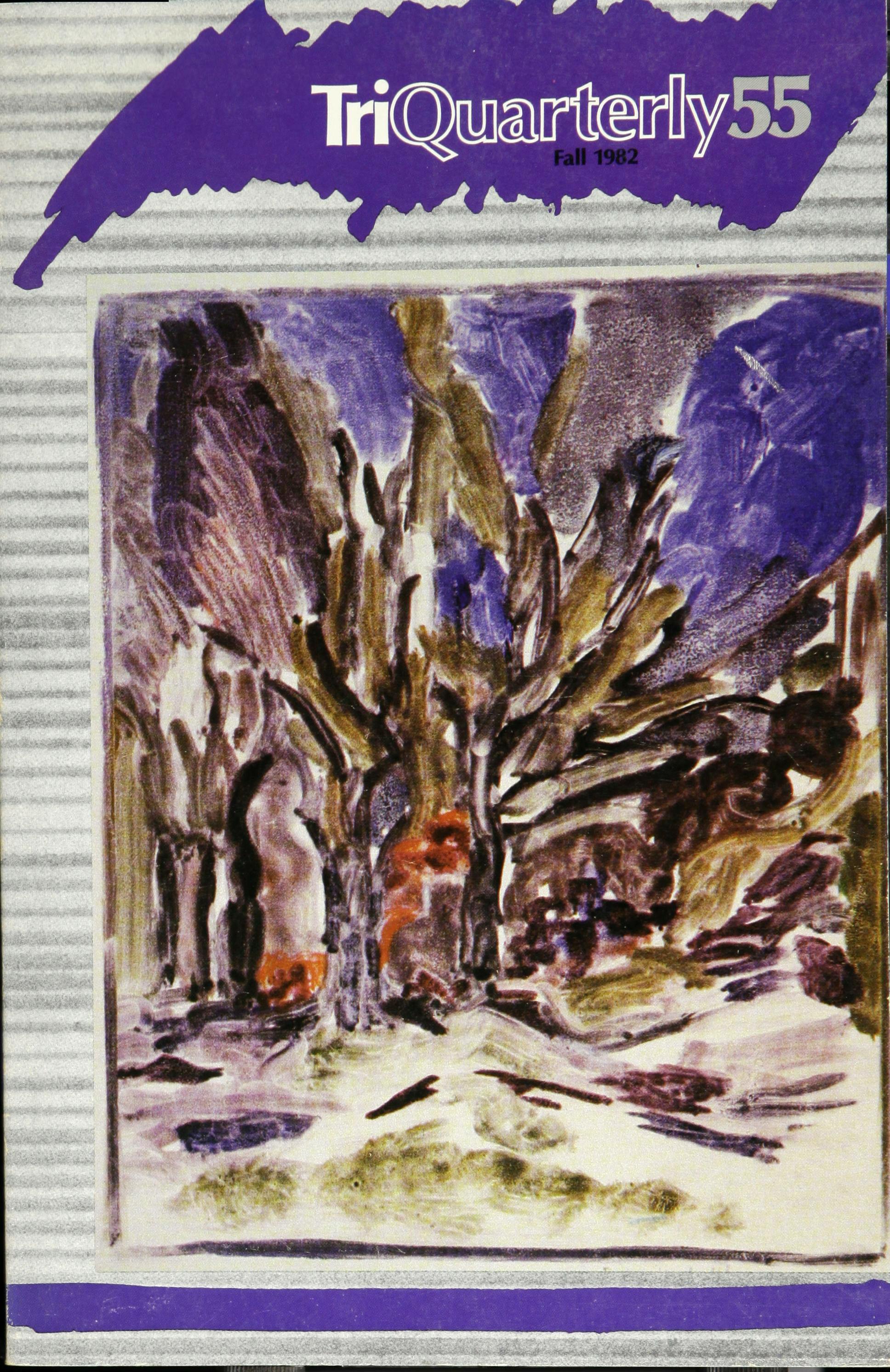

Fall 1982
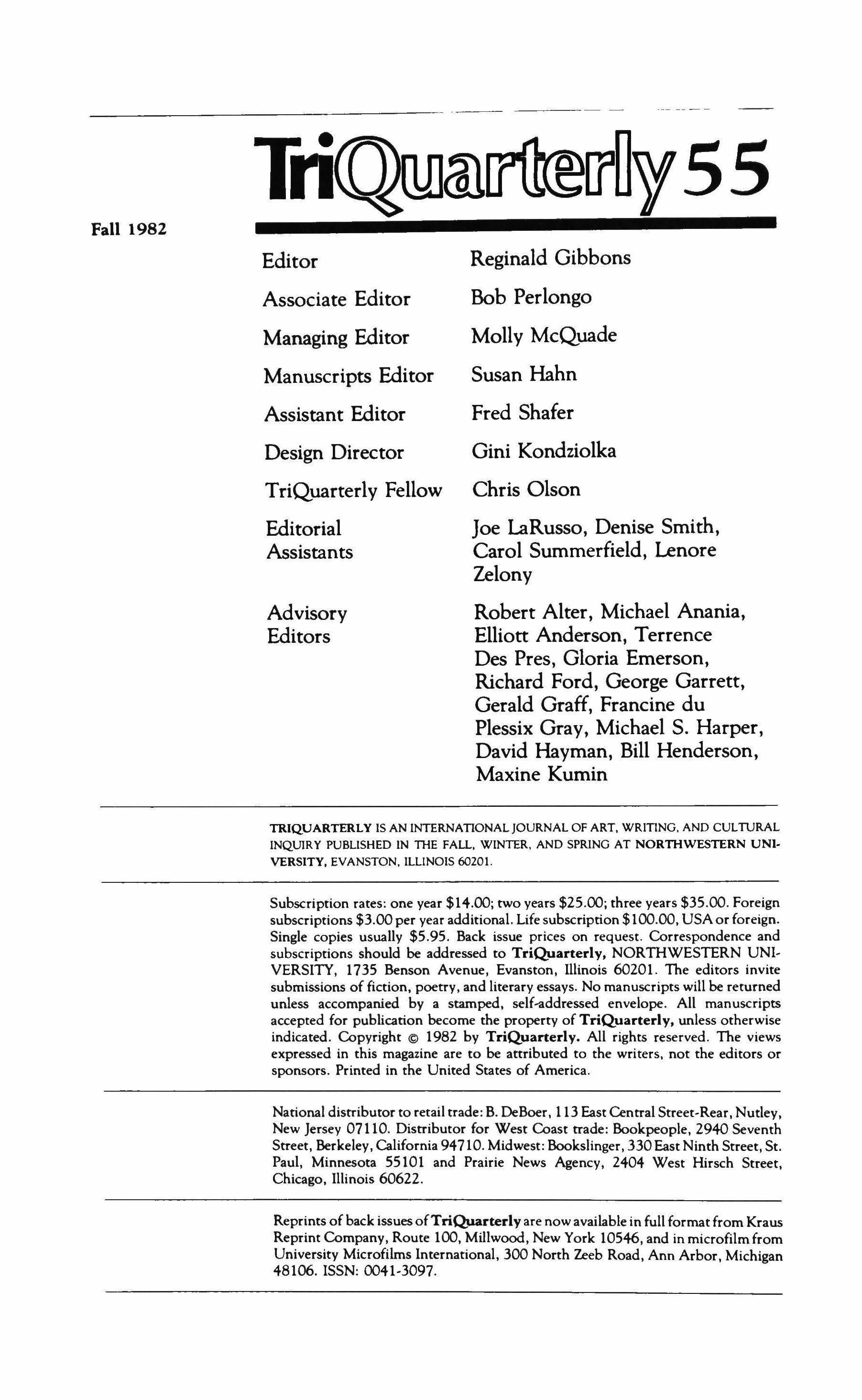
Editor
Associate Editor
Managing Editor
Manuscripts Editor
Assistant Editor
Design Director
TriQuarterly Fellow
Editorial Assistants
Advisory Editors
Reginald Gibbons
Bob Perlongo
Molly McQuade
Susan Hahn
Fred Shafer
Gini Kondziolka
Chris Olson
Joe laRusso, Denise Smith, Carol Summerfield, Lenore
Zelony
Robert Alter, Michael Anania, Elliott Anderson, Terrence Des Pres, Gloria Emerson, Richard Ford, George Garrett, Gerald Graff, Francine du Plessix Gray, Michael S. Harper, David Hayman, Bill Henderson, Maxine Kumin
TRIQUARTERLY IS AN INTERNATIONAL JOURNAL OF ART, WRITING, AND CULTURAL INQUIRY PUBLISHED IN THE FALL, WINTER, AND SPRING AT NORTHWESTERN UNI· VERSITY, EVANSTON, ILLINOIS 60201.
Subscription rates: one year $14,00; two years $25.00; three years $35.00. Foreign subscriptions $3.00 per year additional. Life subscription $100.00, USA or foreign. Single copies usually $5.95. Back issue prices on request. Correspondence and subscriptions should be addressed to TriQuarterly, NORTHWESTERN UNIVERSITY, 1735 Benson Avenue, Evanston, llIinois 60201. The editors invite submissions of fiction, poetry, and literary essays. No manuscripts will be returned unless accompanied by a stamped, self-addressed envelope. All manuscripts accepted for publication become the property of TriQuarterly, unless otherwise indicated. Copyright © 1982 by TriQuarterly. All rights reserved. The views expressed in this magazine are (0 be attributed to the writers, not the editors or sponsors. Printed in the United States of America.
National distributor to retail trade: B. DeBoer, 113 East Central Street-Rear, Nutley, New Jersey 07110. Distributor for West Coast trade: Bookpeople, 2940 Seventh Street, Berkeley, California 94710. Midwest: Bookslinger, 330 East Ninth Street, St. Paul, Minnesota 55101 and Prairie News Agency, 2404 West Hirsch Street, Chicago, Illinois 60622.
Reprints of back issues ofTriQuarterly are now available in full format from Kraus Reprint Company, Route 100, Millwood, New York 10546, and in microfilm from University Microfilms International, 300 North Zeeb Road, Ann Arbor, Michigan 48106. ISSN: 0041-3097.
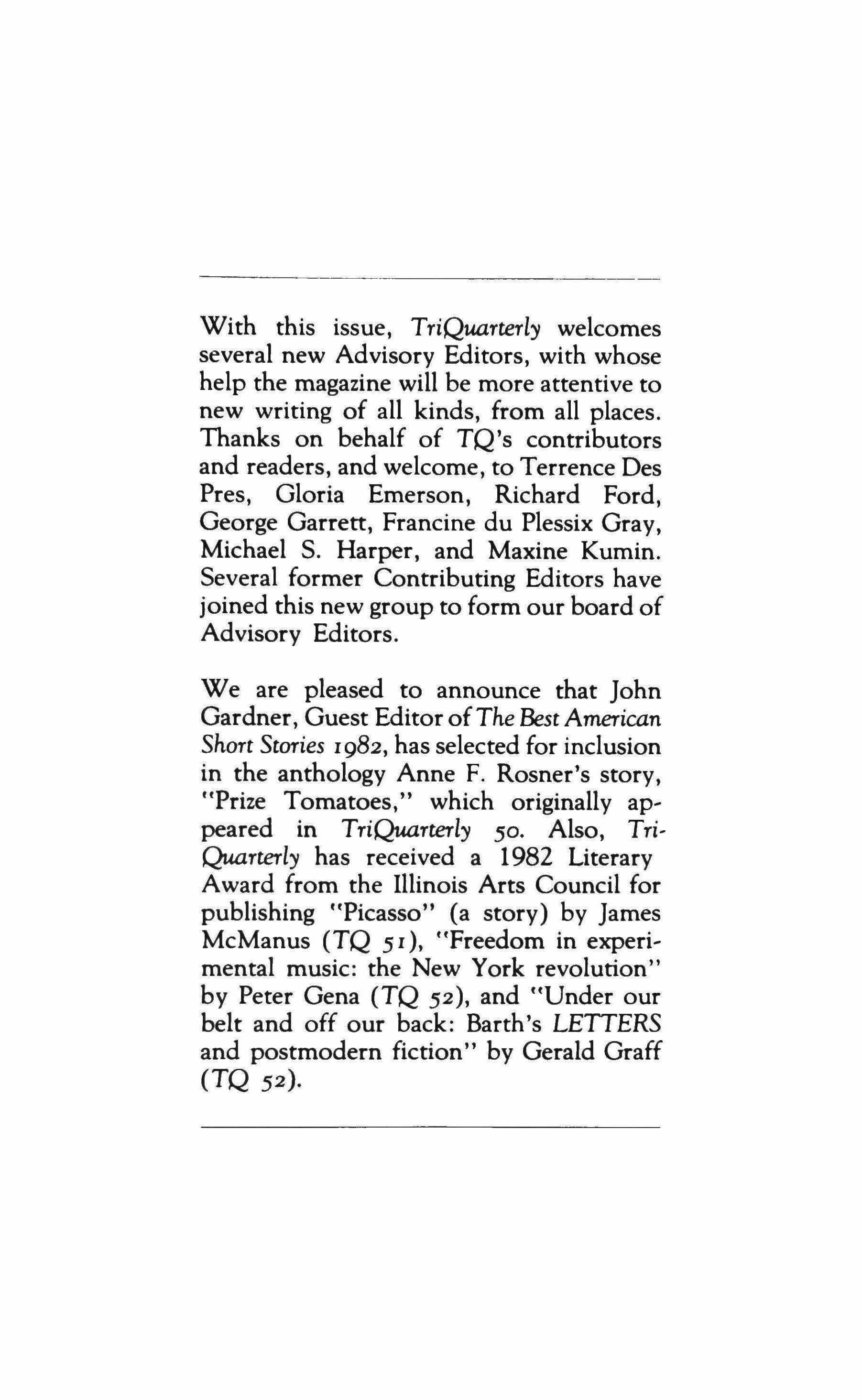
With this issue, TriQuarterly welcomes several new Advisory Editors, with whose help the magazine will be more attentive to new writing of all kinds, from all places. Thanks on behalf of TQ's contributors and readers, and welcome, to Terrence Des Pres, Gloria Emerson, Richard Ford, George Garrett, Francine du Plessix Gray, Michael S. Harper, and Maxine Kumin. Several former Contributing Editors have joined this new group to form our board of Advisory Editors.
We are pleased to announce that John Gardner, Guest Editor ofThe Best American Short Stories 1982, has selected for inclusion in the anthology Anne F. Rosner's story, "Prize Tomatoes," which originally appeared in TriQuarterly 50. Also, TriQuarterly has received a 1982 Literary Award from the Illinois Arts Council for publishing "Picasso" (a story) by James McManus (TQ 51), "Freedom in experimental music: the New York revolution" by Peter Gena (TQ 52), and "Under our belt and off our back: Barth's LETTERS and postmodern fiction" by Gerald Graff (TQ 52).
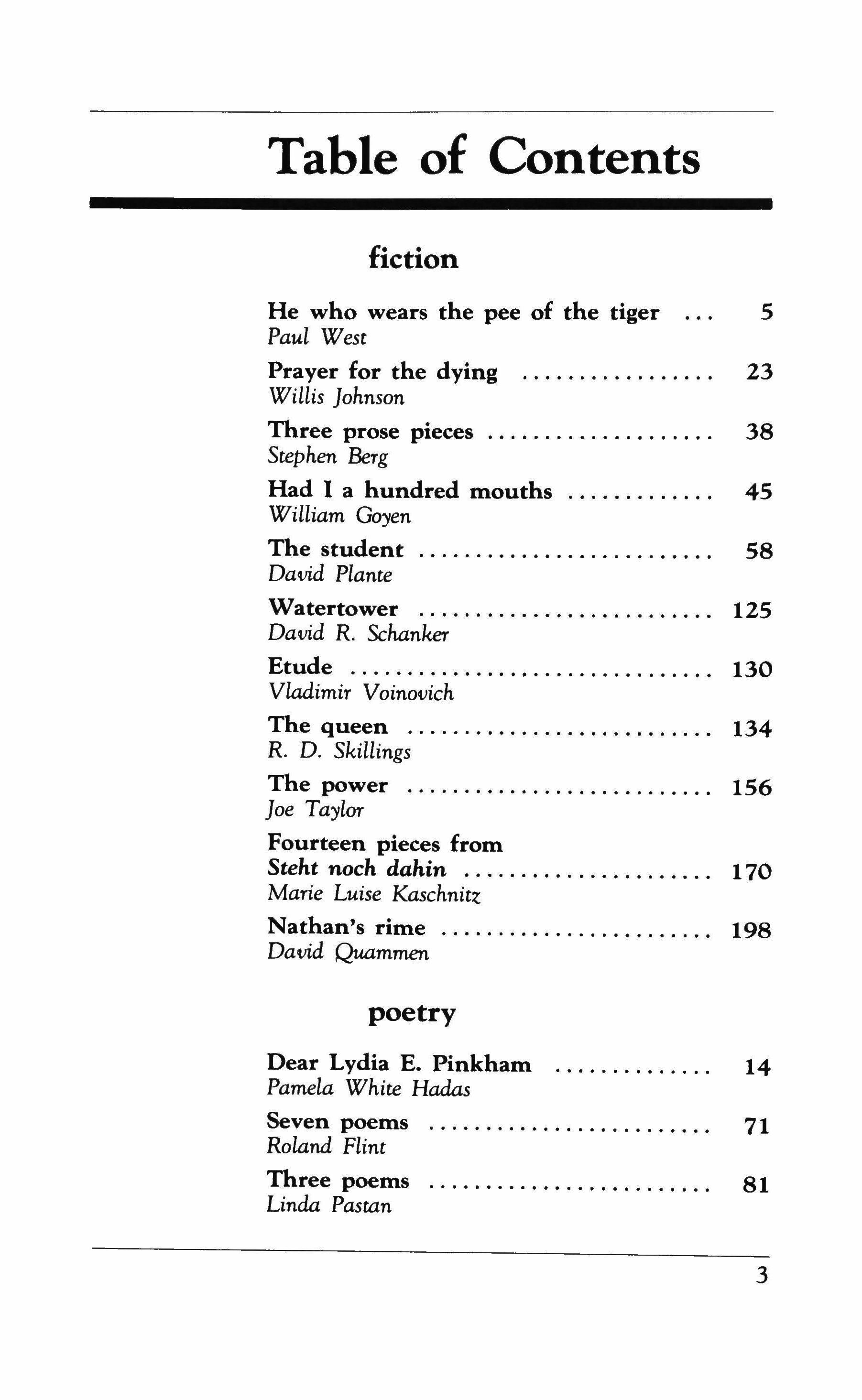
Table of Contents fiction He who wears the pee of the tiger 5 Paul West Prayer for the dying 23 Willis Johnson 1nnree prose pieces 38 Stephen Berg Had I a hundred mouths William Goyen 45 1nne student David Plante Watertower 125 David R. Schanker 58 Etude 130 Vladimir Voinovich The queen 134 R. D. Skillings The power 156 Joe Taylor Fourteen pieces from Steht noch dahin 170 Marie Luise Kaschnitz Nathan's rime David Quammen 198 poetry Dear Lydia E. Pinkham Pamela White Hadas 14 Seven poems Roland Flint 1nnree poems Linda Pastan 71 81 3
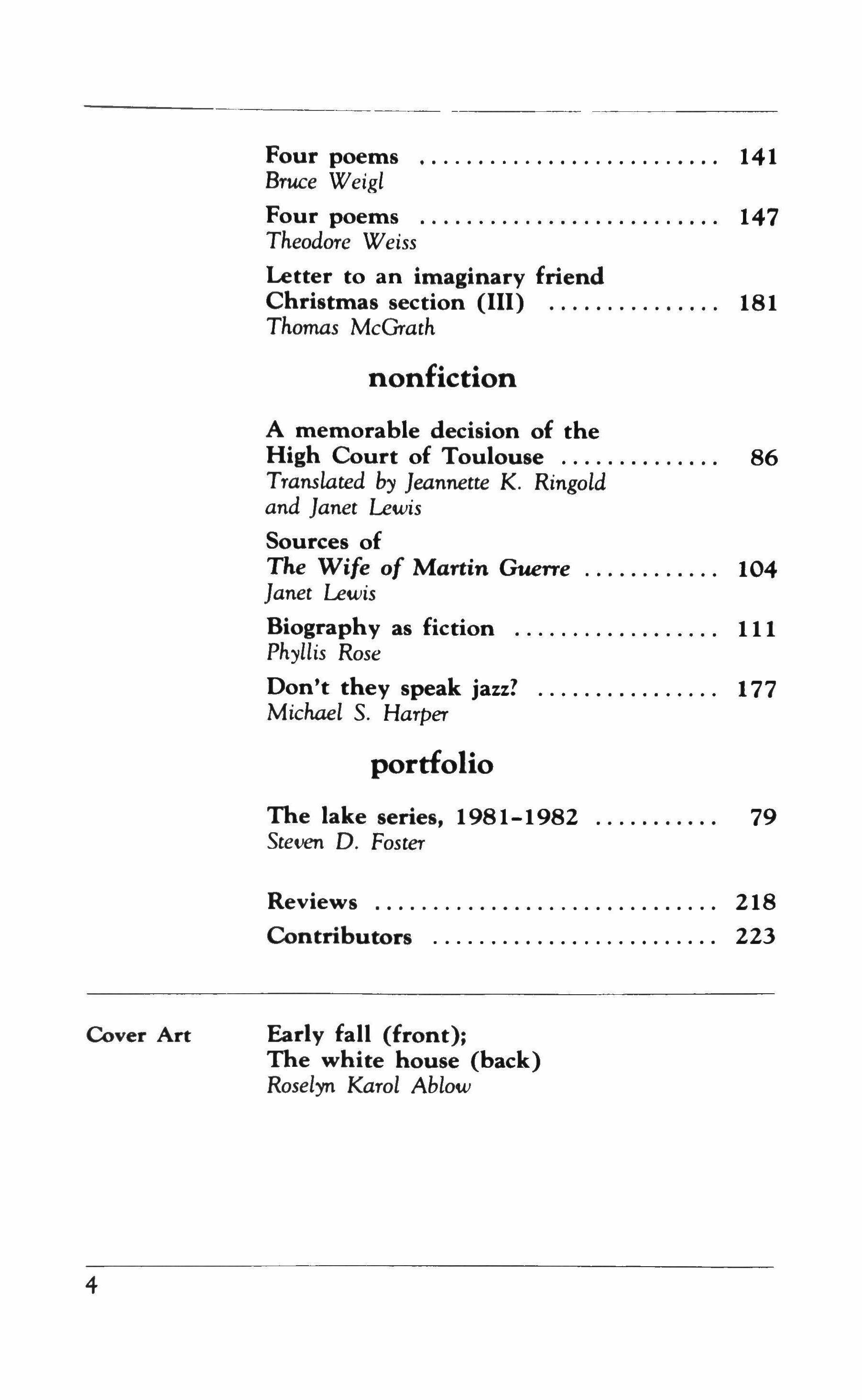
Four poems Bruce Weigl Four poems Theodore Weiss Letter to an imaginary friend Christmas section (III) 181 Thomas McGrath 141 147 nonfiction A memorable decision of the High Court of Toulouse 86 Translated by Jeannette K. Ringold and Janet Lewis Sources of The Wife of Martin Guerre 104 Janet Lewis Biography as fiction 111 Phyllis Rose Don't they speak jazz? Michael S. Harper portfolio 177 The lake series, 1981-1982 Steven D. Foster 79 Reviews 218 Contributors 223 Cover Art Early fall (front); The white house (back) Roselyn Karol Ablow 4
He who wears the pee of the tiger
Paul West

1 When his life fragmented like a grenade, they were in Laos, lifted in to set up fire bases on the ridges while the ARVN marched through the valleys. There was less climbing than he had expected, but there was enough. The Viet Cong were all around them, but merely observing; or so the lieutenant said, and nobody lower in rank had the slightest idea what was going on. It was almost a phony war now, up there in the purring cool of the ridges, with occasional bouts of what was called probing by fire. He got used to the different sound of choppers; heard from higher up and sometimes seen from above, they seemed less intrusive, oddly integrated into the landscape down there and no longer the rowdy boxcars they had been at the jungle LZs. He saw human beings falling from them or being thrown, but all that belonged to another order of experience. If anyone was in for trouble, it was the ARVN columns in the long, steep valleys. He yearned not to have to go down again. One sniper harassed them, at regular intervals, from so far away he had no effect. Or he was a lousy shot, and the lieutenant said not to take him out because they might put a real marksman in his place. Dumbo, they began to call the sniper, then Zorro, and Zorro he remained, neither killing nor improving. They had arrived, dug in titty deep, as they called it, after treading down the vegetation; but the soil was so hard that their shovels broke, as did their machetes when they chopped the trees. Down went the first wall of sandbags, filled with stony soil, then they laid the logs on top for an overhead, on top of which they set more bags against possible mortar attack. Lazy up there in the spacious-feeling heat, he hoped they would never leave, which would mean emptying the sandbags and filling them again a day's march away, with full rucksacks, uphill or down, it made no difference. It was donkey work. Now he knew that the superstition about everyone's getting killed soon after an early Rand R, such as he'd had
5
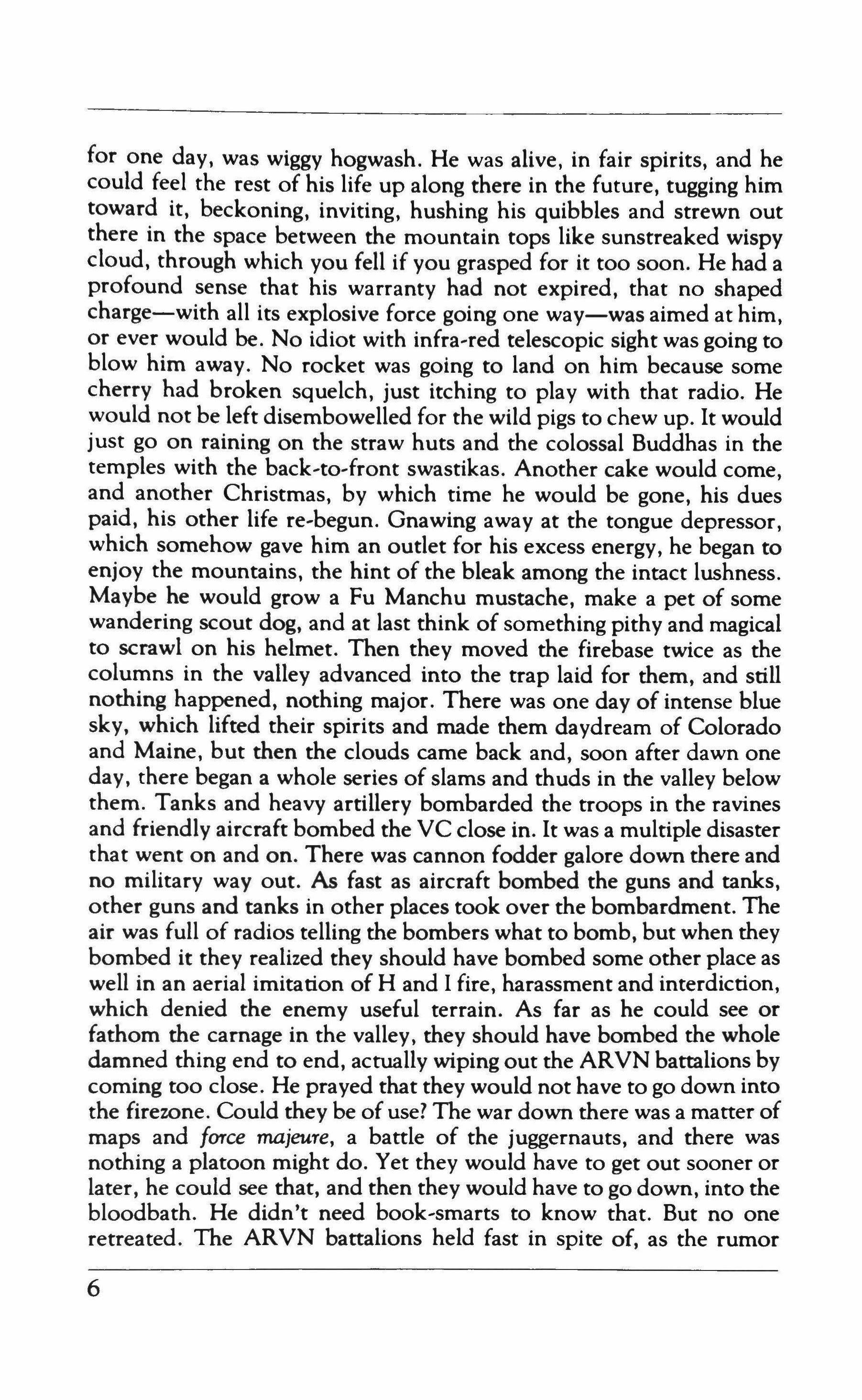
for one day, was wiggy hogwash. He was alive, in fair spirits, and he could feel the rest of his life up along there in the future, tugging him toward it, beckoning, inviting, hushing his quibbles and strewn out there in the space between the mountain tops like sunstreaked wispy cloud, through which you fell if you grasped for it too soon. He had a profound sense that his warranty had not expired, that no shaped charge-with all its explosive force going one way-was aimed at him, or ever would be. No idiot with infra-red telescopic sight was going to blow him away. No rocket was going to land on him because some cherry had broken squelch, just itching to play with that radio. He would not be left disembowelled for the wild pigs to chew up. It would just go on raining on the straw huts and the colossal Buddhas in the temples with the back-to-front swastikas. Another cake would come, and another Christmas, by which time he would be gone, his dues paid, his other life re-begun. Gnawing away at the tongue depressor, which somehow gave him an outlet for his excess energy, he began to enjoy the mountains, the hint of the bleak among the intact lushness. Maybe he would grow a Fu Manchu mustache, make a pet of some wandering scout dog, and at last think of something pithy and magical to scrawl on his helmet. Then they moved the firebase twice as the columns in the valley advanced into the trap laid for them, and still nothing happened, nothing major. There was one day of intense blue sky, which lifted their spirits and made them daydream of Colorado and Maine, but then the clouds came back and, soon after dawn one day, there began a whole series of slams and thuds in the valley below them. Tanks and heavy artillery bombarded the troops in the ravines and friendly aircraft bombed the VC close in. It was a multiple disaster that went on and on. There was cannon fodder galore down there and no military way out. As fast as aircraft bombed the guns and tanks, other guns and tanks in other places took over the bombardment. The air was full of radios telling the bombers what to bomb, but when they bombed it they realized they should have bombed some other place as well in an aerial imitation of H and I fire, harassment and interdiction, which denied the enemy useful terrain. As far as he could see or fathom the carnage in the valley, they should have bombed the whole damned thing end to end, actually wiping out the ARVN battalions by coming too close. He prayed that they would not have to go down into the firezone. Could they be of use? The war down there was a matter of maps and force majeure, a battle of the juggernauts, and there was nothing a platoon might do. Yet they would have to get out sooner or later, he could see that, and then they would have to go down, into the bloodbath. He didn't need book-smarts to know that. But no one retreated. The ARVN battalions held fast in spite of, as the rumor
6
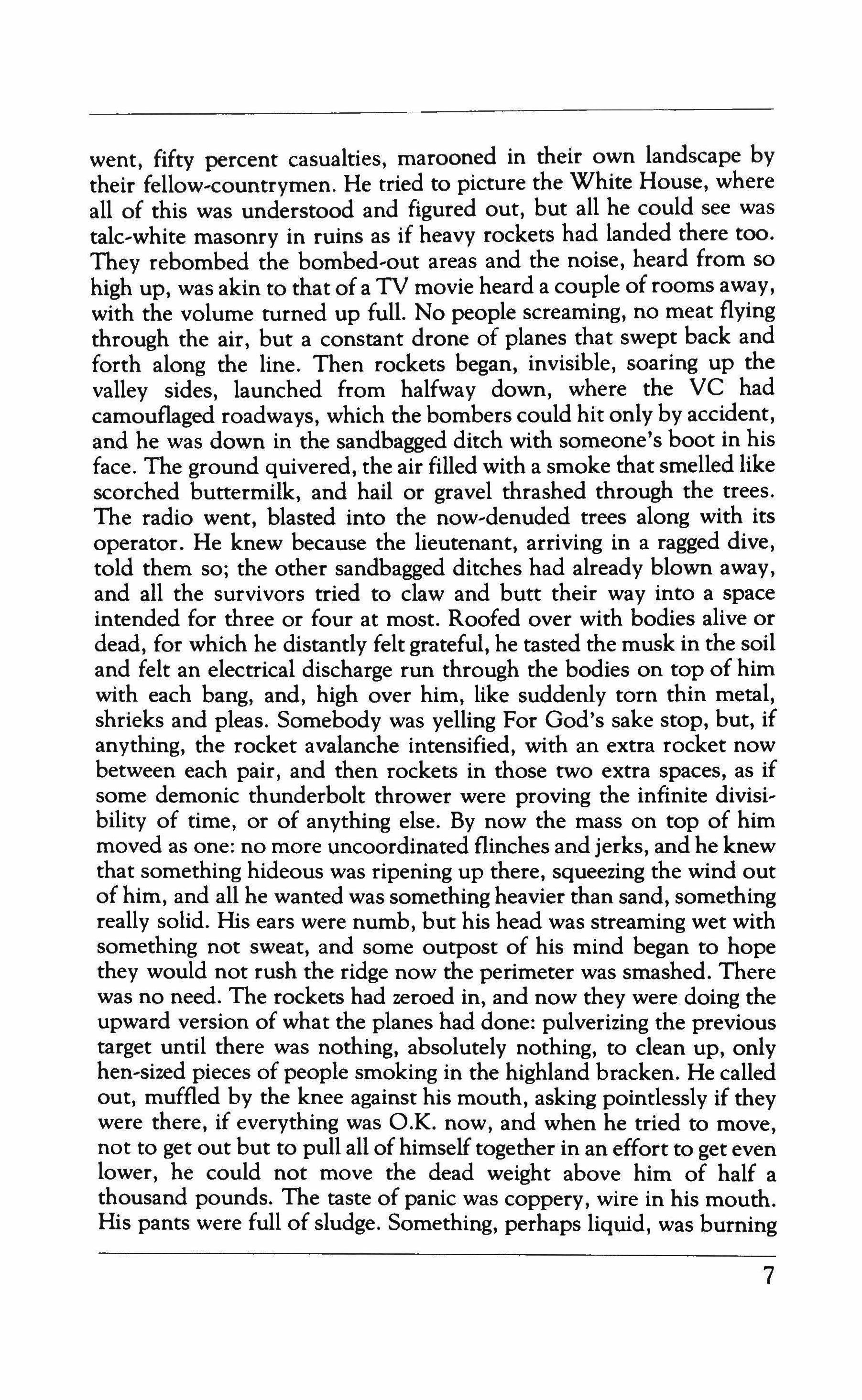
went, fifty percent casualties, marooned in their own landscape by their fellow-countrymen. He tried to picture the White House, where all of this was understood and figured out, but all he could see was talc-white masonry in ruins as if heavy rockets had landed there too. They rebombed the bombed-out areas and the noise, heard from so high up, was akin to that of a TV movie heard a couple of rooms away, with the volume turned up full. No people screaming, no meat flying through the air, but a constant drone of planes that swept back and forth along the line. Then rockets began, invisible, soaring up the valley sides, launched from halfway down, where the VC had camouflaged roadways, which the bombers could hit only by accident, and he was down in the sandbagged ditch with someone's boot in his face. The ground quivered, the air filled with a smoke that smelled like scorched buttermilk, and hail or gravel thrashed through the trees. The radio went, blasted into the now-denuded trees along with its operator. He knew because the lieutenant, arriving in a ragged dive, told them so; the other sandbagged ditches had already blown away, and all the survivors tried to claw and butt their way into a space intended for three or four at most. Roofed over with bodies alive or dead, for which he distantly felt grateful, he tasted the musk in the soil and felt an electrical discharge run through the bodies on top of him with each bang, and, high over him, like suddenly torn thin metal, shrieks and pleas. Somebody was yelling For God's sake stop, but, if anything, the rocket avalanche intensified, with an extra rocket now between each pair, and then rockets in those two extra spaces, as if some demonic thunderbolt thrower were proving the infinite divisibility of time, or of anything else. By now the mass on top of him moved as one: no more uncoordinated flinches and jerks, and he knew that something hideous was ripening up there, squeezing the wind out of him, and all he wanted was something heavier than sand, something really solid. His ears were numb, but his head was streaming wet with something not sweat, and some outpost of his mind began to hope they would not rush the ridge now the perimeter was smashed. There was no need. The rockets had zeroed in, and now they were doing the upward version of what the planes had done: pulverizing the previous target until there was nothing, absolutely nothing, to clean up, only hen-sized pieces of people smoking in the highland bracken. He called out, muffled by the knee against his mouth, asking pointlessly if they were there, if everything was O.K. now, and when he tried to move, not to get out but to pull all of himself together in an effort to get even lower, he could not move the dead weight above him of half a thousand pounds. The taste of panic was coppery, wire in his mouth. His pants were full of sludge. Something, perhaps liquid, was burning
7
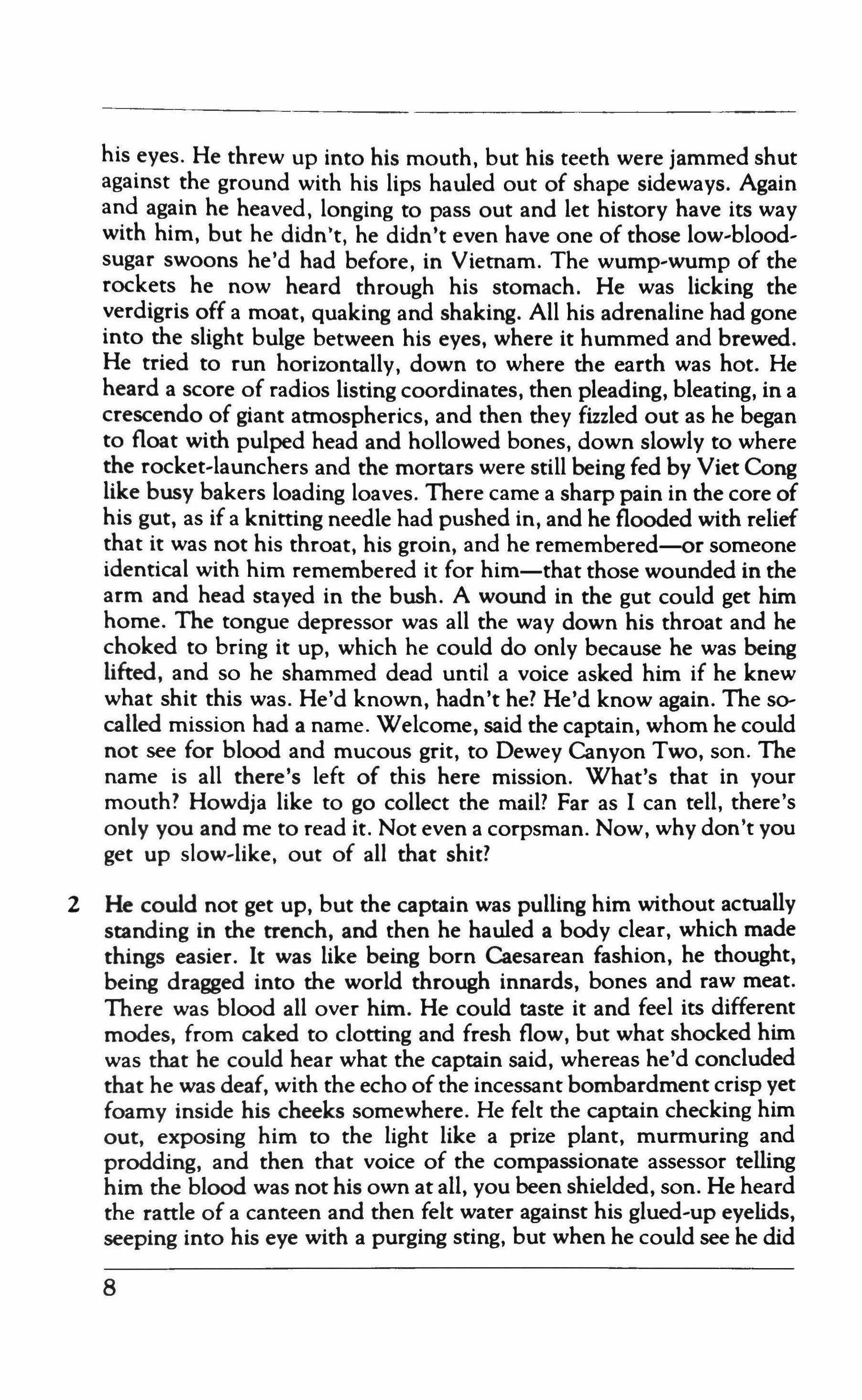
his eyes. He threw up into his mouth, but his teeth were jammed shut against the ground with his lips hauled out of shape sideways. Again and again he heaved, longing to pass out and let history have its way with him, but he didn't, he didn't even have one of those low-bloodsugar swoons he'd had before, in Vietnam. The wump-wurnp of the rockets he now heard through his stomach. He was licking the verdigris off a moat, quaking and shaking. All his adrenaline had gone into the slight bulge between his eyes, where it hummed and brewed. He tried to run horizontally, down to where the earth was hot. He heard a score of radios listing coordinates, then pleading, bleating, in a crescendo of giant atmospherics, and then they fizzled out as he began to float with pulped head and hollowed bones, down slowly to where the rocket-launchers and the mortars were still being fed by Viet Cong like busy bakers loading loaves. There came a sharp pain in the core of his gut, as if a knitting needle had pushed in, and he flooded with relief that it was not his throat, his groin, and he remembered-or someone identical with him remembered it for him-that those wounded in the arm and head stayed in the bush. A wound in the gut could get him home. The tongue depressor was all the way down his throat and he choked to bring it up, which he could do only because he was being lifted, and so he shammed dead until a voice asked him if he knew what shit this was. He'd known, hadn't he? He'd know again. The socalled mission had a name. Welcome, said the captain, whom he could not see for blood and mucous grit, to Dewey Canyon Two, son. The name is all there's left of this here mission. What's that in your mouth? Howdja like to go collect the mail? Far as I can tell, there's only you and me to read it. Not even a corpsman. Now, why don't you get up slow-like, out of all that shit?
2 He could not get up, but the captain was pulling him without actually standing in the trench, and then he hauled a body clear, which made things easier. It was like being born Caesarean fashion, he thought, being dragged into the world through innards, bones and raw meat. There was blood all over him. He could taste it and feel its different modes, from caked to clotting and fresh flow, but what shocked him was that he could hear what the captain said, whereas he'd concluded that he was deaf, with the echo of the incessant bombardment crisp yet foamy inside his cheeks somewhere. He felt the captain checking him out, exposing him to the light like a prize plant, murmuring and prodding, and then that voice of the compassionate assessor telling him the blood was not his own at all, you been shielded, son. He heard the rattle of a canteen and then felt water against his glued-up eyelids, seeping into his eye with a purging sting, but when he could see he did
8
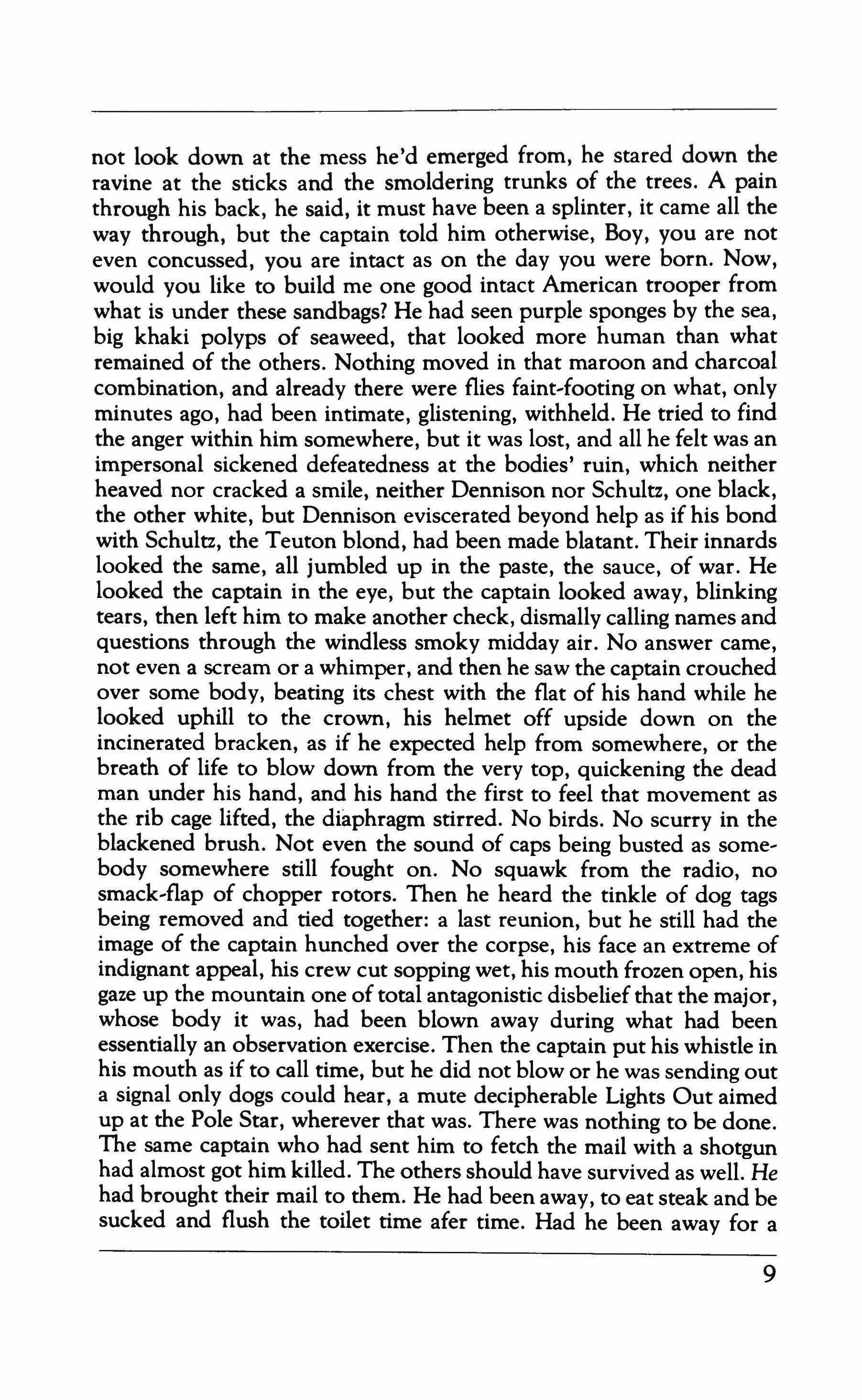
not look down at the mess he'd emerged from, he stared down the ravine at the sticks and the smoldering trunks of the trees. A pain through his back, he said, it must have been a splinter, it came all the way through, but the captain told him otherwise, Boy, you are not even concussed, you are intact as on the day you were born. Now, would you like to build me one good intact American trooper from what is under these sandbags? He had seen purple sponges by the sea, big khaki polyps of seaweed, that looked more human than what remained of the others. Nothing moved in that maroon and charcoal combination, and already there were flies faint-footing on what, only minutes ago, had been intimate, glistening, withheld. He tried to find the anger within him somewhere, but it was lost, and all he felt was an impersonal sickened defeatedness at the bodies' ruin, which neither heaved nor cracked a smile, neither Dennison nor Schultz, one black, the other white, but Dennison eviscerated beyond help as if his bond with Schultz, the Teuton blond, had been made blatant. Their innards looked the same, all jumbled up in the paste, the sauce, of war. He looked the captain in the eye, but the captain looked away, blinking tears, then left him to make another check, dismally calling names and questions through the windless smoky midday air. No answer came, not even a scream or a whimper, and then he saw the captain crouched over some body, beating its chest with the flat of his hand while he looked uphill to the crown, his helmet off upside down on the incinerated bracken, as if he expected help from somewhere, or the breath of life to blow down from the very top, quickening the dead man under his hand, and his hand the first to feel that movement as the rib cage lifted, the diaphragm stirred. No birds. No scurry in the blackened brush. Not even the sound of caps being busted as some' body somewhere still fought on. No squawk from the radio, no smack-flap of chopper rotors. Then he heard the tinkle of dog tags being removed and tied together: a last reunion, but he still had the image of the captain hunched over the corpse, his face an extreme of indignant appeal, his crew cut sopping wet, his mouth frozen open, his gaze up the mountain one of total antagonistic disbelief that the major, whose body it was, had been blown away during what had been essentially an observation exercise. Then the captain put his whistle in his mouth as if to call time, but he did not blow or he was sending out a signal only dogs could hear, a mute decipherable Lights Out aimed up at the Pole Star, wherever that was. There was nothing to be done. The same captain who had sent him to fetch the mail with a shotgun had almost got him killed. The others should have survived as well. He had brought their mail to them. He had been away, to eat steak and be sucked and flush the toilet time afer time. Had he been away for a
9
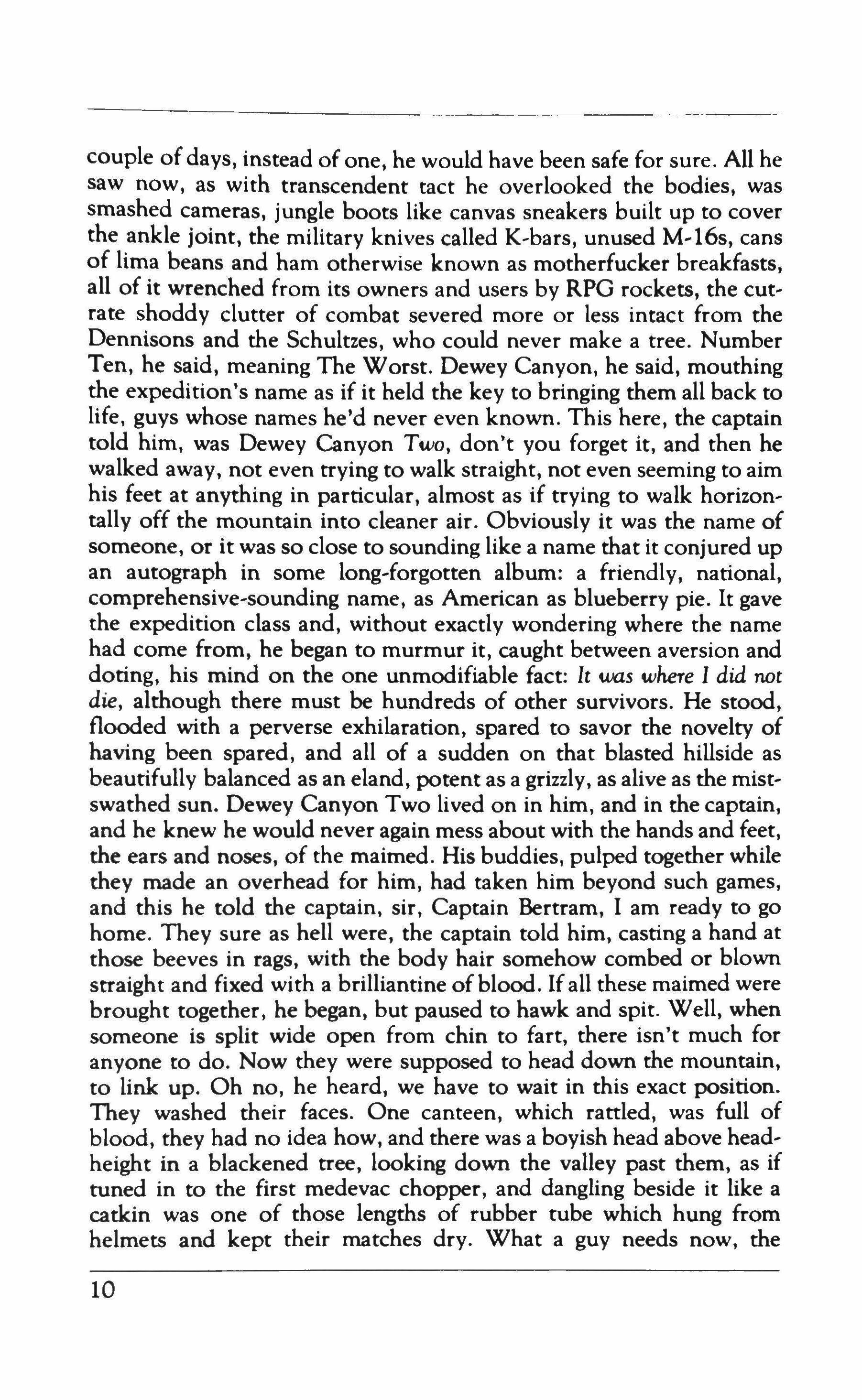
couple of days, instead of one, he would have been safe for sure. All he saw now, as with transcendent tact he overlooked the bodies, was smashed cameras, jungle boots like canvas sneakers built up to cover the ankle joint, the military knives called Kvbars, unused M�16s, cans of lima beans and ham otherwise known as motherfucker breakfasts, all of it wrenched from its owners and users by RPG rockets, the cutrate shoddy clutter of combat severed more or less intact from the Dennisons and the Schultzes, who could never make a tree. Number Ten, he said, meaning The Worst. Dewey Canyon, he said, mouthing the expedition's name as if it held the key to bringing them all back to life, guys whose names he'd never even known. This here, the captain told him, was Dewey Canyon Two, don't you forget it, and then he walked away, not even trying to walk straight, not even seeming to aim his feet at anything in particular, almost as if trying to walk horizontally off the mountain into cleaner air. Obviously it was the name of someone, or it was so close to sounding like a name that it conjured up an autograph in some long-forgotten album: a friendly, national, comprehensive-sounding name, as American as blueberry pie. It gave the expedition class and, without exactly wondering where the name had come from, he began to murmur it, caught between aversion and doting, his mind on the one unrnodifiable fact: It was where I did not die, although there must be hundreds of other survivors. He stood, flooded with a perverse exhilaration, spared to savor the novelty of having been spared, and all of a sudden on that blasted hillside as beautifully balanced as an eland, potent as a grizzly, as alive as the mistswathed sun. Dewey Canyon Two lived on in him, and in the captain, and he knew he would never again mess about with the hands and feet, the ears and noses, of the maimed. His buddies, pulped together while they made an overhead for him, had taken him beyond such games, and this he told the captain, sir, Captain Bertram, I am ready to go home. They sure as hell were, the captain told him, casting a hand at those beeves in rags, with the body hair somehow combed or blown straight and fixed with a brilliantine ofblood. Ifall these maimed were brought together, he began, but paused to hawk and spit. Well, when someone is split wide open from chin to fart, there isn't much for anyone to do. Now they were supposed to head down the mountain, to link up. Oh no, he heard, we have to wait in this exact position. They washed their faces. One canteen, which rattled, was full of blood, they had no idea how, and there was a boyish head above headheight in a blackened tree, looking down the valley past them, as if tuned in to the first medevac chopper, and dangling beside it like a catkin was one of those lengths of rubber tube which hung from helmets and kept their matches dry. What a guy needs now, the
10
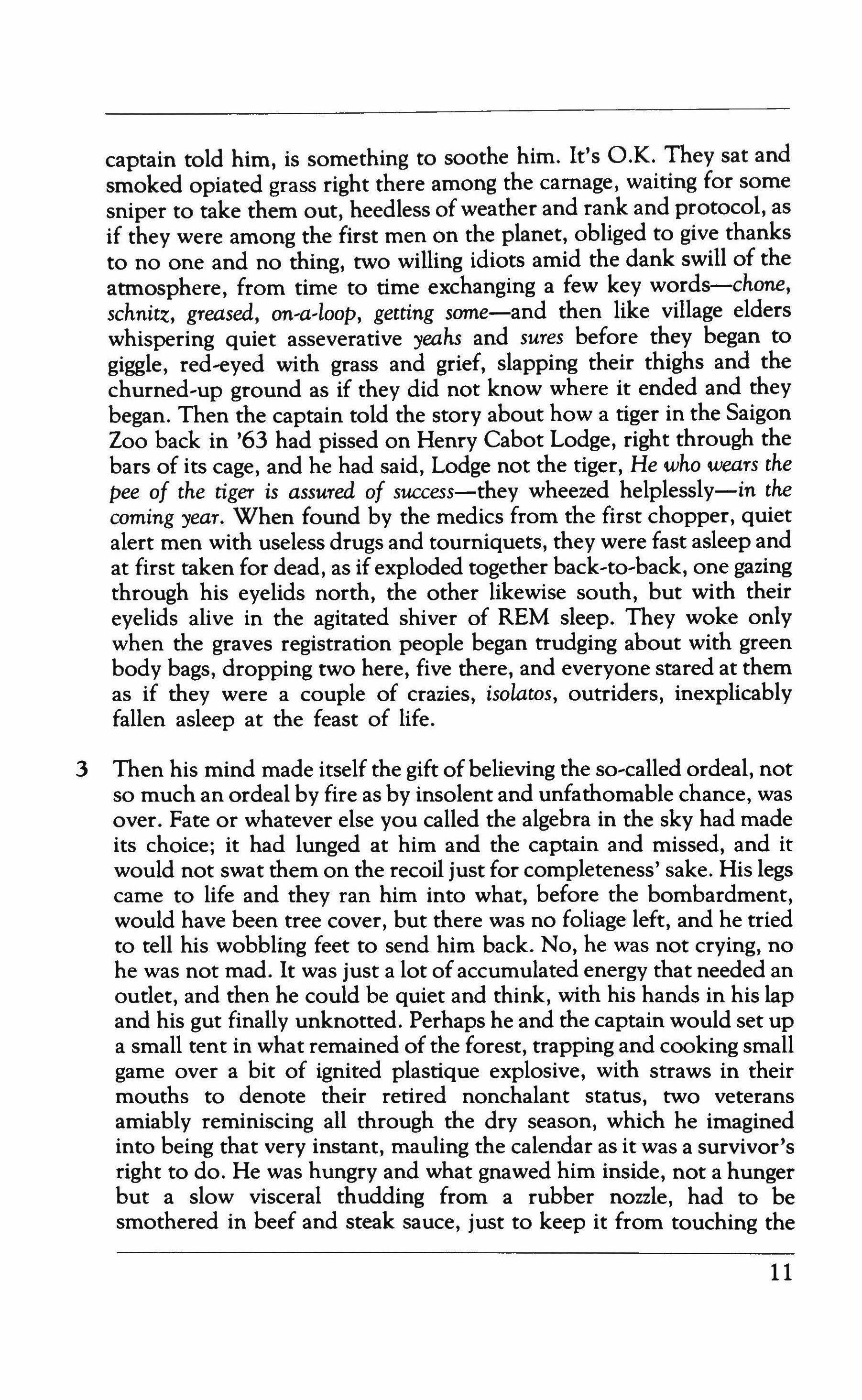
captain told him, is something to soothe him. It's O.K. They sat and smoked opiated grass right there among the carnage, waiting for some sniper to take them out, heedless ofweather and rank and protocol, as if they were among the first men on the planet, obliged to give thanks to no one and no thing, two willing idiots amid the dank swill of the atmosphere, from time to time exchanging a few key words-chone, schnirz, greased, on-e-loop, getting some-and then like village elders whispering quiet asseverative yeahs and sures before they began to giggle, red-eyed with grass and grief, slapping their thighs and the churned-up ground as if they did not know where it ended and they began. Then the captain told the story about how a tiger in the Saigon Zoo back in '63 had pissed on Henry Cabot Lodge, right through the bars of its cage, and he had said, Lodge not the tiger, He who wears the pee of the tiger is assured of success-they wheezed helplessly-in the coming year. When found by the medics from the first chopper, quiet alert men with useless drugs and tourniquets, they were fast asleep and at first taken for dead, as ifexploded together back-to-back, one gazing through his eyelids north, the other likewise south, but with their eyelids alive in the agitated shiver of REM sleep. They woke only when the graves registration people began trudging about with green body bags, dropping two here, five there, and everyone stared at them as if they were a couple of crazies, isolatos, outriders, inexplicably fallen asleep at the feast of life.
3 Then his mind made itself the gift ofbelieving the so-called ordeal, not so much an ordeal by fire as by insolent and unfathomable chance, was over. Fate or whatever else you called the algebra in the sky had made its choice; it had lunged at him and the captain and missed, and it would not swat them on the recoil just for completeness' sake. His legs came to life and they ran him into what, before the bombardment, would have been tree cover, but there was no foliage left, and he tried to tell his wobbling feet to send him back. No, he was not crying, no he was not mad. It was just a lot ofaccumulated energy that needed an outlet, and then he could be quiet and think, with his hands in his lap and his gut finally unknotted. Perhaps he and the captain would set up a small tent in what remained of the forest, trapping and cooking small game over a bit of ignited plastique explosive, with straws in their mouths to denote their retired nonchalant status, two veterans amiably reminiscing all through the dry season, which he imagined into being that very instant, mauling the calendar as it was a survivor's right to do. He was hungry and what gnawed him inside, not a hunger but a slow visceral thudding from a rubber nozzle, had to be smothered in beef and steak sauce, just to keep it from touching the
11
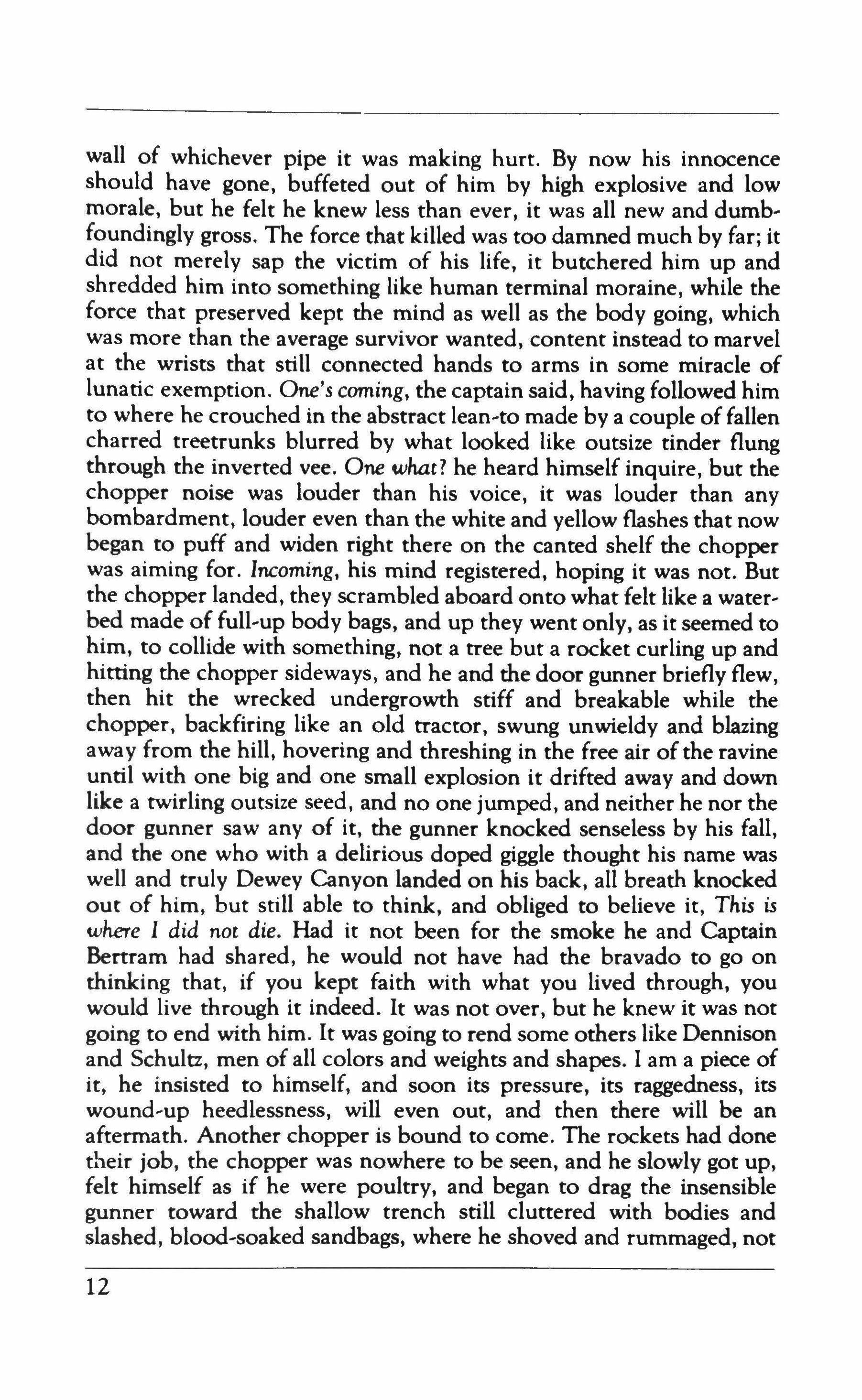
wall of whichever pipe it was making hurt. By now his innocence should have gone, buffeted out of him by high explosive and low morale, but he felt he knew less than ever, it was all new and dumb, foundingly gross. The force that killed was too damned much by far; it did not merely sap the victim of his life, it butchered him up and shredded him into something like human terminal moraine, while the force that preserved kept the mind as well as the body going, which was more than the average survivor wanted, content instead to marvel at the wrists that still connected hands to arms in some miracle of lunatic exemption. One's coming, the captain said, having followed him to where he crouched in the abstract lean-to made by a couple of fallen charred treetrunks blurred by what looked like outsize tinder flung through the inverted vee. One what? he heard himself inquire, but the chopper noise was louder than his voice, it was louder than any bombardment, louder even than the white and yellow flashes that now began to puff and widen right there on the canted shelf the chopper was aiming for. Incoming, his mind registered, hoping it was not. But the chopper landed, they scrambled aboard onto what felt like a water, bed made of full-up body bags, and up they went only, as it seemed to him, to collide with something, not a tree but a rocket curling up and hitting the chopper sideways, and he and the door gunner briefly flew, then hit the wrecked undergrowth stiff and breakable while the chopper, backfiring like an old tractor, swung unwieldy and blazing away from the hill, hovering and threshing in the free air of the ravine until with one big and one small explosion it drifted away and down like a twirling outsize seed, and no one jumped, and neither he nor the door gunner saw any of it, the gunner knocked senseless by his fall, and the one who with a delirious doped giggle thought his name was well and truly Dewey Canyon landed on his back, all breath knocked out of him, but still able to think, and obliged to believe it, This is where 1 did not die. Had it not been for the smoke he and Captain Bertram had shared, he would not have had the bravado to go on thinking that, if you kept faith with what you lived through, you would live through it indeed. It was not over, but he knew it was not going to end with him. It was going to rend some others like Dennison and Schultz, men of all colors and weights and shapes. I am a piece of it, he insisted to himself, and soon its pressure, its raggedness, its wound-up heedlessness, will even out, and then there will be an aftermath. Another chopper is bound to come. The rockets had done their job, the chopper was nowhere to be seen, and he slowly got up, felt himself as if he were poultry, and began to drag the insensible gunner toward the shallow trench still cluttered with bodies and slashed, blood-soaked sandbags, where he shoved and rummaged, not
12
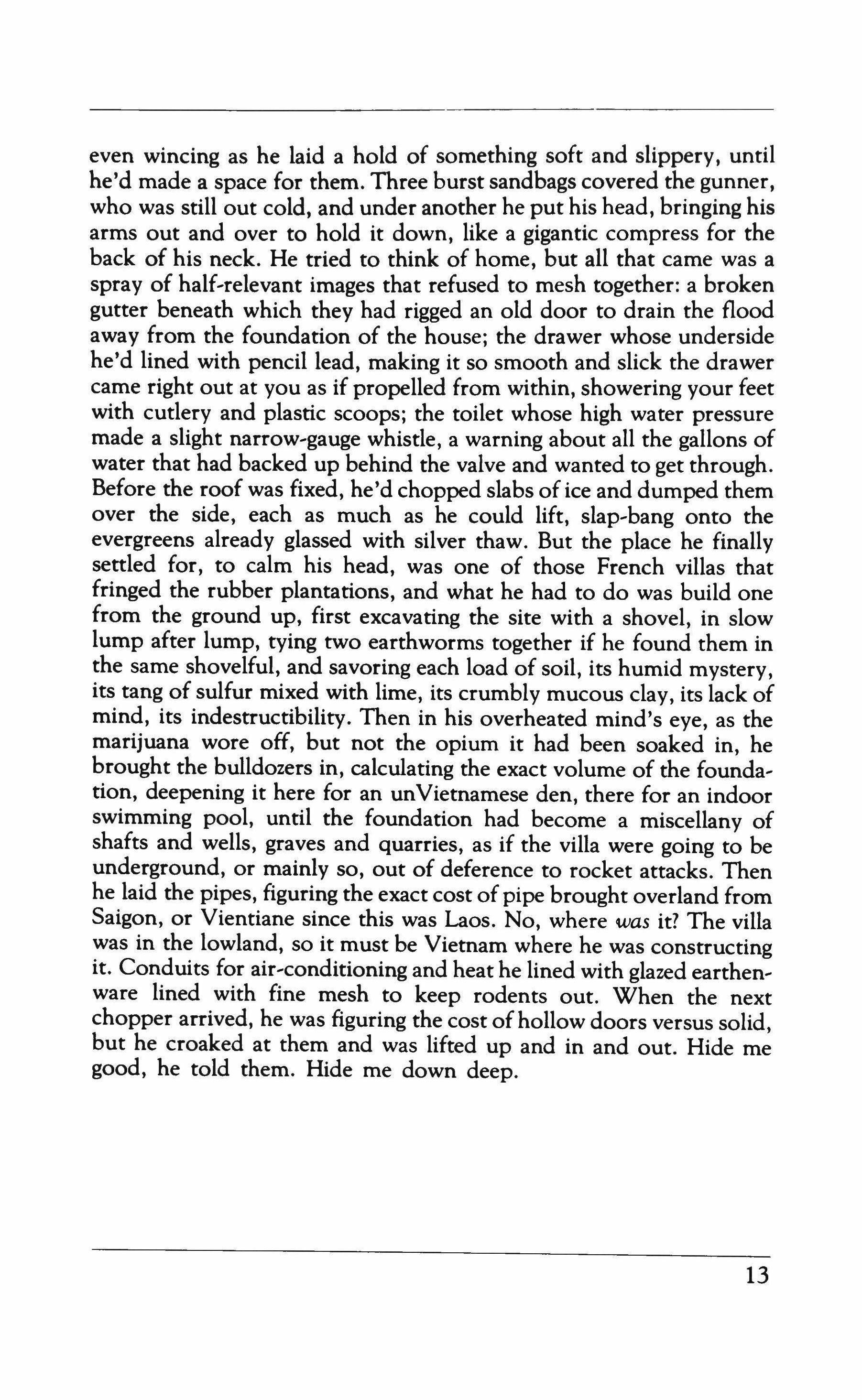
even wincing as he laid a hold of something soft and slippery, until he'd made a space for them. Three burst sandbags covered the gunner, who was still out cold, and under another he put his head, bringing his arms out and over to hold it down, like a gigantic compress for the back of his neck. He tried to think of home, but all that came was a spray of half-relevant images that refused to mesh together: a broken gutter beneath which they had rigged an old door to drain the flood away from the foundation of the house; the drawer whose underside he'd lined with pencil lead, making it so smooth and slick the drawer came right out at you as if propelled from within, showering your feet with cutlery and plastic scoops; the toilet whose high water pressure made a slight narrow-gauge whistle, a warning about all the gallons of water that had backed up behind the valve and wanted to get through. Before the roof was fixed, he'd chopped slabs of ice and dumped them over the side, each as much as he could lift, slap-bang onto the evergreens already glassed with silver thaw. But the place he finally settled for, to calm his head, was one of those French villas that fringed the rubber plantations, and what he had to do was build one from the ground up, first excavating the site with a shovel, in slow lump after lump, tying two earthworms together if he found them in the same shovelful, and savoring each load of soil, its humid mystery, its tang of sulfur mixed with lime, its crumbly mucous clay, its lack of mind, its indestructibility. Then in his overheated mind's eye, as the marijuana wore off, but not the opium it had been soaked in, he brought the bulldozers in, calculating the exact volume of the foundation, deepening it here for an unVietnamese den, there for an indoor swimming pool, until the foundation had become a miscellany of shafts and wells, graves and quarries, as if the villa were going to be underground, or mainly so, out of deference to rocket attacks. Then he laid the pipes, figuring the exact cost ofpipe brought overland from Saigon, or Vientiane since this was Laos. No, where was it? The villa was in the lowland, so it must be Vietnam where he was constructing it. Conduits for air-conditioning and heat he lined with glazed earthenware lined with fine mesh to keep rodents out. When the next chopper arrived, he was figuring the cost of hollow doors versus solid, but he croaked at them and was lifted up and in and out. Hide me good, he told them. Hide me down deep.
13
Dear Lydia E. Pinkham
Pamela White Hanas
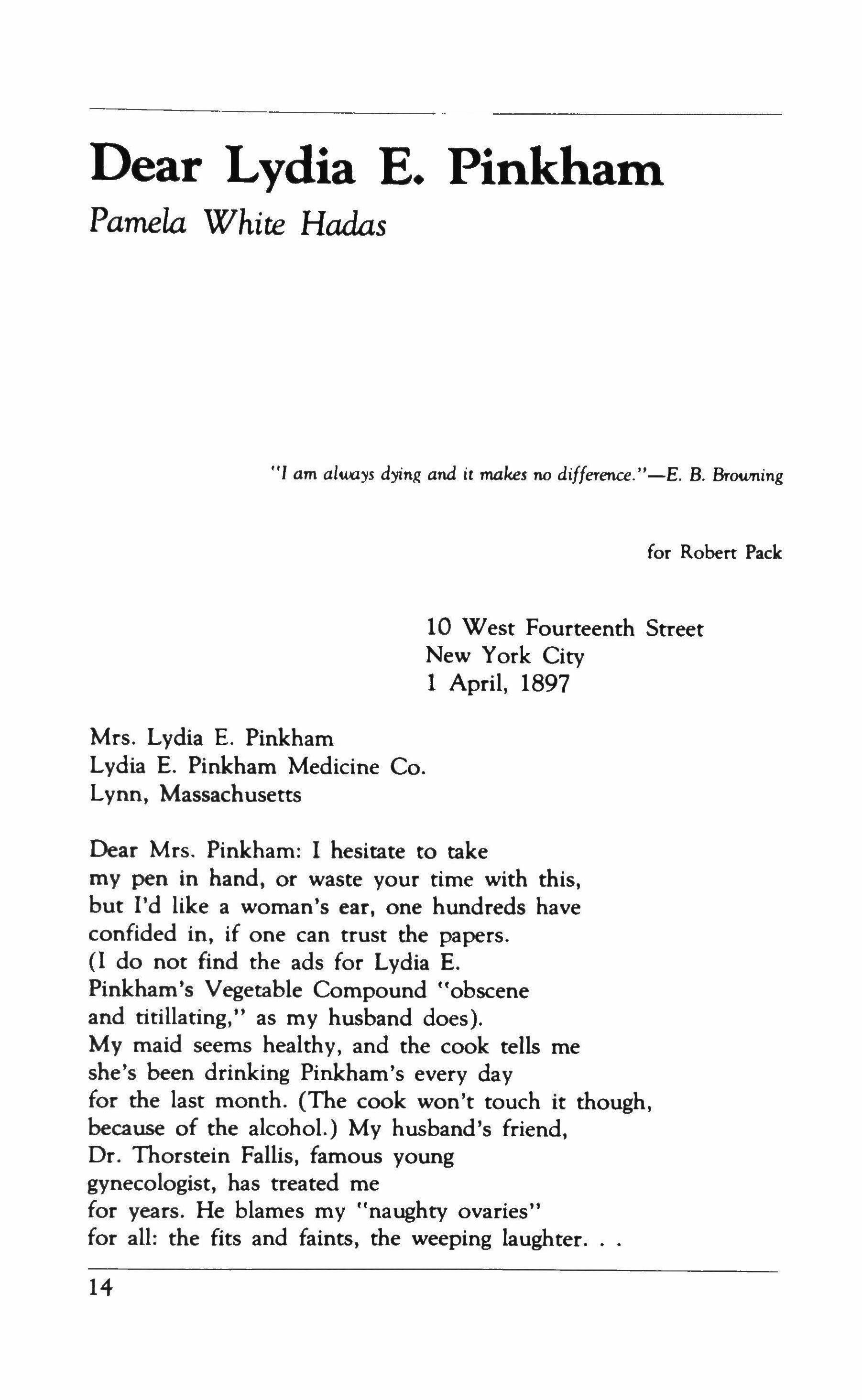
am always dying and it makes no dif[eTence."-E. B. Browning for Robert Pack
10 West Fourteenth Street New York City 1 April, 1897
Mrs. Lydia E. Pinkham
Lydia E. Pinkham Medicine Co. Lynn, Massachusetts
Dear Mrs. Pinkham: I hesitate to take my pen in hand, or waste your time with this, but I'd like a woman's ear, one hundreds have confided in, if one can trust the papers. (l do not find the ads for Lydia E. Pinkham's Vegetable Compound "obscene and titillating," as my husband does). My maid seems healthy, and the cook tells me she's been drinking Pinkham's every day for the last month. (The cook won't touch it though, because of the alcohol.) My husband's friend, Dr. Thorstein Fallis, famous young gynecologist, has treated me for years. He blames my "naughty ovaries" for all: the fits and faints, the weeping laughter.
14
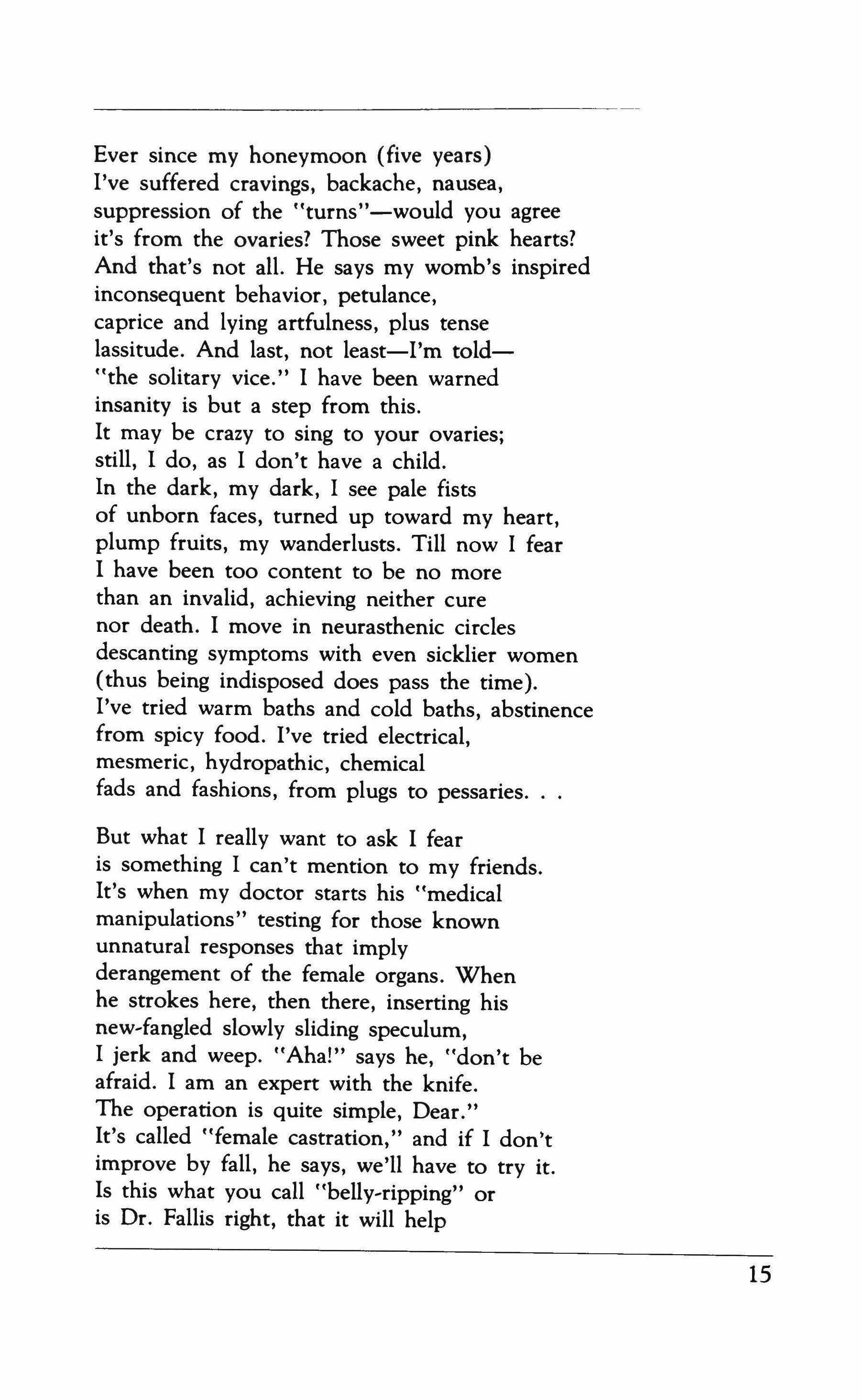
Ever since my honeymoon (five years) I've suffered cravings, backache, nausea, suppression of the "turns"-would you agree it's from the ovaries? Those sweet pink hearts? And that's not all. He says my womb's inspired inconsequent behavior, petulance, caprice and lying artfulness, plus tense lassitude. And last, not least-I'm told"the solitary vice." I have been warned insanity is but a step from this. It may be crazy to sing to your ovaries; still, I do, as I don't have a child. In the dark, my dark, I see pale fists of unborn faces, turned up toward my heart, plump fruits, my wanderlusts. Till now I fear I have been too content to be no more than an invalid, achieving neither cure nor death. I move in neurasthenic circles descanting symptoms with even sicklier women (thus being indisposed does pass the time). I've tried warm baths and cold baths, abstinence from spicy food. I've tried electrical, mesmeric, hydropathic, chemical fads and fashions, from plugs to pessaries.
But what I really want to ask I fear is something I can't mention to my friends. It's when my doctor starts his "medical manipulations" testing for those known unnatural responses that imply derangement of the female organs. When he strokes here, then there, inserting his new-fangled slowly sliding speculum, I jerk and weep. "Aha!" says he, "don't be afraid. I am an expert with the knife. The operation is quite simple, Dear." It's called "female castration," and if I don't improve by fall, he says, we'll have to try it. Is this what you call "belly-ripping" or is Dr. Fallis right, that it will help
15
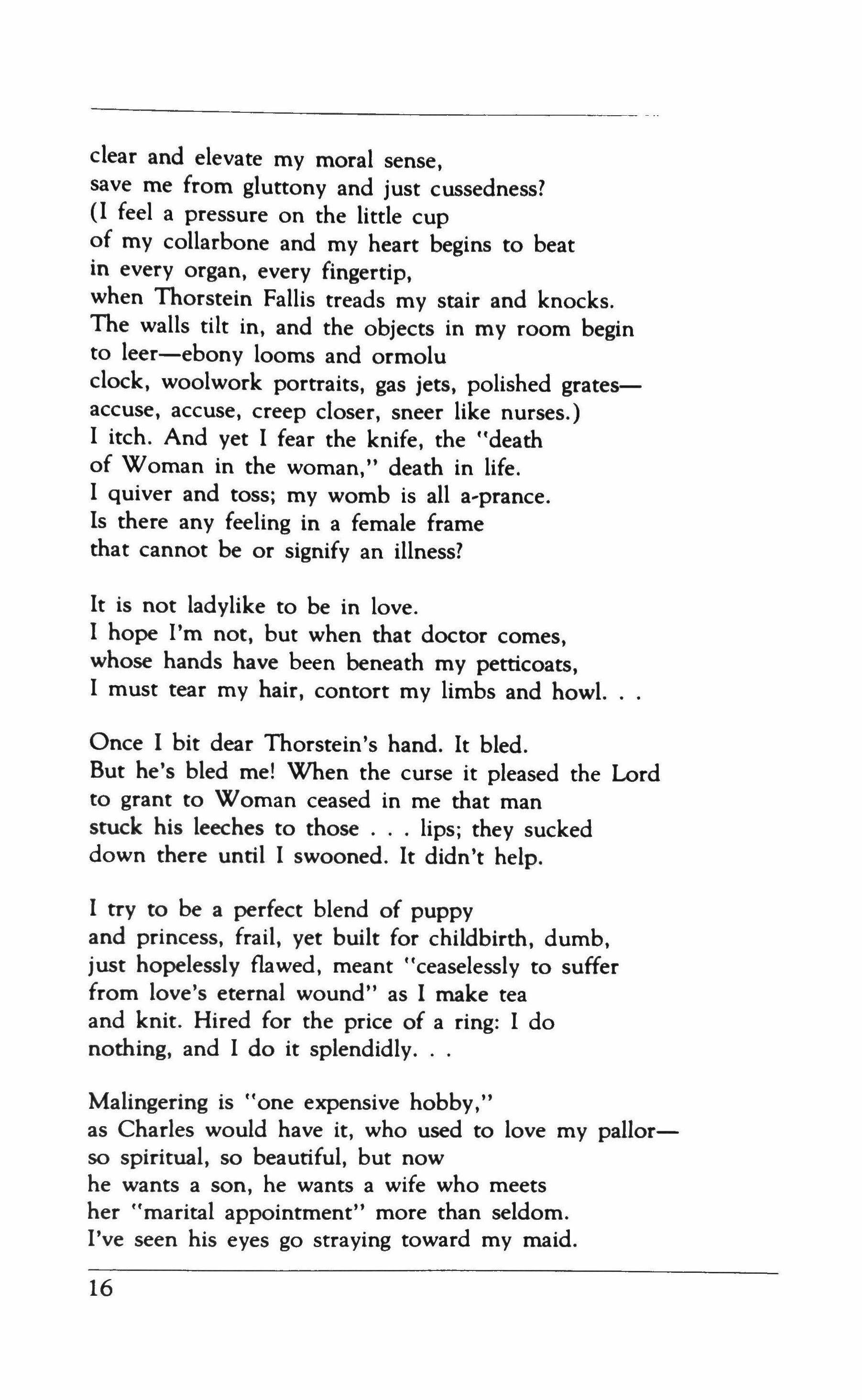
clear and elevate my moral sense, save me from gluttony and just cussedness? (l feel a pressure on the little cup of my collarbone and my heart begins to beat in every organ, every fingertip, when Thorstein Fallis treads my stair and knocks. The walls tilt in, and the objects in my room begin to leer-ebony looms and ormolu clock, woolwork portraits, gas jets, polished gratesaccuse, accuse, creep closer, sneer like nurses.) I itch. And yet I fear the knife, the "death of Woman in the woman," death in life. I quiver and toss; my womb is all a-prance. Is there any feeling in a female frame that cannot be or signify an illness?
It is not ladylike to be in love. I hope I'm not, but when that doctor comes, whose hands have been beneath my petticoats, I must tear my hair, contort my limbs and howl.
Once I bit dear Thorstein's hand. It bled. But he's bled me! When the curse it pleased the Lord to grant to Woman ceased in me that man stuck his leeches to those lips; they sucked down there until I swooned. It didn't help.
I try to be a perfect blend of puppy and princess, frail, yet built for childbirth, dumb, just hopelessly flawed, meant "ceaselessly to suffer from love's eternal wound" as I make tea and knit. Hired for the price of a ring: I do nothing, and I do it splendidly
Malingering is "one expensive hobby," as Charles would have it, who used to love my pallorso spiritual, so beautiful, but now he wants a son, he wants a wife who meets her "marital appointment" more than seldom. I've seen his eyes go straying toward my maid.
16
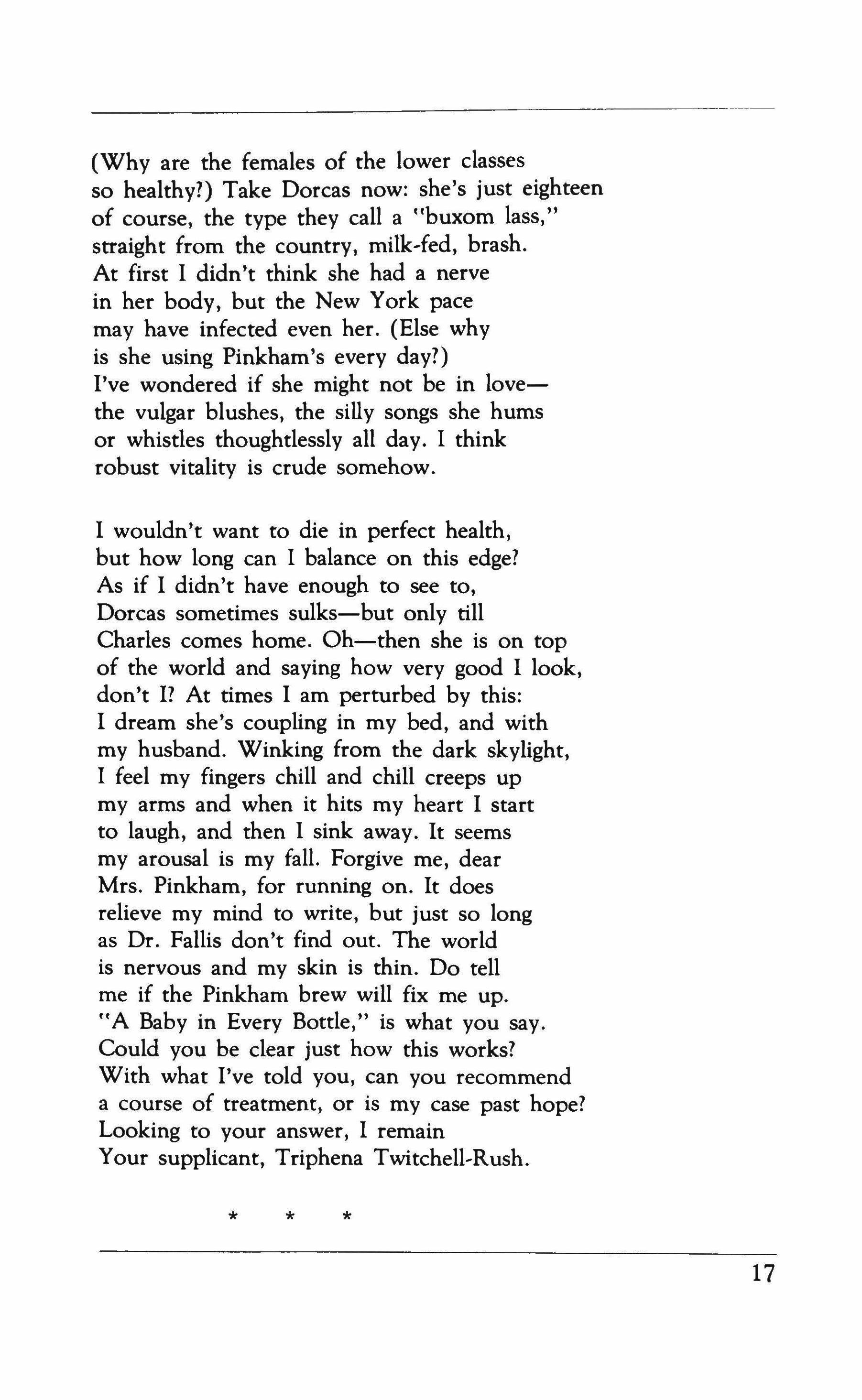
(Why are the females of the lower classes so healthy?) Take Dorcas now: she's just eighteen of course, the type they call a "buxom lass," straight from the country, milk-fed, brash. At first I didn't think she had a nerve in her body, but the New York pace may have infected even her. (Else why is she using Pinkham's every day?) I've wondered if she might not be in lovethe vulgar blushes, the silly songs she hums or whistles thoughtlessly all day. I think robust vitality is crude somehow.
I wouldn't want to die in perfect health, but how long can I balance on this edge? As if I didn't have enough to see to, Dorcas sometimes sulks-but only till Charles comes home. Oh-then she is on top of the world and saying how very good I look, don't I? At times I am perturbed by this: I dream she's coupling in my bed, and with my husband. Winking from the dark skylight, I feel my fingers chill and chill creeps up my arms and when it hits my heart I start to laugh, and then I sink away. It seems my arousal is my fall. Forgive me, dear Mrs. Pinkham, for running on. It does relieve my mind to write, but just so long as Dr. Fallis don't find out. The world is nervous and my skin is thin. Do tell me if the Pinkham brew will fix me up. "A Baby in Every Bottle," is what you say. Could you be clear just how this works? With what I've told you, can you recommend a course of treatment, or is my case past hope? Looking to your answer, I remain Your supplicant, Triphena Twitchell-Rush.
17
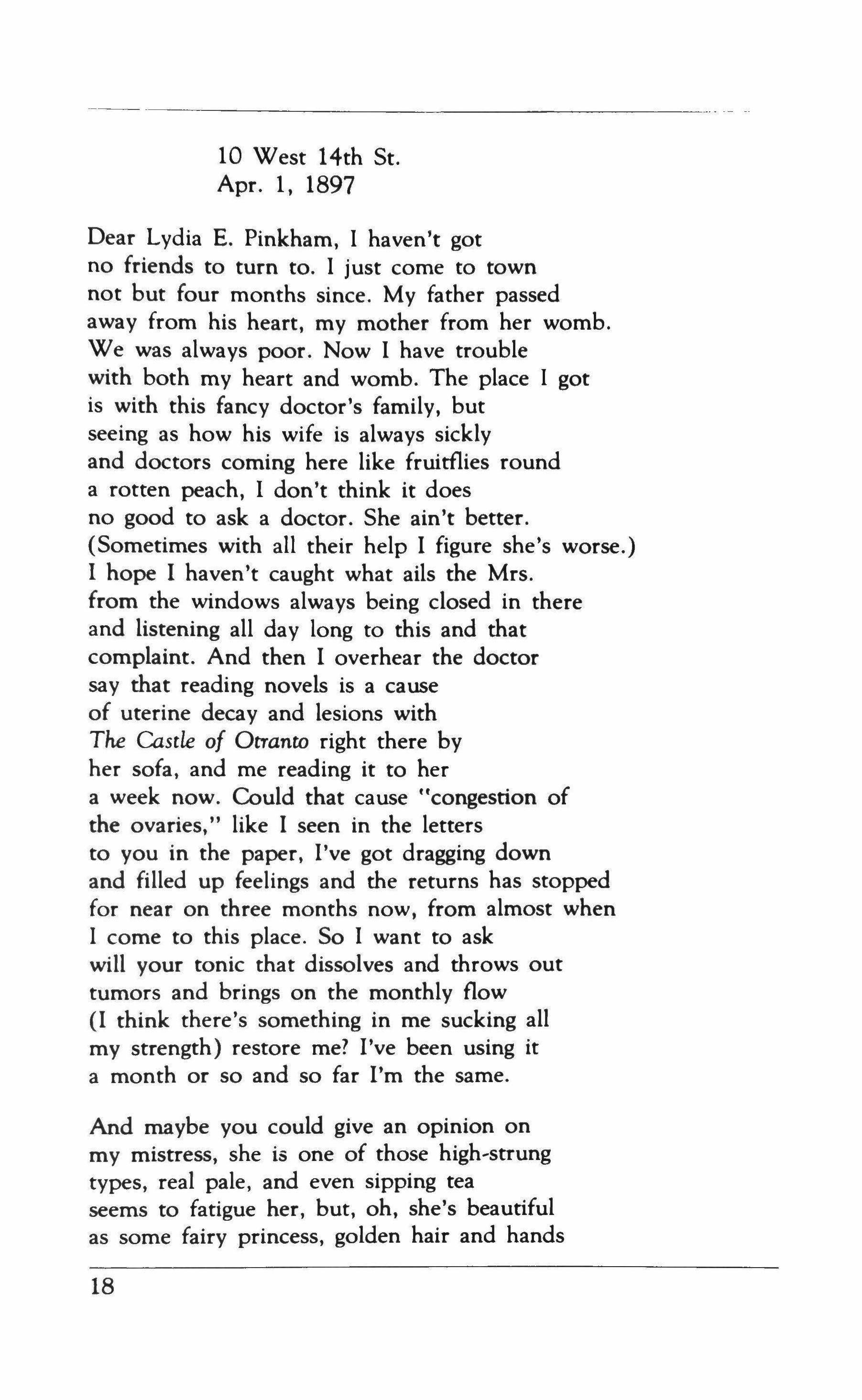
10 West 14th St. Apr. 1, 1897
Dear Lydia E. Pinkham, I haven't got no friends to turn to. I just come to town not but four months since. My father passed away from his heart, my mother from her womb. We was always poor. Now I have trouble with both my heart and womb. The place I got is with this fancy doctor's family, but seeing as how his wife is always sickly and doctors coming here like fruitflies round a rotten peach, I don't think it does no good to ask a doctor. She ain't better. (Sometimes with all their help I figure she's worse.) I hope I haven't caught what ails the Mrs. from the windows always being closed in there and listening all day long to this and that complaint. And then I overhear the doctor say that reading novels is a cause of uterine decay and lesions with The Castle of Otranto right there by her sofa, and me reading it to her a week now. Could that cause "congestion of the ovaries," like I seen in the letters to you in the paper, I've got dragging down and filled up feelings and the returns has stopped for near on three months now, from almost when I come to this place. So I want to ask will your tonic that dissolves and throws out tumors and brings on the monthly flow (I think there's something in me sucking all my strength) restore me? I've been using it a month or so and so far I'm the same.
And maybe you could give an opinion on my mistress, she is one of those high-strung types, real pale, and even sipping tea seems to fatigue her, but, oh, she's beautiful as some fairy princess, golden hair and hands
18
the light goes trembling through, but then she faints. (She never goes too far from something soft to fall on.) The other day she flipped and flopped herself around like a hooked fish and screamed what I daren't write. And then the doctor said, "We'll have to shave her head," and so she stopped. Then he whispered to me and the master, "Fear is a sedative." I wonder. I toss all night till the bed is all of a topsyturvydom, and after those nights I can't keep down no food. It's dreams: in one I saw a "female organ" blown up like a balloon and rising right into the sky; and the doctor comes with one of them pointed poles for picking up stray trash and stabs it, and gray worms rain down on me.
It's been three months since all of this began. I'd ask the master, seeing how he is a doctor, but (l don't know if I should say this part) I am afraid of him since almost the first night that I was here and he came by my room, asking for pity and I was helpless. Well, that is enough. A poor girl just can't ask that class of man even if and I don't know, this thing
What I only have to know is does your tonic clean out the womb, eventually, and soon? Should I use the Sanitive Wash and Syringe? Do you think I will "go smiling through"? I anxiously await your answer. I remain, Your Humble Servant, Dorcas Flowers.
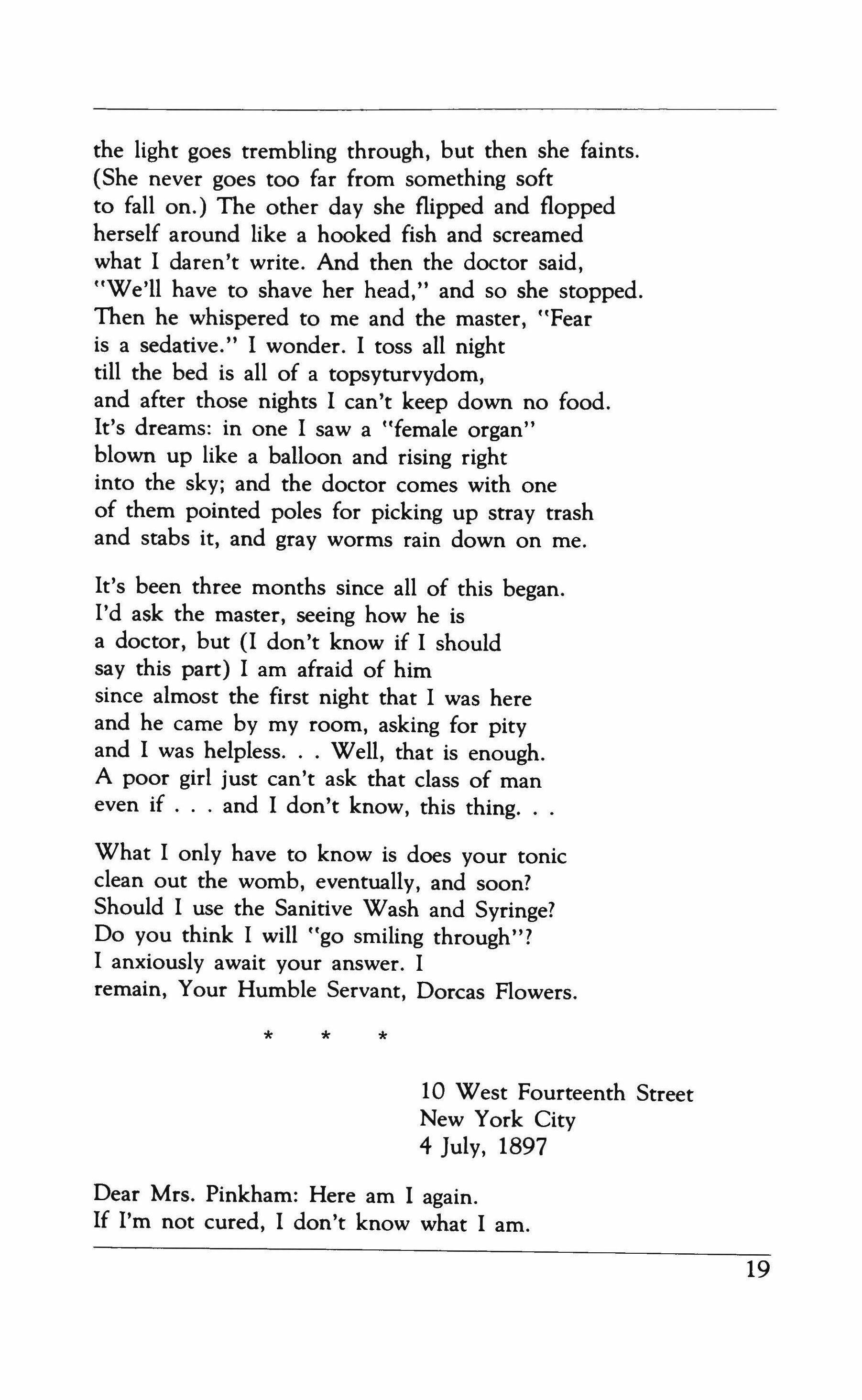
10 West Fourteenth Street
New York City 4 July, 1897
Dear Mrs. Pinkham: Here am I again. If I'm not cured, I don't know what I am.
* * *
19
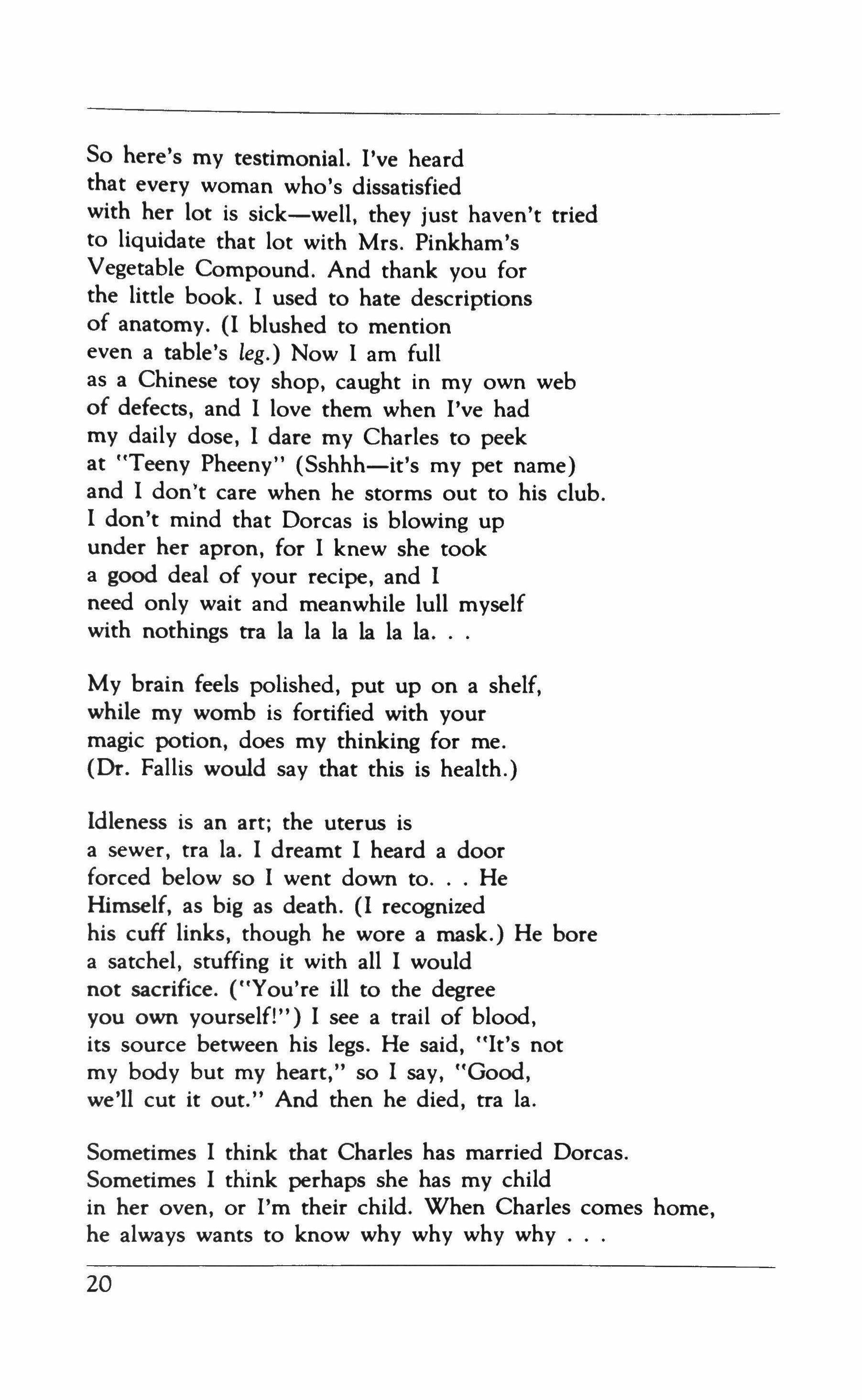
So here's my testimonial. I've heard that every woman who's dissatisfied with her lot is sick-well, they just haven't tried to liquidate that lot with Mrs. Pinkham's Vegetable Compound. And thank you for the little book. I used to hate descriptions of anatomy. (I blushed to mention even a table's leg.) Now I am full as a Chinese toy shop, caught in my own web of defects, and I love them when I've had my daily dose, I dare my Charles to peek at "Teeny Pheeny" (Sshhh-it's my pet name) and I don't care when he storms out to his club. I don't mind that Dorcas is blowing up under her apron, for I knew she took a good deal of your recipe, and I need only wait and meanwhile lull myself with nothings tra la la la la la lao
My brain feels polished, put up on a shelf, while my womb is fortified with your magic potion, does my thinking for me. (Dr. Fallis would say that this is health.)
Idleness is an art; the uterus is a sewer, tra lao I dreamt I heard a door forced below so I went down to. He Himself, as big as death. (I recognized his cuff links, though he wore a mask.) He bore a satchel, stuffing it with all I would not sacrifice. ("You're ill to the degree you own yourself!") I see a trail of blood, its source between his legs. He said, "It's not my body but my heart," so I say, "Good, we'll cut it out." And then he died, tra lao
Sometimes I think that Charles has married Dorcas. Sometimes I think perhaps she has my child in her oven, or I'm their child. When Charles comes home, he always wants to know why why why why. 20

he finds me singing softly in the closet behind the row of boots (well, that is where I keep you, Mrs. Pinkham, darling, cases).
The dark gets full of swirling colors; they take shape in a fine ballet of oozing cells; I tell myself these are the true untried ovarian forms of thought, the nerves in air ramified by my relationship to my "mother's milk." I haven't given up my life of symptomania (where is the poet of pathology? oh, yes: Mrs. Browning, healthy compared to me) nor animal economy, the commotions of my tender tubings, oval agents, woe manifold, nor infinite Fallopian.
o my. 0 you, in your black silk and white fichu, they say you are a table-rapper and a quack, those doctors! pooh! with their heroic gulping purges, blisters, laudable pus.
So I am a riddle, Terra Incognita, as far as Charles is concerned, queen of the clumsy tangle, a house within a house, an engine within an engine. La! It takes just three bottles a day to keep me going. I used to be afraid of the chloral faces in window curtains, I'd whimper down the dark keyhole, cave Now each day "Pinkham's lark" (that's what I call the winglike sweep across my brain when I'm behind the boots) brings me to my mission, to be happy with my lot. I sit and concentrate on moon and tides. My mind's a Pandora's box. Hope's the only evil left in it.
It's Independence Day, and Dorcas cares for me. Let's all be free with love and all things out of our control. I'll take as much
21
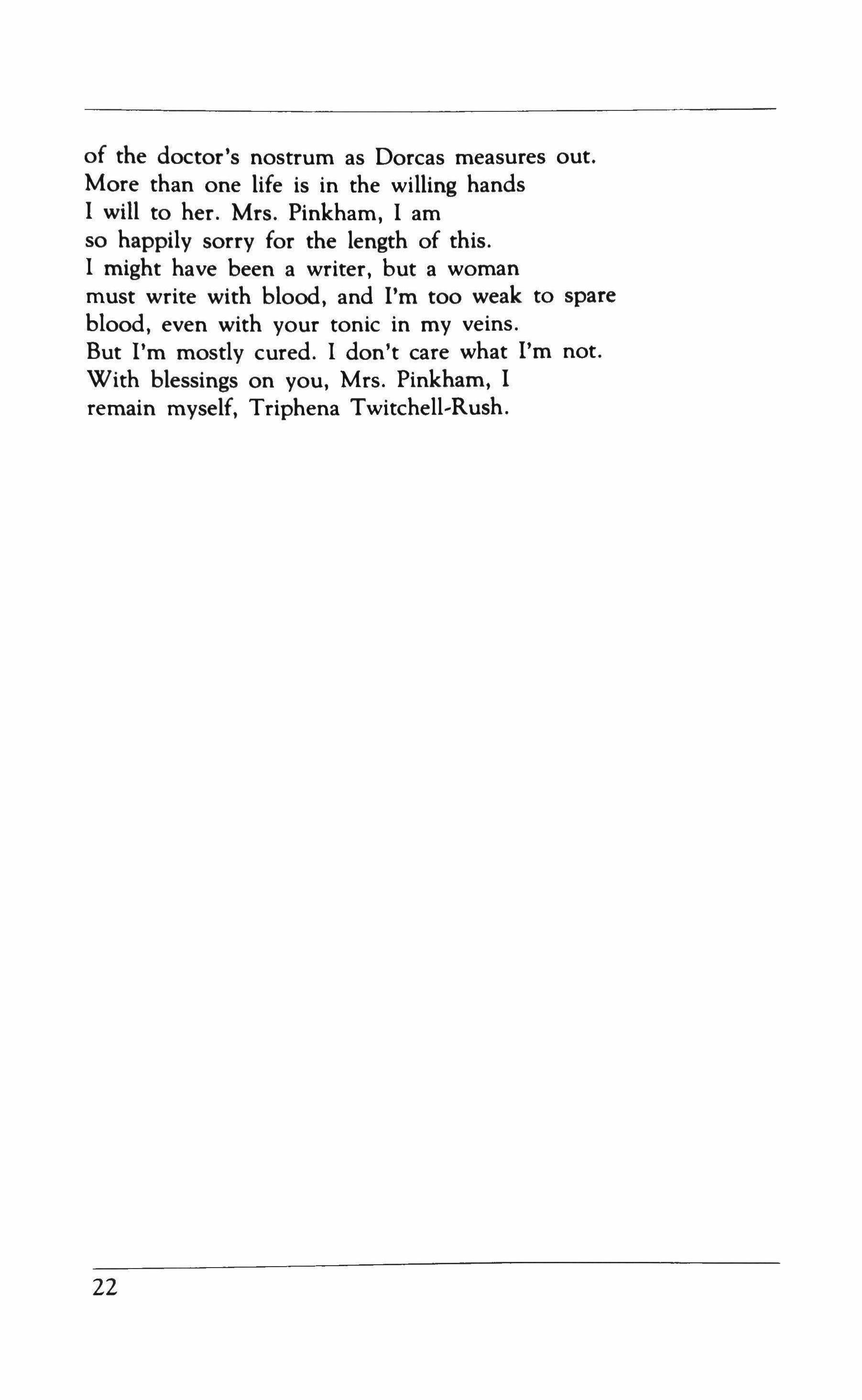
of the doctor's nostrum as Dorcas measures out. More than one life is in the willing hands I will to her. Mrs. Pinkham, I am so happily sorry for the length of this. I might have been a writer, but a woman must write with blood, and I'm too weak to spare blood, even with your tonic in my veins. But I'm mostly cured. I don't care what I'm not. With blessings on you, Mrs. Pinkham, I remain myself, Triphena Twitchell-Rush.
22
Prayer for the dying
Willis Johnson

The day Yakov Kaputin died he managed to make the nurse under, stand that he wanted to see Father Alexey. Yakov had lived in America for thirty years but he did not speak English. He scribbled a faint, wiggly number on the paper napkin on his lunch tray and pointed a long knobby finger back and forth between the napkin and his bony chest. "You want me to call, do you, dear?" the nurse asked in a loud voice that made Yakov's ears ring. Yakov could not understand what she said but he nodded, "Da."
When the telephone rang Father Alexey was just dozing off. It was July. Crickets were chirring in the long dry grass outside his window. The priest was lying in his underwear listening to a record of Broad, way show tunes on the new stereo his mother had bought him. His long beard was spread out like a little blanket on his chest. The window shade was down and a fan was softly whirring.
He thought it was the alarm clock that rang and tried to turn it off.
"Mr. Kaputin wants you to come to the hospital," the nurse said with finality, as if announcing some binding decision from above.
He did not know how long he had slept. He felt shaky and unfocused.
"I can't," he said.
"Is this the Russian priest?"
"This is Father Alexey." His voice seemed to echo far away from him. "I'm busy just now."
"Well, we're all busy, dear," the nurse said. She paused as if waiting for him to see the truth in that and do the right thing.
"What is it this time?" Father Alexey said with a sigh.
"I just came from him," the nurse began to converse chattily. ("That's better now," her tone seemed to say.) "He's a real sweet,
23
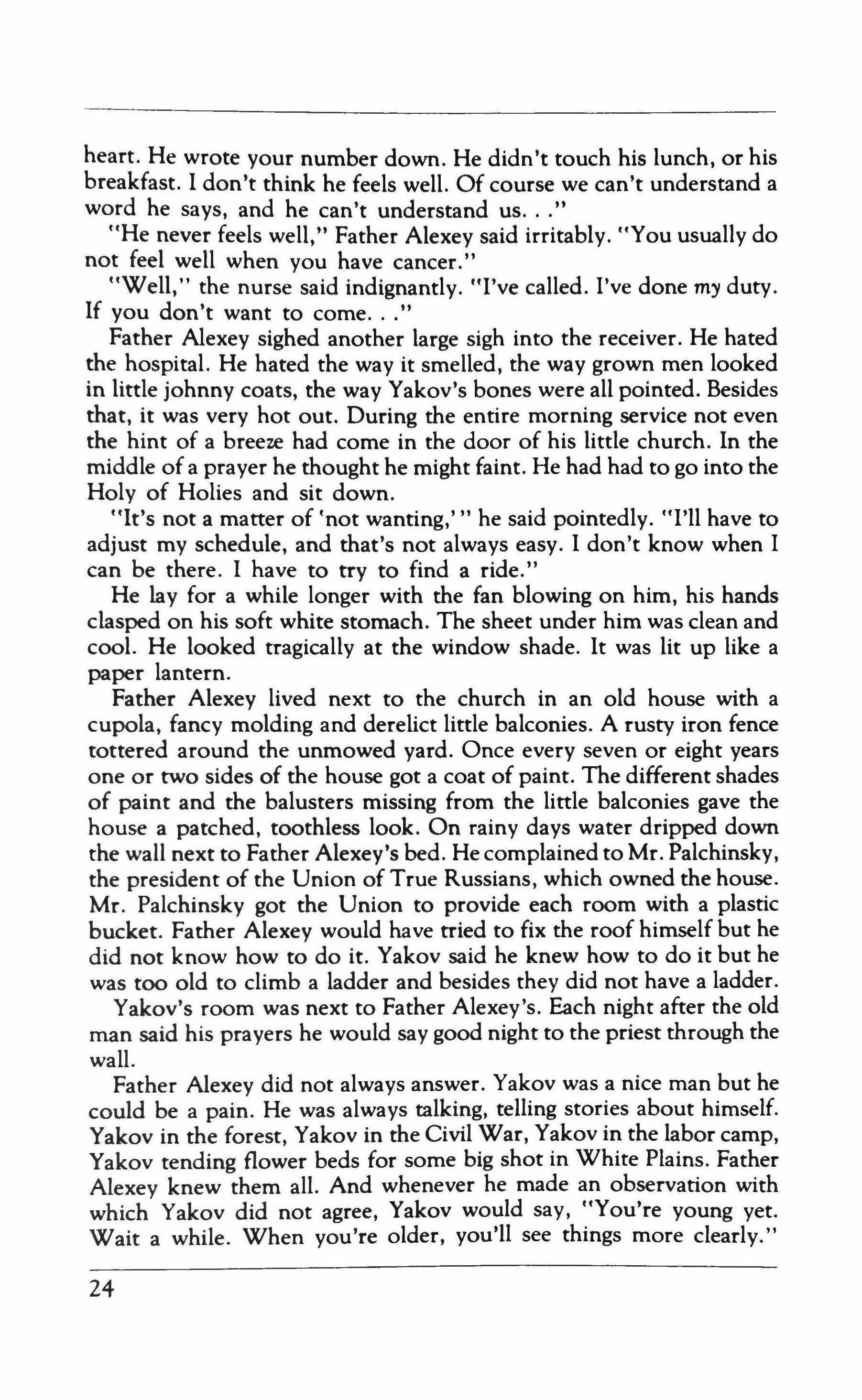
heart. He wrote your number down. He didn't touch his lunch, or his breakfast. I don't think he feels well. Of course we can't understand a word he says, and he can't understand us
"He never feels well," Father Alexey said irritably. "You usually do not feel well when you have cancer."
"Well," the nurse said indignantly. "I've called. I've done my duty. If you don't want to come
Father Alexey sighed another large sigh into the receiver. He hated the hospital. He hated the way it smelled, the way grown men looked in little johnny coats, the way Yakov's bones were all pointed. Besides that, it was very hot out. During the entire morning service not even the hint of a breeze had come in the door of his little church. In the middle of a prayer he thought he might faint. He had had to go into the Holy of Holies and sit down.
"It's not a matter of 'not wanting,'" he said pointedly. "I'll have to adjust my schedule, and that's not always easy. I don't know when I can be there. I have to try to find a ride."
He lay for a while longer with the fan blowing on him, his hands clasped on his soft white stomach. The sheet under him was clean and cool. He looked tragically at the window shade. It was lit up like a paper lantern.
Father Alexey lived next to the church in an old house with a cupola, fancy molding and derelict little balconies. A rusty iron fence tottered around the unmowed yard. Once every seven or eight years one or two sides of the house got a coat of paint. The different shades of paint and the balusters missing from the little balconies gave the house a patched, toothless look. On rainy days water dripped down the wall next to Father Alexey's bed. He complained to Mr. Palchinsky, the president of the Union of True Russians, which owned the house. Mr. Palchinsky got the Union to provide each room with a plastic bucket. Father Alexey would have tried to fix the roof himself but he did not know how to do it. Yakov said he knew how to do it but he was too old to climb a ladder and besides they did not have a ladder. Yakov's room was next to Father Alexey's. Each night after the old man said his prayers he would say good night to the priest through the wall.
Father Alexey did not always answer. Yakov was a nice man but he could be a pain. He was always talking, telling stories about himself. Yakov in the forest, Yakov in the Civil War, Yakov in the labor camp, Yakov tending flower beds for some big shot in White Plains. Father Alexey knew them all. And whenever he made an observation with which Yakov did not agree, Yakov would say, "You're young yet. Wait a while. When you're older, you'll see things more clearly."
24
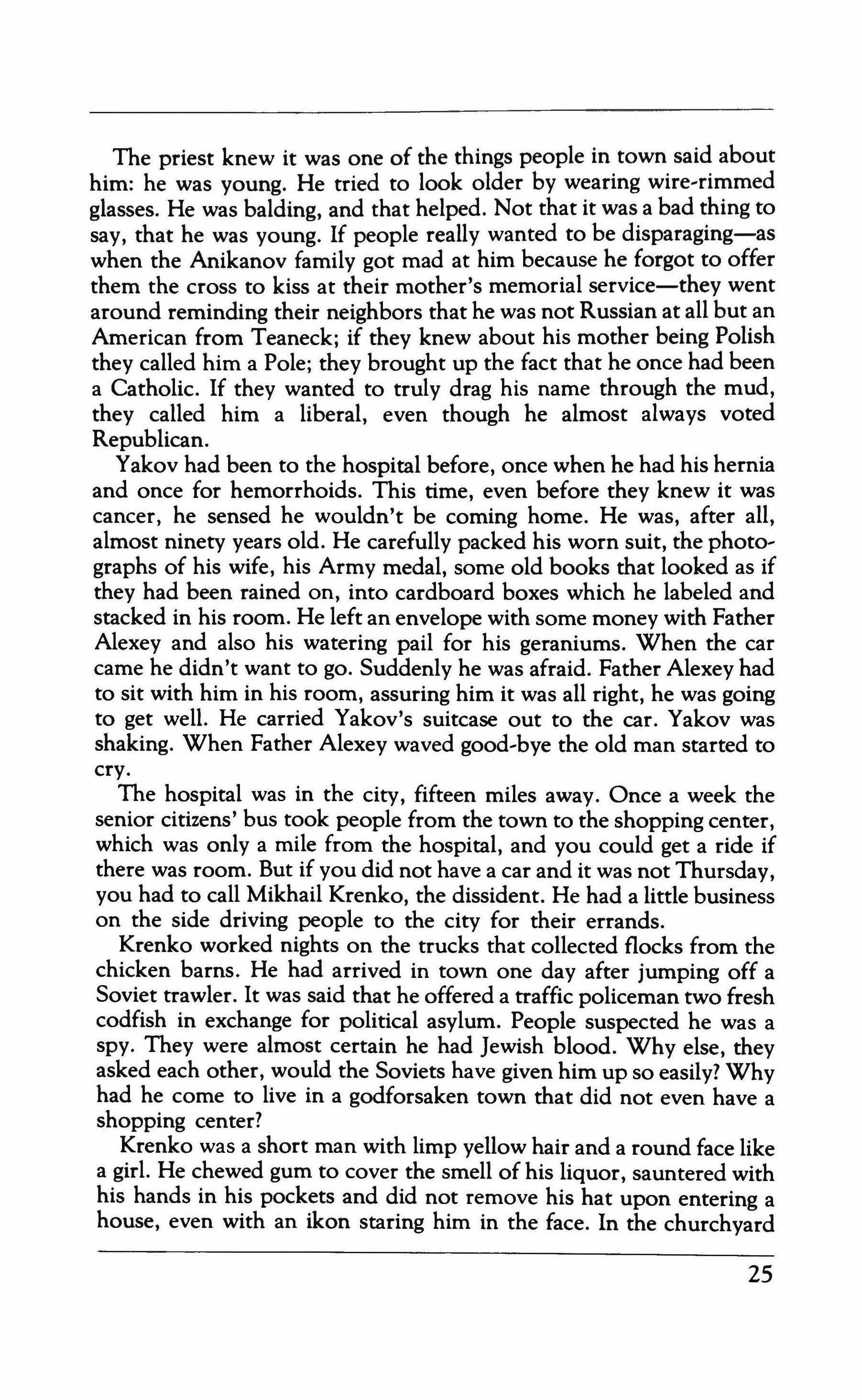
The priest knew it was one of the things people in town said about him: he was young. He tried to look older by wearing wire-rimmed glasses. He was balding, and that helped. Not that it was a bad thing to say, that he was young. If people really wanted to be disparaging-as when the Anikanov family got mad at him because he forgot to offer them the cross to kiss at their mother's memorial service-they went around reminding their neighbors that he was not Russian at all but an American from Teaneck; if they knew about his mother being Polish they called him a Pole; they brought up the fact that he once had been a Catholic. If they wanted to truly drag his name through the mud, they called him a liberal, even though he almost always voted Republican.
Yakov had been to the hospital before, once when he had his hernia and once for hemorrhoids. This time, even before they knew it was cancer, he sensed he wouldn't be coming home. He was, after all, almost ninety years old. He carefully packed his worn suit, the photo, graphs of his wife, his Army medal, some old books that looked as if they had been rained on, into cardboard boxes which he labeled and stacked in his room. He left an envelope with some money with Father Alexey and also his watering pail for his geraniums. When the car carne he didn't want to go. Suddenly he was afraid. Father Alexey had to sit with him in his room, assuring him it was all right, he was going to get well. He carried Yakov's suitcase out to the car. Yakov was shaking. When Father Alexey waved good-bye the old man started to cry.
The hospital was in the city, fifteen miles away. Once a week the senior citizens' bus took people from the town to the shopping center, which was only a mile from the hospital, and you could get a ride if there was room. But if you did not have a car and it was not Thursday, you had to call Mikhail Krenko, the dissident. He had a little business on the side driving people to the city for their errands.
Krenko worked nights on the trucks that collected flocks from the chicken barns. He had arrived in town one day after jumping off a Soviet trawler. It was said that he offered a traffic policeman two fresh codfish in exchange for political asylum. People suspected he was a spy. They were almost certain he had Jewish blood. Why else, they asked each other, would the Soviets have given him up so easily? Why had he corne to live in a godforsaken town that did not even have a shopping center?
Krenko was a short man with limp yellow hair and a round face like a girl. He chewed gum to cover the smell of his liquor, sauntered with his hands in his pockets and did not remove his hat upon entering a house, even with an ikon staring him in the face. In the churchyard
25
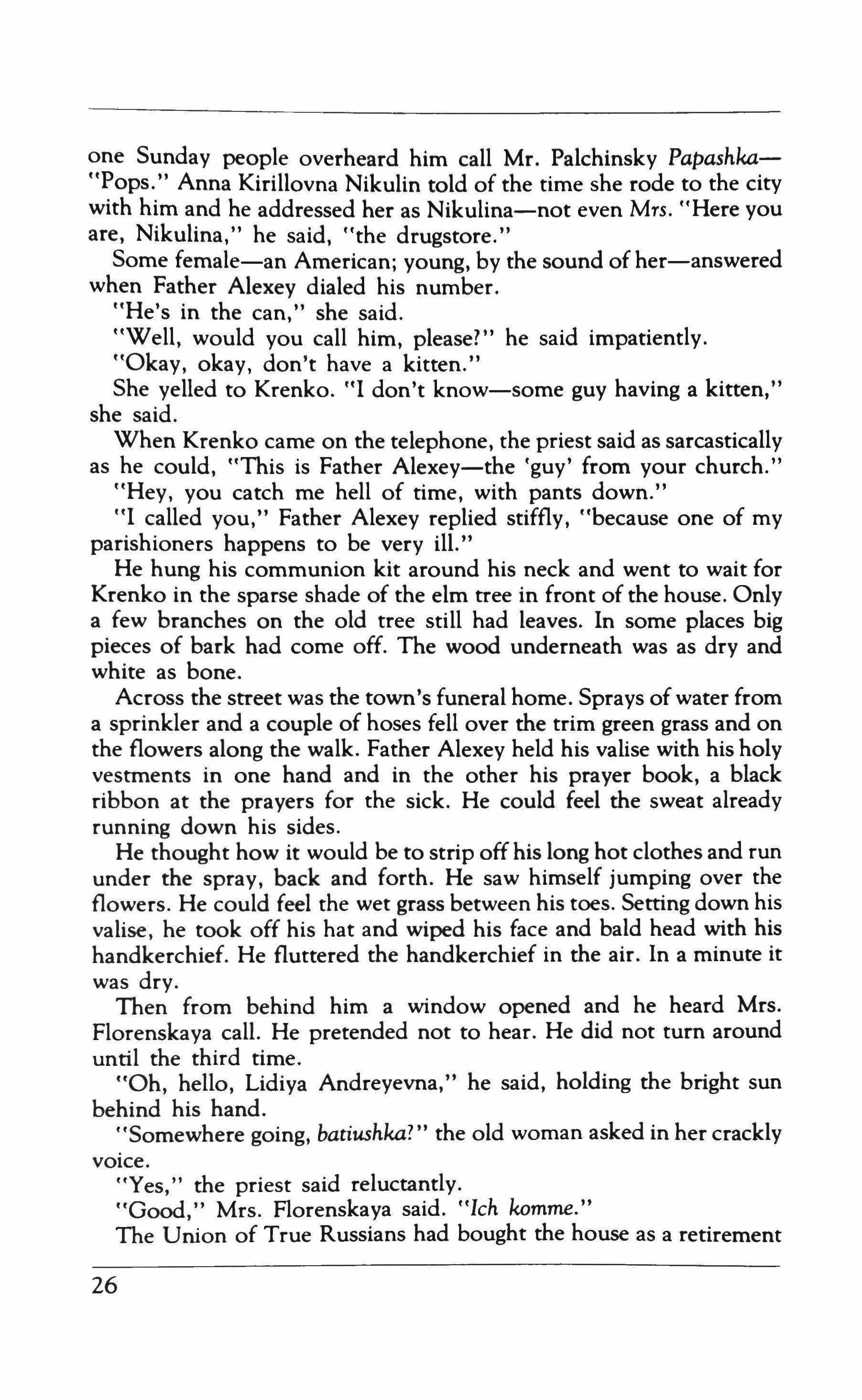
one Sunday people overheard him call Mr. Palchinsky Papashka"Pops." Anna Kirillovna Nikulin told of the time she rode to the city with him and he addressed her as Nikulina-not even Mrs. "Here you are, Nikulina," he said, "the drugstore."
Some female-an American; young, by the sound of her-answered when Father Alexey dialed his number.
"He's in the can," she said.
"Well, would you call him, please?" he said impatiently.
"Okay, okay, don't have a kitten."
She yelled to Krenko. ItI don't know-some guy having a kitten," she said.
When Krenko came on the telephone, the priest said as sarcastically as he could, "This is Father Alexey-the 'guy' from your church."
"Hey, you catch me hell of time, with pants down."
"I called you," Father Alexey replied stiffly, "because one of my parishioners happens to be very ill."
He hung his communion kit around his neck and went to wait for Krenko in the sparse shade of the elm tree in front of the house. Only a few branches on the old tree still had leaves. In some places big pieces of bark had come off. The wood underneath was as dry and white as bone.
Across the street was the town's funeral home. Sprays of water from a sprinkler and a couple of hoses fell over the trim green grass and on the flowers along the walk. Father Alexey held his valise with his holy vestments in one hand and in the other his prayer book, a black ribbon at the prayers for the sick. He could feel the sweat already running down his sides.
He thought how it would be to strip off his long hot clothes and run under the spray, back and forth. He saw himself jumping over the flowers. He could feel the wet grass between his toes. Setting down his valise, he took off his hat and wiped his face and bald head with his handkerchief. He fluttered the handkerchief in the air. In a minute it was dry.
Then from behind him a window opened and he heard Mrs. Florenskaya call. He pretended not to hear. He did not turn around until the third time.
"Oh, hello, Lidiya Andreyevna," he said, holding the bright sun behind his hand.
"Somewhere going, batiushka?" the old woman asked in her crackly voice.
"Yes," the priest said reluctantly.
"Good," Mrs. Florenskaya said. "Icb: komme."
The Union of True Russians had bought the house as a retirement
26

horne (it had been a fine, sturdy house, the horne of a sea captain; the church next door had been the stable for his carriage horses) and at one time all the rooms and flats had been occupied. Everyone was gone now, dead or moved away-mostly dead. The whole parish had grown older all at once, it seemed. Now with Yakov in the hospital, Father Alexey was alone in the old house with Mrs. Florenskaya. Every day she shuffled up and down the empty, echoing hallway in her worn slippers and Father Alexey would hear her crying. In nice weather she cried out on the porch. The first time he heard her-it was shortly after he had arrived to take over the parish a year ago (his predecessor, Father Dmitri, had started to drink and was transferred back to New York)-Father Alexey had run upstairs to see what was wrong. Mrs. Florenskaya listened to his beginner's Russian with a happy expression on her face, as if he were trying to entertain her. Then she had replied in a mixture of English and German, although he didn't know any German, that a bandit was stealing spoons from her drawer.
He no longer asked.
After a minute the front door opened and the little woman carne spryly down the stairs carrying a cane which she did not seem to need. A paper shopping bag and an old brown purse hung from one arm. She was wearing a kerchief and a winter coat.
uWhere going Sie, little father?" She carne into the shade and smiled up at him.
When he told her about Yakov, she sighed heavily. "Old people just closing eyes," she said. Her chin started to wobble.
"Aren't you hot in that coat, Lidiya Andreyevna?" he asked.
She pulled a wadded tissue out of her pocket. USie young man, Sie can arbeiten. I am old." She wiped her nose, then lifted her chin in the air. "I arbeiten in Chicago," she said proudly. UIn fine hotel."
Father Alexey looked down the empty street.
"He's late," he said.
"[a," the old woman said emphatically, as if he had confirmed all she had said. "Many zimmer taken care of; wash, clean, making beds."
A short distance from where they stood the road dropped steeply to the river. Father Alexey could see the far bank and the dark pines of the forest beyond. The sky was blue and still. The leaves were motion, less on the trees, as if they were resting in the heat. Above the brow of the hill, Father Alexey saw two heads appear then slowly rise like two plants pushing up into the sun. The heads were followed by two bodies, one long, one square. They carne up over the hill and carne slowly in the heat toward the priest and Mrs. Florenskaya. They were dressed for the city, the woman in a dress with flowers, the man in a
27
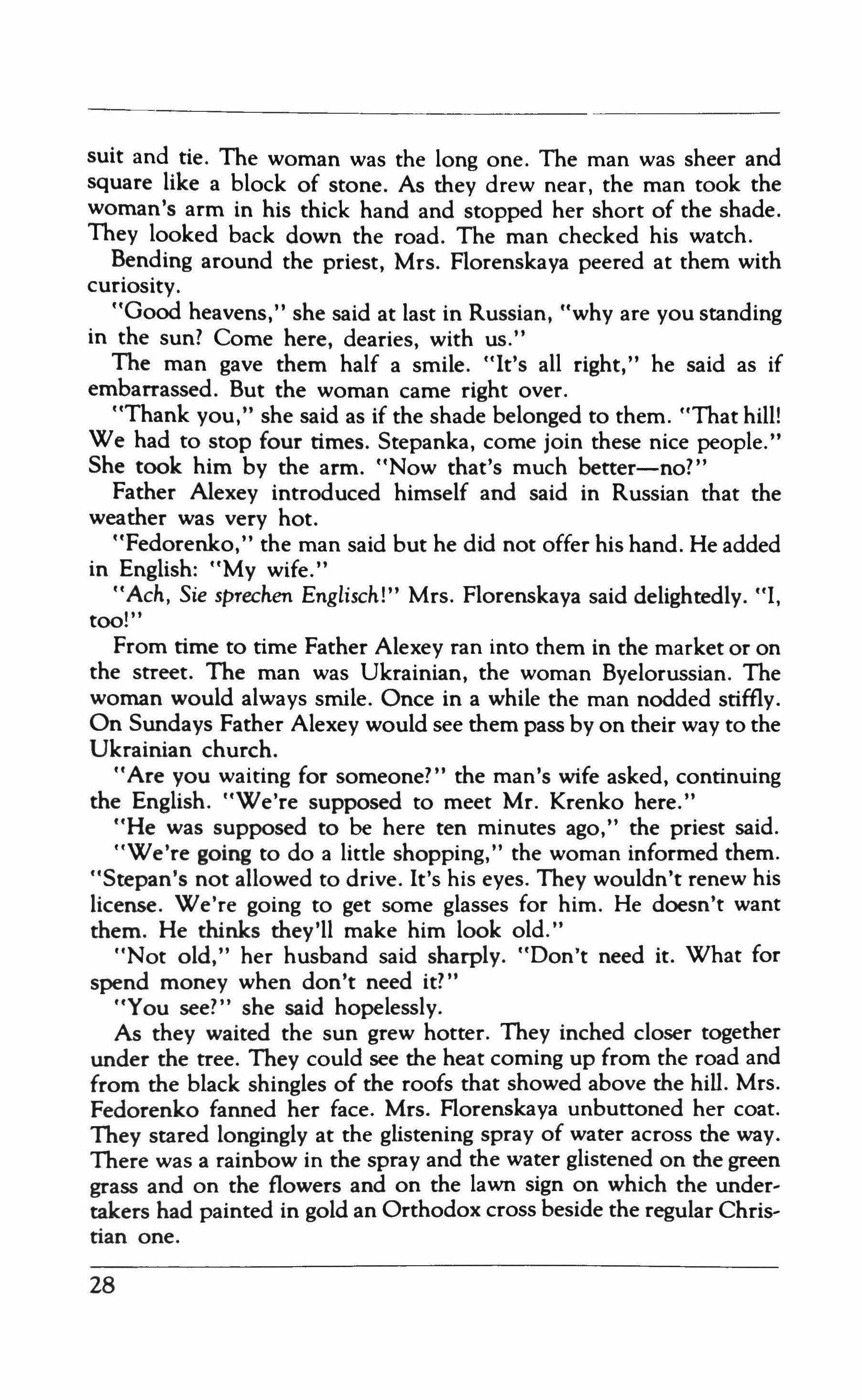
suit and tie. The woman was the long one. The man was sheer and square like a block of stone. As they drew near, the man took the woman's arm in his thick hand and stopped her short of the shade. They looked back down the road. The man checked his watch.
Bending around the priest, Mrs. Aorenskaya peered at them with curiosity.
"Good heavens," she said at last in Russian, "why are you standing in the sun? Come here, dearies, with us."
The man gave them half a smile. "It's all right," he said as if embarrassed. But the woman came right over.
"Thank you," she said as if the shade belonged to them. "That hill! We had to stop four times. Stepanka, come join these nice people." She took him by the arm. "Now that's much better-no?"
Father Alexey introduced himself and said in Russian that the weather was very hot.
"Fedorenko," the man said but he did not offer his hand. He added in English: "My wife."
"Ach, Sie sprechen Englisch!" Mrs. Aorenskaya said delightedly. "I, too!"
From time to time Father Alexey ran into them in the market or on the street. The man was Ukrainian, the woman Byelorussian. The woman would always smile. Once in a while the man nodded stiffly. On Sundays Father Alexey would see them pass by on their way to the Ukrainian church.
"Are you waiting for someone?" the man's wife asked, continuing the English. "We're supposed to meet Mr. Krenko here."
"He was supposed to be here ten minutes ago," the priest said. "We're going to do a little shopping," the woman informed them. "Stepan's not allowed to drive. It's his eyes. They wouldn't renew his license. We're going to get some glasses for him. He doesn't want them. He thinks they'll make him look old."
"Not old," her husband said sharply. "Don't need it. What for spend money when don't need it?"
"You see?" she said hopelessly.
As they waited the sun grew hotter. They inched closer together under the tree. They could see the heat coming up from the road and from the black shingles of the roofs that showed above the hill. Mrs. Fedorenko fanned her face. Mrs. Florenskava unbuttoned her coat. They stared longingly at the glistening spray of water across the way. There was a rainbow in the spray and the water glistened on the green grass and on the flowers and on the lawn sign on which the undertakers had painted in gold an Orthodox cross beside the regular Christian one.
28

Finally they heard an engine straining. Up over the hill through the waves of heat came Krenko's car. It was a big car, several years old, all fenders and chrome. Upon reaching level ground it seemed to sigh. It came up to them panting.
Krenko pushed open the front door.
"You're late," Father Alexey told him. With a look of distaste, he set his valise with his holy vestments on Krenko's zebra-skin seat. Mr. and Mrs. Fedorenko climbed into the back, followed by Mrs. Florenskaya, who nudged Mr. Fedorenko into the middle with her bony hip.
"Where is she going?" Krenko said.
"Ask her," the priest shrugged.
"Where you going, lady?"
"Never mind," Mrs. Florenskaya said.
"Not free, you know. Cost you money."
"[a. Everything all time is money."
"Ten dollars," Krenko said.
"Ja, ja."
ttyou have?"
Mrs. Florenskaya took a rag of a bill out of her pocketbook and waved it angrily under Krenko's nose. She put it back and snapped her purse. "Everything is money," she said. Tears suddenly rolled out from under her eyeglasses.
"Crazy old woman," Krenko muttered.
"May we go?" Father Alexey said.
They drove around the block onto the main street of the town. On the street was the market, the bank, the hardware store, the laundromat, the boarding house where old people who did not belong to the Union of True Russians lived, and a variety store where they sold pizzas. Part way down the hill Krenko stopped and blew the horn.
"Another passenger, I presume?" Father Alexey said.
"Make it when sun is shining," Krenko winked.
From a door marked "Private" stepped Marietta Valentinova, the famous ballerina who lived over the hardware store. A white cap with green plastic visor kept the sun from her small severe face. Krenko got out and opened the front door, giving her a mock bow, which she ignored.
She had been at the St. Vladimir's Day service that morning at Father Alexey's church. Several members of the parish were named Vladimir, so there had been a good attendance in spite of the heat, more than a dozen. St. Olga's Day a few days earlier had not been nearly so successful, but then there was only one Olga in town, and she was sick and couldn't come. Marietta Valentinova had stood in
29
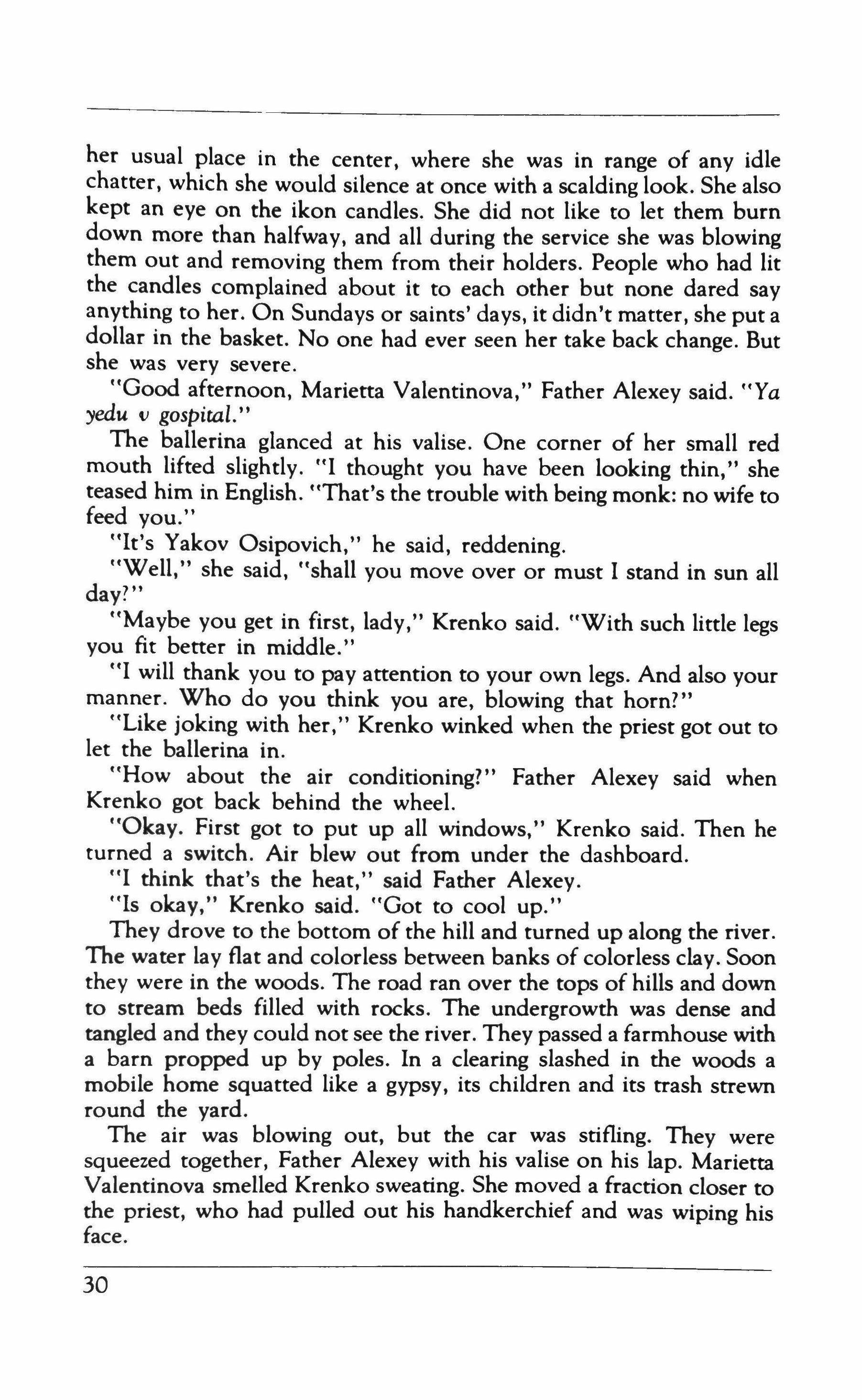
her usual place in the center, where she was in range of any idle chatter, which she would silence at once with a scalding look. She also kept an eye on the ikon candles. She did not like to let them burn down more than halfway, and all during the service she was blowing them out and removing them from their holders. People who had lit the candles complained about it to each other but none dared say anything to her. On Sundays or saints' days, it didn't matter, she put a dollar in the basket. No one had ever seen her take back change. But she was very severe.
"Good afternoon, Marietta Valentinova," Father Alexey said. "Ya yedu v gospical."
The ballerina glanced at his valise. One corner of her small red mouth lifted slightly. "I thought you have been looking thin," she teased him in English. "That's the trouble with being monk: no wife to feed you."
"It's Yakov Osipovich," he said, reddening.
"Well," she said, "shall you move over or must I stand in sun all day?"
"Maybe you get in first, lady," Krenko said. "With such little legs you fit better in middle."
"I will thank you to pay attention to your own legs. And also your manner. Who do you think you are, blowing that horn?"
"Like joking with her," Krenko winked when the priest got out to let the ballerina in.
"How about the air conditioning?" Father Alexey said when Krenko got back behind the wheel.
"Okay. First got to put up all windows," Krenko said. Then he turned a switch. Air blew out from under the dashboard.
"I think that's the heat," said Father Alexey. "Is okay," Krenko said. "Got to cool up."
They drove to the bottom of the hill and turned up along the river. The water lay flat and colorless between banks of colorless clay. Soon they were in the woods. The road ran over the tops of hills and down to stream beds filled with rocks. The undergrowth was dense and tangled and they could not see the river. They passed a farmhouse with a barn propped up by poles. In a clearing slashed in the woods a mobile home squatted like a gypsy, its children and its trash strewn round the yard.
The air was blowing out, but the car was stifling. They were squeezed together, Father Alexey with his valise on his lap. Marietta Valentinova smelled Krenko sweating. She moved a fraction closer to the priest, who had pulled out his handkerchief and was wiping his face.
30
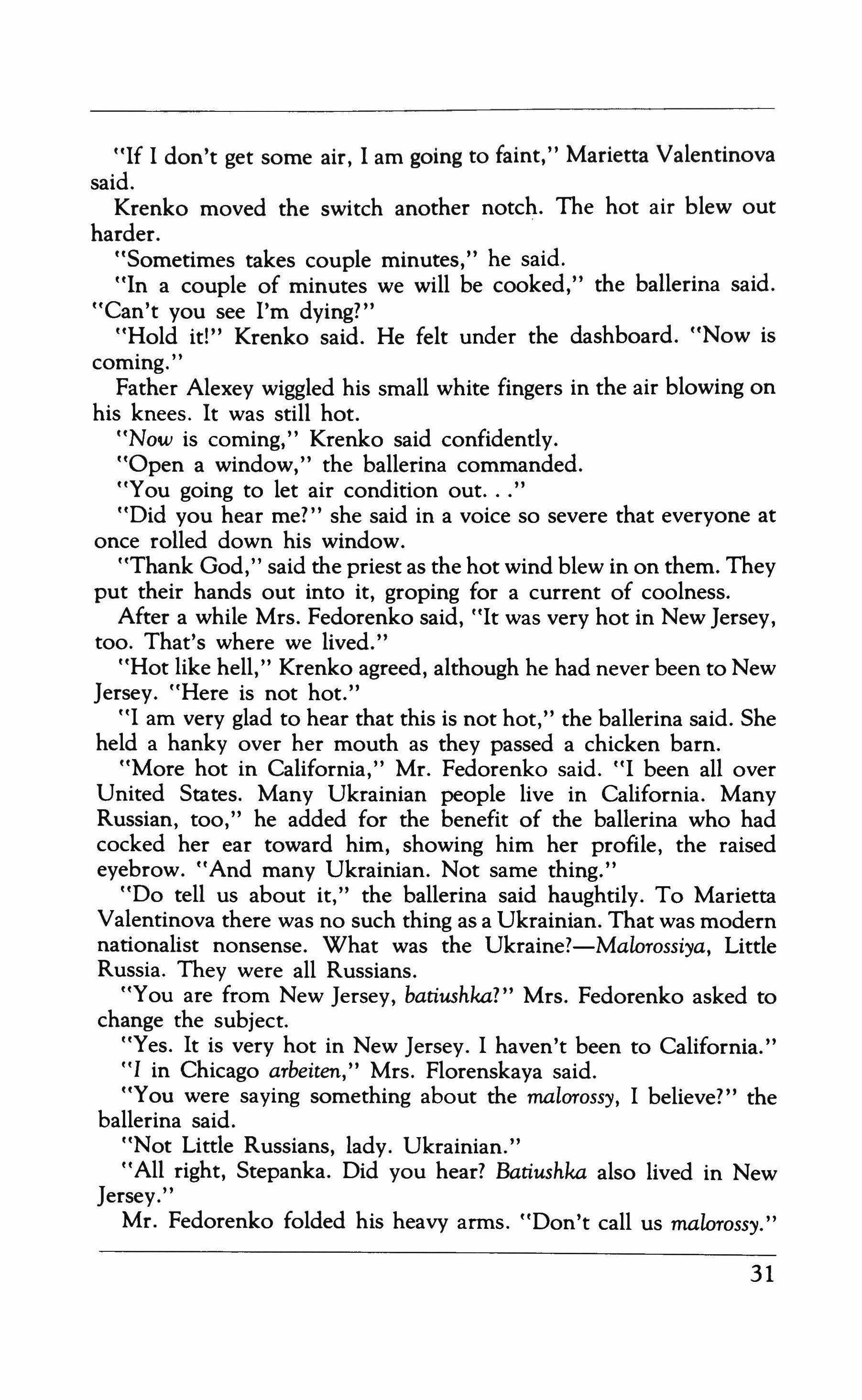
"If I don't get some air, I am going to faint," Marietta Valentinova said.
Krenko moved the switch another notch. The hot air blew out harder.
"Sometimes takes couple minutes," he said.
"In a couple of minutes we will be cooked," the ballerina said. "Can't you see I'm dying?"
"Hold it!" Krenko said. He felt under the dashboard. "Now is coming."
Father Alexey wiggled his small white fingers in the air blowing on his knees. It was still hot.
"Now is coming," Krenko said confidently.
"Open a window," the ballerina commanded.
ttyou going to let air condition out "
"Did you hear me?" she said in a voice so severe that everyone at once rolled down his window.
"Thank God," said the priest as the hot wind blew in on them. They put their hands out into it, groping for a current of coolness.
After a while Mrs. Fedorenko said, "It was very hot in New Jersey, too. That's where we lived."
"Hot like hell," Krenko agreed, although he had never been to New Jersey. "Here is not hot."
"I am very glad to hear that this is not hot," the ballerina said. She held a hanky over her mouth as they passed a chicken barn.
"More hot in California," Mr. Fedorenko said. "I been all over United States. Many Ukrainian people live in California. Many Russian, too," he added for the benefit of the ballerina who had cocked her ear toward him, showing him her profile, the raised eyebrow. "And many Ukrainian. Not same thing."
"Do tell us about it," the ballerina said haughtily. To Marietta Valentinova there was no such thing as a Ukrainian. That was modern nationalist nonsense. What was the Ukraine?-Malorossiya, Little Russia. They were all Russians.
"You are from New Jersey, batiushka?" Mrs. Fedorenko asked to change the subject.
"Yes. It is very hot in New Jersey. I haven't been to California."
"I in Chicago arbeiten," Mrs. Florenskaya said.
"You were saying something about the malorossy, I believe?" the ballerina said.
"Not Little Russians, lady. Ukrainian."
"All right, Stepanka. Did you hear? Batiushka also lived in New Jersey."
Mr. Fedorenko folded his heavy arms. "Don't call us malorossy."
31

"I don't call you anything," the ballerina smiled coldly. "No?" Mr. Fedorenko pushed forward his big chin. "What are you calling ten million Ukrainians? The ones Russia starved?"
"If you are speaking of the Soviet Union, I'll thank you not to call it Russia," the ballerina said. "I even hate to say that word-c-soeier."
"Okay," Krenko said, "long time ago-okay?"
"I have a question," Father Alexey said. flyou, too," said Mr. Fedorenko accusingly. His face was very red.
"Me too, what?"
"Stepanka," Mrs. Fedorenko implored.
"I see you Four July parade. See you turn away when Ukrainian club marching. You don't remember, huh?"
"I didn't turn away. "
"I wouldn't blame you if you did," the ballerina said. "I certainly would."
"I didn't."
"That's enough, Stepanka."
"Maybe I just looked somewhere else," the priest said. "There is a big difference between looking somewhere else at a given moment and turning away."
"Of course there is," Mrs. Fedorenko assured him.
"I know how is seeing," her husband said.
"All right, Stepanka. What were you going to ask before, batiushka? You had a question."
"I don't know," the priest said dejectedly. After a moment he said, "I guess I was going to ask why everyone is speaking English."
"You're absolutely right," Mrs. Fedorenko said. "You need to learn." And then she said something in Russian, or Ukrainian, or Byelorussian, which Father Alexey did not quite catch. In the conversation that followed, he heard many words he knew but there were many words in between-they spoke so quickly-which he could not understand.
Then there was silence.
He looked around and saw the others looking at him.
"Nul" the ballerina said.
"Shto?" he asked.
"Shto ti dumayesh?"
"Shto?"
"Heavens, my dear Father Alexey," the ballerina changed to English. "We are talking about poor Mr. Kaputin. Haven't you been listening?
"Of course I've been listening."
"Well, then?"
32
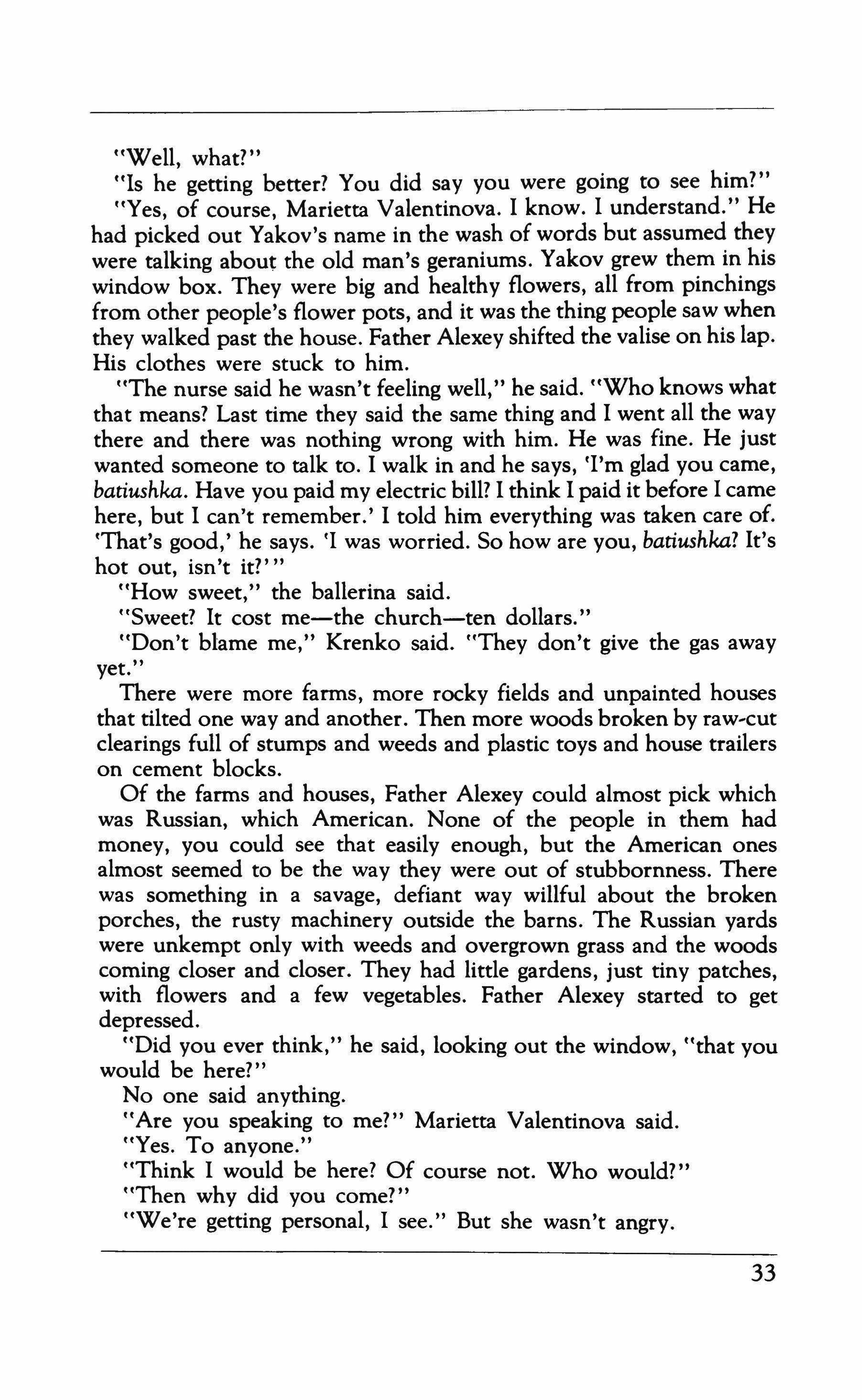
"Well, what?"
"Is he getting better? You did say you were going to see him?"
"Yes, of course, Marietta Valentinova. I know. I understand." He had picked out Yakov's name in the wash of words but assumed they were talking about the old man's geraniums. Yakov grew them in his window box. They were big and healthy flowers, all from pinchings from other people's flower pots, and it was the thing people saw when they walked past the house. Father Alexey shifted the valise on his lap. His clothes were stuck to him.
"The nurse said he wasn't feeling well," he said. "Who knows what that means? Last time they said the same thing and I went all the way there and there was nothing wrong with him. He was fine. He just wanted someone to talk to. I walk in and he says, 'I'm glad you came, batiushka. Have you paid my electric bill? I think I paid it before I came here, but I can't remember.' I told him everything was taken care of. 'That's good,' he says. '1 was worried. So how are you, batiushka? It's hot out, isn't it?'"
"How sweet," the ballerina said.
"Sweet? It cost me-the church-ten dollars."
"Don't blame me," Krenko said. "They don't give the gas away yet."
There were more farms, more rocky fields and unpainted houses that tilted one way and another. Then more woods broken by raw-cut clearings full of stumps and weeds and plastic toys and house trailers on cement blocks.
Of the farms and houses, Father Alexey could almost pick which was Russian, which American. None of the people in them had money, you could see that easily enough, but the American ones almost seemed to be the way they were out of stubbornness. There was something in a savage, defiant way willful about the broken porches, the rusty machinery outside the barns. The Russian yards were unkempt only with weeds and overgrown grass and the woods coming closer and closer. They had little gardens, just tiny patches, with flowers and a few vegetables. Father Alexey started to get depressed.
"Did you ever think," he said, looking out the window, "that you would be here?"
No one said anything.
"Are you speaking to me?" Marietta Valentinova said.
"Yes. To anyone."
"Think I would be here? Of course not. Who would?"
"Then why did you come?"
"We're getting personal, 1 see." But she wasn't angry.
33
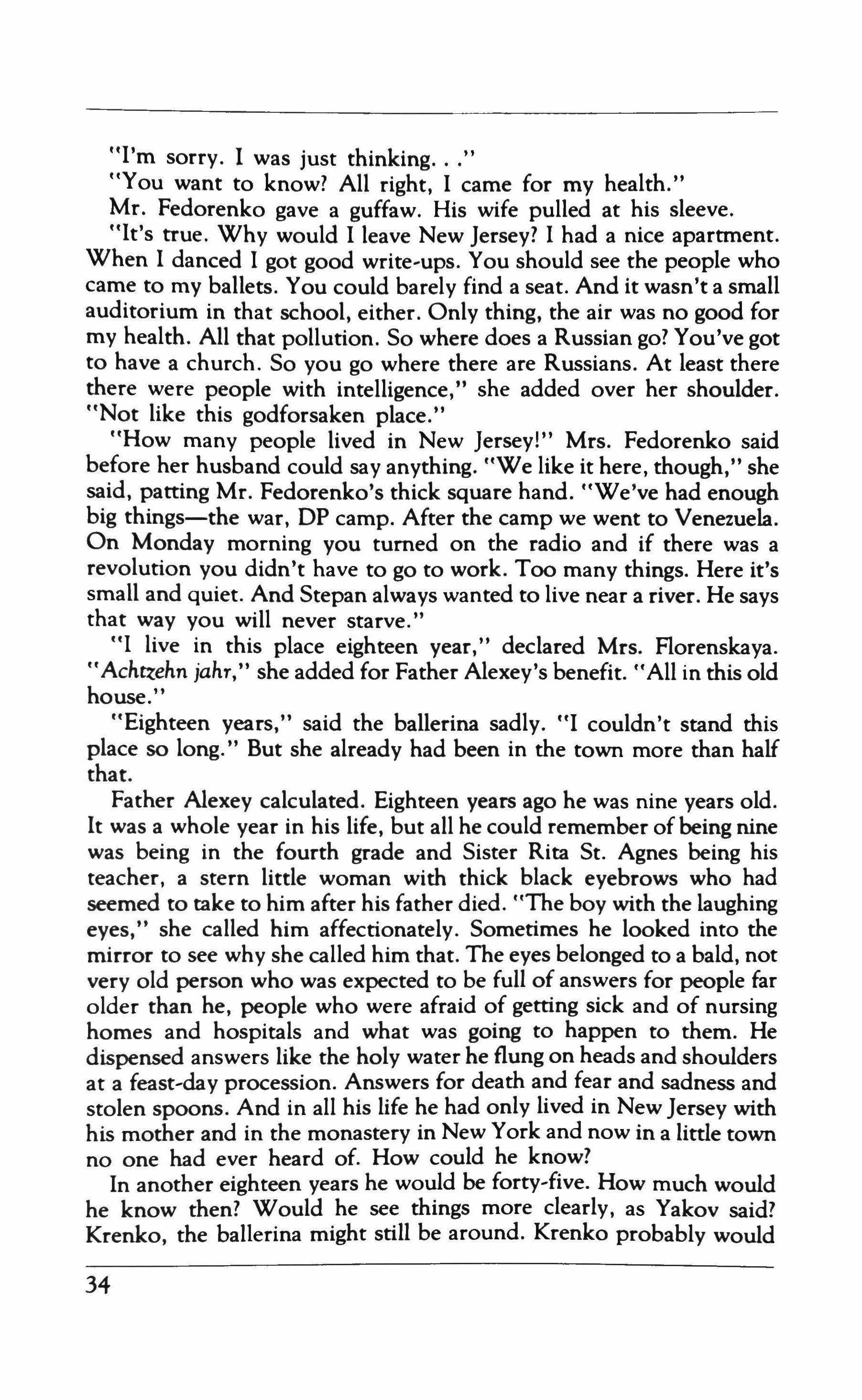
"I'm sorry. I was just thinking "You want to know? All right, I came for my health."
Mr. Fedorenko gave a guffaw. His wife pulled at his sleeve.
"It's true. Why would I leave New Jersey? I had a nice apartment. When I danced I got good write-ups. You should see the people who came to my ballets. You could barely find a seat. And it wasn't a small auditorium in that school, either. Only thing, the air was no good for my health. All that pollution. So where does a Russian go? You've got to have a church. So you go where there are Russians. At least there there were people with intelligence," she added over her shoulder. "Not like this godforsaken place."
"How many people lived in New Jersey!" Mrs. Fedorenko said before her husband could say anything. "We like it here, though," she said, patting Mr. Fedorenko's thick square hand. "We've had enough big things-the war, DP camp. After the camp we went to Venezuela. On Monday morning you turned on the radio and if there was a revolution you didn't have to go to work. Too many things. Here it's small and quiet. And Stepan always wanted to live near a river. He says that way you will never starve."
"I live in this place eighteen year," declared Mrs. Aorenskaya. "Achtzehn jahT," she added for Father Alexey's benefit. "All in this old house."
"Eighteen years," said the ballerina sadly. "I couldn't stand this place so long." But she already had been in the town more than half that.
Father Alexey calculated. Eighteen years ago he was nine years old. It was a whole year in his life, but all he could remember of being nine was being in the fourth grade and Sister Rita St. Agnes being his teacher, a stern little woman with thick black eyebrows who had seemed to take to him after his father died. "The boy with the laughing eyes," she called him affectionately. Sometimes he looked into the mirror to see why she called him that. The eyes belonged to a bald, not very old person who was expected to be full of answers for people far older than he, people who were afraid of getting sick and of nursing homes and hospitals and what was going to happen to them. He dispensed answers like the holy water he flung on heads and shoulders at a feast-day procession. Answers for death and fear and sadness and stolen spoons. And in all his life he had only lived in New Jersey with his mother and in the monastery in New York and now in a little town no one had ever heard of. How could he know?
In another eighteen years he would be forty-five. How much would he know then? Would he see things more clearly, as Yakov said? Krenko, the ballerina might still be around. Krenko probably would
34
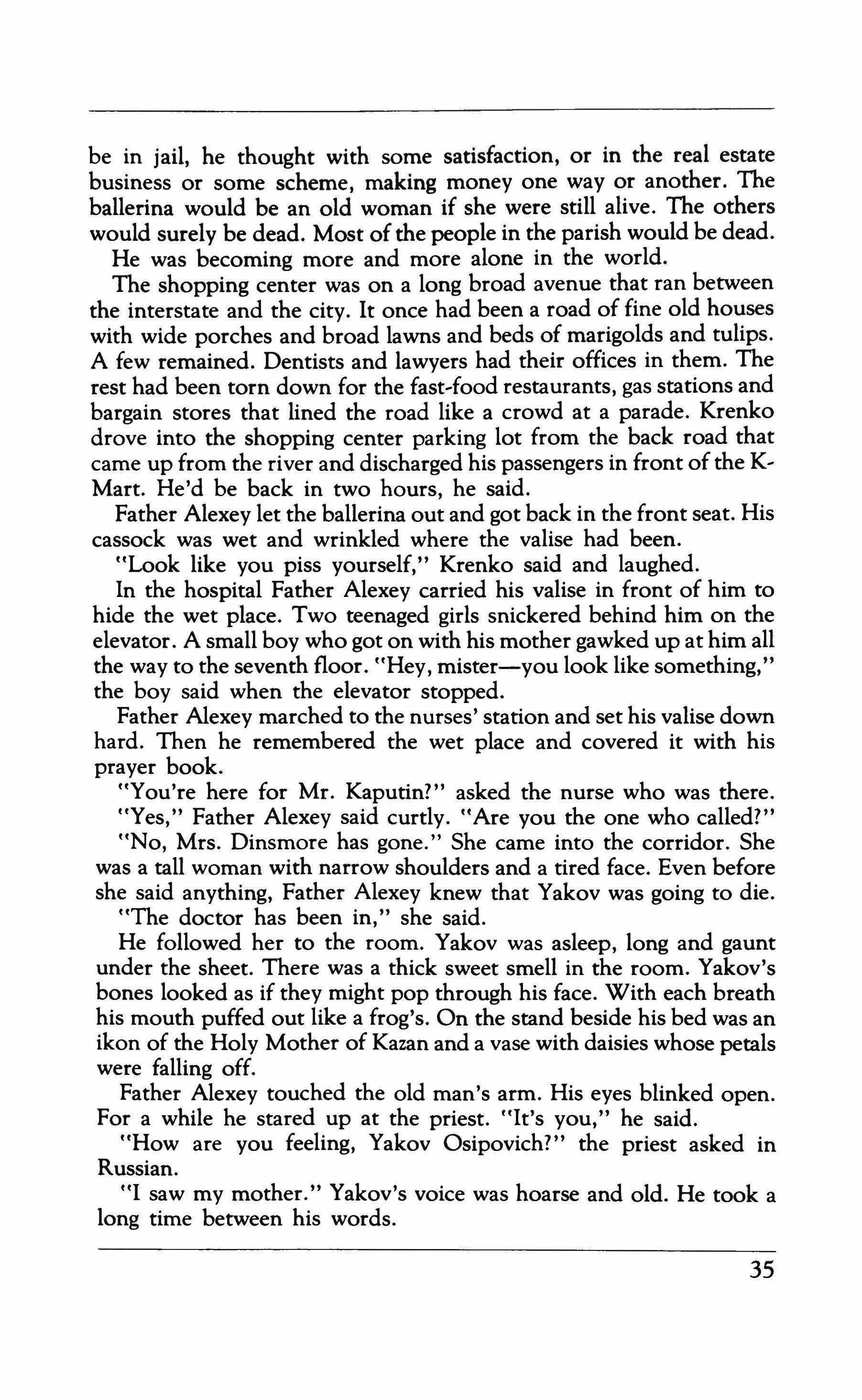
be in jail, he thought with some satisfaction, or in the real estate business or some scheme, making money one way or another. The ballerina would be an old woman if she were still alive. The others would surely be dead. Most of the people in the parish would be dead. He was becoming more and more alone in the world.
The shopping center was on a long broad avenue that ran between the interstate and the city. It once had been a road of fine old houses with wide porches and broad lawns and beds of marigolds and tulips. A few remained. Dentists and lawyers had their offices in them. The rest had been torn down for the fast-food restaurants, gas stations and bargain stores that lined the road like a crowd at a parade. Krenko drove into the shopping center parking lot from the back road that came up from the river and discharged his passengers in front of the K, Mart. He'd be back in two hours, he said.
Father Alexey let the ballerina out and got back in the front seat. His cassock was wet and wrinkled where the valise had been.
"Look like you piss yourself," Krenko said and laughed.
In the hospital Father Alexey carried his valise in front of him to hide the wet place. Two teenaged girls snickered behind him on the elevator. A small boy who got on with his mother gawked up at him all the way to the seventh floor. "Hey, mister-you look like something," the boy said when the elevator stopped.
Father Alexey marched to the nurses' station and set his valise down hard. Then he remembered the wet place and covered it with his prayer book.
"You're here for Mr. Kaputin?" asked the nurse who was there. "Yes," Father Alexey said curtly. "Are you the one who called?"
"No, Mrs. Dinsmore has gone." She came into the corridor. She was a tall woman with narrow shoulders and a tired face. Even before she said anything, Father Alexey knew that Yakov was going to die.
"The doctor has been in," she said.
He followed her to the room. Yakov was asleep, long and gaunt under the sheet. There was a thick sweet smell in the room. Yakov's bones looked as if they might pop through his face. With each breath his mouth puffed out like a frog's. On the stand beside his bed was an ikon of the Holy Mother of Kazan and a vase with daisies whose petals were falling off.
Father Alexey touched the old man's arm. His eyes blinked open. For a while he stared up at the priest. "It's you," he said.
"How are you feeling, Yakov Osipovich?" the priest asked in Russian.
"I saw my mother." Yakov's voice was hoarse and old. He took a long time between his words.
35
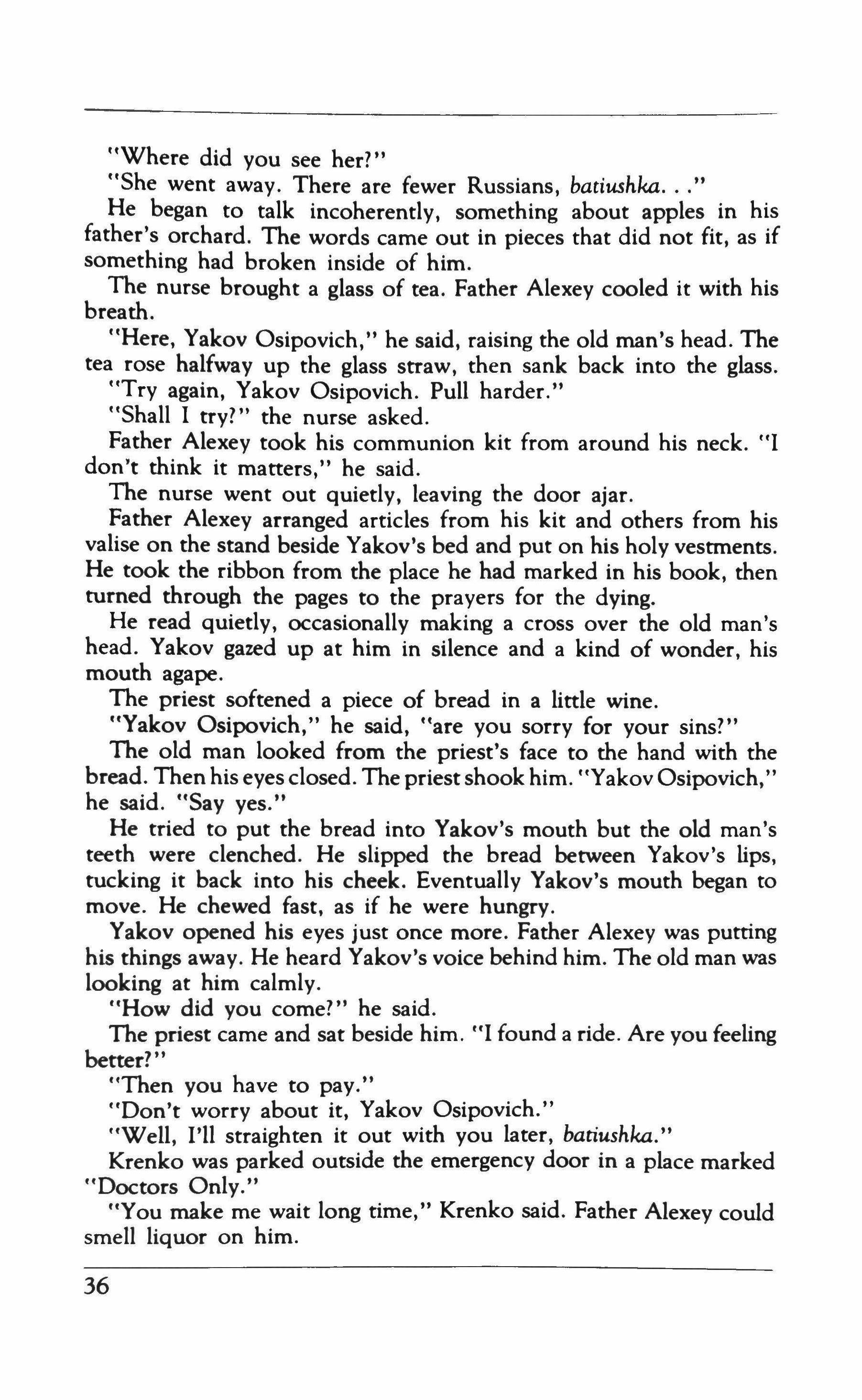
"Where did you see her?"
"She went away. There are fewer Russians, batiushka
He began to talk incoherently, something about apples in his father's orchard. The words came out in pieces that did not fit, as if something had broken inside of him.
The nurse brought a glass of tea. Father Alexey cooled it with his breath.
"Here, Yakov Osipovich," he said, raising the old man's head. The tea rose halfway up the glass straw, then sank back into the glass.
"Try again, Yakov Osipovich. Pull harder."
"Shall 1 try?" the nurse asked.
Father Alexey took his communion kit from around his neck. "I don't think it matters," he said.
The nurse went out quietly, leaving the door ajar.
Father Alexey arranged articles from his kit and others from his valise on the stand beside Yakov's bed and put on his holy vestments. He took the ribbon from the place he had marked in his book, then turned through the pages to the prayers for the dying.
He read quietly, occasionally making a cross over the old man's head. Yakov gazed up at him in silence and a kind of wonder, his mouth agape.
The priest softened a piece of bread in a little wine.
"Yakov Osipovich," he said, "are you sorry for your sins?"
The old man looked from the priest's face to the hand with the bread. Then his eyes closed. The priest shook him. "Yakov Osipovich," he said. "Say yes."
He tried to put the bread into Yakov's mouth but the old man's teeth were clenched. He slipped the bread between Yakov's lips, tucking it back into his cheek. Eventually Yakov's mouth began to move. He chewed fast, as if he were hungry.
Yakov opened his eyes just once more. Father Alexey was putting his things away. He heard Yakov's voice behind him. The old man was looking at him calmly.
"How did you come?" he said.
The priest came and sat beside him. "I found a ride. Are you feeling better?"
"Then you have to pay."
"Don't worry about it, Yakov Osipovich."
"Well, I'll straighten it out with you later, batiushka."
Krenko was parked outside the emergency door in a place marked "Doctors Only."
"You make me wait long time," Krenko said. Father Alexey could smell liquor on him.
36
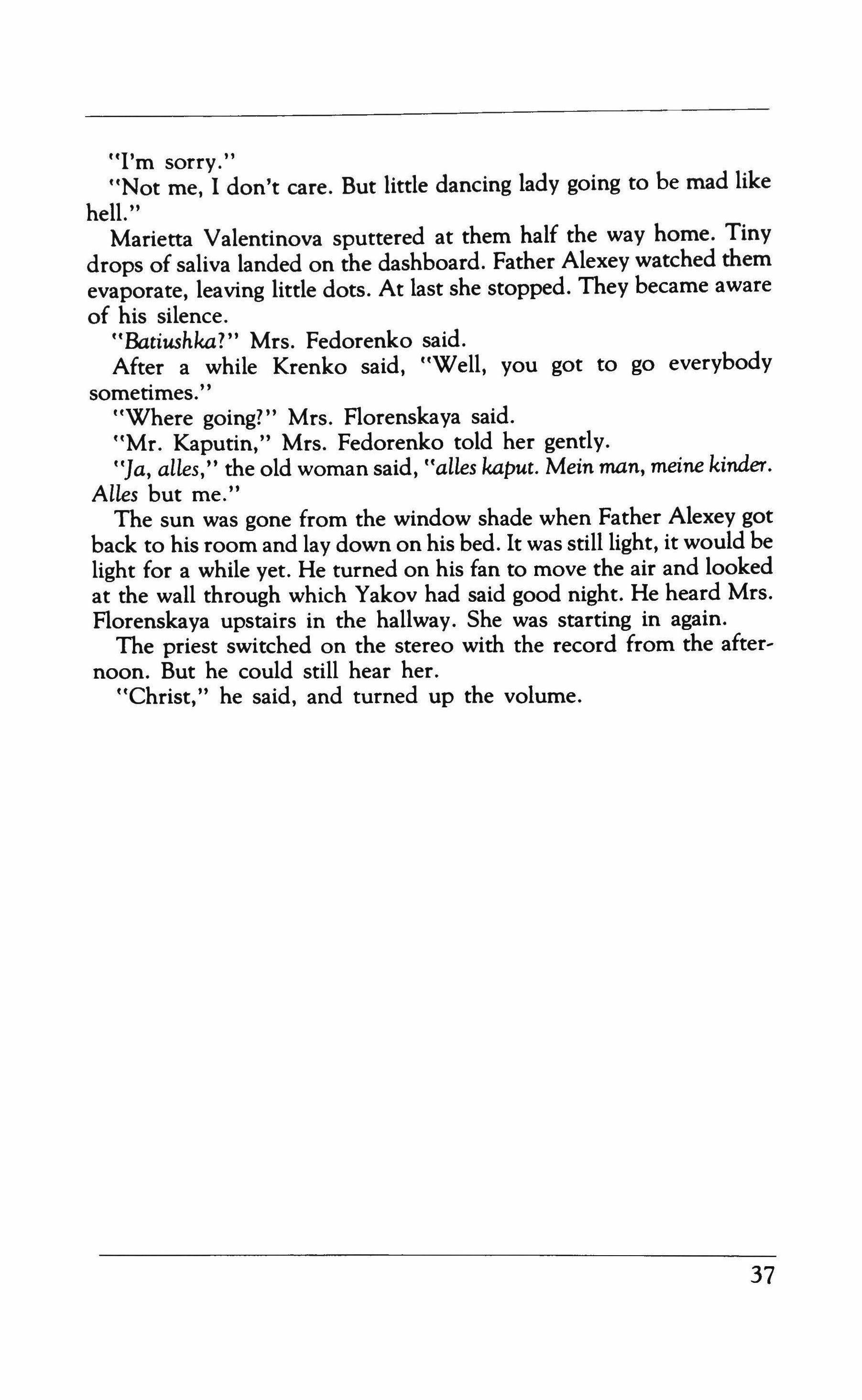
"I'm sorry."
"Not me, I don't care. But little dancing lady going to be mad like hell."
Marietta Valentinova sputtered at them half the way home. Tiny drops of saliva landed on the dashboard. Father Alexey watched them evaporate, leaving little dots. At last she stopped. They became aware of his silence.
"Batiushka?" Mrs. Fedorenko said.
After a while Krenko said, "Well, you got to go everybody sometimes.
"Where going?" Mrs. Florenskaya said.
"Mr. Kaputin," Mrs. Fedorenko told her gently.
"la, alles," the old woman said, "alles kaput. Mein man, meine kinder. Alles but me."
The sun was gone from the window shade when Father Alexey got back to his room and lay down on his bed. It was still light, it would be light for a while yet. He turned on his fan to move the air and looked at the wall through which Yakov had said good night. He heard Mrs. Florenskaya upstairs in the hallway. She was starting in again. The priest switched on the stereo with the record from the afternoon. But he could still hear her.
"Christ," he said, and turned up the volume.
37
Three prose pieces
Stephen Berg

IN A NEW LEAF
Three weeks before he died, my father acted as an extra in A New Leaf, a movie about an alcoholic, her lover, and a stranger who showed up and would, as it happened, try to save her. Cassavetes and May were making the film in Philly on 13th Street, using a defunct hotel, renamed The Royal, for the battles between the fucked-up couple. Night after night the crew would take their places-at the camera, yelling directions, searching for extras in the crowds that lined up six deep around the roped-off set and watched Peter Falk (the stranger) fifty times do a scene in which he's passing The Royal on his way somewhere and a whiskey bottle flies out a window and hits the ground at his feet and he looks up, sees someone (the woman, I think) in the window and dashes (there'S a scream) into the dark building. It seems the woman and her lover (Cassavetes) are holed-up there, planning a robbery. Falk is tanned, dressed in a custom-cut Navy-blue silk suit and delicate black shoes, Italian style, the kind tap dancers use because of their flexibility, their near-weightlessness. In and out, in and out he goes, bottle after bottle arcing from the window, the pieces swept away each time by one of the crew, and none of the fans and gawkers really knows what's up with the three characters. It was like watching real life, it doesn't matter whose life, with one big difference: that scene lost all meaning because it was repeated so many times. We watched for hours this same scene being reshot, in early June. It was beginning to get hot the way it does in Philly-thick heavy humidity blanking your mind, hanging on for days so every little thing feels difficult, so everything looks like it has dirt on it. My father had had a massive, fifth heart attack and when we picked him up at his house he was wearing a raincoat with a full button-in camel's-hair liner, and under it a suit, tie and scarf. A gray felt hat and gray doeskin gloves lent the finishing touches. His face was the color of those gloves, but
38

with a dull shine like solder or like those skies you get in Philly before a rain when blossoming puffs of air cool your face but it stays hot and the sun has disappeared and everything is drained of strong color. Well, he walked shuffling one foot at a time very very slowly, stopping between each step, as if on a tightrope, almost floating, with great caution and weakness and fear, to the car. Settled in the front seat, he barely spoke. We heard the movie was being made, thought it would be fun to watch the production, a rare distraction from all he had gone through. We drove the few blocks to the place, parked, walked over to the people at the ropes circling The Royal, and faded into the crowd. My Dad, for some reason of his own, drifted to another side of the crowd and stood there. Everything on the street was blue-white under the lights; the mist of humidity in the glare made everything look as if a fine pearly veil hung between you and whatever you saw. Once in a while I'd glance over to see how he was. Inch by inch he had slipped back from the back of the mob until now he was standing right up front pressing against the waist-high rope. He was all gray: raincoat, gloves, hat, face. Except for his Watch,plaid cashmere scarf. He looked like an ailing Mafia don: expressionless terrified mask of a face, a man with secrets and power who refused the world any hint of emotion that might reveal who he was. Was his mind silent as he stood there or did he hear one of those primitive, sourceless, pure, self, defining voices that haunt us, left over from the gods, telling him not to smile, not to speak, not to show anything to the enemy world, telling him to be no one as the line between death and the future evaporated and he slipped closer to the gods by obeying them, by adopting the hero's impassive mask? The fact is he looked like Edward G. Robinson, not Oedipus or Lear immortalized in the revelatory aftermath of cosmic self-discovery. Reticent, masochistic, mildly depressed all his life, he stood there, to me awesome and godlike because of his ordeal near death. "He'll never walk out of the hospital," the doctor had said, and here, five months later, he was, as fate would have it, a passerby about to act in a bad movie, about to play one of the gods as they are today. By now Elaine May was pacing the edge of the crowd inside the roped-off area, looking for extras, picking people by their faces to walk past under an arcade behind Falk during the bottle-throwing scene. She saw my father, nodded a questioning "Yes?" He ducked under the rope, which May lifted for him, and joined a group ofeight people then moved to the outside ofthe crowd. By now I was standing beside him, listening. All were told to begin walking, briskly, scattered apart, just before Falk reaches the front of the hotel when the bottle hits. Over and over he walked, briskly, until we thought he would drop dead. Over and over I watched his gray
39
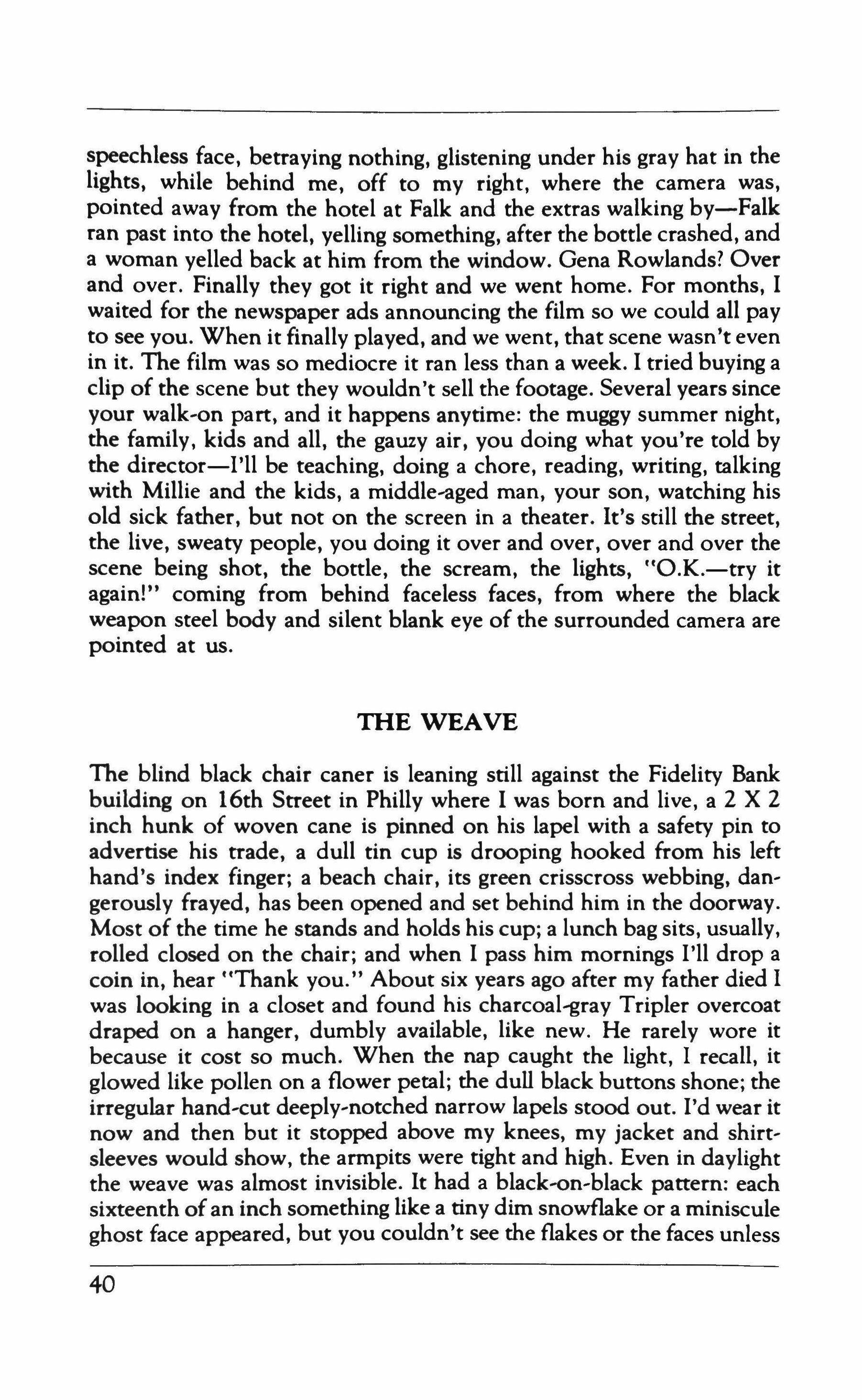
speechless face, betraying nothing, glistening under his gray hat in the lights, while behind me, off to my right, where the camera was, pointed away from the hotel at Falk and the extras walking by-Falk ran past into the hotel, yelling something, after the bottle crashed, and a woman yelled back at him from the window. Gena Rowlands? Over and over. Finally they got it right and we went home. For months, I waited for the newspaper ads announcing the film so we could all pay to see you. When it finally played, and we went, that scene wasn't even in it. The film was so mediocre it ran less than a week. I tried buying a clip of the scene but they wouldn't sell the footage. Several years since your walk-on part, and it happens anytime: the muggy summer night, the family, kids and all, the gauzy air, you doing what you're told by the director-I'll be teaching, doing a chore, reading, writing, talking with Millie and the kids, a middle-aged man, your son, watching his old sick father, but not on the screen in a theater. It's still the street, the live, sweaty people, you doing it over and over, over and over the scene being shot, the bottle, the scream, the lights, "O.K.-try it again!" coming from behind faceless faces, from where the black weapon steel body and silent blank eye of the surrounded camera are pointed at us.
THE WEAVE
The blind black chair caner is leaning still against the Fidelity Bank building on 16th Street in Phillv where I was born and live, a 2 X 2 inch hunk of woven cane is pinned on his lapel with a safety pin to advertise his trade, a dull tin cup is drooping hooked from his left hand's index finger; a beach chair, its green crisscross webbing, dangerously frayed, has been opened and set behind him in the doorway. Most of the time he stands and holds his cup; a lunch bag sits, usually, rolled closed on the chair; and when I pass him mornings I'll drop a coin in, hear "Thank you." About six years ago after my father died I was looking in a closet and found his charcoal-gray Tripler overcoat draped on a hanger, dumbly available, like new. He rarely wore it because it cost so much. When the nap caught the light, I recall, it glowed like pollen on a flower petal; the dull black buttons shone; the irregular hand-cut deeply-notched narrow lapels stood out. I'd wear it now and then but it stopped above my knees, my jacket and shirtsleeves would show, the armpits were tight and high. Even in daylight the weave was almost invisible. It had a black-on-black pattern: each sixteenth of an inch something like a tiny dim snowflake or a miniscule ghost face appeared, but you couldn't see the flakes or the faces unless
40
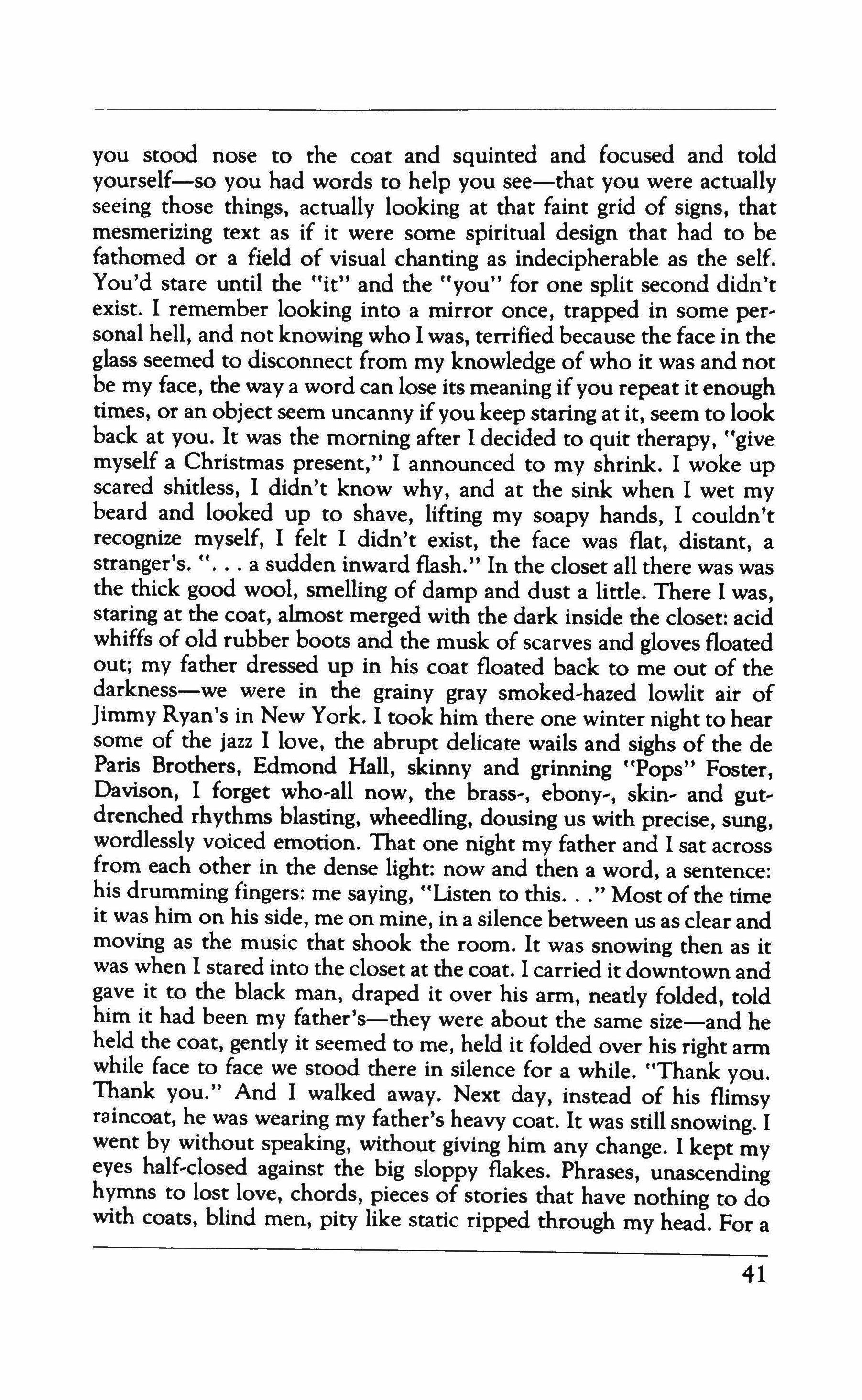
you stood nose to the coat and squinted and focused and told yourself-so you had words to help you see-that you were actually seeing those things, actually looking at that faint grid of signs, that mesmerizing text as if it were some spiritual design that had to be fathomed or a field of visual chanting as indecipherable as the self. You'd stare until the (Cit" and the "you" for one split second didn't exist. I remember looking into a mirror once, trapped in some per, sonal hell, and not knowing who I was, terrified because the face in the glass seemed to disconnect from my knowledge of who it was and not be my face, the way a word can lose its meaning if you repeat it enough times, or an object seem uncanny if you keep staring at it, seem to look back at you. It was the morning after I decided to quit therapy, "give myself a Christmas present," I announced to my shrink. I woke up scared shitless, I didn't know why, and at the sink when I wet my beard and looked up to shave, lifting my soapy hands, I couldn't recognize myself, I felt I didn't exist, the face was flat, distant, a stranger's. " a sudden inward flash." In the closet all there was was the thick good wool, smelling of damp and dust a little. There I was, staring at the coat, almost merged with the dark inside the closet: acid whiffs of old rubber boots and the musk of scarves and gloves floated out; my father dressed up in his coat floated back to me out of the darkness-we were in the grainy gray smoked-hazed lowlit air of Jimmy Ryan's in New York. I took him there one winter night to hear some of the jazz I love, the abrupt delicate wails and sighs of the de Paris Brothers, Edmond Hall, skinny and grinning "Pops" Foster, Davison, I forget who-all now, the brass', ebony" skin' and gut, drenched rhythms blasting, wheedling, dousing us with precise, sung, wordlessly voiced emotion. That one night my father and I sat across from each other in the dense light: now and then a word, a sentence: his drumming fingers: me saying, "Listen to this " Most of the time it was him on his side, me on mine, in a silence between us as clear and moving as the music that shook the room. It was snowing then as it was when I stared into the closet at the coat. I carried it downtown and gave it to the black man, draped it over his arm, neatly folded, told him it had been my father's-they were about the same size-and he held the coat, gently it seemed to me, held it folded over his right arm while face to face we stood there in silence for a while. "Thank you. Thank you." And I walked away. Next day, instead of his flimsy raincoat, he was wearing my father's heavy coat. It was still snowing. I went by without speaking, without giving him any change. I kept my eyes half-closed against the big sloppy flakes. Phrases, unascending hymns to lost love, chords, pieces of stories that have nothing to do with coats, blind men, pity like static ripped through my head. For a
41
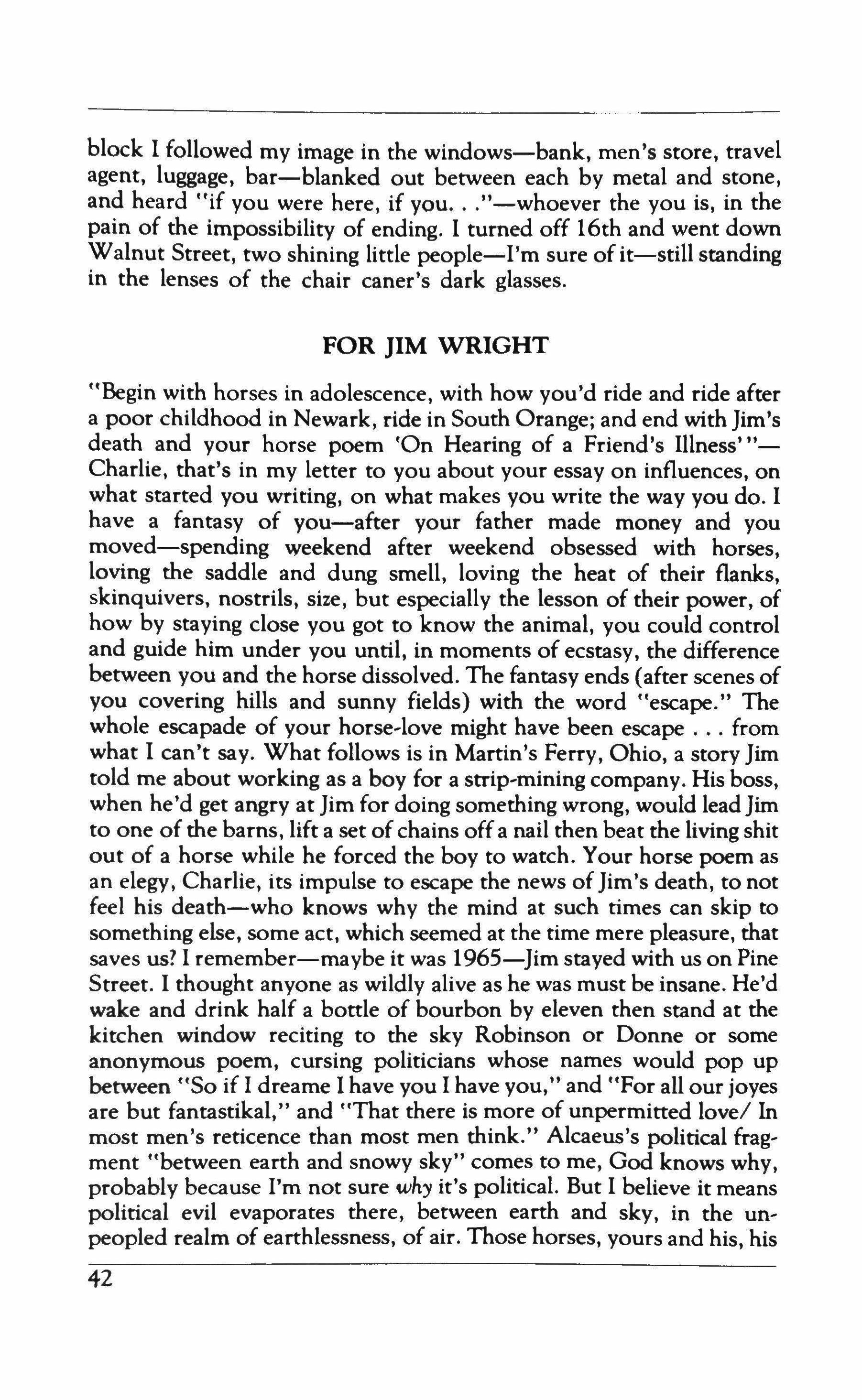
block I followed my image in the windows-bank, men's store, travel agent, luggage, bar-blanked out between each by metal and stone, and heard "if you were here, if you "-whoever the you is, in the pain of the impossibility of ending. I turned off 16th and went down Walnut Street, two shining little people-I'm sure of it-still standing in the lenses of the chair caner's dark glasses.
FOR JIM WRIGHT
"Begin with horses in adolescence, with how you'd ride and ride after a poor childhood in Newark, ride in South Orange; and end with Jim's death and your horse poem 'On Hearing of a Friend's Illness"'Charlie, that's in my letter to you about your essay on influences, on what started you writing, on what makes you write the way you do. I have a fantasy of you-after your father made money and you moved-spending weekend after weekend obsessed with horses, loving the saddle and dung smell, loving the heat of their flanks, skinquivers, nostrils, size, but especially the lesson of their power, of how by staying close you got to know the animal, you could control and guide him under you until, in moments of ecstasy, the difference between you and the horse dissolved. The fantasy ends (after scenes of you covering hills and sunny fields) with the word "escape." The whole escapade of your horse-love might have been escape from what I can't say. What follows is in Martin's Ferry, Ohio, a story Jim told me about working as a boy for a strip-mining company. His boss, when he'd get angry at Jim for doing something wrong, would lead Jim to one of the barns, lift a set of chains off a nail then beat the living shit out of a horse while he forced the boy to watch. Your horse poem as an elegy, Charlie, its impulse to escape the news ofJim's death, to not feel his death-who knows why the mind at such times can skip to something else, some act, which seemed at the time mere pleasure, that saves us? I remember-maybe it was 1965-Jim stayed with us on Pine Street. I thought anyone as wildly alive as he was must be insane. He'd wake and drink half a bottle of bourbon by eleven then stand at the kitchen window reciting to the sky Robinson or Donne or some anonymous poem, cursing politicians whose names would pop up between "So if I dreame I have you I have you," and "For all our joyes are but fantastikal," and "That there is more of unpermitted love/ In most men's reticence than most men think." Alcaeus's political fragment "between earth and snowy sky" comes to me, God knows why, probably because I'm not sure why it's political. But I believe it means political evil evaporates there, between earth and sky, in the unpeopled realm of earthlessness, of air. Those horses, yours and his, his
42
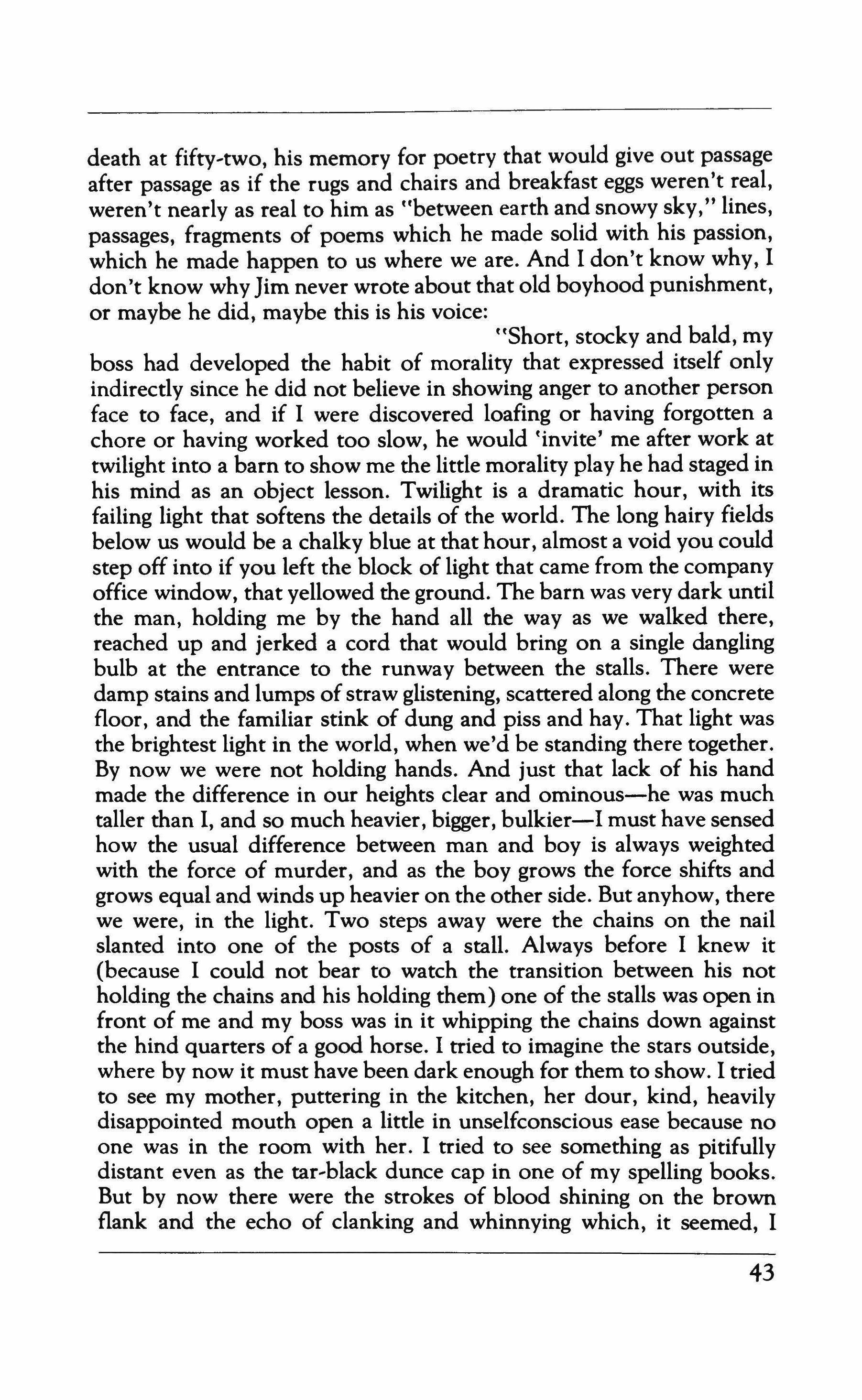
death at fifry-rwo, his memory for poetry that would give out passage after passage as if the rugs and chairs and breakfast eggs weren't real, weren't nearly as real to him as "between earth and snowy sky," lines, passages, fragments of poems which he made solid with his passion, which he made happen to us where we are. And I don't know why, I don't know whyJim never wrote about that old boyhood punishment, or maybe he did, maybe this is his voice: "Short, stocky and bald, my boss had developed the habit of morality that expressed itself only indirectly since he did not believe in showing anger to another person face to face, and if I were discovered loafing or having forgotten a chore or having worked too slow, he would 'invite' me after work at twilight into a barn to show me the little morality play he had staged in his mind as an object lesson. Twilight is a dramatic hour, with its failing light that softens the details of the world. The long hairy fields below us would be a chalky blue at that hour, almost a void you could step off into if you left the block of light that came from the company office window, that yellowed the ground. The barn was very dark until the man, holding me by the hand all the way as we walked there, reached up and jerked a cord that would bring on a single dangling bulb at the entrance to the runway between the stalls. There were damp stains and lumps of straw glistening, scattered along the concrete floor, and the familiar stink of dung and piss and hay. That light was the brightest light in the world, when we'd be standing there together. By now we were not holding hands. And just that lack of his hand made the difference in our heights clear and ominous-he was much taller than I, and so much heavier, bigger, bulkier-I must have sensed how the usual difference between man and boy is always weighted with the force of murder, and as the boy grows the force shifts and grows equal and winds up heavier on the other side. But anyhow, there we were, in the light. Two steps away were the chains on the nail slanted into one of the posts of a stall. Always before I knew it (because I could not bear to watch the transition between his not holding the chains and his holding them) one of the stalls was open in front of me and my boss was in it whipping the chains down against the hind quarters of a good horse. I tried to imagine the stars outside, where by now it must have been dark enough for them to show. I tried to see my mother, puttering in the kitchen, her dour, kind, heavily disappointed mouth open a little in unselfconscious ease because no one was in the room with her. I tried to see something as pitifully distant even as the tar-black dunce cap in one of my spelling books. But by now there were the strokes of blood shining on the brown flank and the echo of clanking and whinnying which, it seemed, I
43
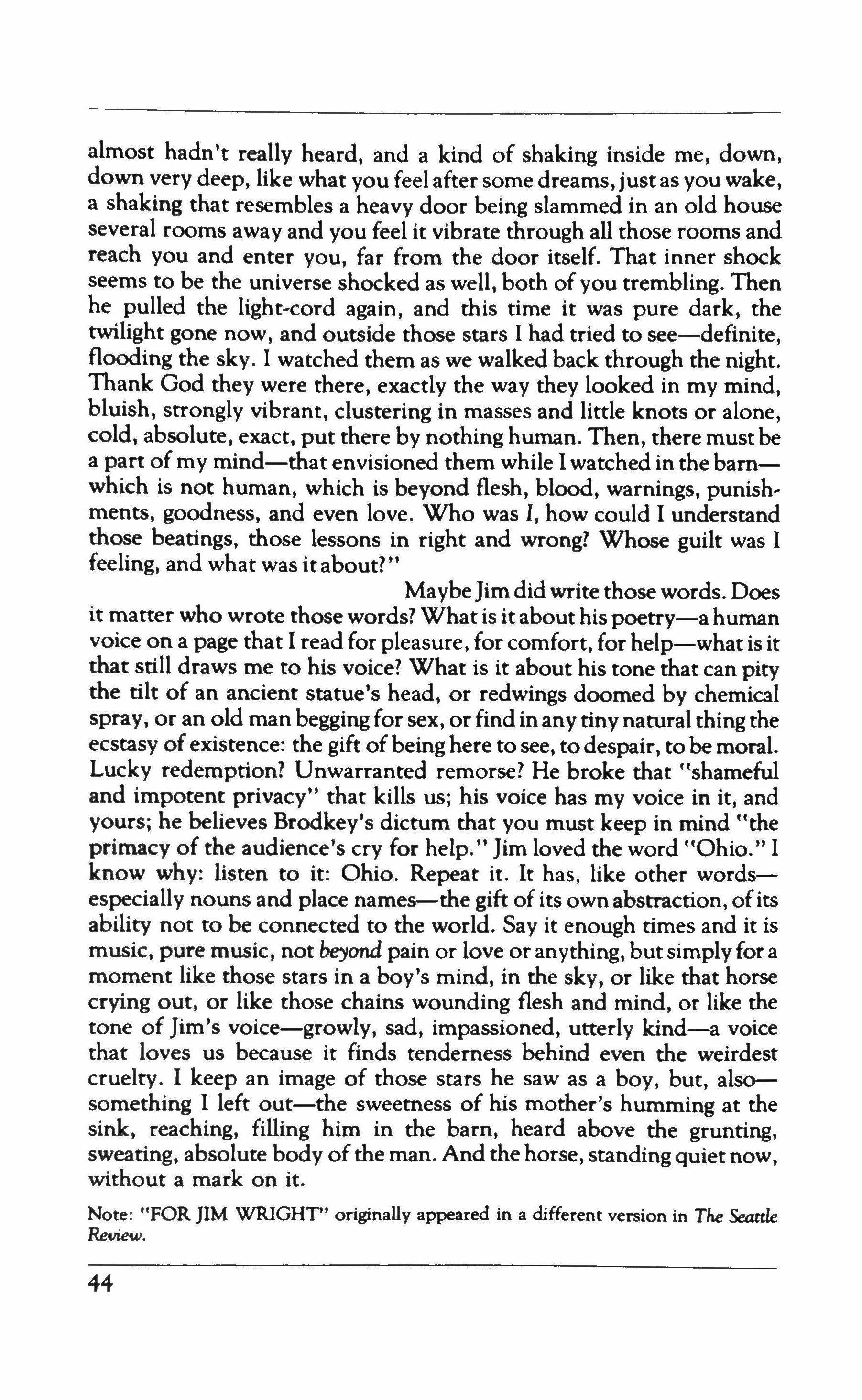
almost hadn't really heard, and a kind of shaking inside me, down, down very deep, like what you feel after some dreams,just as you wake, a shaking that resembles a heavy door being slammed in an old house several rooms away and you feel it vibrate through all those rooms and reach you and enter you, far from the door itself. That inner shock seems to be the universe shocked as well, both of you trembling. Then he pulled the light-cord again, and this time it was pure dark, the twilight gone now, and outside those stars I had tried to see-definite, flooding the sky. I watched them as we walked back through the night. Thank God they were there, exactly the way they looked in my mind, bluish, strongly vibrant, clustering in masses and little knots or alone, cold, absolute, exact, put there by nothing human. Then, there must be a part of my mind-that envisioned them while I watched in the barnwhich is not human, which is beyond flesh, blood, warnings, punishments, goodness, and even love. Who was I, how could I understand those beatings, those lessons in right and wrong? Whose guilt was I feeling, and what was it about?"
MaybeJim did write those words. Does it matter who wrote those words? What is it about his poetry-a human voice on a page that I read for pleasure, for comfort, for help-what is it that still draws me to his voice? What is it about his tone that can pity the tilt of an ancient statue's head, or redwings doomed by chemical spray, or an old man begging for sex, or find in any tinynatural thing the ecstasy of existence: the gift ofbeing here to see, to despair, to be moral. Lucky redemption? Unwarranted remorse? He broke that "shameful and impotent privacy" that kills us; his voice has my voice in it, and yours; he believes Brodkey's dictum that you must keep in mind "the primacy of the audience's cry for help." Jim loved the word "Ohio." I know why: listen to it: Ohio. Repeat it. It has, like other wordsespecially nouns and place names-the gift of its own abstraction, ofits ability not to be connected to the world. Say it enough times and it is music, pure music, not beyond pain or love or anything, but simply for a moment like those stars in a boy's mind, in the sky, or like that horse crying out, or like those chains wounding flesh and mind, or like the tone of Jim's voice-growly, sad, impassioned, utterly kind-a voice that loves us because it finds tenderness behind even the weirdest cruelty. I keep an image of those stars he saw as a boy, but, alsosomething I left out-the sweetness of his mother's humming at the sink, reaching, filling him in the barn, heard above the grunting, sweating, absolute body ofthe man. And the horse, standingquiet now, without a mark on it.
Note: "FOR JIM WRIGHT" originally appeared in a different version in The Seattle Review.
44
Had I a hundred m.ouths
William Goyen
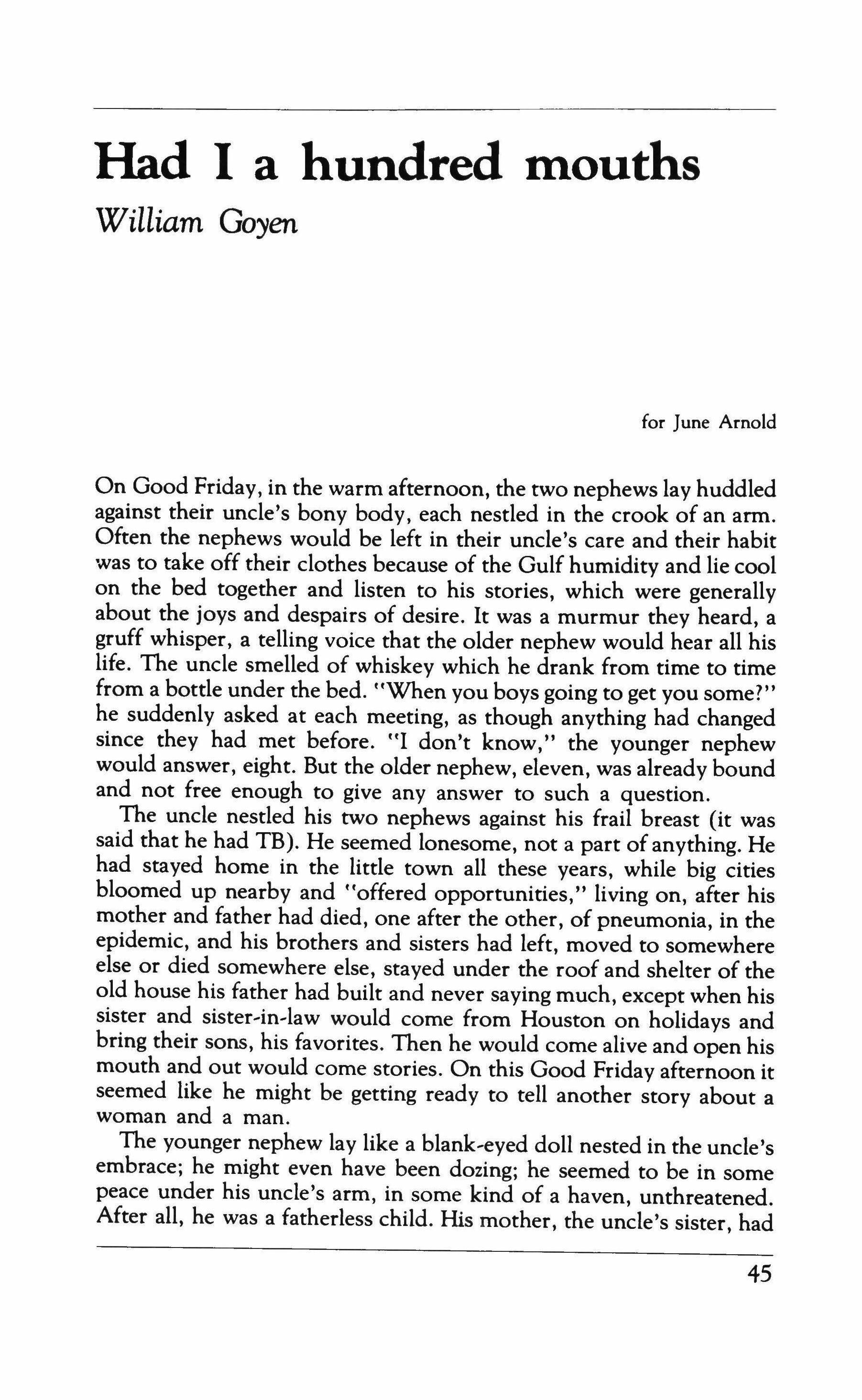 for June Arnold
for June Arnold
On Good Friday, in the warm afternoon, the two nephews lay huddled against their uncle's bony body, each nestled in the crook of an arm. Often the nephews would be left in their uncle's care and their habit was to take off their clothes because of the Gulf humidity and lie cool on the bed together and listen to his stories, which were generally about the joys and despairs of desire. It was a murmur they heard, a gruff whisper, a telling voice that the older nephew would hear all his life. The uncle smelled of whiskey which he drank from time to time from a bottle under the bed. "When you boys going to get you some?" he suddenly asked at each meeting, as though anything had changed since they had met before. "I don't know," the younger nephew would answer, eight. But the older nephew, eleven, was already bound and not free enough to give any answer to such a question.
The uncle nestled his two nephews against his frail breast (it was said that he had TB). He seemed lonesome, not a part of anything. He had stayed home in the little town all these years, while big cities bloomed up nearby and "offered opportunities," living on, after his mother and father had died, one after the other, of pneumonia, in the epidemic, and his brothers and sisters had left, moved to somewhere else or died somewhere else, stayed under the roof and shelter of the old house his father had built and never saying much, except when his sister and sister-in-law would come from Houston on holidays and bring their sons, his favorites. Then he would come alive and open his mouth and out would come stories. On this Good Friday afternoon it seemed like he might be getting ready to tell another story about a woman and a man.
The younger nephew lay like a blank-eyed doll nested in the uncle's embrace; he might even have been dozing; he seemed to be in some peace under his uncle's arm, in some kind of a haven, unthreatened. After all, he was a fatherless child. His mother, the uncle's sister, had
45
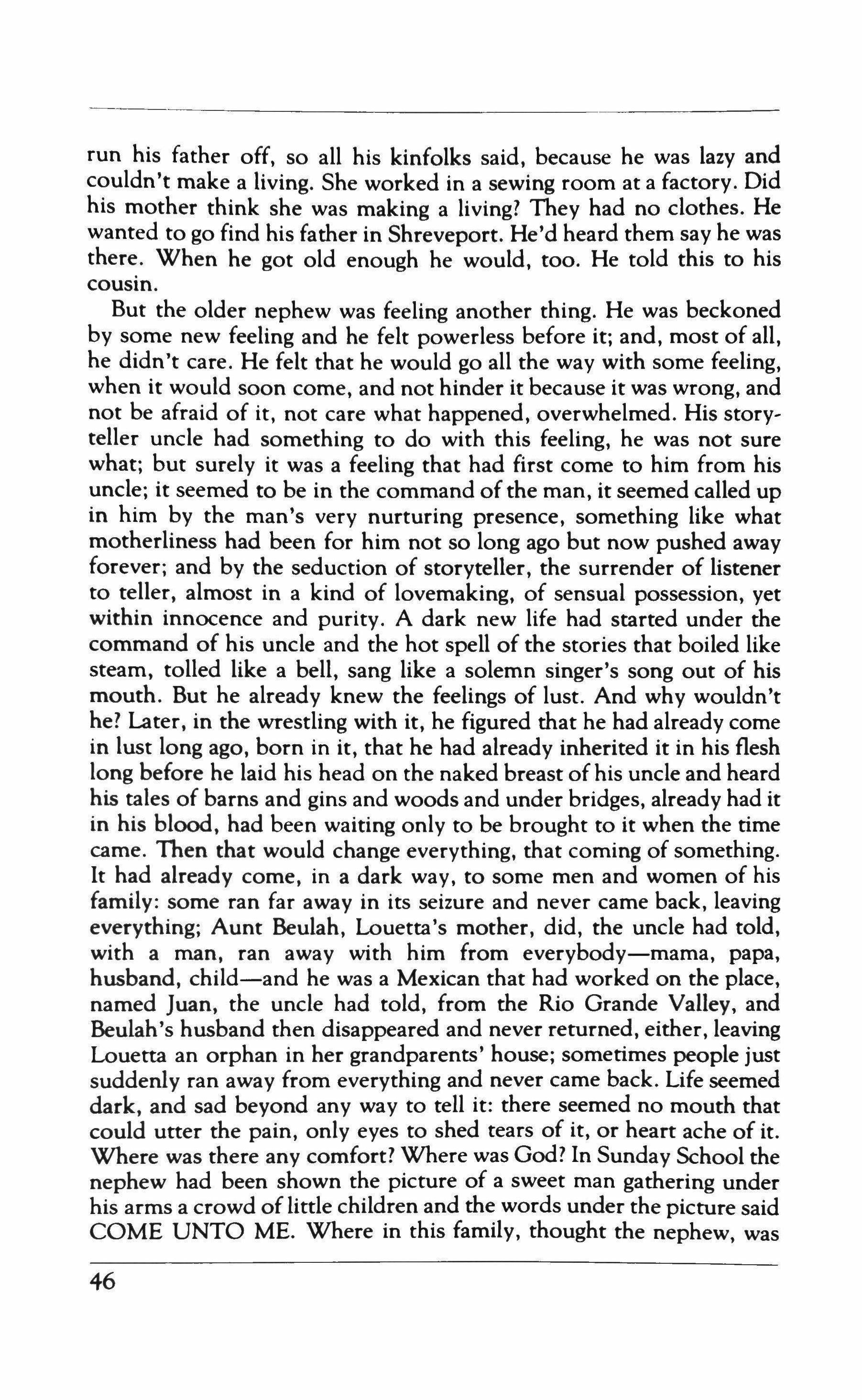
run his father off, so all his kinfolks said, because he was lazy and couldn't make a living. She worked in a sewing room at a factory. Did his mother think she was making a living? They had no clothes. He wanted to go find his father in Shreveport. He'd heard them say he was there. When he got old enough he would, too. He told this to his cousin.
But the older nephew was feeling another thing. He was beckoned by some new feeling and he felt powerless before it; and, most of all, he didn't care. He felt that he would go all the way with some feeling, when it would soon come, and not hinder it because it was wrong, and not be afraid of it, not care what happened, overwhelmed. His storyteller uncle had something to do with this feeling, he was not sure what; but surely it was a feeling that had first come to him from his uncle; it seemed to be in the command ofthe man, it seemed called up in him by the man's very nurturing presence, something like what motherliness had been for him not so long ago but now pushed away forever; and by the seduction of storyteller, the surrender of listener to teller, almost in a kind of lovemaking, of sensual possession, yet within innocence and purity. A dark new life had started under the command of his uncle and the hot spell of the stories that boiled like steam, tolled like a bell, sang like a solemn singer's song out of his mouth. But he already knew the feelings of lust. And why wouldn't he? Later, in the wrestling with it, he figured that he had already come in lust long ago, born in it, that he had already inherited it in his flesh long before he laid his head on the naked breast of his uncle and heard his tales of barns and gins and woods and under bridges, already had it in his blood, had been waiting only to be brought to it when the time came. Then that would change everything, that coming of something. It had already come, in a dark way, to some men and women of his family: some ran far away in its seizure and never came back, leaving everything; Aunt Beulah, Louetta's mother, did, the uncle had told, with a man, ran away with him from everybody-mama, papa, husband, child-and he was a Mexican that had worked on the place, named Juan, the uncle had told, from the Rio Grande Valley, and Beulah's husband then disappeared and never returned, either,leaving Louetta an orphan in her grandparents' house; sometimes people just suddenly ran away from everything and never came back. Life seemed dark, and sad beyond any way to tell it: there seemed no mouth that could utter the pain, only eyes to shed tears of it, or heart ache of it. Where was there any comfort? Where was God? In Sunday School the nephew had been shown the picture of a sweet man gathering under his arms a crowd of little children and the words under the picture said COME UNTO ME. Where in this family, thought the nephew, was
46
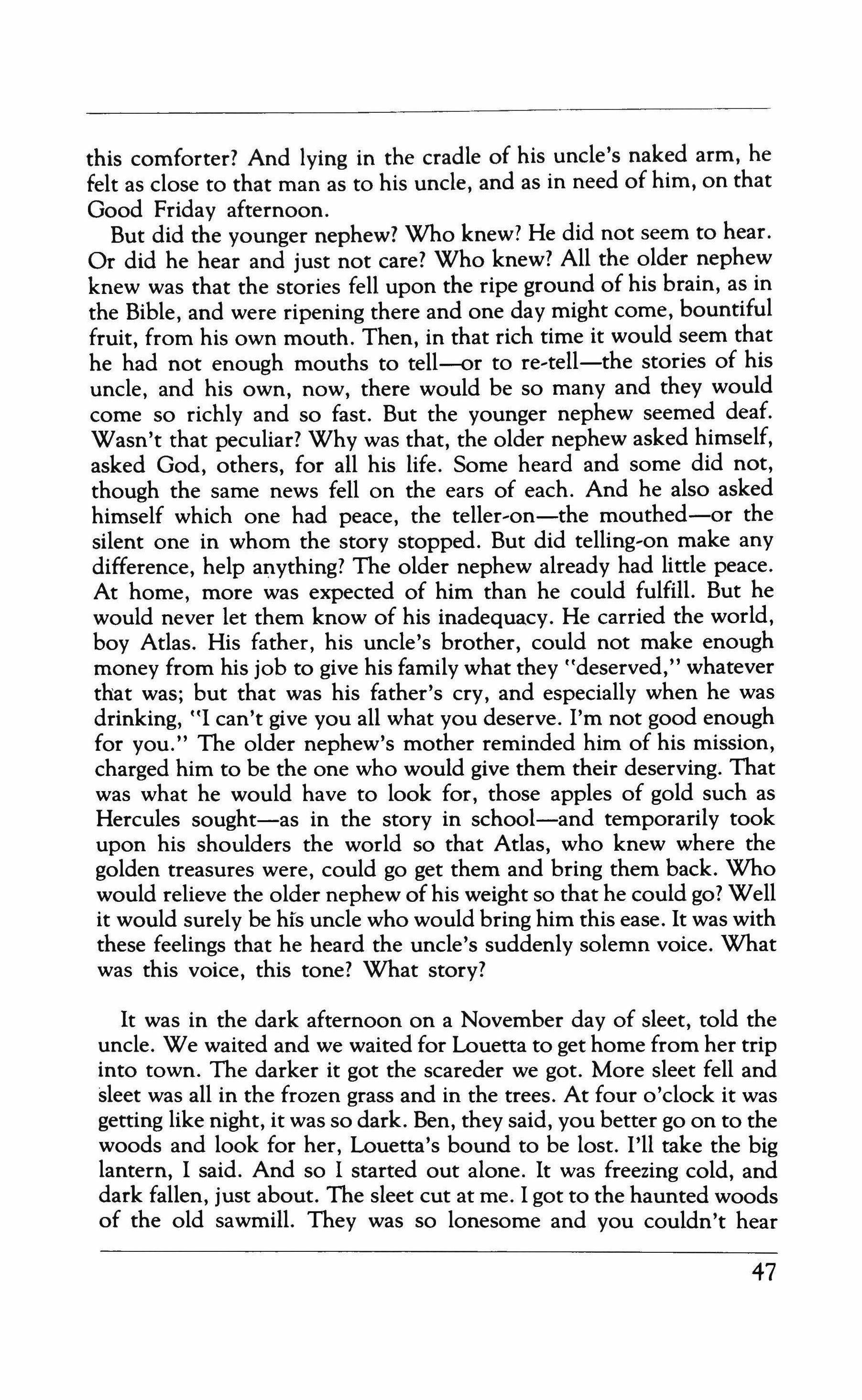
this comforter? And lying in the cradle of his uncle's naked arm, he felt as close to that man as to his uncle, and as in need of him, on that Good Friday afternoon.
But did the younger nephew? Who knew? He did not seem to hear. Or did he hear and just not care? Who knew? All the older nephew knew was that the stories fell upon the ripe ground of his brain, as in the Bible, and were ripening there and one day might come, bountiful fruit, from his own mouth. Then, in that rich time it would seem that he had not enough mouths to tell-or to re-tell-s-the stories of his uncle, and his own, now, there would be so many and they would come so richly and so fast. But the younger nephew seemed deaf. Wasn't that peculiar? Why was that, the older nephew asked himself, asked God, others, for all his life. Some heard and some did not, though the same news fell on the ears of each. And he also asked himself which one had peace, the teller-on-crhe mouthed-or the silent one in whom the story stopped. But did telling-on make any difference, help anything? The older nephew already had little peace. At home, more was expected of him than he could fulfill. But he would never let them know of his inadequacy. He carried the world, boy Atlas. His father, his uncle's brother, could not make enough money from his job to give his family what they "deserved," whatever that was; but that was his father's cry, and especially when he was drinking, "I can't give you all what you deserve. I'm not good enough for you." The older nephew's mother reminded him of his mission, charged him to be the one who would give them their deserving. That was what he would have to look for, those apples of gold such as Hercules sought-as in the story in school-and temporarily took upon his shoulders the world so that Atlas, who knew where the golden treasures were, could go get them and bring them back. Who would relieve the older nephew of his weight so that he could go? Well it would surely be his uncle who would bring him this ease. It was with these feelings that he heard the uncle's suddenly solemn voice. What was this voice, this tone? What story?
It was in the dark afternoon on a November day of sleet, told the uncle. We waited and we waited for Louetta to get home from her trip into town. The darker it got the scareder we got. More sleet fell and sleet was all in the frozen grass and in the trees. At four o'clock it was getting like night, it was so dark. Ben, they said, you better go on to the woods and look for her, Louetta's bound to be lost. I'll take the big lantern, I said. And so I started out alone. It was freezing cold, and dark fallen, just about. The sleet cut at me. I got to the haunted woods of the old sawmill. They was so lonesome and you couldn't hear
47
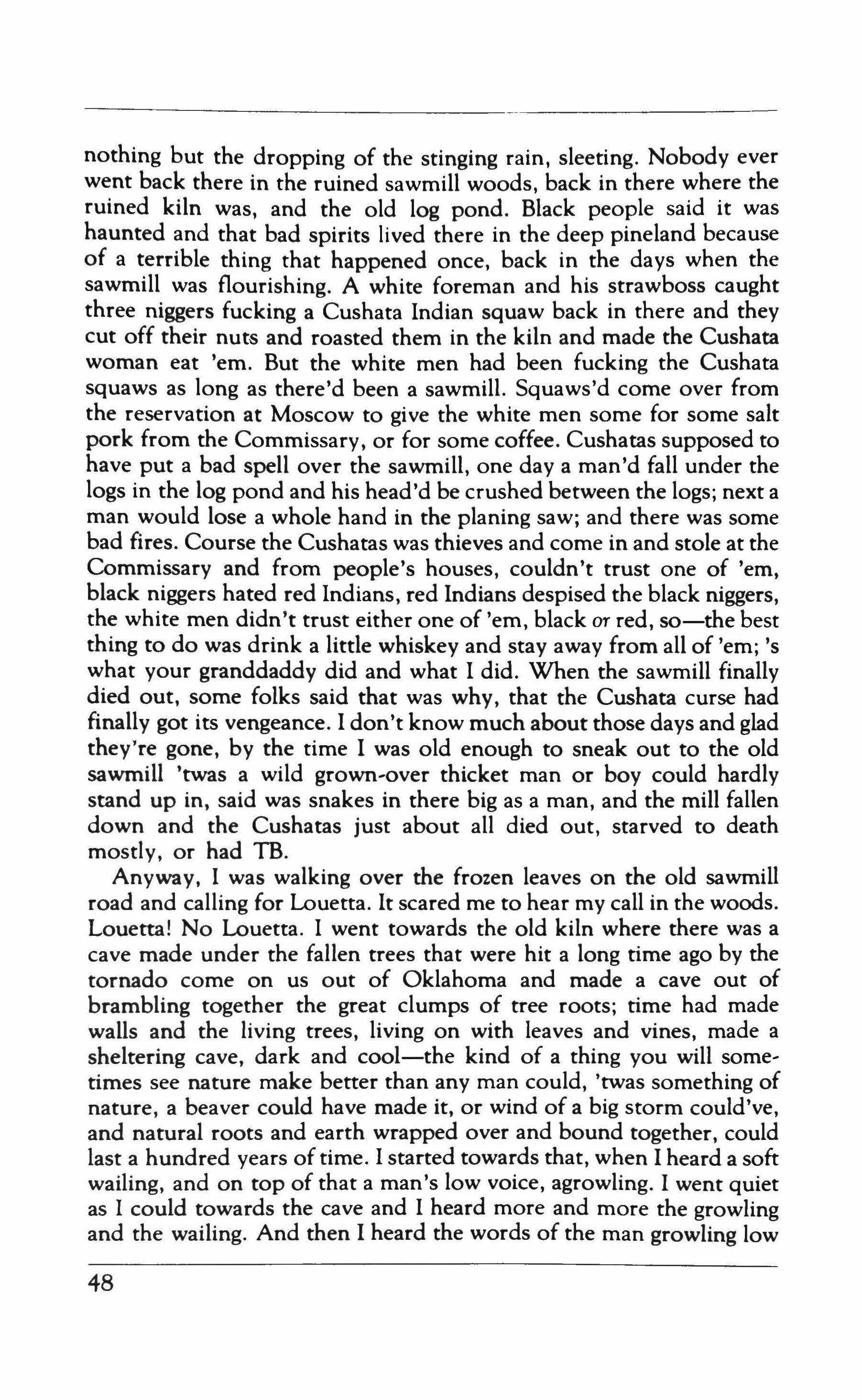
nothing but the dropping of the stinging rain, sleeting. Nobody ever went back there in the ruined sawmill woods, back in there where the ruined kiln was, and the old log pond. Black people said it was haunted and that bad spirits lived there in the deep pineland because of a terrible thing that happened once, back in the days when the sawmill was flourishing. A white foreman and his strawboss caught three niggers fucking a Cushata Indian squaw back in there and they cut off their nuts and roasted them in the kiln and made the Cushata woman eat 'em. But the white men had been fucking the Cushata squaws as long as there'd been a sawmill. Squaws'd come over from the reservation at Moscow to give the white men some for some salt pork from the Commissary, or for some coffee. Cushatas supposed to have put a bad spell over the sawmill, one day a man'd fall under the logs in the log pond and his head'd be crushed between the logs; next a man would lose a whole hand in the planing saw; and there was some bad fires. Course the Cushatas was thieves and come in and stole at the Commissary and from people's houses, couldn't trust one of 'em, black niggers hated red Indians, red Indians despised the black niggers, the white men didn't trust either one of 'em, black or red, so-the best thing to do was drink a little whiskey and stay away from all of 'em; 's what your granddaddy did and what I did. When the sawmill finally died out, some folks said that was why, that the Cushata curse had finally got its vengeance. I don't know much about those days and glad they're gone, by the time I was old enough to sneak out to the old sawmill 'twas a wild grown-over thicket man or boy could hardly stand up in, said was snakes in there big as a man, and the mill fallen down and the Cushatas just about all died out, starved to death mostly, or had TB.
Anyway, I was walking over the frozen leaves on the old sawmill road and calling for Louetta. It scared me to hear my call in the woods. Louetta! No Louetta. I went towards the old kiln where there was a cave made under the fallen trees that were hit a long time ago by the tornado come on us out of Oklahoma and made a cave out of brambling together the great clumps of tree roots; time had made walls and the living trees, living on with leaves and vines, made a sheltering cave, dark and cool-the kind of a thing you will some' times see nature make better than any man could, 'twas something of nature, a beaver could have made it, or wind of a big storm could've, and natural roots and earth wrapped over and bound together, could last a hundred years of time. I started towards that, when I heard a soft wailing, and on top of that a man's low voice, agrowling. I went quiet as I could towards the cave and I heard more and more the growling and the wailing. And then I heard the words of the man growling low
48
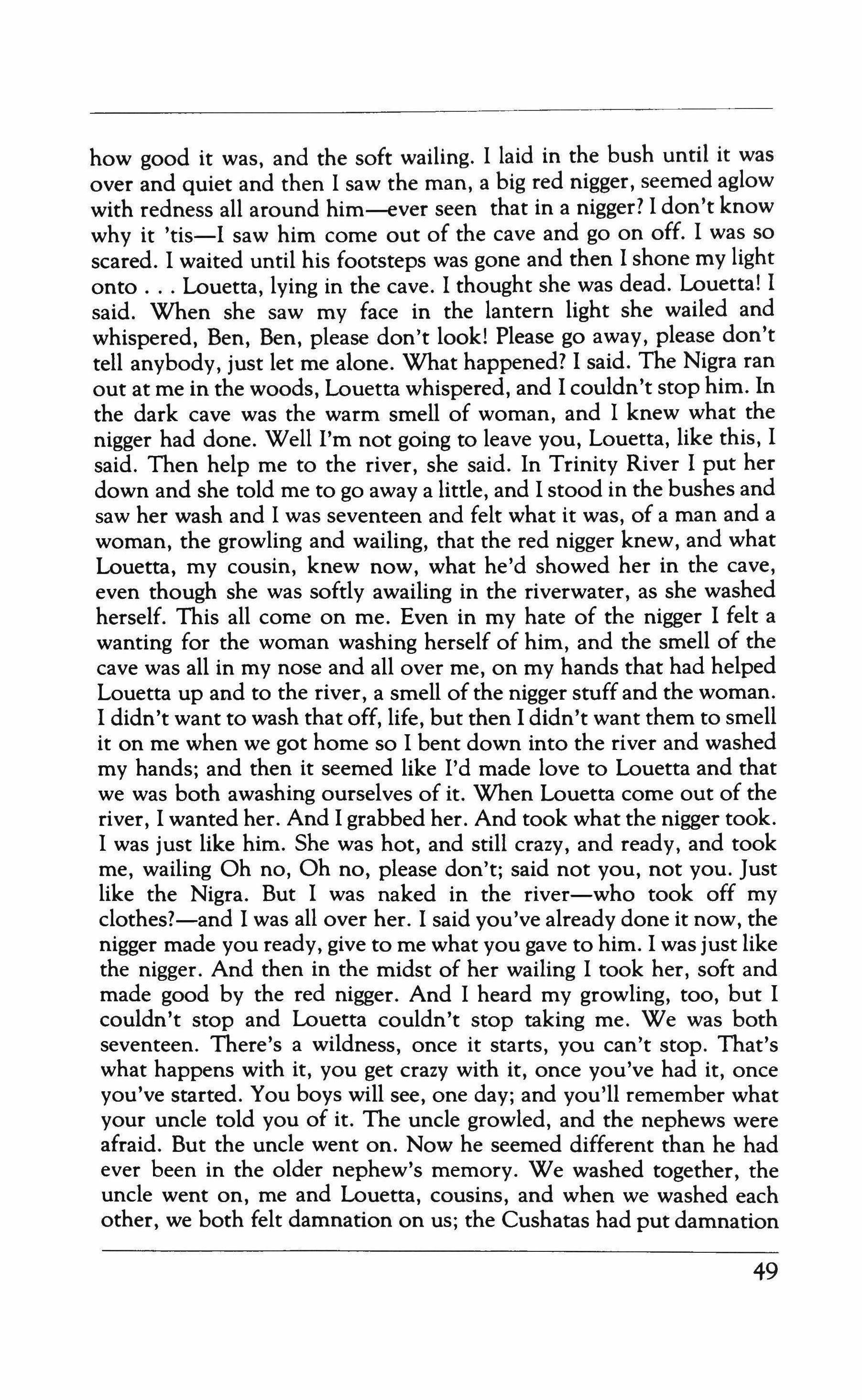
how good it was, and the soft wailing. I laid in the bush until it was over and quiet and then I saw the man, a big red nigger, seemed aglow with redness all around him-ever seen that in a nigger? I don't know why it 'tis-l saw him come out of the cave and go on off. I was so scared. I waited until his footsteps was gone and then I shone my light onto Louetta, lying in the cave. I thought she was dead. Louetta! I said. When she saw my face in the lantern light she wailed and whispered, Ben, Ben, please don't look! Please go away, please don't tell anybody, just let me alone. What happened? I said. The Nigra ran out at me in the woods, Louetta whispered, and I couldn't stop him. In the dark cave was the warm smell of woman, and I knew what the nigger had done. Well I'm not going to leave you, Louetta, like this, I said. Then help me to the river, she said. In Trinity River I put her down and she told me to go away a little, and I stood in the bushes and saw her wash and I was seventeen and felt what it was, of a man and a woman, the growling and wailing, that the red nigger knew, and what Louetta, my cousin, knew now, what he'd showed her in the cave, even though she was softly awailing in the riverwater, as she washed herself. This all come on me. Even in my hate of the nigger I felt a wanting for the woman washing herself of him, and the smell of the cave was all in my nose and all over me, on my hands that had helped Louetta up and to the river, a smell of the nigger stuff and the woman. I didn't want to wash that off, life, but then I didn't want them to smell it on me when we got home so I bent down into the river and washed my hands; and then it seemed like I'd made love to Louetta and that we was both awashing ourselves of it. When Louetta come out of the river, I wanted her. And I grabbed her. And took what the nigger took. I was just like him. She was hot, and still crazy, and ready, and took me, wailing Oh no, Oh no, please don't; said not you, not you. Just like the Nigra. But I was naked in the river-who took off my clothes?-and I was all over her. I said you've already done it now, the nigger made you ready, give to me what you gave to him. I was just like the nigger. And then in the midst of her wailing I took her, soft and made good by the red nigger. And I heard my growling, too, but I couldn't stop and Louetta couldn't stop taking me. We was both seventeen. There's a wildness, once it starts, you can't stop. That's what happens with it, you get crazy with it, once you've had it, once you've started. You boys will see, one day; and you'll remember what your uncle told you of it. The uncle growled, and the nephews were afraid. But the uncle went on. Now he seemed different than he had ever been in the older nephew's memory. We washed together, the uncle went on, me and Louetta, cousins, and when we washed each other, we both felt damnation on us; the Cushatas had put damnation
49

on us. And that was the beginning. From then on, Louetta just couldn't stop wanting it and whispering of it, was a crazy woman; and I wasn't any different. We did it in the cave, day and night, wild. We was lost.
When the black baby was born in the cave and I helped Louetta with it, black, and said Oh my God Louetta black, it's black, I took it to the Orphanage up at Longview. But they would not take it, black. All day I was wandering with the little black baby boy, through the woods and hiding in the deep groves, wondering what to do. It was a warm little thing with big white eyes and I hated to give it up cause I felt that it was part mine, you understand. Towards dark I took the baby to Aunt Kansas Tate, our washerwoman way back in the woods in Niggertown and begged her to take it, and she looked, black, at me, the way they do when they're stern like that, a kind of look of God, and I knew she thought the baby was mine. Who is its Mama? asked Kansas Tate. And I told her that I found the baby in the woods. Must be God's child, she said. And then she held the warm child and I saw her love, and she took the baby boy. She named him Leander. Louetta and I watched the boy grow. When Kansas Tate came to our place to wash and iron, the little boy Leander played near the washpot, under the chinaberry tree. And I saw Louetta watching him from the window. Leander was different, 'twas in his eyes. After all, he was borned in a cave of tree roots that the tornado from Oklahoma had made in 1918, tore up half of the county. He was as light, complected as a light Mescan boy, and real different. Something of Louetta was on him and sometimes I'd catch her standing at the back door peeking and staring out at the little boy playing in the woodpile. Leander grew on. A look of Louetta was strong over him. But I never saw her talk to him. Sometimes I'd play with Leander and as he grew up I taught him marbles and we'd shoot 'em; and I showed a lot of things a father would have shown him-how to aim and shoot a beebee gun, how to whittle a slingshot; and we hunted rabbit once, back of the old road. Until the Klu Klux boys caught us and warned me not to do it again. This hurt me before the boy, because what could I say to the boy, that we couldn't be friends or that we would have to hide to be friends. And so we slipped out to the cave in the sawmill woods where nobody ever came and we hid in the cave and played jackknife and I told him stories and answered some of the questions that he was beginning to ask. And Leander grew. Louetta and I had made love oh I guess a million times by that time. We'd never got enough since the first time. We did it back in the woodshed at night and sometimes in the bam in pure daylight. But the hiding was terrible and our feeling of sin was terrible. How could we stop? I guess nobody
so
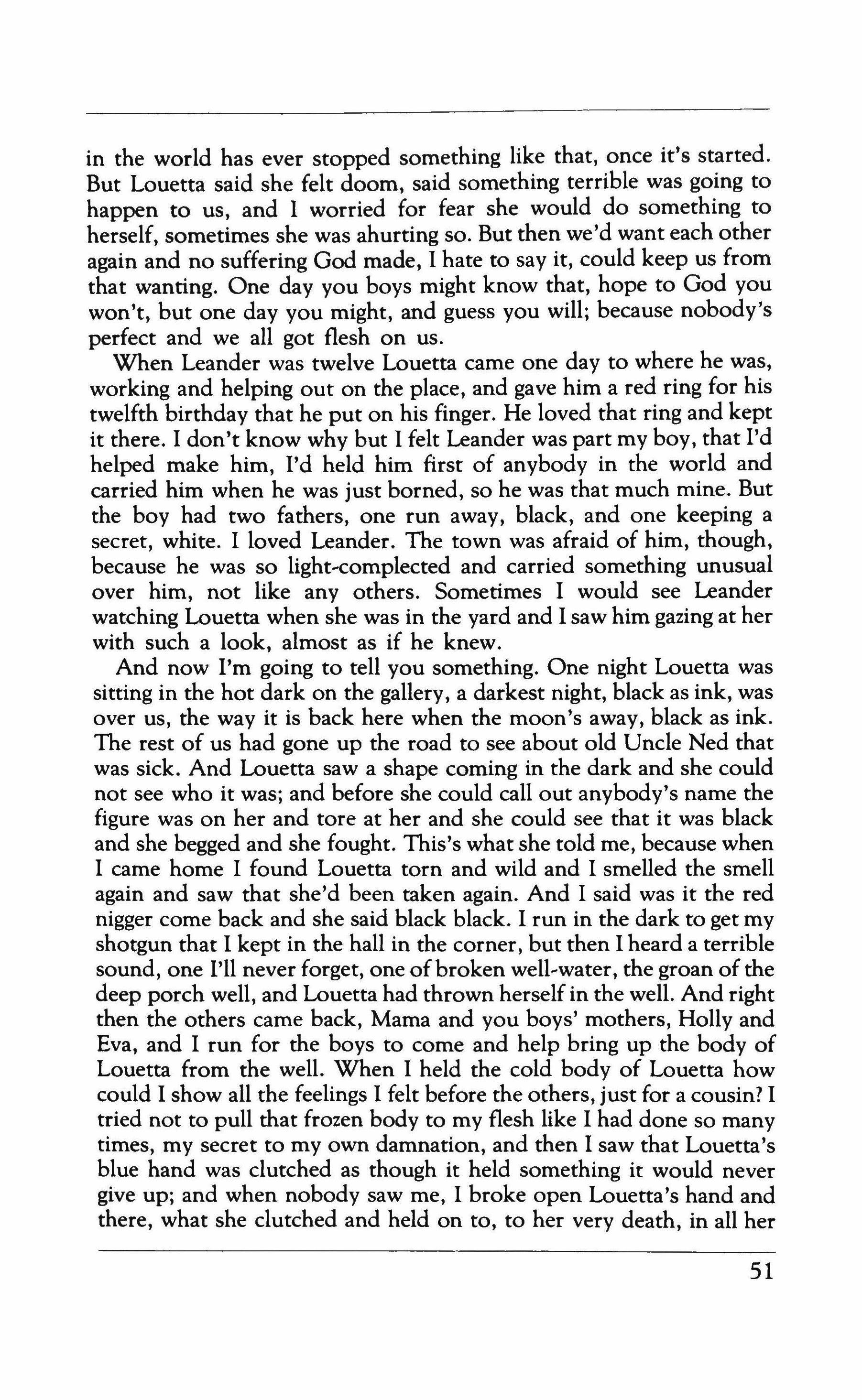
in the world has ever stopped something like that, once it's started. But Louetta said she felt doom, said something terrible was going to happen to us, and I worried for fear she would do something to herself, sometimes she was ahurting so. But then we'd want each other again and no suffering God made, I hate to say it, could keep us from that wanting. One day you boys might know that, hope to God you won't, but one day you might, and guess you will; because nobodv's perfect and we all got flesh on us.
When Leander was twelve Louetta came one day to where he was, working and helping out on the place, and gave him a red ring for his twelfth birthday that he put on his finger. He loved that ring and kept it there. I don't know why but I felt Leander was part my boy, that I'd helped make him, I'd held him first of anybody in the world and carried him when he was just borned, so he was that much mine. But the boy had two fathers, one run away, black, and one keeping a secret, white. I loved Leander. The town was afraid of him, though, because he was so light-complected and carried something unusual over him, not like any others. Sometimes I would see Leander watching Louetta when she was in the yard and I saw him gazing at her with such a look, almost as if he knew.
And now I'm going to tell you something. One night Louetta was sitting in the hot dark on the gallery, a darkest night, black as ink, was over us, the way it is back here when the moon's away, black as ink. The rest of us had gone up the road to see about old Uncle Ned that was sick. And Louetta saw a shape coming in the dark and she could not see who it was; and before she could call out anvbodv's name the figure was on her and tore at her and she could see that it was black and she begged and she fought. This's what she told me, because when I came home I found Louetta torn and wild and I smelled the smell again and saw that she'd been taken again. And I said was it the red nigger come back and she said black black. I run in the dark to get my shotgun that I kept in the hall in the corner, but then I heard a terrible sound, one I'll never forget, one ofbroken well-water, the groan of the deep porch well, and Louetta had thrown herself in the well. And right then the others came back, Mama and you boys' mothers, Holly and Eva, and I run for the boys to come and help bring up the body of Louetta from the well. When I held the cold body of Louetta how could I show all the feelings I felt before the others, just for a cousin? I tried not to pull that frozen body to my flesh like I had done so many times, my secret to my own damnation, and then I saw that Louetta's blue hand was clutched as though it held something it would never give up; and when nobody saw me, I broke open Louetta's hand and there, what she clutched and held on to, to her very death, in all her
51
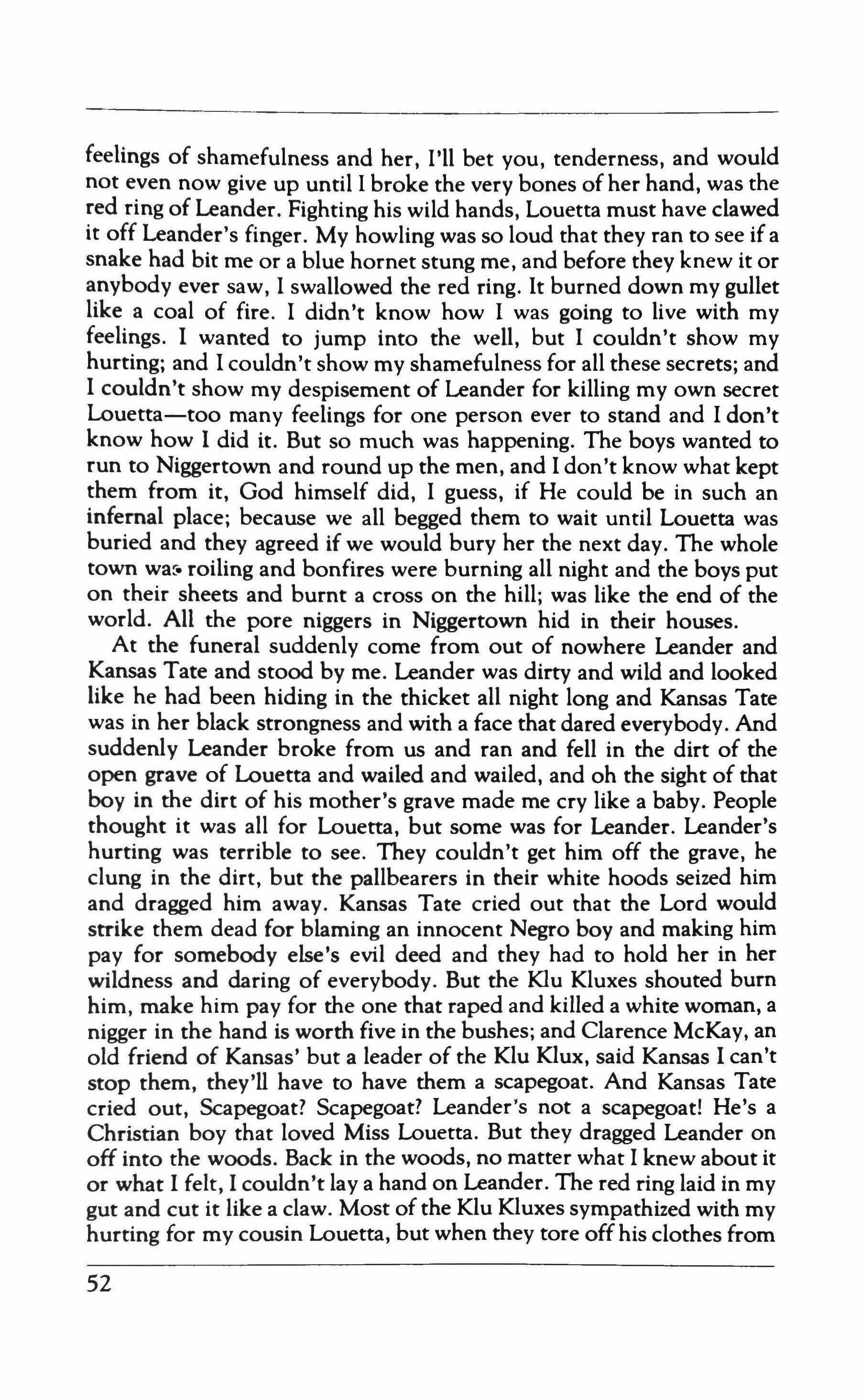
feelings of shamefulness and her, I'll bet you, tenderness, and would not even now give up until I broke the very bones of her hand, was the red ring of Leander. Fighting his wild hands, Louetta must have clawed it off Leander's finger. My howling was so loud that they ran to see if a snake had bit me or a blue hornet stung me, and before they knew it or anybody ever saw, I swallowed the red ring. It burned down my gullet like a coal of fire. I didn't know how I was going to live with my feelings. I wanted to jump into the well, but I couldn't show my hurting; and I couldn't show my shamefulness for all these secrets; and I couldn't show my despisement of Leander for killing my own secret Louetta-too many feelings for one person ever to stand and I don't know how I did it. But so much was happening. The boys wanted to run to Niggertown and round up the men, and I don't know what kept them from it, God himself did, I guess, if He could be in such an infernal place; because we all begged them to wait until Louetta was buried and they agreed if we would bury her the next day. The whole town was roiling and bonfires were burning all night and the boys put on their sheets and burnt a cross on the hill; was like the end of the world. All the pore niggers in Niggertown hid in their houses. At the funeral suddenly come from out of nowhere Leander and Kansas Tate and stood by me. Leander was dirty and wild and looked like he had been hiding in the thicket all night long and Kansas Tate was in her black strongness and with a face that dared everybody. And suddenly Leander broke from us and ran and fell in the dirt of the open grave of Louetta and wailed and wailed, and oh the sight of that boy in the dirt of his mother's grave made me cry like a baby. People thought it was all for Louetta, but some was for Leander. Leander's hurting was terrible to see. They couldn't get him off the grave, he clung in the dirt, but the pallbearers in their white hoods seized him and dragged him away. Kansas Tate cried out that the Lord would strike them dead for blaming an innocent Negro boy and making him pay for somebody else's evil deed and they had to hold her in her wildness and daring of everybody. But the KIu Kluxes shouted bum him, make him pay for the one that raped and killed a white woman, a nigger in the hand is worth five in the bushes; and Clarence McKay, an old friend of Kansas' but a leader of the Klu Klux, said Kansas I can't stop them, they'll have to have them a scapegoat. And Kansas Tate cried out, Scapegoat? Scapegoat? Leander's not a scapegoat! He's a Christian boy that loved Miss Louetta. But they dragged Leander on off into the woods. Back in the woods, no matter what I knew about it or what I felt, I couldn't lay a hand on Leander. The red ring laid in my gut and cut it like a claw. Most of the Klu Kluxes sympathized with my hurting for my cousin Louetta, but when they tore off his clothes from
52
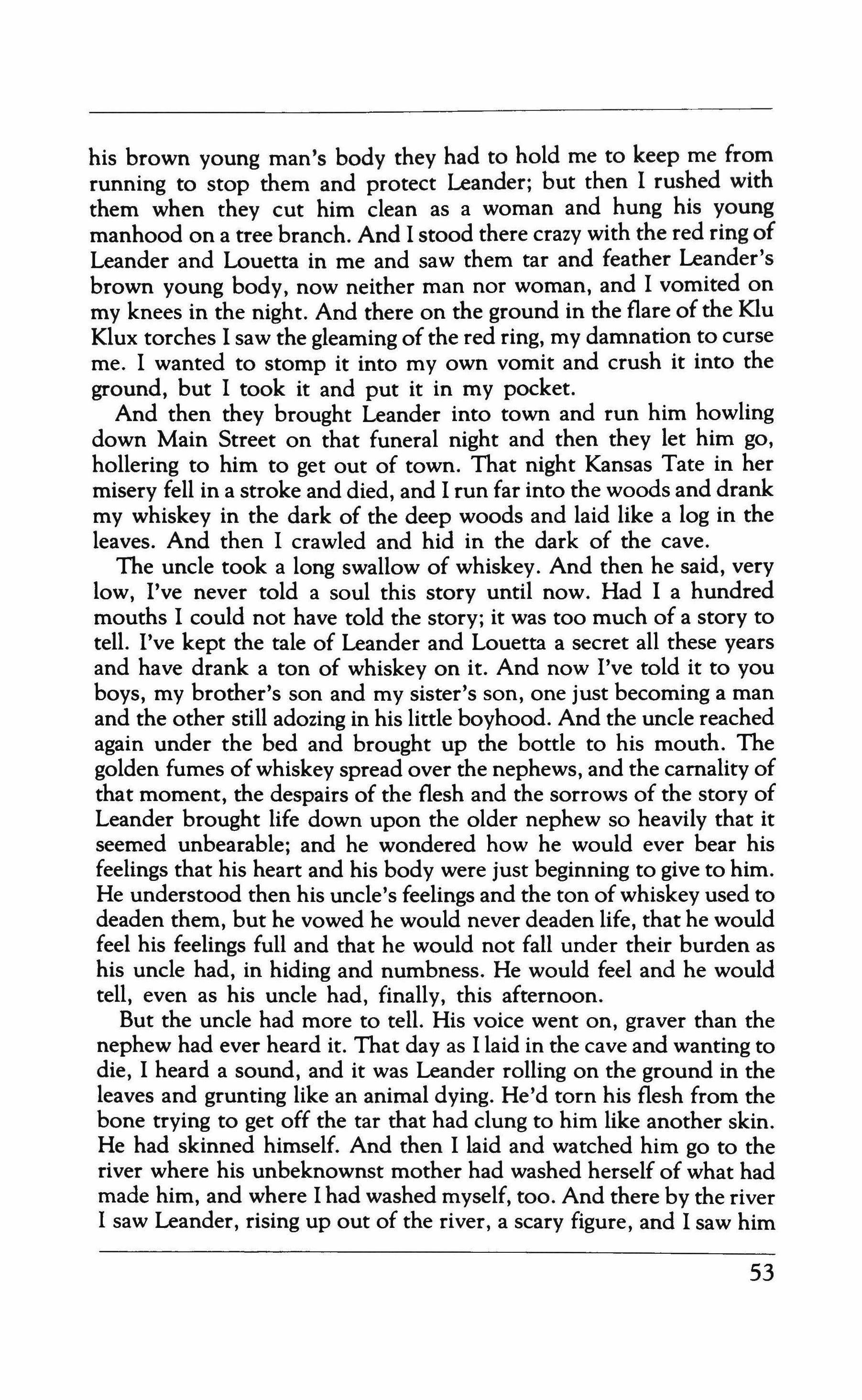
his brown young man's body they had to hold me to keep me from running to stop them and protect Leander; but then I rushed with them when they cut him clean as a woman and hung his young manhood on a tree branch. And I stood there crazy with the red ring of Leander and Louetta in me and saw them tar and feather Leander's brown young body, now neither man nor woman, and I vomited on my knees in the night. And there on the ground in the flare of the KIu Klux torches I saw the gleaming of the red ring, my damnation to curse me. I wanted to stomp it into my own vomit and crush it into the ground, but I took it and put it in my pocket.
And then they brought Leander into town and run him howling down Main Street on that funeral night and then they let him go, hollering to him to get out of town. That night Kansas Tate in her misery fell in a stroke and died, and I run far into the woods and drank my whiskey in the dark of the deep woods and laid like a log in the leaves. And then I crawled and hid in the dark of the cave.
The uncle took a long swallow of whiskey. And then he said, very low, I've never told a soul this story until now. Had I a hundred mouths I could not have told the story; it was too much of a story to tell. I've kept the tale of Leander and Louetta a secret all these years and have drank a ton of whiskey on it. And now I've told it to you boys, my brother's son and my sister's son, one just becoming a man and the other still adozing in his little boyhood. And the uncle reached again under the bed and brought up the bottle to his mouth. The golden fumes ofwhiskey spread over the nephews, and the carnality of that moment, the despairs of the flesh and the sorrows of the story of Leander brought life down upon the older nephew so heavily that it seemed unbearable; and he wondered how he would ever bear his feelings that his heart and his body were just beginning to give to him. He understood then his uncle's feelings and the ton of whiskey used to deaden them, but he vowed he would never deaden life, that he would feel his feelings full and that he would not fall under their burden as his uncle had, in hiding and numbness. He would feel and he would tell, even as his uncle had, finally, this afternoon.
But the uncle had more to tell. His voice went on, graver than the nephew had ever heard it. That day as I laid in the cave and wanting to die, I heard a sound, and it was Leander rolling on the ground in the leaves and grunting like an animal dying. He'd tom his flesh from the bone trying to get off the tar that had clung to him like another skin. He had skinned himself. And then I laid and watched him go to the river where his unbeknownst mother had washed herself of what had made him, and where I had washed myself, too. And there by the river I saw Leander, rising up out of the river, a scary figure, and I saw him
53
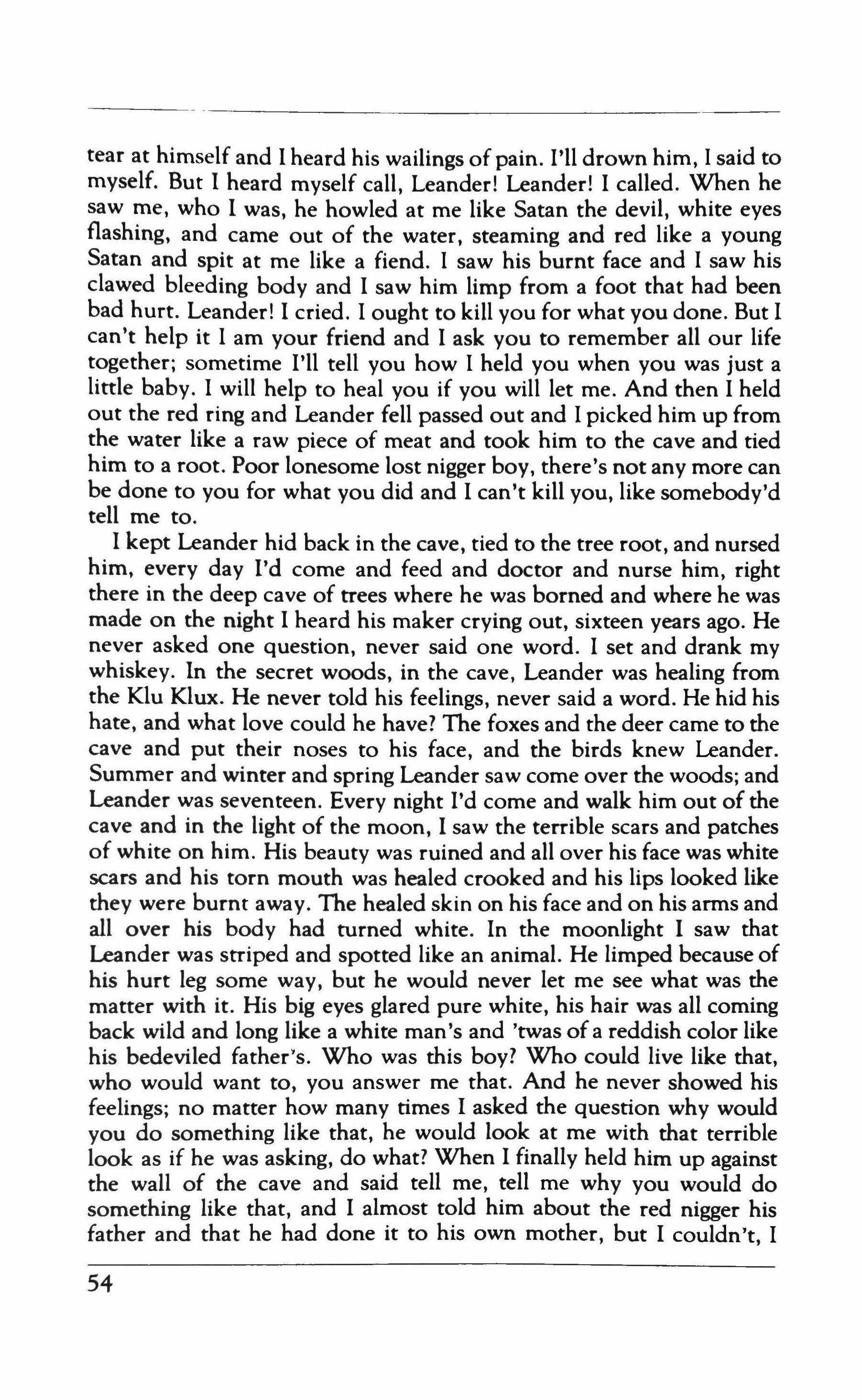
tear at himself and I heard his wailings of pain. I'll drown him, I said to myself. But I heard myself call, Leander! Leander! I called. When he saw me, who I was, he howled at me like Satan the devil, white eyes flashing, and came out of the water, steaming and red like a young Satan and spit at me like a fiend. I saw his burnt face and I saw his clawed bleeding body and I saw him limp from a foot that had been bad hurt. Leander! I cried. I ought to kill you for what you done. But I can't help it I am your friend and I ask you to remember all our life together; sometime I'll tell you how I held you when you was just a little baby. I will help to heal you if you will let me. And then I held out the red ring and Leander fell passed out and I picked him up from the water like a raw piece of meat and took him to the cave and tied him to a root. Poor lonesome lost nigger boy, there's not any more can be done to you for what you did and I can't kill you, like sornebodv'd tell me to.
I kept Leander hid back in the cave, tied to the tree root, and nursed him, every day I'd come and feed and doctor and nurse him, right there in the deep cave of trees where he was borned and where he was made on the night I heard his maker crying out, sixteen years ago. He never asked one question, never said one word. I set and drank my whiskey. In the secret woods, in the cave, Leander was healing from the Klu Klux. He never told his feelings, never said a word. He hid his hate, and what love could he have? The foxes and the deer came to the cave and put their noses to his face, and the birds knew Leander. Summer and winter and spring Leander saw come over the woods; and Leander was seventeen. Every night I'd come and walk him out of the cave and in the light of the moon, I saw the terrible scars and patches of white on him. His beauty was ruined and all over his face was white scars and his torn mouth was healed crooked and his lips looked like they were burnt away. The healed skin on his face and on his arms and allover his body had turned white. In the moonlight I saw that Leander was striped and spotted like an animal. He limped because of his hurt leg some way, but he would never let me see what was the matter with it. His big eyes glared pure white, his hair was all coming back wild and long like a white man's and 'twas of a reddish color like his bedeviled father'S. Who was this boy? Who could live like that, who would want to, you answer me that. And he never showed his feelings; no matter how many times I asked the question why would you do something like that, he would look at me with that terrible look as if he was asking, do what? When I finally held him up against the wall of the cave and said tell me, tell me why you would do something like that, and I almost told him about the red nigger his father and that he had done it to his own mother, but I couldn't, I
54
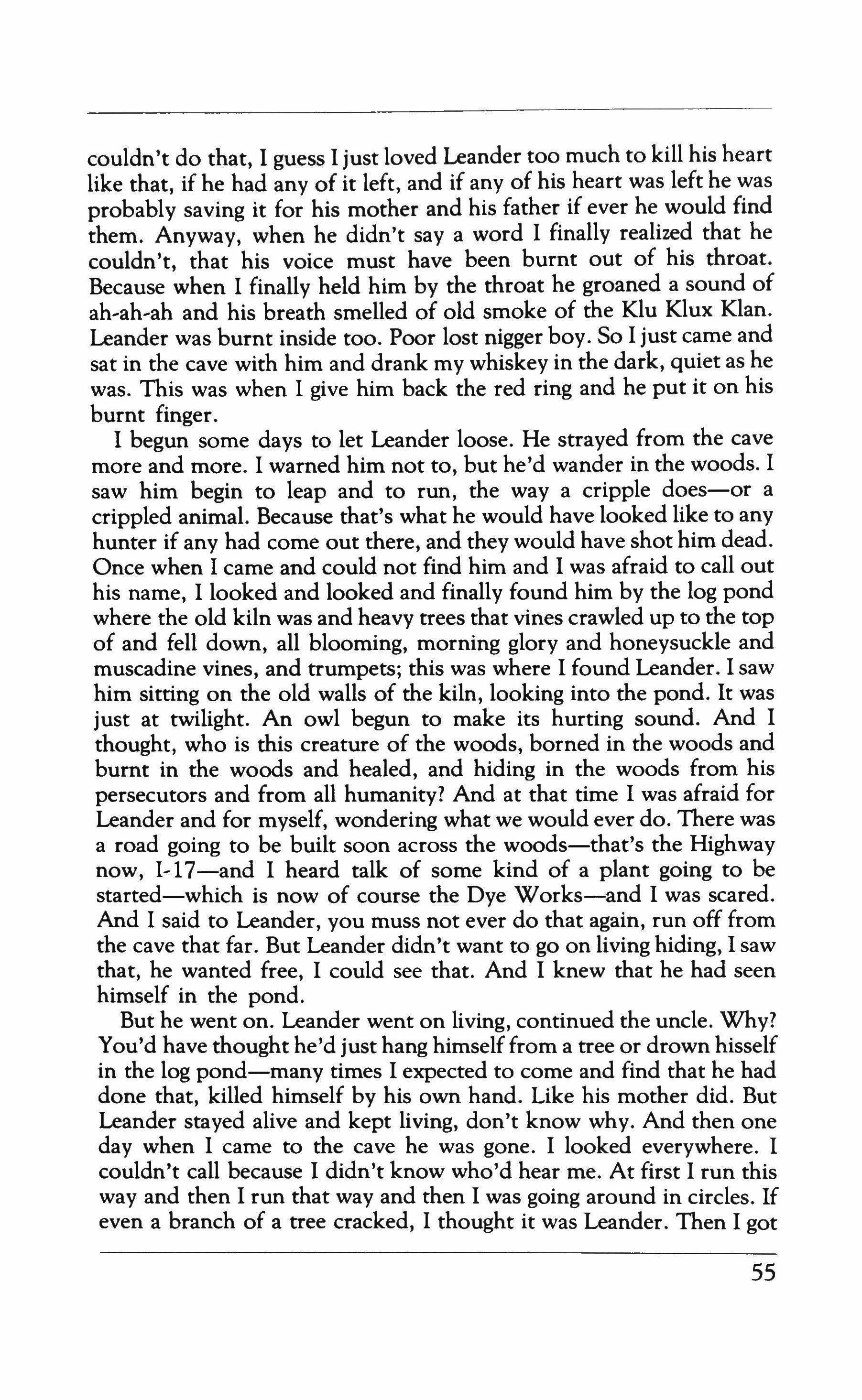
couldn't do that, I guess I just loved Leander too much to kill his heart like that, if he had any of it left, and if any of his heart was left he was probably saving it for his mother and his father if ever he would find them. Anyway, when he didn't say a word I finally realized that he couldn't, that his voice must have been burnt out of his throat. Because when I finally held him by the throat he groaned a sound of ah-ah-ah and his breath smelled of old smoke of the Klu Klux Klan. Leander was burnt inside too. Poor lost nigger boy. So I just came and sat in the cave with him and drank my whiskey in the dark, quiet as he was. This was when I give him back the red ring and he put it on his burnt finger.
I begun some days to let Leander loose. He strayed from the cave more and more. I warned him not to, but he'd wander in the woods. I saw him begin to leap and to run, the way a cripple does-or a crippled animal. Because that's what he would have looked like to any hunter if any had come out there, and they would have shot him dead. Once when I came and could not find him and I was afraid to call out his name, I looked and looked and finally found him by the log pond where the old kiln was and heavy trees that vines crawled up to the top of and fell down, all blooming, morning glory and honeysuckle and muscadine vines, and trumpets; this was where I found Leander. I saw him sitting on the old walls of the kiln, looking into the pond. It was just at twilight. An owl begun to make its hurting sound. And I thought, who is this creature of the woods, borned in the woods and burnt in the woods and healed, and hiding in the woods from his persecutors and from all humanity? And at that time I was afraid for Leander and for myself, wondering what we would ever do. There was a road going to be built soon across the woods-that's the Highway now, 1,17-and I heard talk of some kind of a plant going to be started-which is now of course the Dye Works-and I was scared. And I said to Leander, you muss not ever do that again, run off from the cave that far. But Leander didn't want to go on living hiding, I saw that, he wanted free, I could see that. And I knew that he had seen himself in the pond. But he went on. Leander went on living, continued the uncle. Why? You'd have thought he'd just hang himself from a tree or drown hisself in the log pond-many times I expected to come and find that he had done that, killed himself by his own hand. Like his mother did. But Leander stayed alive and kept living, don't know why. And then one day when I came to the cave he was gone. I looked everywhere. I couldn't call because I didn't know who'd hear me. At first I run this way and then I run that way and then I was going around in circles. If even a branch of a tree cracked, I thought it was Leander. Then I got
55
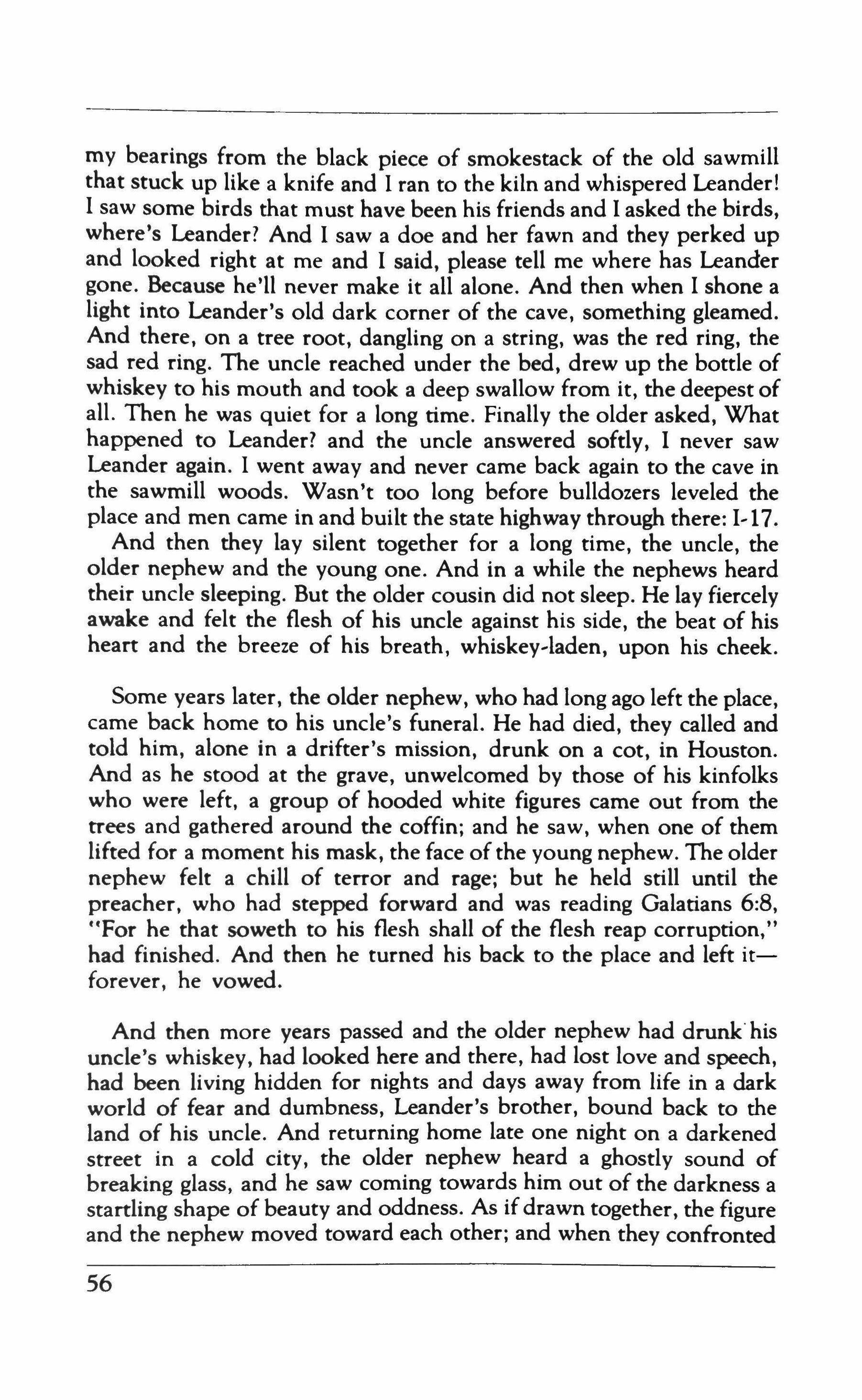
my bearings from the black piece of smokestack of the old sawmill that stuck up like a knife and I ran to the kiln and whispered Leander! I saw some birds that must have been his friends and I asked the birds, where's Leander? And I saw a doe and her fawn and they perked up and looked right at me and I said, please tell me where has Leander gone. Because he'll never make it all alone. And then when I shone a light into Leander's old dark corner of the cave, something gleamed. And there, on a tree root, dangling on a string, was the red ring, the sad red ring. The uncle reached under the bed, drew up the bottle of whiskey to his mouth and took a deep swallow from it, the deepest of all. Then he was quiet for a long time. Finally the older asked, What happened to Leander? and the uncle answered softly, I never saw Leander again. I went away and never came back again to the cave in the sawmill woods. Wasn't too long before bulldozers leveled the place and men came in and built the state highway through there: 1,17.
And then they lay silent together for a long time, the uncle, the older nephew and the young one. And in a while the nephews heard their uncle sleeping. But the older cousin did not sleep. He lay fiercely awake and felt the flesh of his uncle against his side, the beat of his heart and the breeze of his breath, whiskey-laden, upon his cheek.
Some years later, the older nephew, who had long ago left the place, came back home to his uncle's funeral. He had died, they called and told him, alone in a drifter's mission, drunk on a cot, in Houston. And as he stood at the grave, unwelcomed by those of his kinfolks who were left, a group of hooded white figures came out from the trees and gathered around the coffin; and he saw, when one of them lifted for a moment his mask, the face of the young nephew. The older nephew felt a chill of terror and rage; but he held still until the preacher, who had stepped forward and was reading Galatians 6:8, "For he that soweth to his flesh shall of the flesh reap corruption," had finished. And then he turned his back to the place and left itforever, he vowed.
And then more years passed and the older nephew had drunk his uncle's whiskey, had looked here and there, had lost love and speech, had been living hidden for nights and days away from life in a dark world of fear and dumbness, Leander's brother, bound back to the land of his uncle. And returning home late one night on a darkened street in a cold city, the older nephew heard a ghostly sound of breaking glass, and he saw coming towards him out of the darkness a startling shape of beauty and oddness. As ifdrawn together, the figure and the nephew moved toward each other; and when they confronted
56

each other it was as though they had come together out of the ages, face to face. The nephew looked upon a phantom face, as if what face had been there had been burned away and this was the painted mask of it. The creature's head was covered with a rich mane ofhair, and in the street light there appeared to be a red glow over it. The being was clothed in a glimmering garment ofscales of glass; and colored feathers were reflected in their mirrors. And the nephew saw that gaudy rings glistened on scarred brown hands. Leander! he whispered. Why did he think that this was the burnt boy, the orphan child of lust, that on a long-ago Good Friday afternoon signaled the end of his boyhood? Leander! he called. But there was no sign of feeling in the shadowed ancient eyes which, for a searing moment, locked upon him. And then the phantom being moved around the nephew and went on, swathed in the delicate tinkling of glass.
Leander! he softly called, once more, Leander! And he was calling to his uncle and his uncle's sorrow and to all storytelling, all redemption: Leander, Leander. But the figure steadily moved away, as if it were made of glass and falling delicately to pieces in its ruined march, into the gloom of the night, farther and farther away from any recognition, any redemption, any forgiveness.
And all that night the nephew put this down and told again the story that his uncle told him, a story that he could not have told before had he had a hundred mouths to tell it with. In the morning, in the silver light of dawn over the old city of his miracles, miraculously refreshed he saw in the mirror his naked body, its skin, its haunch, its breast: the ancient sower's flesh, the reaper's.
57
The student
David Plante
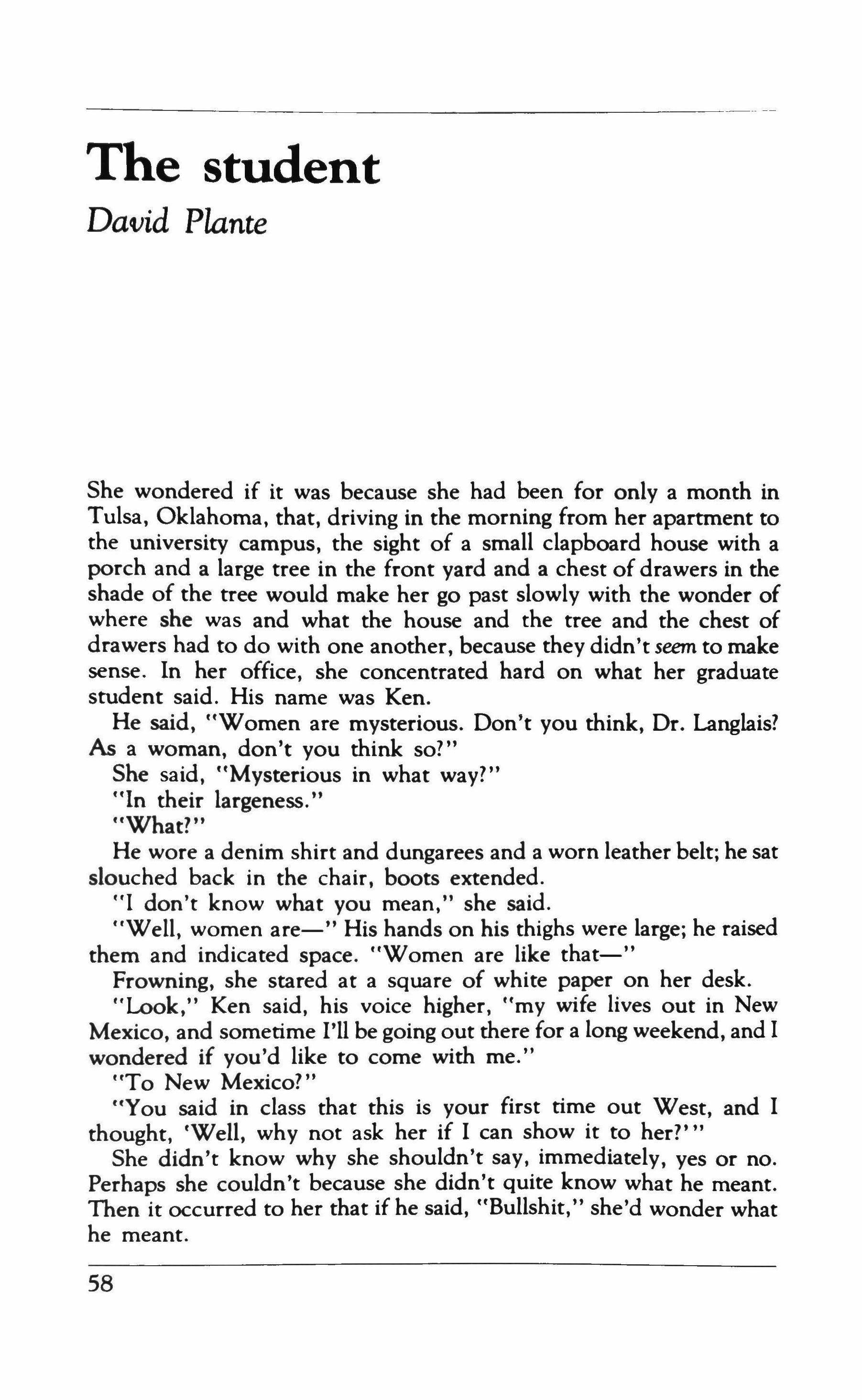
She wondered if it was because she had been for only a month in Tulsa, Oklahoma, that, driving in the morning from her apartment to the university campus, the sight of a small clapboard house with a porch and a large tree in the front yard and a chest of drawers in the shade of the tree would make her go past slowly with the wonder of where she was and what the house and the tree and the chest of drawers had to do with one another, because they didn't seem to make sense. In her office, she concentrated hard on what her graduate student said. His name was Ken.
He said, "Women are mysterious. Don't you think, Dr. Langlais? As a woman, don't you think so?"
She said, "Mysterious in what way?"
"In their largeness."
"What?"
He wore a denim shirt and dungarees and a worn leather belt; he sat slouched back in the chair, boots extended.
"I don't know what you mean," she said.
"Well, women are-" His hands on his thighs were large; he raised them and indicated space. "Women are like that-"
Frowning, she stared at a square of white paper on her desk.
"Look," Ken said, his voice higher, "my wife lives out in New Mexico, and sometime I'll be going out there for a long weekend, and I wondered if you'd like to come with me."
"To New Mexico?"
"You said in class that this is your first time out West, and I thought, 'Well, why not ask her if I can show it to her?'"
She didn't know why she shouldn't say, immediately, yes or no. Perhaps she couldn't because she didn't quite know what he meant. Then it occurred to her that if he said, "Bullshit," she'd wonder what he meant.
58
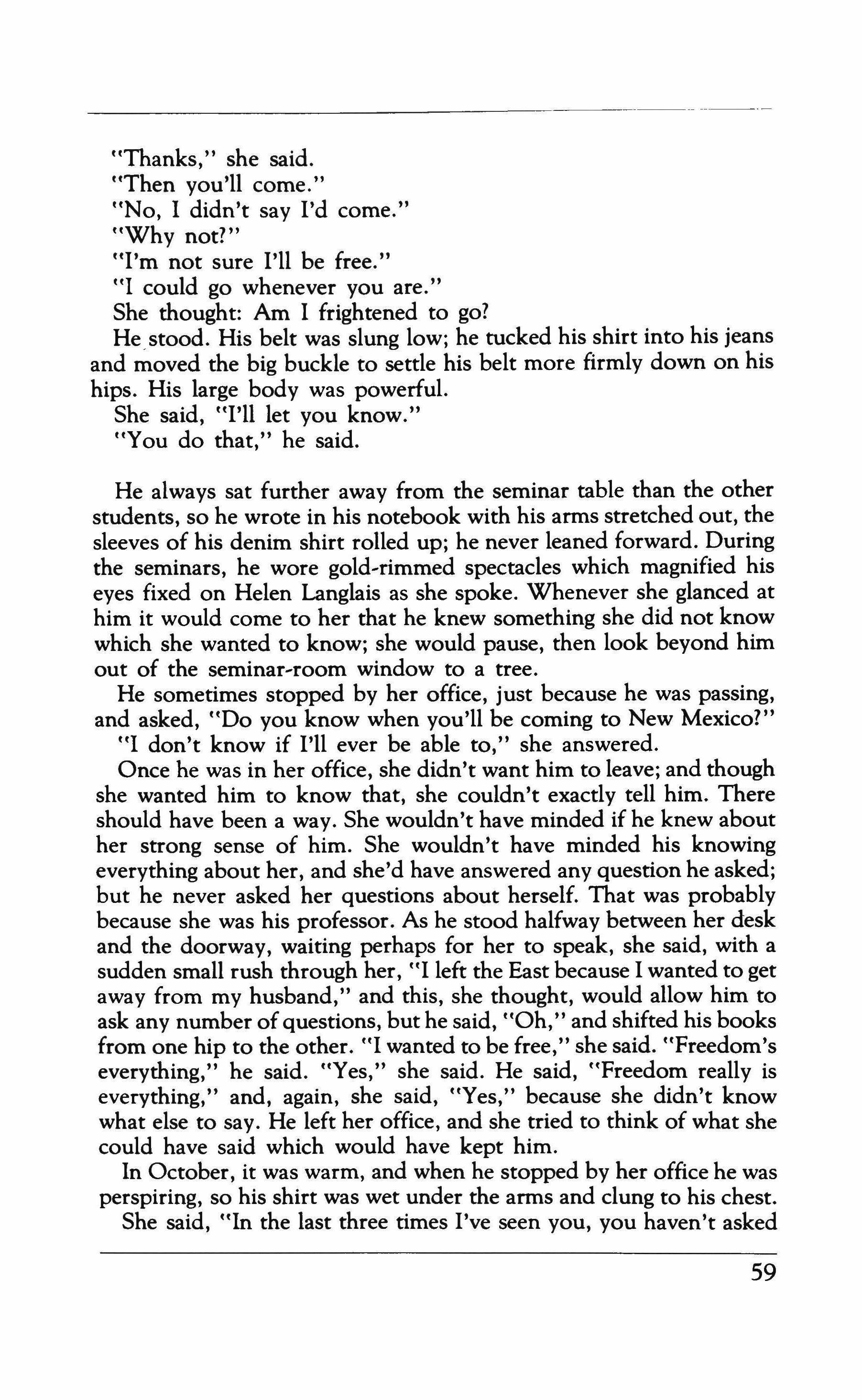
"Thanks," she said.
"Then you'll come."
"No, I didn't say I'd come."
"Why not?"
"I'm not sure I'll be free."
"I could go whenever you are."
She thought: Am I frightened to go?
He stood. His belt was slung low; he tucked his shirt into his jeans and moved the big buckle to settle his belt more firmly down on his hips. His large body was powerful.
She said, "I'll let you know."
"You do that," he said.
He always sat further away from the seminar table than the other students, so he wrote in his notebook with his arms stretched out, the sleeves of his denim shirt rolled up; he never leaned forward. During the seminars, he wore gold-rimmed spectacles which magnified his eyes fixed on Helen Langlais as she spoke. Whenever she glanced at him it would come to her that he knew something she did not know which she wanted to know; she would pause, then look beyond him out of the seminar-room window to a tree.
He sometimes stopped by her office, just because he was passing, and asked, "Do you know when you'll be coming to New Mexico?"
"I don't know if I'll ever be able to," she answered.
Once he was in her office, she didn't want him to leave; and though she wanted him to know that, she couldn't exactly tell him. There should have been a way. She wouldn't have minded if he knew about her strong sense of him. She wouldn't have minded his knowing everything about her, and she'd have answered any question he asked; but he never asked her questions about herself. That was probably because she was his professor. As he stood halfway between her desk and the doorway, waiting perhaps for her to speak, she said, with a sudden small rush through her, "I left the East because I wanted to get away from my husband," and this, she thought, would allow him to ask any number ofquestions, but he said, "Oh," and shifted his books from one hip to the other. "I wanted to be free," she said. "Freedom's everything," he said. "Yes," she said. He said, "Freedom really is everything," and, again, she said, "Yes," because she didn't know what else to say. He left her office, and she tried to think of what she could have said which would have kept him.
In October, it was warm, and when he stopped by her office he was perspiring, so his shirt was wet under the arms and clung to his chest. She said, "In the last three times I've seen you, you haven't asked
59
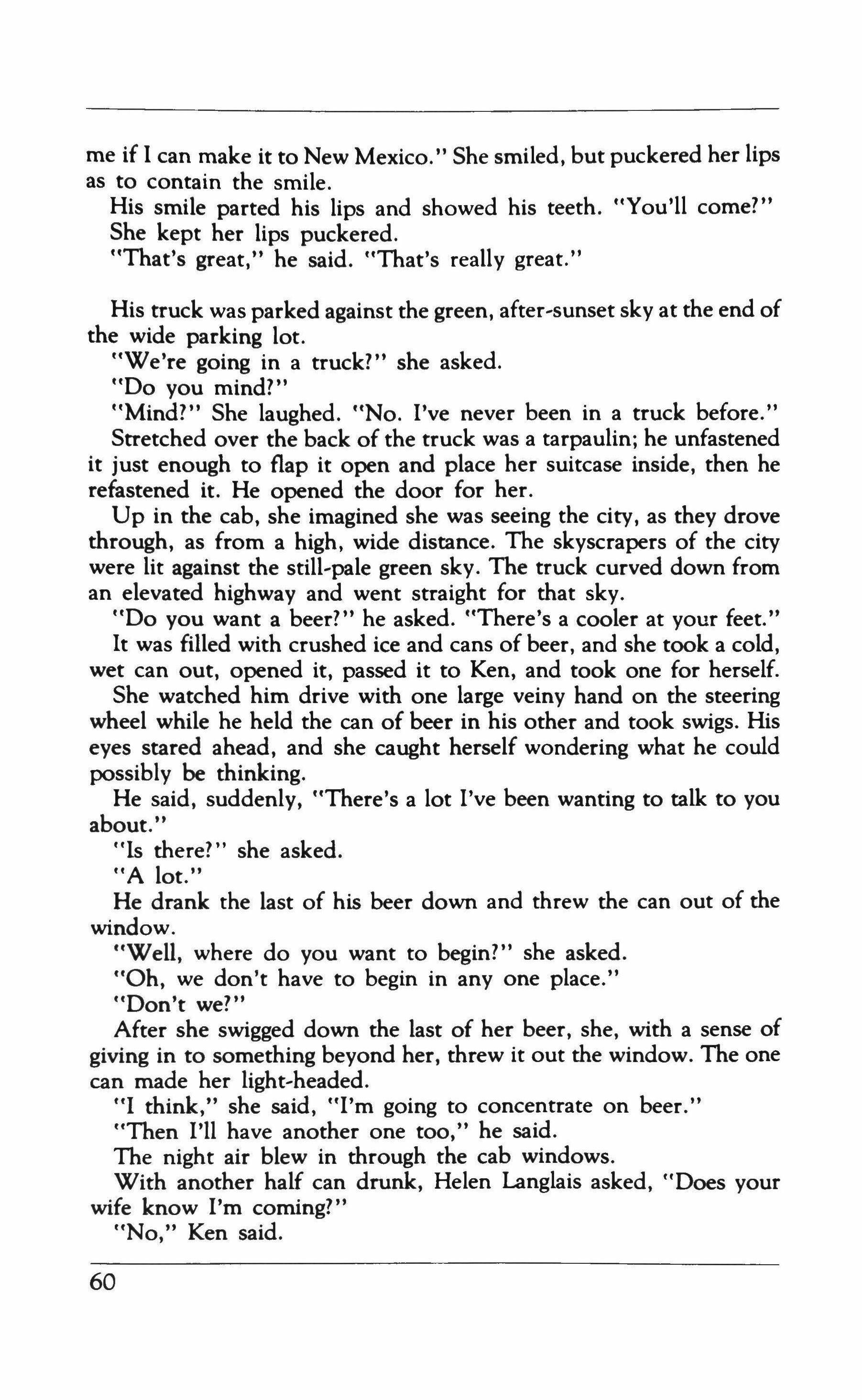
me if I can make it to New Mexico." She smiled, but puckered her lips as to contain the smile.
His smile parted his lips and showed his teeth. "You'll come?"
She kept her lips puckered.
"That's great," he said. "That's really great."
His truck was parked against the green, after-sunset sky at the end of the wide parking lot.
"We're going in a truck?" she asked.
"Do you mind?"
"Mind?" She laughed. "No. I've never been in a truck before."
Stretched over the back of the truck was a tarpaulin; he unfastened it just enough to flap it open and place her suitcase inside, then he refastened it. He opened the door for her.
Up in the cab, she imagined she was seeing the city, as they drove through, as from a high, wide distance. The skyscrapers of the city were lit against the still-pale green sky. The truck curved down from an elevated highway and went straight for that sky.
"Do you want a beer?" he asked. "There's a cooler at your feet."
It was filled with crushed ice and cans of beer, and she took a cold, wet can out, opened it, passed it to Ken, and took one for herself.
She watched him drive with one large veiny hand on the steering wheel while he held the can of beer in his other and took swigs. His eyes stared ahead, and she caught herself wondering what he could possibly be thinking.
He said, suddenly, "There's a lot I've been wanting to talk to you about."
"Is there?" she asked.
"A lot."
He drank the last of his beer down and threw the can out of the window.
"Well, where do you want to begin?" she asked.
"Oh, we don't have to begin in anyone place."
"Don't we?"
After she swigged down the last of her beer, she, with a sense of giving in to something beyond her, threw it out the window. The one can made her light-headed.
"I think," she said, "I'm going to concentrate on beer."
"Then I'll have another one too," he said.
The night air blew in through the cab windows.
With another half can drunk, Helen Langlais asked, "Does your wife know I'm coming?"
"No," Ken said.
60
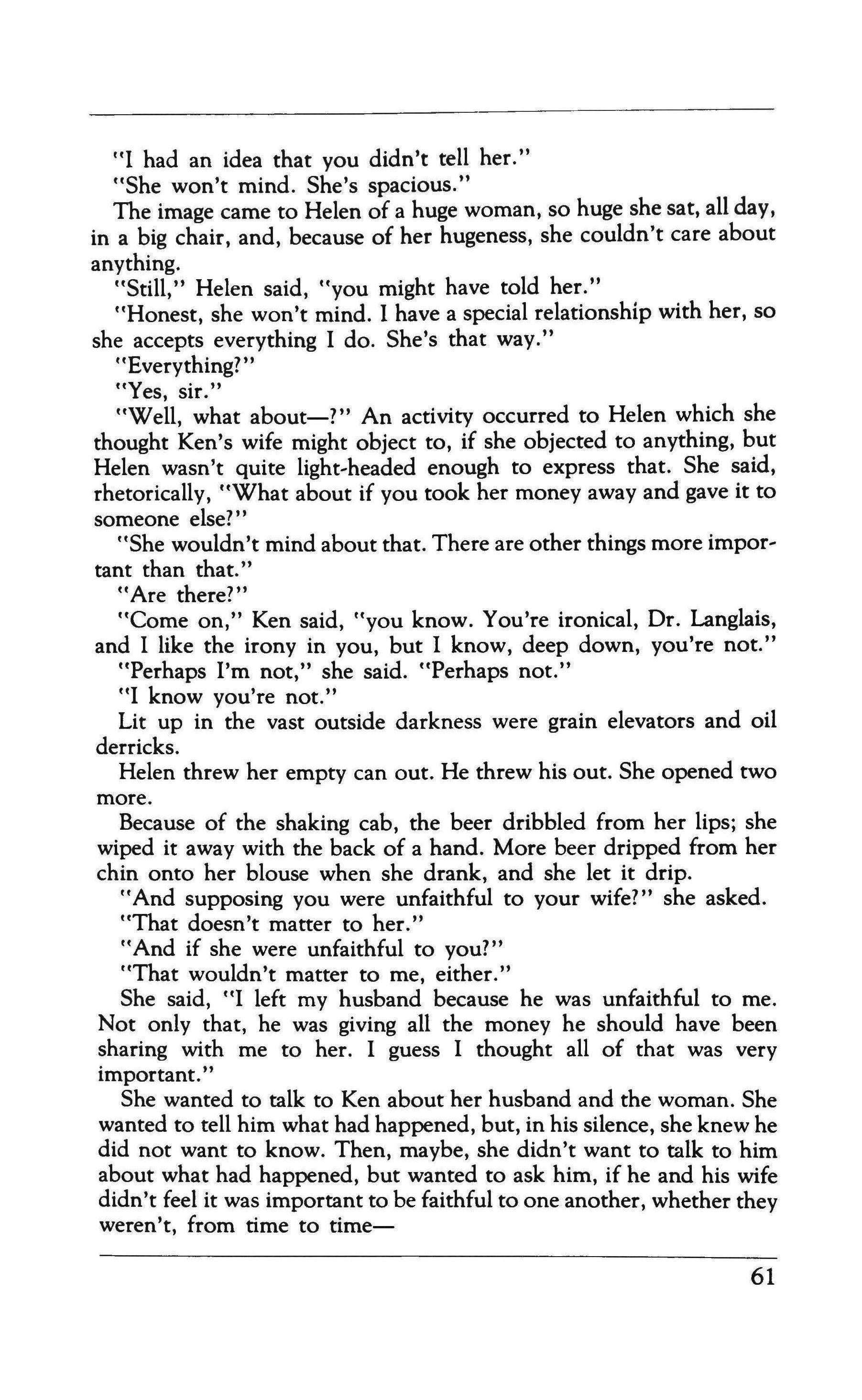
"I had an idea that you didn't tell her."
"She won't mind. She's spacious."
The image carne to Helen of a huge woman, so huge she sat, all day, in a big chair, and, because of her hugeness, she couldn't care about anything.
"Still," Helen said, "you might have told her."
"Honest, she won't mind. I have a special relationship with her, so she accepts everything I do. She's that way."
"Everything? "
"Yes, sir."
"Well, what about-?" An activity occurred to Helen which she thought Ken's wife might object to, if she objected to anything, but Helen wasn't quite light-headed enough to express that. She said, rhetorically, "What about if you took her money away and gave it to someone else?"
"She wouldn't mind about that. There are other things more important than that."
HAre there?"
"Corne on," Ken said, "you know. You're ironical, Dr. Langlais, and I like the irony in you, but I know, deep down, you're not."
"Perhaps I'm not," she said. "Perhaps not."
"I know you're not."
Lit up in the vast outside darkness were grain elevators and oil derricks.
Helen threw her empty can out. He threw his out. She opened two more.
Because of the shaking cab, the beer dribbled from her lips; she wiped it away with the back of a hand. More beer dripped from her chin onto her blouse when she drank, and she let it drip.
"And supposing you were unfaithful to your wife?" she asked.
"That doesn't matter to her."
"And if she were unfaithful to you?"
"That wouldn't matter to me, either."
She said, "I left my husband because he was unfaithful to me. Not only that, he was giving all the money he should have been sharing with me to her. I guess I thought all of that was very important.
She wanted to talk to Ken about her husband and the woman. She wanted to tell him what had happened, but, in his silence, she knew he did not want to know. Then, maybe, she didn't want to talk to him about what had happened, but wanted to ask him, if he and his wife didn't feel it was important to be faithful to one another, whether they weren't, from time to time-
61
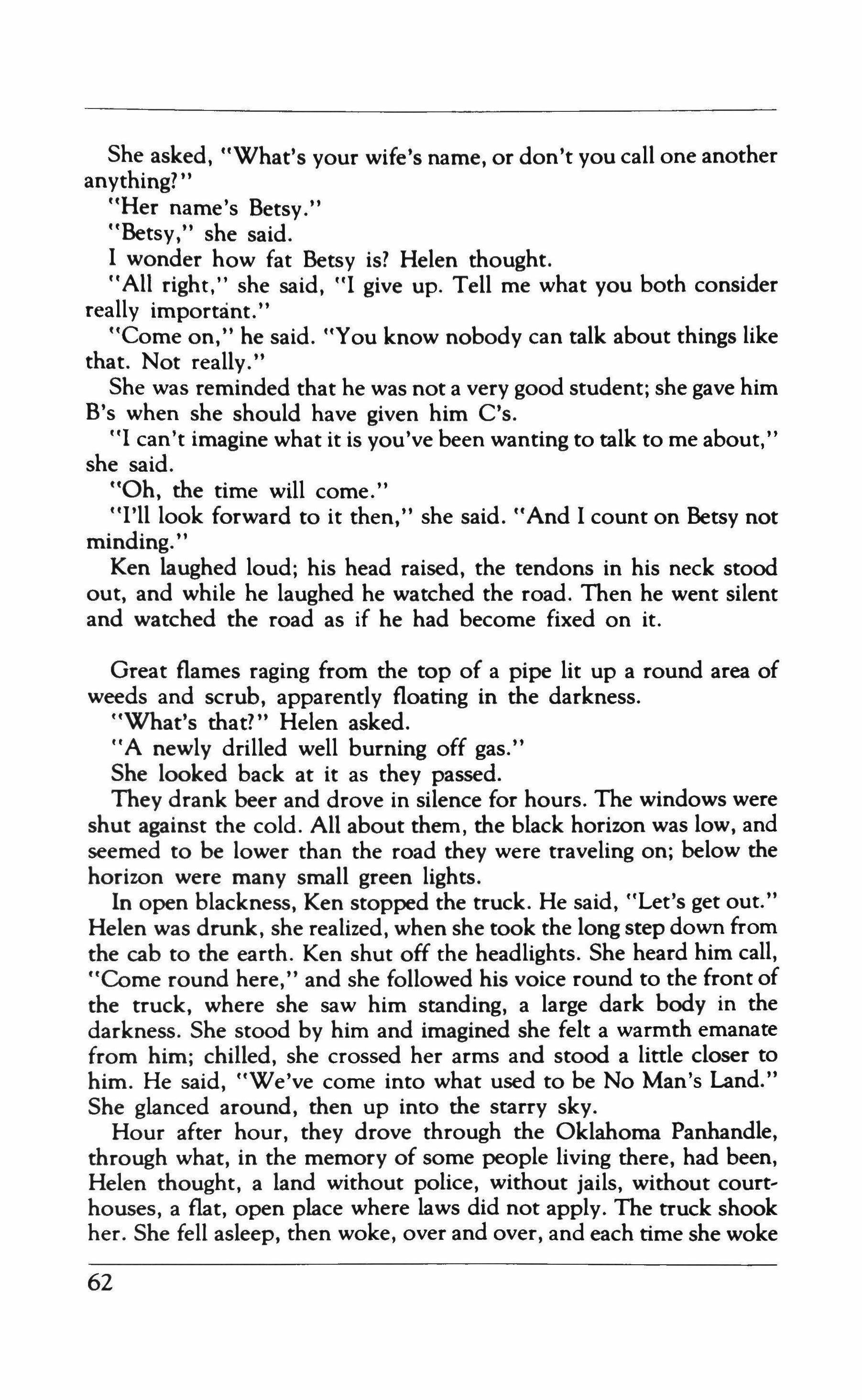
She asked, "What's your wife's name, or don't you call one another anything?
"Her name's Betsy."
"Betsy," she said.
I wonder how fat Betsy is? Helen thought.
"All right," she said, "I give up. Tell me what you both consider really important."
"Come on," he said. "You know nobody can talk about things like that. Not really."
She was reminded that he was not a very good student; she gave him B's when she should have given him C's.
"I can't imagine what it is you've been wanting to talk to me about," she said.
"Oh, the time will come."
"I'll look forward to it then," she said. "And I count on Betsy not minding."
Ken laughed loud; his head raised, the tendons in his neck stood out, and while he laughed he watched the road. Then he went silent and watched the road as if he had become fixed on it.
Great flames raging from the top of a pipe lit up a round area of weeds and scrub, apparently floating in the darkness.
"What's that?" Helen asked.
"A newly drilled well burning off gas."
She looked back at it as they passed. They drank beer and drove in silence for hours. The windows were shut against the cold. All about them, the black horizon was low, and seemed to be lower than the road they were traveling on; below the horizon were many small green lights.
In open blackness, Ken stopped the truck. He said, "Let's get out." Helen was drunk, she realized, when she took the long step down from the cab to the earth. Ken shut off the headlights. She heard him call, "Come round here," and she followed his voice round to the front of the truck, where she saw him standing, a large dark body in the darkness. She stood by him and imagined she felt a warmth emanate from him; chilled, she crossed her arms and stood a little closer to him. He said, "We've come into what used to be No Man's Land." She glanced around, then up into the starry sky.
Hour after hour, they drove through the Oklahoma Panhandle, through what, in the memory of some people living there, had been, Helen thought, a land without police, without jails, without court' houses, a flat, open place where laws did not apply. The truck shook her. She fell asleep, then woke, over and over, and each time she woke
62
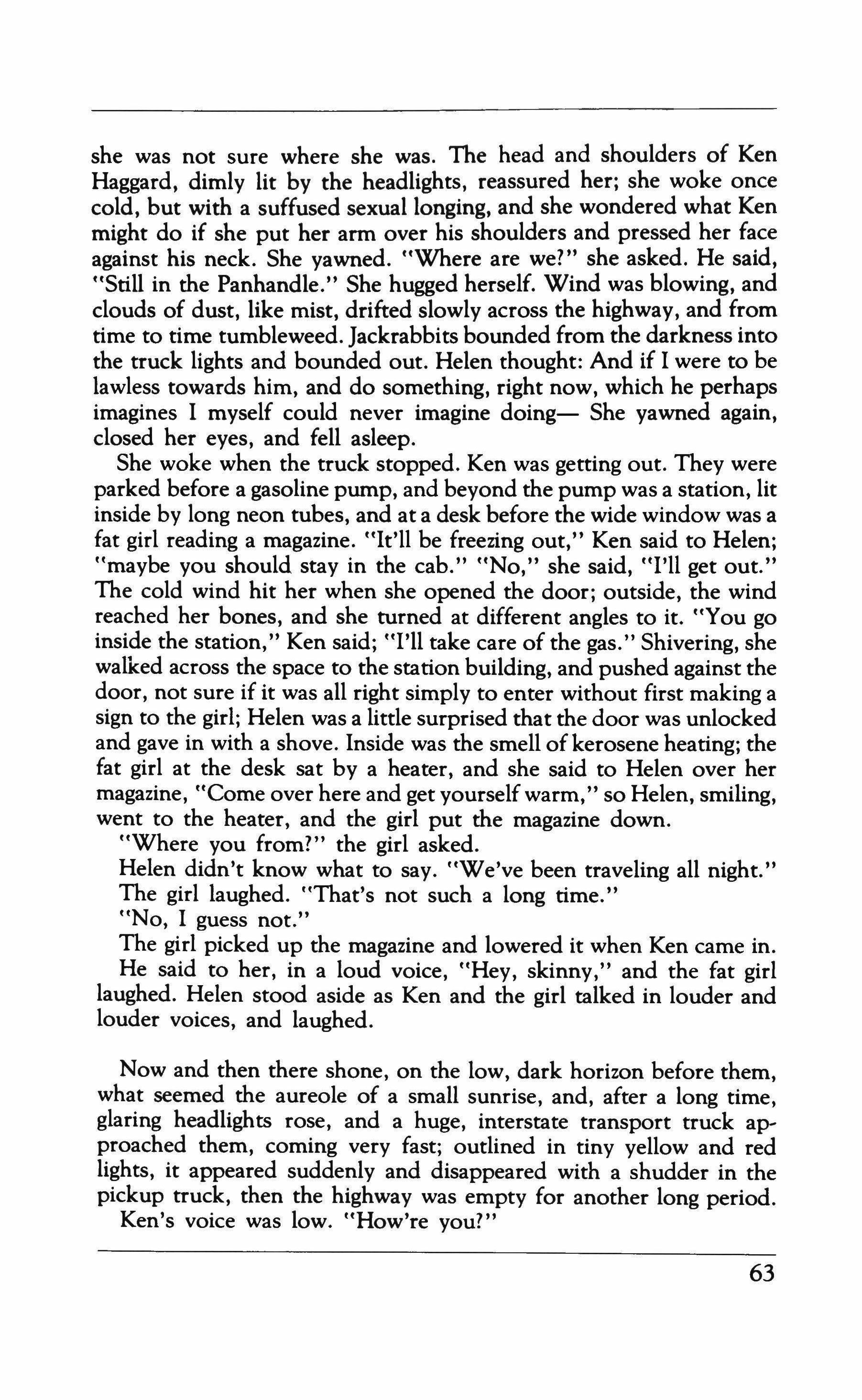
she was not sure where she was. The head and shoulders of Ken Haggard, dimly lit by the headlights, reassured her; she woke once cold, but with a suffused sexual longing, and she wondered what Ken might do if she put her arm over his shoulders and pressed her face against his neck. She yawned. "Where are we?" she asked. He said, "Still in the Panhandle!' She hugged herself. Wind was blowing, and clouds of dust, like mist, drifted slowly across the highway, and from time to time tumbleweed. Jackrabbits bounded from the darkness into the truck lights and bounded out. Helen thought: And if I were to be lawless towards him, and do something, right now, which he perhaps imagines I myself could never imagine doing- She yawned again, closed her eyes, and fell asleep.
She woke when the truck stopped. Ken was getting out. They were parked before a gasoline pump, and beyond the pump was a station, lit inside by long neon tubes, and at a desk before the wide window was a fat girl reading a magazine. "It'll be freezing out:' Ken said to Helen; "maybe you should stay in the cab." "No," she said, "I'll get out." The cold wind hit her when she opened the door; outside, the wind reached her bones, and she turned at different angles to it. "You go inside the station," Ken said; "I'll take care of the gas." Shivering, she walked across the space to the station building, and pushed against the door, not sure if it was all right simply to enter without first making a sign to the girl; Helen was a little surprised that the door was unlocked and gave in with a shove. Inside was the smell ofkerosene heating; the fat girl at the desk sat by a heater, and she said to Helen over her magazine, "Come over here and get yourselfwarm," so Helen, smiling, went to the heater, and the girl put the magazine down.
"Where you from?" the girl asked.
Helen didn't know what to say. "We've been traveling all night."
The girl laughed. "That's not such a long time."
"No, I guess not."
The girl picked up the magazine and lowered it when Ken came in.
He said to her, in a loud voice, "Hey, skinny," and the fat girl laughed. Helen stood aside as Ken and the girl talked in louder and louder voices, and laughed.
Now and then there shone, on the low, dark horizon before them, what seemed the aureole of a small sunrise, and, after a long time, glaring headlights rose, and a huge, interstate transport truck approached them, coming very fast; outlined in tiny yellow and red lights, it appeared suddenly and disappeared with a shudder in the pickup truck, then the highway was empty for another long period.
Ken's voice was low. "How're you?"
63
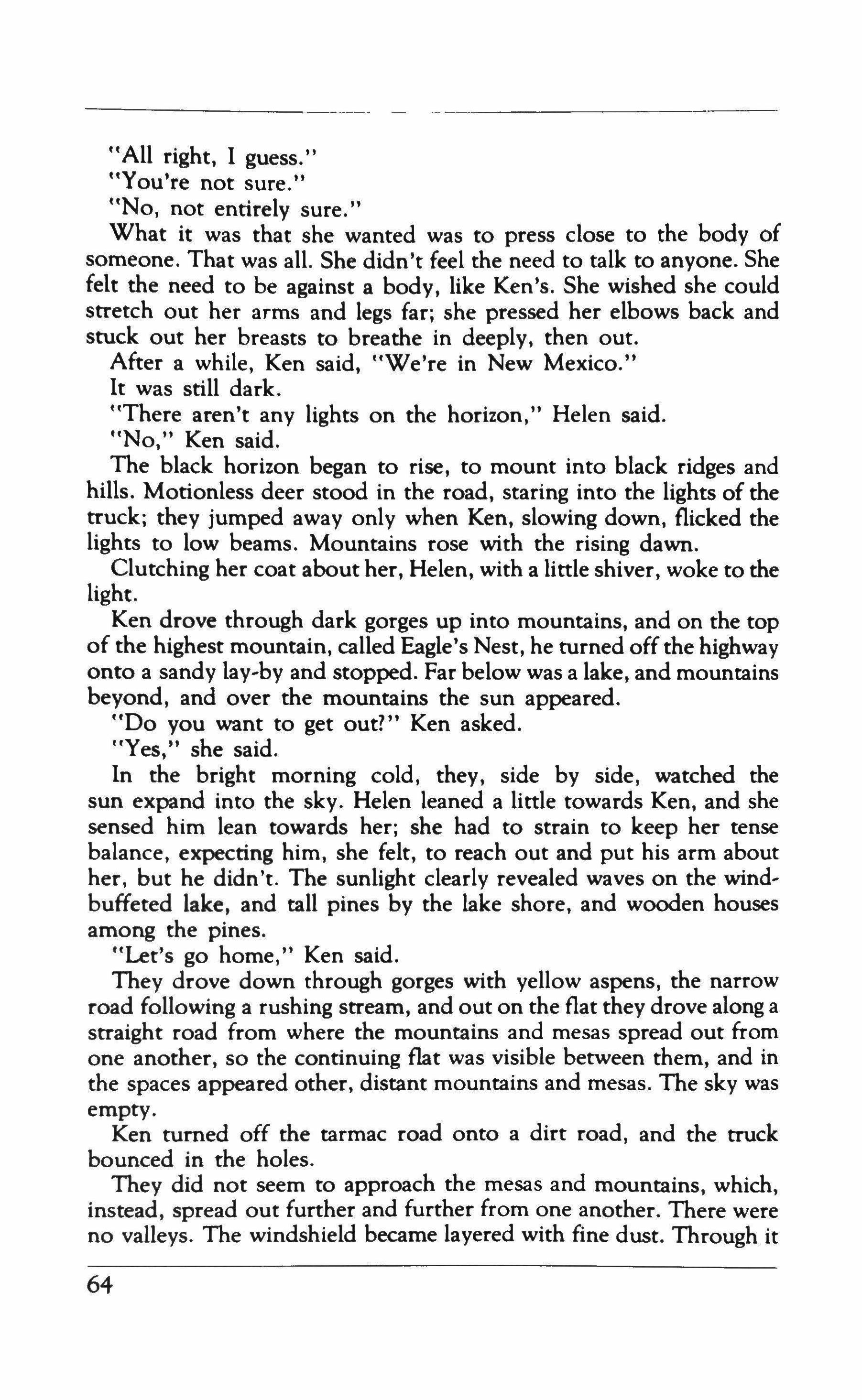
"All right, I guess."
"You're not sure."
"No, not entirely sure."
What it was that she wanted was to press close to the body of someone. That was all. She didn't feel the need to talk to anyone. She felt the need to be against a body, like Ken's. She wished she could stretch out her arms and legs far; she pressed her elbows back and stuck out her breasts to breathe in deeply, then out.
After a while, Ken said, "We're in New Mexico."
It was still dark.
"There aren't any lights on the horizon," Helen said.
UNo," Ken said.
The black horizon began to rise, to mount into black ridges and hills. Motionless deer stood in the road, staring into the lights of the truck; they jumped away only when Ken, slowing down, flicked the lights to low beams. Mountains rose with the rising dawn.
Clutching her coat about her, Helen, with a little shiver, woke to the light.
Ken drove through dark gorges up into mountains, and on the top of the highest mountain, called Eagle's Nest, he turned off the highway onto a sandy lay-by and stopped. Far below was a lake, and mountains beyond, and over the mountains the sun appeared.
UDo you want to get out?" Ken asked.
"Yes," she said.
In the bright morning cold, they, side by side, watched the sun expand into the sky. Helen leaned a little towards Ken, and she sensed him lean towards her; she had to strain to keep her tense balance, expecting him, she felt, to reach out and put his arm about her, but he didn't. The sunlight clearly revealed waves on the windbuffeted lake, and tall pines by the lake shore, and wooden houses among the pines.
"Let's go home," Ken said.
They drove down through gorges with yellow aspens, the narrow road following a rushing stream, and out on the flat they drove along a straight road from where the mountains and mesas spread out from one another, so the continuing flat was visible between them, and in the spaces appeared other, distant mountains and mesas. The sky was empty.
Ken turned off the tarmac road onto a dirt road, and the truck bounced in the holes.
They did not seem to approach the mesas and mountains, which, instead, spread out further and further from one another. There were no valleys. The windshield became layered with fine dust. Through it
64
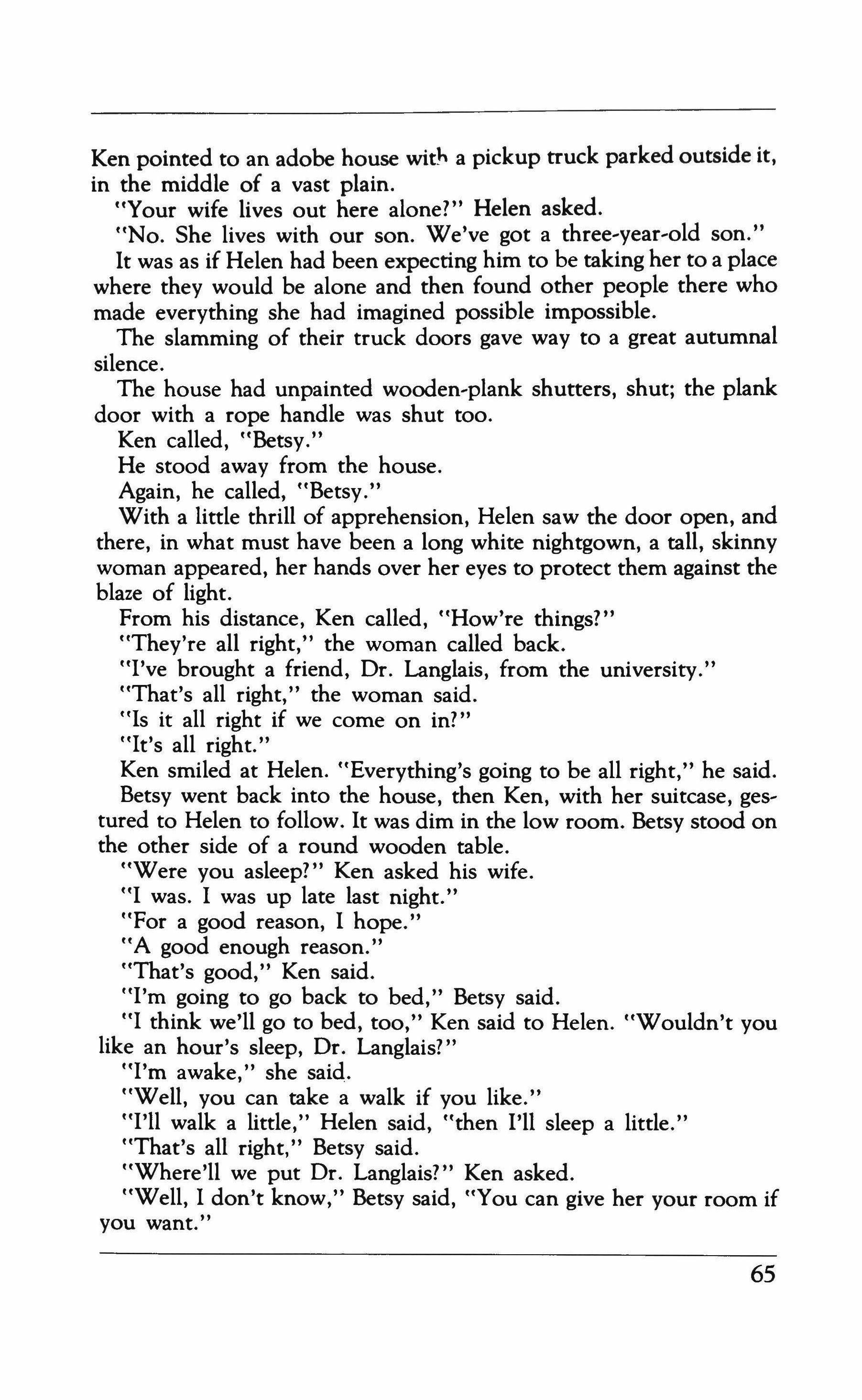
Ken pointed to an adobe house with a pickup truck parked outside it, in the middle of a vast plain.
"Your wife lives out here alone?" Helen asked.
"No. She lives with our son. We've got a three-year-old son."
It was as if Helen had been expecting him to be taking her to a place where they would be alone and then found other people there who made everything she had imagined possible impossible.
The slamming of their truck doors gave way to a great autumnal silence.
The house had unpainted wooden-plank shutters, shut; the plank door with a rope handle was shut too.
Ken called, "Betsy."
He stood away from the house.
Again, he called, "Betsy."
With a little thrill of apprehension, Helen saw the door open, and there, in what must have been a long white nightgown, a tall, skinny woman appeared, her hands over her eyes to protect them against the blaze of light.
From his distance, Ken called, "How're things?"
"They're all right," the woman called back.
"I've brought a friend, Dr. Langlais, from the university."
"That's all right," the woman said.
"Is it all right if we come on in?"
"It's all right."
Ken smiled at Helen. "Everything's going to be all right," he said.
Betsy went back into the house, then Ken, with her suitcase, gestured to Helen to follow. It was dim in the low room. Betsy stood on the other side of a round wooden table.
"Were you asleep?" Ken asked his wife.
"I was. I was up late last night."
"For a good reason, I hope."
"A good enough reason."
"That's good," Ken said.
"I'm going to go back to bed," Betsy said.
"I think we'll go to bed, too," Ken said to Helen. "Wouldn't you like an hour's sleep, Dr. Langlais?"
"I'm awake," she said.
"Well, you can take a walk if you like."
"I'll walk a little," Helen said, "then I'll sleep a little."
"That's all right," Betsy said.
"Where'll we put Dr. Langlais?" Ken asked.
"Well, I don't know," Betsy said, "You can give her your room if you want."
65
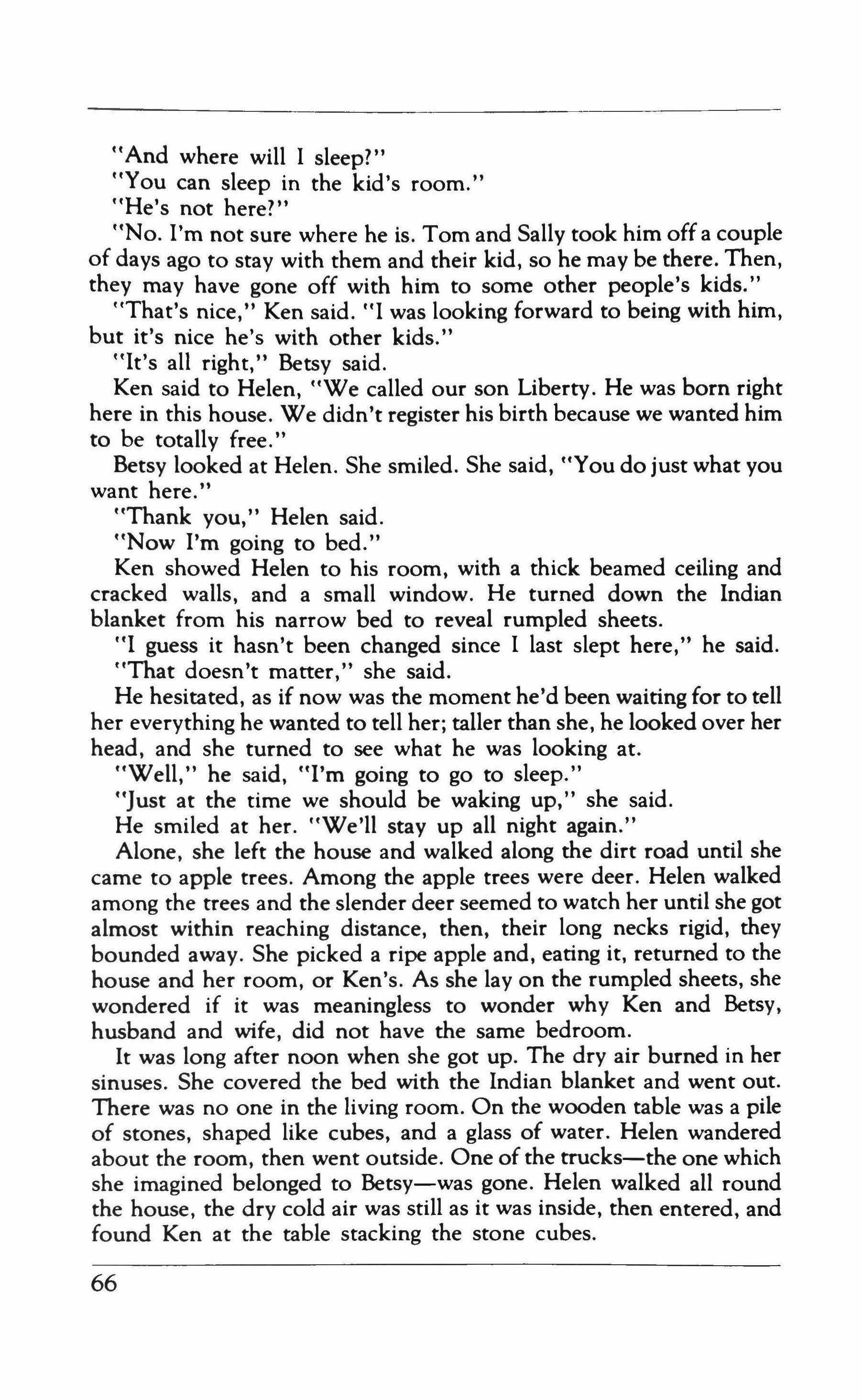
"And where will I sleep?"
"You can sleep in the kid's room."
"He's not here?"
UNo. I'm not sure where he is. Tom and Sally took him off a couple of days ago to stay with them and their kid, so he may be there. Then, they may have gone off with him to some other people's kids."
"That's nice," Ken said. "I was looking forward to being with him, but it's nice he's with other kids."
"It's all right," Betsy said.
Ken said to Helen, "We called our son Liberty. He was born right here in this house. We didn't register his birth because we wanted him to be totally free."
Betsy looked at Helen. She smiled. She said, "You do just what you want here."
"Thank you," Helen said.
"Now I'm going to bed."
Ken showed Helen to his room, with a thick beamed ceiling and cracked walls. and a small window. He turned down the Indian blanket from his narrow bed to reveal rumpled sheets.
"I guess it hasn't been changed since I last slept here," he said.
"That doesn't matter," she said.
He hesitated, as if now was the moment he'd been waiting for to tell her everything he wanted to tell her; taller than she, he looked over her head, and she turned to see what he was looking at.
"Well," he said, "I'm going to go to sleep."
"Just at the time we should be waking up," she said.
He smiled at her. "We'll stay up all night again."
Alone, she left the house and walked along the dirt road until she came to apple trees. Among the apple trees were deer. Helen walked among the trees and the slender deer seemed to watch her until she got almost within reaching distance, then, their long necks rigid, they bounded away. She picked a ripe apple and, eating it, returned to the house and her room, or Ken's. As she lay on the rumpled sheets, she wondered if it was meaningless to wonder why Ken and Betsy, husband and wife, did not have the same bedroom.
It was long after noon when she got up. The dry air burned in her sinuses. She covered the bed with the Indian blanket and went out. There was no one in the living room. On the wooden table was a pile of stones, shaped like cubes, and a glass of water. Helen wandered about the room, then went outside. One of the trucks-the one which she imagined belonged to Betsy-was gone. Helen walked all round the house, the dry cold air was still as it was inside, then entered, and found Ken at the table stacking the stone cubes.
66
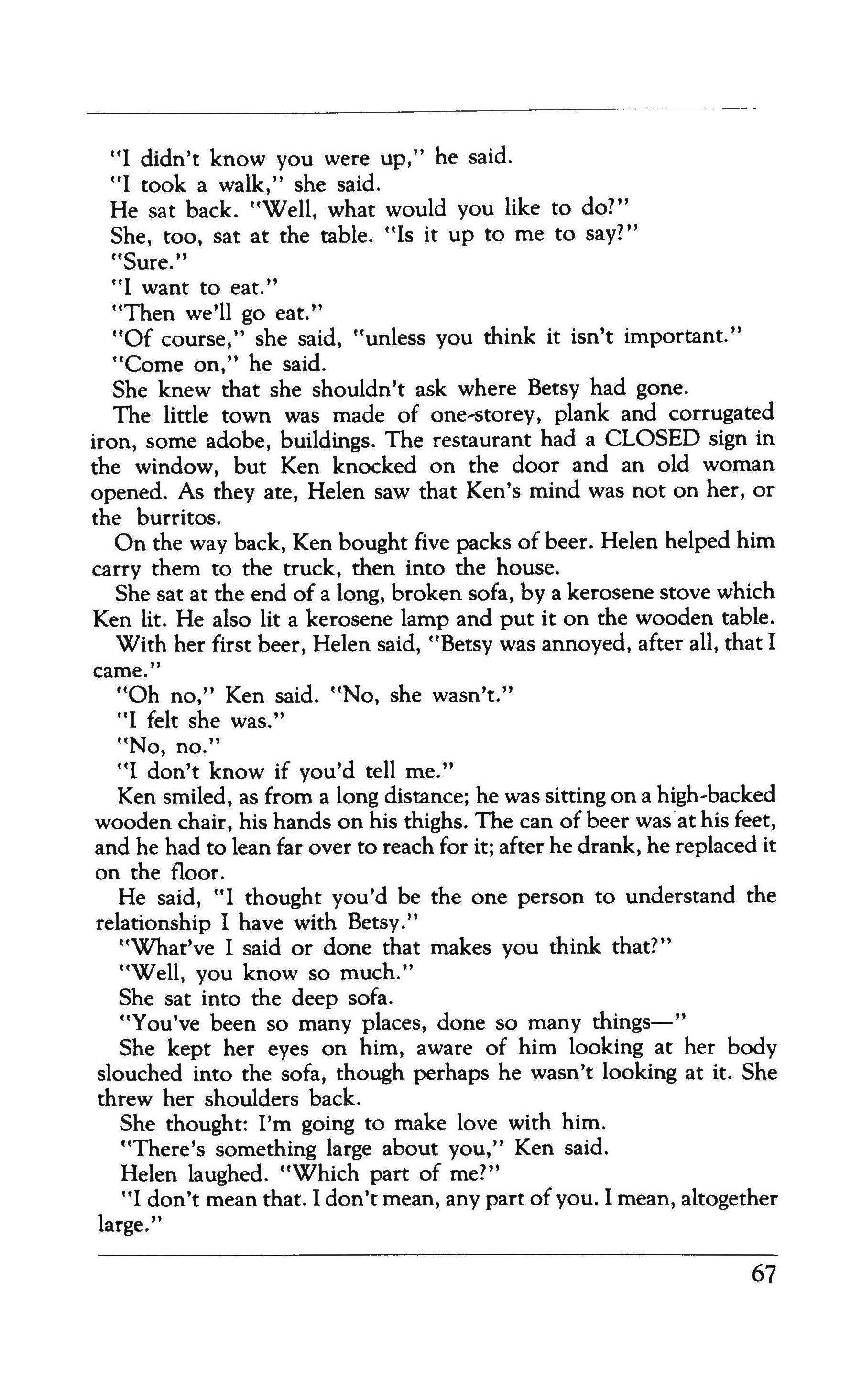
"I didn't know you were up," he said.
"I took a walk," she said.
He sat back. "Well, what would you like to do?"
She, too, sat at the table. "Is it up to me to say?"
"Sure."
"I want to eat."
"Then we'll go eat."
"Of course," she said, "unless you think it isn't important."
"Come on," he said.
She knew that she shouldn't ask where Betsy had gone.
The little town was made of one-storev, plank and corrugated iron, some adobe, buildings. The restaurant had a CLOSED sign in the window, but Ken knocked on the door and an old woman opened. As they ate, Helen saw that Ken's mind was not on her, or the burritos.
On the way back, Ken bought five packs of beer. Helen helped him carry them to the truck, then into the house.
She sat at the end of a long, broken sofa, by a kerosene stove which Ken lit. He also lit a kerosene lamp and put it on the wooden table.
With her first beer, Helen said, "Betsy was annoyed, after all, that I came.
"Oh no," Ken said. "No, she wasn't."
"I felt she was."
"No, no."
"I don't know if you'd tell me."
Ken smiled, as from a long distance; he was sitting on a high-backed wooden chair, his hands on his thighs. The can of beer wasat his feet, and he had to lean far over to reach for it; after he drank, he replaced it on the floor.
He said, "I thought you'd be the one person to understand the relationship I have with Betsy."
"What've I said or done that makes you think that?"
"Well, you know so much."
She sat into the deep sofa.
"You've been so many places, done so many things-"
She kept her eyes on him, aware of him looking at her body slouched into the sofa, though perhaps he wasn't looking at it. She threw her shoulders back.
She thought: I'm going to make love with him.
"There's something large about you," Ken said. Helen laughed. "Which part of me?"
"I don't mean that. I don't mean, any part of you. I mean, altogether large."
67
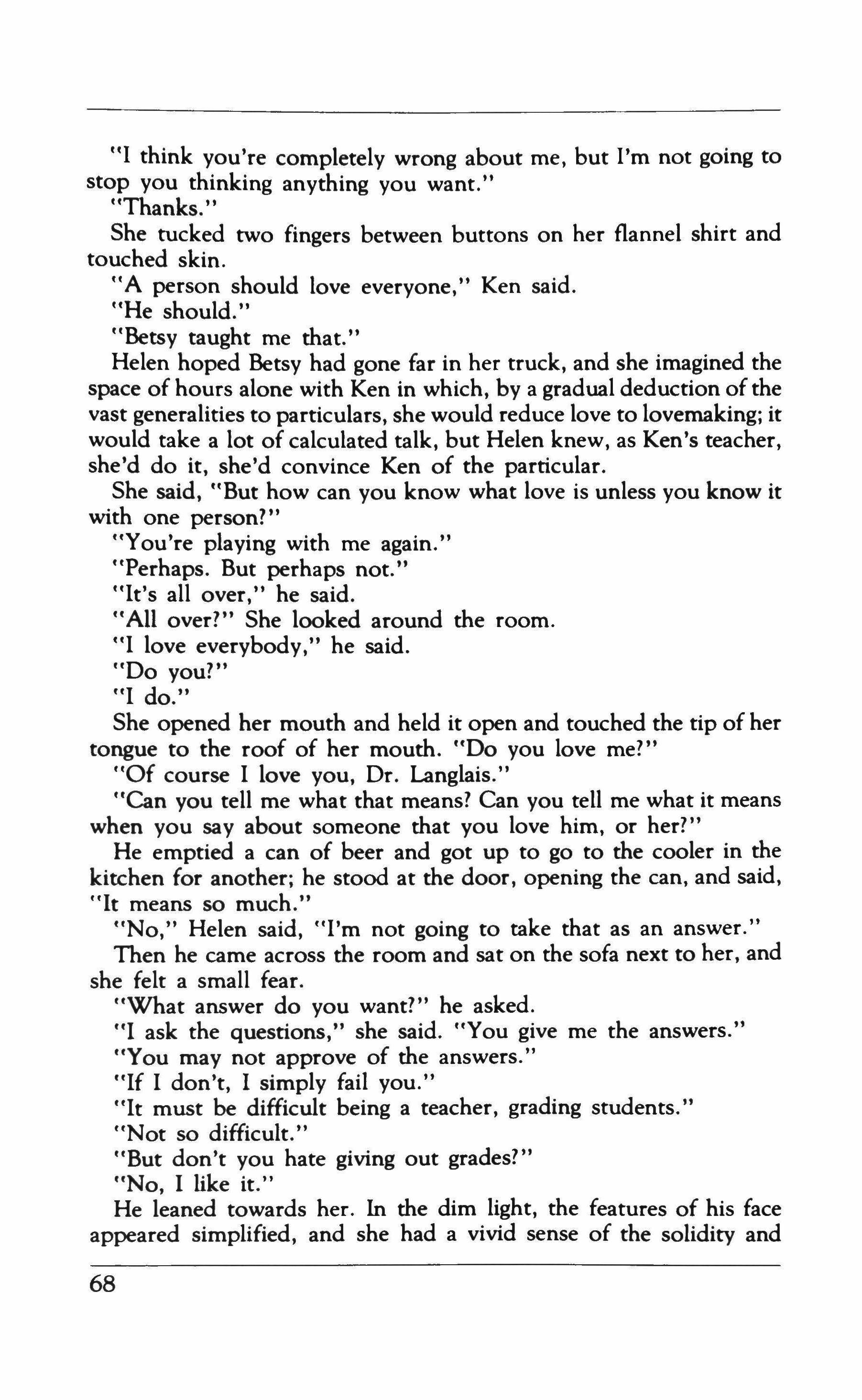
"I think you're completely wrong about me, but I'm not going to stop you thinking anything you want."
"Thanks."
She tucked two fingers between buttons on her flannel shirt and touched skin.
"A person should love everyone," Ken said.
"He should."
"Betsy taught me that."
Helen hoped Betsy had gone far in her truck, and she imagined the space of hours alone with Ken in which, by a gradual deduction of the vast generalities to particulars, she would reduce love to lovemaking; it would take a lot of calculated talk, but Helen knew, as Ken's teacher, she'd do it, she'd convince Ken of the particular.
She said, "But how can you know what love is unless you know it with one person?"
"You're playing with me again."
"Perhaps. But perhaps not."
"It's all over," he said.
"All over?" She looked around the room.
"I love everybody," he said.
"Do you?"
"I do."
She opened her mouth and held it open and touched the tip of her tongue to the roof of her mouth. "Do you love me?"
"Of course I love you, Dr. Langlais."
"Can you tell me what that means? Can you tell me what it means when you say about someone that you love him, or her?"
He emptied a can of beer and got up to go to the cooler in the kitchen for another; he stood at the door, opening the can, and said, "It means so much."
"No," Helen said, "I'm not going to take that as an answer."
Then he came across the room and sat on the sofa next to her, and she felt a small fear.
"What answer do you want?" he asked.
"I ask the questions," she said. "You give me the answers."
"You may not approve of the answers."
"If I don't, I simply fail you."
"It must be difficult being a teacher, grading students."
"Not so difficult."
"But don't you hate giving out grades?"
"No, I like it."
He leaned towards her. In the dim light, the features of his face appeared simplified, and she had a vivid sense of the solidity and
68

weight of his head. His voice was low. He said, "To love a person is to give that person all the freedom in the world." They were looking at one another. Slowly, she raised a hand, but just as she was about to reach forward to his head he drew away, and she quickly jerked her hand back and touched her own cheek, then ran her fingers through her hair.
Ken got up. "What would you like to do?" he asked. "Oh," she said, "let's see. How about going to the moon? I'd like to go to the moon."
ttyou're being ironical again."
"I guess I am." She sat up, raised her arms and lowered them, and said, "I'll do anything you want."
"All right," he said.
The dance hall had stuck all over its low ceiling shreds of red, blue, white crepe paper, and strings with broken balloons hung down. At one end of the hall, on a platform, two men and a woman played electric guitars and sang over amplifiers, their voices resonant in the hall, empty but for Helen and Ken on a bench at a table, two glasses and a pitcher of beer before them. Helen was sure Ken was thinking about his wife and his son, and she was also sure that if she said he was, he would say, "No, oh no." Into the dance hall came a couple, a young man and woman, both wearing boots, slim denims, checkered shirts, and stetsons, the brims rolled; they danced, and as they danced they glided through arc upon arc over the bare wooden floor, to the song about lost love. As she watched them, Helen felt tears rise to her eyes, and she had no idea why.
The second truck was not at the house when they returned.
"I think I'll go to bed," Helen said.
"You do what you want," Ken answered.
She left the door to her room open, and she heard Ken moving about the living room, then heard him go into the room next to hers, his son's room; he didn't shut the door, as she could hear him undress and get into bed. She wondered if he had left the door open on purpose, but she didn't know on what purpose. Unable to sleep, she lay listening for sounds from his room. She thought she heard him, from time to time, turn over in his bed, and whenever he did, she did, and she tried to do it so he would hear to let him know she was awake; the sheets came untucked. When she heard him groan a little, she waited for a while, then groaned, too, and waited for him to; a long while later he groaned again, and she groaned right away and waited, listening. She heard him get up and her body went rigid. The toilet flushed. She raised her head to stare out her doorway, but she couldn't
69
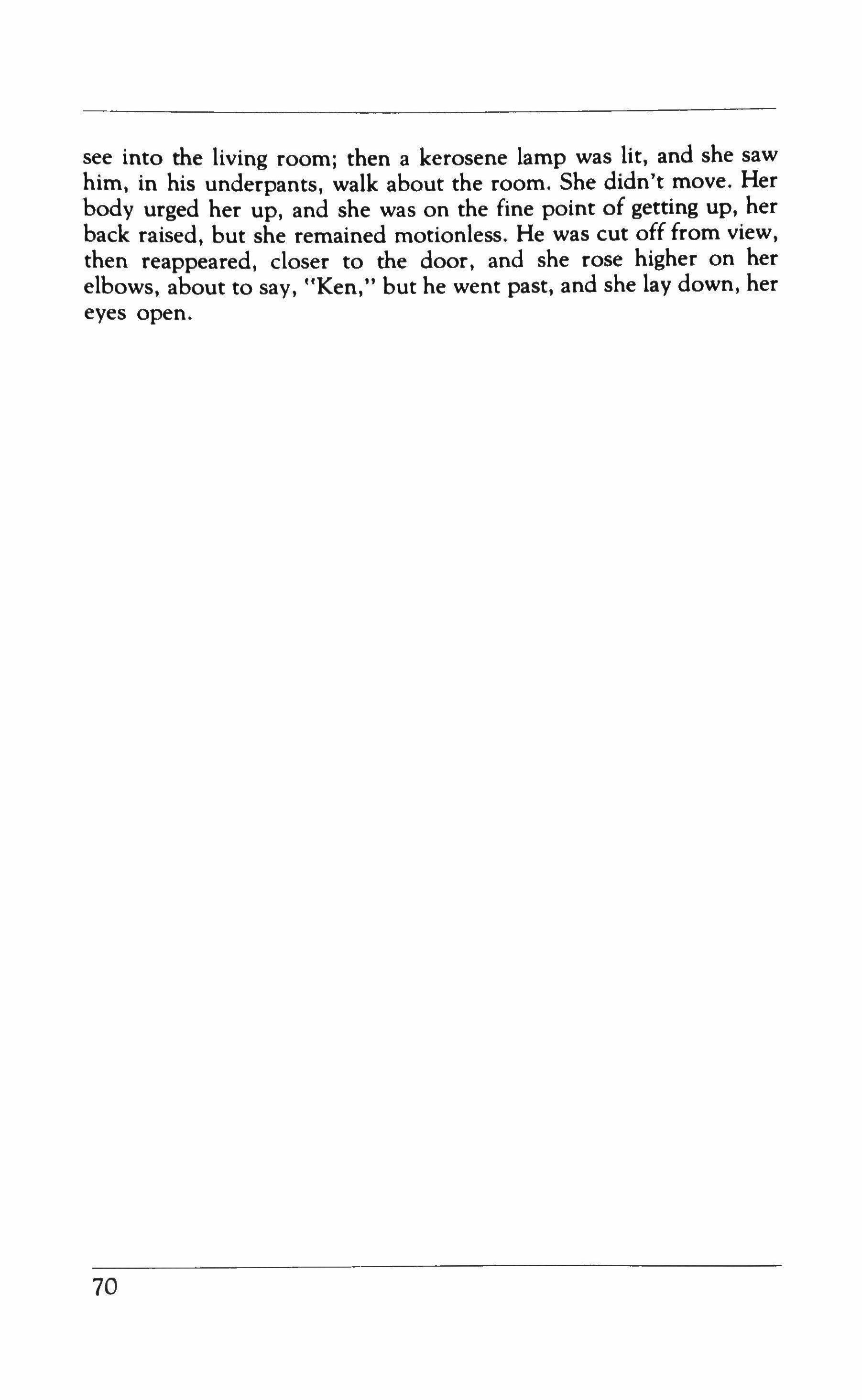
see into the living room; then a kerosene lamp was lit, and she saw him, in his underpants, walk about the room. She didn't move. Her body urged her up, and she was on the fine point of getting up, her back raised, but she remained motionless. He was cut off from view, then reappeared, closer to the door, and she rose higher on her elbows, about to say, "Ken," but he went past, and she lay down, her eyes open.
70
Seven poems
Roland Flint

last words
1
When the tornado hit, this man was horne, because he is retired, and he and his wife are watching TV in the living room. He goes to check the bedroom windows and the tornado sent a tree down on the house, on the bedroom, and on the man at the window. His wife ran into him and he called out to her: get back, honey-I'm crushed.
And I reach like this in my dark to a man with the everyday honey and warning in his last goodbye.
2
When the fifreen-vear-old runaway was found in the alley far down from the window she'd been thrown from, the father in Ohio carne to identify and take her horne.
And when he'd seen her, he said: she look like she been picked up and dropped-broke like glass. And it made me think of the brother in a play who wants his sister dead and then he sees his sister dead and says: mine eyes dazzle, she died young.
3
When Bob the aging poet's wife was dying at horne, this last thing happened: they were horne because she wished it, they still
71
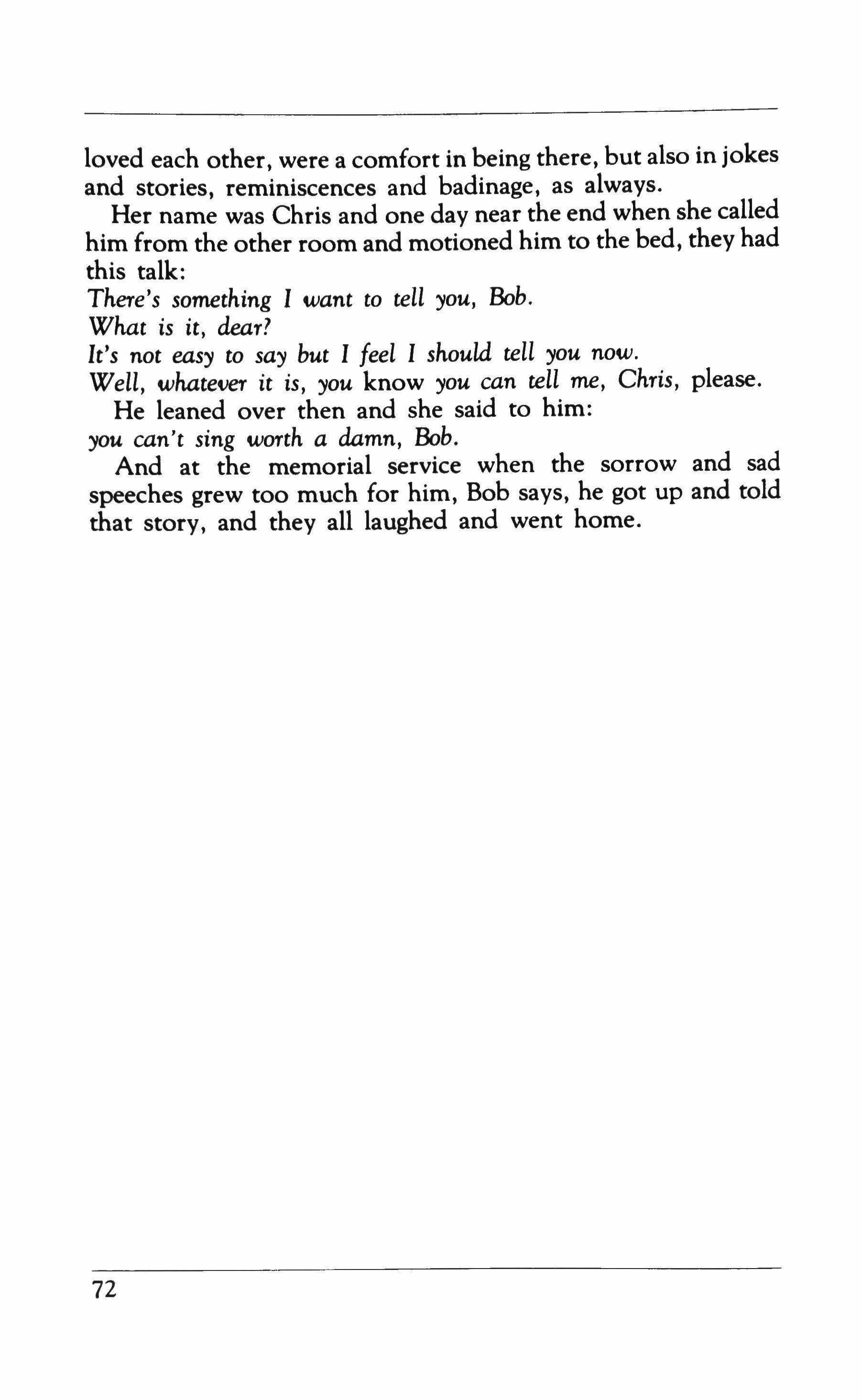
loved each other, were a comfort in being there, but also in jokes and stories, reminiscences and badinage, as always.
Her name was Chris and one day near the end when she called him from the other room and motioned him to the bed, they had this talk:
There's something I want to tell you, Bob. �hat is it, �r?
It's not easy to say but I feel I should tell you now. �ell, whatever it is, you know you can tell me, Chris, please. He leaned over then and she said to him: you can't sing worth a damn, Bob.
And at the memorial service when the sorrow and sad speeches grew too much for him, Bob says, he got up and told that story, and they all laughed and went home.
72
Aubade
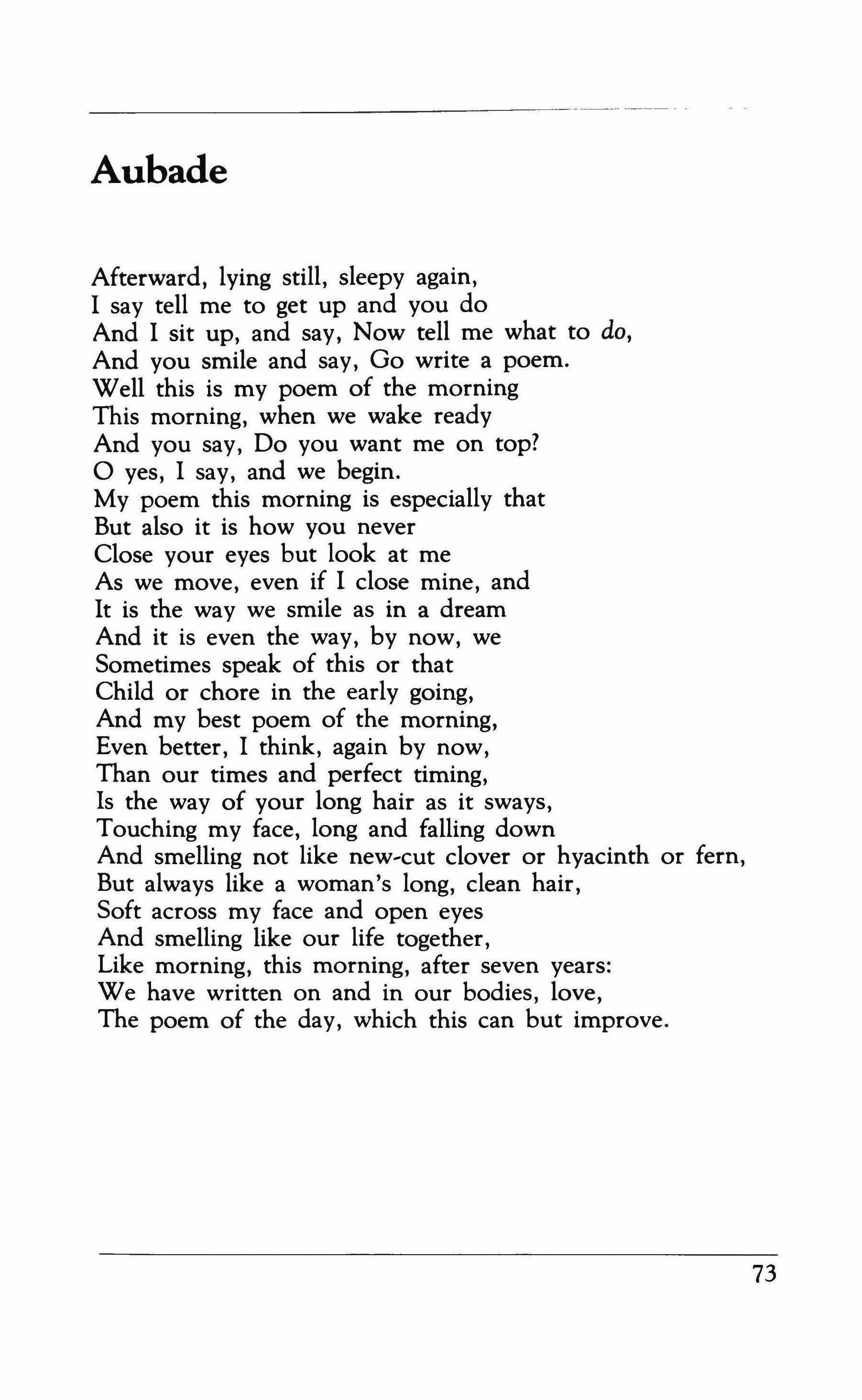
Afterward, lying still, sleepy again, I say tell me to get up and you do And I sit up, and say, Now tell me what to do, And you smile and say, Go write a poem. Well this is my poem of the morning This morning, when we wake ready And you say, Do you want me on top? o yes, I say, and we begin. My poem this morning is especially that But also it is how you never Close your eyes but look at me As we move, even if I close mine, and It is the way we smile as in a dream And it is even the way, by now, we Sometimes speak of this or that Child or chore in the early going, And my best poem of the morning, Even better, I think, again by now, Than our times and perfect timing, Is the way of your long hair as it sways, Touching my face, long and falling down And smelling not like new-cut clover or hyacinth or fern, But always like a woman's long, clean hair, Soft across my face and open eyes And smelling like our life together, Like morning, this morning, after seven years: We have written on and in our bodies, love, The poem of the day, which this can but improve.
73
He didn't even know he was a

Pigeon: until the day in New York City
When he'd left the rented nest & her He's often called a nest & was walking, Bad hungover from the pre-wedding bash To his favorite Wolf's (52nd & 7th) For bagel, egg & aspirin, And his path was blocked by Pigeons & then just one, Fat, rumpled, grouchy, clumsy, And he and the pigeon did A little dance before finding
The paths around, & he- thought Oh God, I danced like that last night At the fancy dinner, dressed just Like a pigeon in the rented tux, Colliding with the bride's mother, Saying some dumb pigeon-yiddish, & pigeon Dancing, drunk & bumbling, Stumbling by: pigeon, plain As pigeon.
74
Pigeon wonders again
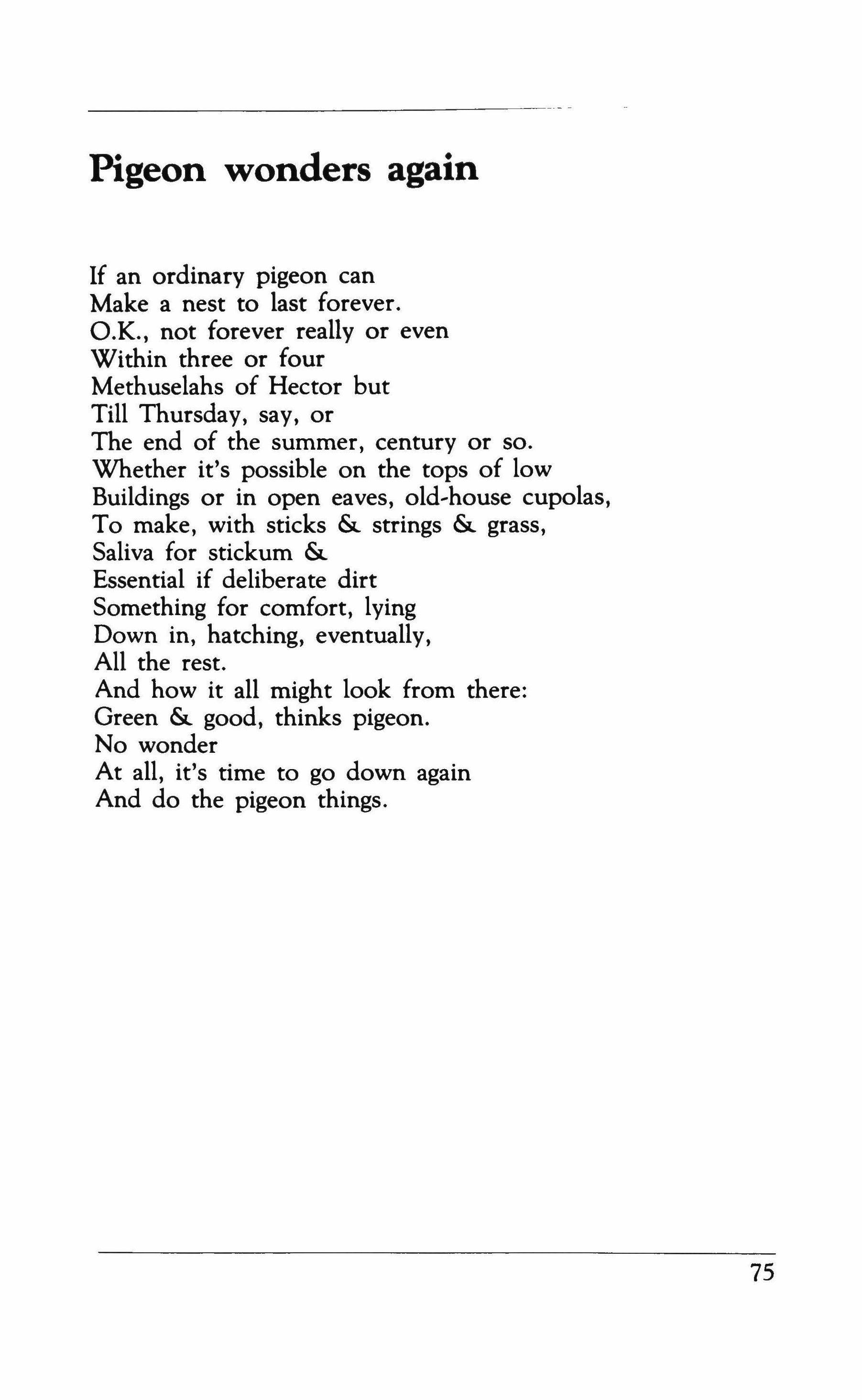
If an ordinary pigeon can Make a nest to last forever.
O.K., not forever really or even Within three or four Methuselahs of Hector but Till Thursday, say, or The end of the summer, century or so. Whether it's possible on the tops of low Buildings or in open eaves, old-house cupolas, To make, with sticks & strings & grass, Saliva for stickum & Essential if deliberate dirt
Something for comfort, lying Down in, hatching, eventually, All the rest. And how it all might look from there: Green & good, thinks pigeon. No wonder
At all, it's time to go down again And do the pigeon things.
75
God bless invention pigeon

Says, because When his lady's broken thigh Was, though mending, muscle-knotted Like a fist (her size) And, as she lay beside him, After dinner having tea, Rubbing it gingerly with her left hand, Then invention came a little Giving him the metal tea-pot, Hot but not too hot (through the sheet) To iron the knot out, steady & hard, Agitato rna non troppo, For half an hour.
Pigeon says God bless it because Her leg felt better all night To let her sleep, for a change, And also bless invention for The ways she rubbed him back: Now there's a rub, by God. God bless it too-& does.
76
Nearing their official
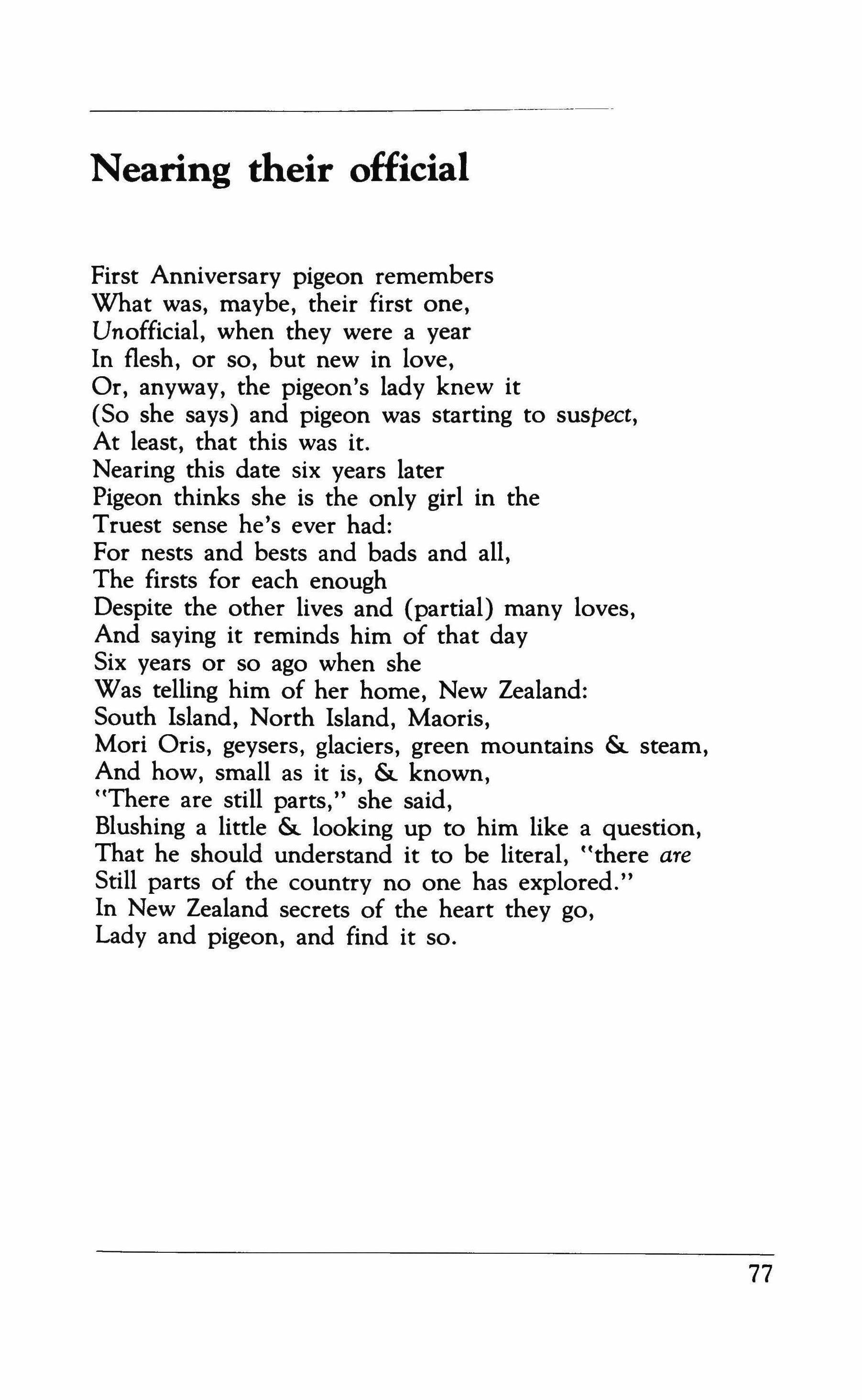
First Anniversary pigeon remembers What was, maybe, their first one, Unofficial, when they were a year In flesh, or so, but new in love, Or, anyway, the pigeon's lady knew it (So she says) and pigeon was starting to suspect, At least, that this was it.
Nearing this date six years later
Pigeon thinks she is the only girl in the Truest sense he's ever had: For nests and bests and bads and all, The firsts for each enough
Despite the other lives and (partial) many loves, And saying it reminds him of that day
Six years or so ago when she Was telling him of her home, New Zealand: South Island, North Island, Maoris, Mori Oris, geysers, glaciers, green mountains & steam, And how, small as it is, & known, (There are still parts," she said, Blushing a little & looking up to him like a question, That he should understand it to be literal, "there are Still parts of the country no one has explored." In New Zealand secrets of the heart they go, Lady and pigeon, and find it so.
77
It seems that after writing twenty-eight days without a pause
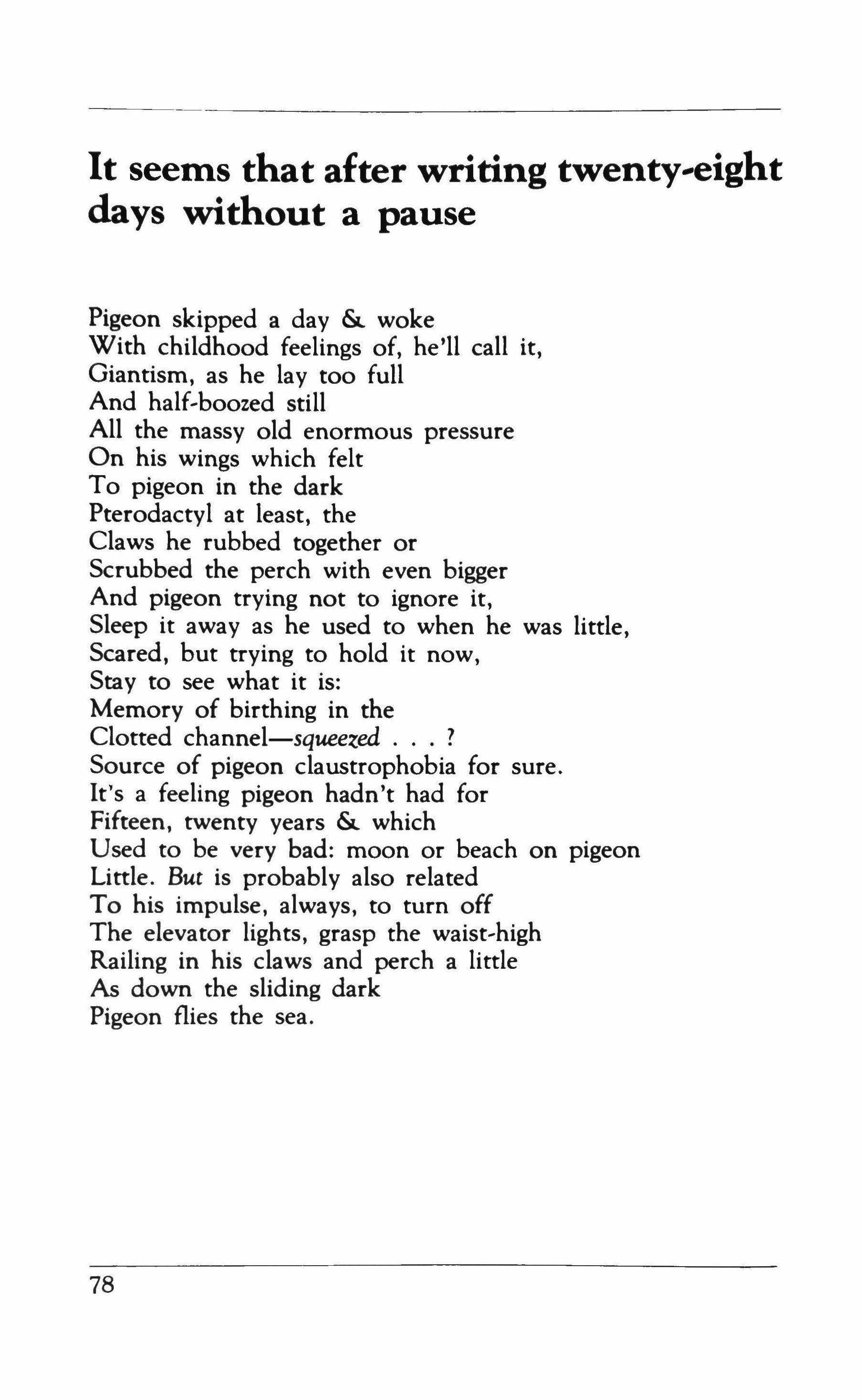
Pigeon skipped a day & woke With childhood feelings of, he'll call it, Giantism, as he lay too full And half-boozed still
All the massy old enormous pressure On his wings which felt To pigeon in the dark
Pterodactyl at least, the Claws he rubbed together or Scrubbed the perch with even bigger And pigeon trying not to ignore it, Sleep it away as he used to when he was little, Scared, but trying to hold it now, Stay to see what it is:
Memory of birthing in the Clotted channel-squeezed ?
Source of pigeon claustrophobia for sure. It's a feeling pigeon hadn't had for Fifteen, twenty years & which Used to be very bad: moon or beach on pigeon Little. But is probably also related To his impulse, always, to turn off The elevator lights, grasp the waist-high Railing in his claws and perch a little As down the sliding dark
Pigeon flies the sea.
78
The lake series, 1981-1982
Steven D. Foster
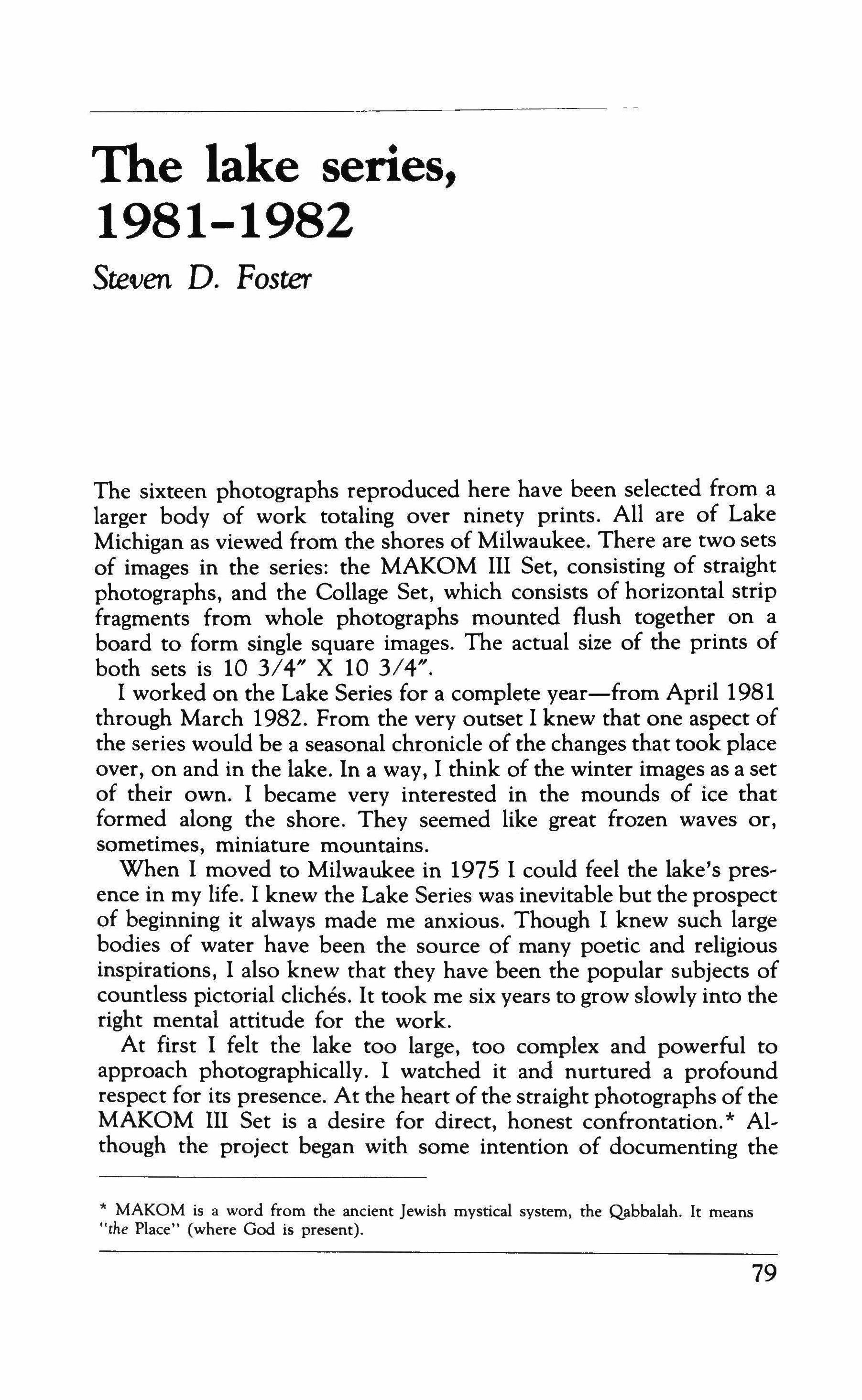
The sixteen photographs reproduced here have been selected from a larger body of work totaling over ninety prints. All are of Lake Michigan as viewed from the shores of Milwaukee. There are two sets of images in the series: the MAKOM III Set, consisting of straight photographs, and the Collage Set, which consists of horizontal strip fragments from whole photographs mounted flush together on a board to form single square images. The actual size of the prints of both sets is 10 3/4" X 10 3/4".
I worked on the Lake Series for a complete year-from April 1981 through March 1982. From the very outset I knew that one aspect of the series would be a seasonal chronicle of the changes that took place over, on and in the lake. In a way, I think of the winter images as a set of their own. I became very interested in the mounds of ice that formed along the shore. They seemed like great frozen waves or, sometimes, miniature mountains.
When I moved to Milwaukee in 1975 I could feel the lake's presence in my life. I knew the Lake Series was inevitable but the prospect of beginning it always made me anxious. Though I knew such large bodies of water have been the source of many poetic and religious inspirations, I also knew that they have been the popular subjects of countless pictorial cliches. It took me six years to grow slowly into the right mental attitude for the work.
At first I felt the lake too large, too complex and powerful to approach photographically. I watched it and nurtured a profound respect for its presence. At the heart of the straight photographs of the MAKOM III Set is a desire for direct, honest confrontation. * AI� though the project began with some intention of documenting the
* MAKOM is a word from the ancient Jewish mystical system, the Qabbalah. It means "the Place" (where God is present).
79
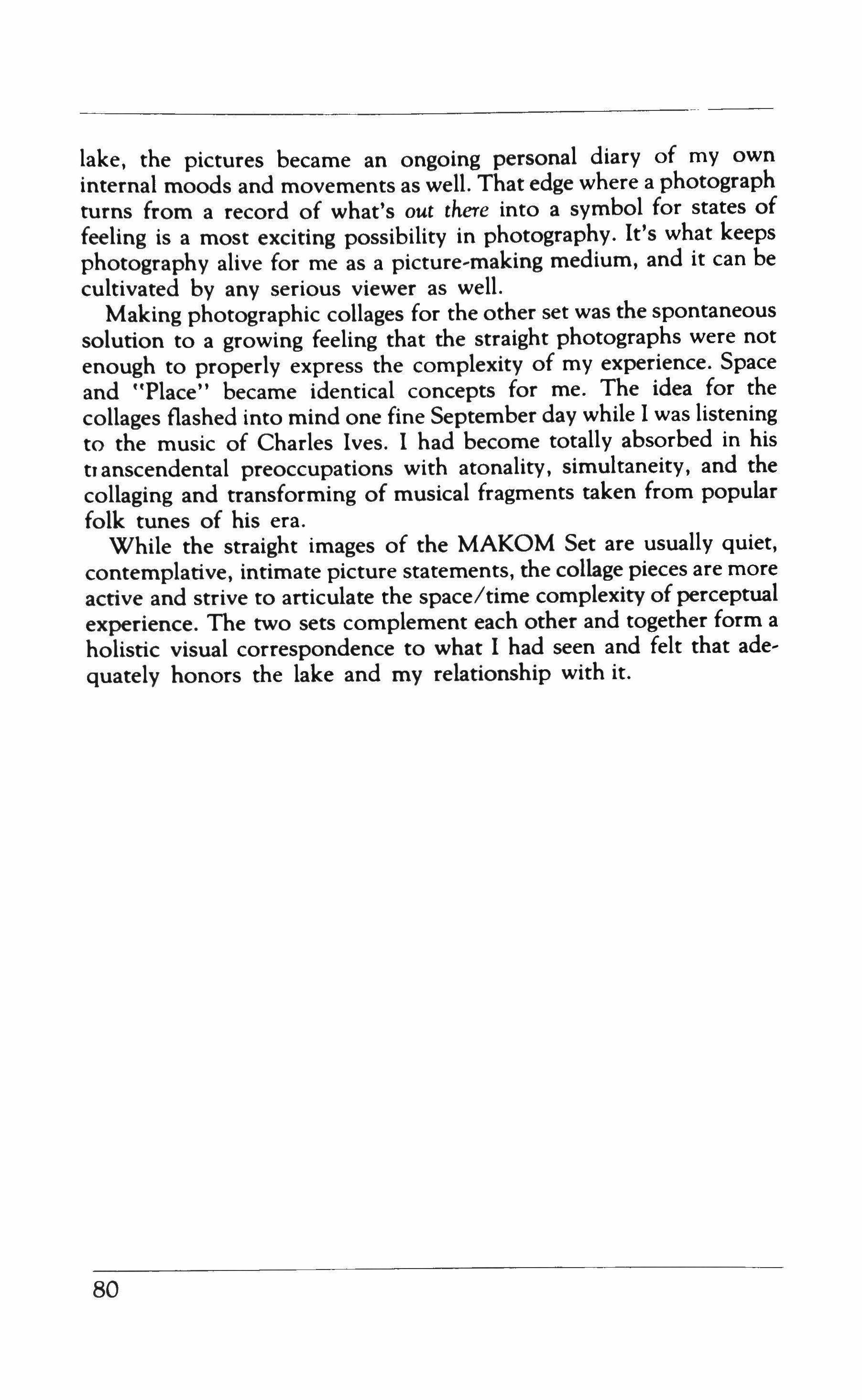
lake, the pictures became an ongoing personal diary of my own internal moods and movements as well. That edge where a photograph turns from a record of what's out there into a symbol for states of feeling is a most exciting possibility in photography. It's what keeps photography alive for me as a picture-making medium, and it can be cultivated by any serious viewer as well.
Making photographic collages for the other set was the spontaneous solution to a growing feeling that the straight photographs were not enough to properly express the complexity of my experience. Space and "Place" became identical concepts for me. The idea for the collages flashed into mind one fine September day while I was listening to the music of Charles Ives. I had become totally absorbed in his tr anscendental preoccupations with atonality, simultaneity, and the collaging and transforming of musical fragments taken from popular folk tunes of his era.
While the straight images of the MAKOM Set are usually quiet, contemplative, intimate picture statements, the collage pieces are more active and strive to articulate the space/time complexity of perceptual experience. The two sets complement each other and together form a holistic visual correspondence to what I had seen and felt that adequately honors the lake and my relationship with it.
80
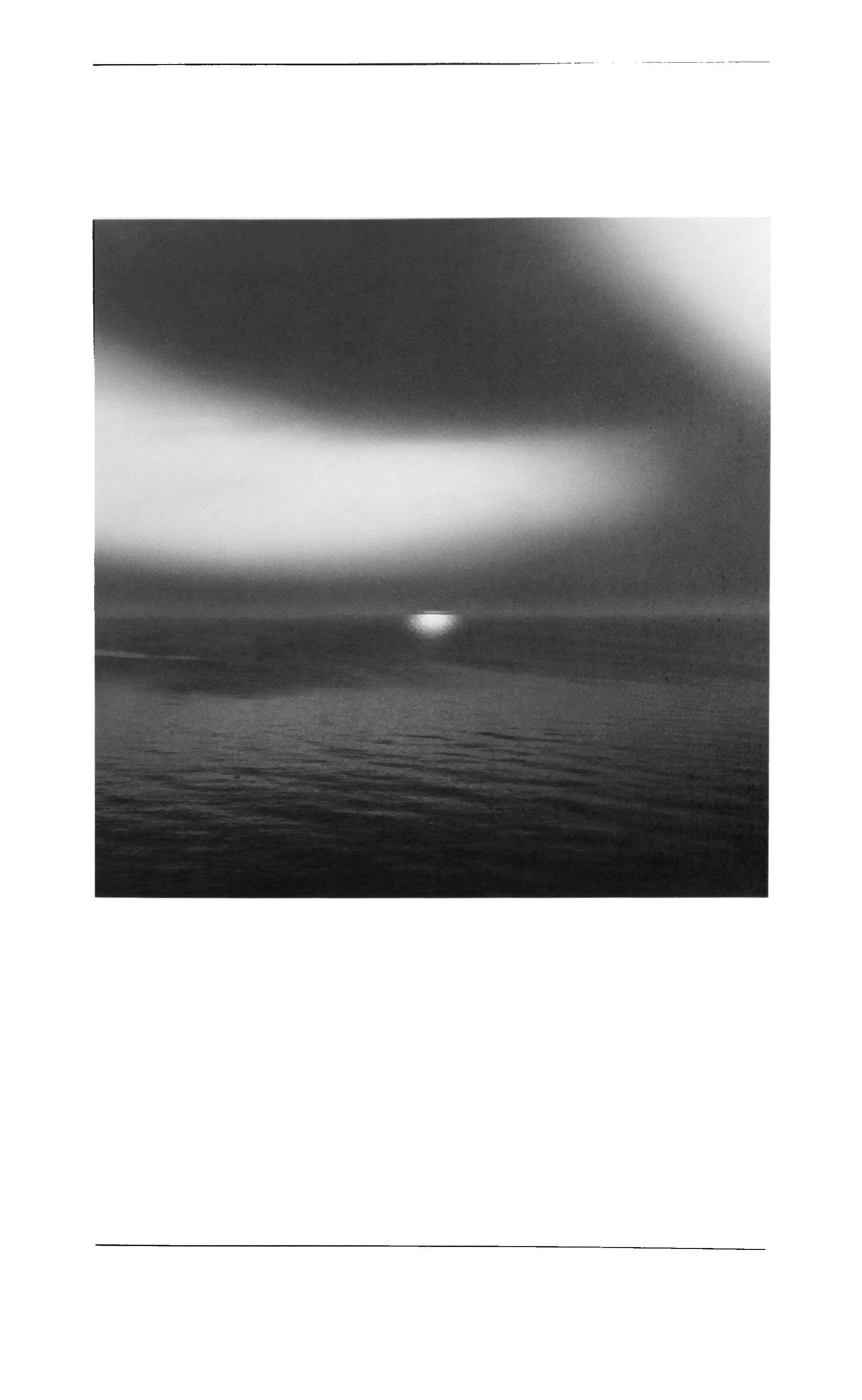
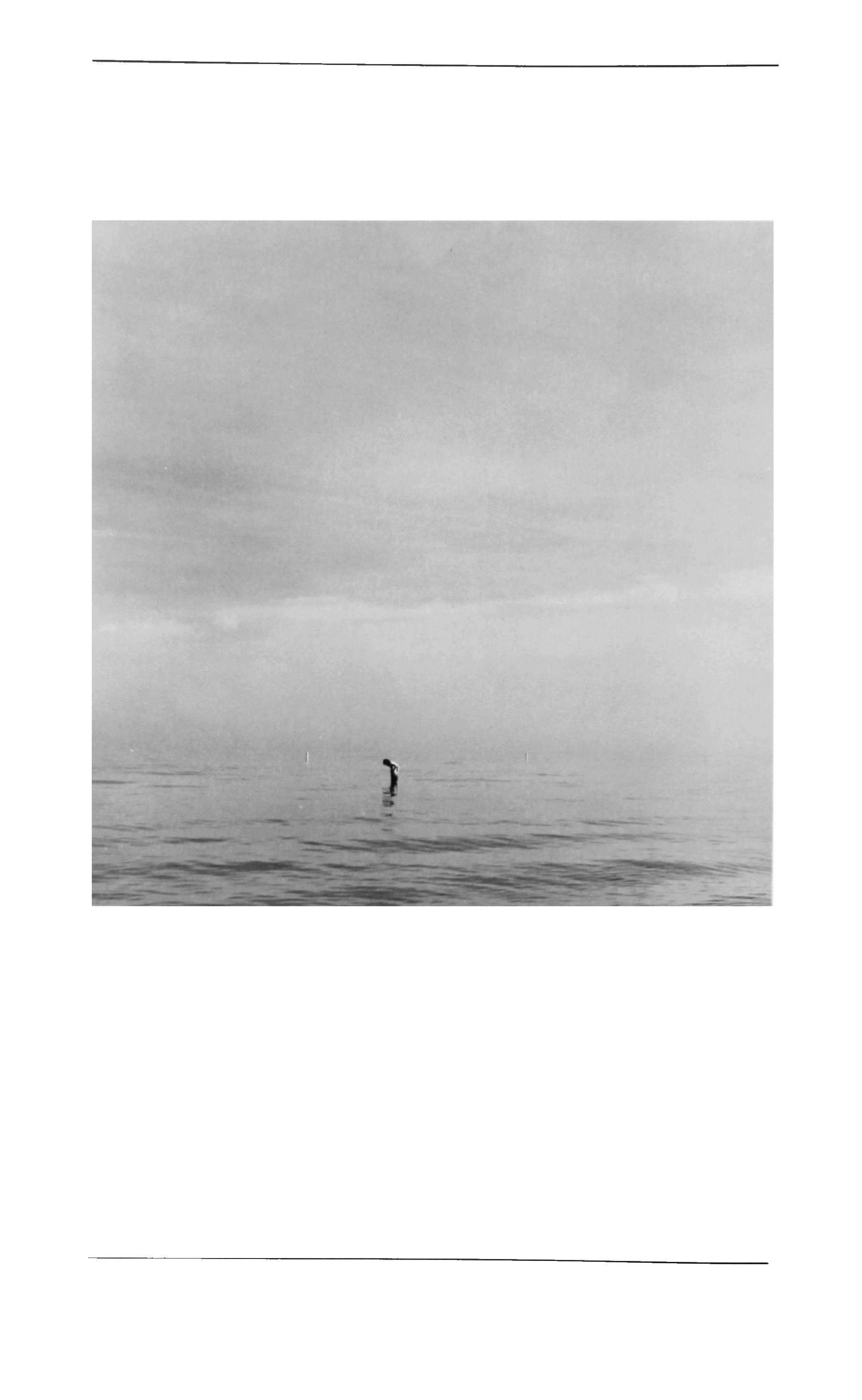
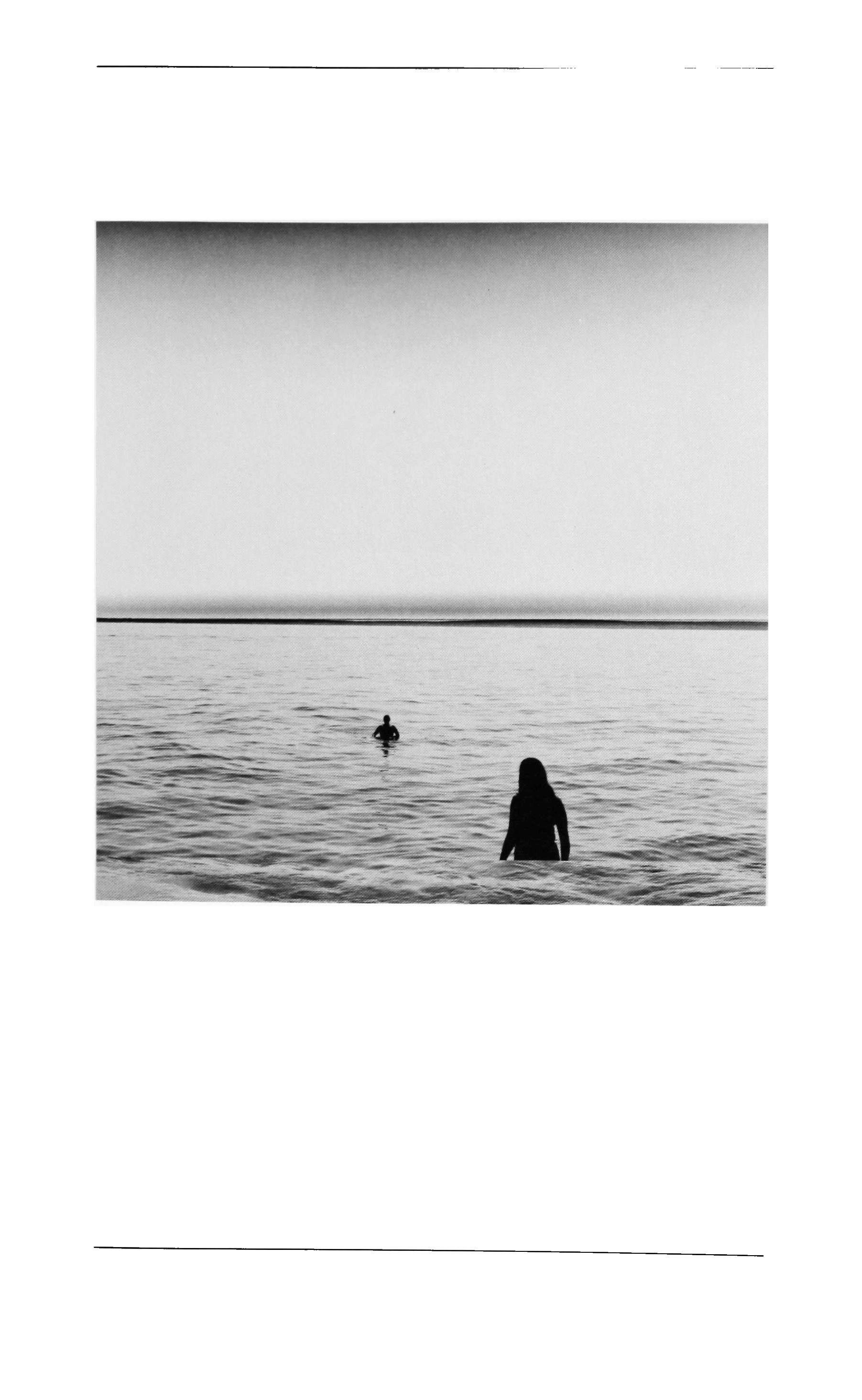
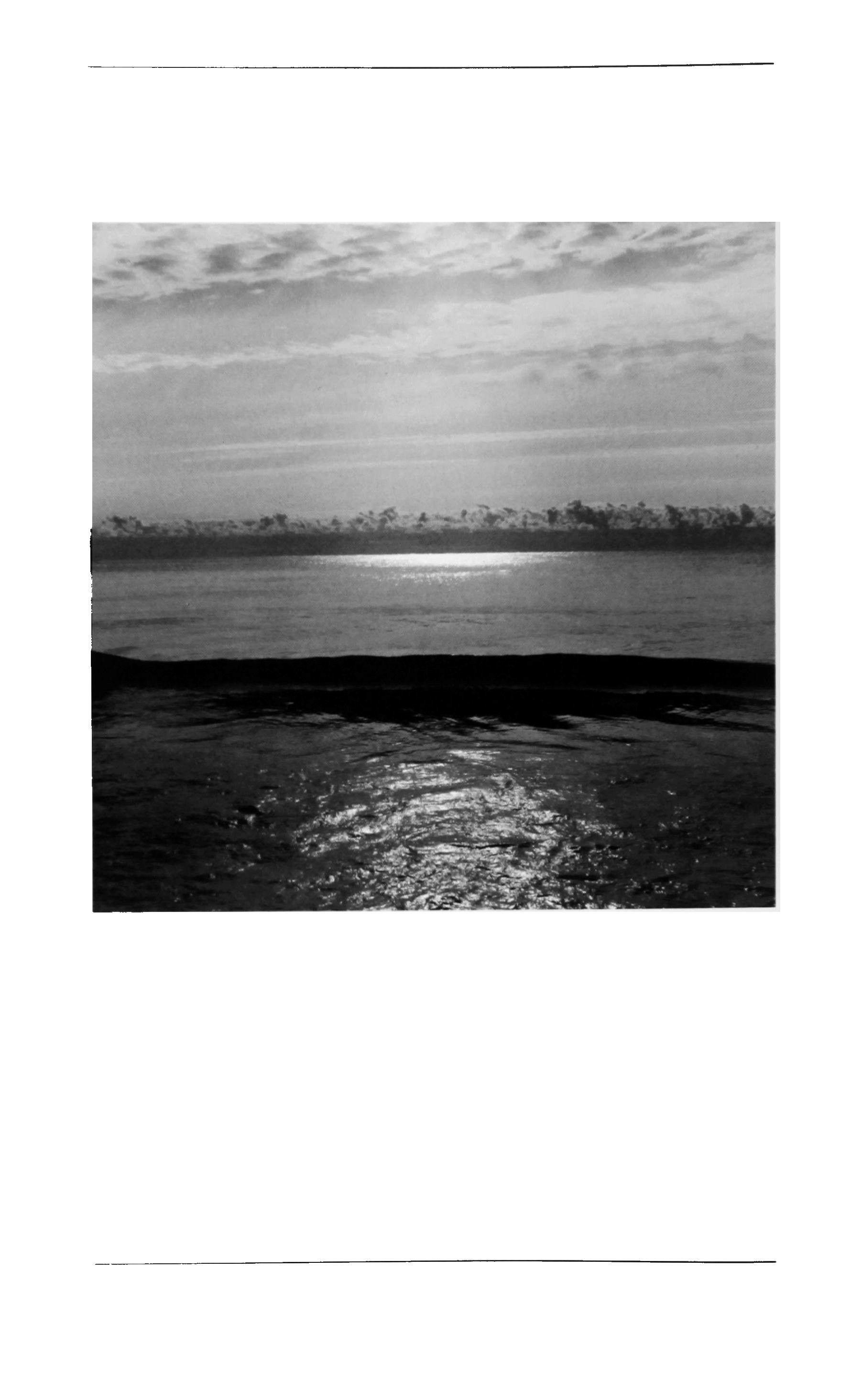
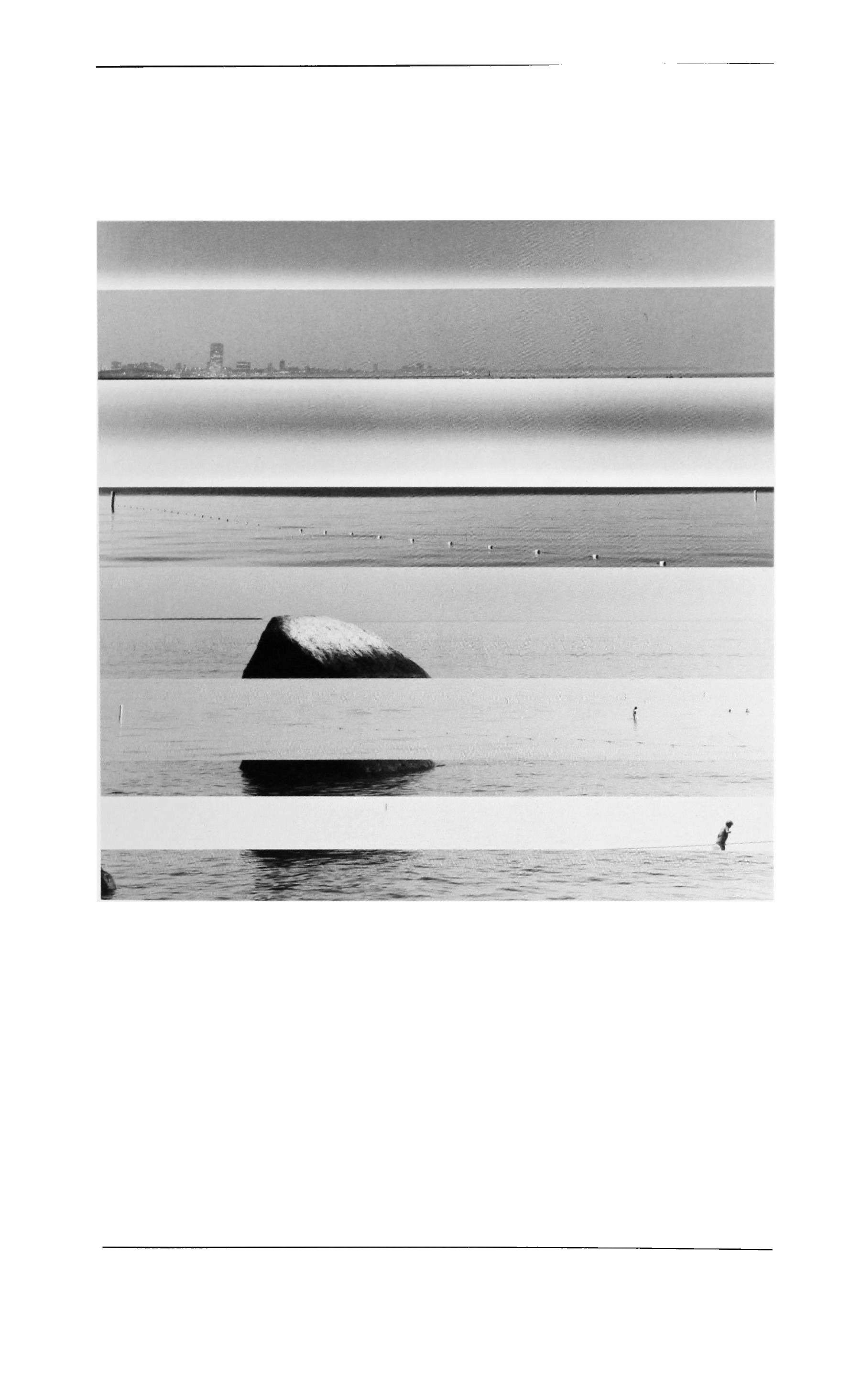
i
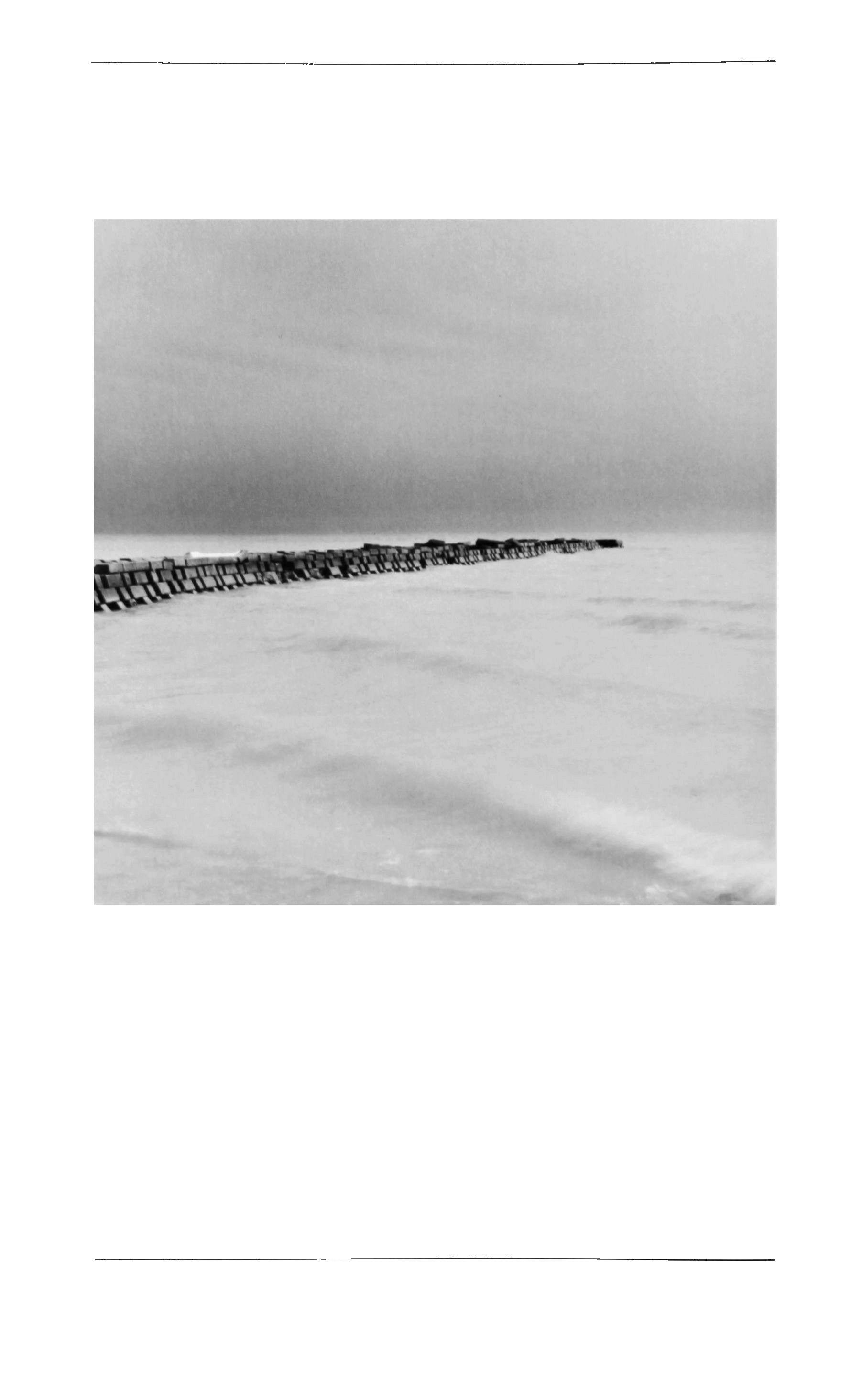

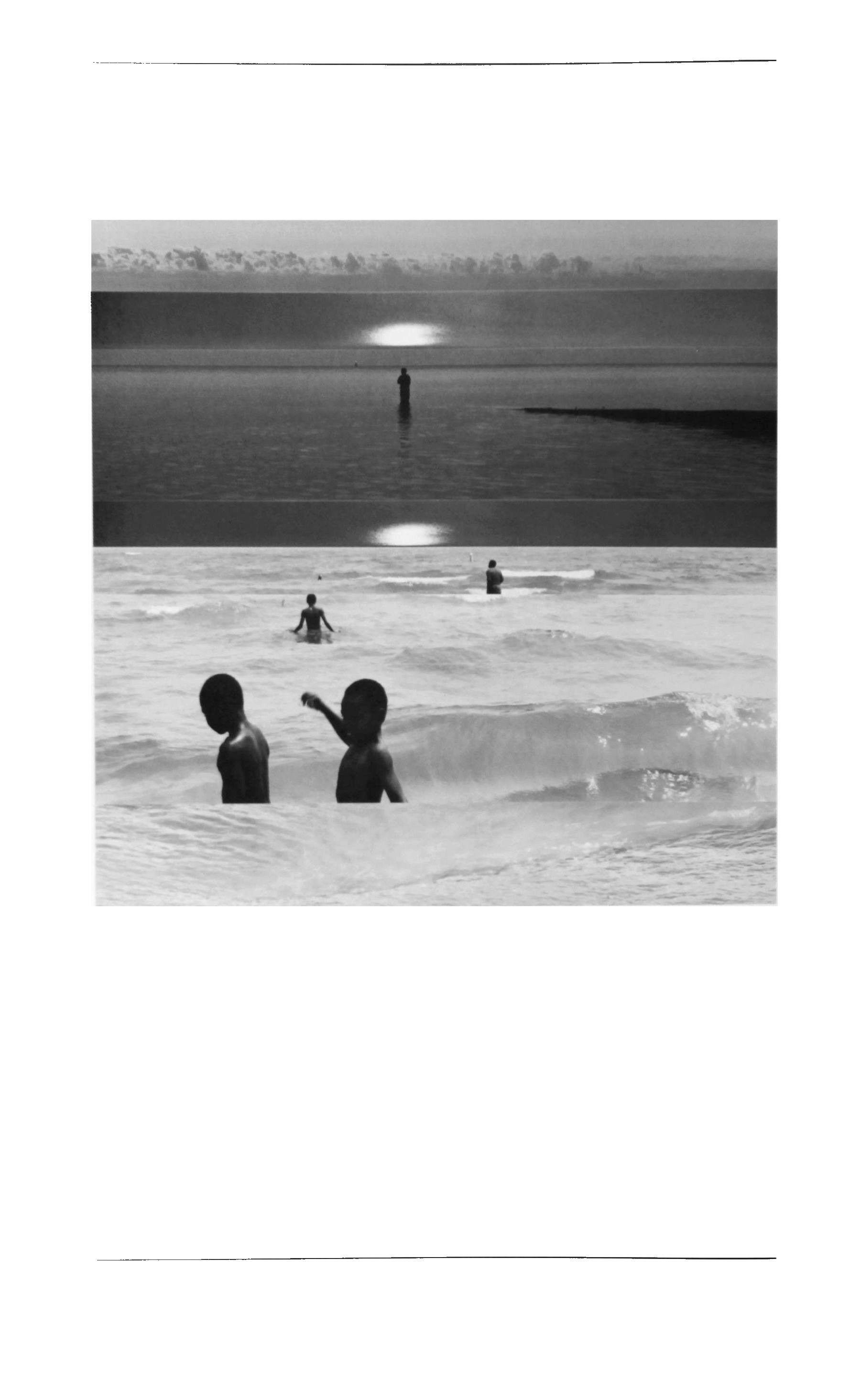
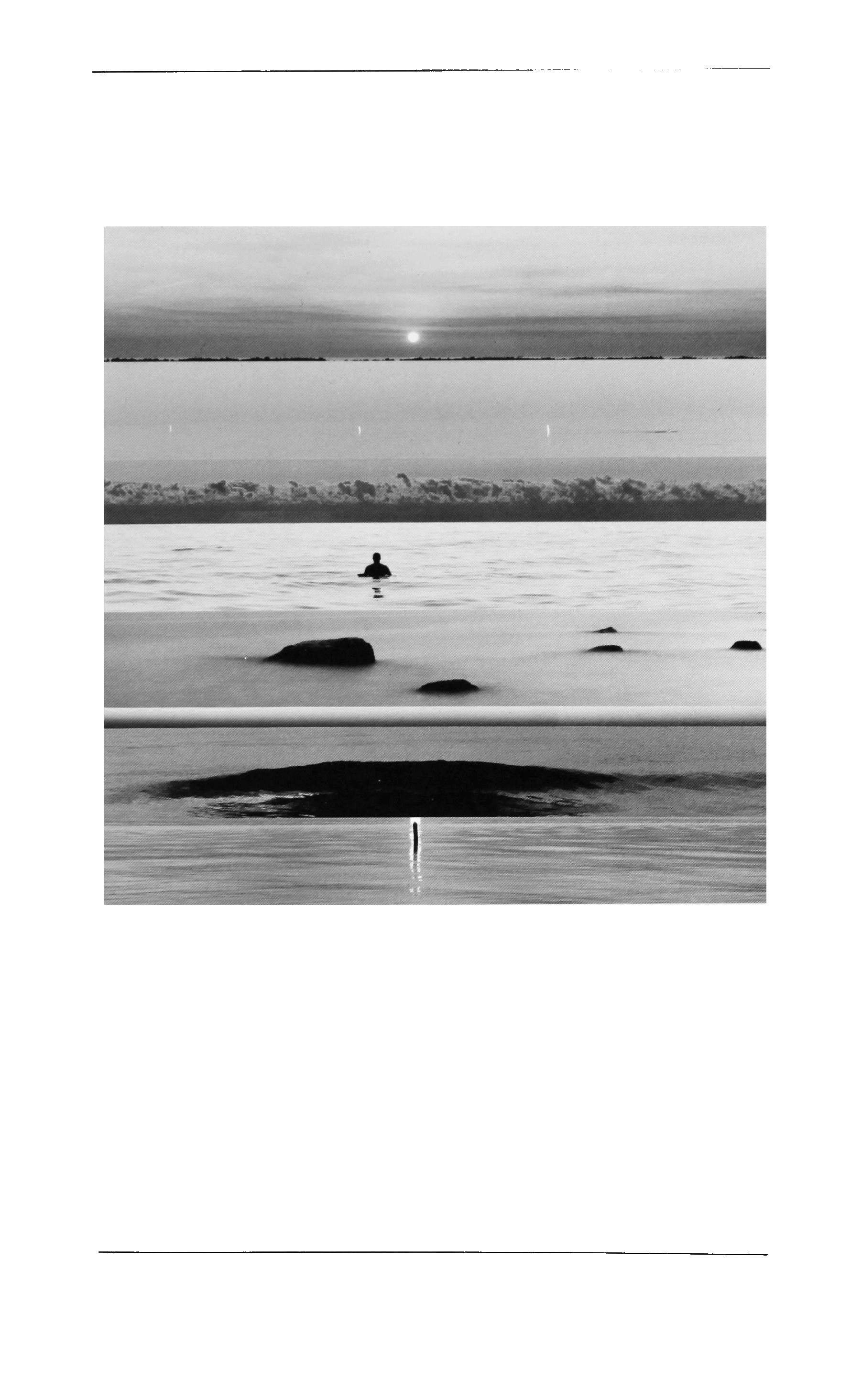
,.;.' ",i f<, �: <I �r-' >, �, I.
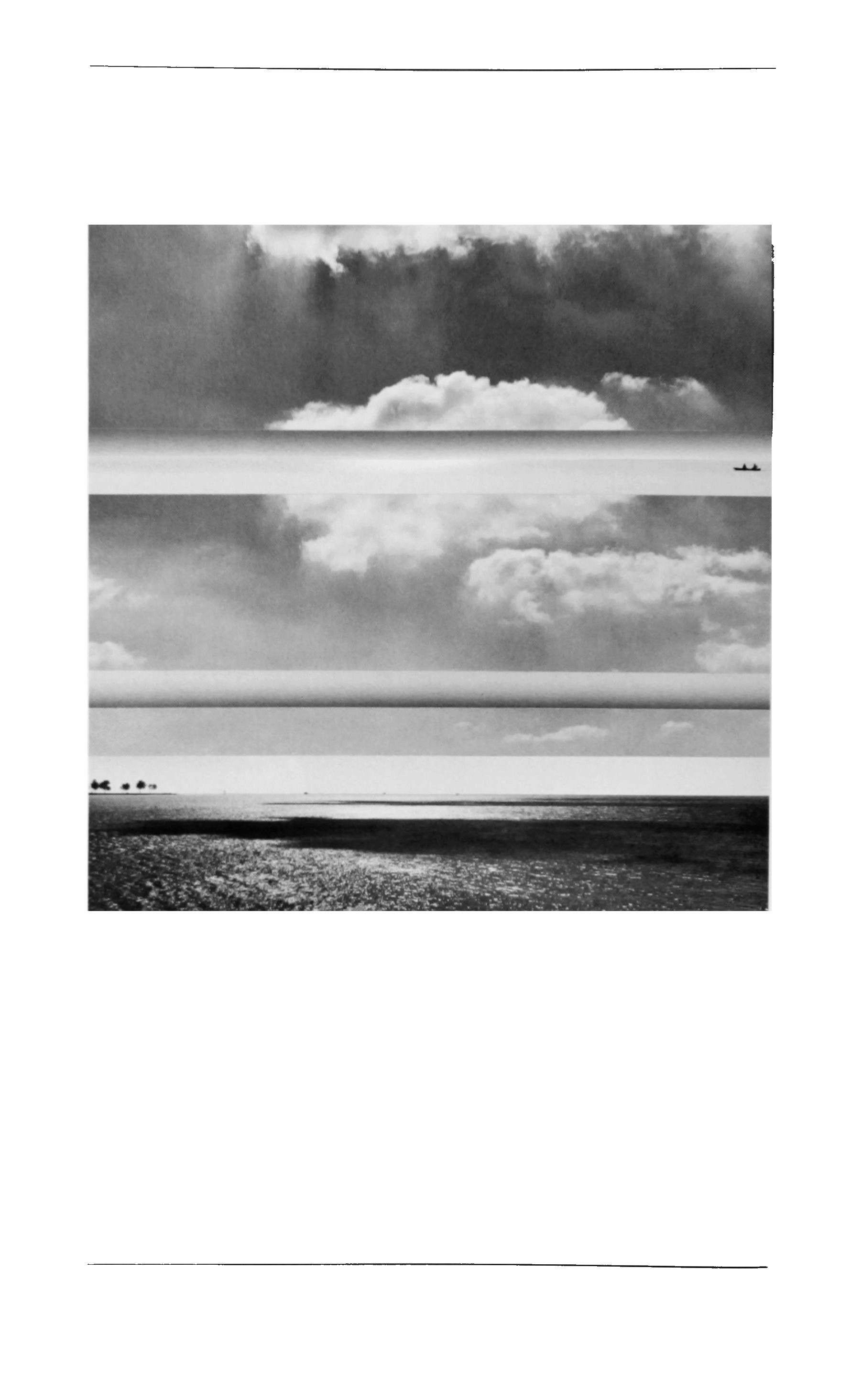
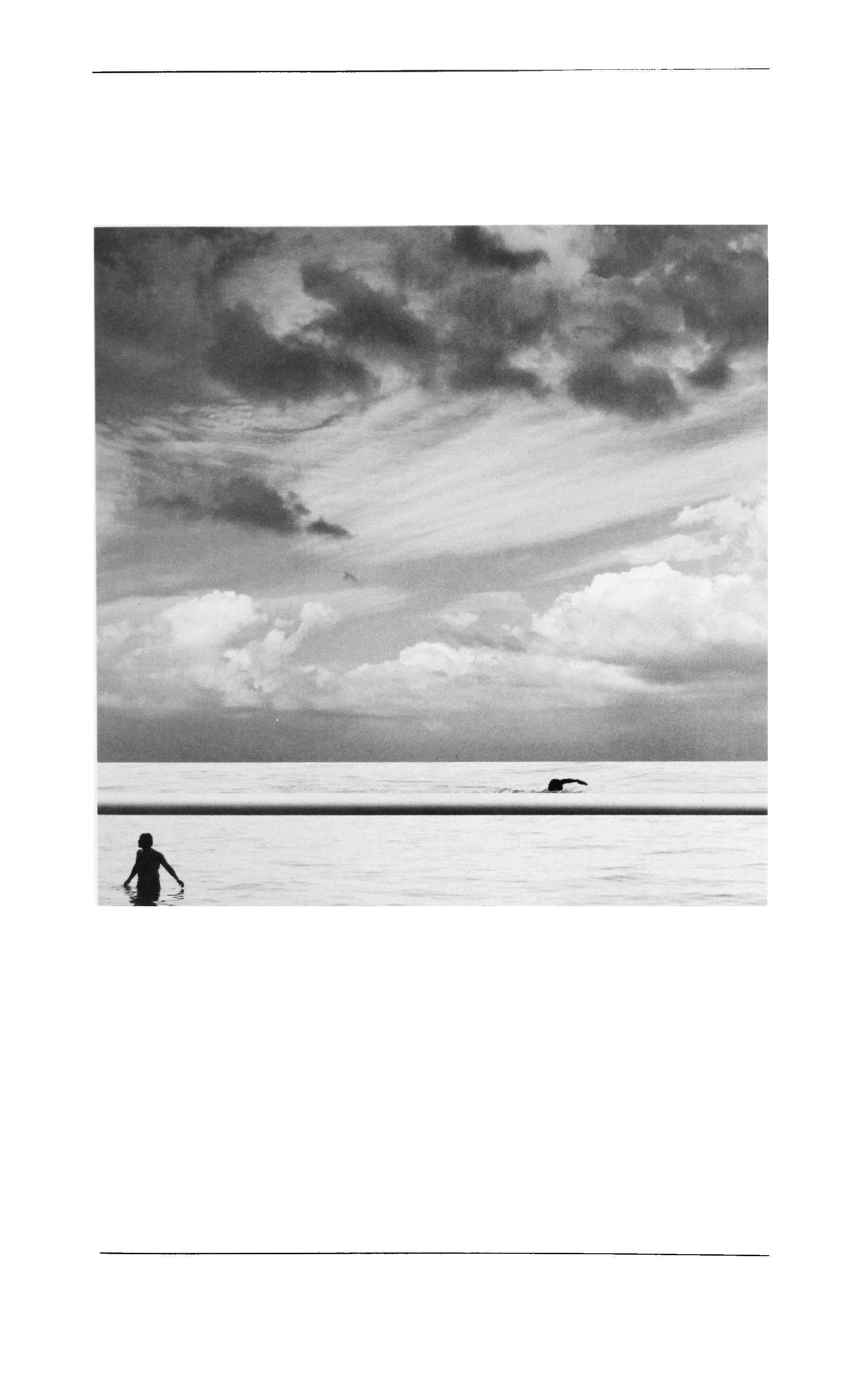
----�

M
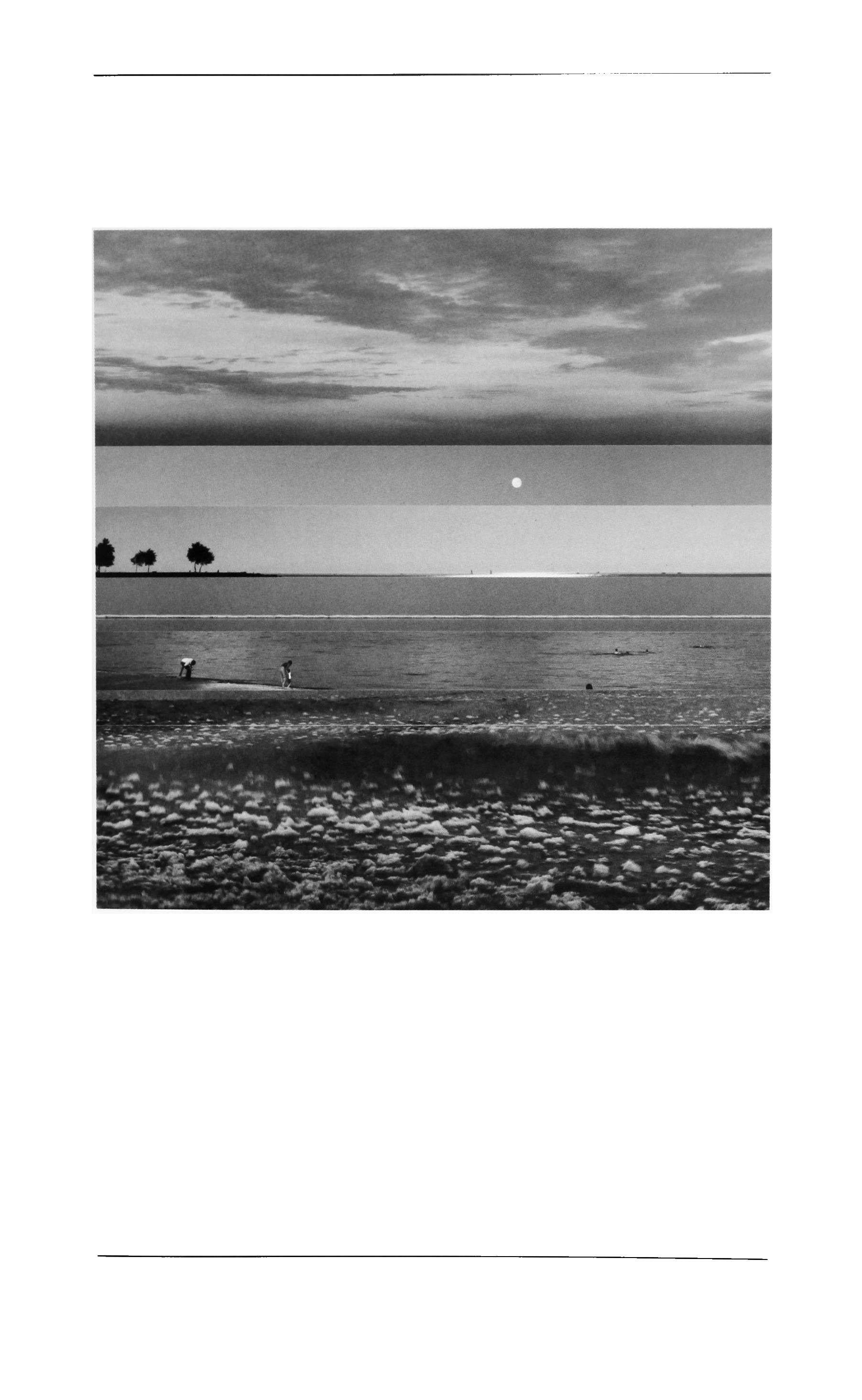
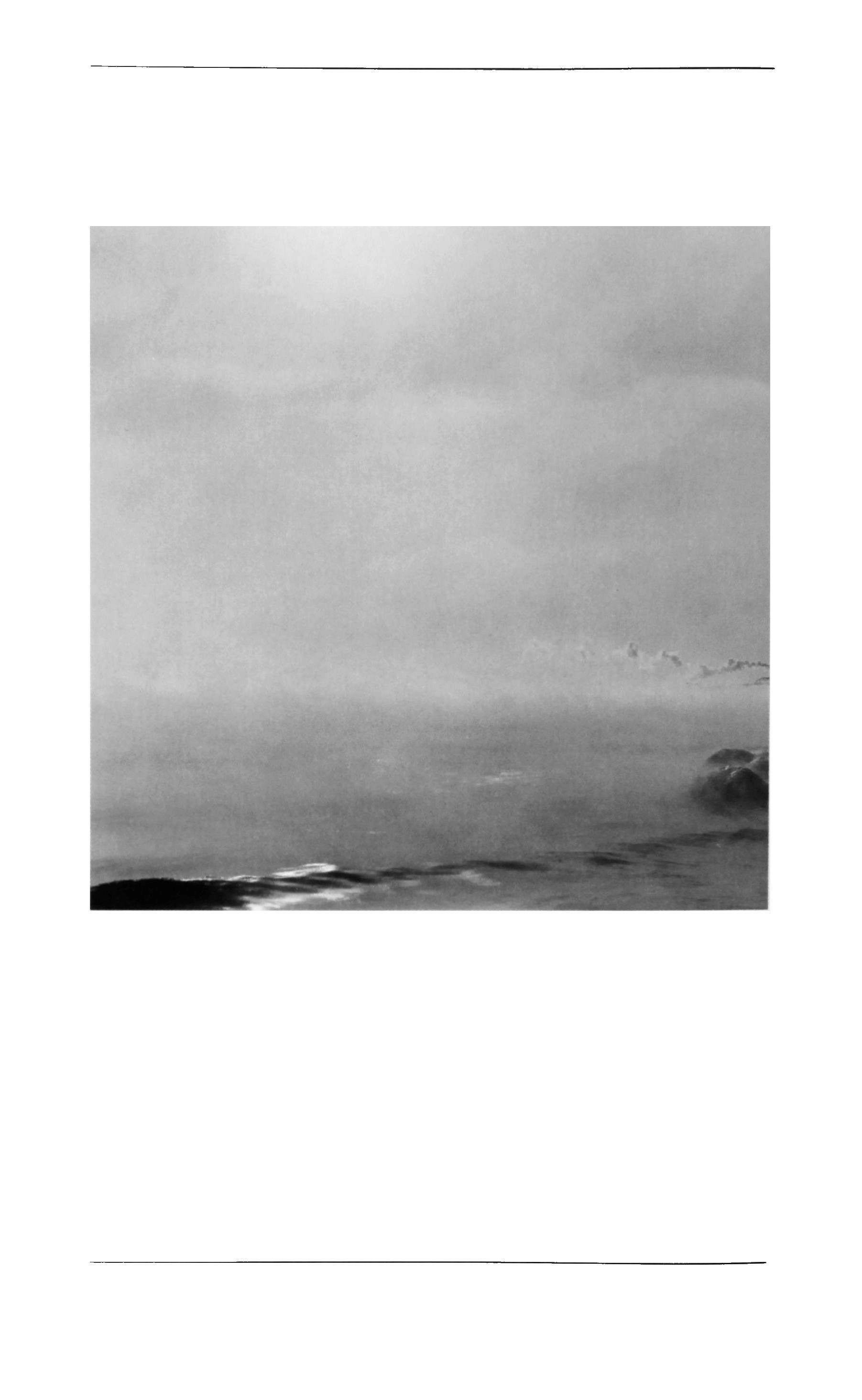
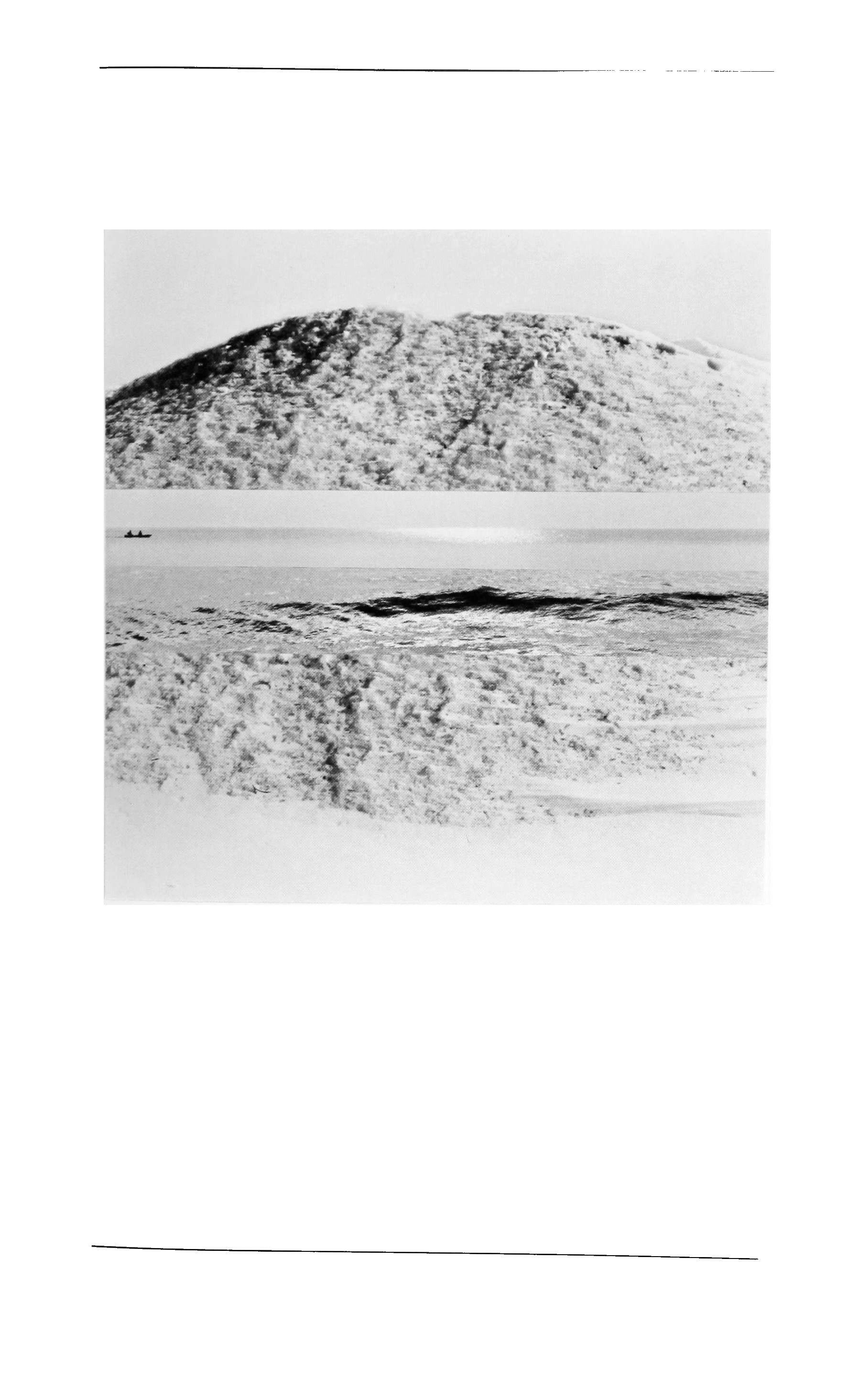
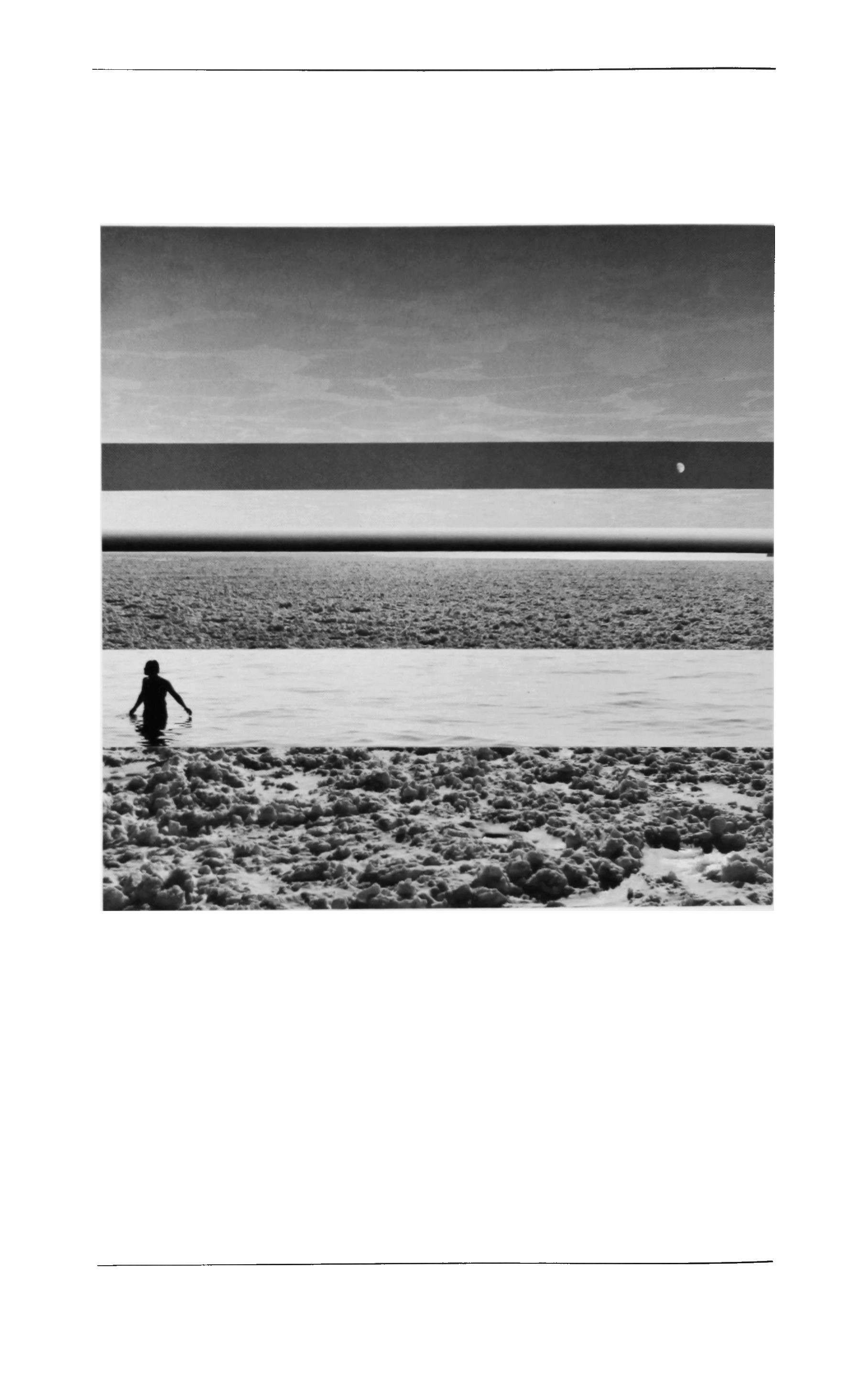
Three poem.s
Linda Pastan
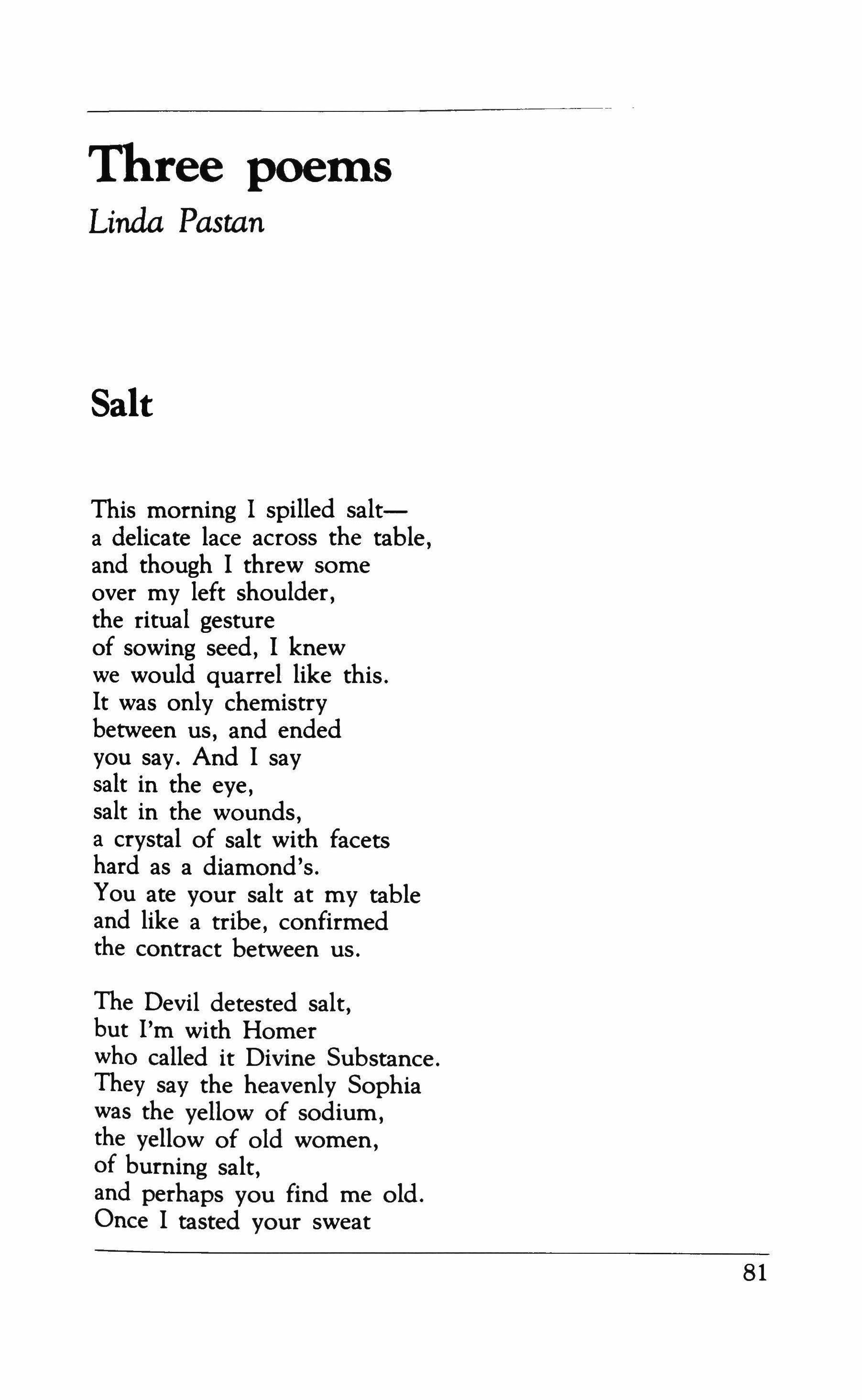
Salt
This morning I spilled salta delicate lace across the table, and though I threw some over my left shoulder, the ritual gesture of sowing seed, I knew we would quarrel like this. It was only chemistry between us, and ended you say. And I say salt in the eye, salt in the wounds, a crystal of salt with facets hard as a diamond's. You ate your salt at my table and like a tribe, confirmed the contract between us.
The Devil detested salt, but I'm with Homer who called it Divine Substance. They say the heavenly Sophia was the yellow of sodium, the yellow of old women, of burning salt, and perhaps you find me old. Once I tasted your sweat
81

upon my tongue (deer at the salt lick) and now my tears run towards your mouth, leaving a briny trail.
If you go now I'll have my body preserved for you in salt.
82
After you left
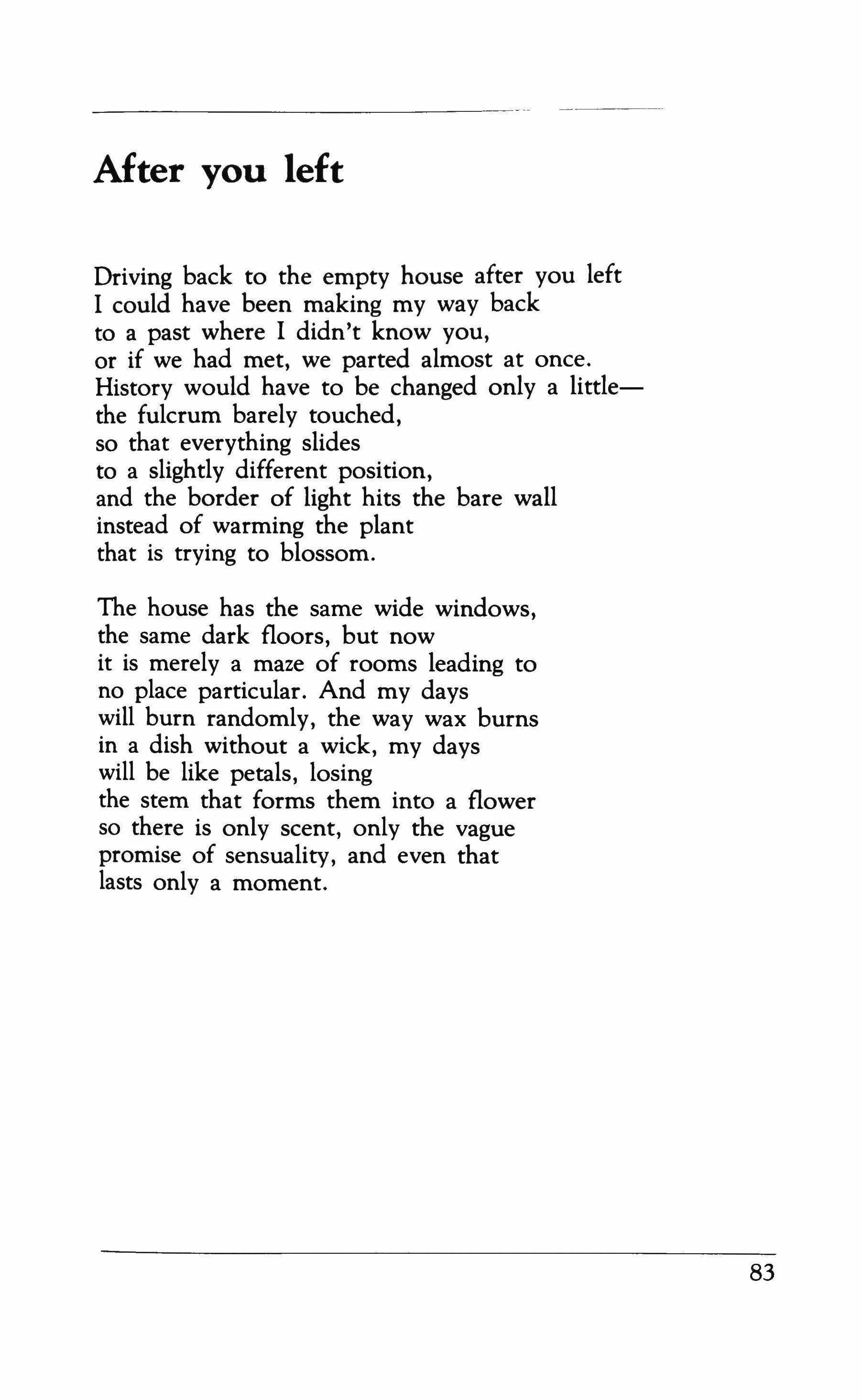
Driving back to the empty house after you left I could have been making my way back to a past where I didn't know you, or if we had met, we parted almost at once. History would have to be changed only a littlethe fulcrum barely touched, so that everything slides to a slightly different position, and the border of light hits the bare wall instead of warming the plant that is trying to blossom.
The house has the same wide windows, the same dark floors, but now it is merely a maze of rooms leading to no place particular. And my days will burn randomly, the way wax burns in a dish without a wick, my days will be like petals, losing the stem that forms them into a flower so there is only scent, only the vague promise of sensuality, and even that lasts only a moment.
83
A
name: for Susan who became Shoshana
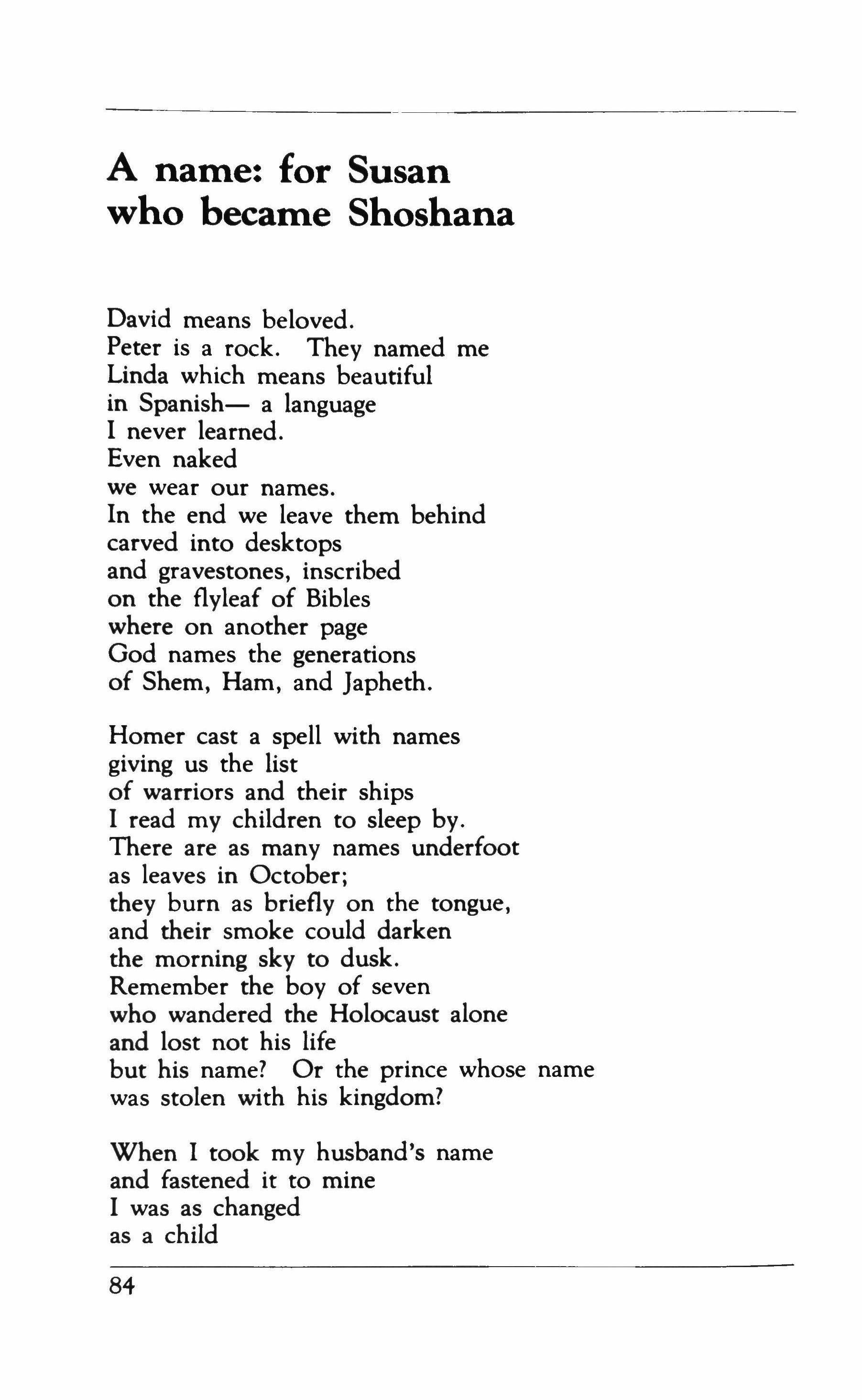
David means beloved.
Peter is a rock. They named me Linda which means beautiful in Spanish- a language I never learned. Even naked we wear our names. In the end we leave them behind carved into desktops and gravestones, inscribed on the flyleaf of Bibles where on another page God names the generations of Shem, Ham, and Japheth.
Homer cast a spell with names giving us the list of warriors and their ships I read my children to sleep by. There are as many names underfoot as leaves in October; they burn as briefly on the tongue, and their smoke could darken the morning sky to dusk. Remember the boy of seven who wandered the Holocaust alone and lost not his life but his name? Or the prince whose name was stolen with his kingdom?
When I took my husband's name and fastened it to mine I was as changed as a child
84
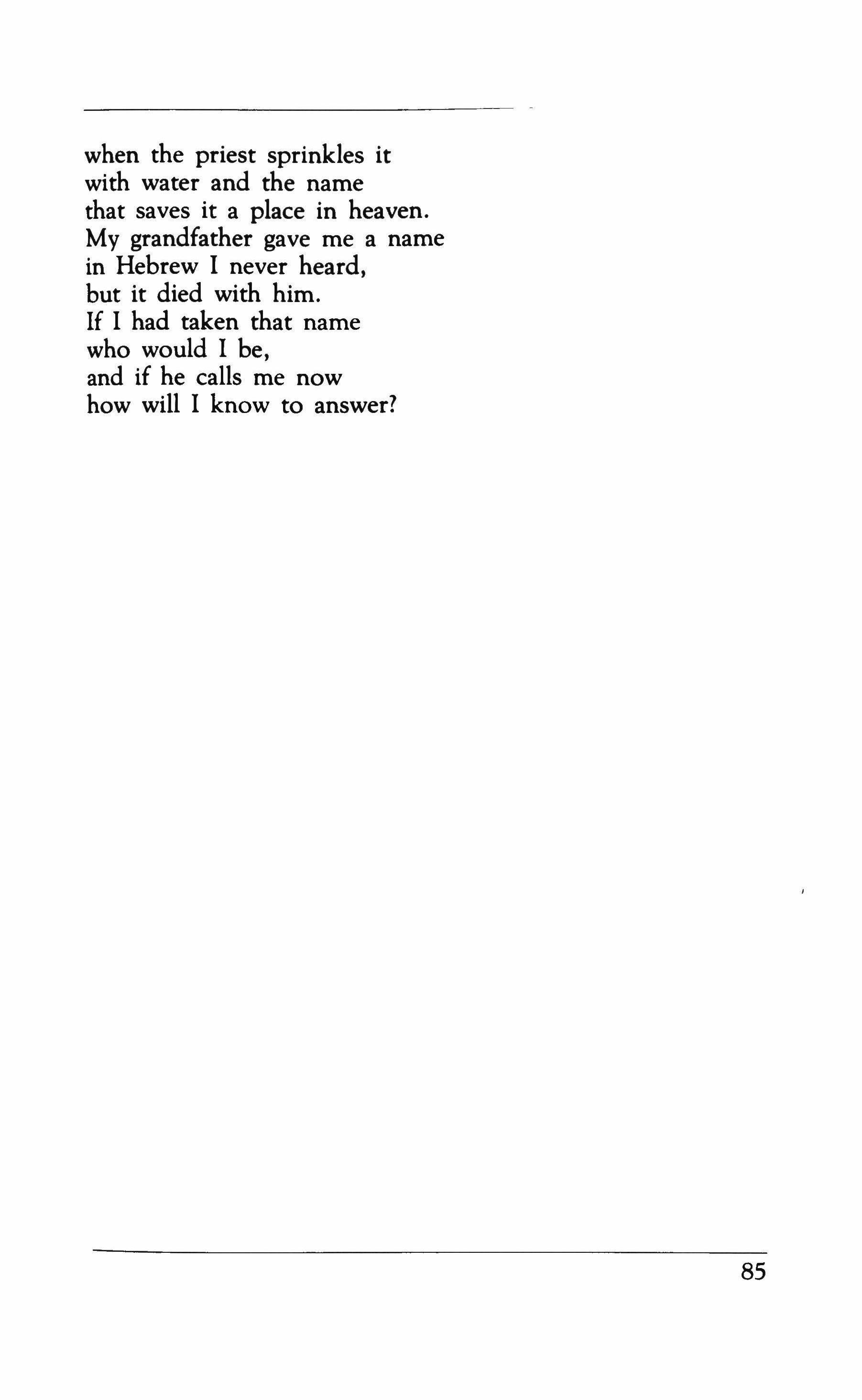
when the priest sprinkles it with water and the name that saves it a place in heaven. My grandfather gave me a name in Hebrew I never heard, but it died with him. If I had taken that name who would I be, and if he calls me now how will I know to answer?
85
A m.em.orable decision of the High Court of Toulouse, containing the prodigious story of our time of a supposed husband, enriched by one hundred and eleven fine and learned annotations (edition of 1572), by Monsieur Jean de Coras, counsellor in the court and recorder of the trial, pronounced at the general decisions, September 12, 1560, printed in Paris, with royal permission, 1572*
Translated
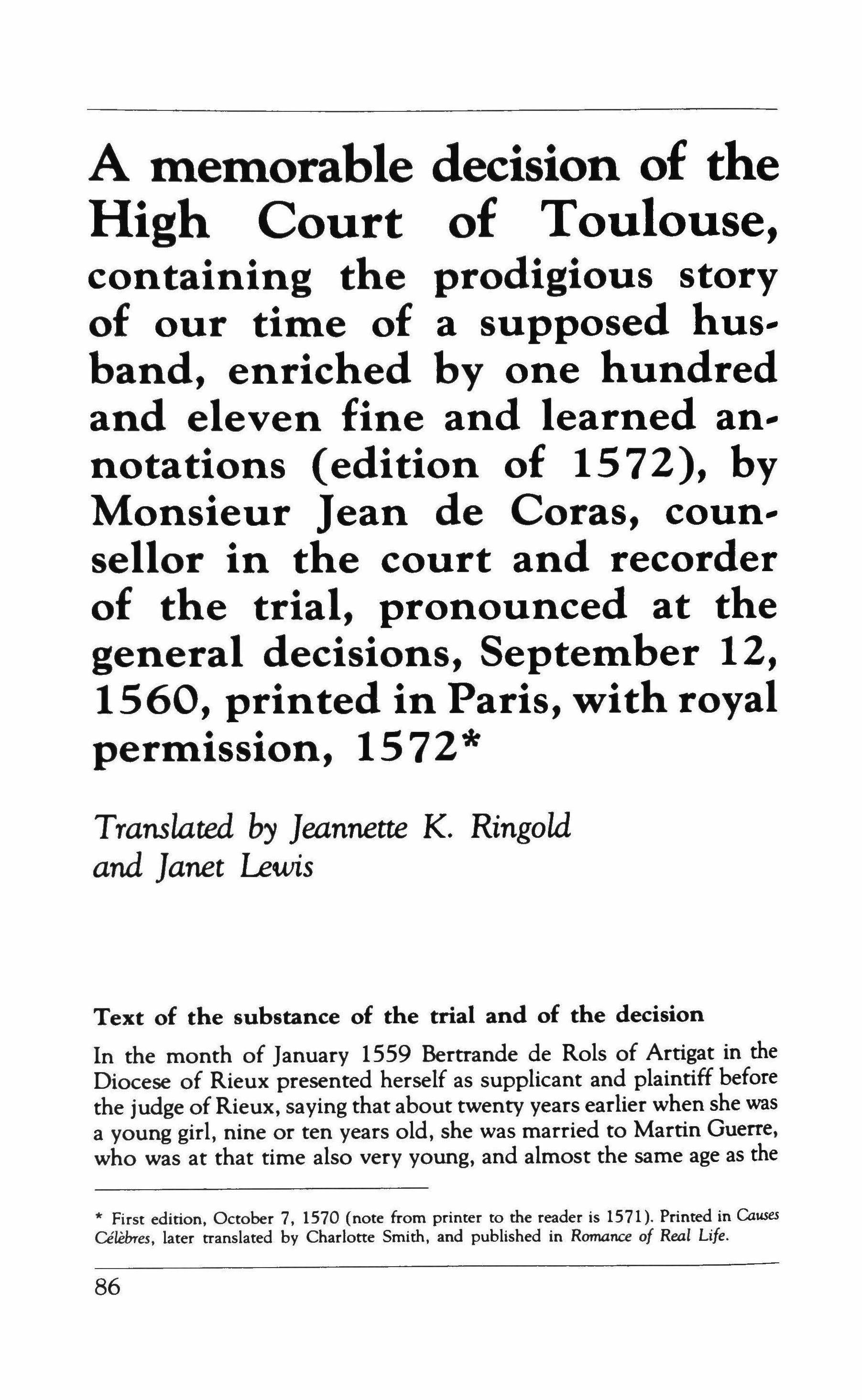
by
Jeannette K. Ringold and Janet Lewis
Text of the substance of the trial and of the decision
In the month of January 1559 Bertrande de Rols of Artigat in the Diocese of Rieux presented herself as supplicant and plaintiff before the judge ofRieux, saying that about twenty years earlier when she was a young girl, nine or ten years old, she was married to Martin Guerre, who was at that time also very young, and almost the same age as the
* First edition, October 7, 1570 (note from printer to the reader is 1571). Printed in Causes celebres, later translated by Charlotre Smith, and published in Romance of Rei11 Life.
86
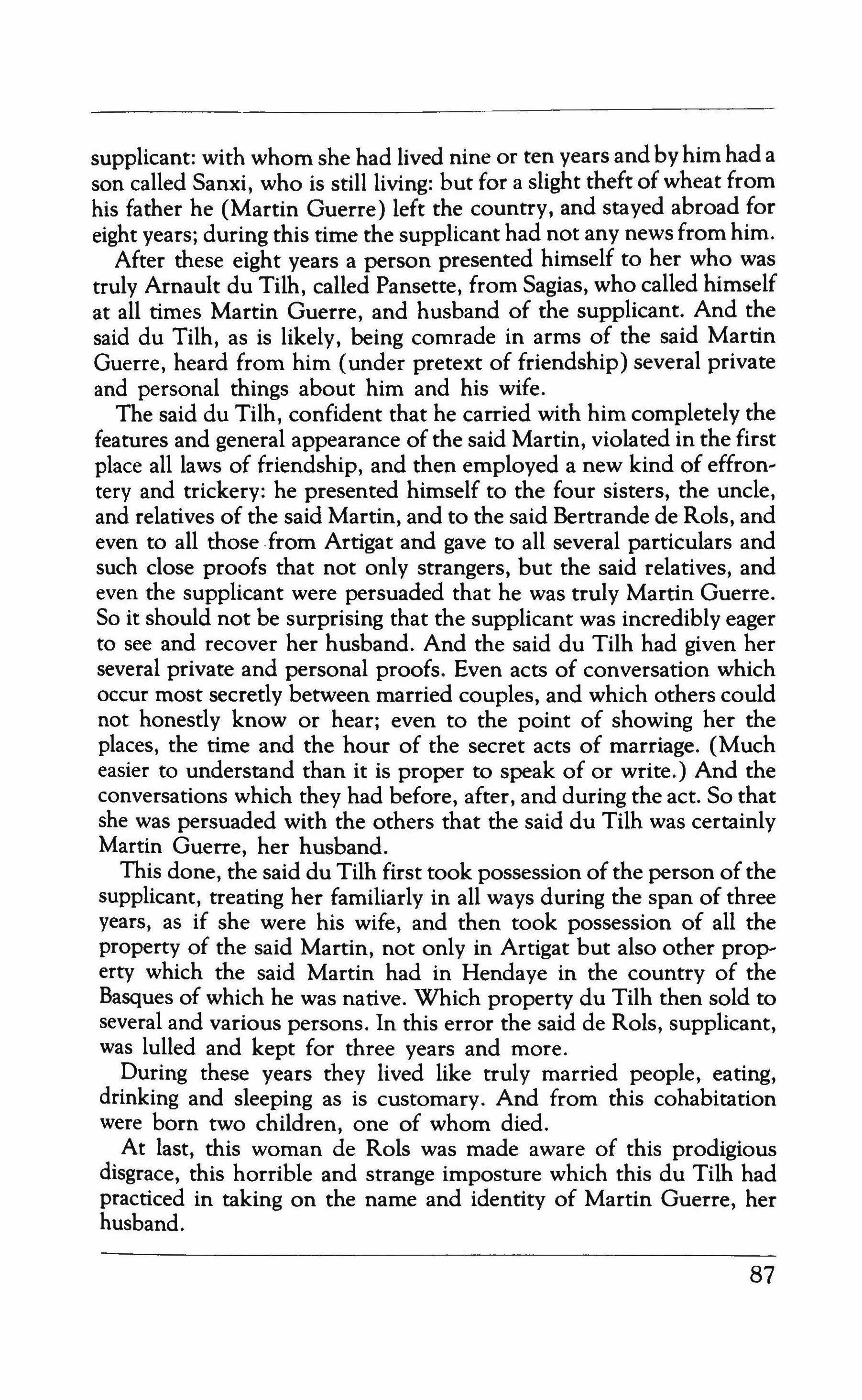
supplicant: with whom she had lived nine or ten years and by him had a son called Sanxi, who is still living: but for a slight theft of wheat from his father he (Martin Guerre) left the country, and stayed abroad for eight years; during this time the supplicant had not any news from him.
After these eight years a person presented himself to her who was truly Arnault du Tilh, called Pansette, from Sagias, who called himself at all times Martin Guerre, and husband of the supplicant. And the said du Tilh, as is likely, being comrade in arms of the said Martin Guerre, heard from him (under pretext of friendship) several private and personal things about him and his wife.
The said du Tilh, confident that he carried with him completely the features and general appearance of the said Martin, violated in the first place all laws of friendship, and then employed a new kind of effrontery and trickery: he presented himself to the four sisters, the uncle, and relatives of the said Martin, and to the said Bertrande de Rols, and even to all those from Artigat and gave to all several particulars and such close proofs that not only strangers, but the said relatives, and even the supplicant were persuaded that he was truly Martin Guerre. So it should not be surprising that the supplicant was incredibly eager to see and recover her husband. And the said du Tilh had given her several private and personal proofs. Even acts of conversation which occur most secretly between married couples, and which others could not honestly know or hear; even to the point of showing her the places, the time and the hour of the secret acts of marriage. (Much easier to understand than it is proper to speak of or write.) And the conversations which they had before, after, and during the act. So that she was persuaded with the others that the said du Tilh was certainly Martin Guerre, her husband.
This done, the said du Tilh first took possession of the person of the supplicant, treating her familiarly in all ways during the span of three years, as if she were his wife, and then took possession of all the property of the said Martin, not only in Artigat but also other prop' erty which the said Martin had in Hendaye in the country of the Basques of which he was native. Which property du Tilh then sold to several and various persons. In this error the said de Rols, supplicant, was lulled and kept for three years and more.
During these years they lived like truly married people, eating, drinking and sleeping as is customary. And from this cohabitation were born two children, one of whom died.
At last, this woman de Rols was made aware of this prodigious disgrace, this horrible and strange imposture which this du Tilh had practiced in taking on the name and identity of Martin Guerre, her husband.
87
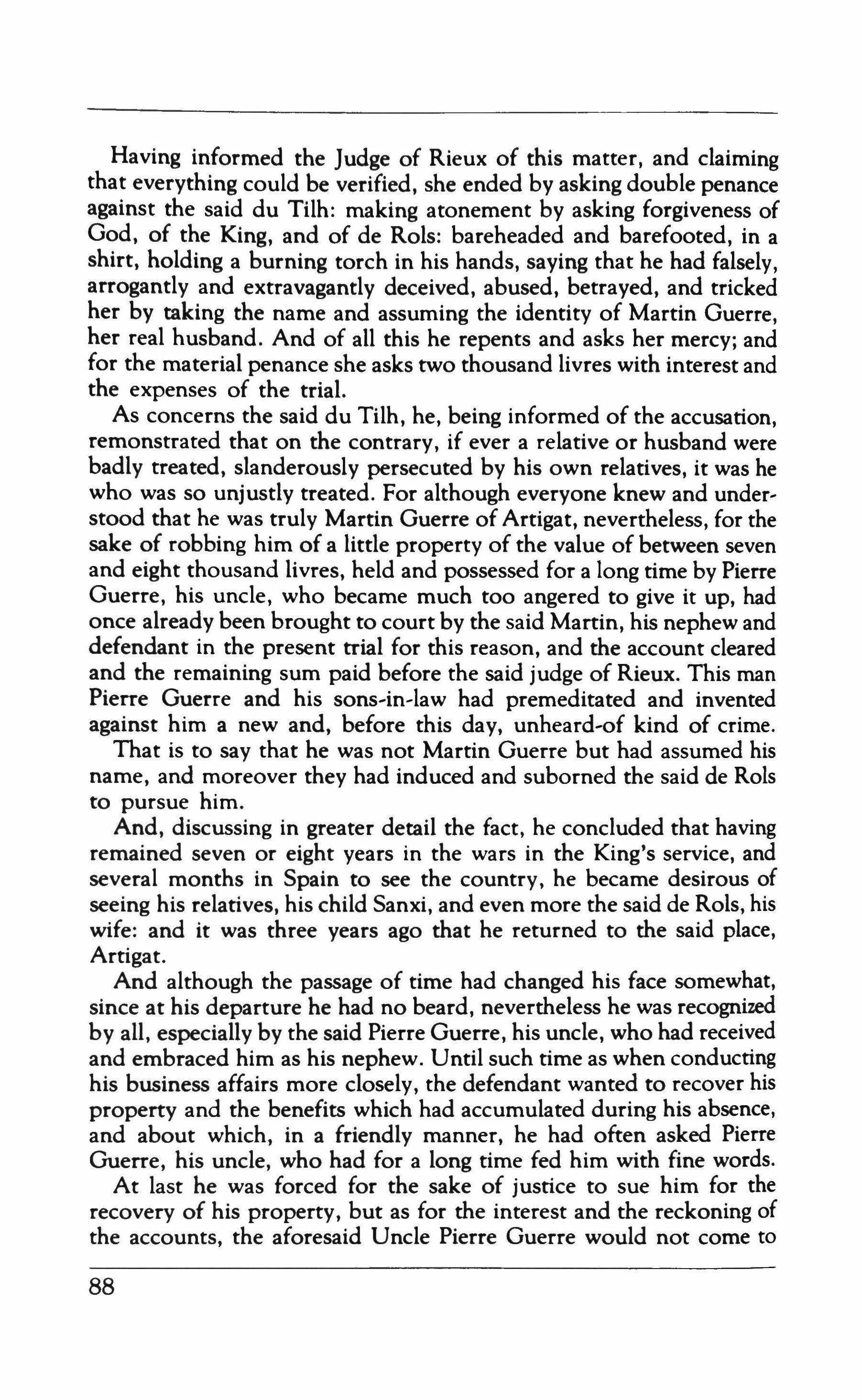
Having informed the Judge of Rieux of this matter, and claiming that everything could be verified, she ended by asking double penance against the said du Tilh: making atonement by asking forgiveness of God, of the King, and of de Rols: bareheaded and barefooted, in a shirt, holding a burning torch in his hands, saying that he had falsely, arrogantly and extravagantly deceived, abused, betrayed, and tricked her by taking the name and assuming the identity of Martin Guerre, her real husband. And of all this he repents and asks her mercy; and for the material penance she asks two thousand livres with interest and the expenses of the trial.
As concerns the said du Tilh, he, being informed of the accusation, remonstrated that on the contrary, if ever a relative or husband were badly treated, slanderously persecuted by his own relatives, it was he who was so unjustly treated. For although everyone knew and under, stood that he was truly Martin Guerre of Artigat, nevertheless, for the sake of robbing him of a little property of the value of between seven and eight thousand livres, held and possessed for a long time by Pierre Guerre, his uncle, who became much too angered to give it up, had once already been brought to court by the said Martin, his nephew and defendant in the present trial for this reason, and the account cleared and the remaining sum paid before the said judge of Rieux. This man Pierre Guerre and his sons-in-law had premeditated and invented against him a new and, before this day, unheard-of kind of crime.
That is to say that he was not Martin Guerre but had assumed his name, and moreover they had induced and suborned the said de Rols to pursue him.
And, discussing in greater detail the fact, he concluded that having remained seven or eight years in the wars in the King's service, and several months in Spain to see the country, he became desirous of seeing his relatives, his child Sanxi, and even more the said de Rols, his wife: and it was three years ago that he returned to the said place, Artigat.
And although the passage of time had changed his face somewhat, since at his departure he had no beard, nevertheless he was recognized by all, especially by the said Pierre Guerre, his uncle, who had received and embraced him as his nephew. Until such time as when conducting his business affairs more closely, the defendant wanted to recover his property and the benefits which had accumulated during his absence, and about which, in a friendly manner, he had often asked Pierre Guerre, his uncle, who had for a long time fed him with fine words.
At last he was forced for the sake of justice to sue him for the recovery of his property, but as for the interest and the reckoning of the accounts, the aforesaid Uncle Pierre Guerre would not come to
88

any agreement. Thus in hatred ofthis, he as well as his sons-in-law had searched for all possible means to ruin and destroy him, and the first attempt was to kill him, and to this end they had often watched him and even one day (pushed so hard by avarice) assailed him in the presence of the said de Rols his wife and had beaten him and almost killed him, with a hard blow struck him to the ground and would have killed him but for the said de Rols his wife, who unable to save him otherwise, stretched herself upon him to receive the blows.
Seeing themselves frustrated in their wicked plans in this instance, they invented the accusation of the prodigious and horrible crime which has been recounted, and which proves therefore that he (Pierre) should also deserve a cruel and monstrous punishment, that Arnaud should demand that justice be done him likewise by an equal punish, ment against the slanderers.
And he demanded that his wife and sisters be brought to him, assuring himself that they, who were all good and honorable women, would recognize him; and that currently the said de Rols now being in the power of the said Pierre Guerre, dwelling in his house, should be sequestered in some house of good people where she could not be seduced or suborned. For the rest he concluded with exonerating statements.
His testimony thus included true and ample statements (as has since been verified by the Basques, the father, mother, brothers, sisters and other relatives of Martin Guerre) concerning the year, month and day of the wedding; the father and mother-in-law; concerning persons who were there and who took part in the wedding; concerning the dress and clothing with which each one was attired at that time; concerning the priest who married them; and all the personal acts which were involved on the day of the wedding as well as before and after, even to mentioning the persons who at midnight of the celebration came to visit them in bed.
Beyond all this he brought testimony concerning the child, Sanxi Guerre, whom he claimed as his own, and about the day of his birth; the reason for his departure; persons whom he met on the road and the conversations which they had together; the places where he stayed during his absence, in Spain as well as in France; and concerning people whom he encountered in these two countries, and concerning each event; pointing out especially certain people with whom they could consult (as has since been done and everything verified), in order to make everything which he said still more persuasive and believable.
The procedure of the case was then discussed, followed by the order of confrontations with du Tilh, and also when the said de Rols should
89
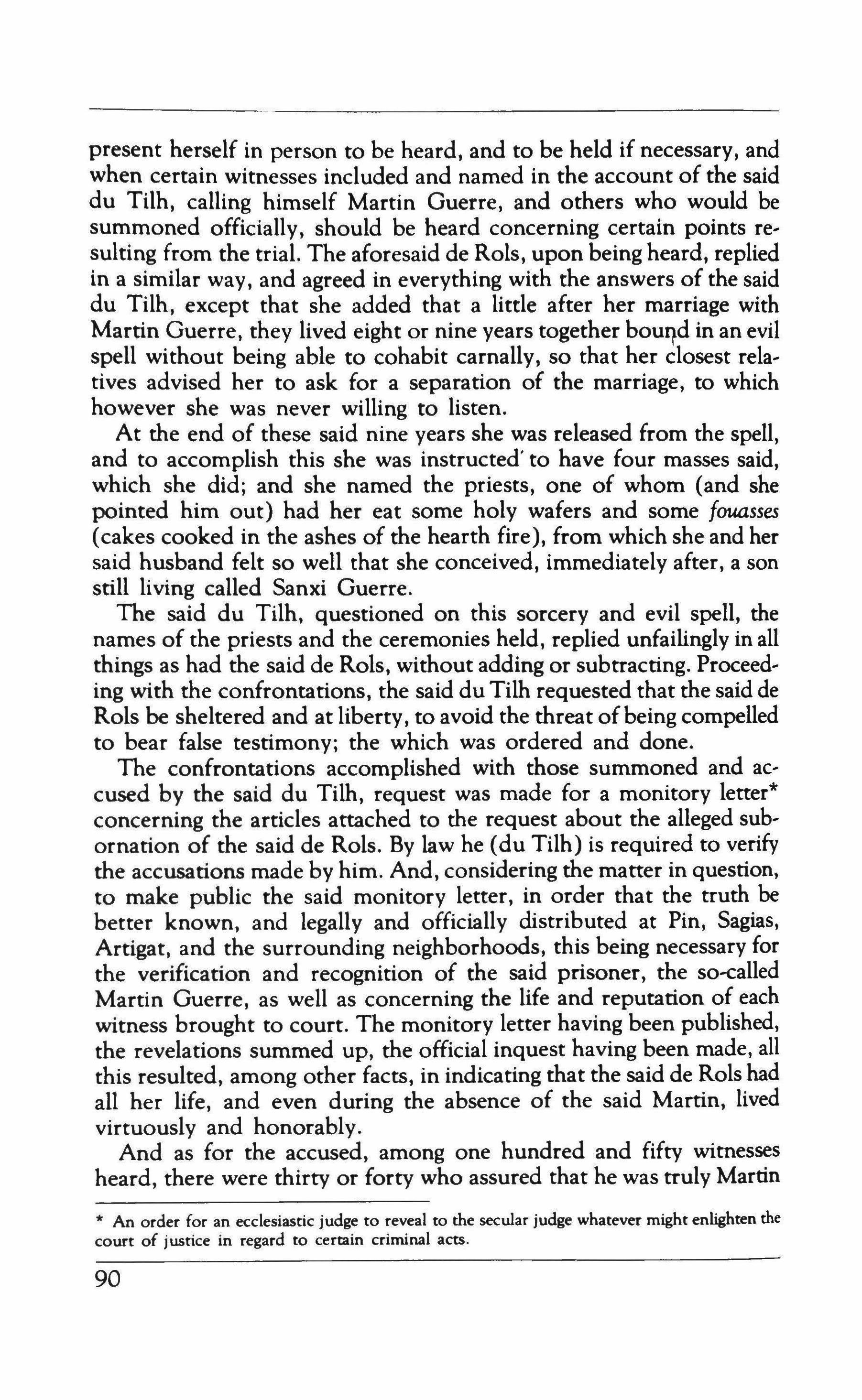
present herself in person to be heard, and to be held if necessary, and when certain witnesses included and named in the account of the said du Tilh, calling himself Martin Guerre, and others who would be summoned officially, should be heard concerning certain points resulting from the trial. The aforesaid de Rols, upon being heard, replied in a similar way, and agreed in everything with the answers of the said du Tilh, except that she added that a little after her marriage with Martin Guerre, they lived eight or nine years together bound in an evil spell without being able to cohabit carnally, so that her closest relatives advised her to ask for a separation of the marriage, to which however she was never willing to listen.
At the end of these said nine years she was released from the spell, and to accomplish this she was instructedto have four masses said, which she did; and she named the priests, one of whom (and she pointed him out) had her eat some holy wafers and some [ouasses (cakes cooked in the ashes of the hearth fire), from which she and her said husband felt so well that she conceived, immediately after, a son still living called Sanxi Guerre.
The said du Tilh, questioned on this sorcery and evil spell, the names of the priests and the ceremonies held, replied unfailingly in all things as had the said de Rols, without adding or subtracting. Proceeding with the confrontations, the said du Tilh requested that the said de Rols be sheltered and at liberty, to avoid the threat ofbeing compelled to bear false testimony; the which was ordered and done.
The confrontations accomplished with those summoned and accused by the said du Tilh, request was made for a monitory letter" concerning the articles attached to the request about the alleged subornation of the said de Rols. By law he (du Tilh) is required to verify the accusations made by him. And, considering the matter in question, to make public the said monitory letter, in order that the truth be better known, and legally and officially distributed at Pin, Sagias, Artigat, and the surrounding neighborhoods, this being necessary for the verification and recognition of the said prisoner, the so-called Martin Guerre, as well as concerning the life and reputation of each witness brought to court. The monitory letter having been published, the revelations summed up, the official inquest having been made, all this resulted, among other facts, in indicating that the said de Rols had all her life, and even during the absence of the said Martin, lived virtuously and honorably.
And as for the accused, among one hundred and fifty witnesses heard, there were thirty or forty who assured that he was truly Martin
An order for an ecclesiastic judge to reveal to the secular judge whatever might enlighten the court of justice in regard to certain criminal acts.
90
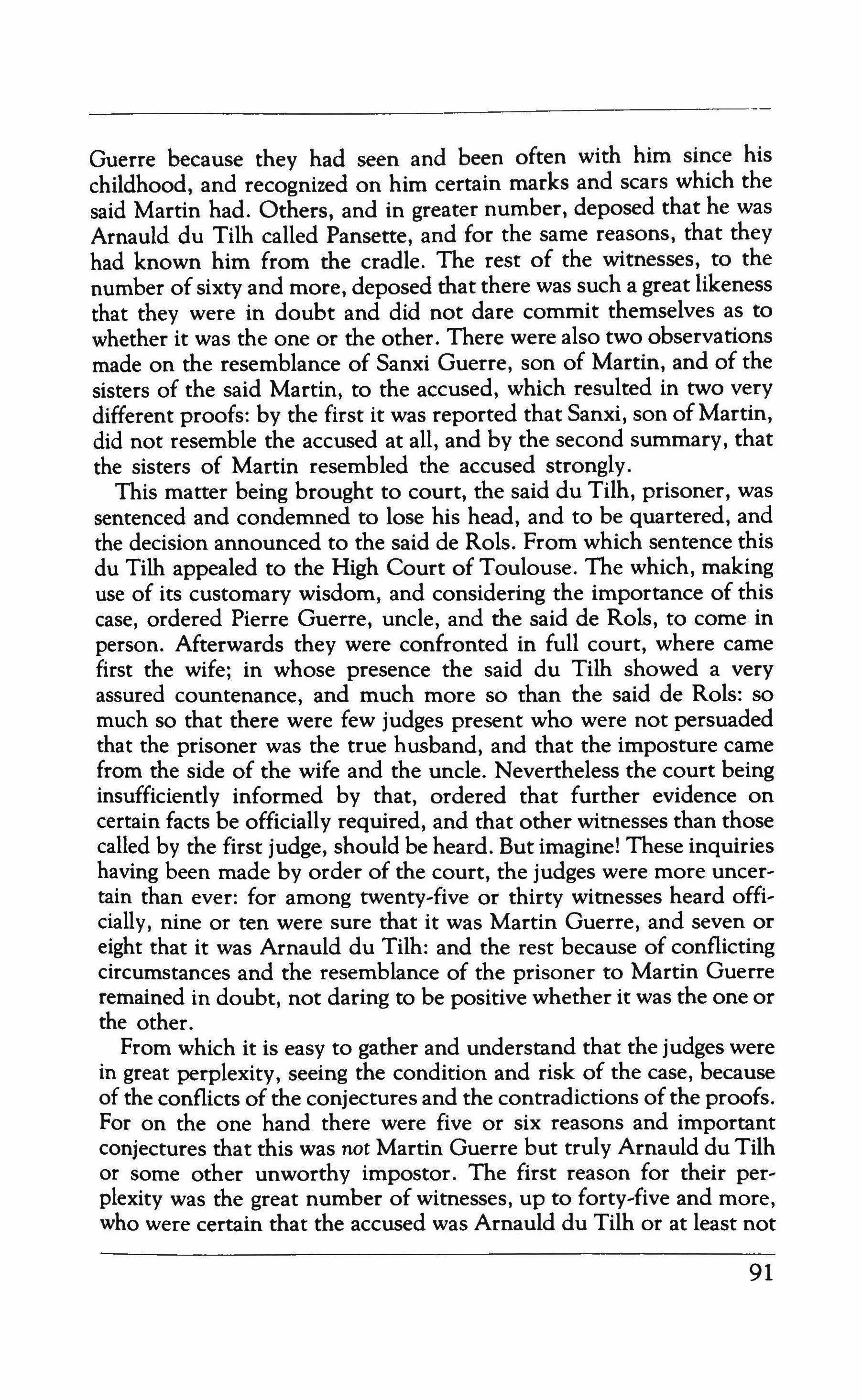
Guerre because they had seen and been often with him since his childhood, and recognized on him certain marks and scars which the said Martin had. Others, and in greater number, deposed that he was Arnauld du Tilh called Pansette, and for the same reasons, that they had known him from the cradle. The rest of the witnesses, to the number of sixty and more, deposed that there was such a great likeness that they were in doubt and did not dare commit themselves as to whether it was the one or the other. There were also two observations made on the resemblance of Sanxi Guerre, son of Martin, and of the sisters of the said Martin, to the accused, which resulted in two very different proofs: by the first it was reported that Sanxi, son of Martin, did not resemble the accused at all, and by the second summary, that the sisters of Martin resembled the accused strongly.
This matter being brought to court, the said du Tilh, prisoner, was sentenced and condemned to lose his head, and to be quartered, and the decision announced to the said de Rols. From which sentence this du Tilh appealed to the High Court of Toulouse. The which, making use of its customary wisdom, and considering the importance of this case, ordered Pierre Guerre, uncle, and the said de Rols, to come in person. Afterwards they were confronted in full court, where came first the wife; in whose presence the said du Tilh showed a very assured countenance, and much more so than the said de Rols: so much so that there were few judges present who were not persuaded that the prisoner was the true husband, and that the imposture came from the side of the wife and the uncle. Nevertheless the court being insufficiently informed by that, ordered that further evidence on certain facts be officially required, and that other witnesses than those called by the first judge, should be heard. But imagine! These inquiries having been made by order of the court, the judges were more uncertain than ever: for among twenty-five or thirty witnesses heard officially, nine or ten were sure that it was Martin Guerre, and seven or eight that it was Arnauld du Tilh: and the rest because of conflicting circumstances and the resemblance of the prisoner to Martin Guerre remained in doubt, not daring to be positive whether it was the one or the other.
From which it is easy to gather and understand that the judges were in great perplexity, seeing the condition and risk of the case, because of the conflicts of the conjectures and the contradictions ofthe proofs. For on the one hand there were five or six reasons and important conjectures that this was not Martin Guerre but truly Arnauld du Tilh or some other unworthy impostor. The first reason for their per' plexity was the great number of witnesses, up to forty-five and more, who were certain that the accused was Arnauld du Tilh or at least not
91
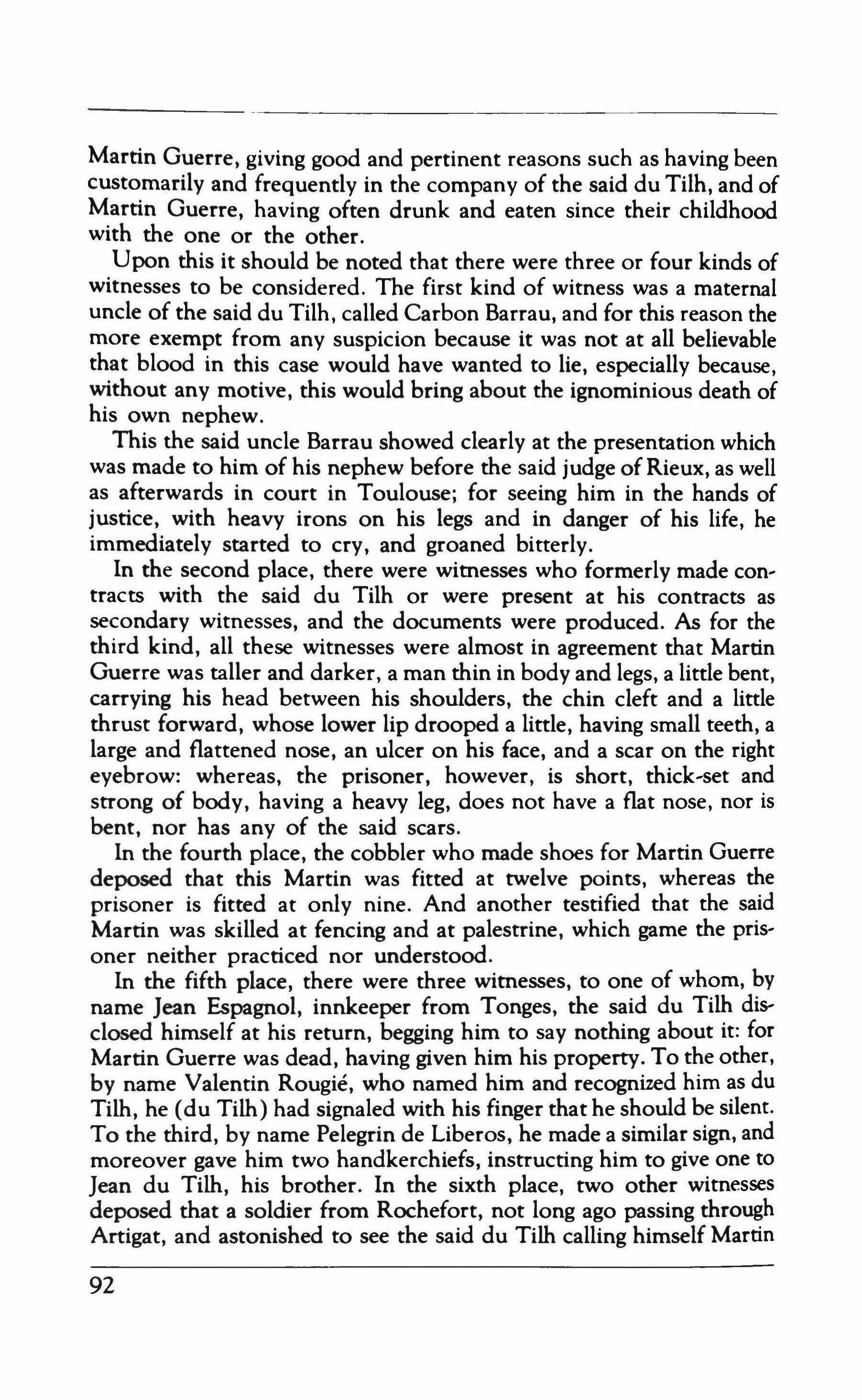
Martin Guerre, giving good and pertinent reasons such as having been customarily and frequently in the company of the said du Tilh, and of Martin Guerre, having often drunk and eaten since their childhood with the one or the other.
Upon this it should be noted that there were three or four kinds of witnesses to be considered. The first kind of witness was a maternal uncle of the said du Tilh, called Carbon Barrau, and for this reason the more exempt from any suspicion because it was not at all believable that blood in this case would have wanted to lie, especially because, without any motive, this would bring about the ignominious death of his own nephew.
This the said uncle Barrau showed clearly at the presentation which was made to him of his nephew before the said judge of Rieux, as well as afterwards in court in Toulouse; for seeing him in the hands of justice, with heavy irons on his legs and in danger of his life, he immediately started to cry, and groaned bitterly.
In the second place, there were witnesses who formerly made con' tracts with the said du Tilh or were present at his contracts as secondary witnesses, and the documents were produced. As for the third kind, all these witnesses were almost in agreement that Martin Guerre was taller and darker, a man thin in body and legs, a little bent, carrying his head between his shoulders, the chin cleft and a little thrust forward, whose lower lip drooped a little, having small teeth, a large and flattened nose, an ulcer on his face, and a scar on the right eyebrow: whereas, the prisoner, however, is short, thick-set and strong of body, having a heavy leg, does not have a flat nose, nor is bent, nor has any of the said scars.
In the fourth place, the cobbler who made shoes for Martin Guerre deposed that this Martin was fitted at twelve points, whereas the prisoner is fitted at only nine. And another testified that the said Martin was skilled at fencing and at palestrine, which game the prisoner neither practiced nor understood.
In the fifth place, there were three witnesses, to one of whom, by name Jean Espagnol, innkeeper from Tonges, the said du Tilh disclosed himself at his return, begging him to say nothing about it: for Martin Guerre was dead, having given him his property. To the other, by name Valentin Rougie, who named him and recognized him as du Tilh, he (du Tilh) had signaled with his finger that he should be silent. To the third, by name Pelegrin de Liberos, he made a similar sign, and moreover gave him two handkerchiefs, instructing him to give one to Jean du Tilh, his brother. In the sixth place, two other witnesses deposed that a soldier from Rochefort, not long ago passing through Artigat, and astonished to see the said du Tilh calling himself Martin
92

Guerre, had said loudly that he was a fraud; for Martin Guerre was in Flanders, having but one leg, the other of wood, because he had lost it when struck by a cannonball before St. Quentin on St. Lawrence's Day.
The second reason for the perplexity of the judges of the High Court of Toulouse was the summation of evidence made by the judge of Rieux on the question of the resemblance of the prisoner to Sanxi Guerre, the son of Martin, by which summary it is reported, as has been said, that there was no resemblance, as several witnesses heard in the same inquiry also confirmed.
The third reason for their perplexity was that Martin Guerre was from the Basque country, and as everyone knows well they speak a language quite different from French and Gascon, little understand, able except to those who are of the country; and nevertheless the said du Tilh, prisoner, spoke only a few stolen words.
The fourth reason for their perplexity given in sum by several witnesses was that the said du Tilh had been from his childhood on confirmed thoroughly in all vices, given over to every kind of thievery and impudence-an habitual denier and blasphemer of the name of God-and all this to such an extent that if he had thought up this new impudence and deception no one should be surprised.
On the contrary, there were thirty or forty witnesses to the fact that the prisoner was truly Martin Guerre, among whom were the four sisters of the said Martin, who assured the court and gave good and great reasons for this, such as having known and been together with him habitually since his earliest years, and having eaten and drunk often with him, and, as sisters, having been cared for and nourished together with him.
Among these witnesses there were also three or four kinds of witnesses who should be considered with great care. First came the four sisters of whom we have just spoken, as good and honorable women as are to be found in Gascony, who constantly maintained that the prisoner was certainly Martin Guerre, their brother and husband of the said de Rols, and who knew perfectly well that he was such. And equal assurance was given by two of the brothers-in-law of the said Martin, married to the said sisters.
In the second place, there were witnesses who were at the wedding ceremonies of the said Martin and de Rols, and especially one Catherine Boere, who at midnight brought the feast (which they called the reveille), who obstinately assured that this was the man who married the said de Rols, and whom she found bedded with her.
Thirdly, the greater part of the witnesses reported marks and made invincible presumptions-to wit, that Martin Guerre had two broken
93
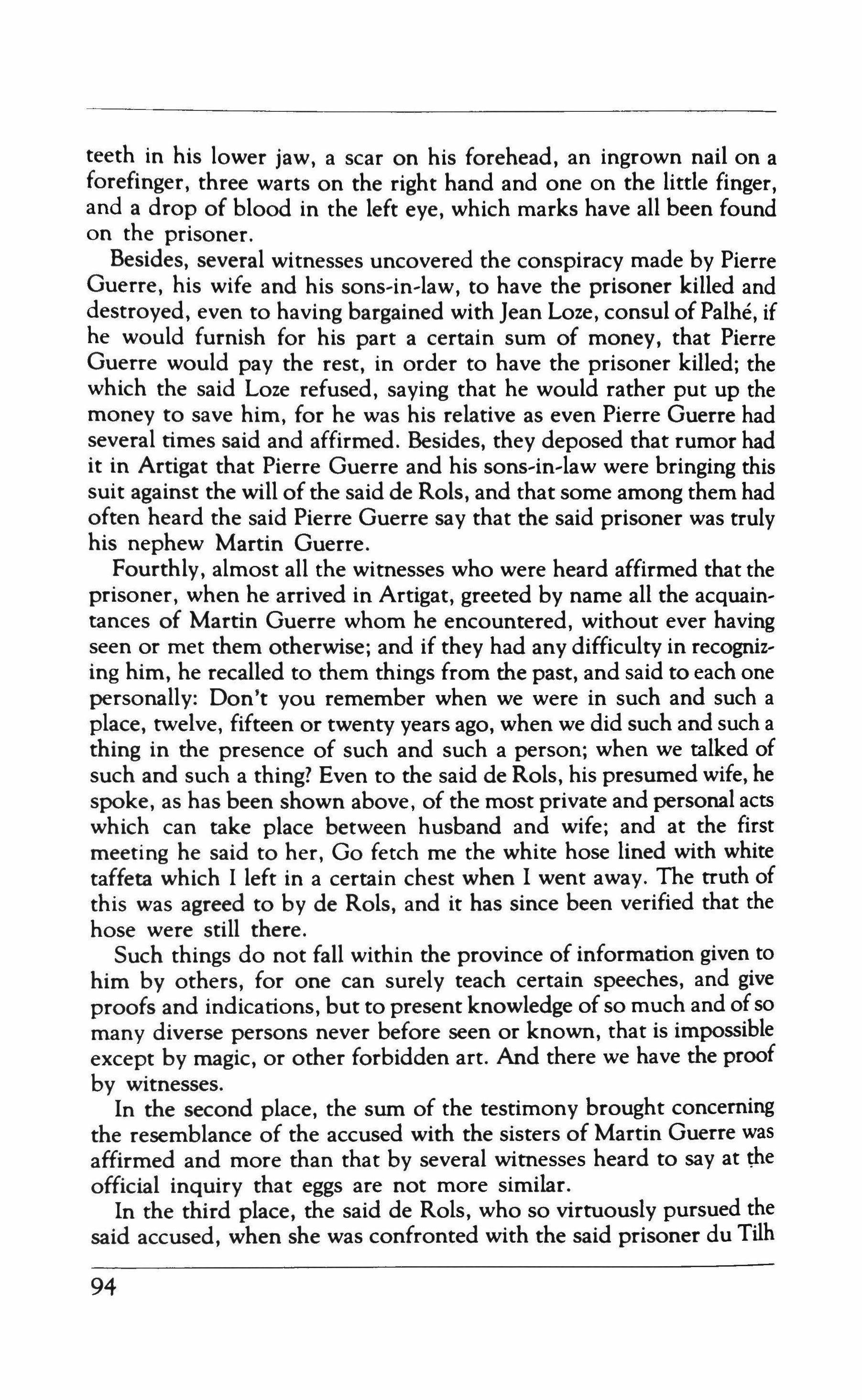
teeth in his lower jaw, a scar on his forehead, an ingrown nail on a forefinger, three warts on the right hand and one on the little finger, and a drop of blood in the left eye, which marks have all been found on the prisoner.
Besides, several witnesses uncovered the conspiracy made by Pierre Guerre, his wife and his sons-in-law, to have the prisoner killed and destroyed, even to having bargained with Jean Loze, consul of Palhe, if he would furnish for his part a certain sum of money, that Pierre Guerre would pay the rest, in order to have the prisoner killed; the which the said Loze refused, saying that he would rather put up the money to save him, for he was his relative as even Pierre Guerre had several times said and affirmed. Besides, they deposed that rumor had it in Artigat that Pierre Guerre and his sons-in-law were bringing this suit against the will of the said de Rols, and that some among them had often heard the said Pierre Guerre say that the said prisoner was truly his nephew Martin Guerre.
Fourthly, almost all the witnesses who were heard affirmed that the prisoner, when he arrived in Artigat, greeted by name all the acquaintances of Martin Guerre whom he encountered, without ever having seen or met them otherwise; and if they had any difficulty in recognizing him, he recalled to them things from the past, and said to each one personally: Don't you remember when we were in such and such a place, twelve, fifteen or twenty years ago, when we did such and such a thing in the presence of such and such a person; when we talked of such and such a thing? Even to the said de Rols, his presumed wife, he spoke, as has been shown above, of the most private and personal acts which can take place between husband and wife; and at the first meeting he said to her, Go fetch me the white hose lined with white taffeta which I left in a certain chest when I went away. The truth of this was agreed to by de Rols, and it has since been verified that the hose were still there.
Such things do not fall within the province of information given to him by others, for one can surely teach certain speeches, and give proofs and indications, but to present knowledge of so much and of so many diverse persons never before seen or known, that is impossible except by magic, or other forbidden art. And there we have the proof by witnesses.
In the second place, the sum of the testimony brought concerning the resemblance of the accused with the sisters of Martin Guerre was affirmed and more than that by several witnesses heard to say at the official inquiry that eggs are not more similar.
In the third place, the said de Rols, who so virtuously pursued the said accused, when she was confronted with the said prisoner du TUh
94
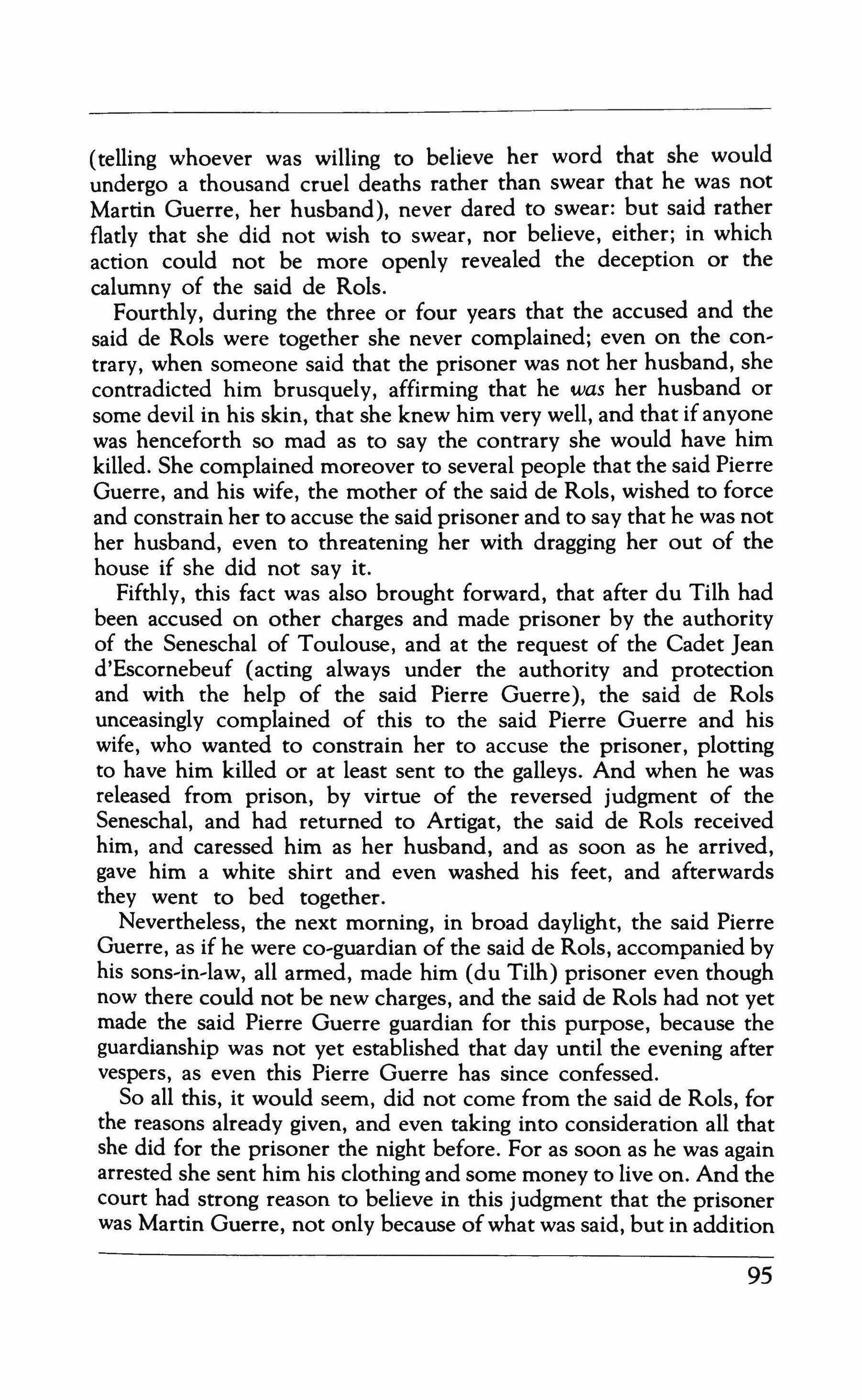
(telling whoever was willing to believe her word that she would undergo a thousand cruel deaths rather than swear that he was not Martin Guerre, her husband), never dared to swear: but said rather flatly that she did not wish to swear, nor believe, either; in which action could not be more openly revealed the deception or the calumny of the said de Rols.
Fourthly, during the three or four years that the accused and the said de Rols were together she never complained; even on the con' trary, when someone said that the prisoner was not her husband, she contradicted him brusquely, affirming that he was her husband or some devil in his skin, that she knew him very well, and that if anyone was henceforth so mad as to say the contrary she would have him killed. She complained moreover to several people that the said Pierre Guerre, and his wife, the mother of the said de Rols, wished to force and constrain her to accuse the said prisoner and to say that he was not her husband, even to threatening her with dragging her out of the house if she did not say it.
Fifthly, this fact was also brought forward, that after du Tilh had been accused on other charges and made prisoner by the authority of the Seneschal of Toulouse, and at the request of the Cadet Jean d'Escornebeuf (acting always under the authority and protection and with the help of the said Pierre Guerre), the said de Rols unceasingly complained of this to the said Pierre Guerre and his wife, who wanted to constrain her to accuse the prisoner, plotting to have him killed or at least sent to the galleys. And when he was released from prison, by virtue of the reversed judgment of the Seneschal, and had returned to Artigat, the said de Rols received him, and caressed him as her husband, and as soon as he arrived, gave him a white shirt and even washed his feet, and afterwards they went to bed together.
Nevertheless, the next morning, in broad daylight, the said Pierre Guerre, as if he were co-guardian of the said de Rols, accompanied by his sons-in-law, all armed, made him (du Tilh) prisoner even though now there could not be new charges, and the said de Rols had not yet made the said Pierre Guerre guardian for this purpose, because the guardianship was not yet established that day until the evening after vespers, as even this Pierre Guerre has since confessed.
So all this, it would seem, did not come from the said de Rols, for the reasons already given, and even taking into consideration all that she did for the prisoner the night before. For as soon as he was again arrested she sent him his clothing and some money to live on. And the court had strong reason to believe in this judgment that the prisoner was Martin Guerre, not only because ofwhat was said, but in addition
95
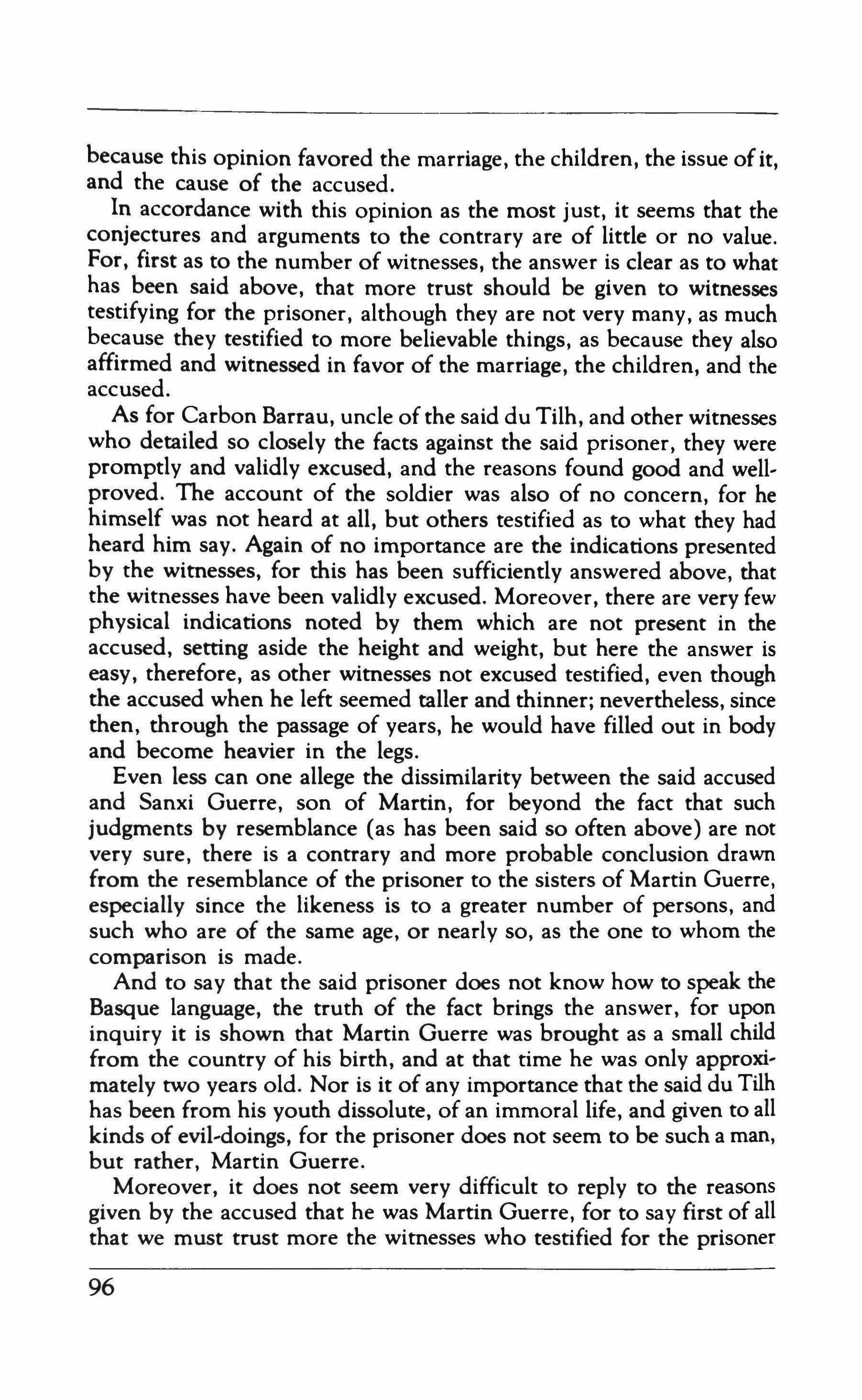
because this opinion favored the marriage, the children, the issue ofit, and the cause of the accused.
In accordance with this opinion as the most just, it seems that the conjectures and arguments to the contrary are of little or no value. For, first as to the number of witnesses, the answer is clear as to what has been said above, that more trust should be given to witnesses testifying for the prisoner, although they are not very many, as much because they testified to more believable things, as because they also affirmed and witnessed in favor of the marriage, the children, and the accused.
As for Carbon Barrau, uncle of the said du Tilh, and other witnesses who detailed so closely the facts against the said prisoner, they were promptly and validly excused, and the reasons found good and wellproved. The account of the soldier was also of no concern, for he himself was not heard at all, but others testified as to what they had heard him say. Again of no importance are the indications presented by the witnesses, for this has been sufficiently answered above, that the witnesses have been validly excused. Moreover, there are very few physical indications noted by them which are not present in the accused, setting aside the height and weight, but here the answer is easy, therefore, as other witnesses not excused testified, even though the accused when he left seemed taller and thinner; nevertheless, since then, through the passage of years, he would have filled out in body and become heavier in the legs.
Even less can one allege the dissimilarity between the said accused and Sanxi Guerre, son of Martin, for beyond the fact that such judgments by resemblance (as has been said so often above) are not very sure, there is a contrary and more probable conclusion drawn from the resemblance of the prisoner to the sisters of Martin Guerre, especially since the likeness is to a greater number of persons, and such who are of the same age, or nearly so, as the one to whom the comparison is made.
And to say that the said prisoner does not know how to speak the Basque language, the truth of the fact brings the answer, for upon inquiry it is shown that Martin Guerre was brought as a small child from the country of his birth, and at that time he was only approximately two years old. Nor is it of any importance that the said du Tilh has been from his youth dissolute, of an immoral life, and given to all kinds of evil-doings, for the prisoner does not seem to be such a man, but rather, Martin Guerre.
Moreover, it does not seem very difficult to reply to the reasons given by the accused that he was Martin Guerre, for to say first of all that we must trust more the witnesses who testified for the prisoner
96
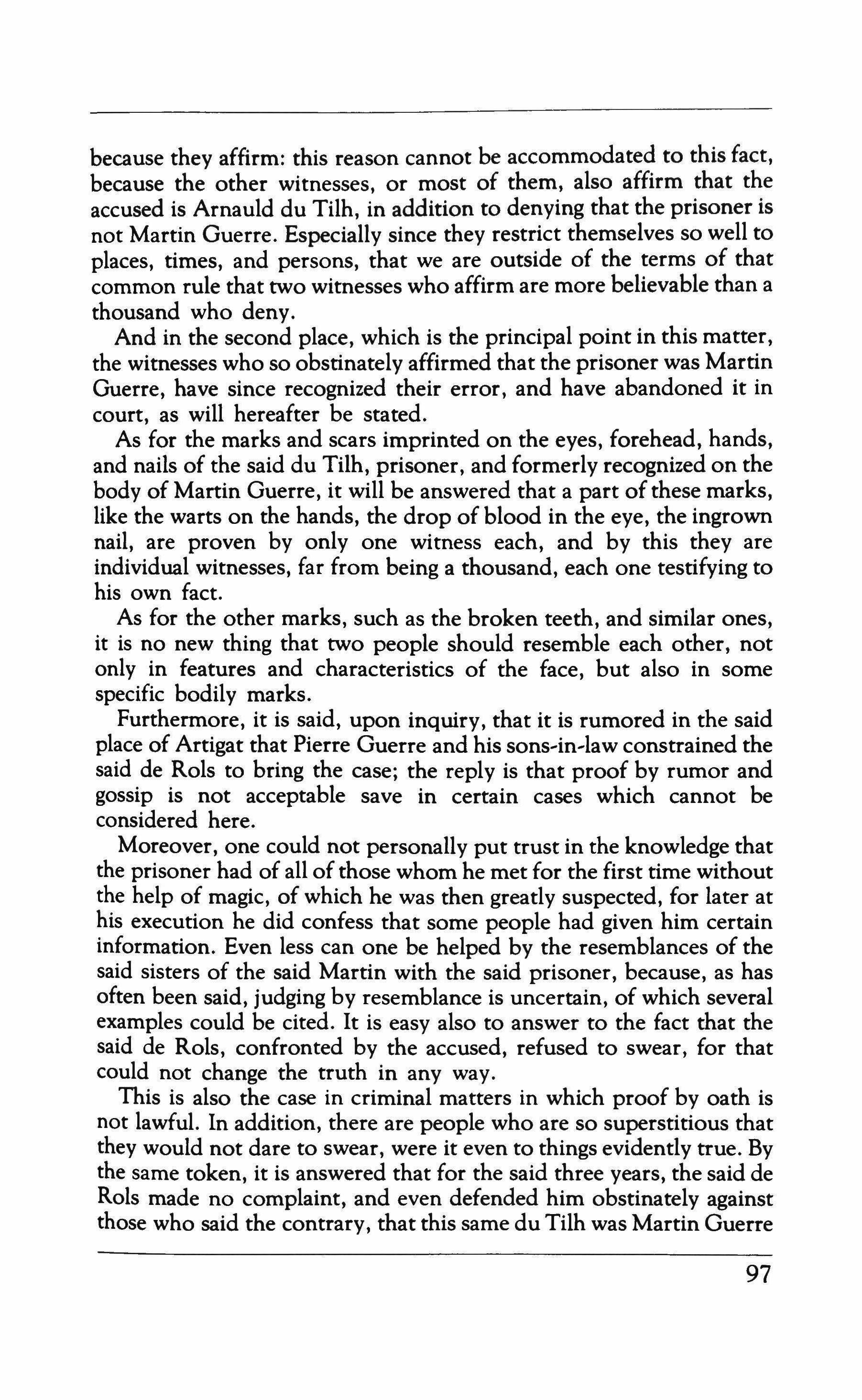
because they affirm: this reason cannot be accommodated to this fact, because the other witnesses, or most of them, also affirm that the accused is Arnauld du Tilh, in addition to denying that the prisoner is not Martin Guerre. Especially since they restrict themselves so well to places, times, and persons, that we are outside of the terms of that common rule that two witnesses who affirm are more believable than a thousand who deny.
And in the second place, which is the principal point in this matter, the witnesses who so obstinately affirmed that the prisoner was Martin Guerre, have since recognized their error, and have abandoned it in court, as will hereafter be stated.
As for the marks and scars imprinted on the eyes, forehead, hands, and nails of the said du Tilh, prisoner, and formerly recognized on the body of Martin Guerre, it will be answered that a part of these marks, like the warts on the hands, the drop of blood in the eye, the ingrown nail, are proven by only one witness each, and by this they are individual witnesses, far from being a thousand, each one testifying to his own fact.
As for the other marks, such as the broken teeth, and similar ones, it is no new thing that two people should resemble each other, not only in features and characteristics of the face, but also in some specific bodily marks.
Furthermore, it is said, upon inquiry, that it is rumored in the said place of Artigat that Pierre Guerre and his sons-in-law constrained the said de Rols to bring the case; the reply is that proof by rumor and gossip is not acceptable save in certain cases which cannot be considered here.
Moreover, one could not personally put trust in the knowledge that the prisoner had of all of those whom he met for the first time without the help of magic, of which he was then greatly suspected, for later at his execution he did confess that some people had given him certain information. Even less can one be helped by the resemblances of the said sisters of the said Martin with the said prisoner, because, as has often been said, judging by resemblance is uncertain, of which several examples could be cited. It is easy also to answer to the fact that the said de Rols, confronted by the accused, refused to swear, for that could not change the truth in any way.
This is also the case in criminal matters in which proof by oath is not lawful. In addition, there are people who are so superstitious that they would not dare to swear, were it even to things evidently true. By the same token, it is answered that for the said three years, the said de Rols made no complaint, and even defended him obstinately against those who said the contrary, that this same du Tilh was Martin Guerre
97
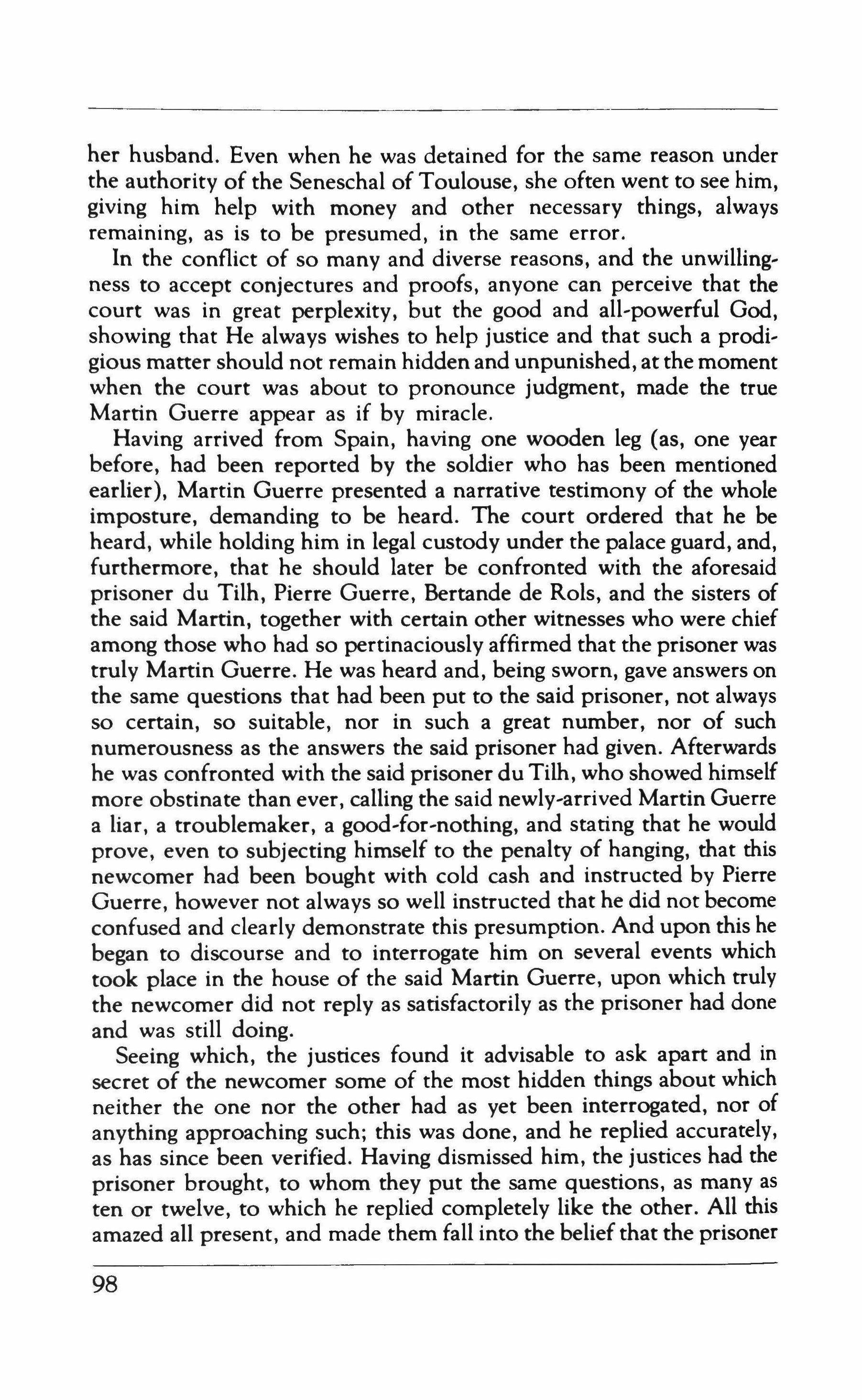
her husband. Even when he was detained for the same reason under the authority of the Seneschal of Toulouse, she often went to see him, giving him help with money and other necessary things, always remaining, as is to be presumed, in the same error.
In the conflict of so many and diverse reasons, and the unwillingness to accept conjectures and proofs, anyone can perceive that the court was in great perplexity, but the good and all-powerful God, showing that He always wishes to help justice and that such a prodigious matter should not remain hidden and unpunished, at the moment when the court was about to pronounce judgment, made the true Martin Guerre appear as if by miracle.
Having arrived from Spain, having one wooden leg (as, one year before, had been reported by the soldier who has been mentioned earlier), Martin Guerre presented a narrative testimony of the whole imposture, demanding to be heard. The court ordered that he be heard, while holding him in legal custody under the palace guard, and, furthermore, that he should later be confronted with the aforesaid prisoner du Tilh, Pierre Guerre, Bertande de Rols, and the sisters of the said Martin, together with certain other witnesses who were chief among those who had so pertinaciously affirmed that the prisoner was truly Martin Guerre. He was heard and, being sworn, gave answers on the same questions that had been put to the said prisoner, not always so certain, so suitable, nor in such a great number, nor of such numerousness as the answers the said prisoner had given. Afterwards he was confronted with the said prisoner du Tilh, who showed himself more obstinate than ever, calling the said newly-arrived Martin Guerre a liar, a troublemaker, a good-for-nothing, and stating that he would prove, even to subjecting himself to the penalty of hanging, that this newcomer had been bought with cold cash and instructed by Pierre Guerre, however not always so well instructed that he did not become confused and clearly demonstrate this presumption. And upon this he began to discourse and to interrogate him on several events which took place in the house of the said Martin Guerre, upon which truly the newcomer did not reply as satisfactorily as the prisoner had done and was still doing.
Seeing which, the justices found it advisable to ask apart and in secret of the newcomer some of the most hidden things about which neither the one nor the other had as yet been interrogated, nor of anything approaching such; this was done, and he replied accurately, as has since been verified. Having dismissed him, the justices had the prisoner brought, to whom they put the same questions, as many as ten or twelve, to which he replied completely like the other. All this amazed all present, and made them fall into the belief that the prisoner
98
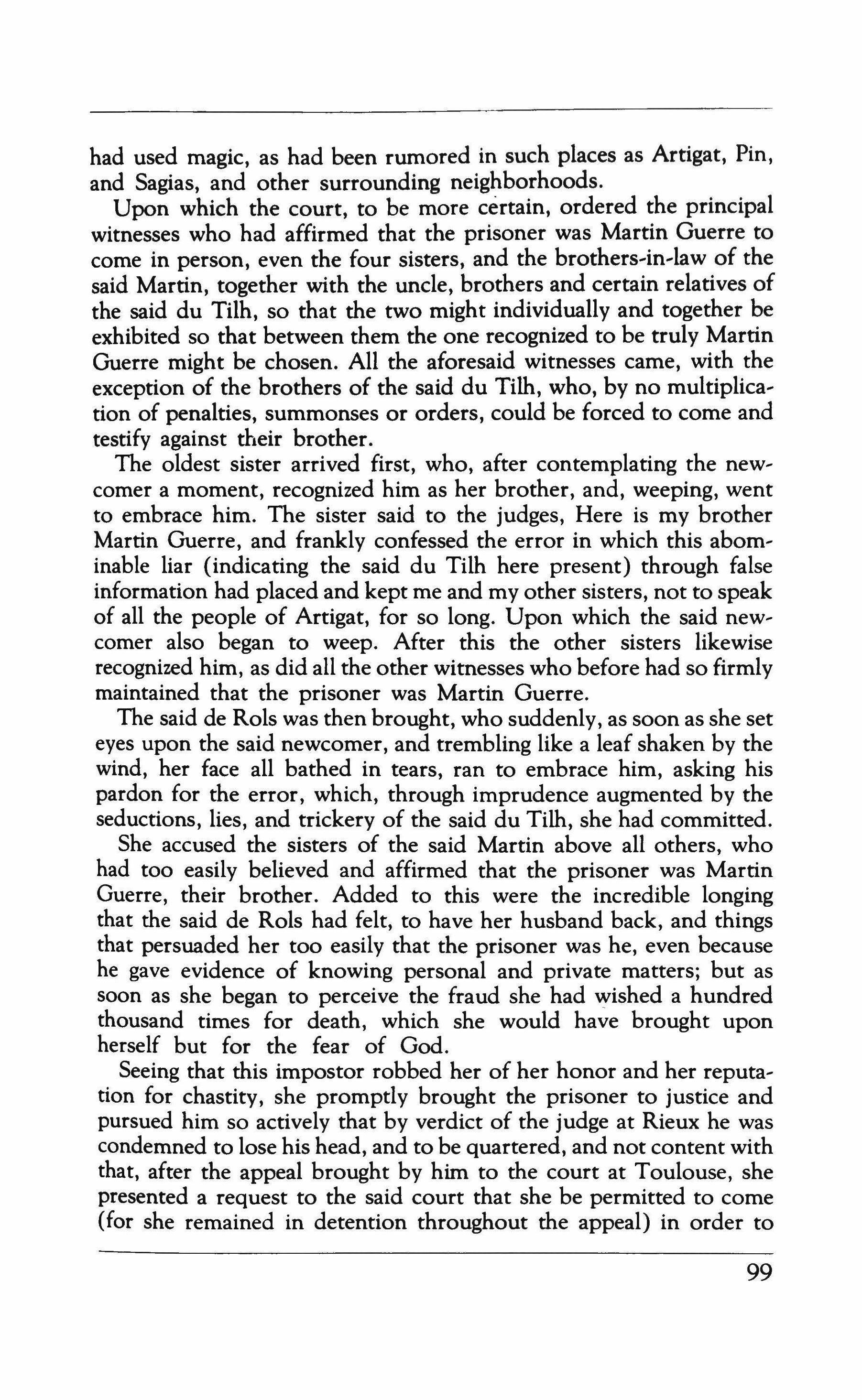
had used magic, as had been rumored in such places as Artigat, Pin, and Sagias, and other surrounding neighborhoods.
Upon which the court, to be more certain, ordered the principal witnesses who had affirmed that the prisoner was Martin Guerre to come in person, even the four sisters, and the brothers-in-law of the said Martin, together with the uncle, brothers and certain relatives of the said du Tilh, so that the two might individually and together be exhibited so that between them the one recognized to be truly Martin Guerre might be chosen. All the aforesaid witnesses came, with the exception of the brothers of the said du Tilh, who, by no multiplication of penalties, summonses or orders, could be forced to come and testify against their brother.
The oldest sister arrived first, who, after contemplating the newcomer a moment, recognized him as her brother, and, weeping, went to embrace him. The sister said to the judges, Here is my brother Martin Guerre, and frankly confessed the error in which this aborninable liar (indicating the said du Tilh here present) through false information had placed and kept me and my other sisters, not to speak of all the people of Artigat, for so long. Upon which the said new, comer also began to weep. After this the other sisters likewise recognized him, as did all the other witnesses who before had so firmly maintained that the prisoner was Martin Guerre.
The said de Rols was then brought, who suddenly, as soon as she set eyes upon the said newcomer, and trembling like a leaf shaken by the wind, her face all bathed in tears, ran to embrace him, asking his pardon for the error, which, through imprudence augmented by the seductions, lies, and trickery of the said du Tilh, she had committed.
She accused the sisters of the said Martin above all others, who had too easily believed and affirmed that the prisoner was Martin Guerre, their brother. Added to this were the incredible longing that the said de Rols had felt, to have her husband back, and things that persuaded her too easily that the prisoner was he, even because he gave evidence of knowing personal and private matters; but as soon as she began to perceive the fraud she had wished a hundred thousand times for death, which she would have brought upon herself but for the fear of God.
Seeing that this impostor robbed her of her honor and her reputation for chastity, she promptly brought the prisoner to justice and pursued him so actively that by verdict of the judge at Rieux he was condemned to lose his head, and to be quartered, and not content with that, after the appeal brought by him to the court at Toulouse, she presented a request to the said court that she be permitted to come (for she remained in detention throughout the appeal) in order to
99
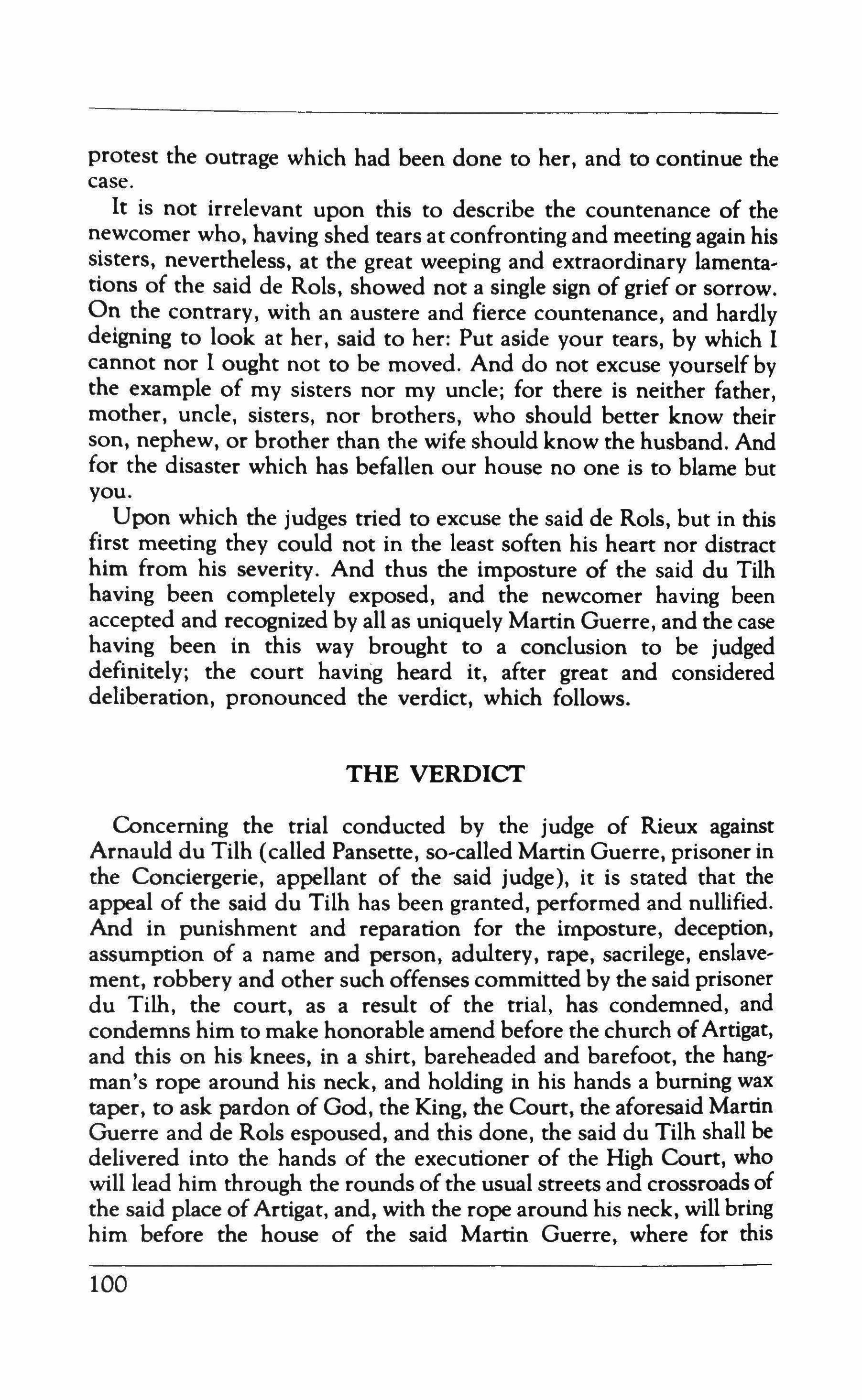
protest the outrage which had been done to her, and to continue the case.
It is not irrelevant upon this to describe the countenance of the newcomer who, having shed tears at confronting and meeting again his sisters, nevertheless, at the great weeping and extraordinary lamentations of the said de Rols, showed not a single sign of grief or sorrow. On the contrary, with an austere and fierce countenance, and hardly deigning to look at her, said to her: Put aside your tears, by which I cannot nor I ought not to be moved. And do not excuse yourself by the example of my sisters nor my uncle; for there is neither father, mother, uncle, sisters, nor brothers, who should better know their son, nephew, or brother than the wife should know the husband. And for the disaster which has befallen our house no one is to blame but you.
Upon which the judges tried to excuse the said de Rols, but in this first meeting they could not in the least soften his heart nor distract him from his severity. And thus the imposture of the said du Tilh having been completely exposed, and the newcomer having been accepted and recognized by all as uniquely Martin Guerre, and the case having been in this way brought to a conclusion to be judged definitely; the court having heard it, after great and considered deliberation, pronounced the verdict, which follows.
THE VERDICI'
Concerning the trial conducted by the judge of Rieux against Arnauld du Tilh (called Pansette, so-called Martin Guerre, prisoner in the Conciergerie, appellant of the said judge), it is stated that the appeal of the said du Tilh has been granted, performed and nullified. And in punishment and reparation for the imposture, deception, assumption of a name and person, adultery, rape, sacrilege, enslavement, robbery and other such offenses committed by the said prisoner du Tilh, the court, as a result of the trial, has condemned, and condemns him to make honorable amend before the church ofArtigat, and this on his knees, in a shirt, bareheaded and barefoot, the hangman's rope around his neck, and holding in his hands a burning wax taper, to ask pardon of God, the King, the Court, the aforesaid Martin Guerre and de Rols espoused, and this done, the said du Tilh shall be delivered into the hands of the executioner of the High Court, who will lead him through the rounds of the usual streets and crossroads of the said place ofArtigat, and, with the rope around his neck, will bring him before the house of the said Martin Guerre, where for this 100
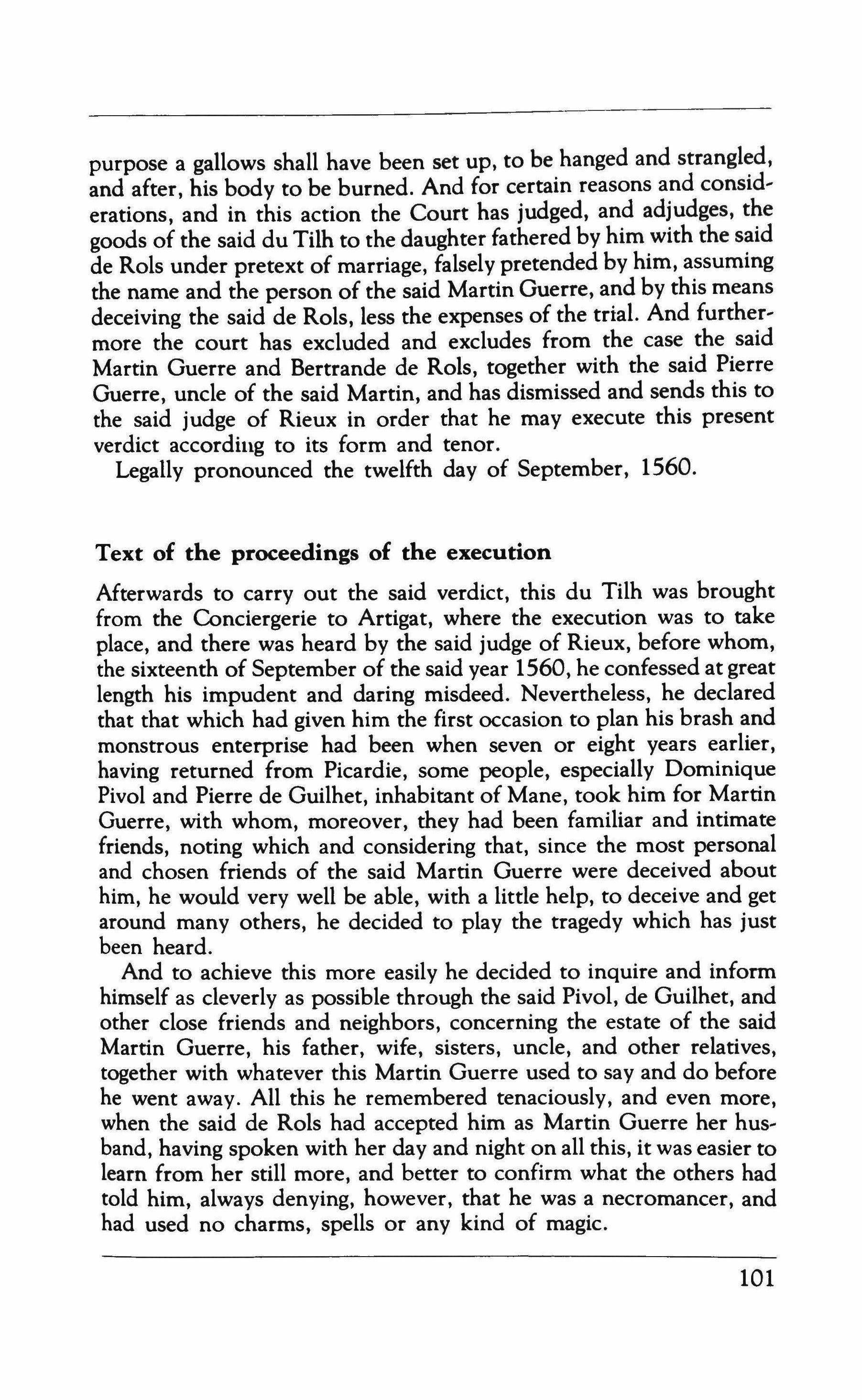
purpose a gallows shall have been set up, to be hanged and strangled, and after, his body to be burned. And for certain reasons and considerations, and in this action the Court has judged, and adjudges, the goods of the said du Tilh to the daughter fathered by him with the said de Rols under pretext of marriage, falsely pretended by him, assuming the name and the person of the said Martin Guerre, and by this means deceiving the said de Rols, less the expenses of the trial. And further, more the court has excluded and excludes from the case the said Martin Guerre and Bertrande de Rols, together with the said Pierre Guerre, uncle of the said Martin, and has dismissed and sends this to the said judge of Rieux in order that he may execute this present verdict according to its form and tenor.
Legally pronounced the twelfth day of September, 1560.
Text of the proceedings of the execution
Afterwards to carry out the said verdict, this du Tilh was brought from the Conciergerie to Artigat, where the execution was to take place, and there was heard by the said judge of Rieux, before whom, the sixteenth of September of the said year 1560, he confessed at great length his impudent and daring misdeed. Nevertheless, he declared that that which had given him the first occasion to plan his brash and monstrous enterprise had been when seven or eight years earlier, having returned from Picardie, some people, especially Dominique Pivol and Pierre de Guilhet, inhabitant of Mane, took him for Martin Guerre, with whom, moreover, they had been familiar and intimate friends, noting which and considering that, since the most personal and chosen friends of the said Martin Guerre were deceived about him, he would very well be able, with a little help, to deceive and get around many others, he decided to play the tragedy which has just been heard.
And to achieve this more easily he decided to inquire and inform himself as cleverly as possible through the said Pivol, de Guilhet, and other close friends and neighbors, concerning the estate of the said Martin Guerre, his father, wife, sisters, uncle, and other relatives, together with whatever this Martin Guerre used to say and do before he went away. All this he remembered tenaciously, and even more, when the said de Rols had accepted him as Martin Guerre her husband, having spoken with her day and night on all this, it was easier to learn from her still more, and better to confirm what the others had told him, always denying, however, that he was a necromancer, and had used no charms, spells or any kind of magic.
101
For the rest, he confessed having been a rascal in many ways, even having committed several thefts and outrages. He also confessed being in debt to several persons, whom he named during the hearing, for various sums of money, quantities of grain, wine, and millet-and, moreover, for certain hundredweights of wool to be specified at greater length, requesting that the said creditors be satisfied with the goods which he still had at du Pin, from his late father Arnauld Guilhem du Tilh, as well as from others, presently held and occupied by Carbon Barrau, his maternal uncle, whom in this way he had already placed in authority. Together with this he made a complete inventory of what was owed him and by whom.
After this he established as his heiress his daughter Bernarde du Tilh, whom he had by the said Bertrande de Rols, and gave her as guardians Jean du Tilh his brother, resident of Pin, and Dominique Rebendaire, resident of Toulouse, making them also executors of his will.
Again the said du Tilh, having been heard, persisted in the confession, even to three and four times; and even again on the ladder to the gallows in front of the house of the said Martin Guerre, where the execution was carried out, he confessed frankly to having constructed and carried out the said imposture in the manner heretofore described, asking pardon of the said Martin Guerre and Bertrande de Rols, espoused, and of the said Pierre Guerre, uncle of the said Martin, with great manifestations of repentance, and detestation ofhis deed, all the while crying upon God for mercy, through His Son Jesus Christ.
And thus he was executed, his body hanged, and afterwards burned.
A RAISON CEDE
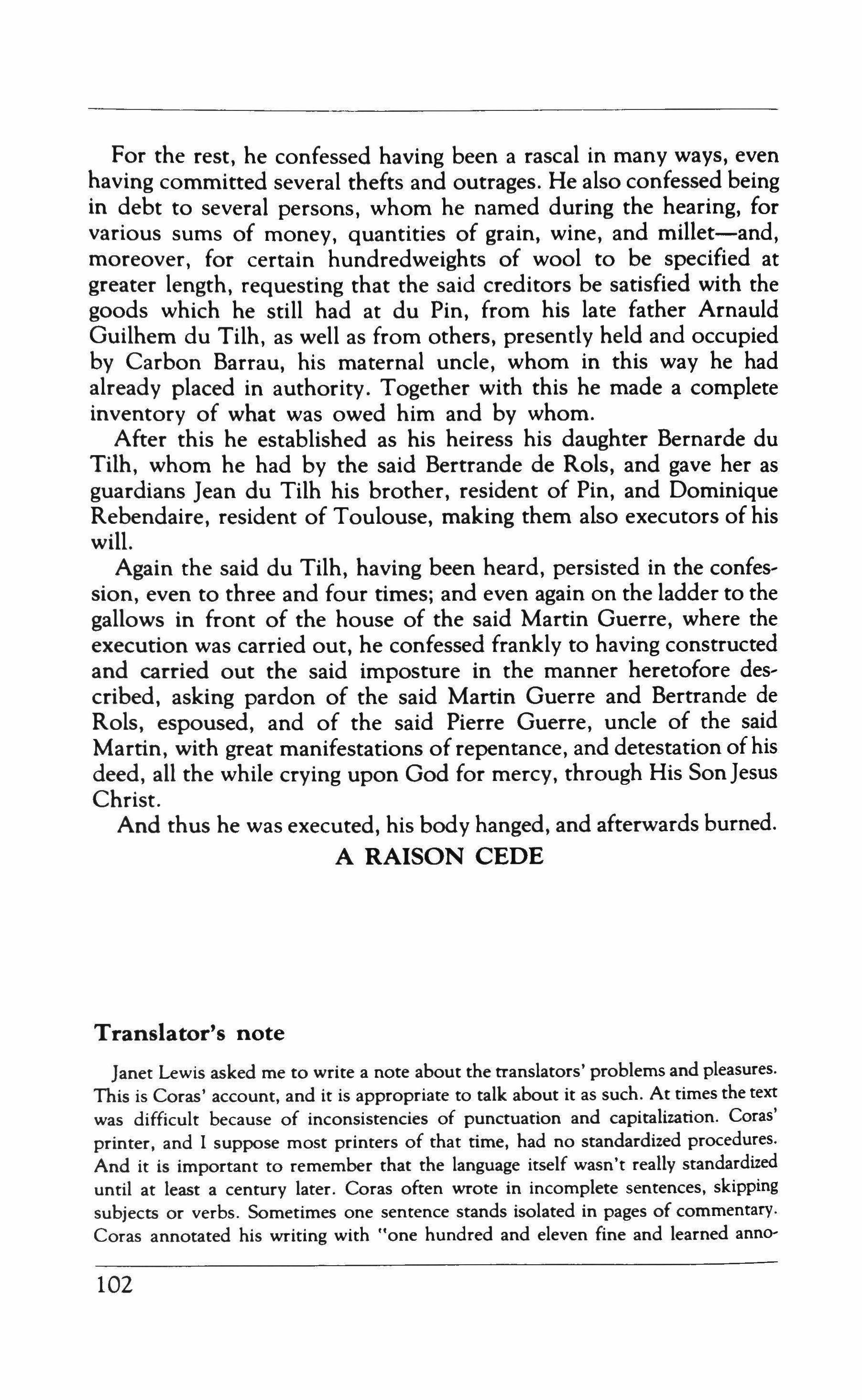
Translator's note
Janet Lewis asked me to write a note about the translators' problems and pleasures. This is Coras' account, and it is appropriate to talk about it as such. At times the text was difficult because of inconsistencies of punctuation and capitalization. Coras' printer, and I suppose most primers of that time, had no standardized procedures. And it is important to remember that the language itself wasn't really standardized until at least a century later. Coras often wrote in incomplete sentences, skipping subjects or verbs. Sometimes one sentence stands isolated in pages of commentary. Coras annotated his writing with "one hundred and eleven fine and learned anna-
102
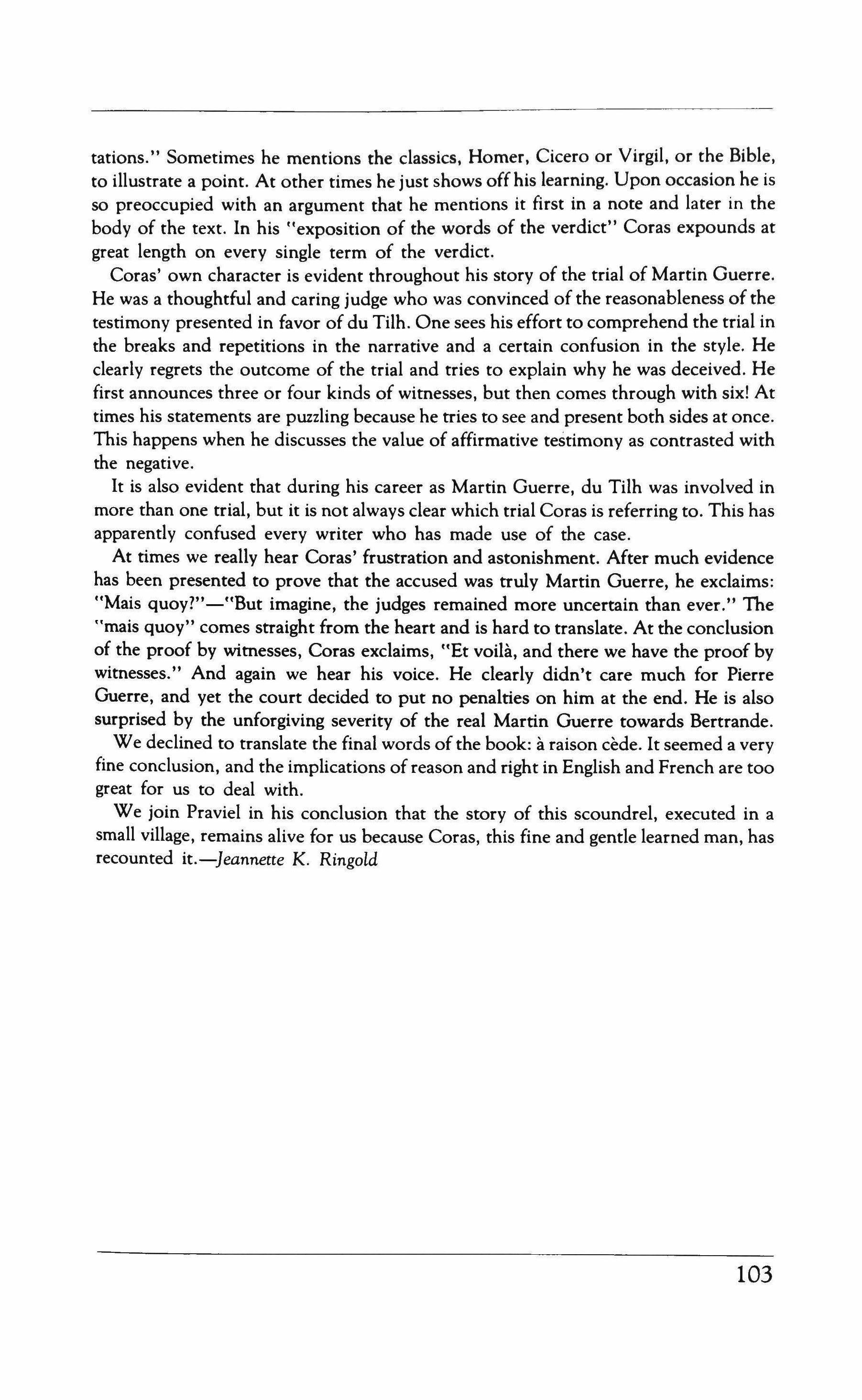
rations." Sometimes he mentions the classics. Homer. Cicero or Virgil. or the Bible. to illustrate a point. At other times he just shows offhis learning. Upon occasion he is so preoccupied with an argument that he mentions it first in a note and later in the body of the text. In his "exposition of the words of the verdict" Coras expounds at great length on every single term of the verdict.
Coras' own character is evident throughout his story of the trial of Martin Guerre. He was a thoughtful and caring judge who was convinced of the reasonableness of the testimony presented in favor of du Tilh. One sees his effort to comprehend the trial in the breaks and repetitions in the narrative and a certain confusion in the style. He clearly regrets the outcome of the trial and tries to explain why he was deceived. He first announces three or four kinds of witnesses. but then comes through with six! At times his statements are puzzling because he tries to see and present both sides at once. This happens when he discusses the value of affirmative testimony as contrasted with the negative.
It is also evident that during his career as Martin Guerre, du Tilh was involved in more than one trial. but it is not always clear which trial Coras is referring to. This has apparently confused every writer who has made use of the case.
At times we really hear Caras' frustration and astonishment. After much evidence has been presented to prove that the accused was truly Martin Guerre, he exclaims: "Mais quoy?"-"But imagine, the judges remained more uncertain than ever." The "rnais quoy" comes straight from the heart and is hard to translate. At the conclusion of the proof by witnesses, Coras exclaims. "Et voila, and there we have the proof by witnesses." And again we hear his voice. He clearly didn't care much for Pierre Guerre, and yet the court decided to put no penalties on him at the end. He is also surprised by the unforgiving severity of the real Martin Guerre towards Bertrande. We declined to translate the final words of the book: a raison cede. It seemed a very fine conclusion, and the implications of reason and right in English and French are too great for us to deal with.
We join Praviel in his conclusion that the story of this scoundrel, executed in a small village, remains alive for us because Coras, this fine and gentle learned man, has recounted it.-Jeannette K. Ringold
103
Sources of The Wife of Martin Guerre
Janet Lewis
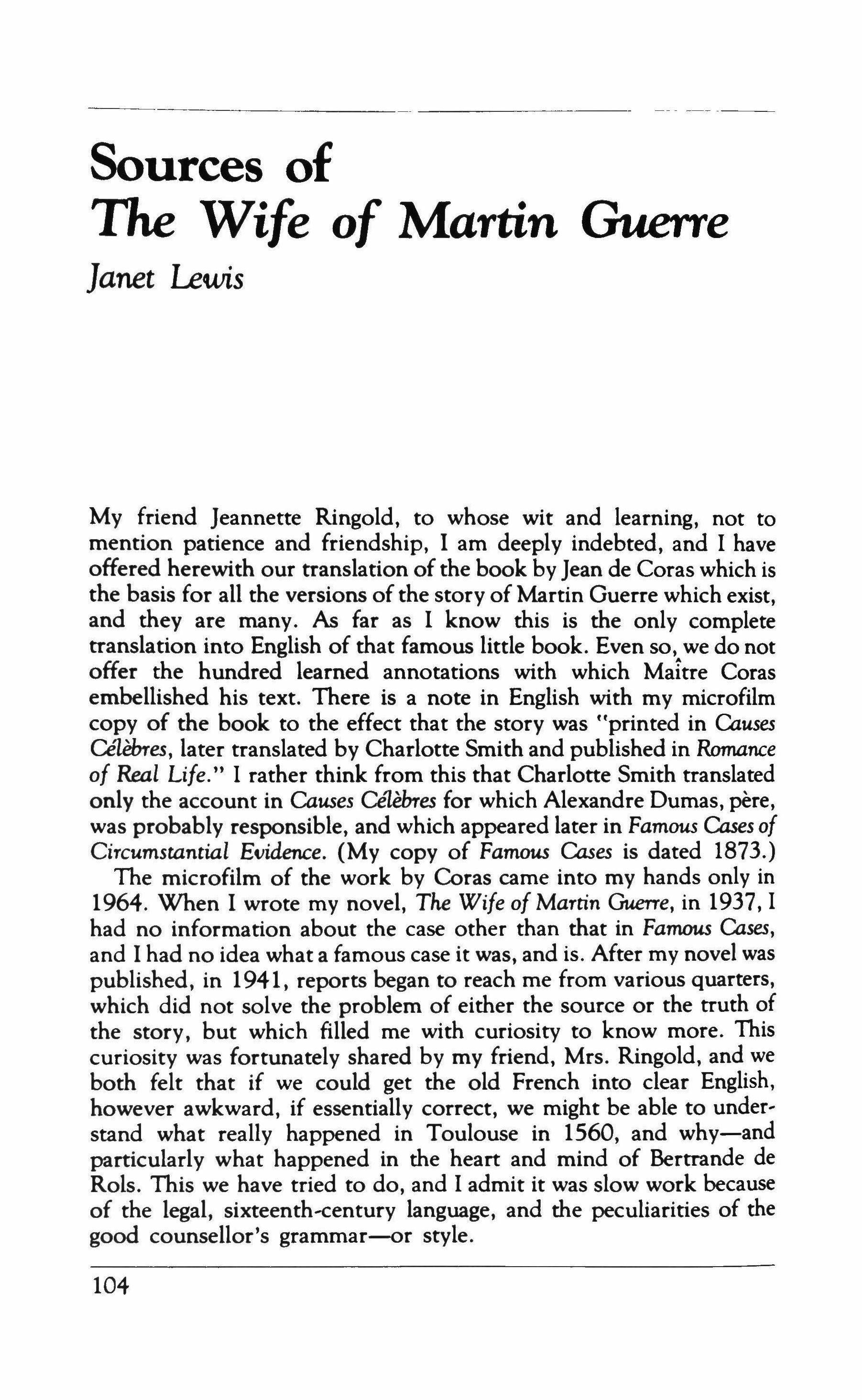
My friend Jeannette Ringold, to whose wit and learning, not to mention patience and friendship, I am deeply indebted, and I have offered herewith our translation of the book byJean de Coras which is the basis for all the versions of the story of Martin Guerre which exist, and they are many. As far as I know this is the only complete translation into English of that famous little book. Even so, we do not offer the hundred learned annotations with which Maitre Coras embellished his text. There is a note in English with my microfilm copy of the book to the effect that the story was "printed in Causes Ce'lebres, later translated by Charlotte Smith and published in Romance of Real Life." I rather think from this that Charlotte Smith translated only the account in Causes Ce1ebres for which Alexandre Dumas, pere, was probably responsible, and which appeared later in Famous Cases of Circumstantial EtJidence. (My copy of Famous Cases is dated 1873.)
The microfilm of the work by Coras came into my hands only in 1964. When I wrote my novel, The Wife of Martin Guerre, in 1937, I had no information about the case other than that in Famous Cases, and I had no idea what a famous case it was, and is. After my novel was published, in 1941, reports began to reach me from various quarters, which did not solve the problem of either the source or the truth of the story, but which filled me with curiosity to know more. This curiosity was fortunately shared by my friend, Mrs. Ringold, and we both felt that if we could get the old French into clear English, however awkward, if essentially correct, we might be able to understand what really happened in Toulouse in 1560, and why-and particularly what happened in the heart and mind of Bertrande de Rols. This we have tried to do, and I admit it was slow work because of the legal, sixteenth-century language, and the peculiarities of the good counsellor's grammar-or style.
104

In the end, many questions remain unanswered. Enough have been answered so that I realize that if I were to write the story of Bertrande today it would have to be a different story, and I must say definitely from now on that The Wife of Martin Guerre is fiction based on fact.
The feeling that we were approaching the truth, however, page by page, was continually exciting, and we became more and more aware of the presence of Coras behind his words. We were aware particularly of his concern, regret and continued perplexity. He seemed to wish to make it clear that the reversal by the Court of Toulouse of the verdict of the judge at Rieux was not unreasonable. All that prevented that most humane and reasonable decision from being put into effect was the unexpected evidence of the appearance of the man with the wooden leg.
The account by Coras leaves us with the unmistakable feeling that Bertrande de Rols was unwilling to testify against the impostor or demand his death, that Pierre Guerre induced her to bring the suit against her presumed husband, and that the manner in which she welcomed home the true Martin was bewildering-not the tears, nor the trembling "like a leaf in the wind," but her words of repentance and self-justification.
The text in Famous Cases says: "Whether or not the wife ever suspected that she was the victim of a daring imposture can never be ascertained. It And again: HIt was at the pressing instance of Pierre Ouerre, an uncle of the missing man that Bertrande was at length induced to invoke the vengeance of the law on her pretended spouse." I ignored the pressing instance of Uncle Pierre, and, being more interested in the wife than in Martin Guerre himself, I built my casethat is to say, the character of Bertrande-upon her own words to the court upon the return of Martin. She is, then, in my story, what at that dreadful moment she had wanted to be. It is at least as this that she wished to be remembered.
Without departing otherwise from the facts given in Famous Cases, I wrote a first and rather short version ofthe story, to be told that it was not believable. And in order to make it more believable I extended it with bits from L'Ancien Regime of Frantz Funck-Brentano, and my imagination, memories of Provence, and gossip with an old woman from Auvergne who was my neighbor in Palo Alto. This version was published in 1941 by the Colt Press of San Francisco in a beautiful volume with a brief foreword which cited the Famous Cases, giving, quite erroneously, responsibility for the Famous Cases to Samuel March Phillips, simply because the compiler of the cases used the essay by Phillips on Circumstantial Evidence as the first item in his book.
105
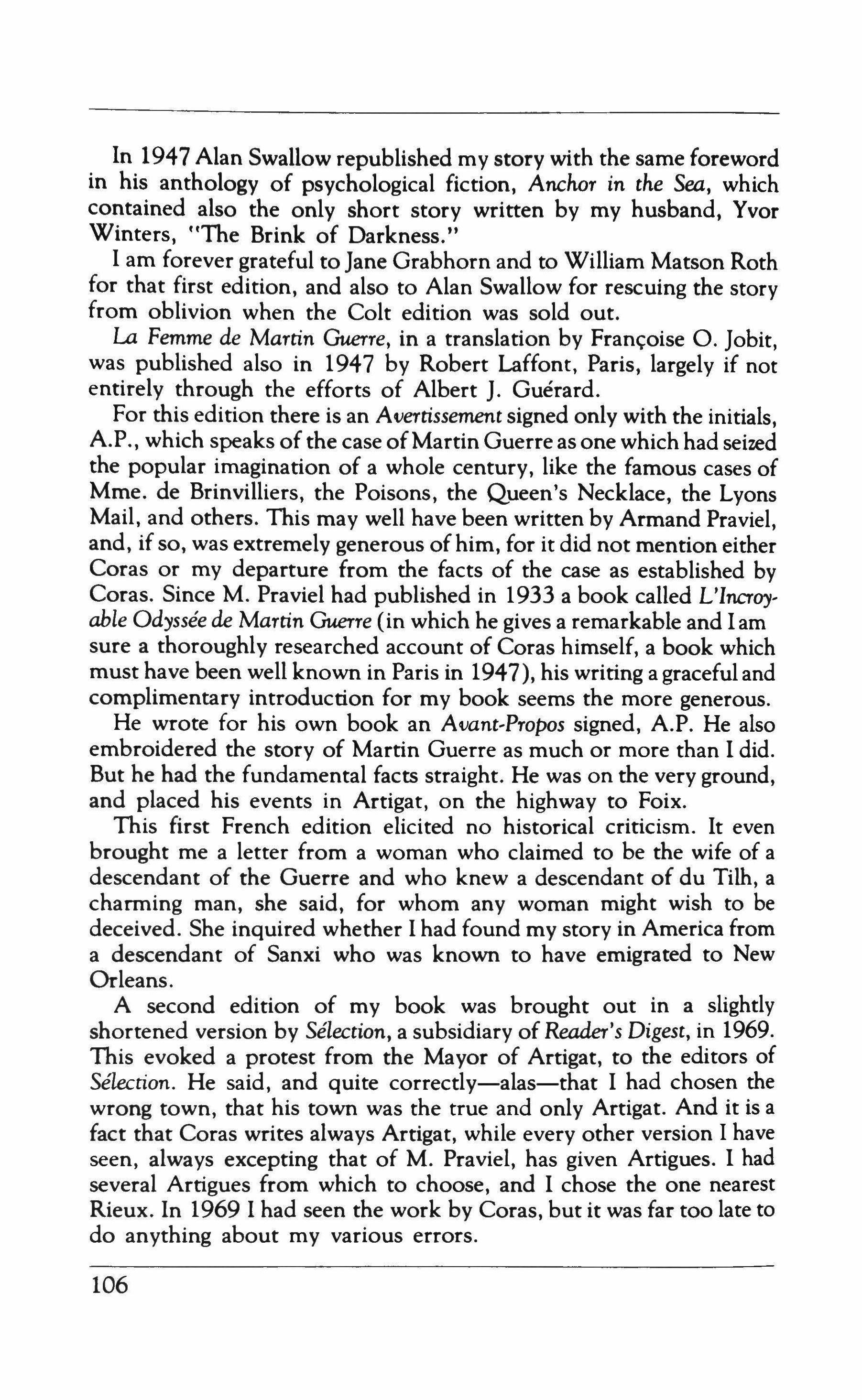
In 1947 Alan Swallow republished my story with the same foreword in his anthology of psychological fiction, Anchor in the Sea, which contained also the only short story written by my husband, Yvor Winters, "The Brink of Darkness."
I am forever grateful to Jane Grabhorn and to William Matson Roth for that first edition, and also to Alan Swallow for rescuing the story from oblivion when the Colt edition was sold out.
La Femme de Martin Guerre, in a translation by Francoise O. [obir, was published also in 1947 by Robert Laffont, Paris, largely if not entirely through the efforts of Albert J. Guerard.
For this edition there is an Avertissement signed only with the initials, A.P., which speaks of the case ofMartin Guerre as one which had seized the popular imagination of a whole century, like the famous cases of Mme. de Brinvilliers, the Poisons, the Queen's Necklace, the Lyons Mail, and others. This may well have been written by Armand Praviel, and, if so, was extremely generous ofhim, for it did not mention either Coras or my departure from the facts of the case as established by Coras. Since M. Praviel had published in 1933 a book called L'lncroyable Odyssee de Martin Guerre (in which he gives a remarkable and lam sure a thoroughly researched account of Coras himself, a book which must have been well known in Paris in 1947), his writing a graceful and complimentary introduction for my book seems the more generous. He wrote for his own book an Avant-Propos signed, A.P. He also embroidered the story of Martin Guerre as much or more than I did. But he had the fundamental facts straight. He was on the very ground, and placed his events in Artigar, on the highway to Foix.
This first French edition elicited no historical criticism. It even brought me a letter from a woman who claimed to be the wife of a descendant of the Guerre and who knew a descendant of du Tilh, a charming man, she said, for whom any woman might wish to be deceived. She inquired whether I had found my story in America from a descendant of Sanxi who was known to have emigrated to New Orleans.
A second edition of my book was brought out in a slightly shortened version by Selection, a subsidiary of Reader's Digest, in 1969. This evoked a protest from the Mayor of Artigat, to the editors of Se'lection. He said, and quite correctly-alas-that I had chosen the wrong town, that his town was the true and only Artigat. And it is a fact that Coras writes always Artigat, while every other version I have seen, always excepting that of M. Praviel, has given Artigues. I had several Artigues from which to choose, and I chose the one nearest Rieux. In 1969 I had seen the work by Coras, but it was far too late to do anything about my various errors.
106
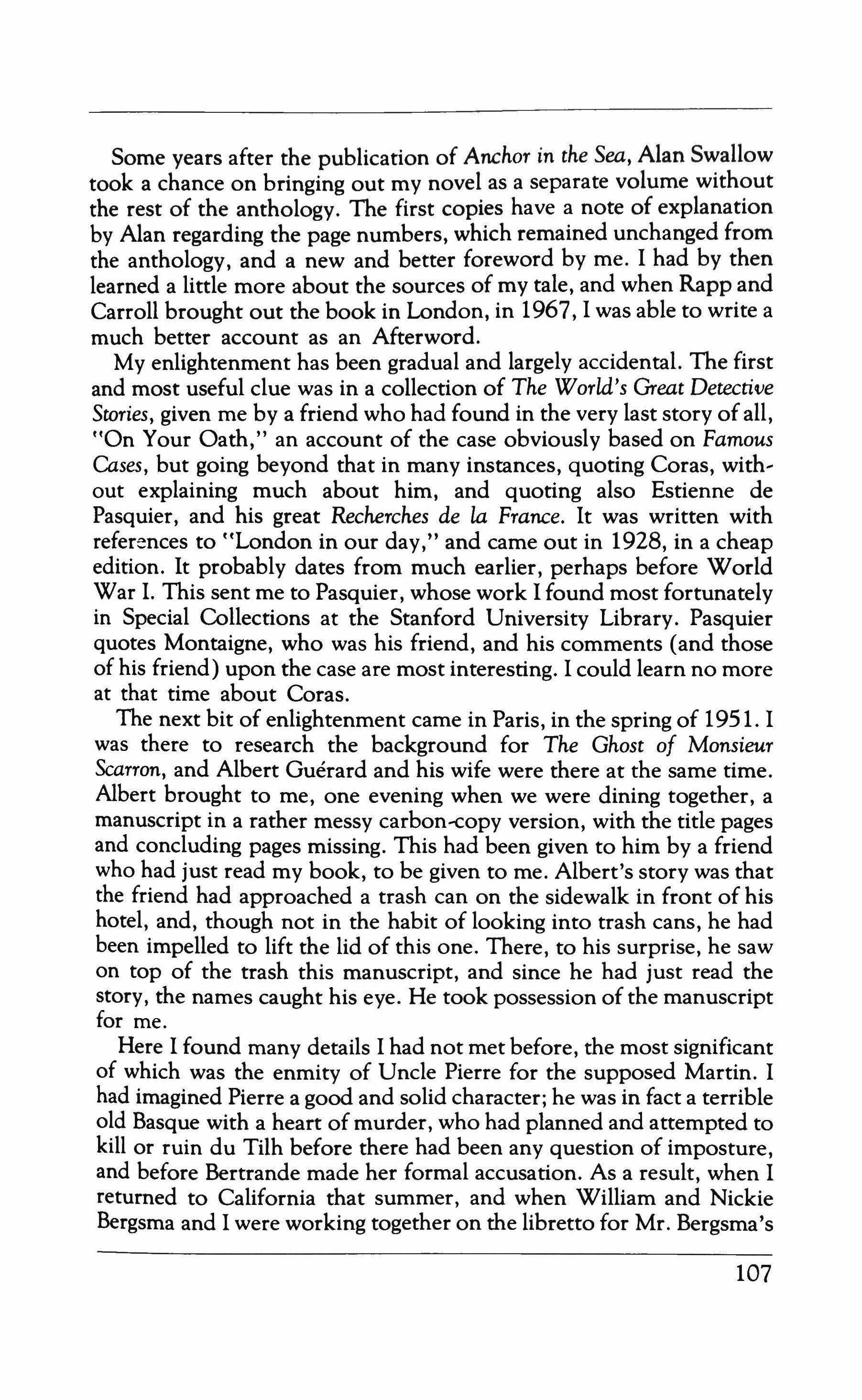
Some years after the publication of Anchor in the Sea, Alan Swallow took a chance on bringing out my novel as a separate volume without the rest of the anthology. The first copies have a note of explanation by Alan regarding the page numbers, which remained unchanged from the anthology, and a new and better foreword by me. I had by then learned a little more about the sources of my tale, and when Rapp and Carroll brought out the book in London, in 1967, I was able to write a much better account as an Afterword.
My enlightenment has been gradual and largely accidental. The first and most useful clue was in a collection of The World's Great Detective Stories, given me by a friend who had found in the very last story ofall, "On Your Oath," an account of the case obviously based on Famous Cases, but going beyond that in many instances, quoting Coras, with, out explaining much about him, and quoting also Estienne de Pasquier, and his great Recherches de la France. It was written with references to "London in our day," and came out in 1928, in a cheap edition. It probably dates from much earlier, perhaps before World War l. This sent me to Pasquier, whose work I found most fortunately in Special Collections at the Stanford University Library. Pasquier quotes Montaigne, who was his friend, and his comments (and those of his friend) upon the case are most interesting. I could learn no more at that time about Coras.
The next bit of enlightenment came in Paris, in the spring of 1951. I was there to research the background for The Ghost of Monsieur Searron, and Albert Guerard and his wife were there at the same time. Albert brought to me, one evening when we were dining together, a manuscript in a rather messy carbon-copy version, with the title pages and concluding pages missing. This had been given to him by a friend who had just read my book, to be given to me. Albert's story was that the friend had approached a trash can on the sidewalk in front of his hotel, and, though not in the habit of looking into trash cans, he had been impelled to lift the lid of this one. There, to his surprise, he saw on top of the trash this manuscript, and since he had just read the story, the names caught his eye. He took possession of the manuscript for me.
Here I found many details I had not met before, the most significant of which was the enmity of Uncle Pierre for the supposed Martin. I had imagined Pierre a good and solid character; he was in fact a terrible old Basque with a heart of murder, who had planned and attempted to kill or ruin du Tilh before there had been any question of imposture, and before Bertrande made her formal accusation. As a result, when I returned to California that summer, and when William and Nickie Bergsma and I were working together on the libretto for Mr. Bergsma's
107
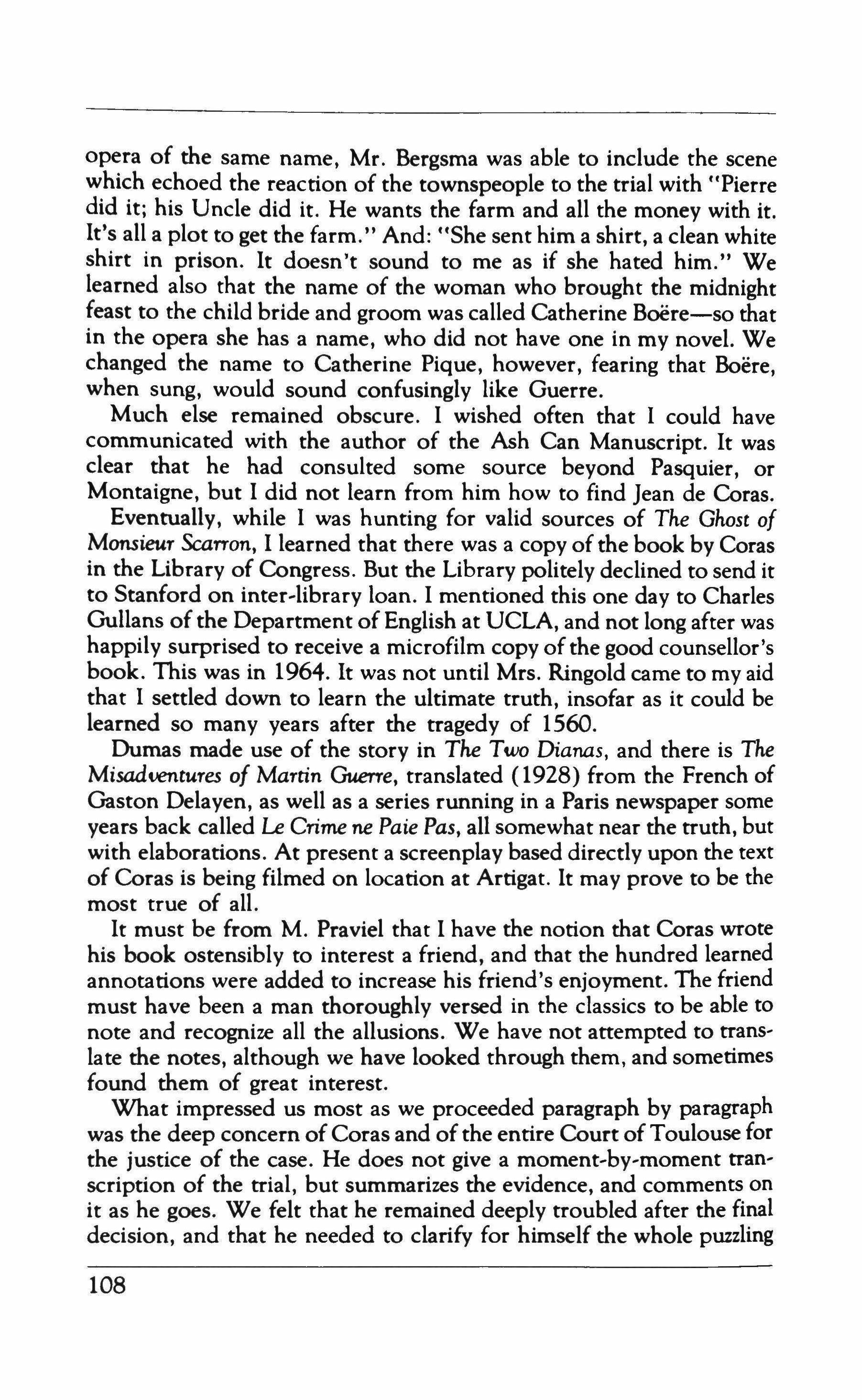
opera of the same name, Mr. Bergsma was able to include the scene which echoed the reaction of the townspeople to the trial with "Pierre did it; his Uncle did it. He wants the farm and all the money with it. It's all a plot to get the farm." And: "She sent him a shirt, a clean white shirt in prison. It doesn't sound to me as if she hated him." We learned also that the name of the woman who brought the midnight feast to the child bride and groom was called Catherine Boere=-so that in the opera she has a name, who did not have one in my novel. We changed the name to Catherine Pique, however, fearing that Boere, when sung, would sound confusingly like Guerre.
Much else remained obscure. I wished often that I could have communicated with the author of the Ash Can Manuscript. It was clear that he had consulted some source beyond Pasquier, or Montaigne, but I did not learn from him how to find Jean de Coras.
Eventually, while I was hunting for valid sources of The Ghost of Monsieur &arron, I learned that there was a copy of the book by Coras in the Library of Congress. But the Library politely declined to send it to Stanford on inter-library loan. I mentioned this one day to Charles Gullans of the Department of English at UCLA, and not long after was happily surprised to receive a microfilm copy ofthe good counsellor's book. This was in 1964. It was not until Mrs. Ringold came to my aid that I settled down to learn the ultimate truth, insofar as it could be learned so many years after the tragedy of 1560.
Dumas made use of the story in The Two Dianas, and there is The Misadventures 0/ Martin Guerre, translated (1928) from the French of Gaston Delayen, as well as a series running in a Paris newspaper some years back called Le Crime ne Paie Pas, all somewhat near the truth, but with elaborations. At present a screenplay based directly upon the text of Coras is being filmed on location at Artigat. It may prove to be the most true of all.
It must be from M. Praviel that I have the notion that Coras wrote his book ostensibly to interest a friend, and that the hundred learned annotations were added to increase his friend's enjoyment. The friend must have been a man thoroughly versed in the classics to be able to note and recognize all the allusions. We have not attempted to translate the notes, although we have looked through them, and sometimes found them of great interest.
What impressed us most as we proceeded paragraph by paragraph was the deep concern of Coras and ofthe entire Court of Toulouse for the justice of the case. He does not give a moment-by-moment transcription of the trial, but summarizes the evidence, and comments on it as he goes. We felt that he remained deeply troubled after the final decision, and that he needed to clarify for himself the whole puzzling
108
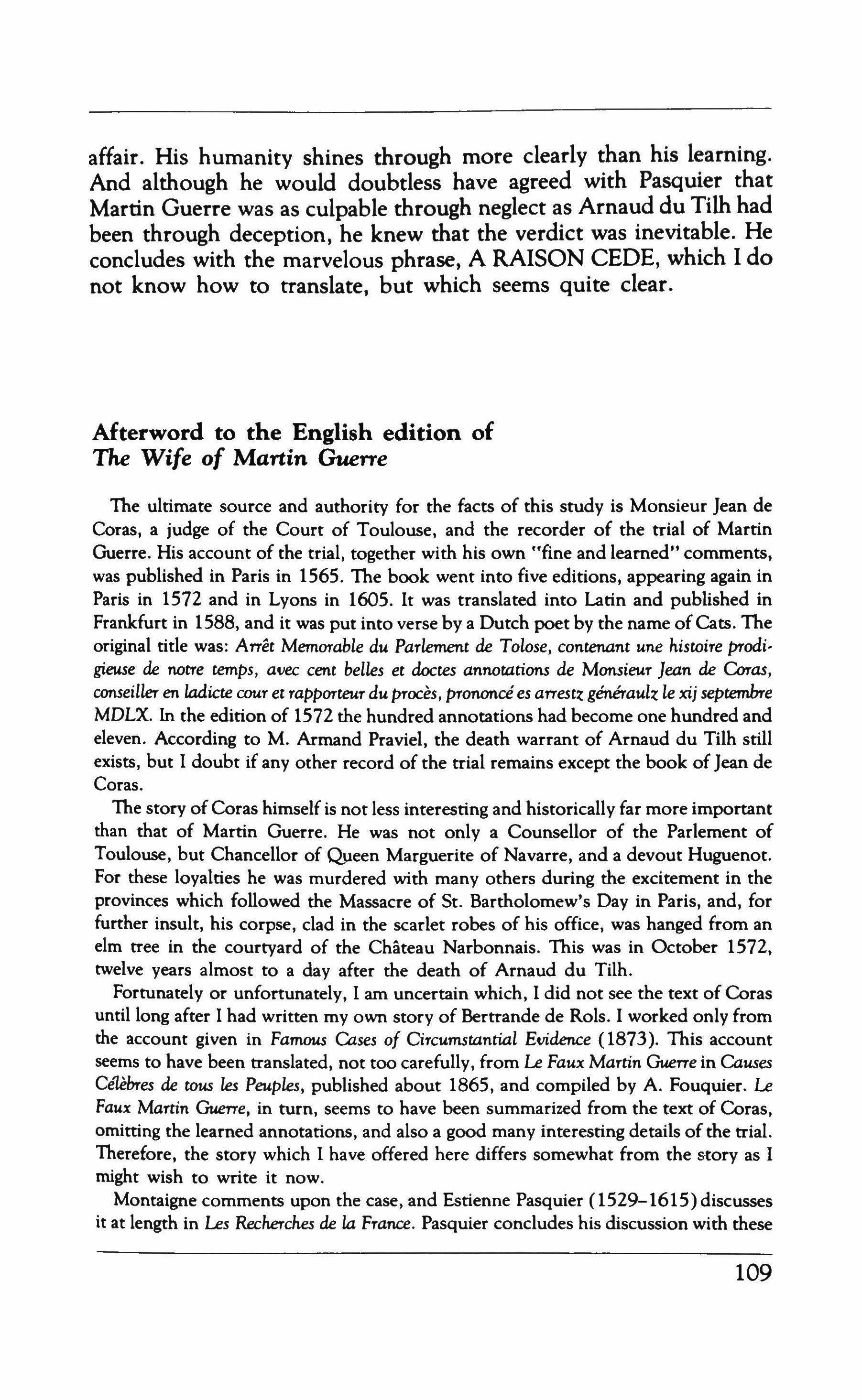
affair. His humanity shines through more clearly than his learning. And although he would doubtless have agreed with Pasquier that Martin Guerre was as culpable through neglect as Arnaud du Tilh had been through deception, he knew that the verdict was inevitable. He concludes with the marvelous phrase, A RAISON CEDE, which I do not know how to translate, but which seems quite clear.
Afterword to the English edition of The Wife of Martin Gaerre
The ultimate source and authority for the facts of this study is Monsieur Jean de Coras, a judge of the Court of Toulouse, and the recorder of the trial of Martin Guerre. His account of the trial, together with his own "fine and learned" comments, was published in Paris in 1565. The book went into five editions, appearing again in Paris in 1572 and in Lyons in 1605. It was translated into Latin and published in Frankfurt in 1588, and it was put into verse by a Dutch poet by the name of Cats. The original title was: Arret Memorable du Parlement de Tolose, contenant une histoire prodigieuse de notre temps, avec cent belles et doctes annotations de Monsieur Jean de Caras, conseiller en ladicte COUT et rapporteur du proces, prononci es arrestz generaulz le xij septembre MDLX. In the edition of 1572 the hundred annotations had become one hundred and eleven. According to M. Armand Praviel, the death warrant of Arnaud du Tilh still exists, but I doubt if any other record of the trial remains except the book of Jean de Coras.
The story of Coras himself is not less interesting and historically far more important than that of Martin Guerre. He was not only a Counsellor of the Parlement of Toulouse, but Chancellor of Queen Marguerite of Navarre, and a devout Huguenot. For these loyalties he was murdered with many others during the excitement in the provinces which followed the Massacre of St. Bartholomew's Day in Paris, and, for further insult, his corpse, clad in the scarlet robes of his office, was hanged from an elm tree in the courtyard of the Chateau Narbonnais. This was in October 1572, twelve years almost to a day after the death of Arnaud du Tilh.
Fortunately or unfortunately, I am uncertain which, I did not see the text of Coras until long after I had written my own story of Bertrande de Rols. I worked only from the account given in Famous Cases of Circumstantial Evidence (1873). This account seems to have been translated, not too carefully, from Le Faux Martin Guerre in Causes Ce1ebres de tous les Peuples, published about 1865, and compiled by A. Fouquier. Le Faux Martin Guerre, in tum, seems to have been summarized from the text of Coras, omitting the learned annotations, and also a good many interesting details of the trial. Therefore, the story which I have offered here differs somewhat from the story as I might wish to write it now.
Montaigne comments upon the case, and Estienne Pasquier (1529-1615) discusses it at length in Les Recherches de la France. Pasquier concludes his discussion with these
109
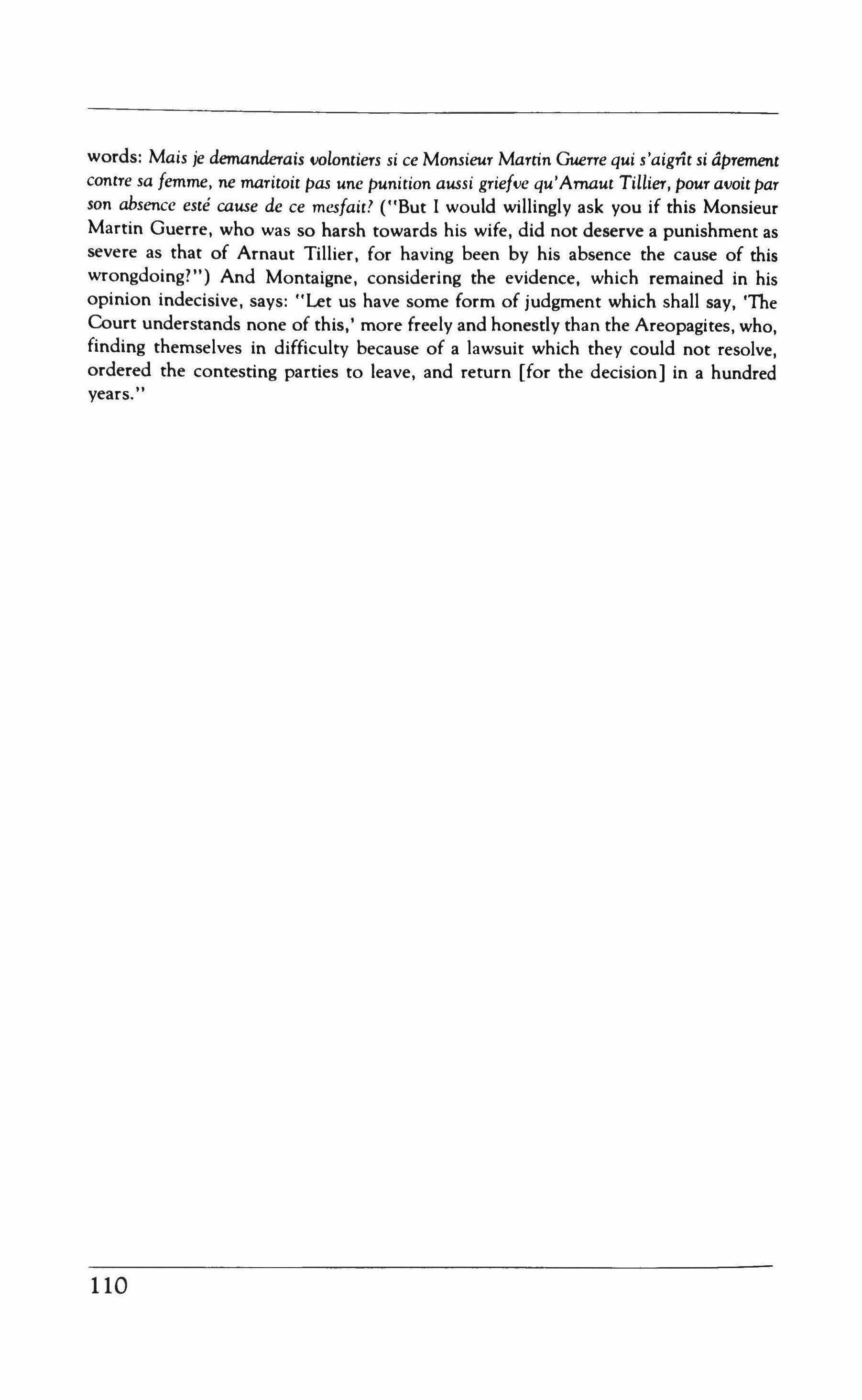
words: Mais je demanderais oolontiers si ce Monsieur Martin Guerre qui s'aigrit si dprement centre sa femme, ne maritoit pas une punition aussi griefIJc qu'Amaut Tillier, pour aIJoit par son absencc este cause de ce mcsfait! ("But I would willingly ask you if this Monsieur Martin Guerre, who was so harsh towards his wife, did not deserve a punishment as severe as that of Arnaut Tillier, for having been by his absence the cause of this wrongdoing?") And Montaigne, considering the evidence, which remained in his opinion indecisive, says: "Let us have some form of judgment which shall say, 'The Court understands none of this,' more freely and honestly than the Areopagites, who, finding themselves in difficulty because of a lawsuit which they could not resolve, ordered the contesting parties to leave, and return [for the decision] in a hundred years.
110
Biography as fiction
Phyllis Rose
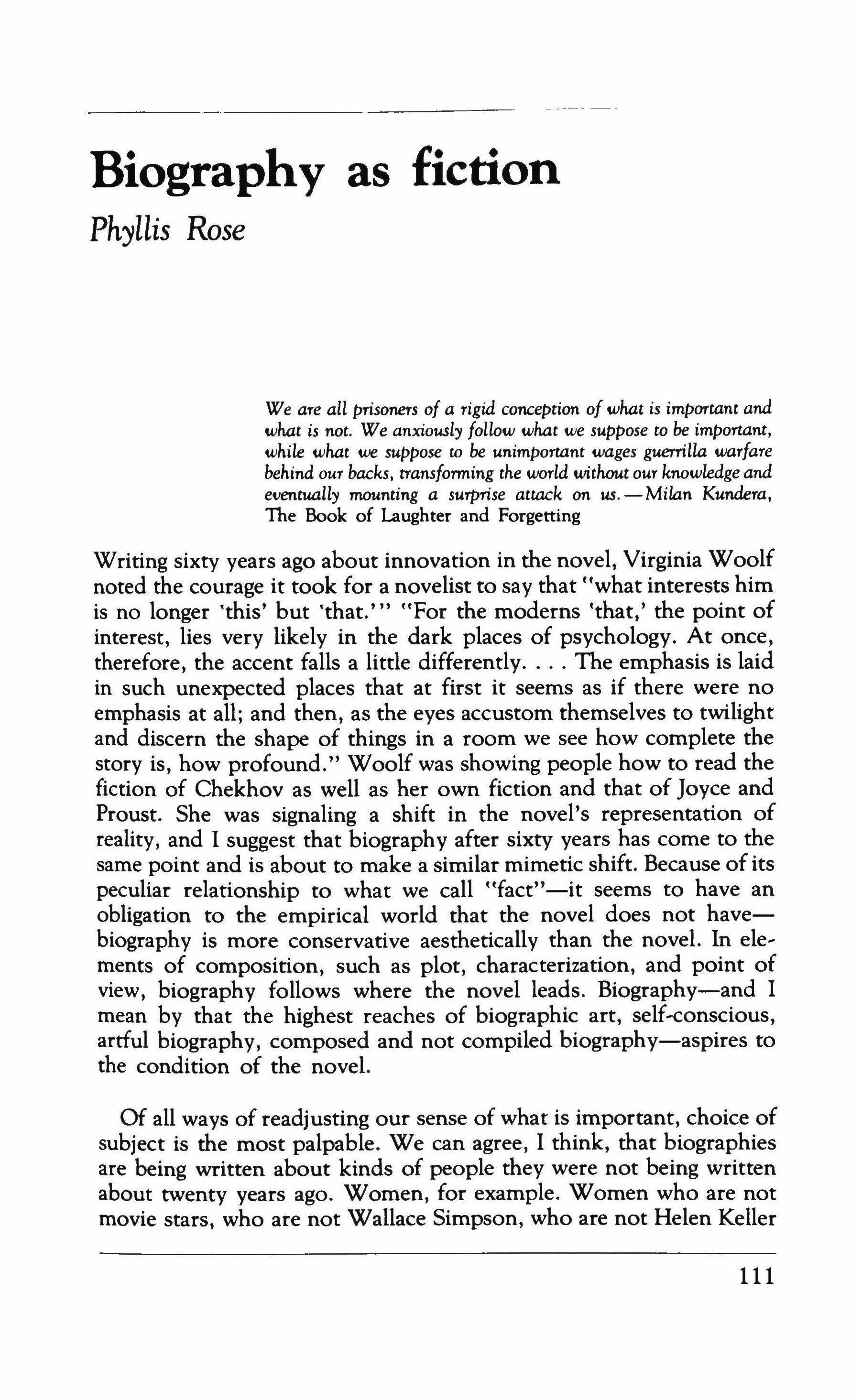
We are all prisoners of a rigid conception of what is important and what is not. We anxiously follow what we suppose to be important, while what we suppose to be unimportant wages guerrilla warfare behind our backs, transforming the world without our knowledge and eventually mounting a surprise attack on us. - Milan Kundera, The Book of Laughter and Forgetting
Writing sixty years ago about innovation in the novel, Virginia Woolf noted the courage it took for a novelist to say that "what interests him is no longer 'this' but 'that.'" "For the moderns 'that,' the point of interest, lies very likely in the dark places of psychology. At once, therefore, the accent falls a little differently The emphasis is laid in such unexpected places that at first it seems as if there were no emphasis at all; and then, as the eyes accustom themselves to twilight and discern the shape of things in a room we see how complete the story is, how profound." Woolf was showing people how to read the fiction of Chekhov as well as her own fiction and that of Joyce and Proust. She was signaling a shift in the novel's representation of reality, and I suggest that biography after sixty years has come to the same point and is about to make a similar mimetic shift. Because of its peculiar relationship to what we call "fact"-it seems to have an obligation to the empirical world that the novel does not havebiography is more conservative aesthetically than the novel. In elements of composition, such as plot, characterization, and point of view, biography follows where the novel leads. Biography-and I mean by that the highest reaches of biographic art, self-conscious, artful biography, composed and not compiled biography-aspires to the condition of the novel.
Of all ways of readjusting our sense of what is important, choice of subject is the most palpable. We can agree, I think, that biographies are being written about kinds of people they were not being written about twenty years ago. Women, for example. Women who are not movie stars, who are not Wallace Simpson, who are not Helen Keller
111

or Eleanor Roosevelt. In the past fifteen years we have had biographies of Edith Wharton, George Eliot, and Virginia Woolf. We have had both "standard biographies" and interpretive biographies. Even though these women writers had to wait so much longer than their male contemporaries for biographical attention, there seems now to be a great deal to say about them. In the next ten years Willa Cather will surely get the attention she deserves, and Winifred Gerin's life of Anne Thackeray Ritchie, the novelist's daughter, a novelist herself, is a pleasure and an inspiration. Why has it taken so long for these women to be the subjects of biographies? Obviously, because they were not important. As Henry James put it in the preface to The Portrait of a Lady, tI Millions of presumptuous girls, intelligent or not, daily affront their destiny, and what is it open to their destiny to be, at the most, that we should make an ado about it? The novel is of its very nature an ado." A biography is as much or more of an ado. And what does a person have to do or be to merit one?
Until very recently, one thing you had to be-whatever your calling-was successful. You had to be the Great Writer or the Famous Person. Diane Johnson, in the preface to her inventive biography of Mary Ellen Peacock Meredith, wrote a kind of manifesto in favor of what she calls, in the title of the book, Lesser Lives:
Many people have described the Famous Writer presiding at his dinner table, in a clean neckcloth. He is famous; everybody remembers his remarks. He remembers his own remarks, being a writer, and notes them in his diary. We forget now that there were other people at the table-a quiet person, now muffled by time, shadowy, whose heart pounded with love, perhaps, or rage, or fear when the writer shuffled in from his study A lesser life does not seem lesser to the person who leads one. His life is very real to him; he is not a minor figure in it. He looks out of his eyes at our poet, our chronicled statesman And he is our real brother.
Now Mary Ellen Peacock Meredith was a bad girl. She did not love her husband, the Famous Writer George Meredith, and she cornmitted adultery with a painter named Henry Wallis, not nearly so famous. Meredith, unable to comprehend this offense, concluded she was mad, and it was with a reputation for insanity that Mary Ellen made her tangential way into posterity. Diane johnson's revisionist book shows why Mary Ellen might have wanted to make love with a man who was not her husband and have believed herself justified in doing so; it does not require us to believe she was insane. Telling the story from her point of view inevitably changes the story told. In fact, I would argue that telling her story at all changes the story told. It is customary, says Johnson, to treat Mary Ellen in a paragraph or a page as an episode in the life of her husband or her father. Her life can, of
112
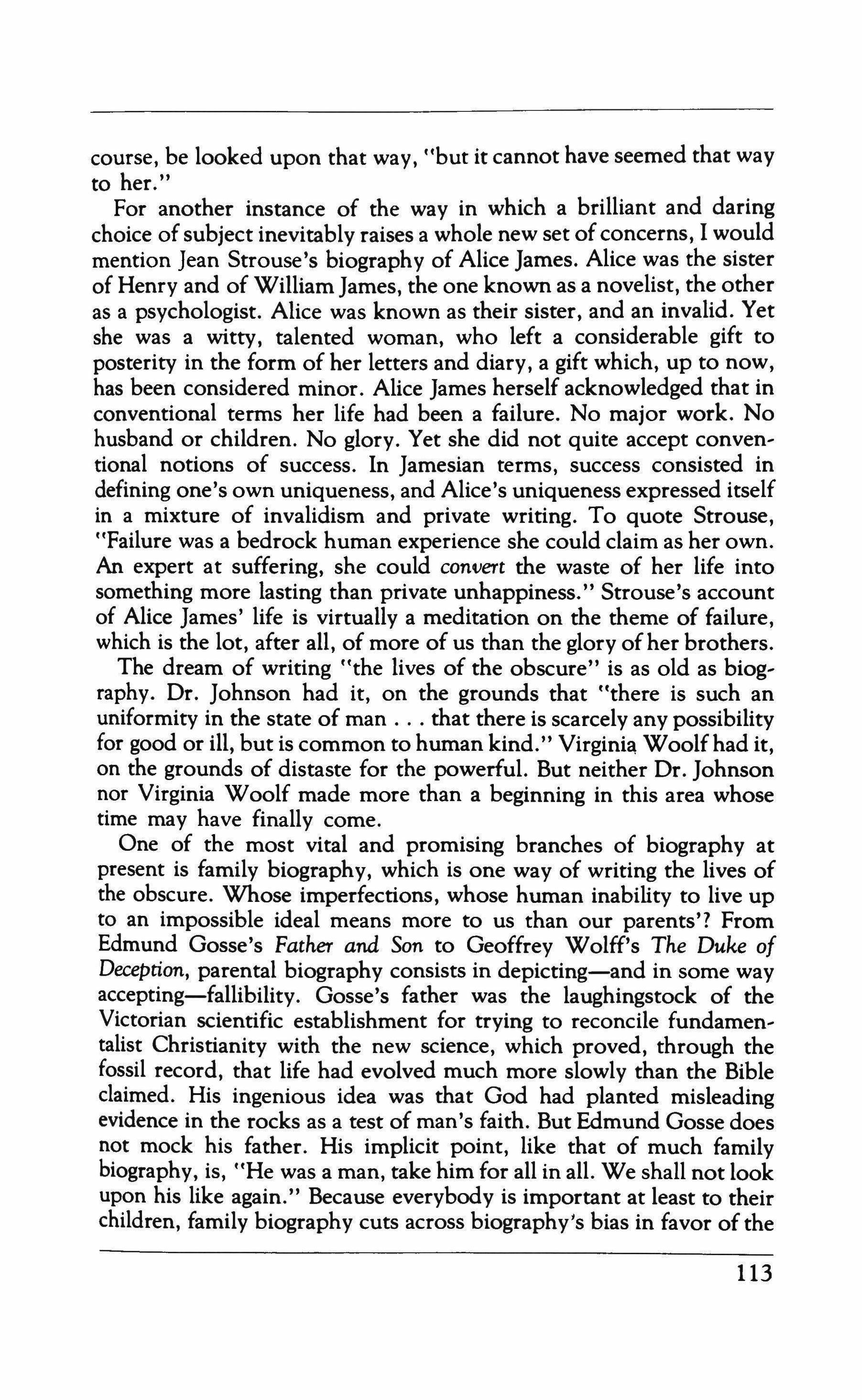
course, be looked upon that way, "but it cannot have seemed that way to her."
For another instance of the way in which a brilliant and daring choice of subject inevitably raises a whole new set of concerns, I would mention Jean Strouse's biography of Alice James. Alice was the sister of Henry and of William James, the one known as a novelist, the other as a psychologist. Alice was known as their sister, and an invalid. Yet she was a witty, talented woman, who left a considerable gift to posterity in the form of her letters and diary, a gift which, up to now, has been considered minor. Alice James herself acknowledged that in conventional terms her life had been a failure. No major work. No husband or children. No glory. Yet she did not quite accept conventional notions of success. In Jamesian terms, success consisted in defining one's own uniqueness, and Alice's uniqueness expressed itself in a mixture of invalidism and private writing. To quote Strouse, "Failure was a bedrock human experience she could claim as her own. An expert at suffering, she could convert the waste of her life into something more lasting than private unhappiness." Strouse's account of Alice James' life is virtually a meditation on the theme of failure, which is the lot, after all, of more of us than the glory ofher brothers.
The dream of writing "the lives of the obscure" is as old as biography. Dr. Johnson had it, on the grounds that "there is such an uniformity in the state of man that there is scarcely any possibility for good or ill, but is common to human kind." Virginia. Woolfhad it, on the grounds of distaste for the powerful. But neither Dr. Johnson nor Virginia Woolf made more than a beginning in this area whose time may have finally come.
One of the most vital and promising branches of biography at present is family biography, which is one way of writing the lives of the obscure. Whose imperfections, whose human inability to live up to an impossible ideal means more to us than our parents'? From Edmund Gosse's Father and Son to Geoffrey Wolff's The Duke of Deception, parental biography consists in depicting-and in some way accepting-fallibility. Gosse's father was the laughingstock of the Victorian scientific establishment for trying to reconcile fundamentalist Christianity with the new science, which proved, through the fossil record, that life had evolved much more slowly than the Bible claimed. His ingenious idea was that God had planted misleading evidence in the rocks as a test of man's faith. But Edmund Gosse does not mock his father. His implicit point, like that of much family biography, is, "He was a man, take him for all in all. We shall not look upon his like again." Because everybody is important at least to their children, family biography cuts across biography's bias in favor of the
113
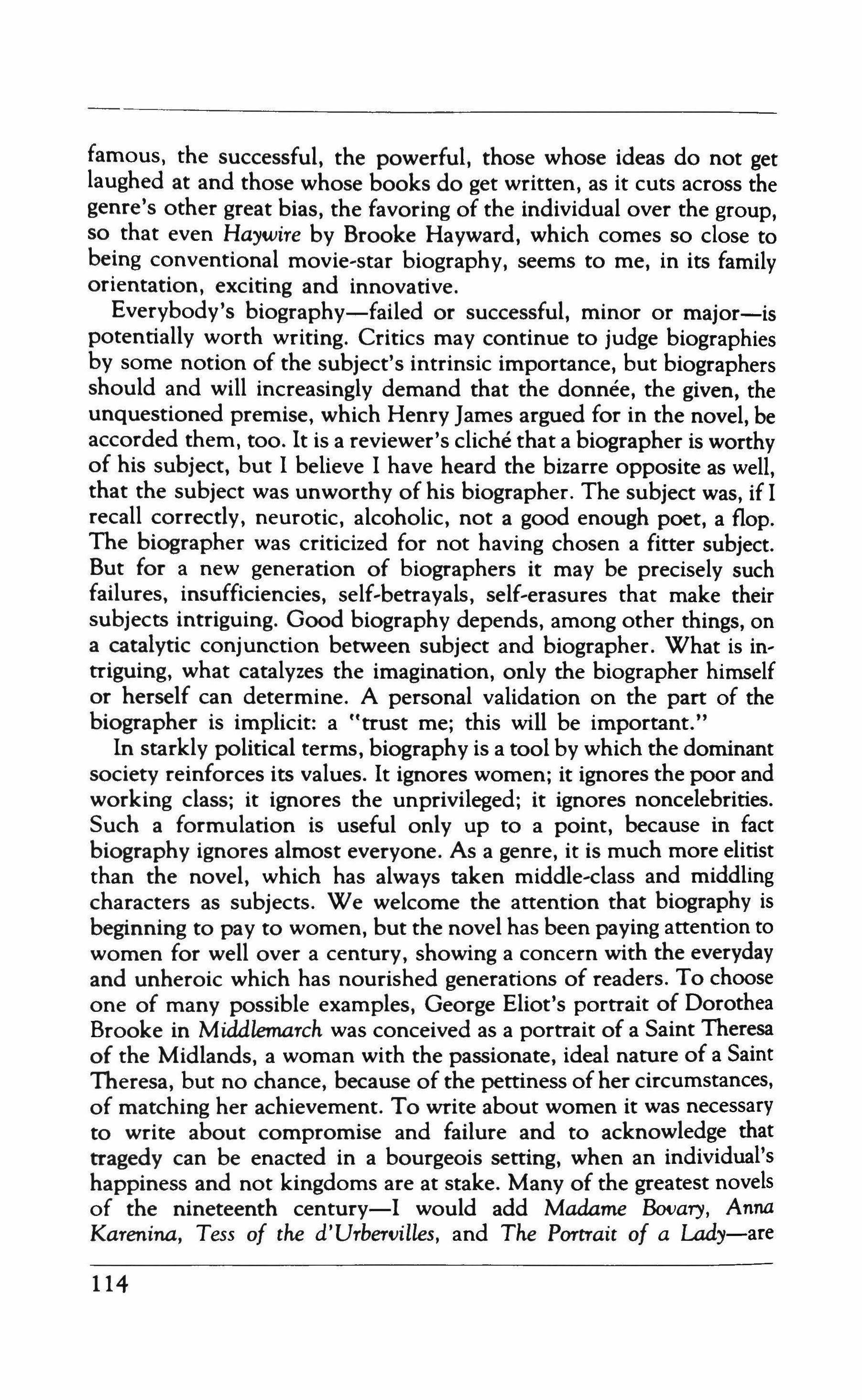
famous, the successful, the powerful, those whose ideas do not get laughed at and those whose books do get written, as it cuts across the genre's other great bias, the favoring of the individual over the group, so that even Haywire by Brooke Hayward, which comes so close to being conventional movie-star biography, seems to me, in its family orientation, exciting and innovative.
Everybody's biography-failed or successful, minor or major-is potentially worth writing. Critics may continue to judge biographies by some notion of the subject's intrinsic importance, but biographers should and will increasingly demand that the donnee, the given, the unquestioned premise, which Henry James argued for in the novel, be accorded them, too. It is a reviewer's cliche that a biographer is worthy of his subject, but I believe I have heard the bizarre opposite as well, that the subject was unworthy of his biographer. The subject was, if! recall correctly, neurotic, alcoholic, not a good enough poet, a flop. The biographer was criticized for not having chosen a fitter subject. But for a new generation of biographers it may be precisely such failures, insufficiencies, self-betrayals, self-erasures that make their subjects intriguing. Good biography depends, among other things, on a catalytic conjunction between subject and biographer. What is in� triguing, what catalyzes the imagination, only the biographer himself or herself can determine. A personal validation on the part of the biographer is implicit: a "trust me; this will be important."
In starkly political terms, biography is a tool by which the dominant society reinforces its values. It ignores women; it ignores the poor and working class; it ignores the unprivileged; it ignores noncelebrities. Such a formulation is useful only up to a point, because in fact biography ignores almost everyone. As a genre, it is much more elitist than the novel, which has always taken middle-class and middling characters as subjects. We welcome the attention that biography is beginning to pay to women, but the novel has been paying attention to women for well over a century, showing a concern with the everyday and unheroic which has nourished generations of readers. To choose one of many possible examples, George Eliot's portrait of Dorothea Brooke in Middlemarch was conceived as a portrait of a Saint Theresa of the Midlands, a woman with the passionate, ideal nature of a Saint Theresa, but no chance, because of the pettiness of her circumstances, of matching her achievement. To write about women it was necessary to write about compromise and failure and to acknowledge that tragedy can be enacted in a bourgeois setting, when an individual's happiness and not kingdoms are at stake. Many of the greatest novels of the nineteenth century-I would add Madame &Vary, Anna Karenina, Tess of the d'Urbert'illes, and The Portrait of a Lady-are
114

based on that democratic assumption, and even as the novel moves into the modernist period, with Ulysses and Mrs. Dalloway, it is still in pursuit of that elusive figure of Everyman or Everywoman. But biography is still shaking off assumptions about fit subjects closer to those of classical tragedy, which dealt only with royalty and heroes, although, to satisfy our secular sense of the sacred, it has traditionally added artists and writers. In biography, the bourgeois-democratic revolution is just beginning to take place.
For, of course, what happens when you start writing biographies about the minor and failed is that they don't seem so failed or minor anymore. When you write about the unfamous, they become famous. In 1972, for example, Virginia Woolf was considered by the academic establishment a quirky, secondary author. That she is now major has to do not with any change in her intrinsic worth but with the spate of publications, many inspired by the women's movement, which has been devoted to her in the past ten years. And now that Woolf is major, she is no longer, alas, minor. As a subject, she has lost her subversive potential. We have gained a major writer but lost a semiobscure life, which is as it should be. "Tomorrow to fresh woods and pastures new." Biography will find new candidates for obscurity and dominance.
I would like to turn now to another kind of innovation in biography, subtler than innovation in subject matter but equally important-formal innovation, new ways of handling chronology, characterization, perspective. Every choice of form makes a statement about the way life is, changes the illusion of reality conveyed by a piece of writing. As much as his or her subject and theme, the ostensible content, an author's handling of formal variables affects what a biography says. It is because of formal innovation that contemporary biography gives the illusion of dealing more successfully and fully with the inner life than biography of the past.
Much more than the novel, which from its beginnings, in Tristram Shandy, has rebelled against chronology, biography has tended to begin placidly and obediently at the start of the subject's life, to proceed in an orderly and annual fashion, and to conclude with his death. If one volume concerns The Middle Years, you can be sure there will be others about The Early Years and The Later. In the great age of modernism, novelists like Joyce, Woolf, and Faulkner were fascinated by the distinction between external and internal time, between time measured by clocks and time as perceived by an individual, speeding up or slowing down in response to emotions, looping through past to future as memory and anticipation, those
115

radical processes of the brain, destroyed the present and with it conventional chronology. A novel would seem wittily archaic if it began with its protagonist's birth and pretended to cover the activities of his or her life on an annual basis. But this is what biography generally does. Where novels routinely concentrate on the events of a brief period of time and get access to the past through memory, biography has largely denied itself this flexibility.
Along with conventional chronology goes an archetypal biographical plot: the subject is born, has a childhood full of latent talent; in early adulthood, the subject has troubles, but they are overcome; his talent, like a bulb pushing its stalk up through the ground, inevitably expresses itself. And, like a flower, his talent after awhile withers, and the writer dies. Too many literary biographies still have as their guiding metaphor the organic image of the writer as a kind of plant, whose genius has a seed-time, an inevitable flowering, and a blowzy stage of decay. This image, and its correlative assumption that the child is the father of the man, dates back at least as far as Wordsworth. And it has been reinforced by Freudian psychology, which we must also hold responsible for the tedious way that most biographies begin with the least interesting part of a writer's life and seem, in some crucial ways, never to move beyond it.
It is possible to handle things differently. Justin Kaplan's biography of Walt Whitman begins at the end of Whitman's life and eases artfully into a treatment of the years preceding Leaves ofGrass, where a more conventional biography might have begun. Not only is this disruption of the usual pattern ofbiography refreshing aesthetically, it also seems to produce other formal changes with an impact on the biography's content. Instead of continuity of character, Kaplan emphasizes discontinuity. Whereas most biographies assume constant development and present later work as emerging from earlier, Kaplan insists there is no necessary connection between Walter Whitman, schoolteacher, printer, newspaper editor, idler about town, and hack writer of the 1840s and Walt Whitman, the author of Leaves of Grass and self-proclaimed "kosrnos" of 1855. In Kaplan's handling of this life, there is nothing inevitable about the flowering of Whitman's genius. Instead there is a dialectic between the mundane and the miraculous-between lazy aimless hours spent riding the ferry between Brooklyn and Manhattan and the writing of the great poem, "Crossing Brooklyn Ferry." For the Freudian narrative, Kaplan substitutes the more dynamic Eriksonian paradigm of development, which presents adult life as a series of crucial adjustments and selfdefinitions. This Walt Whitman makes himself, unmakes himself, and remakes himself in the course of the years. "In what may have been his
116
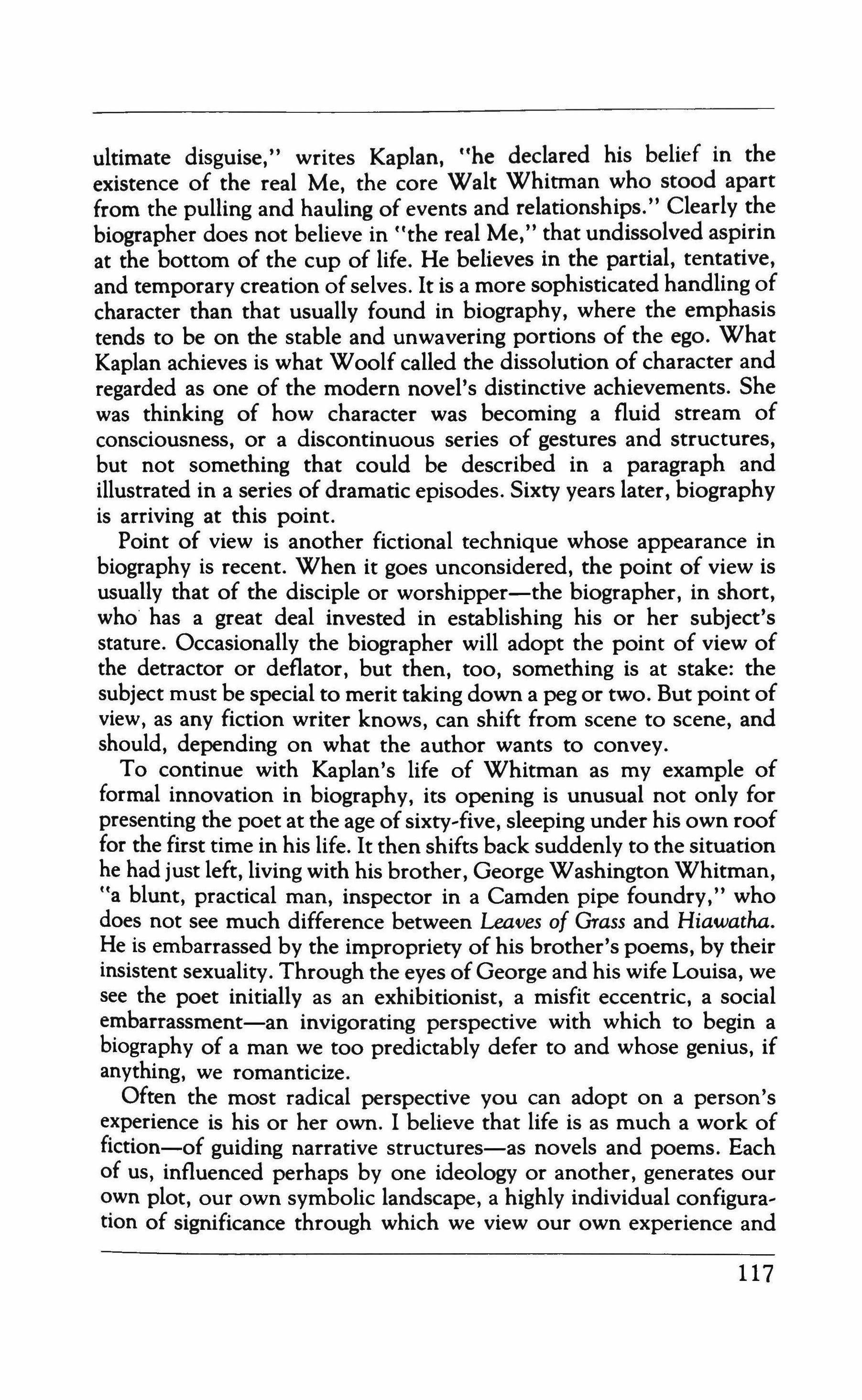
ultimate disguise," writes Kaplan, "he declared his belief in the existence of the real Me, the core Walt Whitman who stood apart from the pulling and hauling of events and relationships." Clearly the biographer does not believe in "the real Me," that undissolved aspirin at the bottom of the cup of life. He believes in the partial, tentative, and temporary creation ofselves. It is a more sophisticated handling of character than that usually found in biography, where the emphasis tends to be on the stable and unwavering portions of the ego. What Kaplan achieves is what Woolf called the dissolution of character and regarded as one of the modern novel's distinctive achievements. She was thinking of how character was becoming a fluid stream of consciousness, or a discontinuous series of gestures and structures, but not something that could be described in a paragraph and illustrated in a series of dramatic episodes. Sixty years later, biography is arriving at this point.
Point of view is another fictional technique whose appearance in biography is recent. When it goes unconsidered, the point of view is usually that of the disciple or worshipper-the biographer, in short, who has a great deal invested in establishing his or her subject's stature. Occasionally the biographer will adopt the point of view of the detractor or deflator, but then, too, something is at stake: the subject must be special to merit taking down a peg or two. But point of view, as any fiction writer knows, can shift from scene to scene, and should, depending on what the author wants to convey.
To continue with Kaplan's life of Whitman as my example of formal innovation in biography, its opening is unusual not only for presenting the poet at the age of sixty-five, sleeping under his own roof for the first time in his life. It then shifts back suddenly to the situation he had just left, living with his brother, George Washington Whitman, Ita blunt, practical man, inspector in a Camden pipe foundry," who does not see much difference between Leaves of Grass and Hiawatha. He is embarrassed by the impropriety of his brother's poems, by their insistent sexuality. Through the eyes of George and his wife Louisa, we see the poet initially as an exhibitionist, a misfit eccentric, a social embarrassment-an invigorating perspective with which to begin a biography of a man we too predictably defer to and whose genius, if anything, we romanticize.
Often the most radical perspective you can adopt on a person's experience is his or her own. I believe that life is as much a work of fiction-of guiding narrative structures-as novels and poems. Each of us, influenced perhaps by one ideology or another, generates our own plot, our own symbolic landscape, a highly individual configura, tion of significance through which we view our own experience and
117
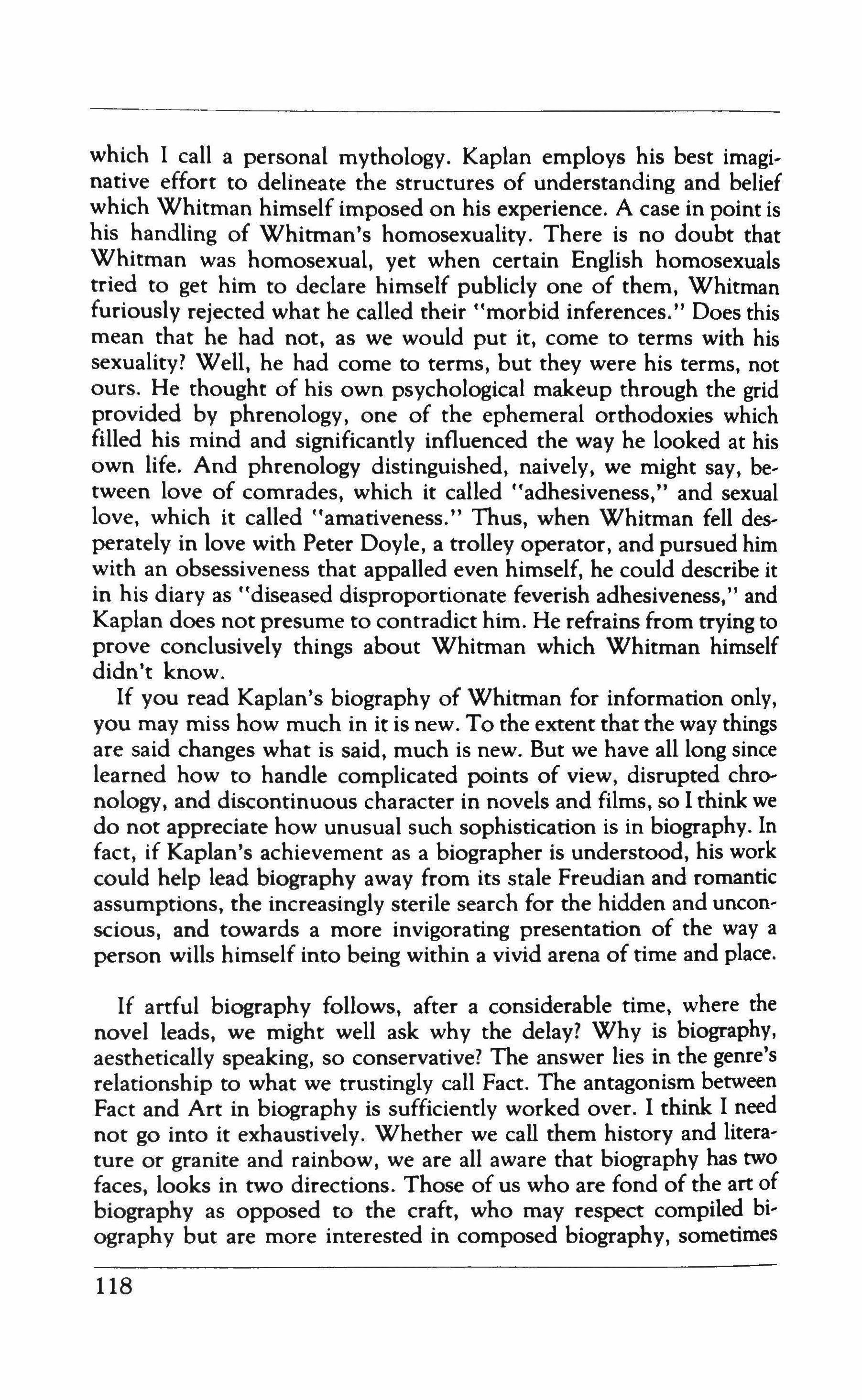
which I call a personal mythology. Kaplan employs his best irnagtnative effort to delineate the structures of understanding and belief which Whitman himself imposed on his experience. A case in point is his handling of Whitman's homosexuality. There is no doubt that Whitman was homosexual, yet when certain English homosexuals tried to get him to declare himself publicly one of them, Whitman furiously rejected what he called their "morbid inferences." Does this mean that he had not, as we would put it, come to terms with his sexuality? Well, he had come to terms, but they were his terms, not ours. He thought of his own psychological makeup through the grid provided by phrenology, one of the ephemeral orthodoxies which filled his mind and significantly influenced the way he looked at his own life. And phrenology distinguished, naively, we might say, between love of comrades, which it called "adhesiveness," and sexual love, which it called "amativeness." Thus, when Whitman fell desperately in love with Peter Doyle, a trolley operator, and pursued him with an obsessiveness that appalled even himself, he could describe it in his diary as "diseased disproportionate feverish adhesiveness," and Kaplan does not presume to contradict him. He refrains from trying to prove conclusively things about Whitman which Whitman himself didn't know.
If you read Kaplan's biography of Whitman for information only, you may miss how much in it is new To the extent that the way things are said changes what is said, much is new. But we have all long since learned how to handle complicated points of view, disrupted chronology, and discontinuous character in novels and films, so I think we do not appreciate how unusual such sophistication is in biography. In fact, if Kaplan's achievement as a biographer is understood, his work could help lead biography away from its stale Freudian and romantic assumptions, the increasingly sterile search for the hidden and unconscious, and towards a more invigorating presentation of the way a person wills himself into being within a vivid arena of time and place.
If artful biography follows, after a considerable time, where the novel leads, we might well ask why the delay? Why is biography, aesthetically speaking, so conservative? The answer lies in the genre's relationship to what we trustingly call Fact. The antagonism between Fact and Art in biography is sufficiently worked over. I think I need not go into it exhaustively. Whether we call them history and literature or granite and rainbow, we are all aware that biography has two faces, looks in two directions. Those of us who are fond of the art of biography as opposed to the craft, who may respect compiled biography but are more interested in composed biography, sometimes
118
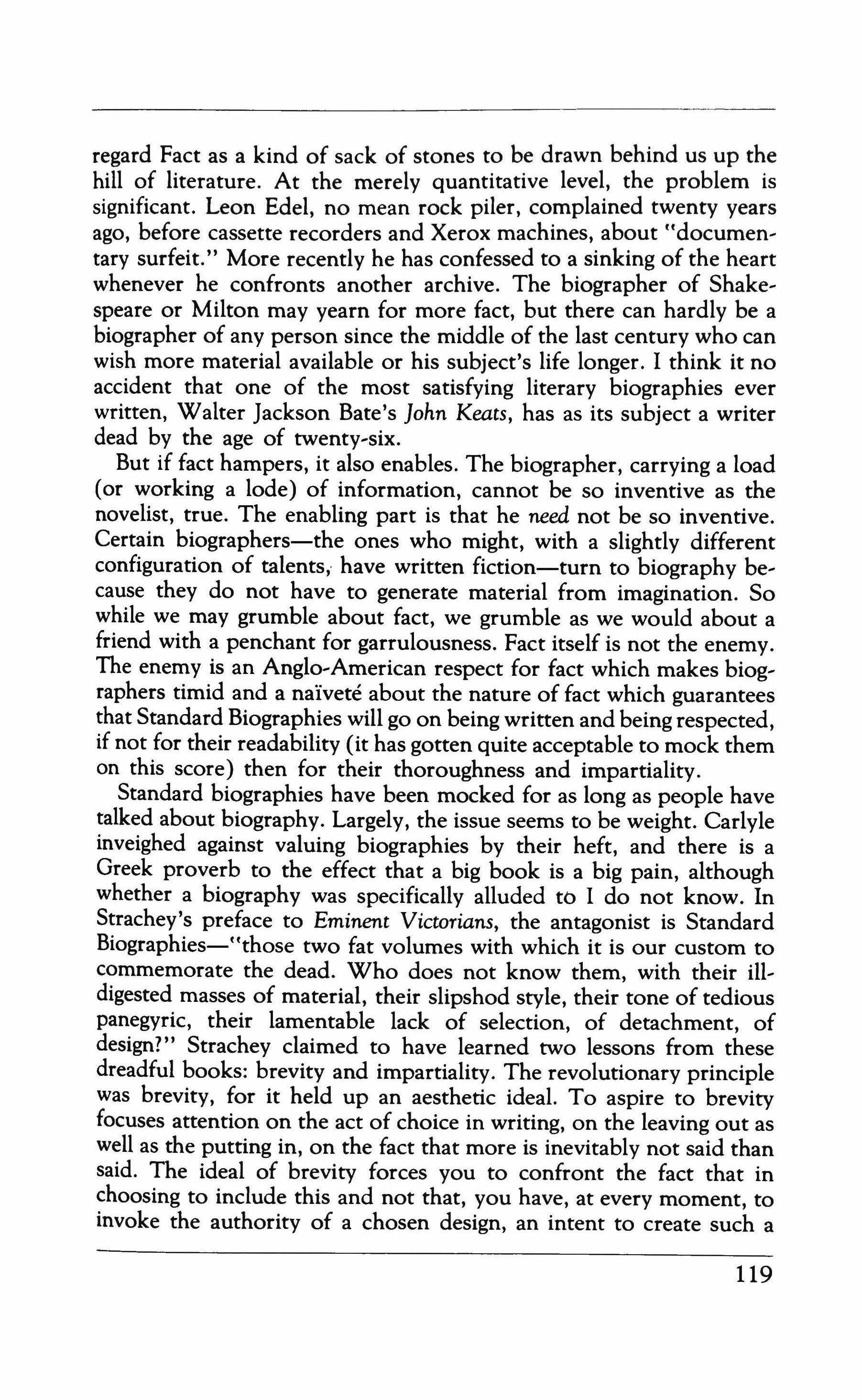
regard Fact as a kind of sack of stones to be drawn behind us up the hill of literature. At the merely quantitative level, the problem is significant. Leon Edel, no mean rock piler, complained twenty years ago, before cassette recorders and Xerox machines, about "docurnentary surfeit." More recently he has confessed to a sinking of the heart whenever he confronts another archive. The biographer of Shake, speare or Milton may yearn for more fact, but there can hardly be a biographer of any person since the middle of the last century who can wish more material available or his subject's life longer. I think it no accident that one of the most satisfying literary biographies ever written, Walter Jackson Bate's John Keats, has as its subject a writer dead by the age of twenty-six.
But if fact hampers, it also enables. The biographer, carrying a load (or working a lode) of information, cannot be so inventive as the novelist, true. The enabling part is that he need not be so inventive. Certain biographers-the ones who might, with a slightly different configuration of talents, have written fiction-turn to biography be' cause they do not have to generate material from imagination. So while we may grumble about fact, we grumble as we would about a friend with a penchant for garrulousness. Fact itself is not the enemy. The enemy is an Anglo-American respect for fact which makes biographers timid and a naivete about the nature of fact which guarantees that Standard Biographies will go on being written and beingrespected, if not for their readability (it has gotten quite acceptable to mock them on this score) then for their thoroughness and impartiality. Standard biographies have been mocked for as long as people have talked about biography. Largely, the issue seems to be weight. Carlyle inveighed against valuing biographies by their heft, and there is a Greek proverb to the effect that a big book is a big pain, although whether a biography was specifically alluded to I do not know. In Strachey's preface to Eminent Victorians, the antagonist is Standard Biographies-Ifthose two fat volumes with which it is our custom to commemorate the dead. Who does not know them, with their ill, digested masses of material, their slipshod style, their tone of tedious panegyric, their lamentable lack of selection, of detachment, of design?" Strachey claimed to have learned two lessons from these dreadful books: brevity and impartiality. The revolutionary principle was brevity, for it held up an aesthetic ideal. To aspire to brevity focuses attention on the act of choice in writing, on the leaving out as well as the putting in, on the fact that more is inevitably not said than said. The ideal of brevity forces you to confront the fact that in choosing to include this and not that, you have, at every moment, to invoke the authority of a chosen design, an intent to create such a
119
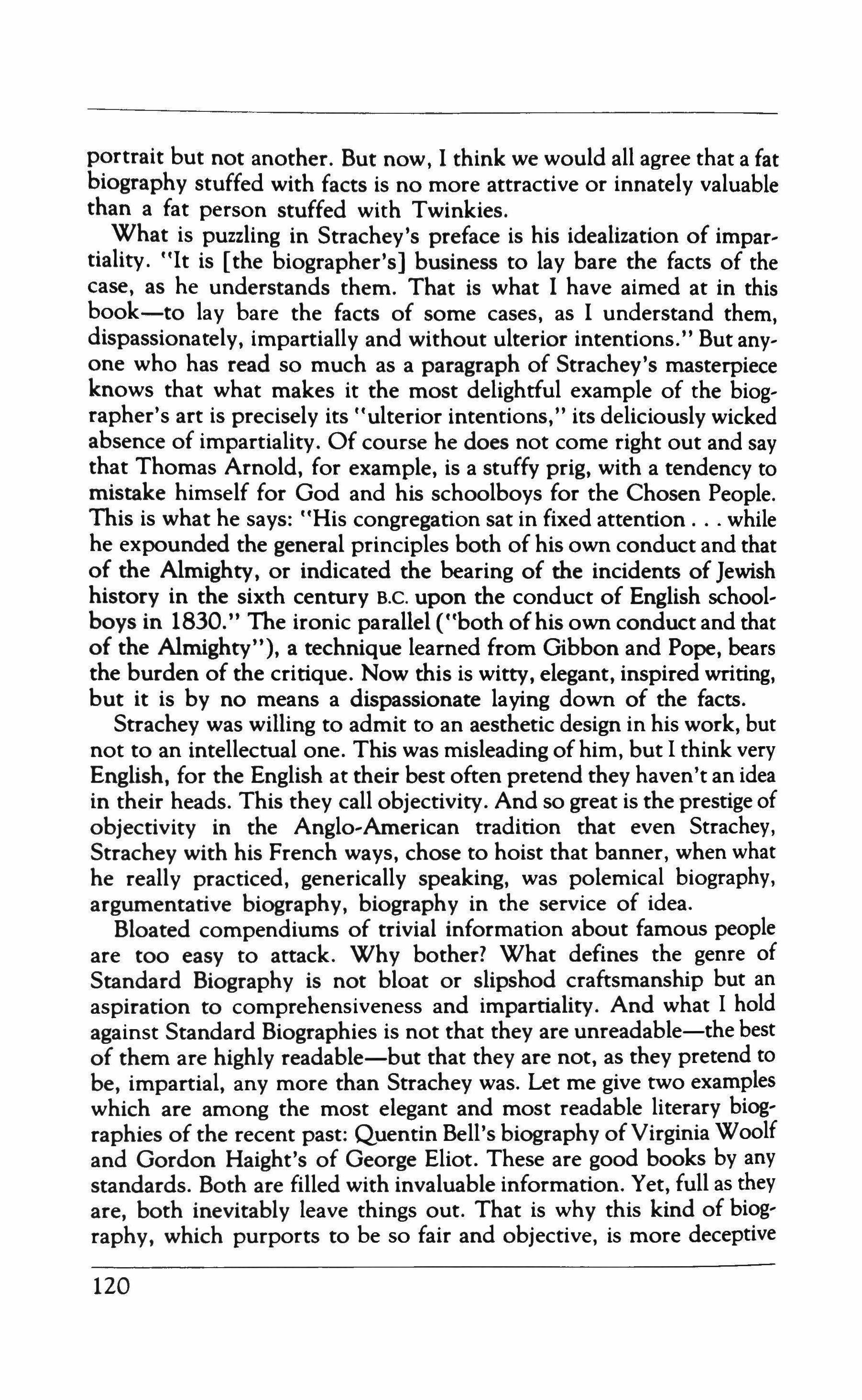
portrait but not another. But now, I think we would all agree that a fat biography stuffed with facts is no more attractive or innately valuable than a fat person stuffed with Twinkies.
What is puzzling in Strachey's preface is his idealization of impartiality. "It is [the biographer's] business to lay bare the facts of the case, as he understands them. That is what I have aimed at in this book-to lay bare the facts of some cases, as I understand them, dispassionately, impartially and without ulterior intentions." But any, one who has read so much as a paragraph of Strachey's masterpiece knows that what makes it the most delightful example of the biographer's art is precisely its "ulterior intentions," its deliciously wicked absence of impartiality. Of course he does not come right out and say that Thomas Arnold, for example, is a stuffy prig, with a tendency to mistake himself for God and his schoolboys for the Chosen People. This is what he says: "His congregation sat in fixed attention while he expounded the general principles both of his own conduct and that of the Almighty, or indicated the bearing of the incidents of Jewish history in the sixth century B.C. upon the conduct of English school, boys in 1830." The ironic parallel ("both ofhis own conduct and that of the Almighty"), a technique learned from Gibbon and Pope, bears the burden of the critique. Now this is witty, elegant, inspired writing, but it is by no means a dispassionate laying down of the facts.
Strachey was willing to admit to an aesthetic design in his work, but not to an intellectual one. This was misleading of him, but I think very English, for the English at their best often pretend they haven't an idea in their heads. This they call objectivity. And so great is the prestige of objectivity in the Anglo-American tradition that even Strachey, Strachey with his French ways, chose to hoist that banner, when what he really practiced, generically speaking, was polemical biography, argumentative biography, biography in the service of idea.
Bloated compendiums of trivial information about famous people are too easy to attack. Why bother? What defines the genre of Standard Biography is not bloat or slipshod craftsmanship but an aspiration to comprehensiveness and impartiality. And what I hold against Standard Biographies is not that they are unreadable-the best of them are highly readable-but that they are not, as they pretend to be, impartial, any more than Strachey was. Let me give two examples which are among the most elegant and most readable literary biographies of the recent past: Quentin Bell's biography ofVirginia Woolf and Gordon Haight'S of George Eliot. These are good books by any standards. Both are filled with invaluable information. Yet, full as they are, both inevitably leave things out. That is why this kind of biography, which purports to be so fair and objective, is more deceptive
120
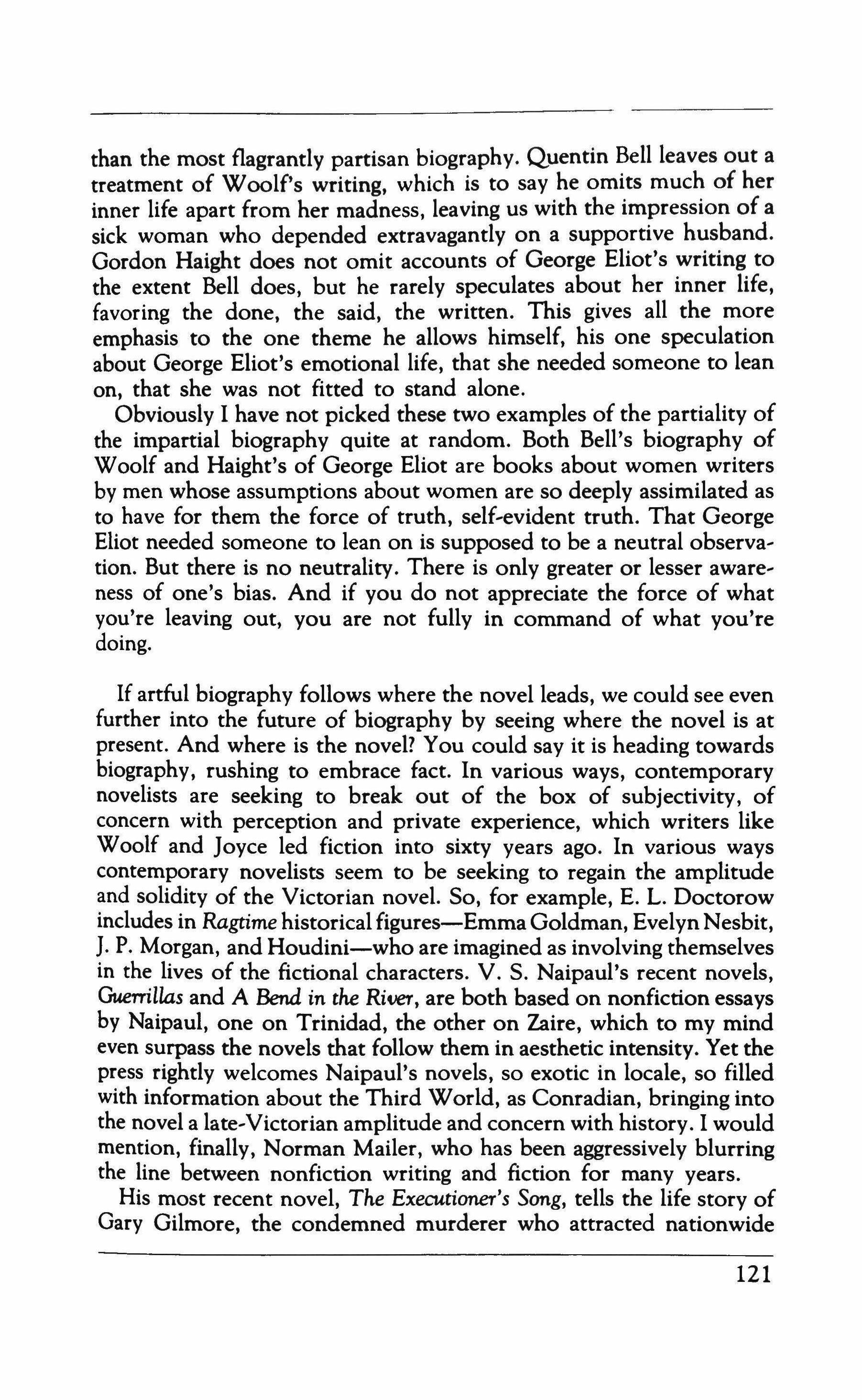
than the most flagrantly partisan biography. Quentin Bell leaves out a treatment of Woolf's writing, which is to say he omits much of her inner life apart from her madness, leaving us with the impression of a sick woman who depended extravagantly on a supportive husband. Gordon Haight does not omit accounts of George Eliot's writing to the extent Bell does, but he rarely speculates about her inner life, favoring the done, the said, the written. This gives all the more emphasis to the one theme he allows himself, his one speculation about George Eliot's emotional life, that she needed someone to lean on, that she was not fitted to stand alone.
Obviously I have not picked these two examples of the partiality of the impartial biography quite at random. Both Bell's biography of Woolf and Haight'S of George Eliot are books about women writers by men whose assumptions about women are so deeply assimilated as to have for them the force of truth, self-evident truth. That George Eliot needed someone to lean on is supposed to be a neutral observation. But there is no neutrality. There is only greater or lesser aware, ness of one's bias. And if you do not appreciate the force of what you're leaving out, you are not fully in command of what you're doing.
If artful biography follows where the novel leads, we could see even further into the future of biography by seeing where the novel is at present. And where is the novel? You could say it is heading towards biography, rushing to embrace fact. In various ways, contemporary novelists are seeking to break out of the box of subjectivity, of concern with perception and private experience, which writers like Woolf and Joyce led fiction into sixty years ago. In various ways contemporary novelists seem to be seeking to regain the amplitude and solidity of the Victorian novel. So, for example, E. L. Doctorow includes in Ragtime historicalfigures-Emma Goldman, EvelynNesbit, J. P. Morgan, and Houdini-who are imagined as involving themselves in the lives of the fictional characters. V. S. Naipaul's recent novels, Guerrillas and A Bend in the RitJeT, are both based on nonfiction essays by Naipaul, one on Trinidad, the other on Zaire, which to my mind even surpass the novels that follow them in aesthetic intensity. Yet the press rightly welcomes Naipaul's novels, so exotic in locale, so filled with information about the Third World, as Conradian, bringing into the novel a late,Victorian amplitude and concern with history. I would mention, finally, Norman Mailer, who has been aggressively blurring the line between nonfiction writing and fiction for many years. His most recent novel, The Executioner's Song, tells the life story of Gary Gilmore, the condemned murderer who attracted nationwide
121
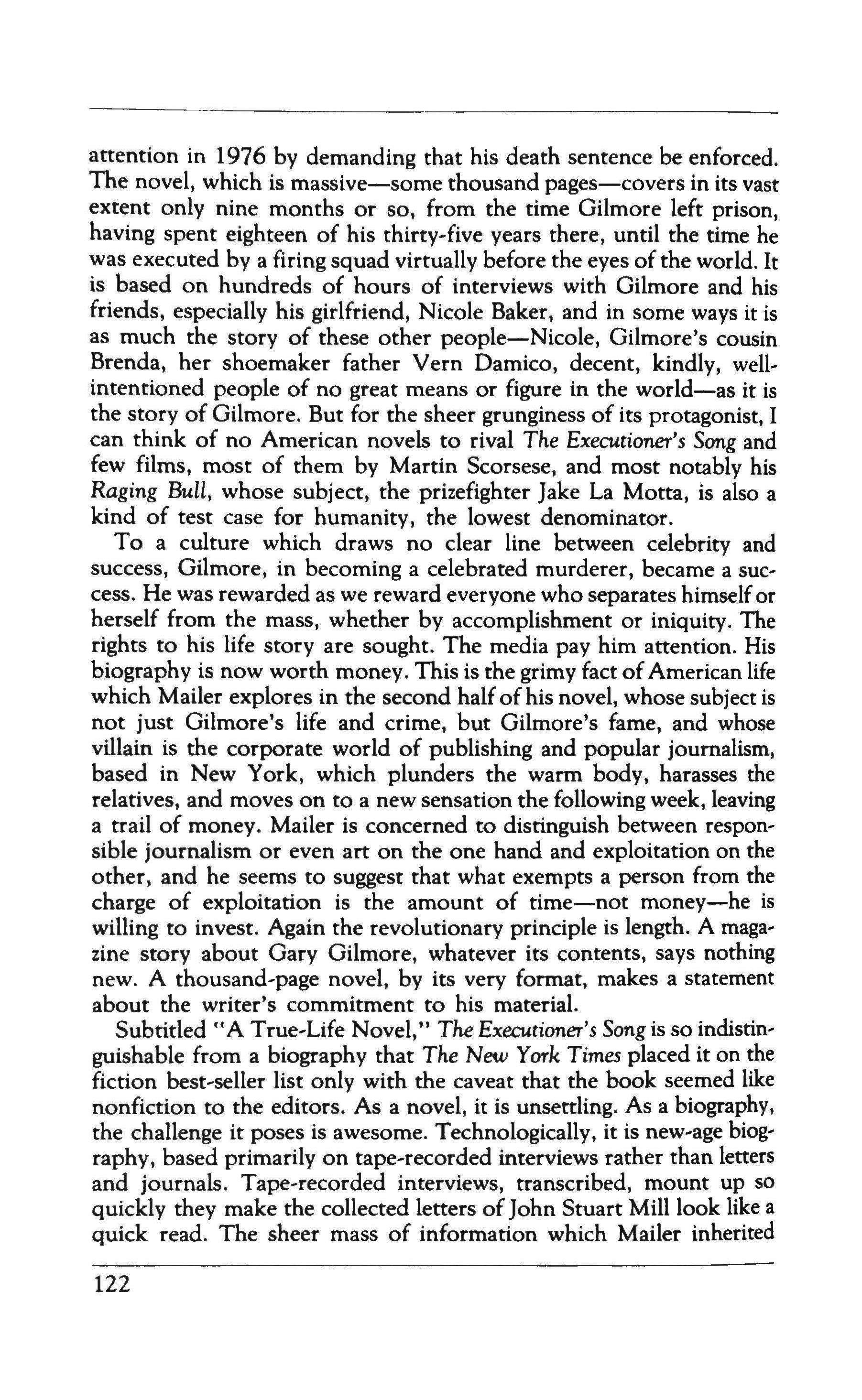
attention in 1976 by demanding that his death sentence be enforced. The novel, which is massive-some thousand pages-covers in its vast extent only nine months or so, from the time Gilmore left prison, having spent eighteen of his thirty-five years there, until the time he was executed by a firing squad virtually before the eyes of the world. It is based on hundreds of hours of interviews with Gilmore and his friends, especially his girlfriend, Nicole Baker, and in some ways it is as much the story of these other people-Nicole, Gilmore's cousin Brenda, her shoemaker father Vern Damico, decent, kindly, wellintentioned people of no great means or figure in the world-as it is the story of Gilmore. But for the sheer grunginess of its protagonist, I can think of no American novels to rival The Executioner's Song and few films, most of them by Martin Scorsese, and most notably his Raging Bull, whose subject, the prizefighter Jake La Motta, is also a kind of test case for humanity, the lowest denominator.
To a culture which draws no clear line between celebrity and success, Gilmore, in becoming a celebrated murderer, became a success. He was rewarded as we reward everyone who separates himself or herself from the mass, whether by accomplishment or iniquity. The rights to his life story are sought. The media pay him attention. His biography is now worth money. This is the grimy fact ofAmerican life which Mailer explores in the second halfofhis novel, whose subject is not just Gilmore's life and crime, but Gilmore's fame, and whose villain is the corporate world of publishing and popular journalism, based in New York, which plunders the warm body, harasses the relatives, and moves on to a new sensation the following week, leaving a trail of money. Mailer is concerned to distinguish between responsible journalism or even art on the one hand and exploitation on the other, and he seems to suggest that what exempts a person from the charge of exploitation is the amount of time-not money-he is willing to invest. Again the revolutionary principle is length. A magazine story about Gary Gilmore, whatever its contents, says nothing new. A thousand-page novel, by its very format, makes a statement about the writer's commitment to his material.
Subtitled "A True-Life Novel," The Executioner's Song is so indistinguishable from a biography that The New York Times placed it on the fiction best-seller list only with the caveat that the book seemed like nonfiction to the editors. As a novel, it is unsettling. As a biography, the challenge it poses is awesome. Technologically, it is new-age biography, based primarily on tape-recorded interviews rather than letters and journals. Tape-recorded interviews, transcribed, mount up so quickly they make the collected letters ofJohn Stuart Mill look like a quick read. The sheer mass of information which Mailer inherited
122
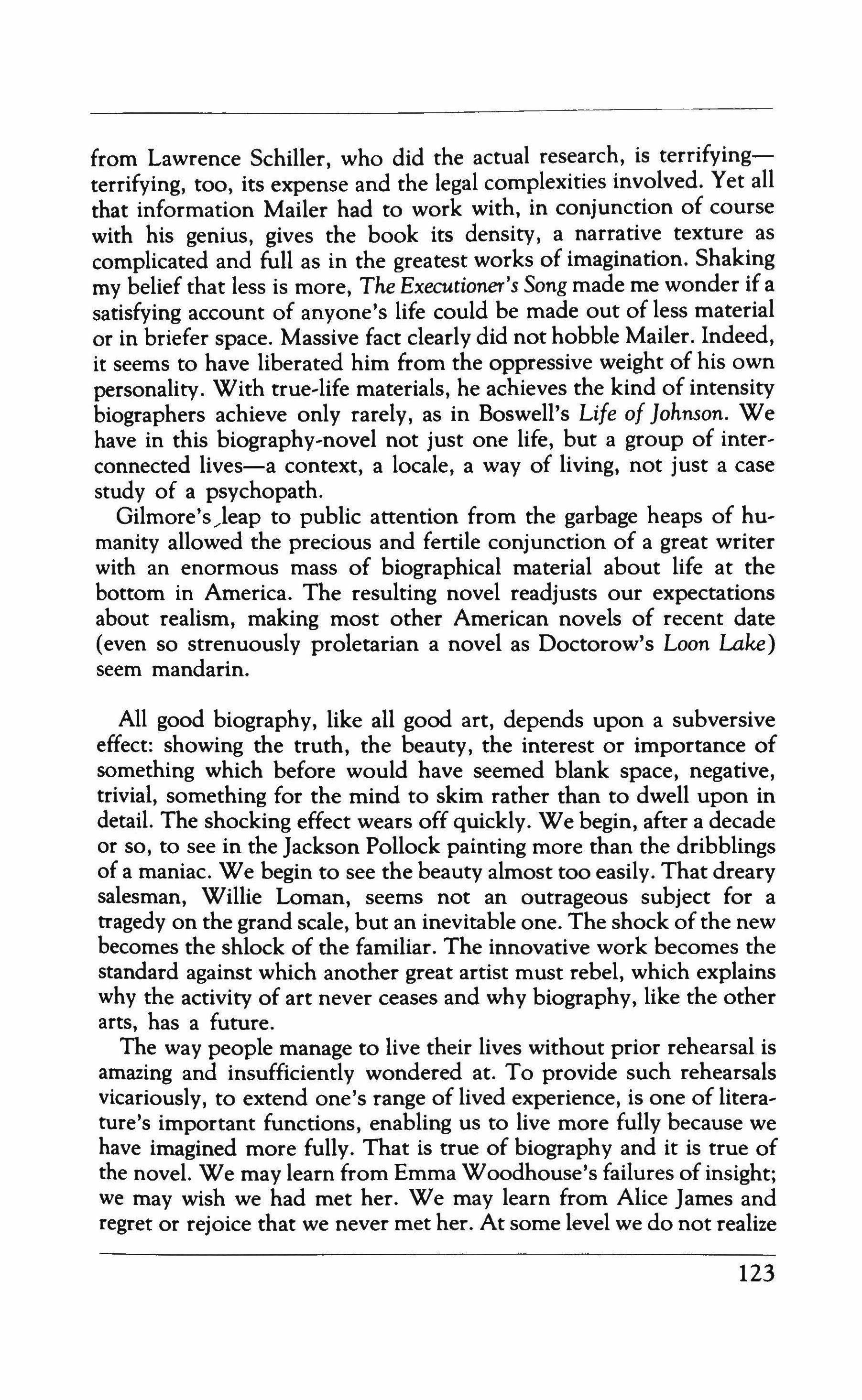
from Lawrence Schiller, who did the actual research, is terrifyingterrifying, too, its expense and the legal complexities involved. Yet all that information Mailer had to work with, in conjunction of course with his genius, gives the book its density, a narrative texture as complicated and full as in the greatest works of imagination. Shaking my belief that less is more, The Executioner's Song made me wonder if a satisfying account of anyone's life could be made out of less material or in briefer space. Massive fact clearly did not hobble Mailer. Indeed, it seems to have liberated him from the oppressive weight of his own personality. With true-life materials, he achieves the kind of intensity biographers achieve only rarely, as in Boswell's Life of Johnson. We have in this biography-novel not just one life, but a group of inter, connected lives-a context, a locale, a way of living, not just a case study of a psychopath.
Gilmore's.Ieap to public attention from the garbage heaps of humanity allowed the precious and fertile conjunction of a great writer with an enormous mass of biographical material about life at the bottom in America. The resulting novel readjusts our expectations about realism, making most other American novels of recent date (even so strenuously proletarian a novel as Doctorow's Loon Lake) seem mandarin.
All good biography, like all good art, depends upon a subversive effect: showing the truth, the beauty, the interest or importance of something which before would have seemed blank space, negative, trivial, something for the mind to skim rather than to dwell upon in detail. The shocking effect wears off quickly. We begin, after a decade or so, to see in the Jackson Pollock painting more than the dribblings of a maniac. We begin to see the beauty almost too easily. That dreary salesman, Willie Loman, seems not an outrageous subject for a tragedy on the grand scale, but an inevitable one. The shock ofthe new becomes the shlock of the familiar. The innovative work becomes the standard against which another great artist must rebel, which explains why the activity of art never ceases and why biography, like the other arts, has a future.
The way people manage to live their lives without prior rehearsal is amazing and insufficiently wondered at. To provide such rehearsals vicariously, to extend one's range of lived experience, is one of litera' ture's important functions, enabling us to live more fully because we have imagined more fully. That is true of biography and it is true of the novel. We may learn from Emma Woodhouse's failures of insight; we may wish we had met her. We may learn from Alice James and regret or rejoice that we never met her. At some level we do not realize
123
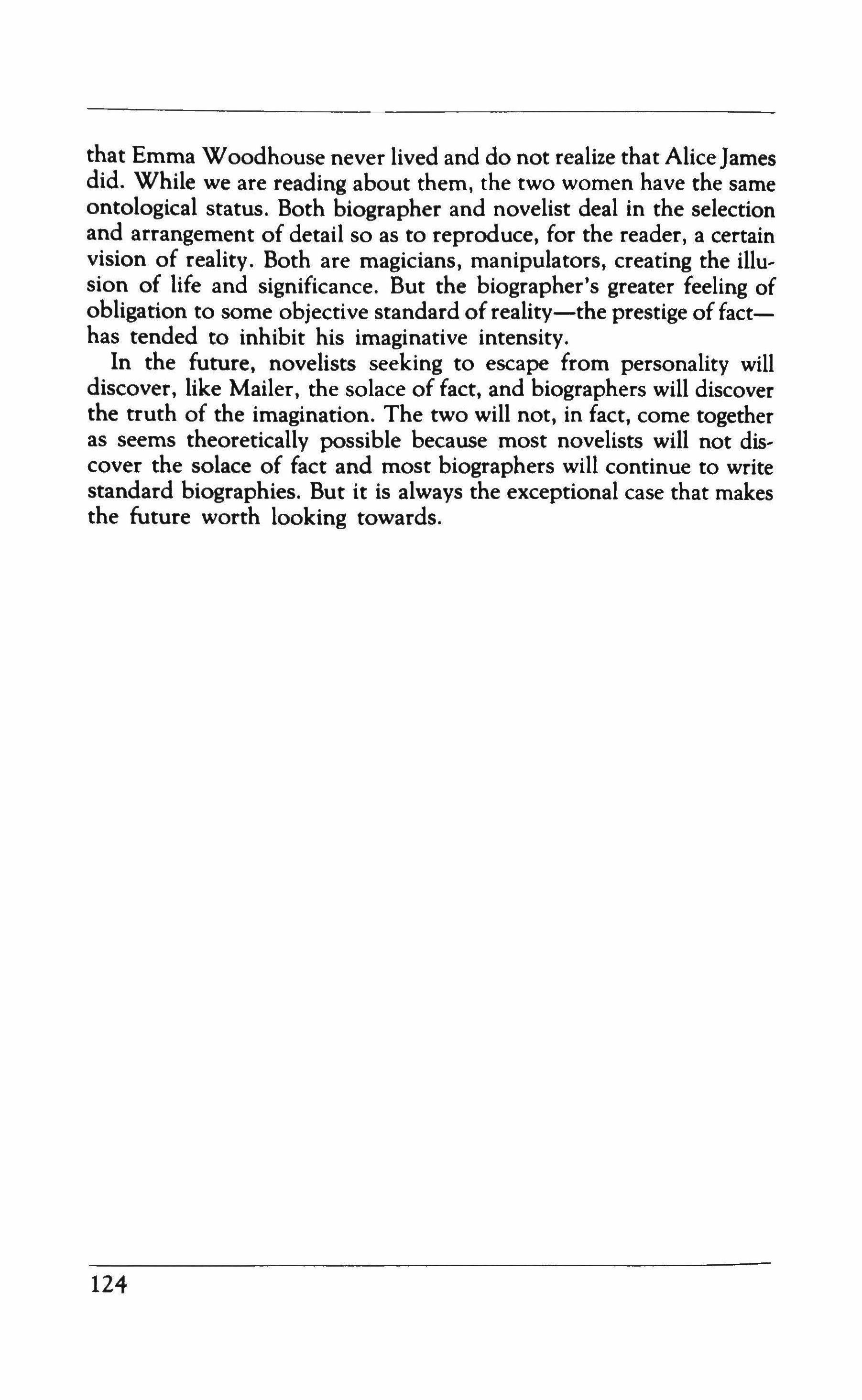
that Emma Woodhouse never lived and do not realize that Alice James did. While we are reading about them, the two women have the same ontological status. Both biographer and novelist deal in the selection and arrangement of detail so as to reproduce, for the reader, a certain vision of reality. Both are magicians, manipulators, creating the illusion of life and significance. But the biographer's greater feeling of obligation to some objective standard ofreality-the prestige of facthas tended to inhibit his imaginative intensity.
In the future, novelists seeking to escape from personality will discover, like Mailer, the solace of fact, and biographers will discover the truth of the imagination. The two will not, in fact, come together as seems theoretically possible because most novelists will not dis, cover the solace of fact and most biographers will continue to write standard biographies. But it is always the exceptional case that makes the future worth looking towards.
124
Watertower
David R. Schanker
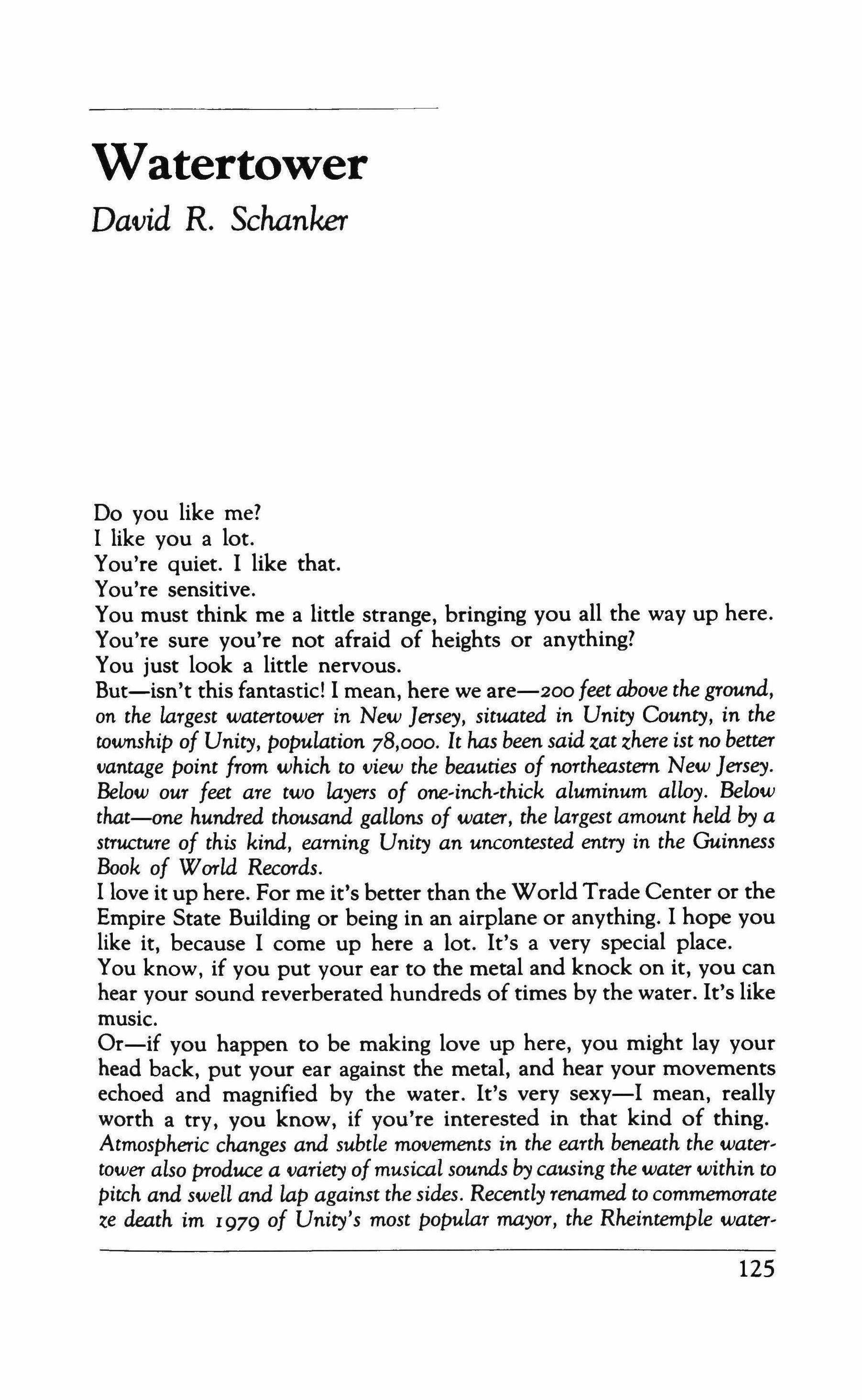
Do you like me?
I like you a lot. You're quiet. I like that. You're sensitive.
You must think me a little strange, bringing you all the way up here. You're sure you're not afraid of heights or anything? You just look a little nervous.
But-isn't this fantastic! I mean, here we are-200 feet above the ground, on the largest watertower in New Jersey, situated in Unity County, in the township of Unity, population 78,000. It has been said zat zhere ist no better vantage point from which to view the beauties of northeastern New Jersey. Below our feet are two layers of one,inch,thick aluminum alloy. Below that-one hundred thousand gallons of water, the largest amount held by a structure of this kind, earning Unity an uncontested entry in the Guinness Book of World Records.
I love it up here. For me it's better than the World Trade Center or the Empire State Building or being in an airplane or anything. I hope you like it, because I come up here a lot. It's a very special place. You know, if you put your ear to the metal and knock on it, you can hear your sound reverberated hundreds of times by the water. It's like music.
Or-if you happen to be making love up here, you might lay your head back, put your ear against the metal, and hear your movements echoed and magnified by the water. It's very sexy-I mean, really worth a try, you know, if you're interested in that kind of thing. Atmospheric changes and subtle movements in the earth beneath the water, tower also produce a variety ofmusical sounds by causing the water within to pitch and swell and lap against the sides. Recently renamed to commemorate ze death im 1979 of Unity's most popular mayor, the Rheinternple water,
125
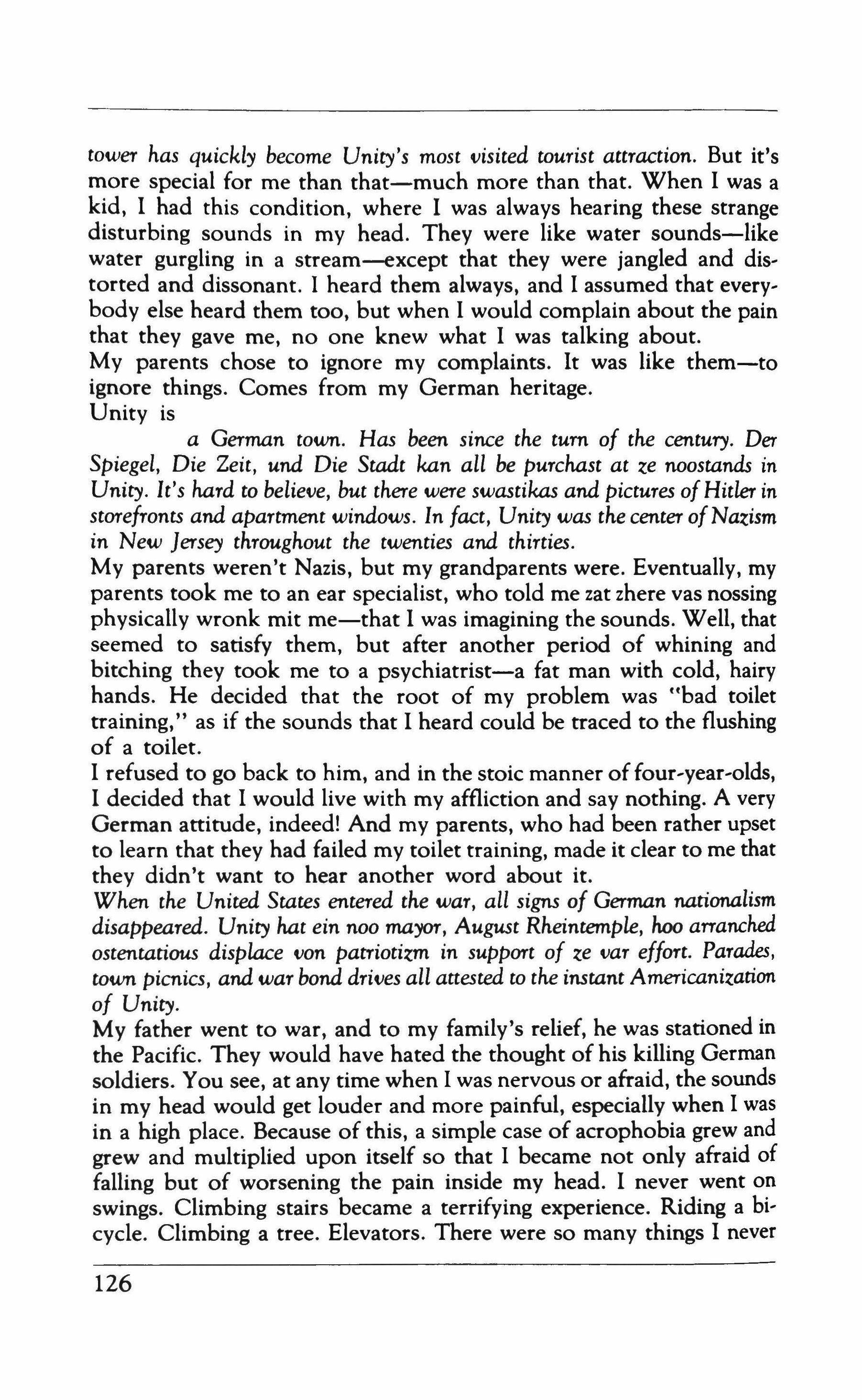
tower has quickly become Unity's most visited tourist attraction. But it's more special for me than that-much more than that. When I was a kid, I had this condition, where I was always hearing these strange disturbing sounds in my head. They were like water sounds-like water gurgling in a stream-except that they were jangled and distorted and dissonant. I heard them always, and I assumed that everybody else heard them too, but when I would complain about the pain that they gave me, no one knew what I was talking about. My parents chose to ignore my complaints. It was like them-to ignore things. Comes from my German heritage.
Unity is a German town. Has been since the tum of the century. Der Spiegel, Die Zeit, und Die Stadt kan all be purchast at ze noostands in Unity. It's hard to believe, but there were swastikas and pictures ofHitler in storefronts and apartment windows. In fact, Unity was the center ofNazism in New Jersey throughout the twenties and thirties.
My parents weren't Nazis, but my grandparents were. Eventually, my parents took me to an ear specialist, who told me zat zhere vas nossing physically wronk mit me-that I was imagining the sounds. Well, that seemed to satisfy them, but after another period of whining and bitching they took me to a psychiatrist-a fat man with cold, hairy hands. He decided that the root of my problem was "bad toilet training," as if the sounds that I heard could be traced to the flushing of a toilet.
I refused to go back to him, and in the stoic manner offour-year-olds, I decided that I would live with my affliction and say nothing. A very German attitude, indeed! And my parents, who had been rather upset to learn that they had failed my toilet training, made it clear to me that they didn't want to hear another word about it. When the United States entered the war, all signs of German nationalism disappeared. Unity hat ein noo mayor, August Rheintemple, hoo arranched ostentatious displace von patriotizm in support of ze var effort. Parades, town picnics, and war bond drives all attested to the instant Americanization of Unity.
My father went to war, and to my family's relief, he was stationed in the Pacific. They would have hated the thought of his killing German soldiers. You see, at any time when I was nervous or afraid, the sounds in my head would get louder and more painful, especially when I was in a high place. Because of this, a simple case of acrophobia grew and grew and multiplied upon itself so that I became not only afraid of falling but of worsening the pain inside my head. I never went on swings. Climbing stairs became a terrifying experience. Riding a hi, cycle. Climbing a tree. Elevators. There were so many things I never
126
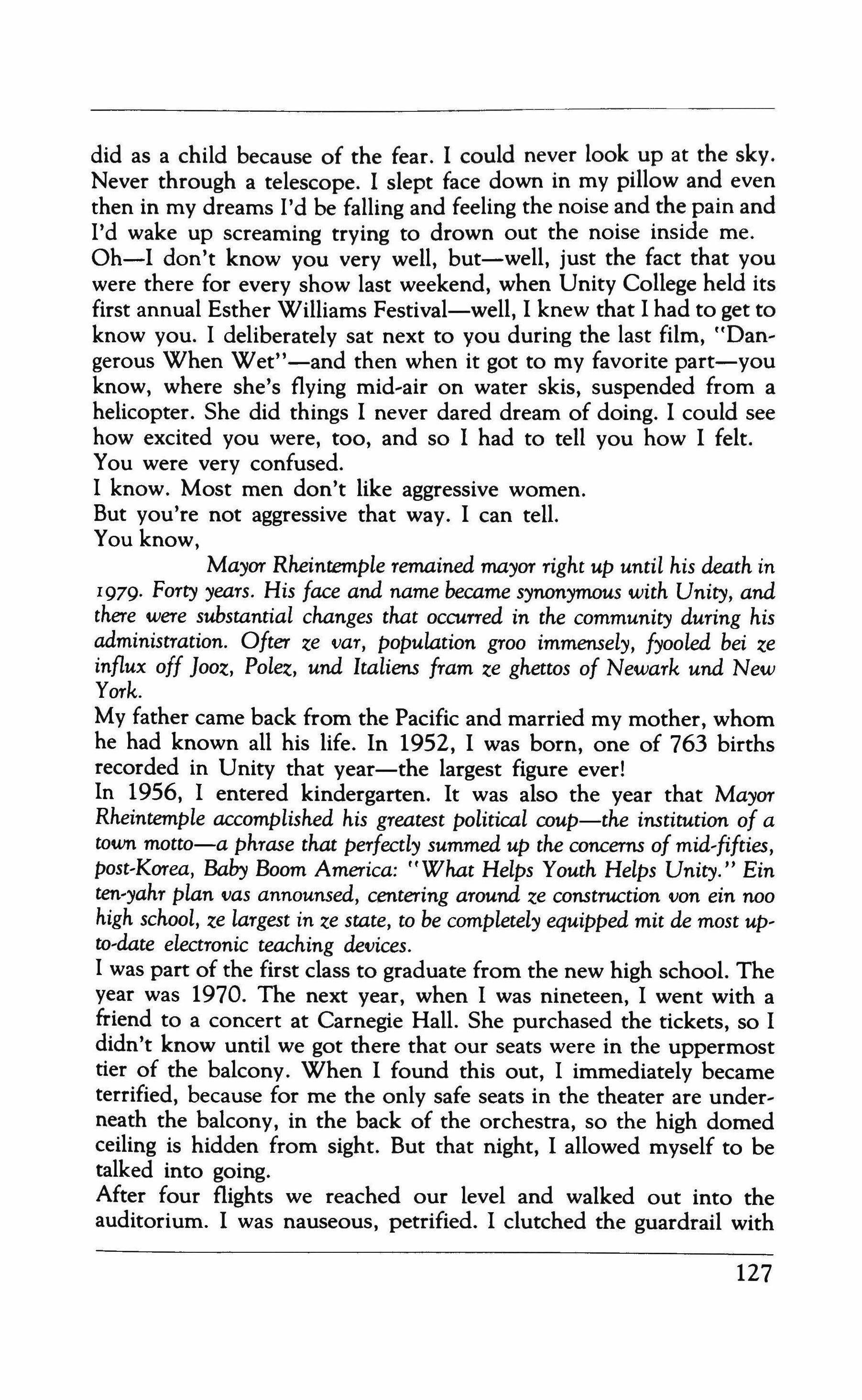
did as a child because of the fear. I could never look up at the sky. Never through a telescope. I slept face down in my pillow and even then in my dreams I'd be falling and feeling the noise and the pain and I'd wake up screaming trying to drown out the noise inside me.
Oh-I don't know you very well, but-well, just the fact that you were there for every show last weekend, when Unity College held its first annual Esther Williams Festival-well, I knew that I had to get to know you. I deliberately sat next to you during the last film, "Dangerous When Wet"-and then when it got to my favorite part-you know, where she's flying mid-air on water skis, suspended from a helicopter. She did things I never dared dream of doing. I could see how excited you were, too, and so I had to tell you how I felt. You were very confused. I know. Most men don't like aggressive women. But you're not aggressive that way. I can tell. You know,
Mayor Rheintemple remained mayor right up until his death in 1979. Forty years. His face and name became synonymous with Unity, and there were substantial changes that occurred in the community during his administration. Ofter ze var, population groo immensely, fyooled bei ze influx off ]ooz, Polez, und Italiens fram ze ghettos of Newark und New York.
My father came back from the Pacific and married my mother, whom he had known all his life. In 1952, I was born, one of 763 births recorded in Unity that year-the largest figure ever! In 1956, I entered kindergarten. It was also the year that Mayor Rheintemple accomplished his greatest political coup-the institution of a town motto-a phrase that perfectly summed up the concerns ofmid�fifties, post-Korea, Baby Boom America: "What Helps Youth Helps Unity." Ein ten-yahr plan vas announsed, centering around ze construction von ein noo high school, ze largest in ze state, to be completely equipped mit de most upto-date electronic teaching devices.
I was part of the first class to graduate from the new high school. The year was 1970. The next year, when I was nineteen, I went with a friend to a concert at Carnegie Hall. She purchased the tickets, so I didn't know until we got there that our seats were in the uppermost tier of the balcony. When I found this out, I immediately became terrified, because for me the only safe seats in the theater are underneath the balcony, in the back of the orchestra, so the high domed ceiling is hidden from sight. But that night, I allowed myself to be talked into going. After four flights we reached our level and walked out into the auditorium. I was nauseous, petrified. I clutched the guardrail with
127
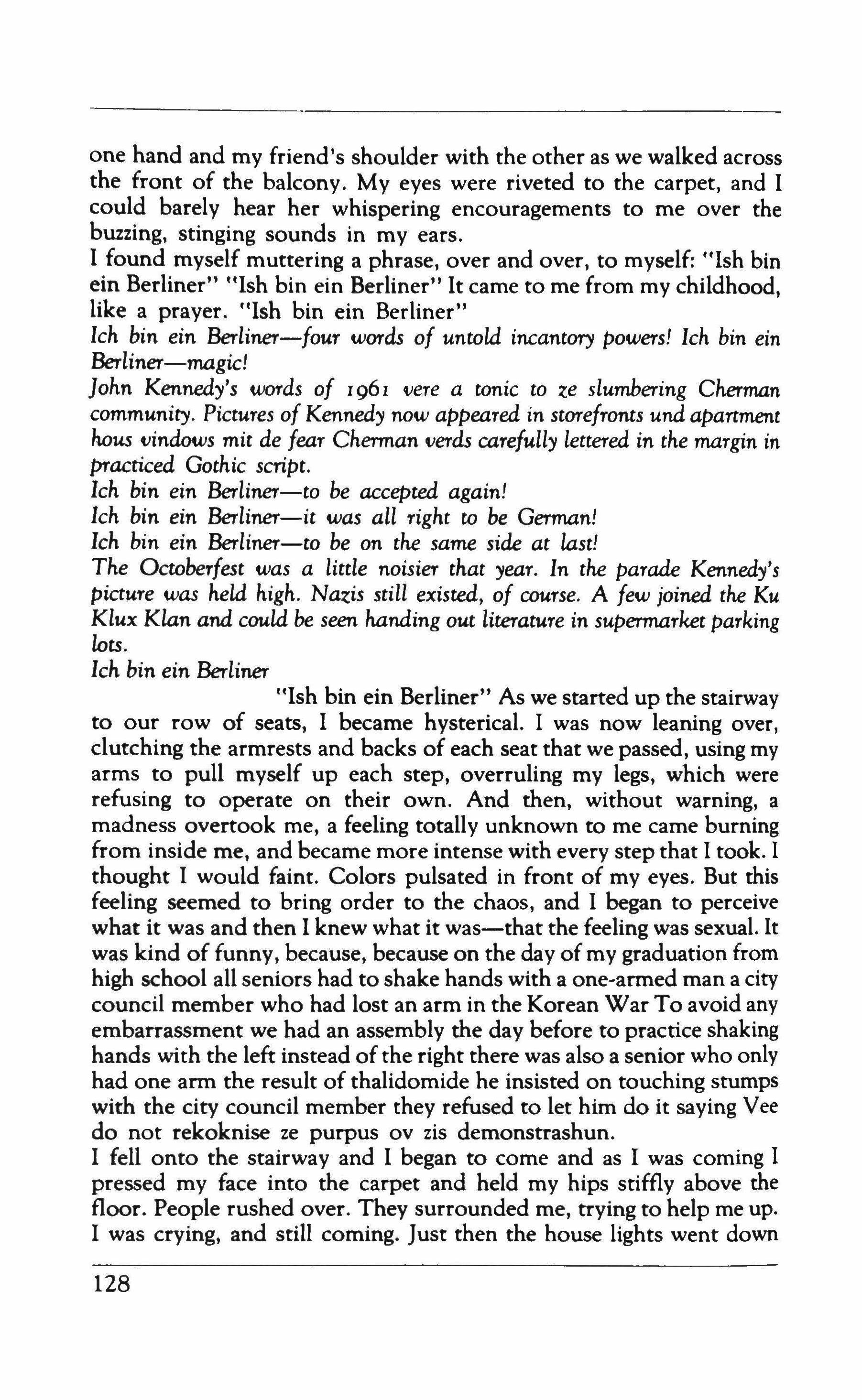
one hand and my friend's shoulder with the other as we walked across the front of the balcony. My eyes were riveted to the carpet, and I could barely hear her whispering encouragements to me over the buzzing, stinging sounds in my ears.
I found myself muttering a phrase, over and over, to myself: "Ish bin ein Berliner" "Ish bin ein Berliner" It came to me from my childhood, like a prayer. "Ish bin ein Berliner" lch bin ein Berliner-four words of untold incantory powers! lch bin ein Berliner-magic!
John Kennedy's words of 1961 vere a tonic to ze slumbering Cherman community. Pictures of Kennedy now appeared in storefronts und apartment hous vindows mit de fear Cherman verds carefully lettered in the margin in practiced Gothic script.
lch bin ein Berliner-to be accepted again!
lch bin ein Berliner-it was all right to be German! lch bin ein Berliner-to be on the same side at last!
The Octoberfest was a little noisier that year. In the parade Kennedy's picture was held high. Nazis still existed, of course. A few joined the Ku Klux Klan and could be seen handing out literature in supermarket parking lots.
lch bin ein Berliner
"Ish bin ein Berliner" As we started up the stairway to our row of seats, I became hysterical. I was now leaning over, clutching the armrests and backs of each seat that we passed, using my arms to pull myself up each step, overruling my legs, which were refusing to operate on their own. And then, without warning, a madness overtook me, a feeling totally unknown to me came burning from inside me, and became more intense with every step that I took. I thought I would faint. Colors pulsated in front of my eyes. But this feeling seemed to bring order to the chaos, and I began to perceive what it was and then I knew what it was-that the feeling was sexual. It was kind of funny, because, because on the day of my graduation from high school all seniors had to shake hands with a one-armed man a city council member who had lost an arm in the Korean War To avoid any embarrassment we had an assembly the day before to practice shaking hands with the left instead ofthe right there was also a senior who only had one arm the result of thalidomide he insisted on touching stumps with the city council member they refused to let him do it saying Vee do not rekoknise ze purpus ov zis demonstrashun. I fell onto the stairway and I began to come and as I was coming I pressed my face into the carpet and held my hips stiffly above the floor. People rushed over. They surrounded me, trying to help me up. I was crying, and still coming. Just then the house lights went down
128

and the audience burst into applause. Ushers pushed their way through the crowd. They helped me to my feet and asked if I needed a doctor. I said no. My friend took my arm and managed to get me to my seat. The watertower on which we stand, two people under god, was built in 1965 to hold an emergency store of water in case of drought. They used to be afraid of water shortages back then. The water's never been touched. I knew of this place from friends who would come up here to smoke pot and look at the stars. I never dared join them. But it was shortly after my incident at Carnegie Hall that I came here alone one night in an attempt to confront the fear that was wresting control of my body away from me.
As I climbed up the ladder, the feelings were all there-the noise, the pain-and as I reached the platform, the sexual feeling returned too. Then I lay down here and masturbated.
After Mayor Rheintemple died, a special election was held. Joseph Shapiro, the one-armed city council member, was elected mayor on the promise of a rebirth for Unity. Since enrollment had dropped to about half of the new high school's capacity, he proposed returning to the old high school and selling the new building to industry.
I think to myself, how mad it is to be aroused by the fear. But soon I found that I didn't want to make love unless there was fear involved. Plans vere announst foor ze construcshun off three noo federally subsidized apartment complexes [oor senior cuzens.
I've made love in stores, for the fear of being caught. I've made love with strangers, for the fear of being hurt. I've made love in moving cars, in the pews of a church, in an open field, staring into the clouds.
I don't know you very well. You've been very trusting, allowing me to take you up here. You see,
ofter a time, I only vanted to make lufhier, on top off zis vatertower, mit mein ear against ze metal, hearing ze sounds off mein fear, filling my head mit imaginings off a nonexistent Make love with me now.
Eet hass to be hier. Own-lee hier.
Poot dein ear against ze metal. Listen.
129
Etude
Vladimir Voinovich
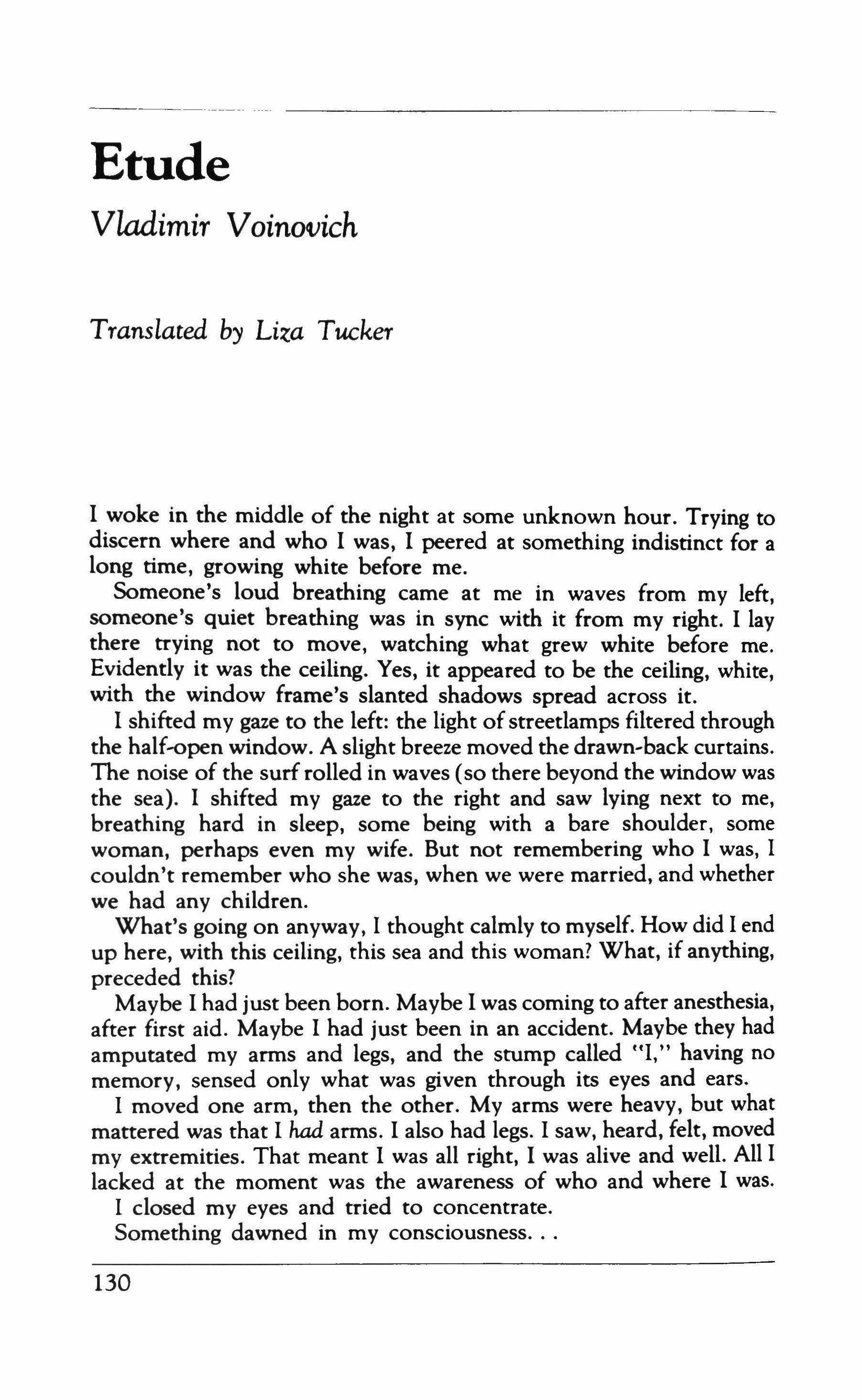 Translated by Liza Tucker
Translated by Liza Tucker
I woke in the middle of the night at some unknown hour. Trying to discern where and who I was, I peered at something indistinct for a long time, growing white before me.
Someone's loud breathing came at me in waves from my left, someone's quiet breathing was in sync with it from my right. I lay there trying not to move, watching what grew white before me. Evidently it was the ceiling. Yes, it appeared to be the ceiling, white, with the window frame's slanted shadows spread across it.
I shifted my gaze to the left: the light ofstreetlamps filtered through the half-open window. A slight breeze moved the drawn-back curtains. The noise of the surf rolled in waves (so there beyond the window was the sea). I shifted my gaze to the right and saw lying next to me, breathing hard in sleep, some being with a bare shoulder, some woman, perhaps even my wife. But not remembering who I was, I couldn't remember who she was, when we were married, and whether we had any children.
What's going on anyway, I thought calmly to myself. How did I end up here, with this ceiling, this sea and this woman? What, if anything, preceded this?
Maybe I had just been born. Maybe I was coming to after anesthesia, after first aid. Maybe I had just been in an accident. Maybe they had amputated my arms and legs, and the stump called "I," having no memory, sensed only what was given through its eyes and ears.
I moved one arm, then the other. My arms were heavy, but what mattered was that 1 had arms. 1 also had legs. 1 saw, heard, felt, moved my extremities. That meant I was all right, I was alive and well. All 1 lacked at the moment was the awareness of who and where I was.
1 closed my eyes and tried to concentrate. Something dawned in my consciousness
130
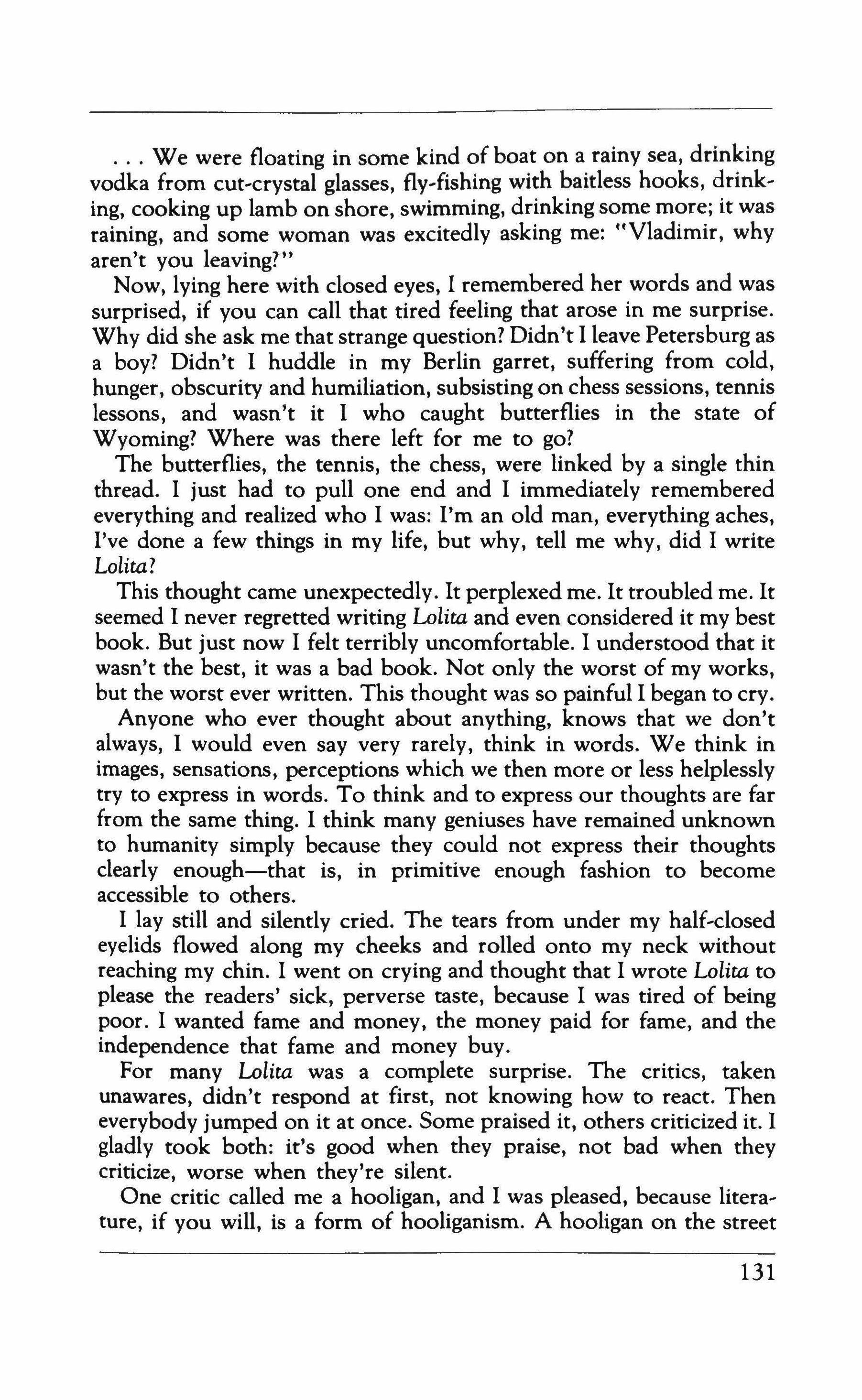
We were floating in some kind of boat on a rainy sea, drinking vodka from cut-crystal glasses, flv-fishing with baitless hooks, drink, ing, cooking up lamb on shore, swimming, drinking some more; it was raining, and some woman was excitedly asking me: "Vladimir, why aren't you leaving?"
Now, lying here with closed eyes, I remembered her words and was surprised, if you can call that tired feeling that arose in me surprise. Why did she ask me that strange question? Didn't I leave Petersburg as a boy? Didn't I huddle in my Berlin garret, suffering from cold, hunger, obscurity and humiliation, subsisting on chess sessions, tennis lessons, and wasn't it I who caught butterflies in the state of Wyoming? Where was there left for me to go?
The butterflies, the tennis, the chess, were linked by a single thin thread. I just had to pull one end and I immediately remembered everything and realized who I was: I'm an old man, everything aches, I've done a few things in my life, but why, tell me why, did I write Lolita?
This thought came unexpectedly. It perplexed me. It troubled me. It seemed I never regretted writing Lolita and even considered it my best book. But just now I felt terribly uncomfortable. I understood that it wasn't the best, it was a bad book. Not only the worst of my works, but the worst ever written. This thought was so painful I began to cry.
Anyone who ever thought about anything, knows that we don't always, I would even say very rarely, think in words. We think in images, sensations, perceptions which we then more or less helplessly try to express in words. To think and to express our thoughts are far from the same thing. I think many geniuses have remained unknown to humanity simply because they could not express their thoughts clearly enough-that is, in primitive enough fashion to become accessible to others.
I lay still and silently cried. The tears from under my half-closed eyelids flowed along my cheeks and rolled onto my neck without reaching my chin. I went on crying and thought that I wrote Lolita to please the readers' sick, perverse taste, because I was tired of being poor. I wanted fame and money, the money paid for fame, and the independence that fame and money buy.
For many Lolita was a complete surprise. The critics, taken unawares, didn't respond at first, not knowing how to react. Then everybody jumped on it at once. Some praised it, others criticized it. I gladly took both: it's good when they praise, not bad when they criticize, worse when they're silent.
One critic called me a hooligan, and I was pleased, because litera' ture, if you will, is a form of hooliganism. A hooligan on the street
131
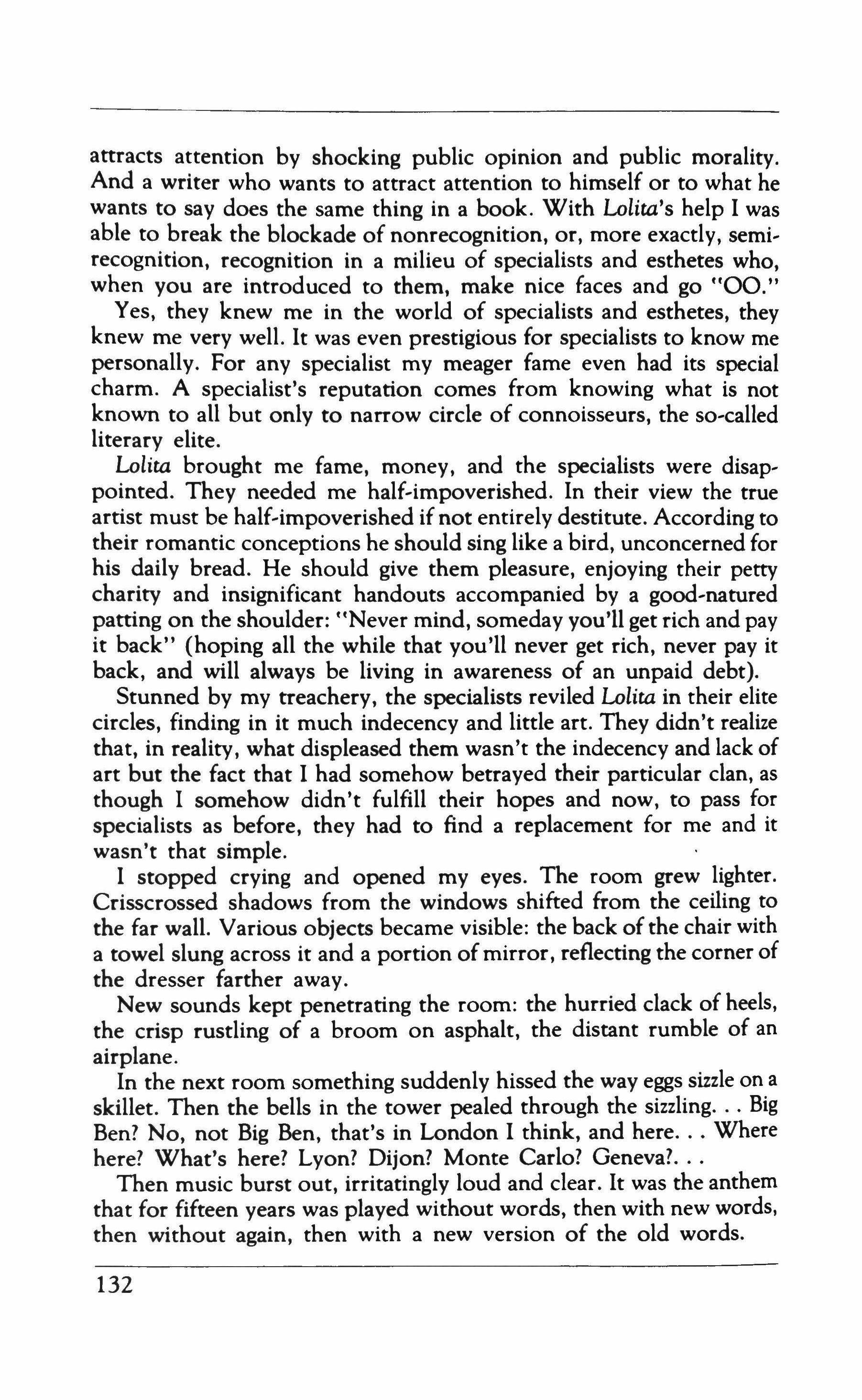
attracts attention by shocking public opinion and public morality. And a writer who wants to attract attention to himself or to what he wants to say does the same thing in a book. With Lolita's help I was able to break the blockade of nonrecognition, or, more exactly, semi, recognition, recognition in a milieu of specialists and esthetes who, when you are introduced to them, make nice faces and go "00."
Yes, they knew me in the world of specialists and esthetes, they knew me very well. It was even prestigious for specialists to know me personally. For any specialist my meager fame even had its special charm. A specialist's reputation comes from knowing what is not known to all but only to narrow circle of connoisseurs, the so-called literary elite.
Lolita brought me fame, money, and the specialists were disappointed. They needed me half-Impoverished. In their view the true artist must be half,impoverished if not entirely destitute. According to their romantic conceptions he should sing like a bird, unconcerned for his daily bread. He should give them pleasure, enjoying their petty charity and insignificant handouts accompanied by a good-natured patting on the shoulder: "Never mind, someday you'll get rich and pay it back" (hoping all the while that you'll never get rich, never pay it back, and will always be living in awareness of an unpaid debt).
Stunned by my treachery, the specialists reviled Lolita in their elite circles, finding in it much indecency and little art. They didn't realize that, in reality, what displeased them wasn't the indecency and lack of art but the fact that I had somehow betrayed their particular clan, as though I somehow didn't fulfill their hopes and now, to pass for specialists as before, they had to find a replacement for me and it wasn't that simple.
I stopped crying and opened my eyes. The room grew lighter. Crisscrossed shadows from the windows shifted from the ceiling to the far wall. Various objects became visible: the back of the chair with a towel slung across it and a portion ofmirror, reflecting the corner of the dresser farther away.
New sounds kept penetrating the room: the hurried clack of heels, the crisp rustling of a broom on asphalt, the distant rumble of an airplane.
In the next room something suddenly hissed the way eggs sizzle on a skillet. Then the bells in the tower pealed through the sizzling Big Ben? No, not Big Ben, that's in London I think, and here Where here? What's here? Lyon? Dijon? Monte Carlo? Geneva?
Then music burst out, irritatingly loud and clear. It was the anthem that for fifteen years was played without words, then with new words, then without again, then with a new version of the old words.
132
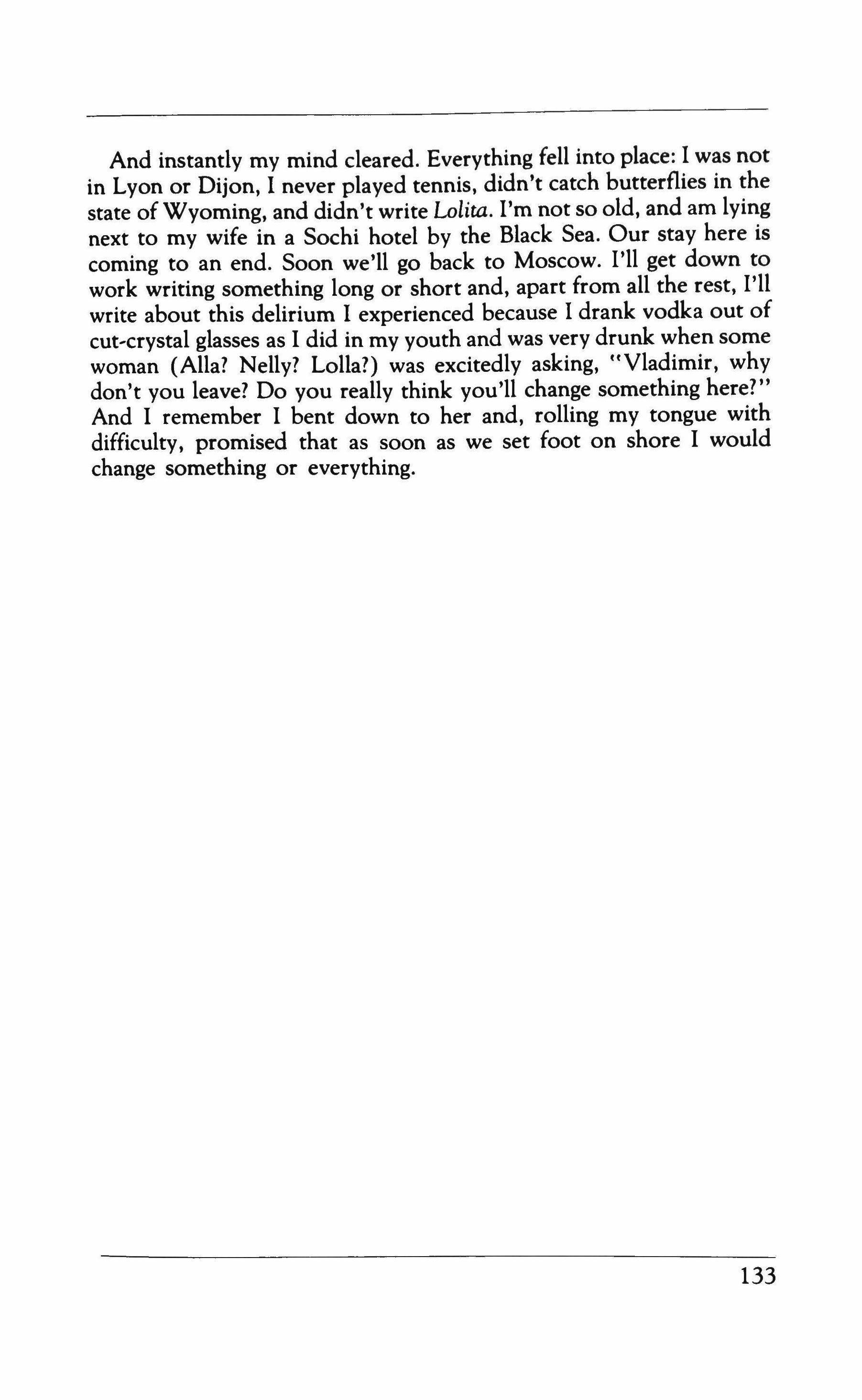
And instantly my mind cleared. Everything fell into place: I was not in Lyon or Dijon, I never played tennis, didn't catch butterflies in the state of Wyoming, and didn't write Lolita. I'm not so old, and am lying next to my wife in a Sochi hotel by the Black Sea. Our stay here is coming to an end. Soon we'll go back to Moscow. I'll get down to work writing something long or short and, apart from all the rest, I'll write about this delirium I experienced because I drank vodka out of cut-crystal glasses as I did in my youth and was very drunk when some woman (AlIa? Nelly? Lolla?) was excitedly asking, "Vladimir, why don't you leave? Do you really think you'll change something here?" And I remember I bent down to her and, rolling my tongue with difficulty, promised that as soon as we set foot on shore I would change something or everything.
133
The queen
R. D. Skillings
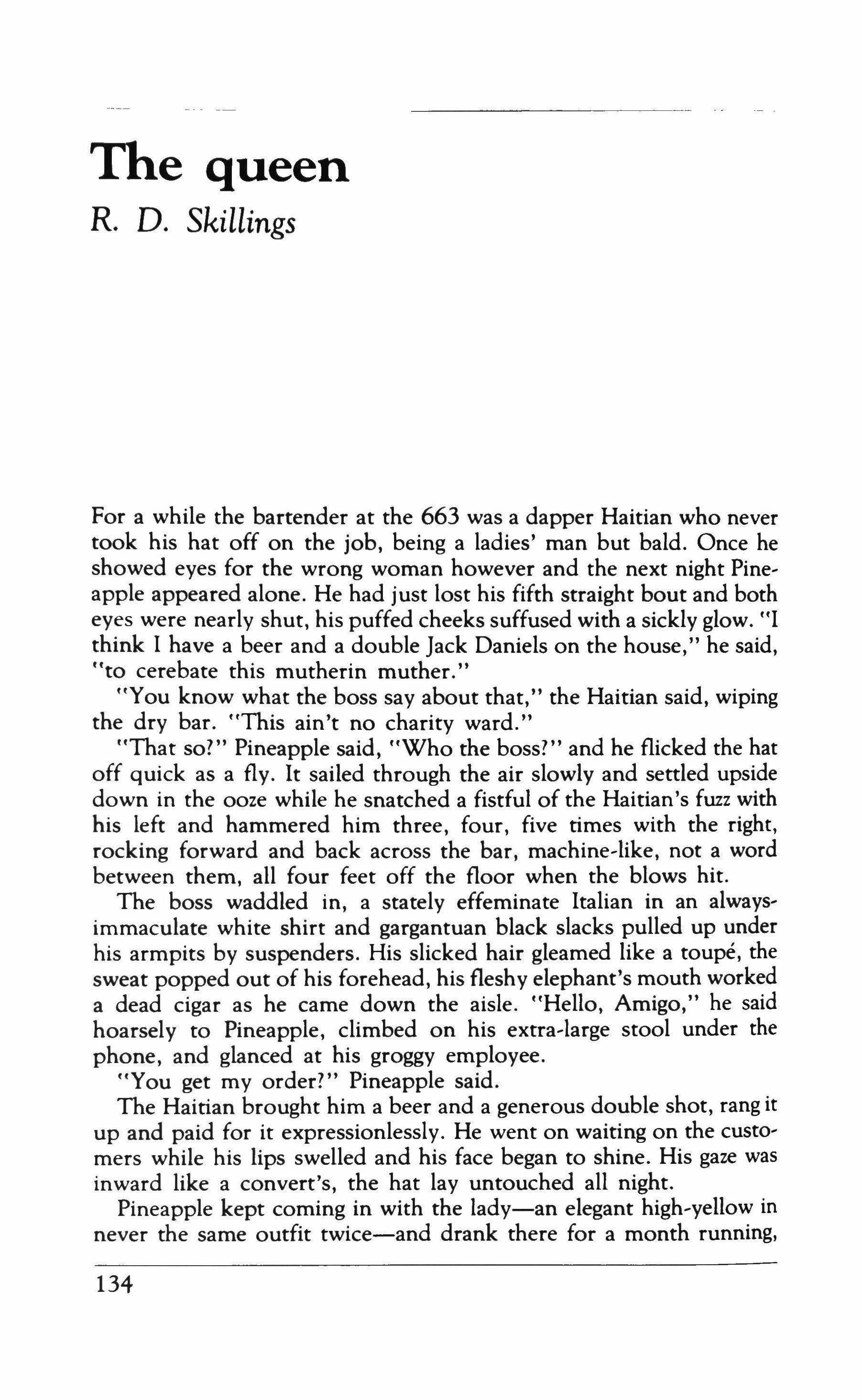
For a while the bartender at the 663 was a dapper Haitian who never took his hat off on the job, being a ladies' man but bald. Once he showed eyes for the wrong woman however and the next night Pine, apple appeared alone. He had just lost his fifth straight bout and both eyes were nearly shut, his puffed cheeks suffused with a sickly glow. "I think I have a beer and a double Jack Daniels on the house," he said, "to cerebate this mutherin muther."
"You know what the boss say about that," the Haitian said, wiping the dry bar. "This ain't no charity ward."
"That so?" Pineapple said, "Who the boss?" and he flicked the hat off quick as a fly. It sailed through the air slowly and settled upside down in the ooze while he snatched a fistful of the Haitian's fuzz with his left and hammered him three, four, five times with the right, rocking forward and back across the bar, machine-like, not a word between them, all four feet off the floor when the blows hit.
The boss waddled in, a stately effeminate Italian in an always, immaculate white shirt and gargantuan black slacks pulled up under his armpits by suspenders. His slicked hair gleamed like a toupe, the sweat popped out of his forehead, his fleshy elephant's mouth worked a dead cigar as he came down the aisle. "Hello, Amigo," he said hoarsely to Pineapple, climbed on his extra-large stool under the phone, and glanced at his groggy employee.
"You get my order?" Pineapple said.
The Haitian brought him a beer and a generous double shot, rang it up and paid for it expressionlessly. He went on waiting on the customers while his lips swelled and his face began to shine. His gaze was inward like a convert's, the hat lay untouched all night.
Pineapple kept coming in with the lady-an elegant high-yellow in never the same outfit twice-and drank there for a month running,
134
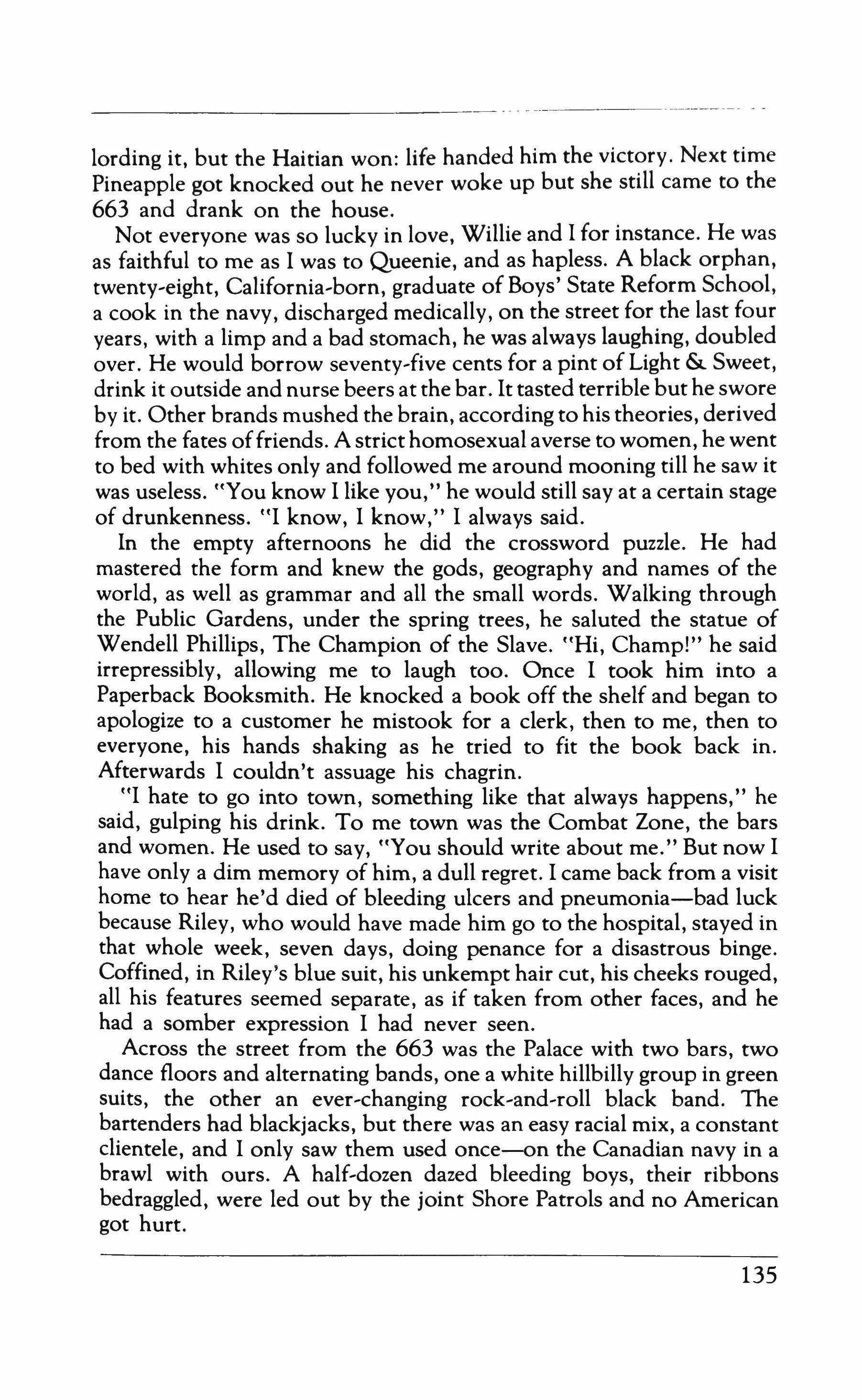
lording it, but the Haitian won: life handed him the victory. Next time Pineapple got knocked out he never woke up but she still came to the 663 and drank on the house.
Not everyone was so lucky in love, Willie and I for instance. He was as faithful to me as I was to Queenie, and as hapless. A black orphan, twenty-eight, California-born, graduate of Boys' State Reform School, a cook in the navy, discharged medically, on the street for the last four years, with a limp and a bad stomach, he was always laughing, doubled over. He would borrow seventy-five cents for a pint of Light & Sweet, drink it outside and nurse beers at the bar. It tasted terrible but he swore by it. Other brands mushed the brain, according to his theories, derived from the fates offriends. A strict homosexual averse to women, he went to bed with whites only and followed me around mooning till he saw it was useless. "You know I like you," he would still say at a certain stage of drunkenness. "I know, I know," I always said.
In the empty afternoons he did the crossword puzzle. He had mastered the form and knew the gods, geography and names of the world, as well as grammar and all the small words. Walking through the Public Gardens, under the spring trees, he saluted the statue of Wendell Phillips, The Champion of the Slave. "Hi, Champ!" he said irrepressibly, allowing me to laugh too. Once I took him into a Paperback Booksmith. He knocked a book off the shelf and began to apologize to a customer he mistook for a clerk, then to me, then to everyone, his hands shaking as he tried to fit the book back in. Afterwards I couldn't assuage his chagrin.
"I hate to go into town, something like that always happens," he said, gulping his drink. To me town was the Combat Zone, the bars and women. He used to say, "You should write about me." But now I have only a dim memory of him, a dull regret. I came back from a visit home to hear he'd died of bleeding ulcers and pneumonia-bad luck because Riley, who would have made him go to the hospital, stayed in that whole week, seven days, doing penance for a disastrous binge. Coffined, in Riley's blue suit, his unkempt hair cut, his cheeks rouged, all his features seemed separate, as if taken from other faces, and he had a somber expression I had never seen.
Across the street from the 663 was the Palace with two bars, two dance floors and alternating bands, one a white hillbilly group in green suits, the other an ever-changing rock-and-roll black band. The bartenders had blackjacks, but there was an easy racial mix, a constant clientele, and I only saw them used once-on the Canadian navy in a brawl with ours. A half-dozen dazed bleeding boys, their ribbons bedraggled, were led out by the joint Shore Patrols and no American got hurt.
135

Queenie preyed on all navies, all men. Money was her sole concern. She went out at night with exactly taxi fare home, and seldom spent that. She had been married three times, had children seven and eight she had banked $25,000 for, supported her mother in Cleveland, and worried about the IRS. "I'm going to find some rich man and retire," she said, laughing to see me wince.
"Oh, I fucked her once," Riley said. "What did she charge you?" I said.
"Oh, I didn't pay her, I would never pay her, I would only pay the most beautiful, she's not so much."
Thus he dismissed that event in his life and I was too flabbergasted and pained to ask for details, though he said it took place in his car, up on a lift in a garage.
She would never tell me her name, though I wheedled her endlessly. ttl am the Queen," she would say and laugh till my spine tingled acknowledgment but it made me mad and I was always hoping to see her downfall, just once, not far. I followed her around, buying her drinks and importuning. "Twenty dollars," she always said.
She kept alone, seldom socialized, worked every night, never giving up in the rain, often coming back for a second or third trick, joked with the police, never got arrested or beaten up. Sitting at the front bar, watchful and glittering, she would get a vague look, put out her cigarette and say, "Bye darlin', I'll be right back."
I was completely in her power, but never felt humiliated or abused, and she was simply pleased, jealous and mocking the nights after she thought I had slept with someone else. When business was slow she would make me take her to Chinatown, after which she would go off with the first man waiting in a doorway. It never stopped being painful, though I expected it to. I refused to pay her, she refused to have me unless I did. "For love," I said. "Twenty dollars," she said.
She got money out of men tirelessly. Sitting down beside a bleary sailor in the New Yorker, a stripjoint nearby, she said, "Hey, you're good-looking, you're handsome, are you going to buy me a drink?" and laughed in his eyes the way she did mine, the way she did everybody's, as if it were a personal joke, a mutual understanding. The sailor, a blond with a mustache and bloodshot eyes, took out his wallet with a flourish, as if letting her into an automobile. "Let me see what you got in there," she said, grabbed it and removed the contents. "I just want to count it," she said. "Loan me a dollar, I only want one. How much you got in here anyway?"
He struggled with her, but she only gave him back the empty wallet. "Where's my drink?" she said and laughed, keeping her plump brown
136
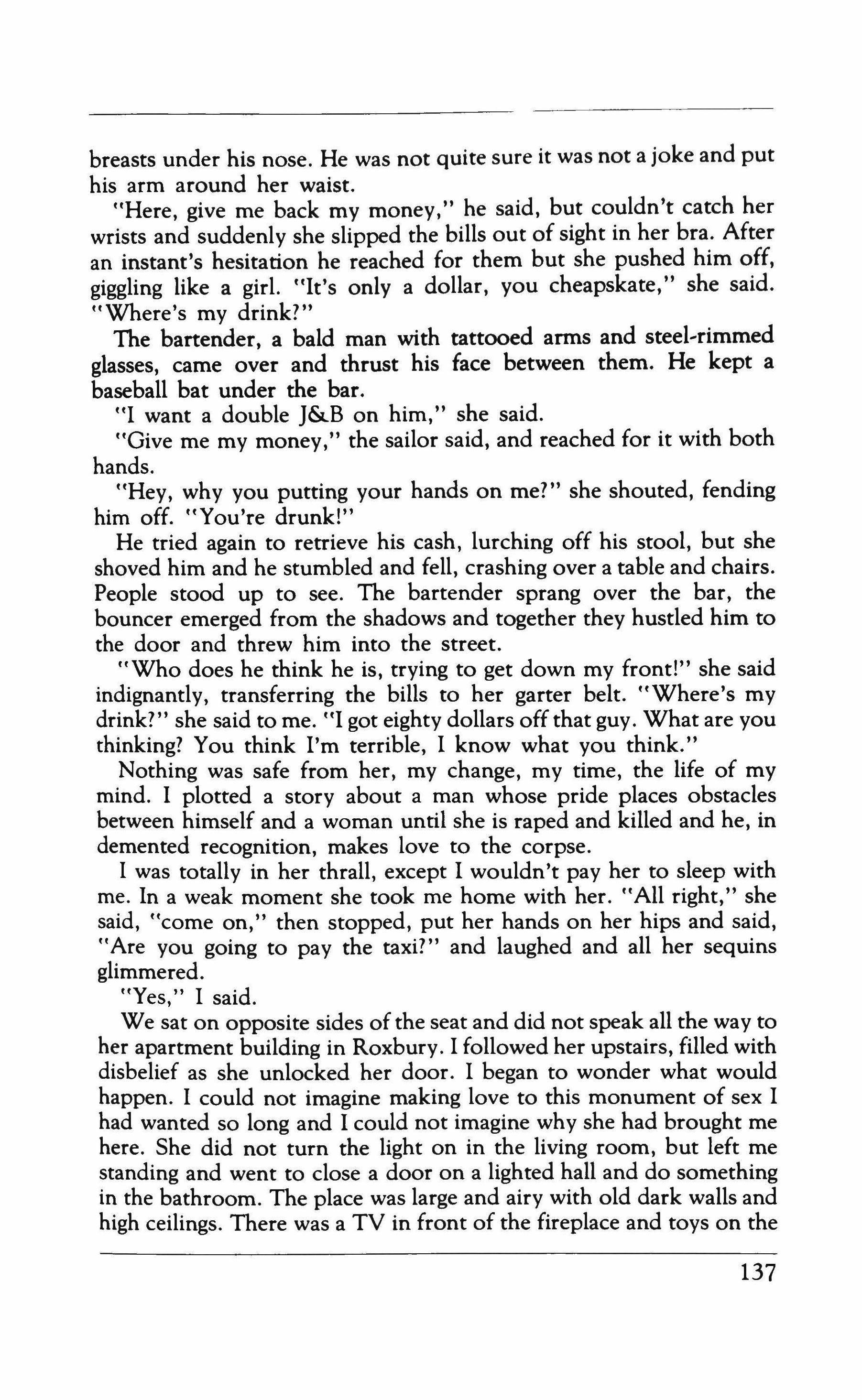
breasts under his nose. He was not quite sure it was not a joke and put his arm around her waist.
"Here, give me back my money," he said, but couldn't catch her wrists and suddenly she slipped the bills out of sight in her bra. After an instant's hesitation he reached for them but she pushed him off, giggling like a girl. "It's only a dollar, you cheapskate," she said. "Where's my drink?"
The bartender, a bald man with tattooed arms and steel-rimmed glasses, came over and thrust his face between them. He kept a baseball bat under the bar.
"I want a double J&B on him," she said.
"Give me my money," the sailor said, and reached for it with both hands.
"Hey, why you putting your hands on me?" she shouted, fending him off. "You're drunk!"
He tried again to retrieve his cash, lurching off his stool, but she shoved him and he stumbled and fell, crashing over a table and chairs. People stood up to see. The bartender sprang over the bar, the bouncer emerged from the shadows and together they hustled him to the door and threw him into the street.
"Who does he think he is, trying to get down my front!" she said indignantly, transferring the bills to her garter belt. "Where's my drink?" she said to me. "I got eighty dollars off that guy. What are you thinking? You think I'm terrible, I know what you think."
Nothing was safe from her, my change, my time, the life of my mind. I plotted a story about a man whose pride places obstacles between himself and a woman until she is raped and killed and he, in demented recognition, makes love to the corpse.
I was totally in her thrall, except I wouldn't pay her to sleep with me. In a weak moment she took me home with her. "All right," she said, "come on," then stopped, put her hands on her hips and said, "Are you going to pay the taxi?" and laughed and all her sequins glimmered.
"Yes," I said.
We sat on opposite sides of the seat and did not speak all the way to her apartment building in Roxbury. I followed her upstairs, filled with disbelief as she unlocked her door. I began to wonder what would happen. I could not imagine making love to this monument of sex I had wanted so long and I could not imagine why she had brought me here. She did not turn the light on in the living room, but left me standing and went to close a door on a lighted hall and do something in the bathroom. The place was large and airy with old dark walls and high ceilings. There was a TV in front of the fireplace and toys on the
137
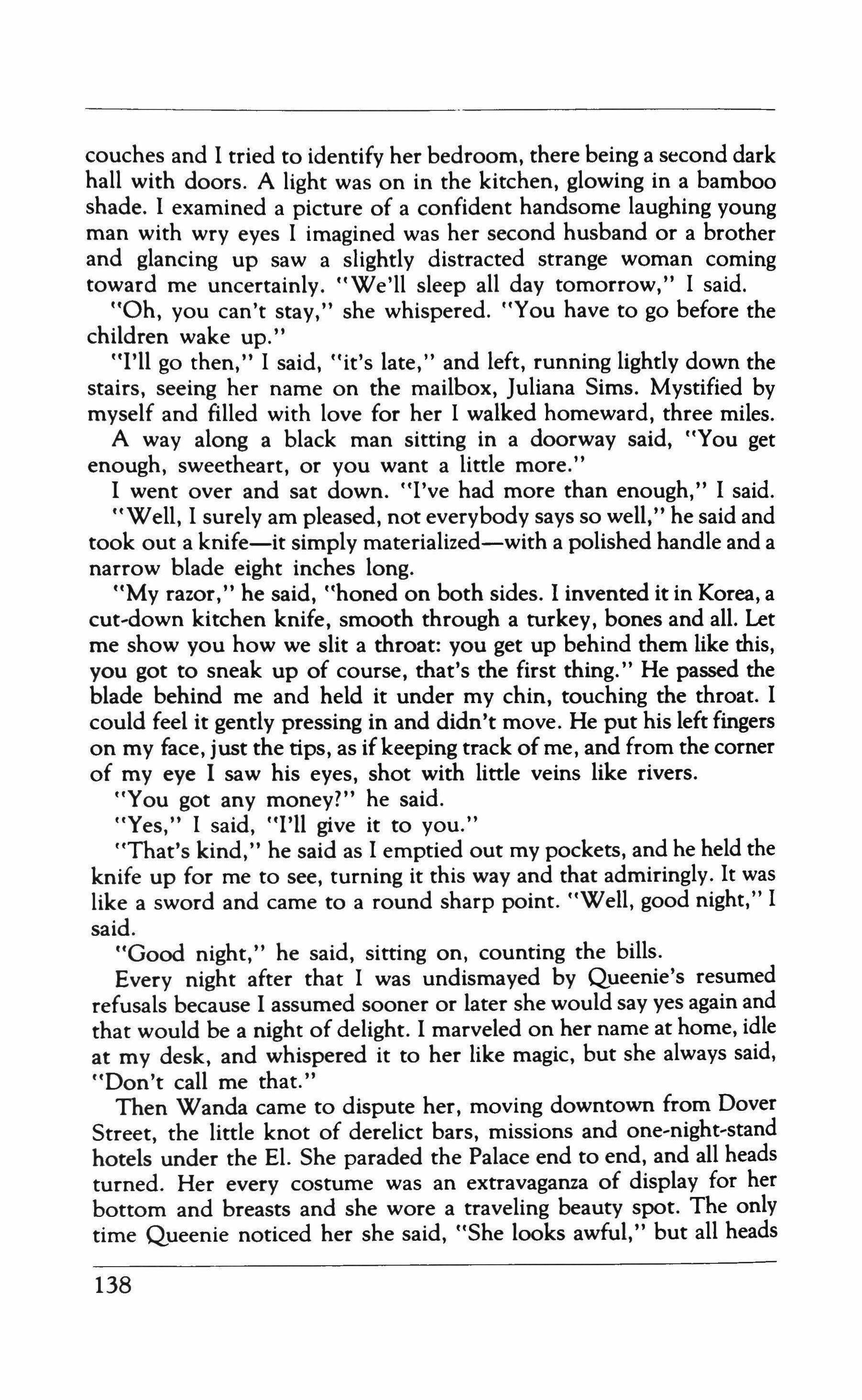
couches and I tried to identify her bedroom, there being a second dark hall with doors. A light was on in the kitchen, glowing in a bamboo shade. I examined a picture of a confident handsome laughing young man with wry eyes I imagined was her second husband or a brother and glancing up saw a slightly distracted strange woman coming toward me uncertainly. "We'll sleep all day tomorrow," I said.
"Oh, you can't stay," she whispered. "You have to go before the children wake up."
"I'll go then," I said, "it's late," and left, running lightly down the stairs, seeing her name on the mailbox, Juliana Sims. Mystified by myself and filled with love for her I walked homeward, three miles.
A way along a black man sitting in a doorway said, "You get enough, sweetheart, or you want a little more."
I went over and sat down. "I've had more than enough," I said.
"Well, I surely am pleased, not everybody says so well," he said and took out a knife-it simply materialized-with a polished handle and a narrow blade eight inches long.
"My razor," he said, "honed on both sides. I invented it in Korea, a cut-down kitchen knife, smooth through a turkey, bones and all. Let me show you how we slit a throat: you get up behind them like this, you got to sneak up of course, that's the first thing." He passed the blade behind me and held it under my chin, touching the throat. I could feel it gently pressing in and didn't move. He put his left fingers on my face, just the tips, as ifkeeping track of me, and from the corner of my eye I saw his eyes, shot with little veins like rivers.
"You got any money?" he said.
"Yes," I said, "I'll give it to you."
"That's kind," he said as I emptied out my pockets, and he held the knife up for me to see, turning it this way and that admiringly. It was like a sword and came to a round sharp point. "Well, good night," I said.
"Good night," he said, sitting on, counting the bills.
Every night after that I was undismayed by Queenie'S resumed refusals because I assumed sooner or later she would say yes again and that would be a night of delight. I marveled on her name at home, idle at my desk, and whispered it to her like magic, but she always said, "Don't call me that."
Then Wanda came to dispute her, moving downtown from Dover Street, the little knot of derelict bars, missions and one-night-stand hotels under the El. She paraded the Palace end to end, and all heads turned. Her every costume was an extravaganza of display for her bottom and breasts and she wore a traveling beauty spot. The only time Queenie noticed her she said, "She looks awful," but all heads
138
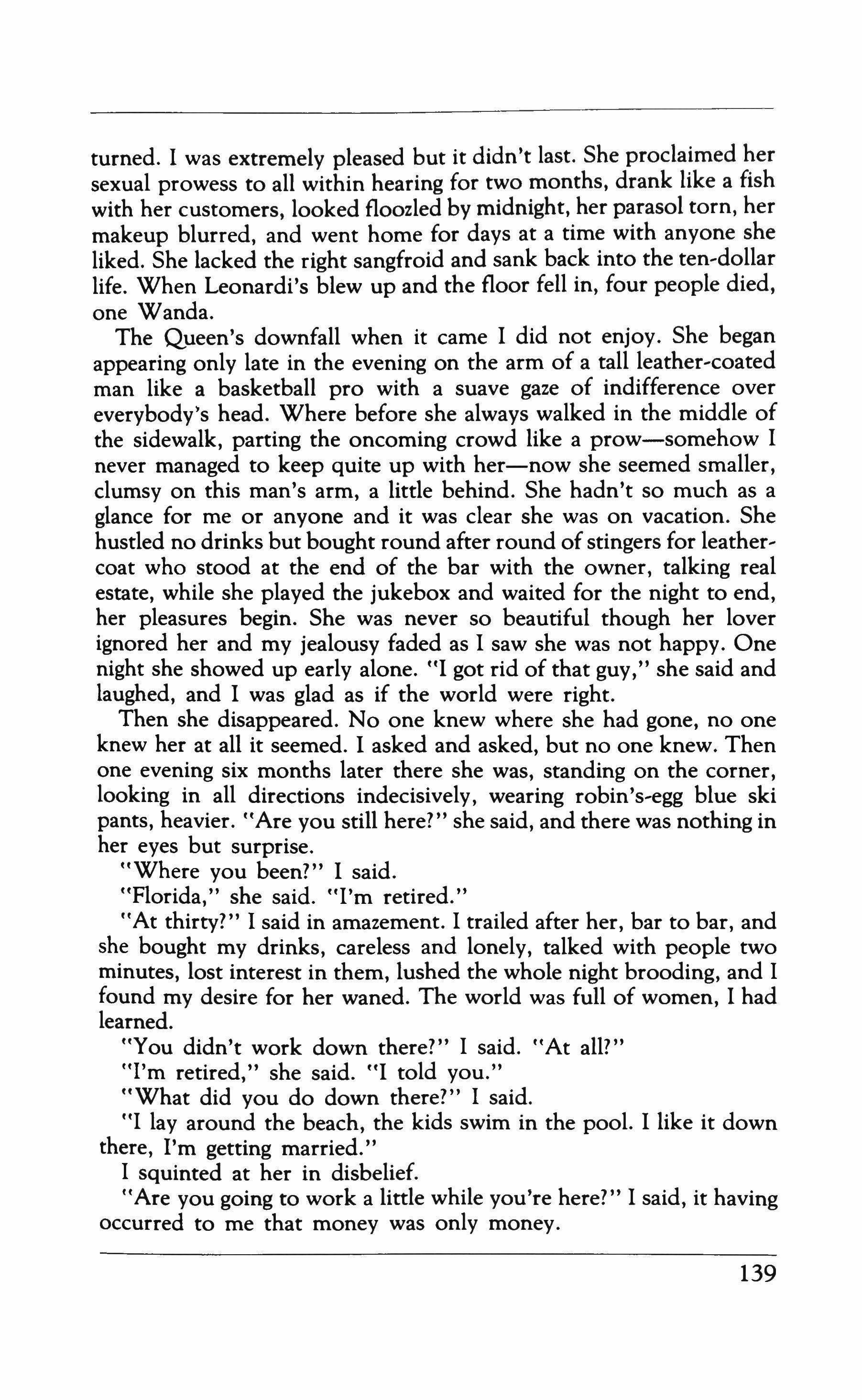
turned. I was extremely pleased but it didn't last. She proclaimed her sexual prowess to all within hearing for two months, drank like a fish with her customers, looked floozled by midnight, her parasol torn, her makeup blurred, and went home for days at a time with anyone she liked. She lacked the right sangfroid and sank back into the ten-dollar life. When Leonardi's blew up and the floor fell in, four people died, one Wanda.
The Queen's downfall when it came I did not enjoy. She began appearing only late in the evening on the arm of a tall leather-coated man like a basketball pro with a suave gaze of indifference over everybody's head. Where before she always walked in the middle of the sidewalk, parting the oncoming crowd like a prow-somehow I never managed to keep quite up with her-now she seemed smaller, clumsy on this man's arm, a little behind. She hadn't so much as a glance for me or anyone and it was clear she was on vacation. She hustled no drinks but bought round after round of stingers for leathercoat who stood at the end of the bar with the owner, talking real estate, while she played the jukebox and waited for the night to end, her pleasures begin. She was never so beautiful though her lover ignored her and my jealousy faded as I saw she was not happy. One night she showed up early alone. "I got rid of that guy," she said and laughed, and I was glad as if the world were right.
Then she disappeared. No one knew where she had gone, no one knew her at all it seemed. I asked and asked, but no one knew. Then one evening six months later there she was, standing on the corner, looking in all directions indecisively, wearing robin's-egg blue ski pants, heavier. "Are you still here?" she said, and there was nothing in her eyes but surprise.
"Where you been?" I said.
"Florida," she said. "I'm retired."
"At thirty?" I said in amazement. I trailed after her, bar to bar, and she bought my drinks, careless and lonely, talked with people two minutes, lost interest in them, lushed the whole night brooding, and I found my desire for her waned. The world was full of women, I had learned.
"You didn't work down there?" I said. "At am"
"I'm retired," she said. "I told you."
"What did you do down there?" I said.
"I lay around the beach, the kids swim in the pool. I like it down there, I'm getting married."
I squinted at her in disbelief.
"Are you going to work a little while you're here?" I said, it having occurred to me that money was only money.
139
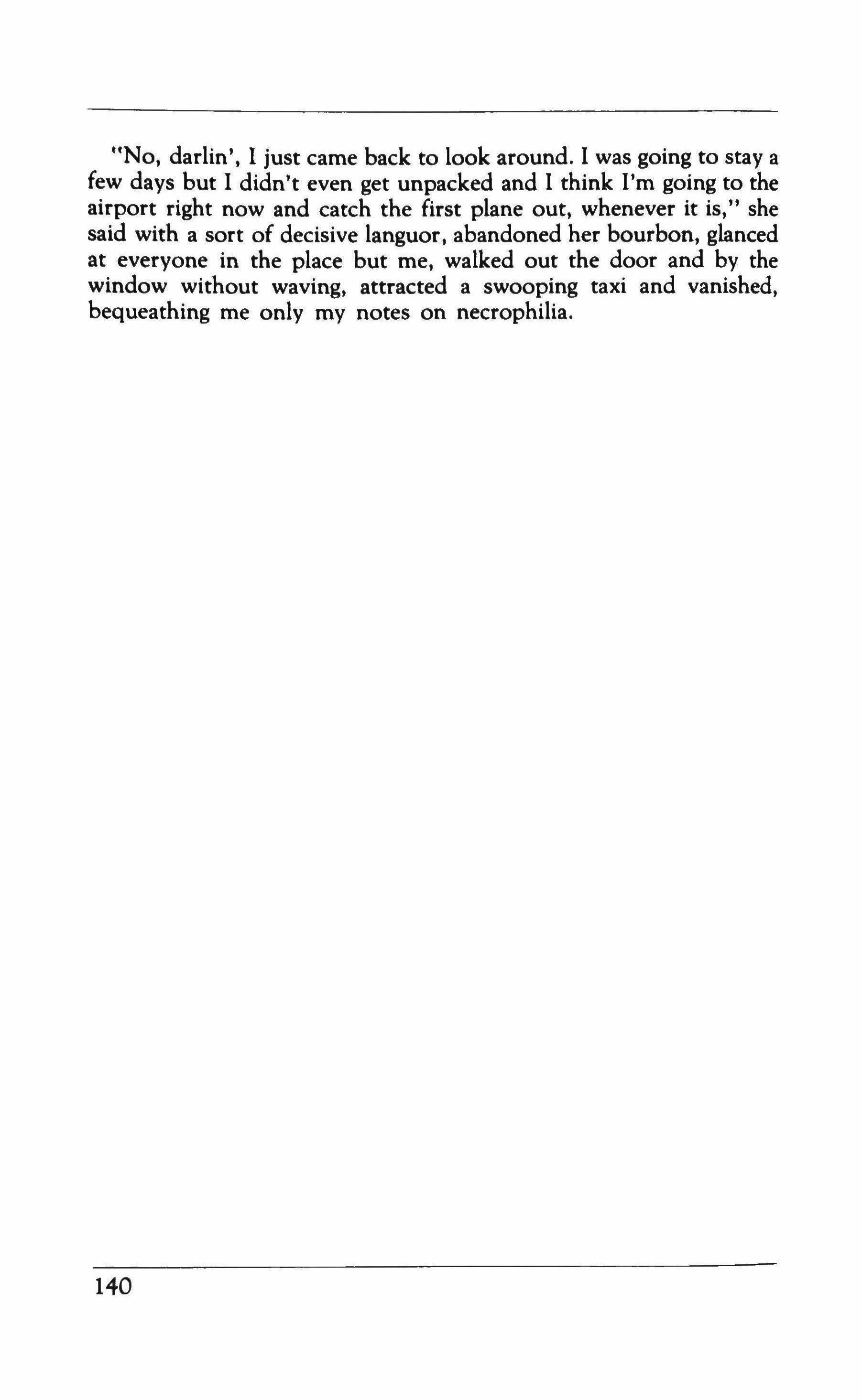
"No, darlin', I just came back to look around. I was going to stay a few days but I didn't even get unpacked and I think I'm going to the airport right now and catch the first plane out, whenever it is," she said with a sort of decisive languor, abandoned her bourbon, glanced at everyone in the place but me, walked out the door and by the window without waving, attracted a swooping taxi and vanished, bequeathing me only my notes on necrophilia.
140
Four poem.s
Bruce Weigl

Hope
Jack works in the pipe mill and is proud Of his job and of how lazy he can be
Once the day's work is done; How he can sleep between machines Or in the huge pyramids of pipe. His knuckles are torn. He drinks too much and hates Anybody who is not white. He married a woman who never left her home Town and stayed near the mother She fights on the phone every day.
They have two small boys and Jack loves them So fiercely it's frightening.
Jack says he'd kill for them and he smiles So you wonder why he thinks this, What kind of terror he must imagine To think he'd ever have to kill for his children.
His days are so often our nights And his nights our days he seems Like a zombie between shifts: off-track Or out of sync with the rest of us. He can be edgy on these days, wild, Slamming his fists at walls Or lashing the air with a bottle of beer. Other times he can be so tender,
141
As with his children in the evening
Curled up on his lap, scrubbed, whispering Their battle against sleep, and once
I watched him lift a dog from the highway. Howling, its hind legs crushed, The dog tried to reach around and bite Jack So Jack had to hold the dog's jaw
Closed with one hand
And with the other hand
Cradle the bloody thing against his chest
And carry it, dodging traffic, To the soft grass of the shoulder.
I waited in the car and watched.
Stunned by what he'd done Jack stumbled in the headlight spears Of cars tearing past too close. He'd saved a thing from dying as far as he could
And now he was lost.
He shook his fist at the traffic
And when I opened the door he screamed To get back in
And he reached down and strangled the dog.
What are you going to do he said, That dog didn't have no hope And he drove out of our way
To pass close to the mill
Night so you could see the gas flame up Blue and white from the low stacks of the open hearth. He breathed deeply and slowed
The car to a cruise as if The slag air revived him, as if The flaming steel and shitty little bars
And whores and steady drone and grind
Of a mile of industry
Were blood in his heart
And his heart needed blood.
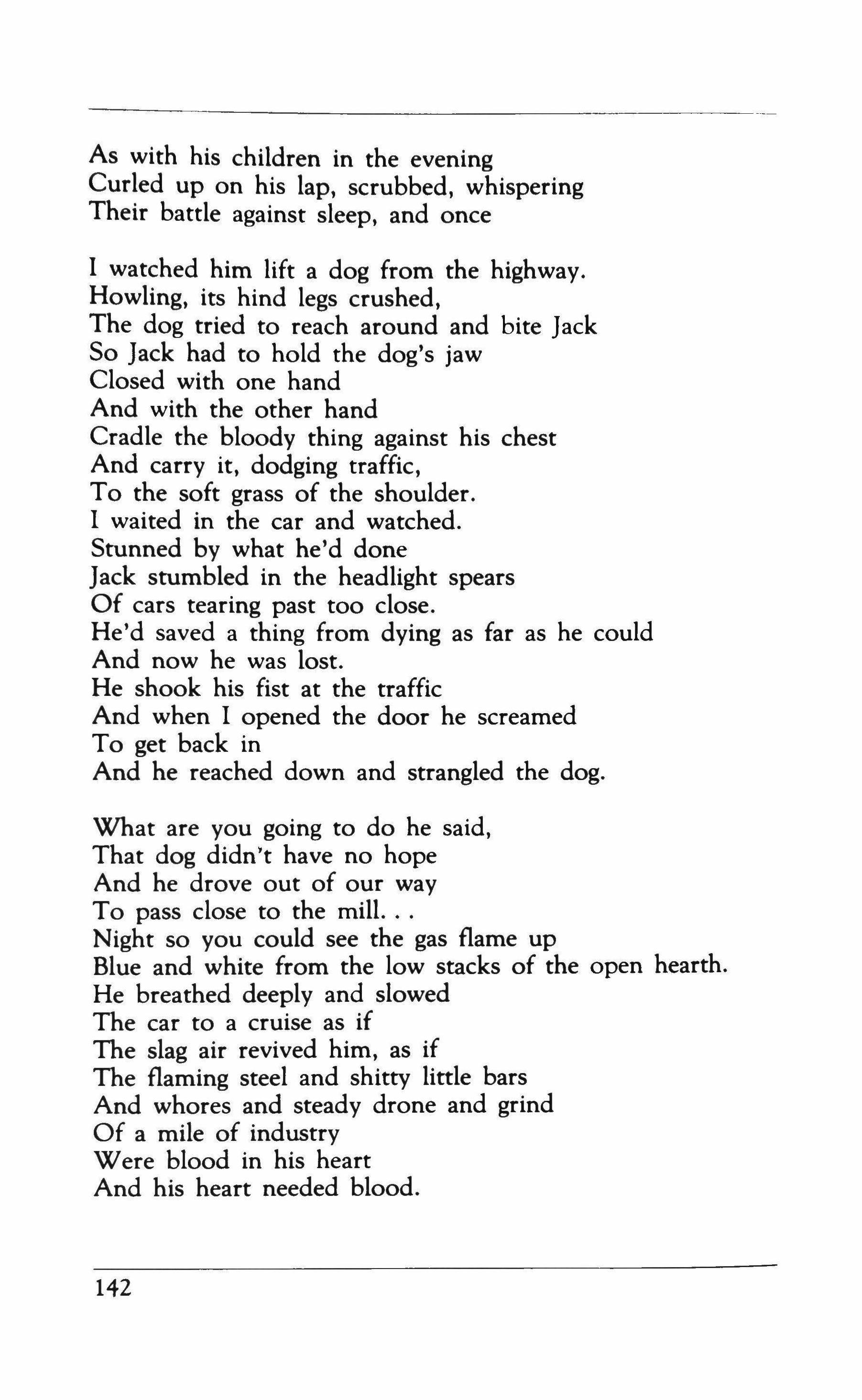
142
Sun
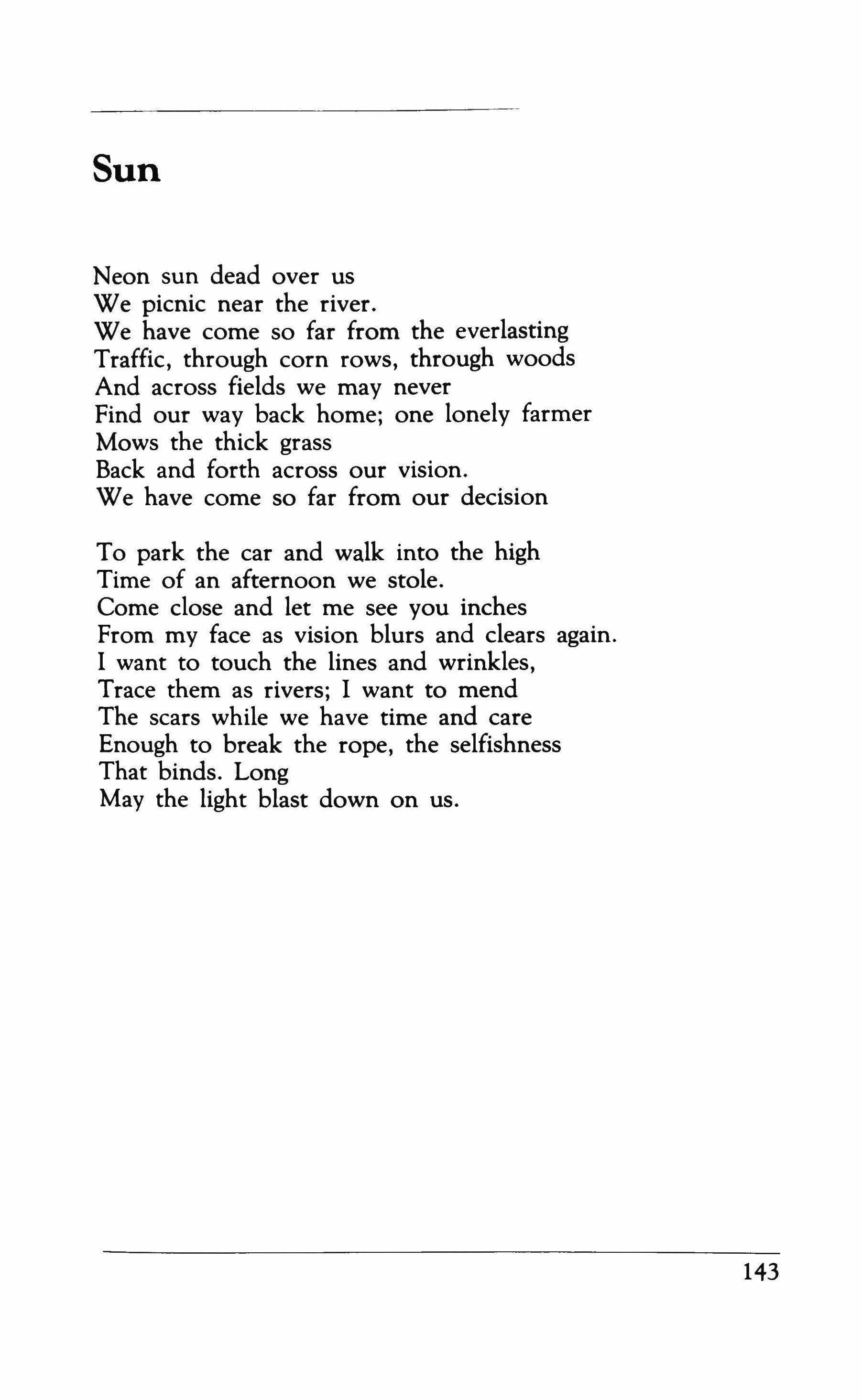
Neon sun dead over us
We picnic near the river. We have come so far from the everlasting Traffic, through corn rows, through woods And across fields we may never Find our way back home; one lonely farmer Mows the thick grass Back and forth across our vision. We have come so far from our decision
To park the car and walk into the high Time of an afternoon we stole. Come close and let me see you inches From my face as vision blurs and clears again. I want to touch the lines and wrinkles, Trace them as rivers; I want to mend The scars while we have time and care Enough to break the rope, the selfishness That binds. Long May the light blast down on us.
143
Song for a lost first cousin

You played Bach for your lover
Whom I heard in the background
Laugh when you whispered it was family calling. At both ends it rained and your voice
Strained through the wire
So cold and unfamiliar I couldn't tell you I remembered How we'd stripped: beautiful, naked Boys in the shower by the public beach. The skin where your suit had been was so white It burns my eyes to remember. Now we let go carelessly and the minutes Break open as eggs and when I try to speak I only stutter, only lie.
Long after our connection's broken
And you've turned away from me I still hold the phone to my ear
As if through the buzzing, static Pain your voice will break and you'll recall Those mornings, that confusion of love
Between the frightened boys we were Shivering, perched on the pier's edge, Oh can't you see us, our arms Wrapped around each other
Inside the white cocoon of the towel. But the line's gone dead and we can't Connect to touch and only the chill
Off the water comes as the rain stops And whitecaps rise and disappear as fish
And gulls dip their beaks
Into the lake and come up
Empty and dip again and again.
144
Song of napalm
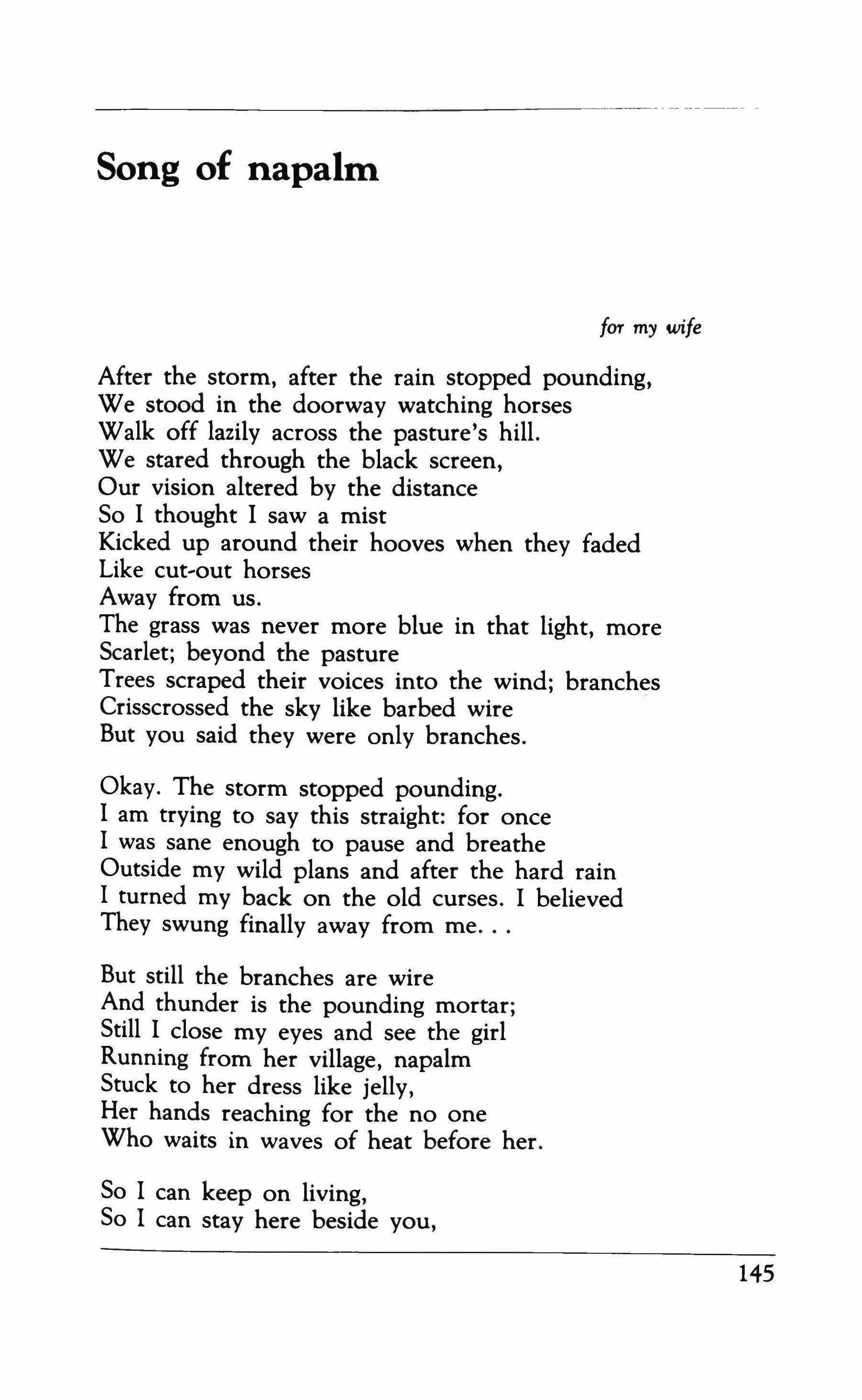
for my wife
After the storm, after the rain stopped pounding, We stood in the doorway watching horses Walk off lazily across the pasture's hill. We stared through the black screen, Our vision altered by the distance
So I thought I saw a mist Kicked up around their hooves when they faded Like cut-out horses Away from us.
The grass was never more blue in that light, more Scarlet; beyond the pasture Trees scraped their voices into the wind; branches Crisscrossed the sky like barbed wire
But you said they were only branches.
Okay. The storm stopped pounding. I am trying to say this straight: for once I was sane enough to pause and breathe Outside my wild plans and after the hard rain I turned my back on the old curses. I believed They swung finally away from me
But still the branches are wire And thunder is the pounding mortar; Still I close my eyes and see the girl Running from her village, napalm
Stuck to her dress like jelly, Her hands reaching for the no one Who waits in waves of heat before her.
So I can keep on living, So I can stay here beside you,
-----------------�
145
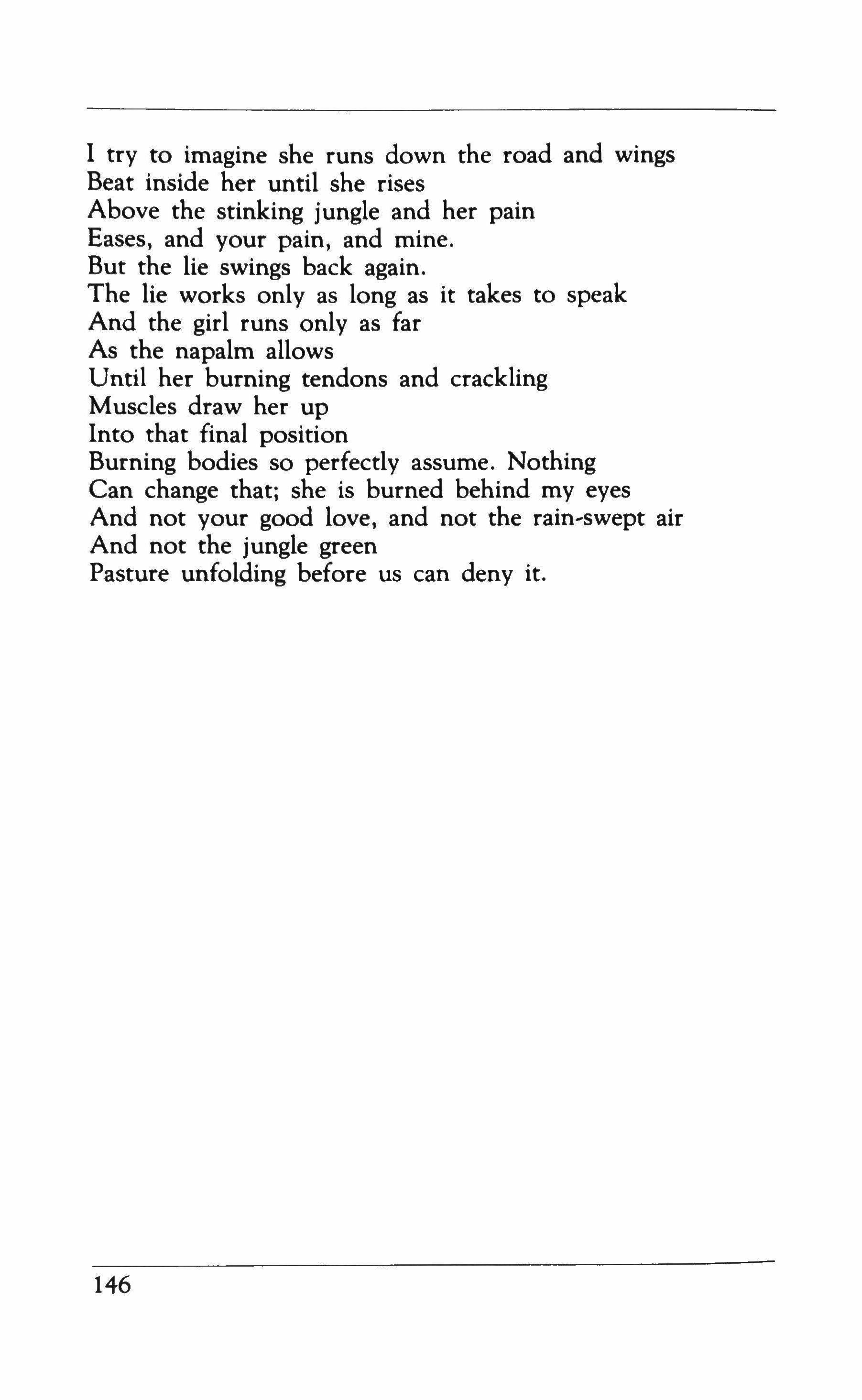
I try to imagine she runs down the road and wings
Beat inside her until she rises
Above the stinking jungle and her pain
Eases, and your pain, and mine. But the lie swings back again. The lie works only as long as it takes to speak And the girl runs only as far As the napalm allows
Until her burning tendons and crackling Muscles draw her up Into that final position
Burning bodies so perfectly assume. Nothing Can change that; she is burned behind my eyes
And not your good love, and not the rain-swept air
And not the jungle green
Pasture unfolding before us can deny it.
146
Four poems
Theodore Weiss
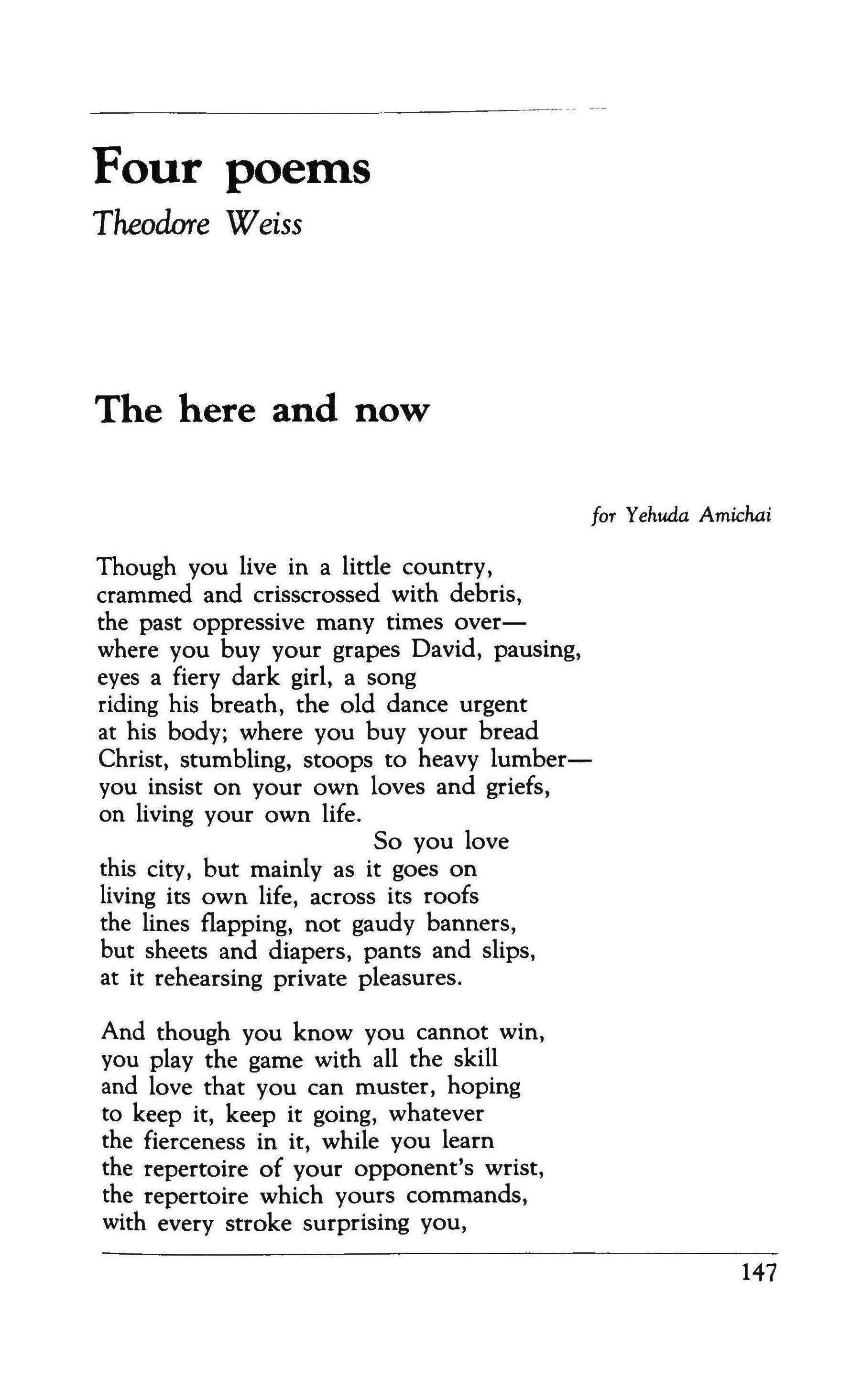
The here and now
Though you live in a little country, crammed and crisscrossed with debris, the past oppressive many times overwhere you buy your grapes David, pausing, eyes a fiery dark girl, a song riding his breath, the old dance urgent at his body; where you buy your bread Christ, stumbling, stoops to heavy lumberyou insist on your own loves and griefs, on living your own life.
So you love this city, but mainly as it goes on living its own life, across its roofs the lines flapping, not gaudy banners, but sheets and diapers, pants and slips, at it rehearsing private pleasures.
And though you know you cannot win, you play the game with all the skill and love that you can muster, hoping to keep it, keep it going, whatever the fierceness in it, while you learn the repertoire of your opponent's wrist, the repertoire which yours commands, with every stroke surprising you,
for Yehuda Amichai
147
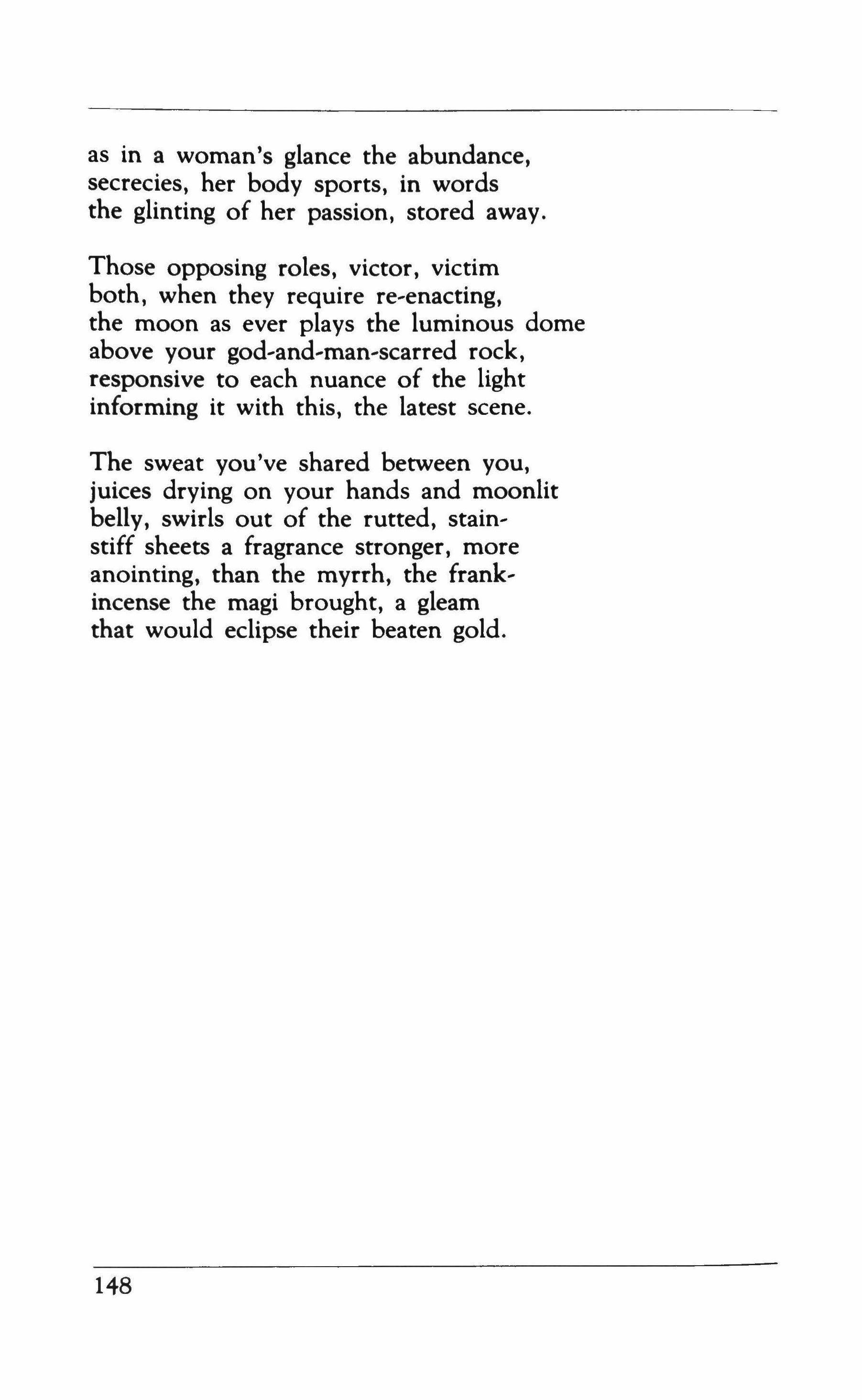
as in a woman's glance the abundance, secrecies, her body sports, in words the glinting of her passion, stored away.
Those opposing roles, victor, victim both, when they require re-enacting, the moon as ever plays the luminous dome above your god-and-man-scarred rock, responsive to each nuance of the light informing it with this, the latest scene.
The sweat you've shared between you, juices drying on your hands and moonlit belly, swirls out of the rutted, stain' stiff sheets a fragrance stronger, more anointing, than the myrrh, the frank, incense the magi brought, a gleam that would eclipse their beaten gold.
148
Earthrise
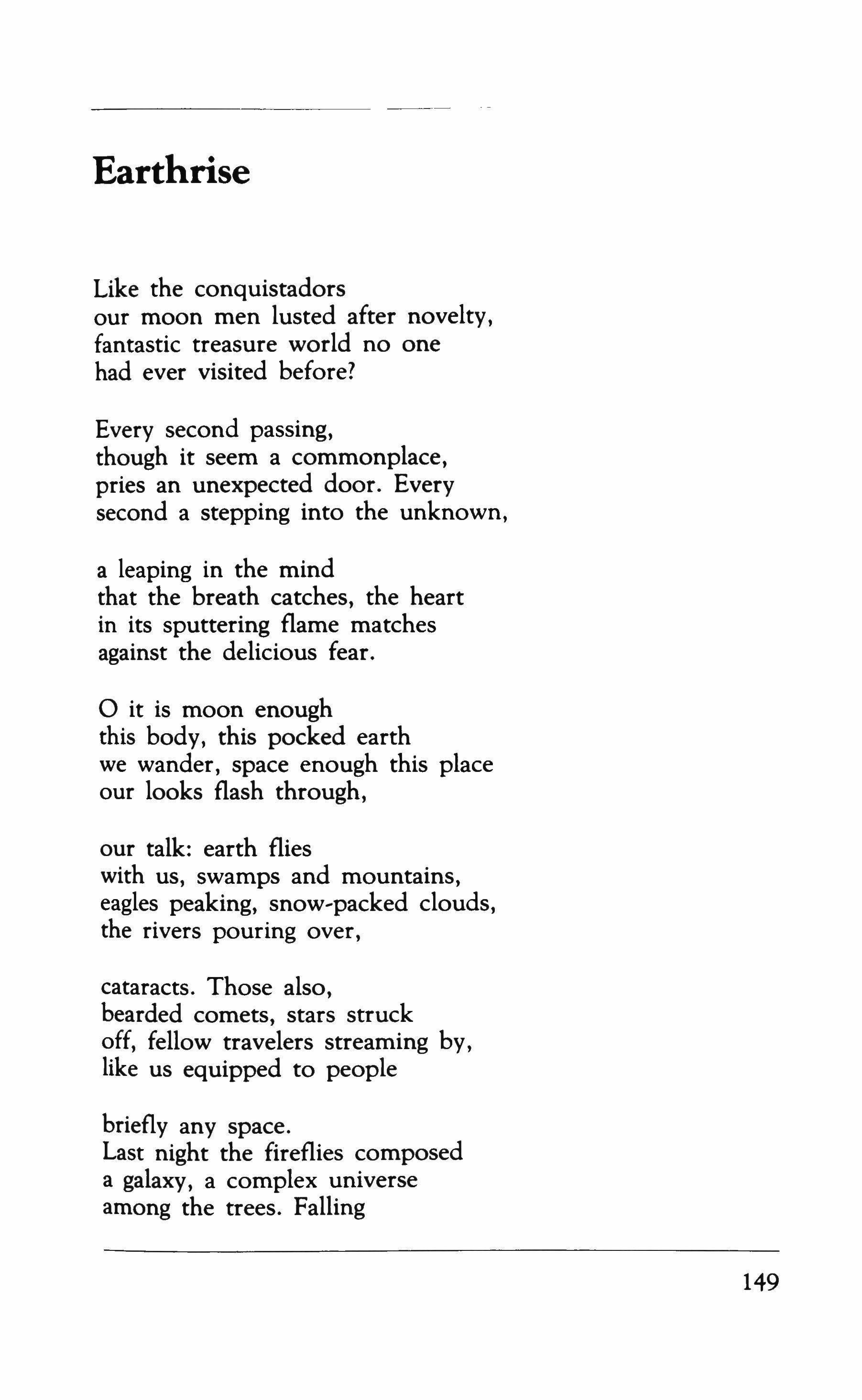
Like the conquistadors
our moon men lusted after novelty, fantastic treasure world no one had ever visited before?
Every second passing, though it seem a commonplace, pries an unexpected door. Every second a stepping into the unknown,
a leaping in the mind that the breath catches, the heart in its sputtering flame matches against the delicious fear.
o it is moon enough this body, this pocked earth we wander, space enough this place our looks flash through,
our talk: earth flies with us, swamps and mountains, eagles peaking, snow-packed clouds, the rivers pouring over,
cataracts. Those also, bearded comets, stars struck off, fellow travelers streaming by, like us equipped to people briefly any space. Last night the fireflies composed a galaxy, a complex universe among the trees. Falling
149
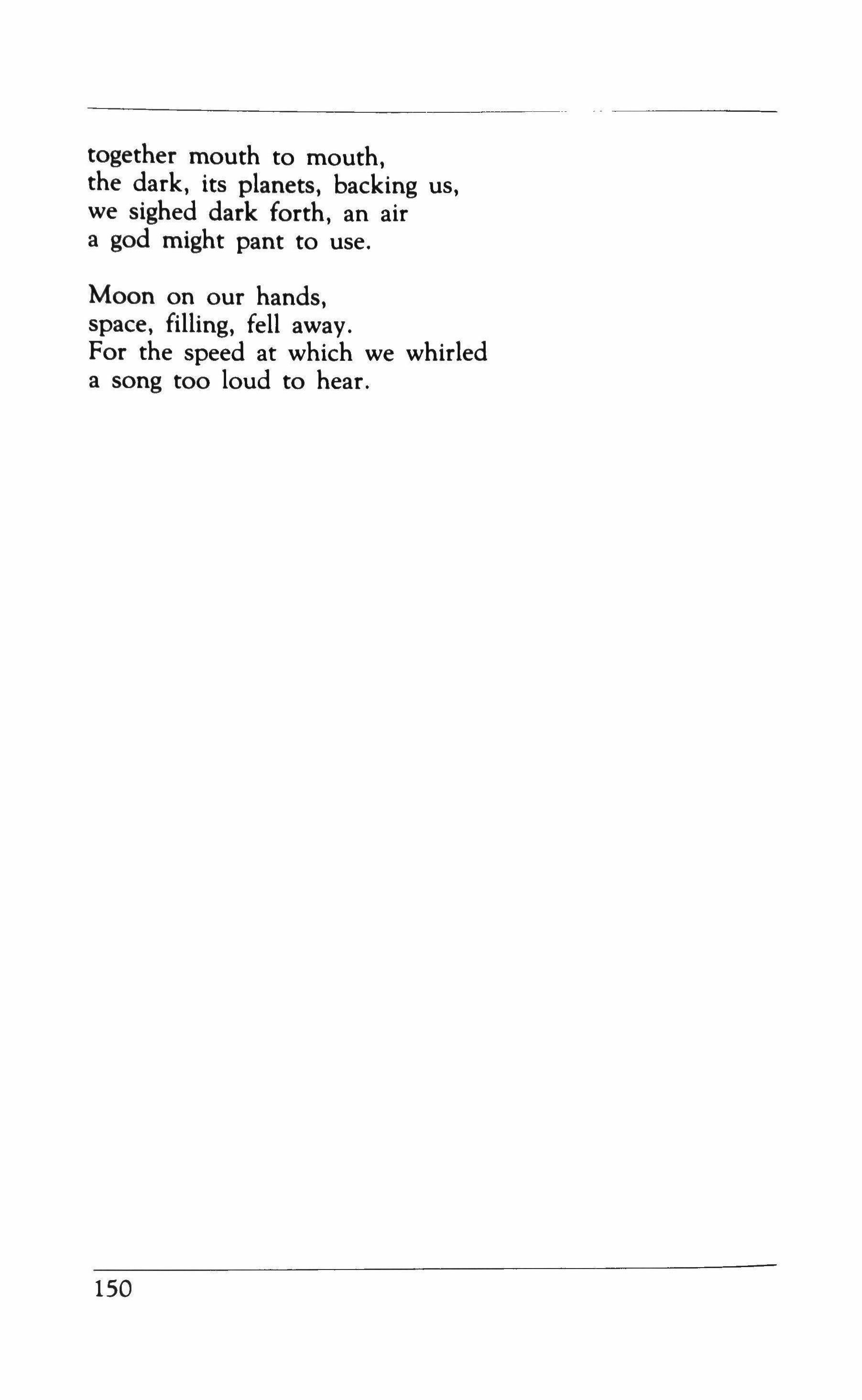
together mouth to mouth, the dark, its planets, backing us, we sighed dark forth, an air a god might pant to use.
Moon on our hands, space, filling, fell away. For the speed at which we whirled a song too loud to hear.
150
The death of fathers
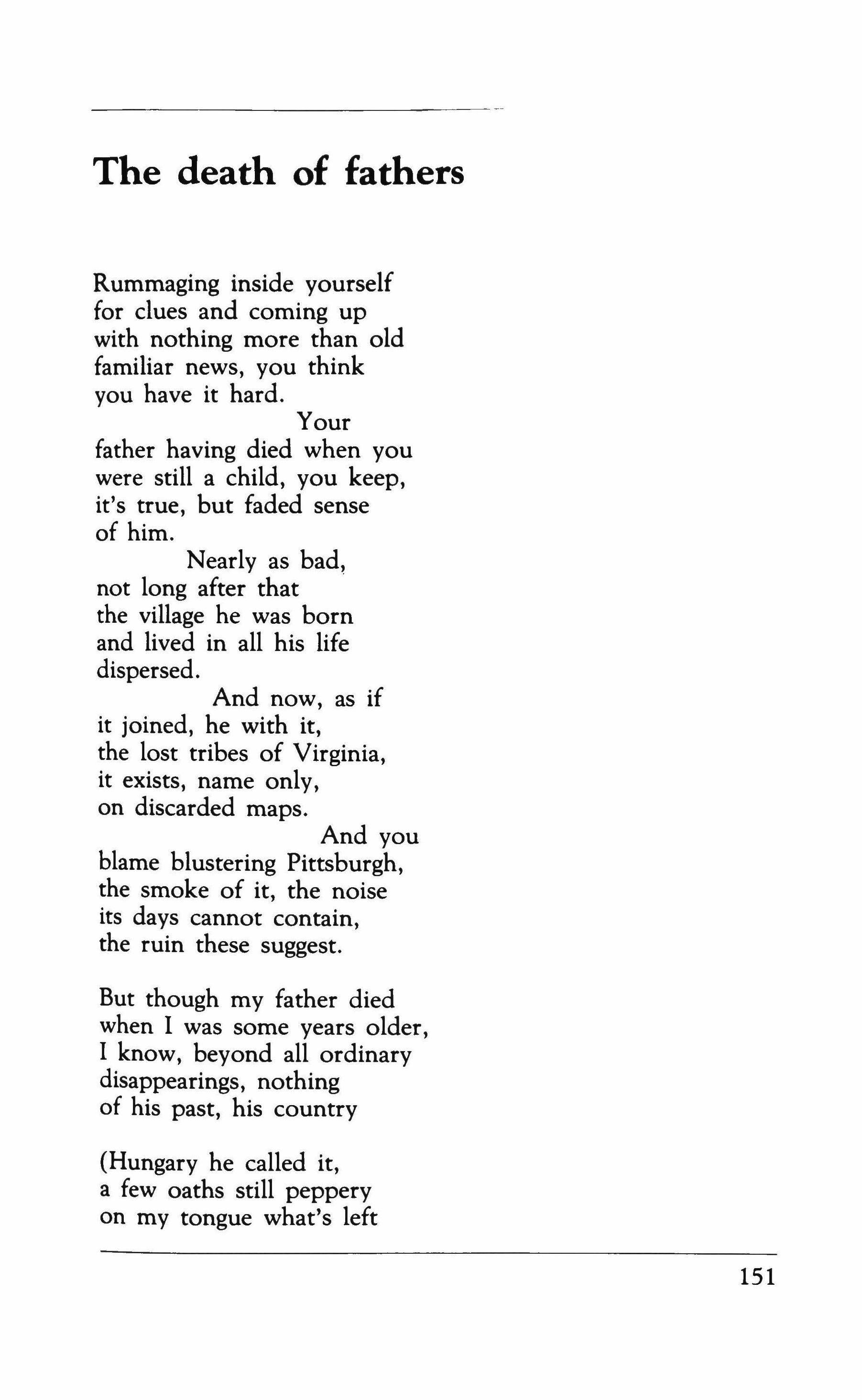
Rummaging inside yourself for clues and coming up with nothing more than old familiar news, you think you have it hard.
Your father having died when you were still a child, you keep, it's true, but faded sense of him.
Nearly as bad, not long after that the village he was born and lived in all his life dispersed. And now, as if it joined, he with it, the lost tribes of Virginia, it exists, name only, on discarded maps.
And you blame blustering Pittsburgh, the smoke of it, the noise its days cannot contain, the ruin these suggest.
But though my father died when I was some years older, I know, beyond all ordinary disappearings, nothing of his past, his country
(Hungary he called it, a few oaths still peppery on my tongue what's left
151
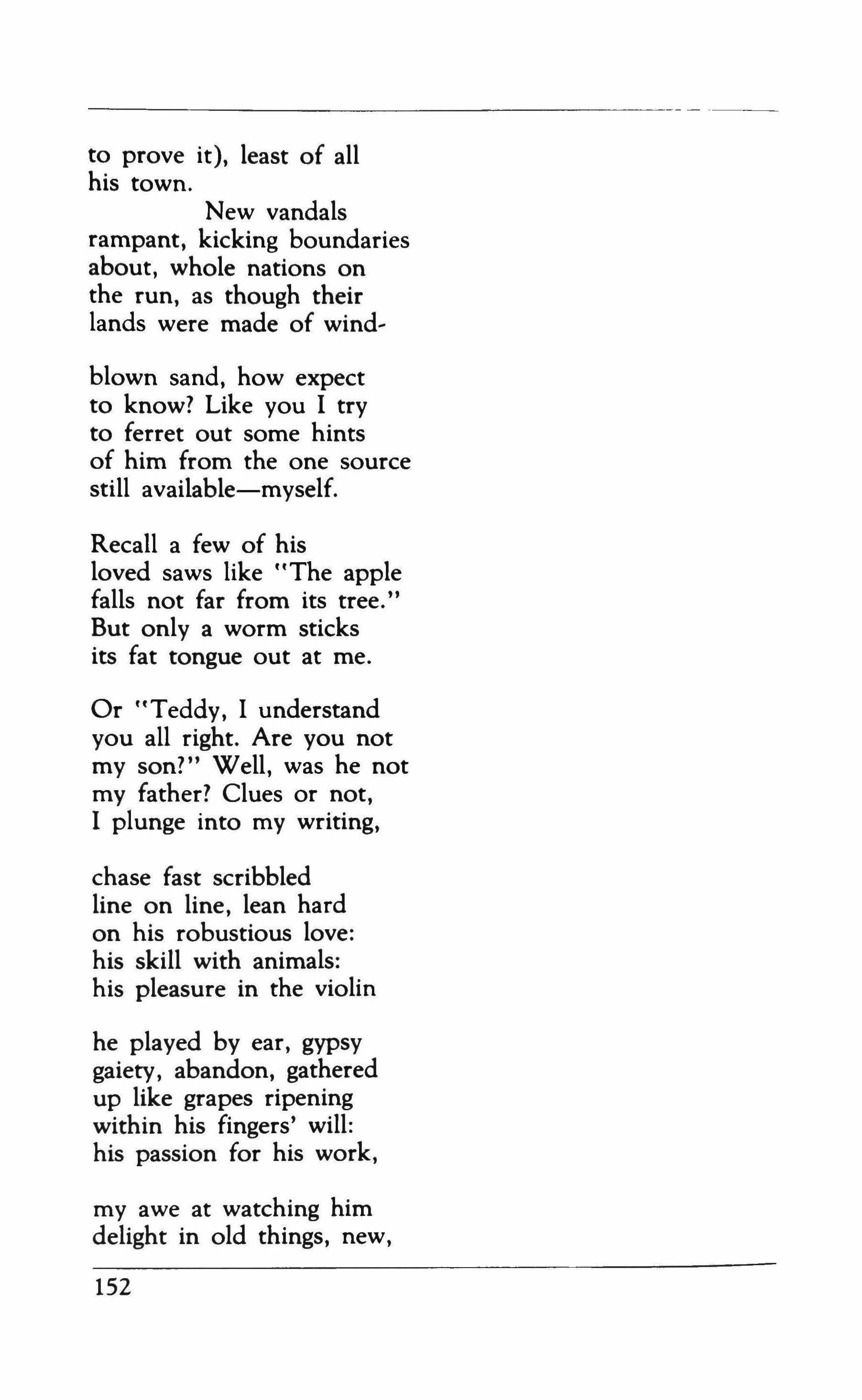
to prove it), least of all his town.
New vandals rampant, kicking boundaries about, whole nations on the run, as though their lands were made of wind, blown sand, how expect to know? Like you I try to ferret out some hints of him from the one source still available-myself.
Recall a few of his loved saws like "The apple falls not far from its tree." But only a worm sticks its fat tongue out at me.
Or "Teddy, I understand you all right. Are you not my son?" Well, was he not my father? Clues or not, I plunge into my writing,
chase fast scribbled line on line, lean hard on his robustious love: his skill with animals: his pleasure in the violin he played by ear, gypsy gaiety, abandon, gathered up like grapes ripening within his fingers' will: his passion for his work, my awe at watching him delight in old things, new.
152
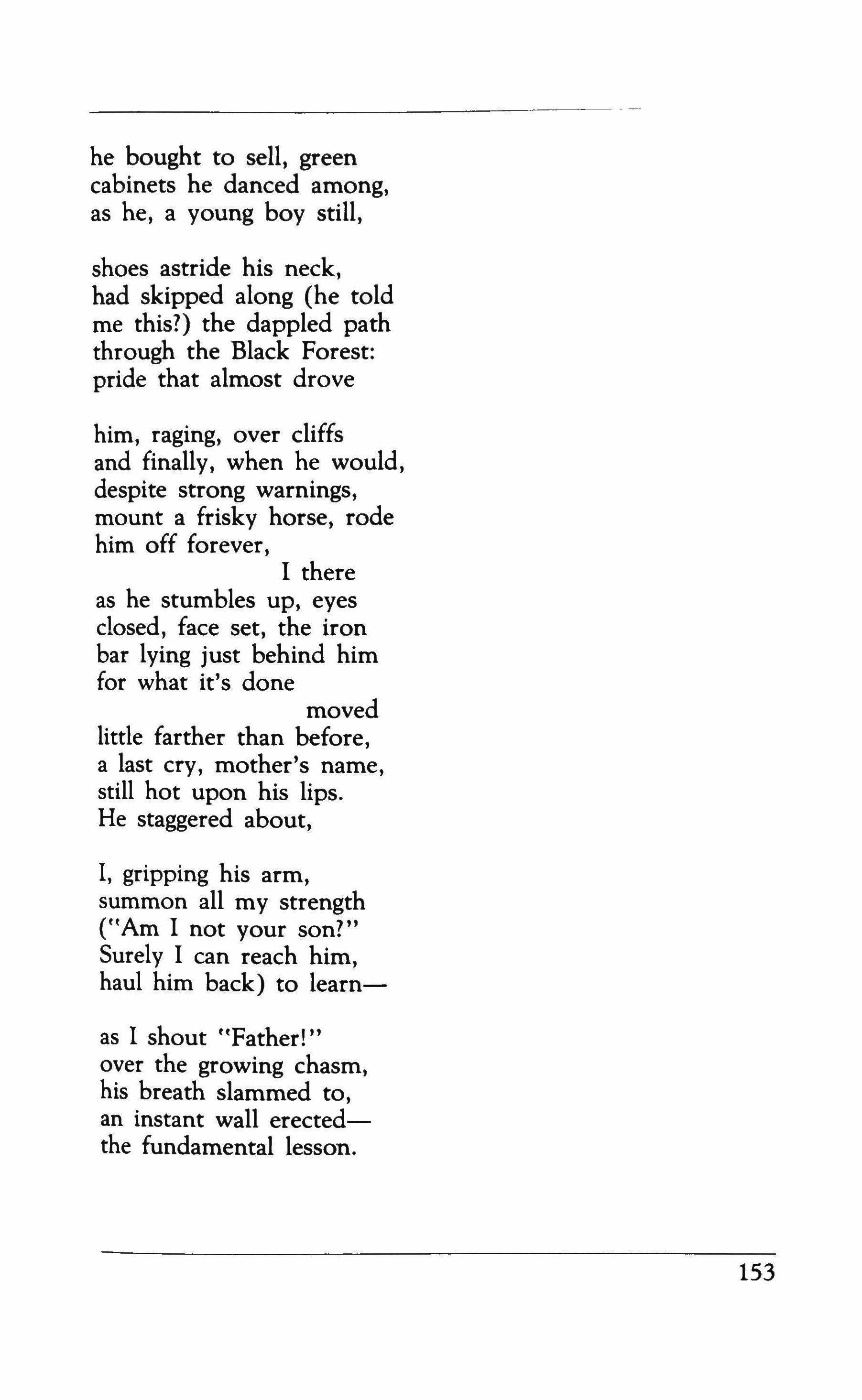
he bought to sell, green cabinets he danced among, as he, a young boy still,
shoes astride his neck, had skipped along (he told me this?) the dappled path through the Black Forest: pride that almost drove him, raging, over cliffs and finally, when he would, despite strong warnings, mount a frisky horse, rode him off forever,
I there as he stumbles up, eyes closed, face set, the iron bar lying just behind him for what it's done moved little farther than before, a last cry, mother's name, still hot upon his lips. He staggered about,
I, gripping his arm, summon all my strength ("Am I not your son?" Surely I can reach him, haul him back) to learn-
as I shout "Father!" over the growing chasm, his breath slammed to, an instant wall erectedthe fundamental lesson.
153
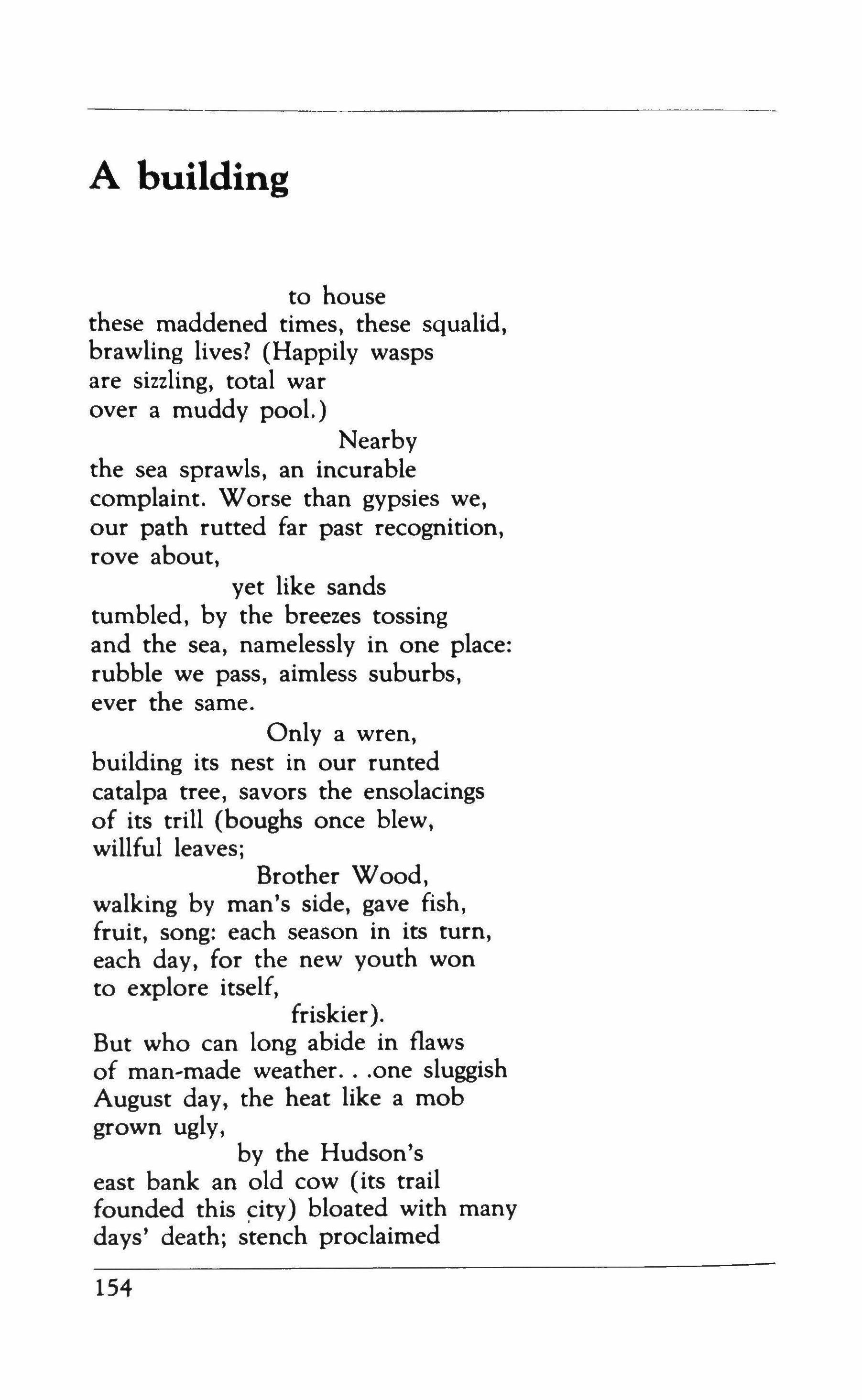
Abuilding to house these maddened times, these squalid, brawling lives? (Happily wasps are sizzling, total war over a muddy pool.)
Nearby the sea sprawls, an incurable complaint. Worse than gypsies we, our path rutted far past recognition, rove about, yet like sands tumbled, by the breezes tossing and the sea, namelessly in one place: rubble we pass, aimless suburbs, ever the same.
Only a wren, building its nest in our runted catalpa tree, savors the ensolacings of its trill (boughs once blew, willful leaves; Brother Wood, walking by man's side, gave fish, fruit, song: each season in its turn, each day, for the new youth won to explore itself, friskier).
But who can long abide in flaws of man-made weather one sluggish August day, the heat like a mob grown ugly, by the Hudson's east bank an old cow (its trail founded this city) bloated with many days' death; s'tench proclaimed
154
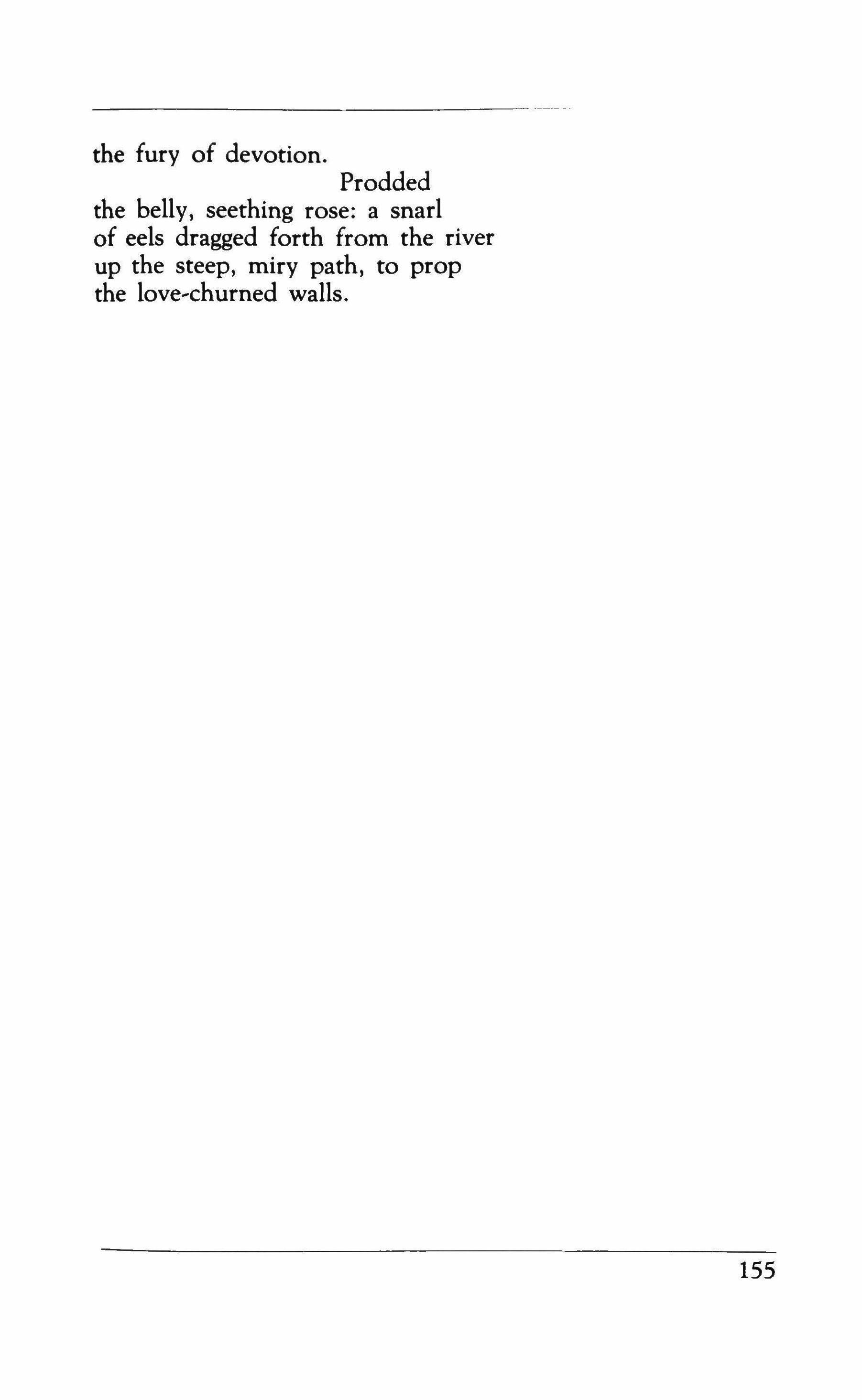
the fury of devotion.
Prodded the belly, seething rose: a snarl of eels dragged forth from the river up the steep, miry path, to prop the love-churned walls.
155
The power
Joe Taylor
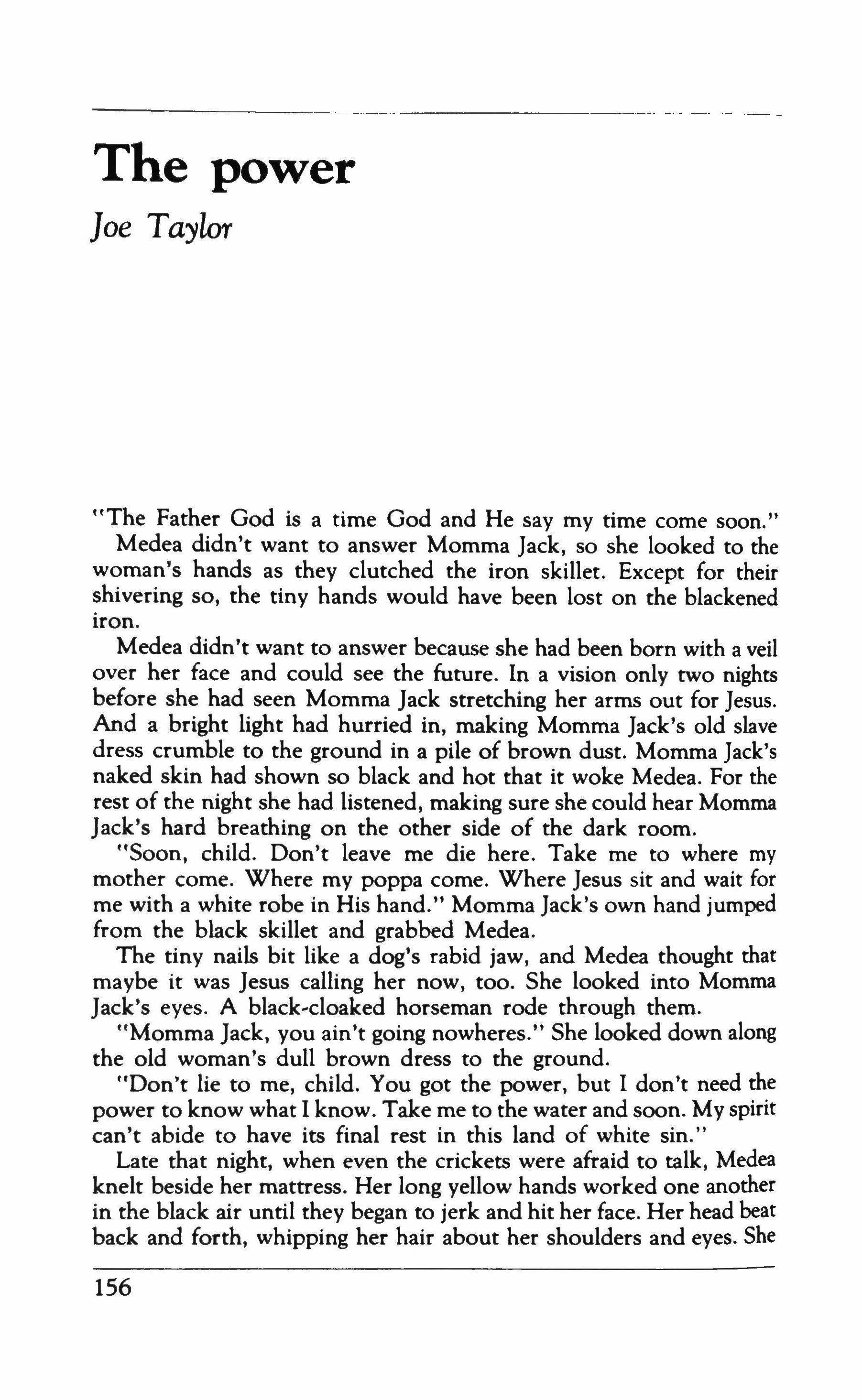
"The Father God is a time God and He say my time come soon."
Medea didn't want to answer Momma Jack, so she looked to the woman's hands as they clutched the iron skillet. Except for their shivering so, the tiny hands would have been lost on the blackened iron.
Medea didn't want to answer because she had been born with a veil over her face and could see the future. In a vision only two nights before she had seen Momma Jack stretching her arms out for Jesus. And a bright light had hurried in, making Momma Jack's old slave dress crumble to the ground in a pile of brown dust. Momma Jack's naked skin had shown so black and hot that it woke Medea. For the rest of the night she had listened, making sure she could hear Momma Jack's hard breathing on the other side of the dark room.
"Soon, child. Don't leave me die here. Take me to where my mother come. Where my poppa come. Where Jesus sit and wait for me with a white robe in His hand." Momma Jack's own hand jumped from the black skillet and grabbed Medea.
The tiny nails bit like a dog's rabid jaw, and Medea thought that maybe it was Jesus calling her now, too. She looked into Momma Jack's eyes. A black-cloaked horseman rode through them.
"Momma Jack, you ain't going nowheres." She looked down along the old woman's dull brown dress to the ground.
"Don't lie to me, child. You got the power, but I don't need the power to know what I know Take me to the water and soon. My spirit can't abide to have its final rest in this land of white sin."
Late that night, when even the crickets were afraid to talk, Medea knelt beside her mattress. Her long yellow hands worked one another in the black air until they began to jerk and hit her face. Her head beat back and forth, whipping her hair about her shoulders and eyes. She
156
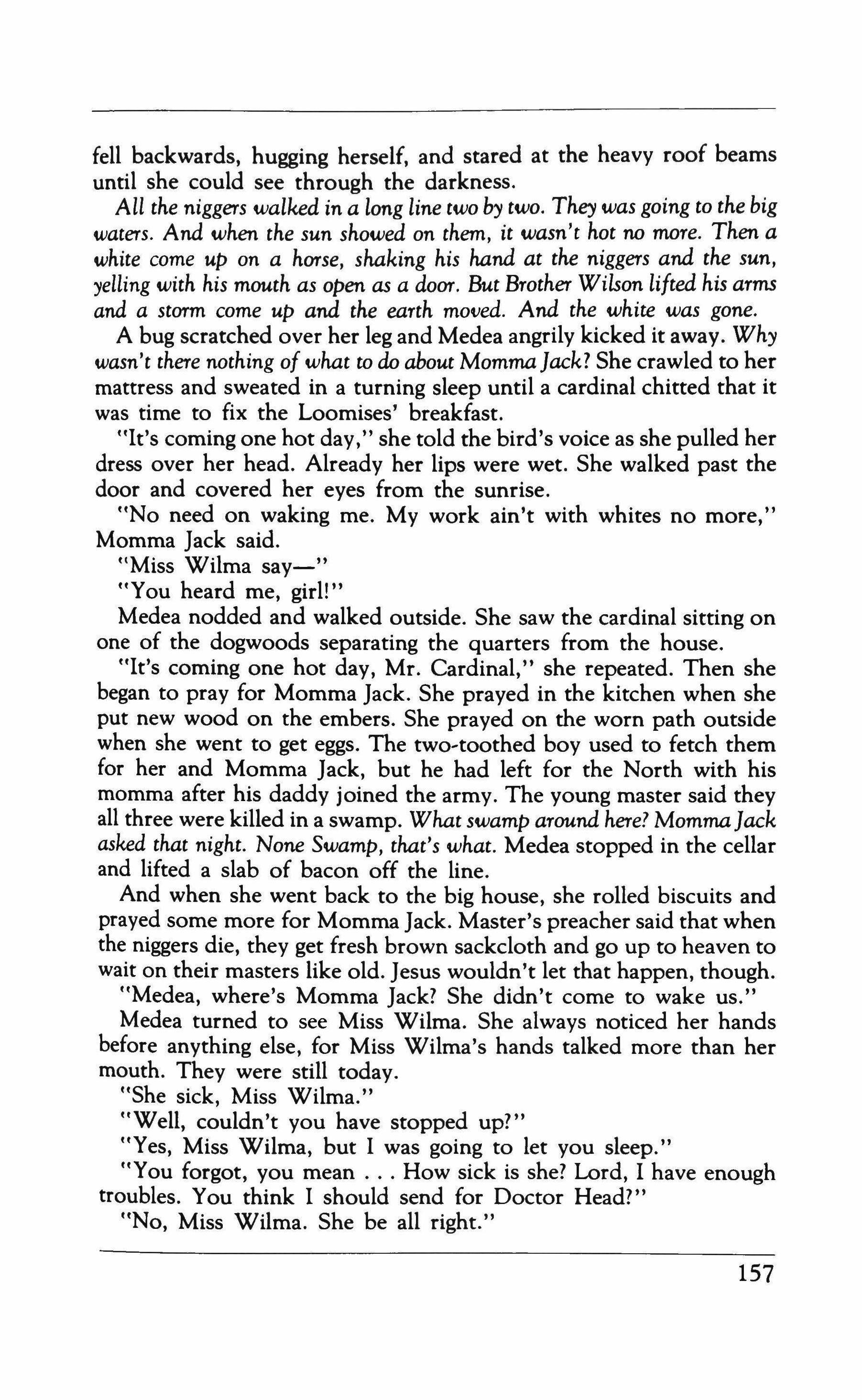
fell backwards, hugging herself, and stared at the heavy roof beams until she could see through the darkness.
All the niggers walked in a long line two by two. They was going to the big waters. And when the sun showed on them, it wasn't hot no more. Then a white come up on a horse, shaking his hand at the niggers and the sun, yelling with his mouth as open as a door. But Brother Wilson lifted his arms and a storm come up and the earth moved. And the white was gone.
A bug scratched over her leg and Medea angrily kicked it away. Why wasn't there nothing of what to do about MommaJack? She crawled to her mattress and sweated in a turning sleep until a cardinal chitted that it was time to fix the Loomises' breakfast.
"It's coming one hot day," she told the bird's voice as she pulled her dress over her head. Already her lips were wet. She walked past the door and covered her eyes from the sunrise.
"No need on waking me. My work ain't with whites no more," Momma Jack said.
"Miss Wilma say-"
"You heard me, girl!"
Medea nodded and walked outside. She saw the cardinal sitting on one of the dogwoods separating the quarters from the house.
"It's coming one hot day, Mr. Cardinal," she repeated. Then she began to pray for Momma Jack. She prayed in the kitchen when she put new wood on the embers. She prayed on the worn path outside when she went to get eggs. The two'toothed boy used to fetch them for her and Momma Jack, but he had left for the North with his momma after his daddy joined the army. The young master said they all three were killed in a swamp. What swamp around here? MommaJack asked that night. None Swamp, that's what. Medea stopped in the cellar and lifted a slab of bacon off the line.
And when she went back to the big house, she rolled biscuits and prayed some more for Momma Jack. Master's preacher said that when the niggers die, they get fresh brown sackcloth and go up to heaven to wait on their masters like old. Jesus wouldn't let that happen, though.
"Medea, where's Momma Jack? She didn't come to wake us."
Medea turned to see Miss Wilma. She always noticed her hands before anything else, for Miss Wilma's hands talked more than her mouth. They were still today.
"She sick, Miss Wilma."
"Well, couldn't you have stopped up?"
"Yes, Miss Wilma, but I was going to let you sleep."
"You forgot, you mean How sick is she? Lord, I have enough troubles. You think I should send for Doctor Head?"
"No, Miss Wilma. She be all right."
157
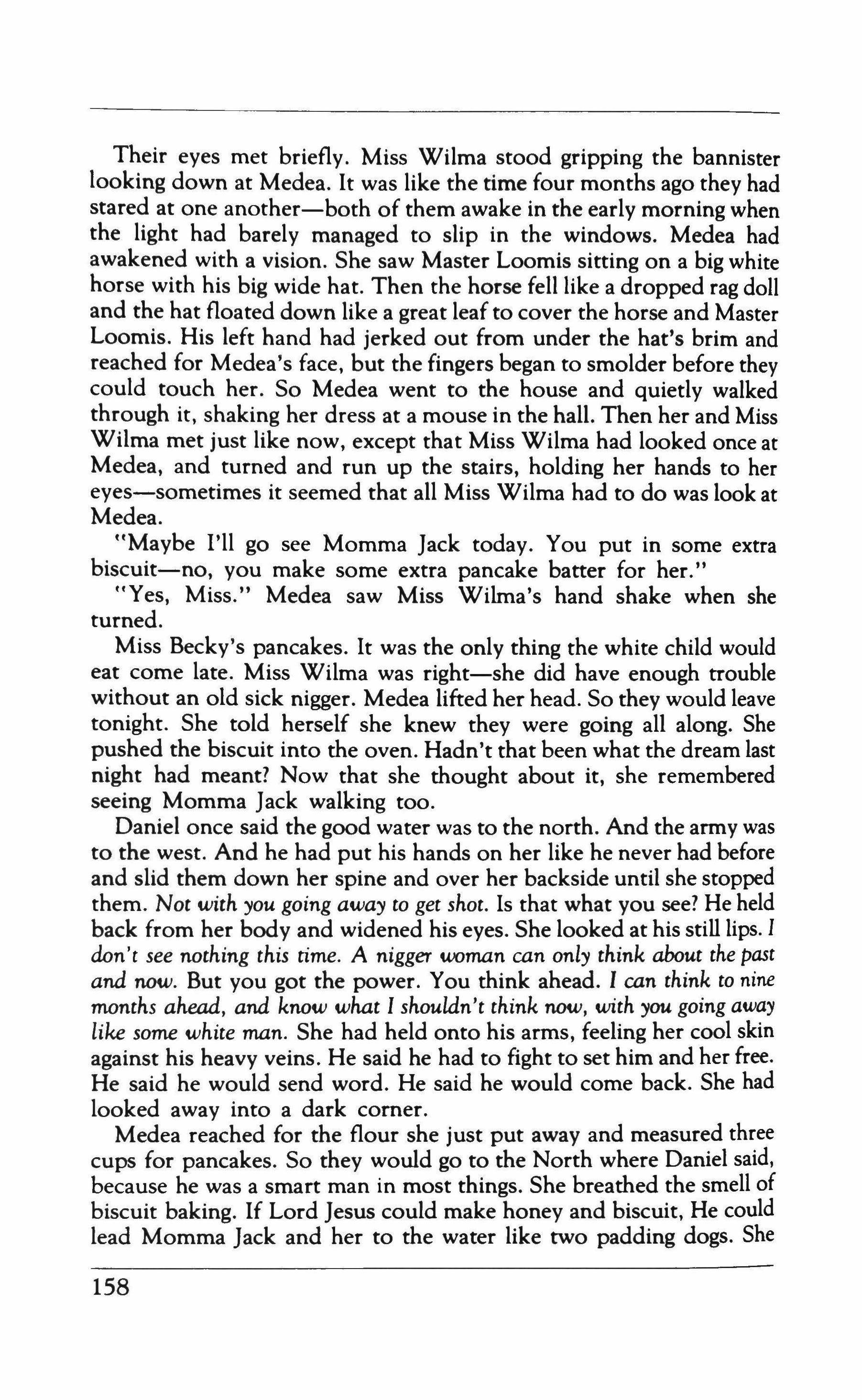
Their eyes met briefly. Miss Wilma stood gripping the bannister looking down at Medea. It was like the time four months ago they had stared at one another-both of them awake in the early morning when the light had barely managed to slip in the windows. Medea had awakened with a vision. She saw Master Loomis sitting on a big white horse with his big wide hat. Then the horse fell like a dropped rag doll and the hat floated down like a great leaf to cover the horse and Master Loomis. His left hand had jerked out from under the hat's brim and reached for Medea's face, but the fingers began to smolder before they could touch her. So Medea went to the house and quietly walked through it, shaking her dress at a mouse in the hall. Then her and Miss Wilma met just like now, except that Miss Wilma had looked once at Medea, and turned and run up the stairs, holding her hands to her eyes-sometimes it seemed that all Miss Wilma had to do was look at Medea.
"Maybe I'll go see Momma Jack today. You put in some extra biscuit-no, you make some extra pancake batter for her."
"Yes, Miss." Medea saw Miss Wilma's hand shake when she turned.
Miss Becky's pancakes. It was the only thing the white child would eat corne late. Miss Wilma was right-she did have enough trouble without an old sick nigger. Medea lifted her head. So they would leave tonight. She told herself she knew they were going all along. She pushed the biscuit into the oven. Hadn't that been what the dream last night had meant? Now that she thought about it, she remembered seeing Momma Jack walking too.
Daniel once said the good water was to the north. And the army was to the west. And he had put his hands on her like he never had before and slid them down her spine and over her backside until she stopped them. Not with you going away to get shot. Is that what you see? He held back from her body and widened his eyes. She looked at his still lips. I don't see nothing this time. A nigger woman can only think about the past and now. But you got the power. You think ahead. I can think to nine months ahead, and know what I shouldn't think now, with you going away like some white man. She had held onto his arms, feeling her cool skin against his heavy veins. He said he had to fight to set him and her free. He said he would send word. He said he would corne back. She had looked away into a dark comer.
Medea reached for the flour she just put away and measured three cups for pancakes. So they would go to the North where Daniel said, because he was a smart man in most things. She breathed the smell of biscuit baking. If Lord Jesus could make honey and biscuit, He could lead Momma Jack and her to the water like two padding dogs. She
158
thought of Daniel's big feet and cracked completely through an egg, leaving half of it to spill over the side of the bowl.
That evening, when Medea went to the quarters, Momma Jack was still in bed. In the twilight, Medea could only see one tiny bump under the cover.
"I am resting for my journey to Jesus."
Medea pulled a thin slab of dried beef from under her dress and grinned. "Young Master said you might need this."
"I am resting for my journey to Jesus."
Medea dropped the beef on the table and went to the older woman. She reached for her cheek, but Momma Jack's hand grabbed hers, leaving it wet with fever.
"Take me, Jesus!"
"Tonight, we go tonight."
Momma Jack focused on Medea's face, then relaxed her grip. She stood and walked to a corner of the room which was littered with the belongings of the three house niggers who had already left. She pointed a finger to the molding patchwork and Medea looked under it. There were two knotted and rolled sheets.
"Miss Wilma come today." Momma Jack undid one of the sheets. Inside it were biscuits, a jar of molasses, and two torn pages from the Bible. Momma Jack had owned these last ever since Medea could remember. Momma Jack pointed to the biscuits.
"She know," Medea said.
"She don't need niggers no more. She need the help of the Lord."
Medea nodded and went for the meat on the table. Re-tying her sheet after putting the meat in, she turned to see the old woman standing with a pair of sheep's shears.
"What for?" Medea pressed against her hair with both hands.
"To keep the white man's eyes in his own yard, yellow girl."
They sat away from the door, staring through a chink in the wall, waiting for the last lantern to go out in the house. Medea held her near-bare head while Momma Jack hummed.
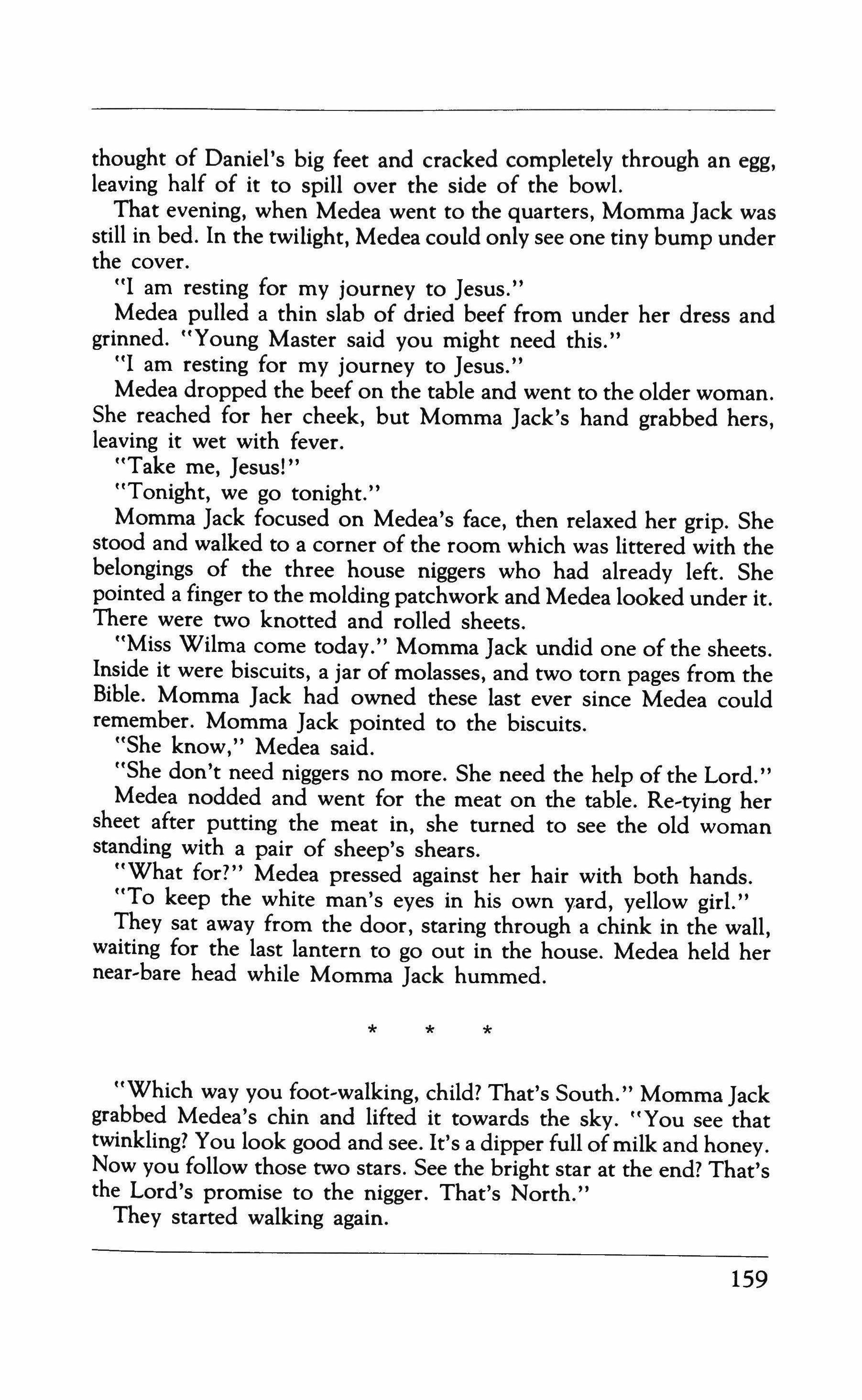
"Which way you foot-walking, child? That's South." Momma Jack grabbed Medea's chin and lifted it towards the sky. "You see that twinkling? You look good and see. It's a dipper full of milk and honey. Now you follow those two stars. See the bright star at the end? That's the Lord's promise to the nigger. That's North." They started walking again.
* * *
159
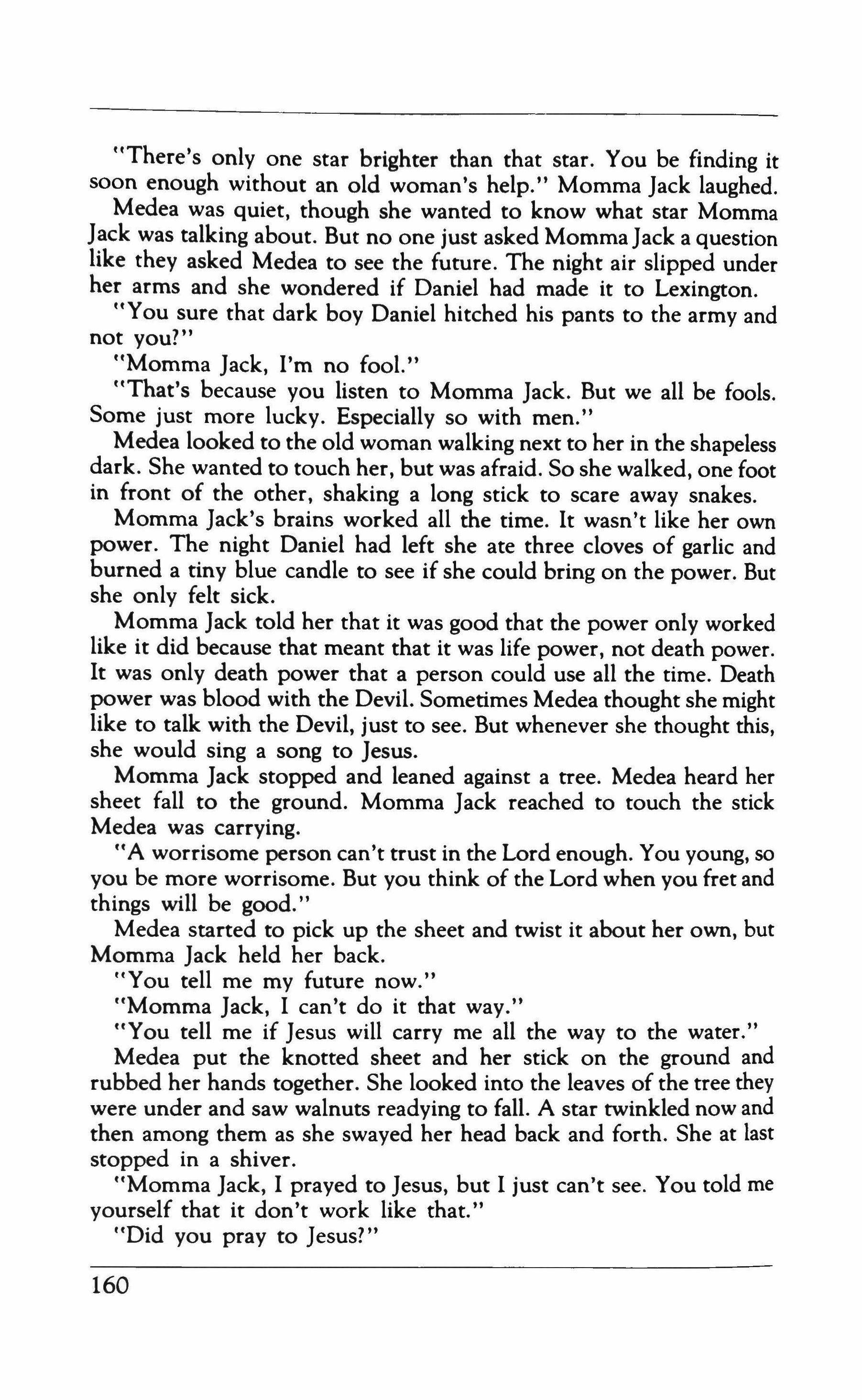
"There's only one star brighter than that star. You be finding it soon enough without an old woman's help." Momma Jack laughed.
Medea was quiet, though she wanted to know what star Momma Jack was talking about. But no one just asked Momma Jack a question like they asked Medea to see the future. The night air slipped under her arms and she wondered if Daniel had made it to Lexington.
"You sure that dark boy Daniel hitched his pants to the army and not you?"
"Momma Jack, I'm no fool."
"That's because you listen to Momma Jack. But we all be fools. Some just more lucky. Especially so with men."
Medea looked to the old woman walking next to her in the shapeless dark. She wanted to touch her, but was afraid. So she walked, one foot in front of the other, shaking a long stick to scare away snakes.
Momma Jack's brains worked all the time. It wasn't like her own power. The night Daniel had left she ate three cloves of garlic and burned a tiny blue candle to see if she could bring on the power. But she only felt sick.
Momma Jack told her that it was good that the power only worked like it did because that meant that it was life power, not death power. It was only death power that a person could use all the time. Death power was blood with the Devil. Sometimes Medea thought she might like to talk with the Devil, just to see. But whenever she thought this, she would sing a song to Jesus.
Momma Jack stopped and leaned against a tree. Medea heard her sheet fall to the ground. Momma Jack reached to touch the stick Medea was carrying.
"A worrisome person can't trust in the Lord enough. You young, so you be more worrisome. But you think of the Lord when you fret and things will be good."
Medea started to pick up the sheet and twist it about her own, but Momma Jack held her back.
"You tell me my future now."
"Momma Jack, I can't do it that way."
"You tell me if Jesus will carry me all the way to the water."
Medea put the knotted sheet and her stick on the ground and rubbed her hands together. She looked into the leaves of the tree they were under and saw walnuts readying to fall. A star twinkled now and then among them as she swayed her head back and forth. She at last stopped in a shiver.
"Momma Jack, I prayed to Jesus, but I just can't see. You told me yourself that it don't work like that."
"Did you pray to Jesus?"
160
"Yes, but I didn't see."
"Did you pray to Jesus?"
"Momma Jack, I just told you so."
"Then we will go as far as He wants. There is more than one kind of power, do you know that?"
"Yes'm."
"No you don't."
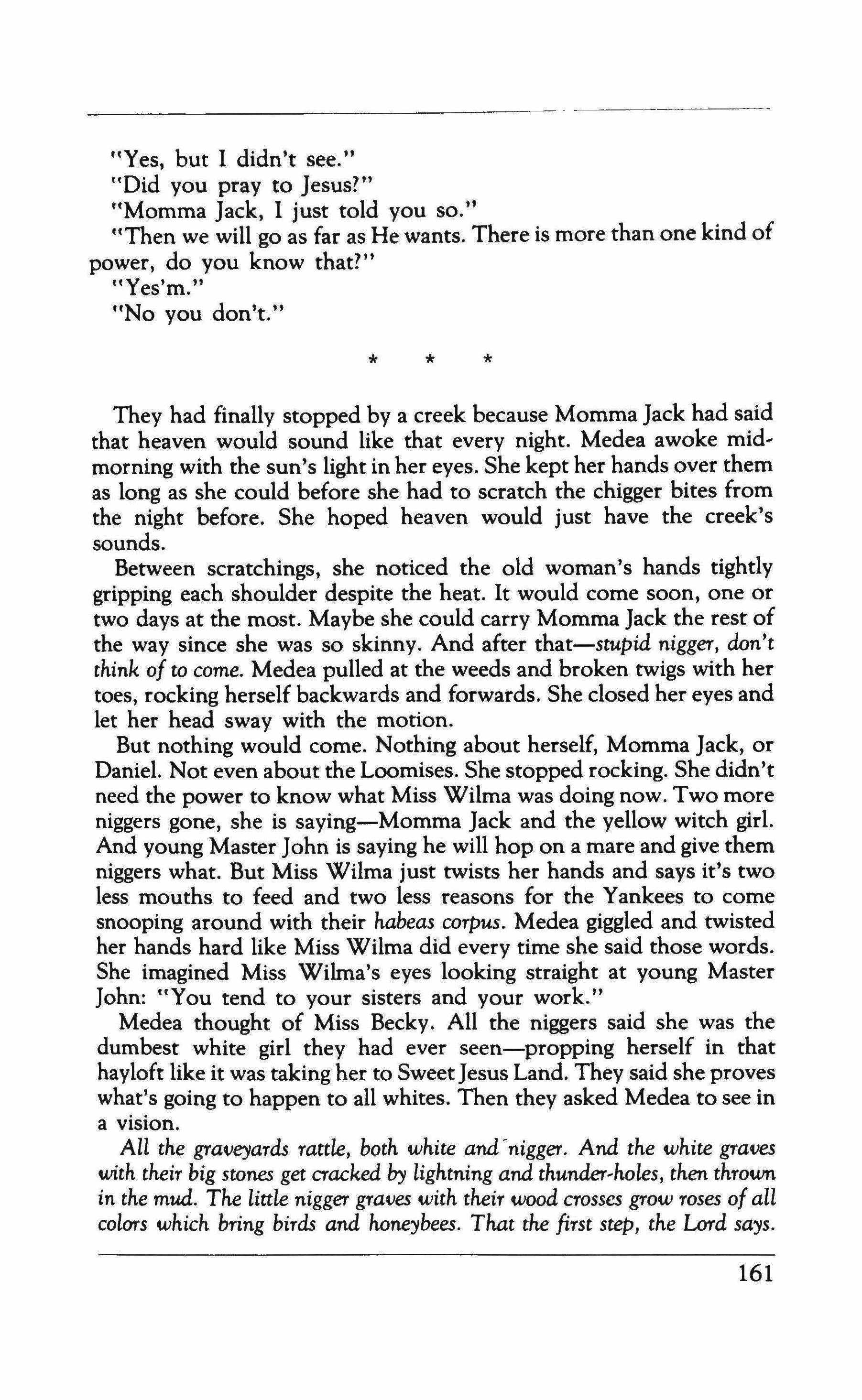
They had finally stopped by a creek because Momma Jack had said that heaven would sound like that every night. Medea awoke mid, morning with the sun's light in her eyes. She kept her hands over them as long as she could before she had to scratch the chigger bites from the night before. She hoped heaven would just have the creek's sounds.
Between scratchings, she noticed the old woman's hands tightly gripping each shoulder despite the heat. It would come soon, one or two days at the most. Maybe she could carry Momma Jack the rest of the way since she was so skinny. And after that-stupid nigger, don't think of to come. Medea pulled at the weeds and broken twigs with her toes, rocking herself backwards and forwards. She closed her eyes and let her head sway with the motion.
But nothing would come. Nothing about herself, Momma Jack, or Daniel. Not even about the Loomises. She stopped rocking. She didn't need the power to know what Miss Wilma was doing now. Two more niggers gone, she is saying-Momma Jack and the yellow witch girl. And young Master John is saying he will hop on a mare and give them niggers what. But Miss Wilma just twists her hands and says it's two less mouths to feed and two less reasons for the Yankees to come snooping around with their habeas corpus. Medea giggled and twisted her hands hard like Miss Wilma did every time she said those words. She imagined Miss Wilma's eyes looking straight at young Master John: "You tend to your sisters and your work."
Medea thought of Miss Becky. All the niggers said she was the dumbest white girl they had ever seen-propping herself in that hayloft like it was taking her to Sweet Jesus Land. They said she proves what's going to happen to all whites. Then they asked Medea to see in a vision.
All the graveyards rattle, both white and -nigger. And the white graves with their big stones get cracked by lightning and thunder,holes, then thrown in the mud. The little nigger graves with their wood crosses grow roses of all colors which bring birds and honeybees. That the first step, the Lord says.
* * *
161
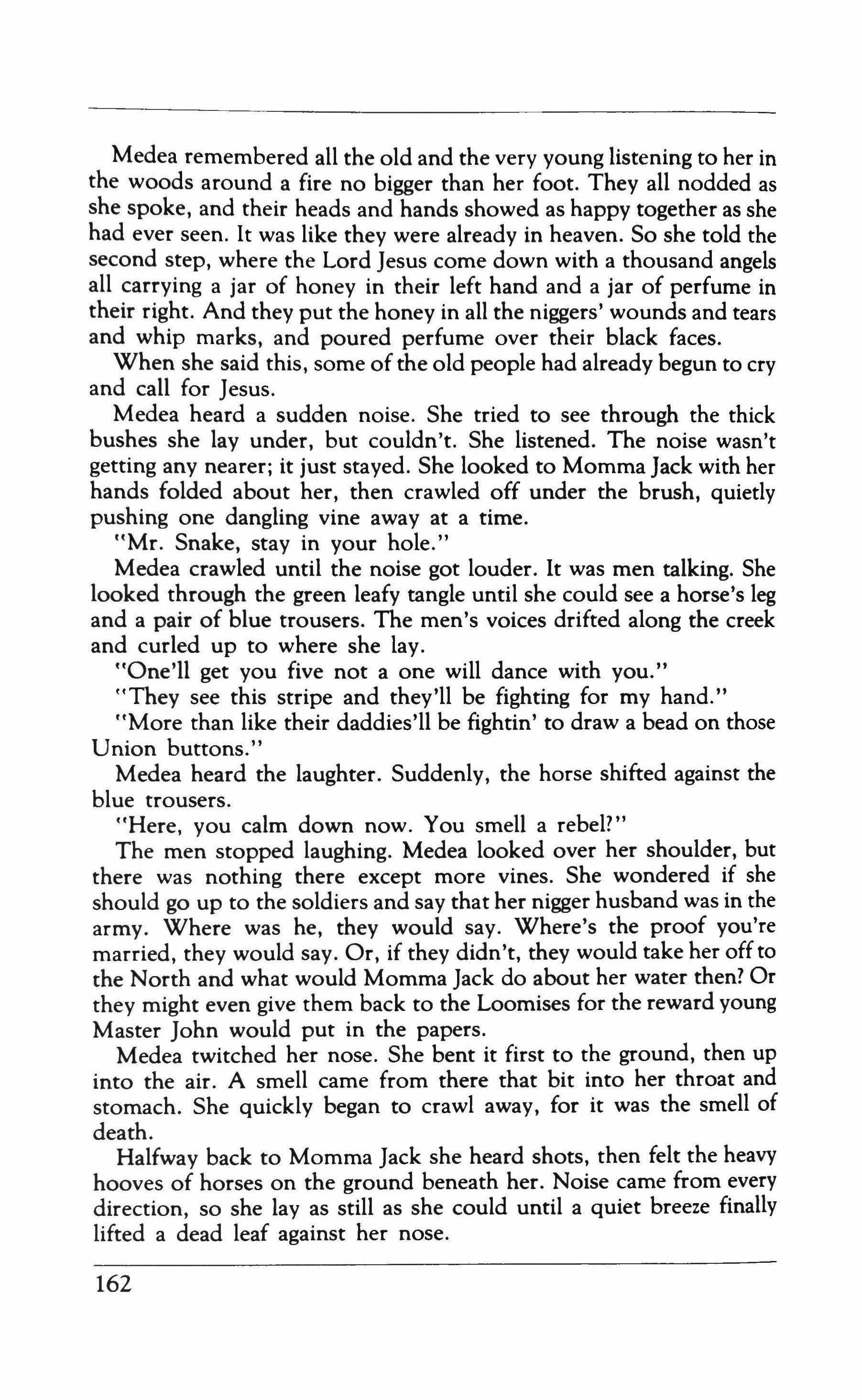
Medea remembered all the old and the very young listening to her in the woods around a fire no bigger than her foot. They all nodded as she spoke, and their heads and hands showed as happy together as she had ever seen. It was like they were already in heaven. So she told the second step, where the Lord Jesus come down with a thousand angels all carrying a jar of honey in their left hand and a jar of perfume in their right. And they put the honey in all the niggers' wounds and tears and whip marks, and poured perfume over their black faces.
When she said this, some of the old people had already begun to cry and call for Jesus.
Medea heard a sudden noise. She tried to see through the thick bushes she lay under, but couldn't. She listened. The noise wasn't getting any nearer; it just stayed. She looked to Momma Jack with her hands folded about her, then crawled off under the brush, quietly pushing one dangling vine away at a time.
"Mr. Snake, stay in your hole."
Medea crawled until the noise got louder. It was men talking. She looked through the green leafy tangle until she could see a horse's leg and a pair of blue trousers. The men's voices drifted along the creek and curled up to where she lay.
"One'll get you five not a one will dance with you."
"They see this stripe and they'll be fighting for my hand."
"More than like their daddies'll be fightin' to draw a bead on those Union buttons."
Medea heard the laughter. Suddenly, the horse shifted against the blue trousers.
"Here, you calm down now. You smell a rebel?"
The men stopped laughing. Medea looked over her shoulder, but there was nothing there except more vines. She wondered if she should go up to the soldiers and say that her nigger husband was in the army. Where was he, they would say. Where's the proof you're married, they would say. Or, if they didn't, they would take her off to the North and what would Momma Jack do about her water then? Or they might even give them back to the Loomises for the reward young Master John would put in the papers.
Medea twitched her nose. She bent it first to the ground, then up into the air. A smell came from there that bit into her throat and stomach. She quickly began to crawl away, for it was the smell of death.
Halfway back to Momma Jack she heard shots, then felt the heavy hooves of horses on the ground beneath her. Noise came from every direction, so she lay as still as she could until a quiet breeze finally lifted a dead leaf against her nose.
162
She got in sight of Momma Jack. The old woman was curled into herself. Medea crawled even faster, then saw Momma Jack's hand reach into the dirt to shake off a fly.
Medea sat beside Momma Jack and prayed for the soldiers, for the young boy going to the dance. She prayed as the sun scooted down from mid-sky. And all the time she kept her nose nervously in the air. At sunset, she pressed Momma Jack's thin shoulder and offered her some jerky and biscuit. Momma Jack shook her head no.
"The Lord says you got to eat if you want to get to Him. Don't you spite the Lord."
With a frown, Momma Jack reached for some biscuit. After several small, mad bits, she looked up. "What did you do while this old woman slept most day?"
"I heard Union soldiers talk."
"Did they say anything?"
"No."
"How come you didn't talk with them? Ask for food?"
"They rode off too quick." Medea breathed out heavily, reminded of the morning's smell. She looked to a small gray cloud stuck underneath the rising moon like a pillow.
"Was you going to ask them?"
"No.
"Good."
They finished eating and started to walk. Every time Medea looked over to Momma Jack, her head was hanging low to the ground like it was weighed with the dark.
"Those soldiers Momma Jack started. "Yes'm?"
"You do the same when I'm gone."
"Momma Jack, you ain't-"
"Don't try to take heaven from me, witch girl."
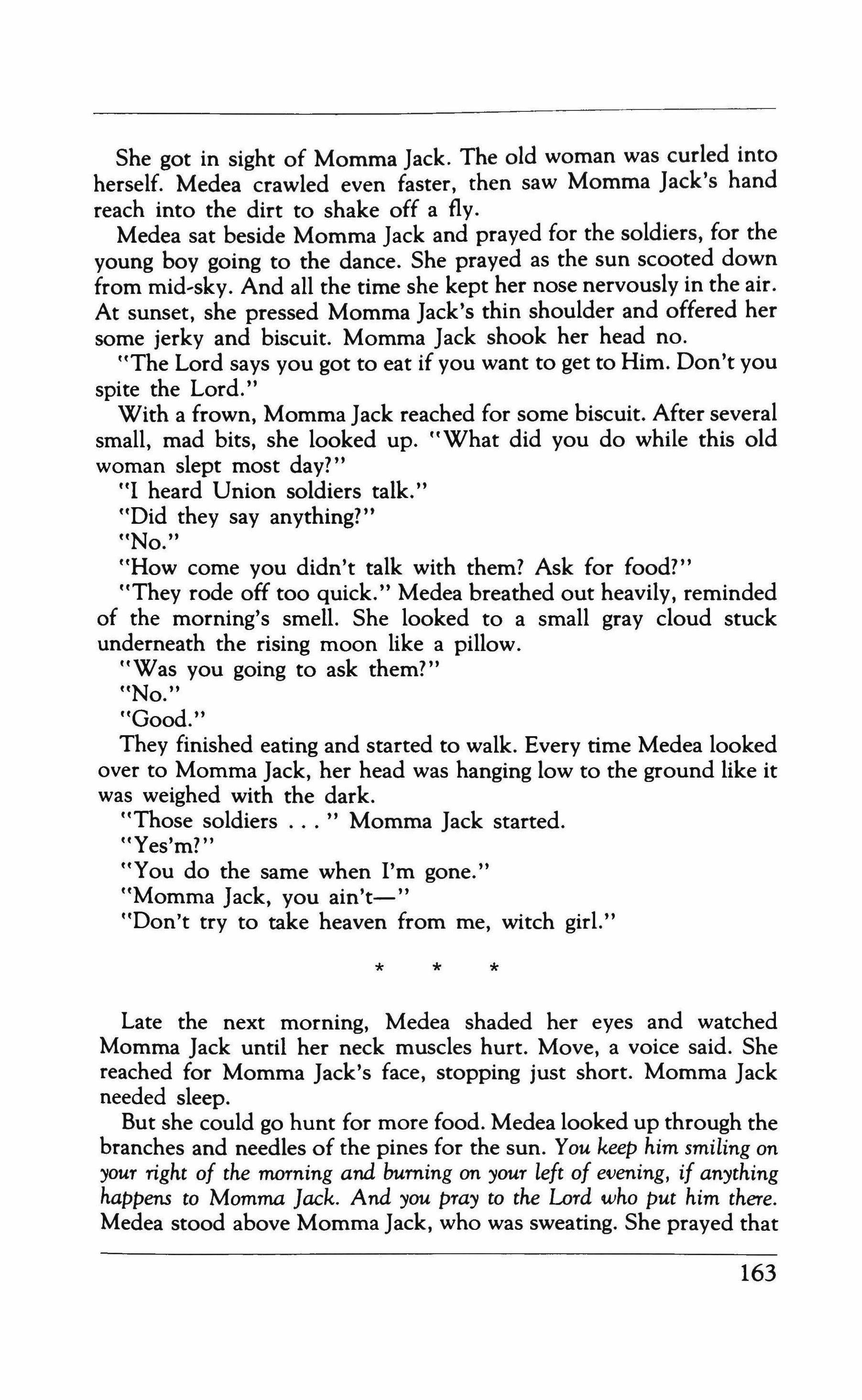
Late the next morning, Medea shaded her eyes and watched Momma Jack until her neck muscles hurt. Move, a voice said. She reached for Momma Jack's face, stopping just short. Momma Jack needed sleep.
But she could go hunt for more food. Medea looked up through the branches and needles of the pines for the sun. You keep him smiling on your right of the morning and burning on your left of evening, if anything happens to Momma Jack. And you pray to the Lord who put him there. Medea stood above Momma Jack, who was sweating. She prayed that
* * *
163

Jesus would leave her a little longer since she was so tiny and quiet
From the top of a small rise she spotted a pawpaw tree. She ran and climbed it, managing to knock down a skirtful of fruit by moving from one branch to another. Looking to her work below, she felt dizzy and grabbed a branch with both hands. A pawpaw hanging near knocked against her head. She thanked the Lord and ate.
In the distance behind, where they had already traveled, she saw smoke rise over the pine tops. They must have passed near a cabin in the night. That would be the dogs they heard. Momma Jack had said they should walk faster.
"They ain't barking at us. We too far off," Medea protested.
"Barking dogs mean no good one way or another. If your little child arms be too tired, give me your sack."
The smoke drifted off and Medea smiled. Her, twice as big as Momma Jack, and the old woman still talking about her "child arms." Momma Jack had cared for her more than anyone alive-even Daniel, because Momma Jack didn't go off to fight some war. Momma Jack said she was the one who pulled Medea from her mother and took the sac from around her head. Your eyes wasn't like other baby eyes. They was open before they was closed. And they looked around the room before you cried out, like they was inspecting and approving. That's why you had that veil over your face. You don't believe, you ask Aunt Phoebe. She was there, too.
Medea twisted to climb down the tree, but stopped tight, her hand digging into a gummy knot. Between pear-shaped leaves she could see the river.
"Momma Jack!" She hurried down, letting the half-eaten pawpaw roll against the trunk with a scratching rattle. On the ground, both her feet stopped tight.
Momma Jack be going to the river to die.
"Momma Jack!" Medea pulled hard at her dress and turned to look for the river. But from the ground it couldn't be seen-only more trees and tangly bushes. Medea walked back to the tree and held onto its bark; she still couldn't see the water, even on tiptoes. Tiny Momma Jack might never see it. They could walk around forever. Medea hugged the tree.
Her and Momma Jack was walking, one arm over the other, in a bright field of com. And each time the yellow,green tassels would tickle across Medea's eyes, Momma Jack would point and laugh. And her thin hands would twist a husk off with a snap and shake it in Medea's face, which was laughing too. And when they stopped laughing, Momma Jack would tell a story and they would laugh again.
Medea opened her eyes. The Father God is a time God and He say my
164
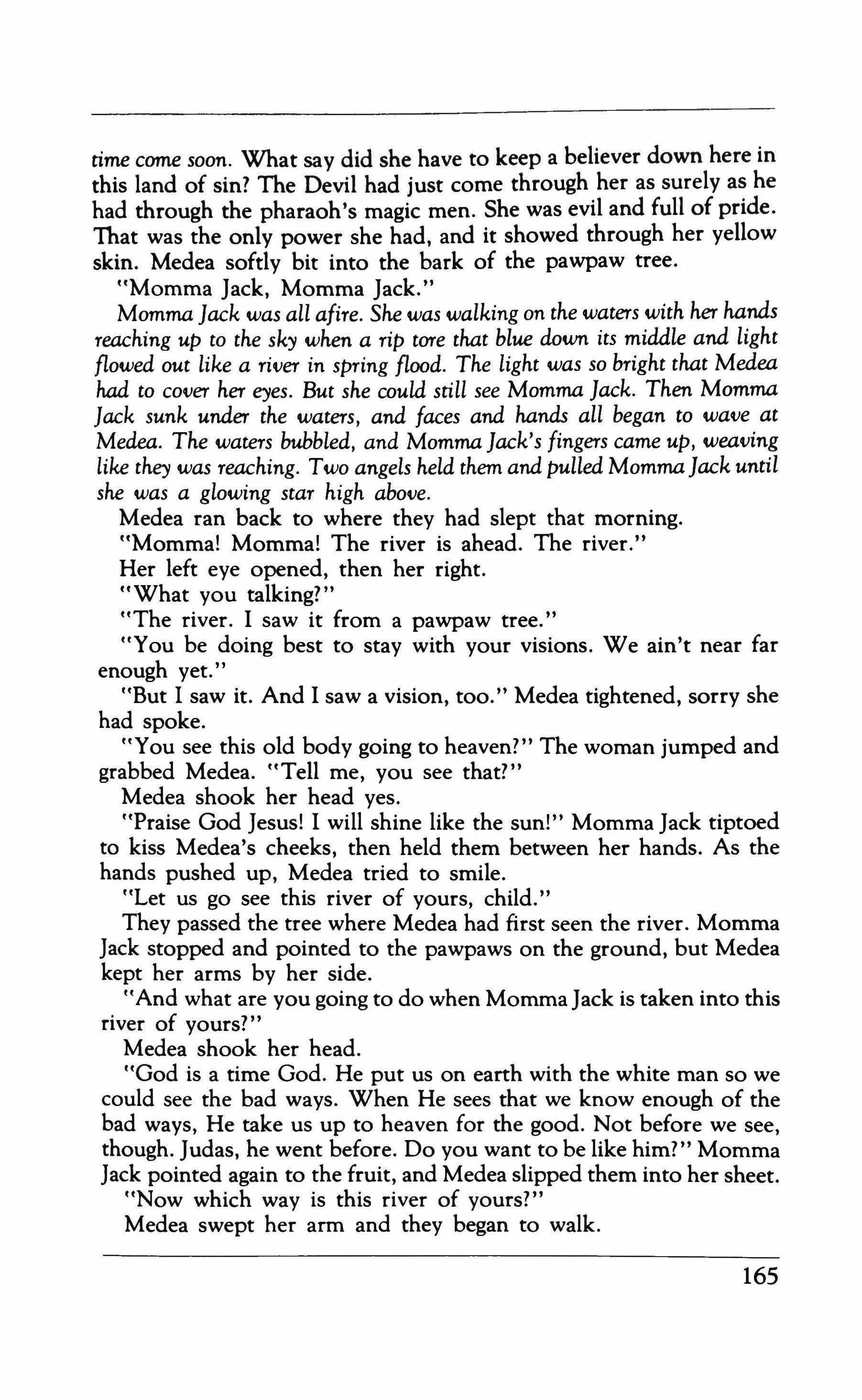
time come soon. What say did she have to keep a believer down here in this land of sin? The Devil had just come through her as surely as he had through the pharaoh's magic men. She was evil and full of pride. That was the only power she had, and it showed through her yellow skin. Medea softly bit into the bark of the pawpaw tree.
"Momma Jack, Momma Jack."
Momma Jack was all afire. She was walking on the waters with her hands reaching up to the sky when a rip tore that blue down its middle and light flowed out like a river in spring flood. The light was so bright that Medea had to cover her eyes. But she could still see Momma Jack. Then Momma Jack sunk under the waters, and faces and hands all began to wave at Medea. The waters bubbled, and Momma Jack's fingers came up, weaving like they was reaching. Two angels held them and pulled Momma Jack until she was a glowing star high above.
Medea ran back to where they had slept that morning.
"Momma! Momma! The river is ahead. The river."
Her left eye opened, then her right.
"What you talking?"
"The river. I saw it from a pawpaw tree."
"You be doing best to stay with your visions. We ain't near far enough yet."
"But I saw it. And I saw a vision, too." Medea tightened, sorry she had spoke.
"You see this old body going to heaven?" The woman jumped and grabbed Medea. "Tell me, you see that?"
Medea shook her head yes.
"Praise God Jesus! I will shine like the sun!" Momma Jack tiptoed to kiss Medea's cheeks, then held them between her hands. As the hands pushed up, Medea tried to smile.
"Let us go see this river of yours, child."
They passed the tree where Medea had first seen the river. Momma Jack stopped and pointed to the pawpaws on the ground, but Medea kept her arms by her side.
"And what are you going to do when Momma Jack is taken into this river of yours?"
Medea shook her head.
"God is a time God. He put us on earth with the white man so we could see the bad ways. When He sees that we know enough of the bad ways, He take us up to heaven for the good. Not before we see, though. Judas, he went before. Do you want to be like him?" Momma Jack pointed again to the fruit, and Medea slipped them into her sheet.
"Now which way is this river of yours?"
Medea swept her arm and they began to walk.
165

When they reached the water, Momma Jack laughed. "You give me one of those pawpaws. I need my strength to walk a lot farther than this piddling pretend creek. What kind of boat you think come up and down this? My momma and daddy come on a boat with a sail, not on two bumped logs."
Medea rushed Momma Jack and grabbed her in a hug, rubbing her nose in her hair and kissing her brow and temples.
"You better stop that. This trickle of water won't kill me, but you will yet."
Medea kept hold of Momma Jack's elbows and danced around her in a laugh.
"You stop now, before you have me seeing visions," Momma Jack said.
"Nigger wenches!"
They nearly fell. Medea smelled the air and her stomach went sick. She turned to see a white man on a horse, his arms crossed meanly.
"You two getting ready to take a social swim?"
"No sir, we just come for a drink."
"Come from where?"
"Master's, sir."
"Master's well run dry? Master who?"
Medea looked to the hooves of the white man's horse as they clumsily moved about, and she pulled her toes in.
"Master Wilson."
"That right, old woman?"
"Yes sir."
"Lived here my whole life. Know everybody. Don't know no Wilsons. Now where you two nigger wenches going? Be quick!" The man walked his horse forward and Medea crossed her feet.
"My momma, sir, she be sick. We going across the river to the doctor."
"Onliest doctor is southwest in Cynthiana. Maybe you're going to a Northern doctor in Cincinnati, though."
"No sir. We're going to a root doctor. White doctor won't take care of Momma. She got the shivers what all the niggers been dying of. Some whites, too. Fourteen in six weeks."
The white man backed his horse off two steps. Medea looked up for a moment. He watched her hard and she wanted to cover her body and arms, but she didn't move. Then he looked to Momma Jack as she coughed and spit on the ground, calling to the Lord to save her from the shivers.
"Hell, why don't you all goddamn go to Ohio?" He pulled some'
166
thing from his saddle, and Medea thought he was going to shoot them. Instead, he threw a sack to the ground.
"Give what's left of that to Lincoln."
They watched the man ride off, then Momma Jack stooped to look in the sack. "Hardtack," she said.
They could still see him hugging the shore of the river, riding fast.
"White man hates himself when the Lord moves him to do good."
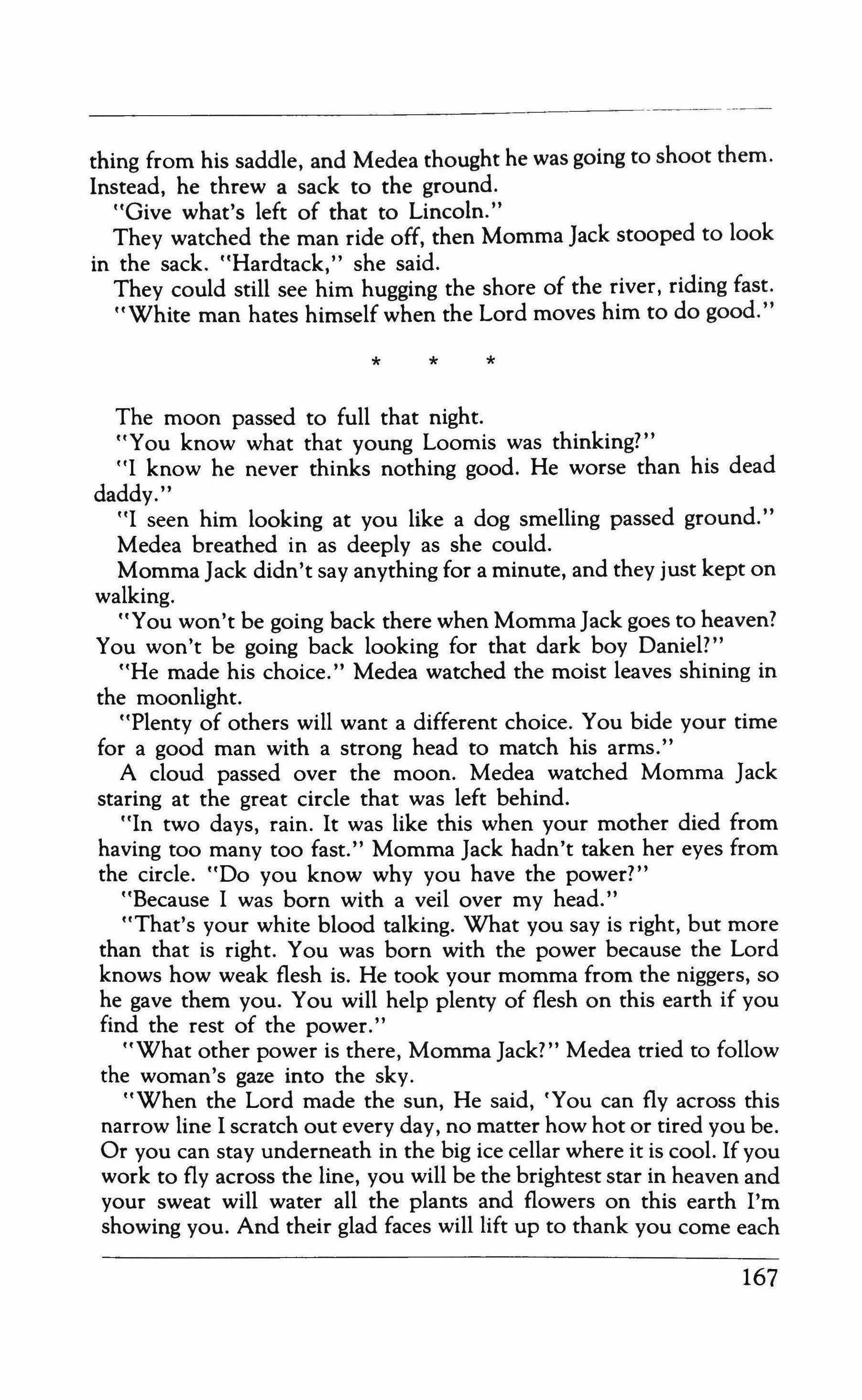
The moon passed to full that night.
"You know what that young Loomis was thinking?"
"I know he never thinks nothing good. He worse than his dead daddy."
"I seen him looking at you like a dog smelling passed ground." Medea breathed in as deeply as she could.
Momma Jack didn't say anything for a minute, and they just kept on walking.
"You won't be going back there when Momma Jack goes to heaven? You won't be going back looking for that dark boy Daniel?"
"He made his choice." Medea watched the moist leaves shining in the moonlight.
"Plenty of others will want a different choice. You bide your time for a good man with a strong head to match his arms."
A cloud passed over the moon. Medea watched Momma Jack staring at the great circle that was left behind.
"In two days, rain. It was like this when your mother died from having too many too fast." Momma Jack hadn't taken her eyes from the circle. "Do you know why you have the power?"
"Because I was born with a veil over my head."
"That's your white blood talking. What you say is right, but more than that is right. You was born with the power because the Lord knows how weak flesh is. He took your momma from the niggers, so he gave them you. You will help plenty of flesh on this earth if you find the rest of the power."
"What other power is there, Momma Jack?" Medea tried to follow the woman's gaze into the sky.
"When the Lord made the sun, He said, 'You can fly across this narrow line I scratch out every day, no matter how hot or tired you be. Or you can stay underneath in the big ice cellar where it is cool. If you work to fly across the line, you will be the brightest star in heaven and your sweat will water all the plants and flowers on this earth I'm showing you. And their glad faces will lift up to thank you come each
* *
167
morning. If you stay where it is cool and lazy, it will be dark and the bugs and crawlworms will keep you company.' Momma Jack looked down to the ground and shifted her sack... You see where that sun is come morning."
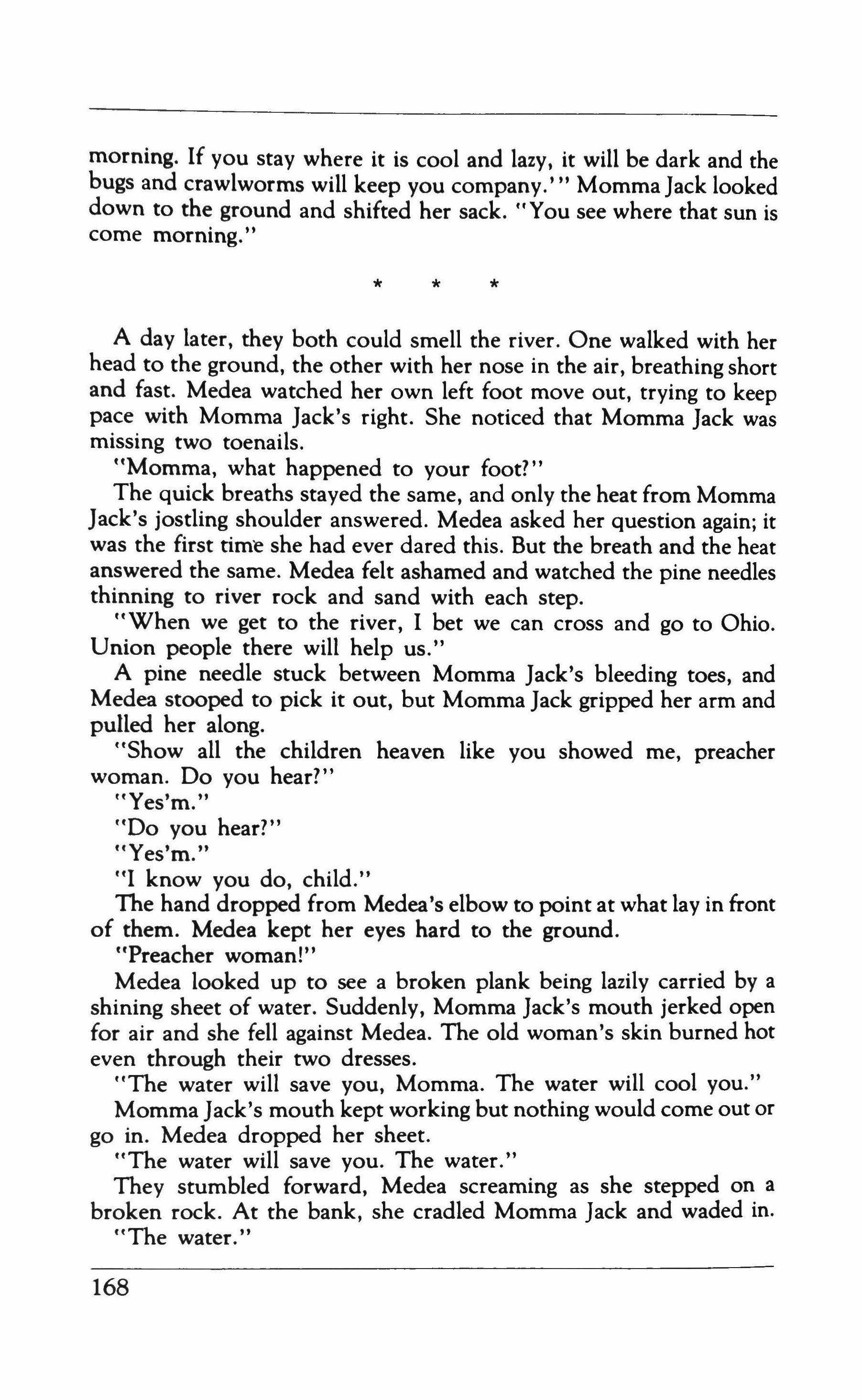
A day later, they both could smell the river. One walked with her head to the ground, the other with her nose in the air, breathing short and fast. Medea watched her own left foot move out, trying to keep pace with Momma Jack's right. She noticed that Momma Jack was missing two toenails.
"Momma, what happened to your foot?"
The quick breaths stayed the same, and only the heat from Momma Jack's jostling shoulder answered. Medea asked her question again; it was the first time she had ever dared this. But the breath and the heat answered the same. Medea felt ashamed and watched the pine needles thinning to river rock and sand with each step.
"When we get to the river, I bet we can cross and go to Ohio. Union people there will help us."
A pine needle stuck between Momma Jack's bleeding toes, and Medea stooped to pick it out, but Momma Jack gripped her arm and pulled her along.
"Show all the children heaven like you showed me, preacher woman. Do you hear?"
"Yes'm."
"Do you hear?"
"Yes'm."
"I know you do, child."
The hand dropped from Medea's elbow to point at what lay in front of them. Medea kept her eyes hard to the ground.
"Preacher woman!"
Medea looked up to see a broken plank being lazily carried by a shining sheet of water. Suddenly, Momma Jack's mouth jerked open for air and she fell against Medea. The old woman's skin burned hot even through their two dresses.
"The water will save you, Momma. The water will cool you."
Momma Jack's mouth kept working but nothing would come out or go in. Medea dropped her sheet.
"The water will save you. The water."
They stumbled forward, Medea screaming as she stepped on a broken rock. At the bank, she cradled Momma Jack and waded in.
"The water."
* * *
168
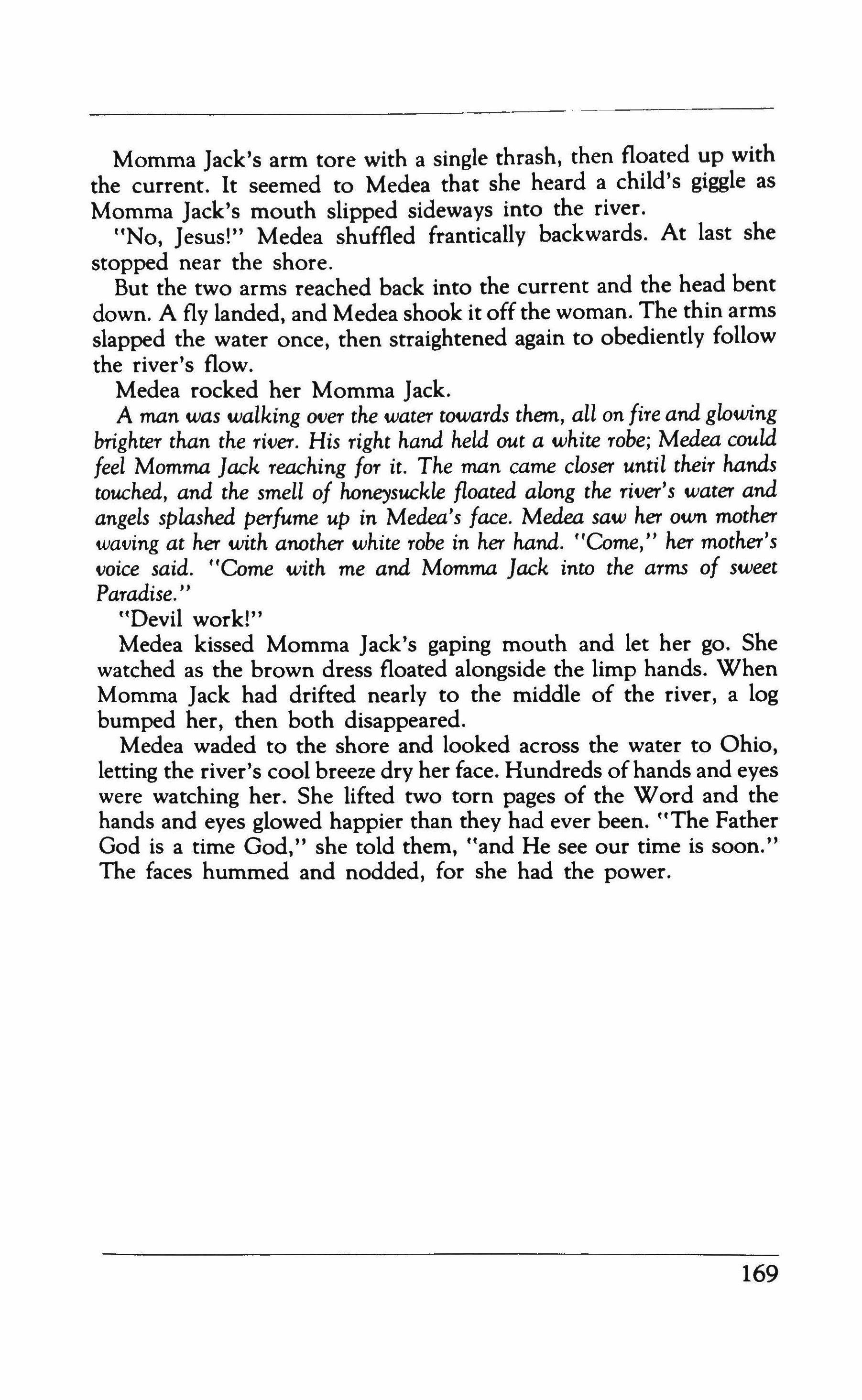
Momma Jack's arm tore with a single thrash, chen floated up with the current. It seemed to Medea that she heard a child's giggle as Momma Jack's mouth slipped sideways into the river.
"No, Jesus!" Medea shuffled frantically backwards. At last she stopped near the shore.
But the two arms reached back into the current and the head bent down. A fly landed, and Medea shook it off the woman. The thin arms slapped the water once, then straightened again to obediently follow the river's flow.
Medea rocked her Momma Jack.
A man was walking over the water towards them, all on fire and glowing brighter than the river. His right hand held out a white robe; Medea could feel Momma Jack reaching for it. The man came closer until their hands touched, and the smell of honeysuckle floated along the river's water and angels splashed perfume up in Medea's face. Medea saw her own mother waving at her with another white robe in her hand. "Come," her mother's voice said. "Come with me and Momma Jack into the arms of sweet Paradise.
"Devil work!"
Medea kissed Momma Jack's gaping mouth and let her go. She watched as the brown dress floated alongside the limp hands. When Momma Jack had drifted nearly to the middle of the river, a log bumped her, then both disappeared.
Medea waded to the shore and looked across the water to Ohio, letting the river's cool breeze dry her face. Hundreds ofhands and eyes were watching her. She lifted two torn pages of the Word and the hands and eyes glowed happier than they had ever been. "The Father God is a time God," she told them, "and He see our time is soon." The faces hummed and nodded, for she had the power.
169
Fourteen pieces from. Steht noch dahin
Marie Luise Kaschnitz
 Translated by Lisel Mueller
Translated by Lisel Mueller
REMAINS TO BE SEEN
Whether we'll get away without being tortured, whether we'll die a natural death, whether we won't be hungry again, rummaging through garbage cans for potato peels, whether we'll be driven in herds: we've been through that. Whether we may yet learn the tapping code of prison cells, spy on our neighbor, be spied on by our neighbor, and burst into tears at the word freedom. Whether we'll slip away in time to a white bed or perish by hundredfold atomic lightning, whether we manage to die with some hope: remains to be seen, it all remains to be seen.
SISTER-SISTER
You've been dead eight years now, I say to my sister, would you like to know what's been happening? No, my sister says. Fine, I say, then I'll tell you. The Vietnam war still isn't over. I could have predicted that, my sister says. There's still no cure for cancer, I say. You've got to die of something, my sister says. There are planes now, I say, which have room for five hundred passengers and take a few hours to fly between Europe and America. That doesn't interest me, my sister says. All bills are figured by computers, I say. They store all the knowledge in the world, and you can ask them questions. I don't understand, my sister says. You've studied law, I say. Perhaps you'll be interested to know that the accused no longer rises before the judge
170
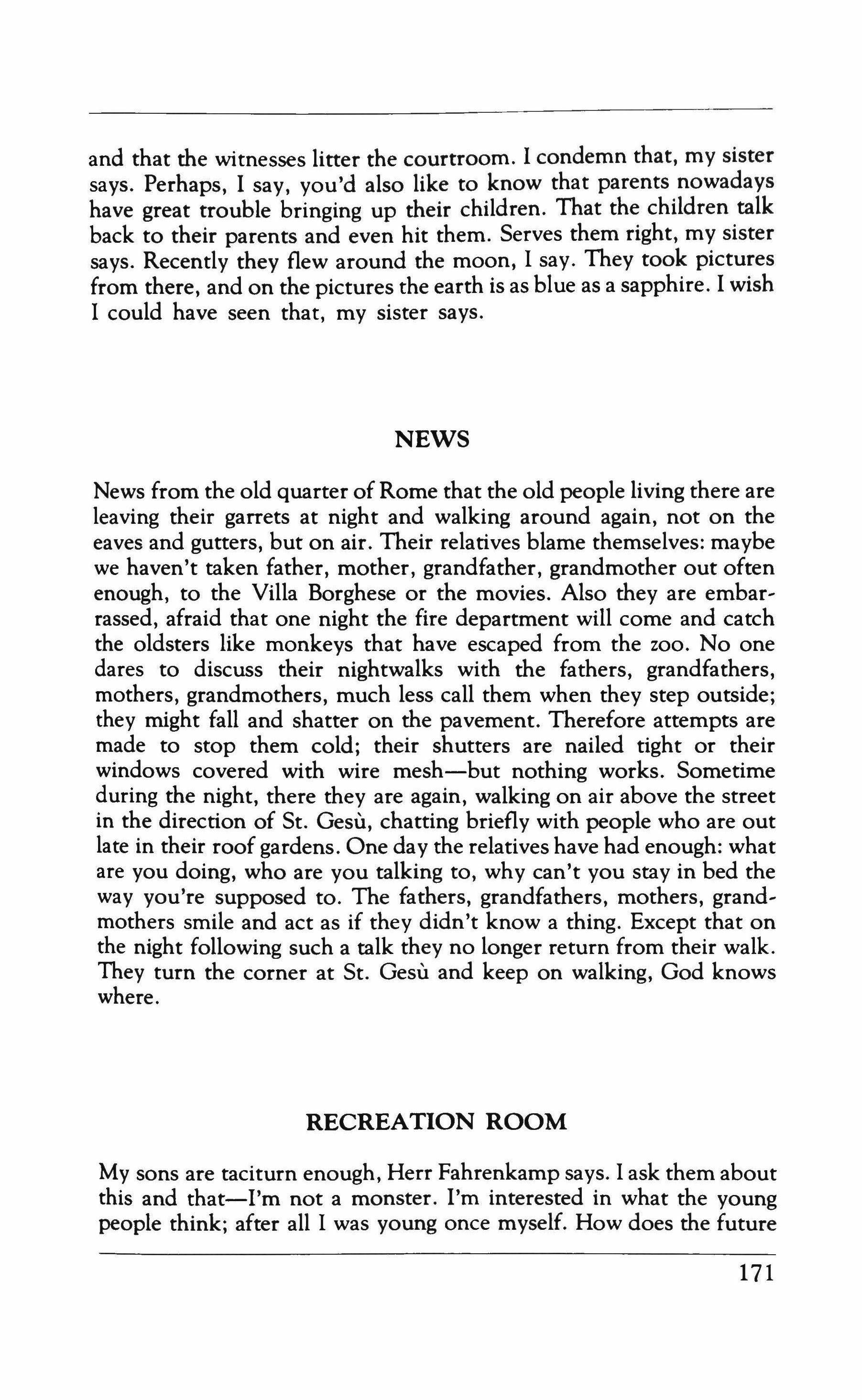
and that the witnesses litter the courtroom. I condemn that, my sister says. Perhaps, I say, you'd also like to know that parents nowadays have great trouble bringing up their children. That the children talk back to their parents and even hit them. Serves them right, my sister says. Recently they flew around the moon, I say. They took pictures from there, and on the pictures the earth is as blue as a sapphire. I wish I could have seen that, my sister says.
NEWS
News from the old quarter of Rome that the old people living there are leaving their garrets at night and walking around again, not on the eaves and gutters, but on air. Their relatives blame themselves: maybe we haven't taken father, mother, grandfather, grandmother out often enough, to the Villa Borghese or the movies. Also they are embarrassed, afraid that one night the fire department will come and catch the oldsters like monkeys that have escaped from the zoo. No one dares to discuss their nightwalks with the fathers, grandfathers, mothers, grandmothers, much less call them when they step outside; they might fall and shatter on the pavement. Therefore attempts are made to stop them cold; their shutters are nailed tight or their windows covered with wire mesh-but nothing works. Sometime during the night, there they are again, walking on air above the street in the direction of St. Gesu, chatting briefly with people who are out late in their roof gardens. One day the relatives have had enough: what are you doing, who are you talking to, why can't you stay in bed the way you're supposed to. The fathers, grandfathers, mothers, grandmothers smile and act as if they didn't know a thing. Except that on the night following such a talk they no longer return from their walk. They turn the corner at St. Gesu and keep on walking, God knows where.
RECREATION ROOM
My sons are taciturn enough, Herr Fahrenkamp says. I ask them about this and that-I'm not a monster. I'm interested in what the young people think; after alII was young once myself. How does the future 171
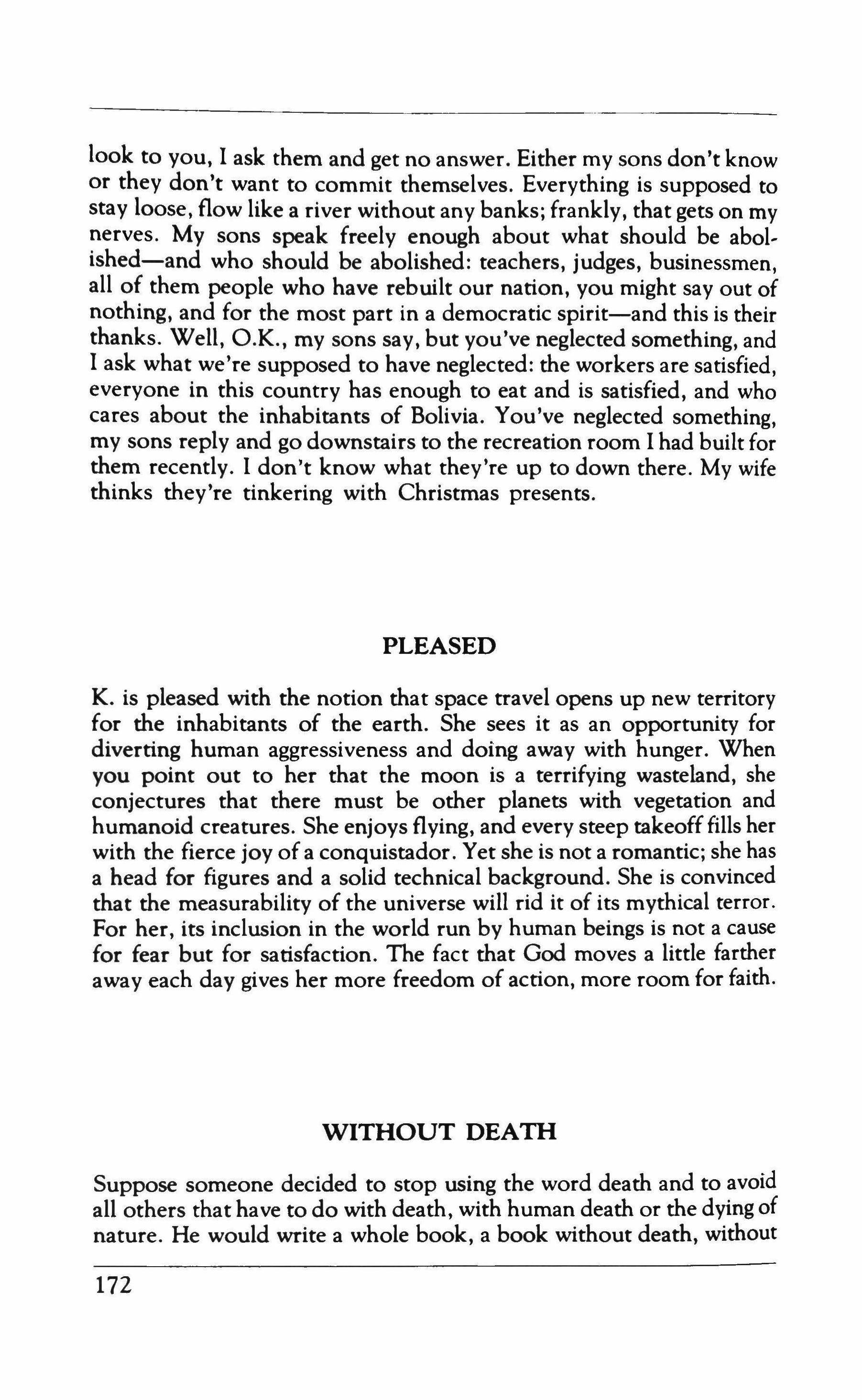
look to you, I ask them and get no answer. Either my sons don't know or they don't want to commit themselves. Everything is supposed to stay loose, flow like a river without any banks; frankly, that gets on my nerves. My sons speak freely enough about what should be abolished-and who should be abolished: teachers, judges, businessmen, all of them people who have rebuilt our nation, you might say out of nothing, and for the most part in a democratic spirit-and this is their thanks. Well, O.K., my sons say, but you've neglected something, and I ask what we're supposed to have neglected: the workers are satisfied, everyone in this country has enough to eat and is satisfied, and who cares about the inhabitants of Bolivia. You've neglected something, my sons reply and go downstairs to the recreation room I had built for them recently. I don't know what they're up to down there. My wife thinks they're tinkering with Christmas presents.
PLEASED
K. is pleased with the notion that space travel opens up new territory for the inhabitants of the earth. She sees it as an opportunity for diverting human aggressiveness and doing away with hunger. When you point out to her that the moon is a terrifying wasteland, she conjectures that there must be other planets with vegetation and humanoid creatures. She enjoys flying, and every steep takeofffills her with the fierce joy of a conquistador Yet she is not a romantic; she has a head for figures and a solid technical background. She is convinced that the measurability of the universe will rid it of its mythical terror. For her, its inclusion in the world run by human beings is not a cause for fear but for satisfaction. The fact that God moves a little farther away each day gives her more freedom of action, more room for faith.
WITHOUT DEATH
Suppose someone decided to stop using the word death and to avoid all others that have to do with death, with human death or the dying of nature. He would write a whole book, a book without death, without
172
fear of dying, without longing for the dead, who of course are out too, along with cemeteries, decaying houses, deadly weapons, automobile accidents, murder. He wouldn't have it easy, this writer. Every moment he would have to call himself to order, blot out something that had sneaked in; even a sunset would be dangerous, even a farewell, and the brown leaf that blows down-alarmed, he crosses out the brown leaf. Only waxing days, only children and young people, only quick steps, hope and the future: a beautiful book, a book of paradise.

HARLEQUINADES
The lady just loves the harlequinades, the massive beards, long male hair, buckskin vests, grandfather coats, flower garlands, high boots, gold chains, all of which she thinks of as a protest against a conformist and antiseptic society, but also as a piece of jungle with snakes and brilliant flowers invented for her sake. The problem is that all of a sudden the leather jackets come around the corner on their rattling motorcycles; then she moves on, downcast: she can't understand that sort of crudeness.
INSURANCE
I am insured against all kinds of mishaps, all kinds of damage. This is why it is perfectly all right for the river to step over its banks into my basement, the storm to strip my roof, the hail to break my windows, a guest to fall down my stairs, the neighbor's child to impale herself on the spikes of my fence. My trips are insured, my stays at home, my clothes, my household goods, my body against illness, my grave against neglect, my teeth against decay. Since much is being planned in this area and the numerous already completed insurance towers can't handle it all, they have begun evacuating the city population by force. I too have had to leave my attractive apartment and settle down at the edge of a field. Since there are no other places of employment left, I work for an insurance company like everyone else. It goes without
173
saying that I am insured not only against accidents on the way to and from work, but also against the Sunday blues, against loneliness and against missing the dead.
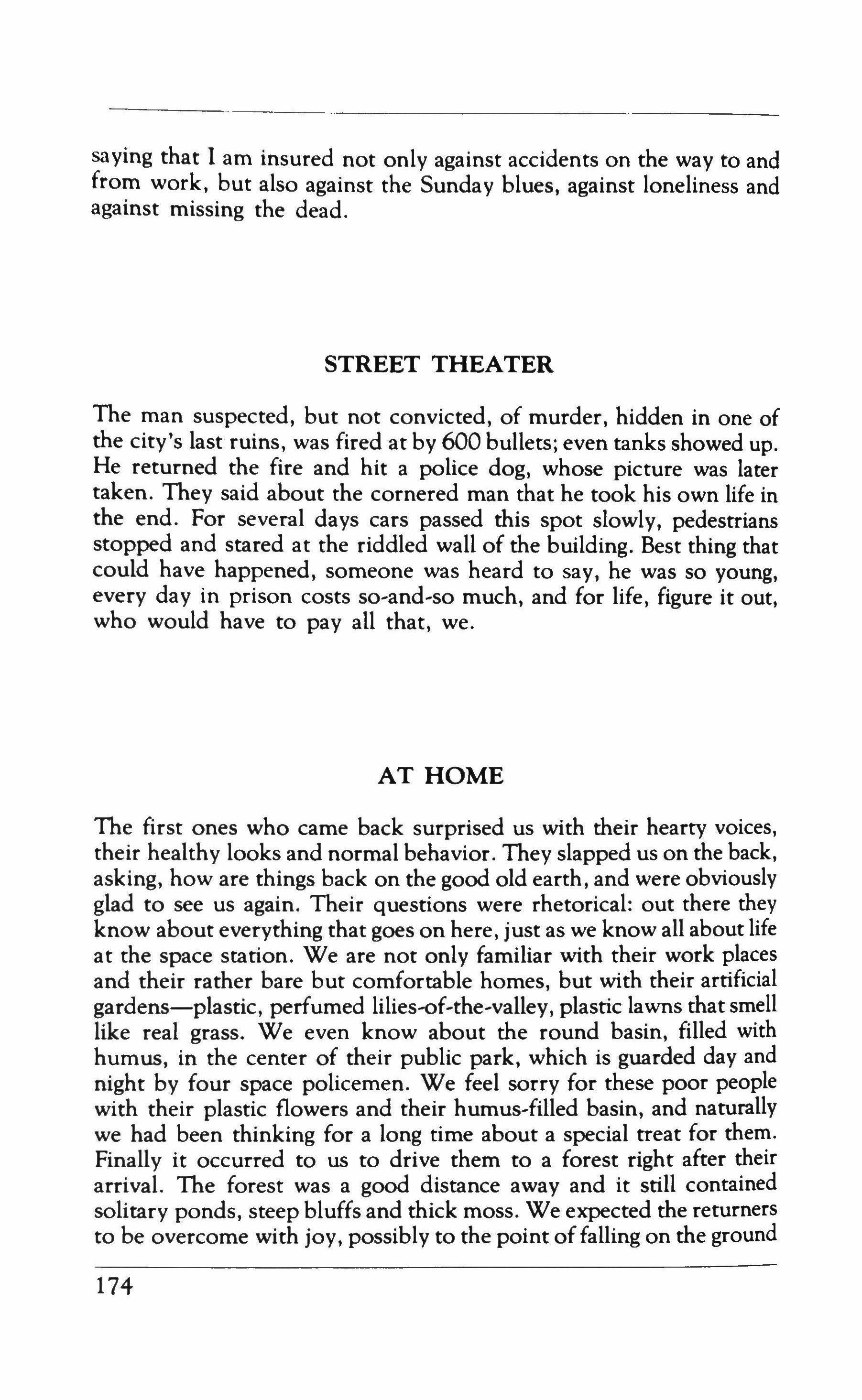
STREET THEATER
The man suspected, but not convicted, of murder, hidden in one of the city's last ruins, was fired at by 600 bullets; even tanks showed up. He returned the fire and hit a police dog, whose picture was later taken. They said about the cornered man that he took his own life in the end. For several days cars passed this spot slowly, pedestrians stopped and stared at the riddled wall of the building. Best thing that could have happened, someone was heard to say, he was so young, every day in prison costs so-and-so much, and for life, figure it out, who would have to pay all that, we.
AT HOME
The first ones who came back surprised us with their hearty voices, their healthy looks and normal behavior. They slapped us on the back, asking, how are things back on the good old earth, and were obviously glad to see us again. Their questions were rhetorical: out there they know about everything that goes on here, just as we know all about life at the space station. We are not only familiar with their work places and their rather bare but comfortable homes, but with their artificial gardens-plastic, perfumed lilies-of-the-valley, plastic lawns that smell like real grass. We even know about the round basin, filled with humus, in the center of their public park, which is guarded day and night by four space policemen. We feel sorry for these poor people with their plastic flowers and their humus-filled basin, and naturally we had been thinking for a long time about a special treat for them. Finally it occurred to us to drive them to a forest right after their arrival. The forest was a good distance away and it still contained solitary ponds, steep bluffs and thick moss. We expected the returners to be overcome with joy, possibly to the point offalling on the ground
174
and digging around in the moss and the damp autumn leaves. But they did nothing of the kind; instead they stood around in polite boredom. Then they asked to be taken back to the city. They did not want to miss the television program, the news from there. (From home, they said.)
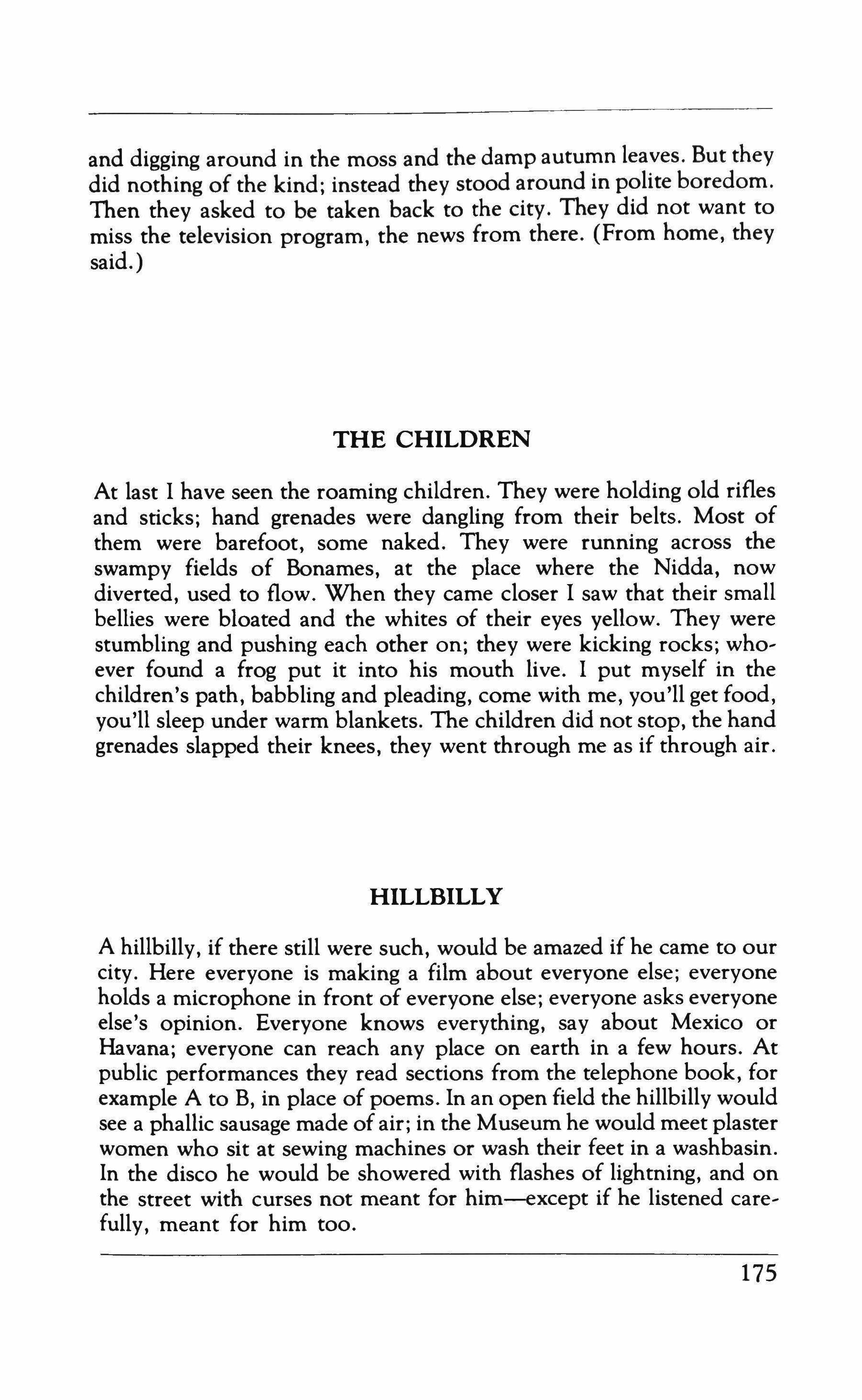
THE CHILDREN
At last I have seen the roaming children. They were holding old rifles and sticks; hand grenades were dangling from their belts. Most of them were barefoot, some naked. They were running across the swampy fields of Bonames, at the place where the Nidda, now diverted, used to flow. When they came closer I saw that their small bellies were bloated and the whites of their eyes yellow. They were stumbling and pushing each other on; they were kicking rocks; who, ever found a frog put it into his mouth live. I put myself in the children's path, babbling and pleading, come with me, you'll get food, you'll sleep under warm blankets. The children did not stop, the hand grenades slapped their knees, they went through me as if through air.
HILLBILLY
A hillbilly, if there still were such, would be amazed if he came to our city. Here everyone is making a film about everyone else; everyone holds a microphone in front of everyone else; everyone asks everyone else's opinion. Everyone knows everything, say about Mexico or Havana; everyone can reach any place on earth in a few hours. At public performances they read sections from the telephone book, for example A to B, in place of poems. In an open field the hillbilly would see a phallic sausage made of air; in the Museum he would meet plaster women who sit at sewing machines or wash their feet in a washbasin. In the disco he would be showered with flashes of lightning, and on the street with curses not meant for him-except if he listened care, fully, meant for him too.
175
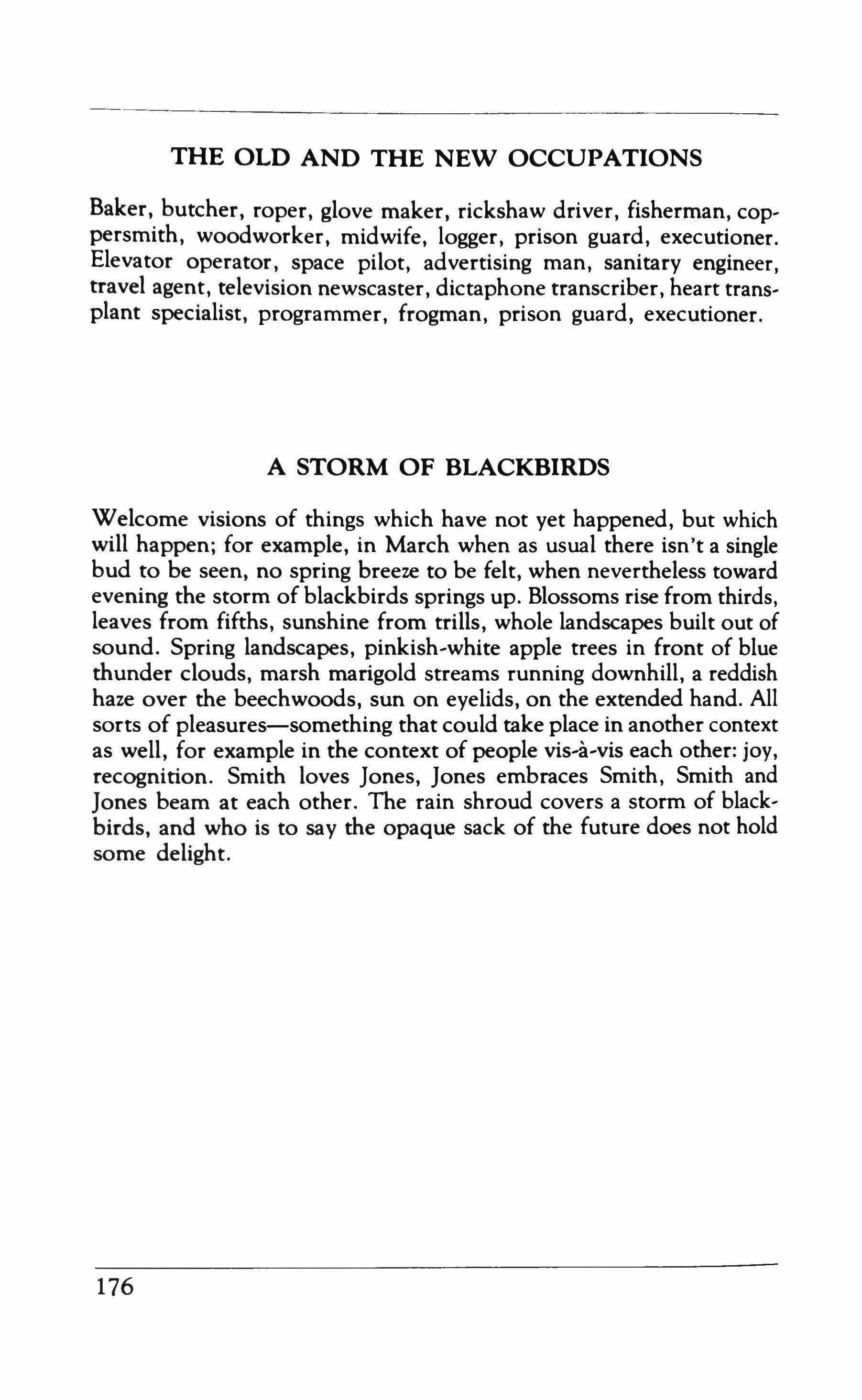
THE OLD AND THE NEW OCCUPATIONS
Baker, butcher, roper, glove maker, rickshaw driver, fisherman, coppersmith, woodworker, midwife, logger, prison guard, executioner. Elevator operator, space pilot, advertising man, sanitary engineer, travel agent, television newscaster, dictaphone transcriber, heart transplant specialist, programmer, frogman, prison guard, executioner.
A STORM OF BLACKBIRDS
Welcome visions of things which have not yet happened, but which will happen; for example, in March when as usual there isn't a single bud to be seen, no spring breeze to be felt, when nevertheless toward evening the storm of blackbirds springs up. Blossoms rise from thirds, leaves from fifths, sunshine from trills, whole landscapes built out of sound. Spring landscapes, pinkish-white apple trees in front of blue thunder clouds, marsh marigold streams running downhill, a reddish haze over the beechwoods, sun on eyelids, on the extended hand. All sorts of pleasures-something that could take place in another context as well, for example in the context of people vis-a-vis each other: joy, recognition. Smith loves Jones, Jones embraces Smith, Smith and Jones beam at each other. The rain shroud covers a storm of blackbirds, and who is to say the opaque sack of the future does not hold some delight.
176
Don't they speak jazz?
Michael S. Harper
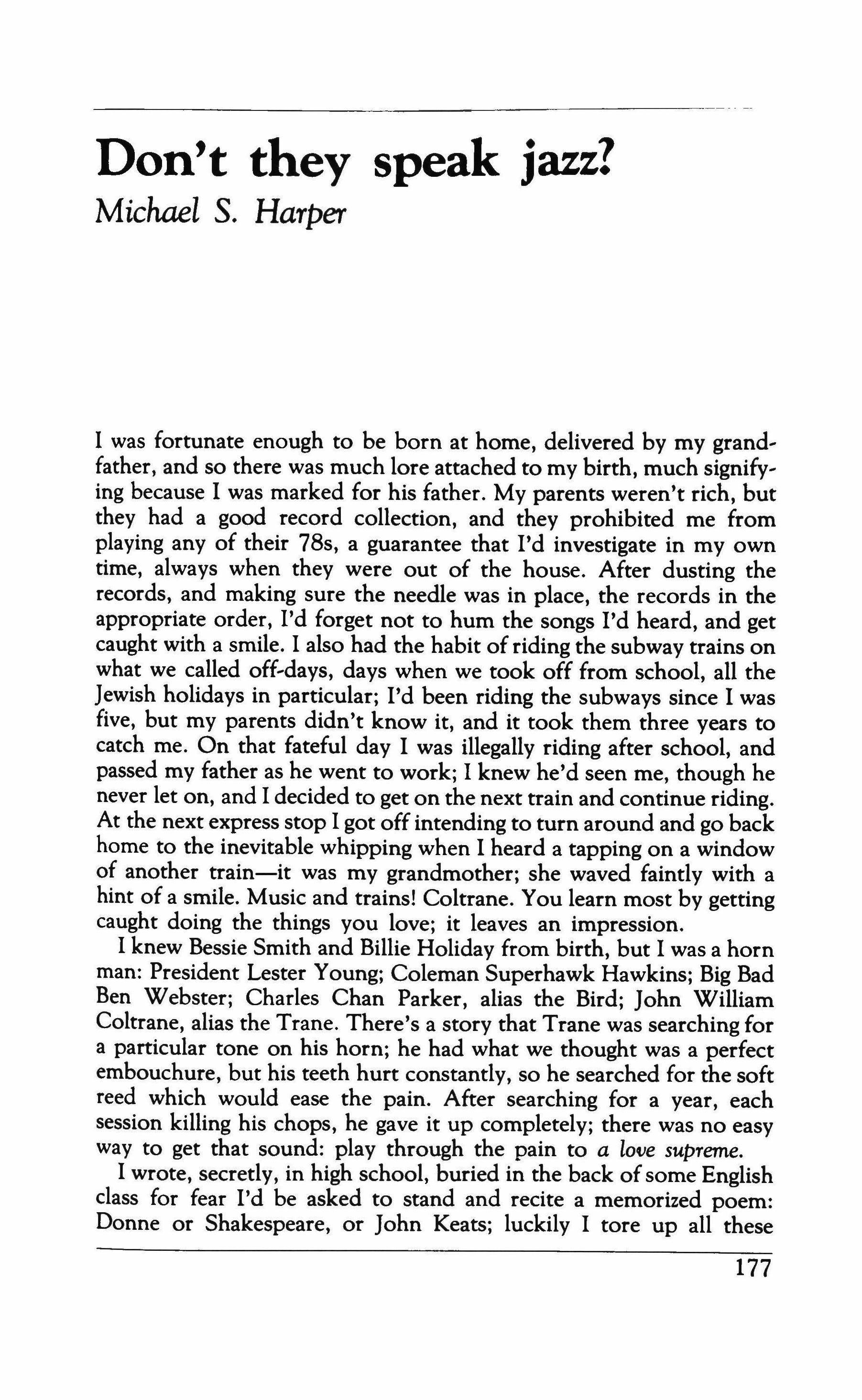
I was fortunate enough to be born at horne, delivered by my grand, father, and so there was much lore attached to my birth, much signify, ing because I was marked for his father. My parents weren't rich, but they had a good record collection, and they prohibited me from playing any of their 78s, a guarantee that I'd investigate in my own time, always when they were out of the house. After dusting the records, and making sure the needle was in place, the records in the appropriate order, I'd forget not to hum the songs I'd heard, and get caught with a smile. I also had the habit of riding the subway trains on what we called off-days, days when we took off from school, all the Jewish holidays in particular; I'd been riding the subways since I was five, but my parents didn't know it, and it took them three years to catch me. On that fateful day I was illegally riding after school, and passed my father as he went to work; I knew he'd seen me, though he never let on, and I decided to get on the next train and continue riding. At the next express stop I got off intending to turn around and go back home to the inevitable whipping when I heard a tapping on a window of another train-it was my grandmother; she waved faintly with a hint of a smile. Music and trains! Coltrane. You learn most by getting caught doing the things you love; it leaves an impression. I knew Bessie Smith and Billie Holiday from birth, but I was a horn man: President Lester Young; Coleman Superhawk Hawkins; Big Bad Ben Webster; Charles Chan Parker, alias the Bird; John William Coltrane, alias the Trane. There's a story that Trane was searching for a particular tone on his horn; he had what we thought was a perfect embouchure, but his teeth hurt constantly, so he searched for the soft reed which would ease the pain. After searching for a year, each session killing his chops, he gave it up completely; there was no easy way to get that sound: play through the pain to a love supreme. I wrote, secretly, in high school, buried in the back of some English class for fear I'd be asked to stand and recite a memorized poem: Donne or Shakespeare, or John Keats; luckily I tore up all these
177
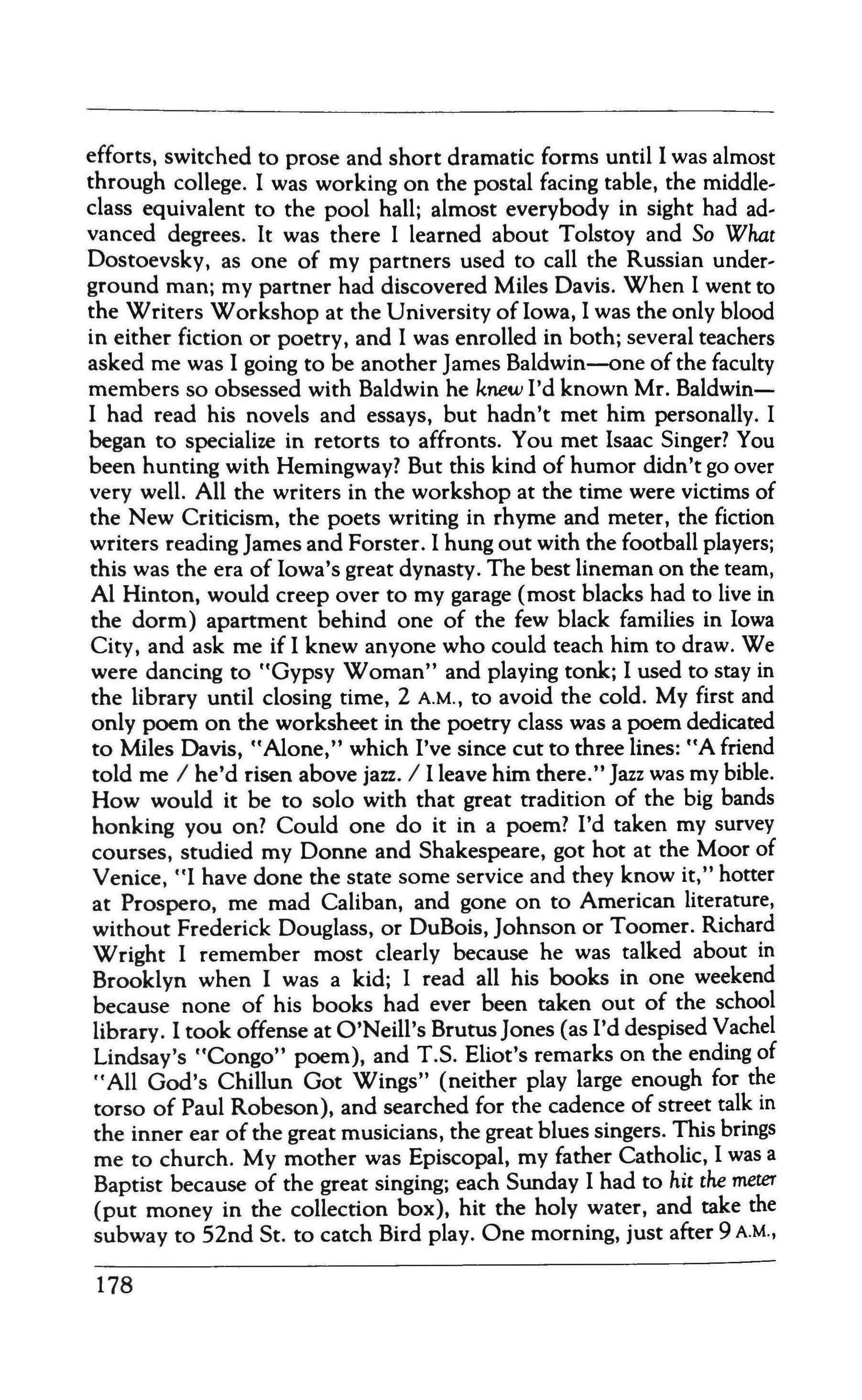
efforts, switched to prose and short dramatic forms until I was almost through college. I was working on the postal facing table, the middleclass equivalent to the pool hall; almost everybody in sight had advanced degrees. It was there I learned about Tolstoy and So What Dostoevsky, as one of my partners used to call the Russian underground man; my partner had discovered Miles Davis. When I went to the Writers Workshop at the University ofIowa, I was the only blood in either fiction or poetry, and I was enrolled in both; several teachers asked me was I going to be another James Baldwin-one of the faculty members so obsessed with Baldwin he knew I'd known Mr. BaldwinI had read his novels and essays, but hadn't met him personally. I began to specialize in retorts to affronts. You met Isaac Singer? You been hunting with Hemingway? But this kind of humor didn't go over very well. All the writers in the workshop at the time were victims of the New Criticism, the poets writing in rhyme and meter, the fiction writers reading James and Forster. I hung out with the football players; this was the era of Iowa's great dynasty. The best lineman on the team, Al Hinton, would creep over to my garage (most blacks had to live in the dorm) apartment behind one of the few black families in Iowa City, and ask me if I knew anyone who could teach him to draw. We were dancing to "Gypsy Woman" and playing tonk; I used to stay in the library until closing time, 2 A.M., to avoid the cold. My first and only poem on the worksheet in the poetry class was a poem dedicated to Miles Davis, "Alone," which I've since cut to three lines: "A friend told me / he'd risen above jazz. / I leave him there." Jazz was my bible. How would it be to solo with that great tradition of the big bands honking you on? Could one do it in a poem? I'd taken my survey courses, studied my Donne and Shakespeare, got hot at the Moor of Venice, "I have done the state some service and they know it," hotter at Prospero, me mad Caliban, and gone on to American literature, without Frederick Douglass, or DuBois, Johnson or Toomer. Richard Wright I remember most clearly because he was talked about in Brooklyn when I was a kid; I read all his books in one weekend because none of his books had ever been taken out of the school library. I took offense at O'Neill's BrutusJones (as I'd despised Vachel Lindsay's "Congo" poem), and T.S. Eliot's remarks on the ending of "All God's Chillun Got Wings" (neither play large enough for the torso of Paul Robeson), and searched for the cadence of street talk in the inner ear of the great musicians, the great blues singers. This brings me to church. My mother was Episcopal, my father Catholic, I was a Baptist because of the great singing; each Sunday I had to hit the meter (put money in the collection box), hit the holy water, and take the subway to 52nd St. to catch Bird play. One morning, just after 9 A.M.,
178
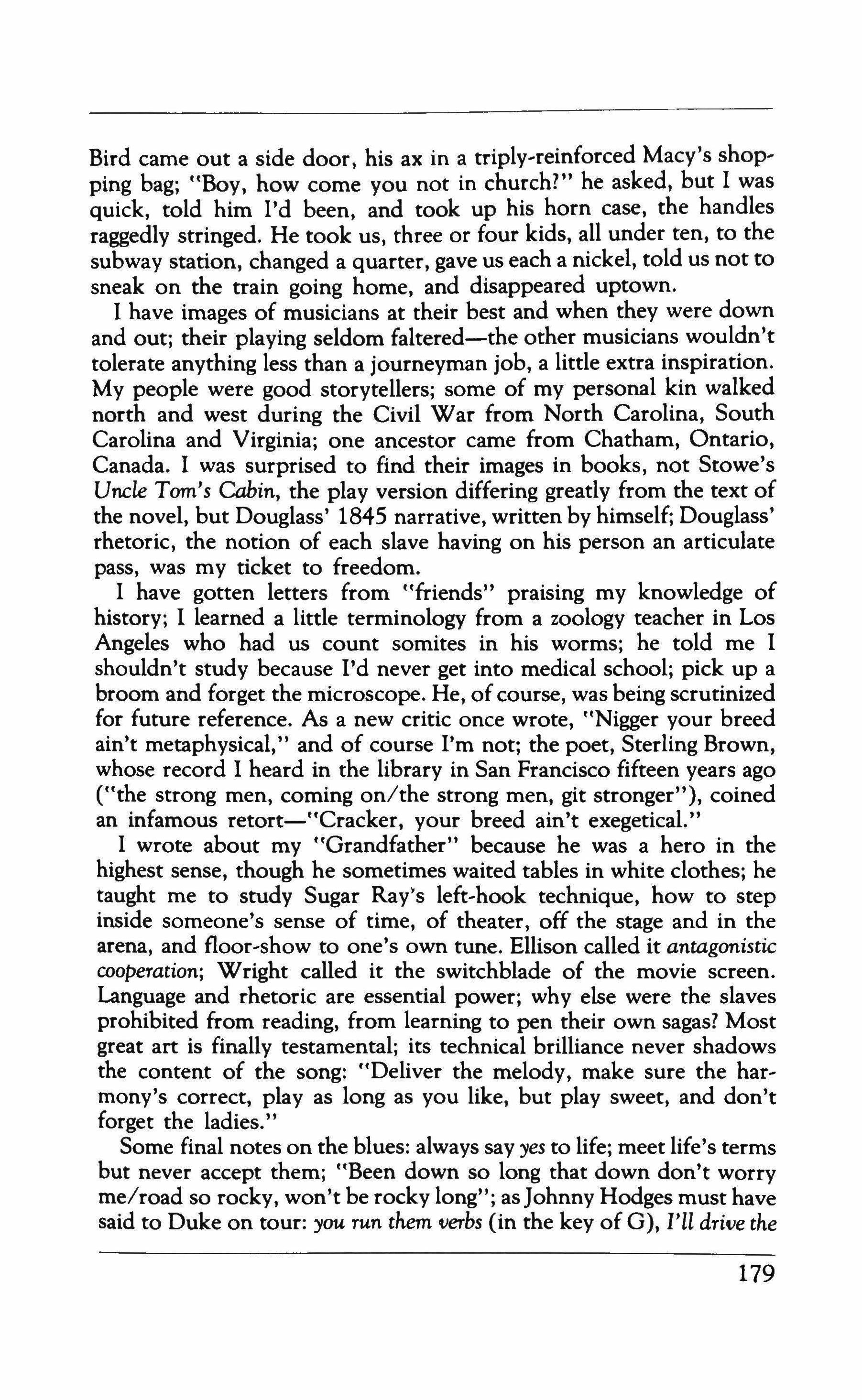
Bird came out a side door, his ax in a rriplv-reinforced Macy's shop, ping bag; "Boy, how come you not in church?" he asked, but I was quick, told him I'd been, and took up his horn case, the handles raggedly stringed. He took us, three or four kids, all under ten, to the subway station, changed a quarter, gave us each a nickel, told us not to sneak on the train going home, and disappeared uptown.
I have images of musicians at their best and when they were down and out; their playing seldom faltered-the other musicians wouldn't tolerate anything less than a journeyman job, a little extra inspiration. My people were good storytellers; some of my personal kin walked north and west during the Civil War from North Carolina, South Carolina and Virginia; one ancestor came from Chatham, Ontario, Canada. I was surprised to find their images in books, not Stowe's Uncle Tom's Cabin, the play version differing greatly from the text of the novel, but Douglass' 1845 narrative, written by himself; Douglass' rhetoric, the notion of each slave having on his person an articulate pass, was my ticket to freedom.
I have gotten letters from "friends" praising my knowledge of history; I learned a little terminology from a zoology teacher in Los Angeles who had us count somites in his worms; he told me I shouldn't study because I'd never get into medical school; pick up a broom and forget the microscope. He, of course, was being scrutinized for future reference. As a new critic once wrote, "Nigger your breed ain't metaphysical," and of course I'm not; the poet, Sterling Brown, whose record I heard in the library in San Francisco fifteen years ago (Uthe strong men, coming on/the strong men, git stronger"), coined an infamous retortU Cracker your breed ain't exegetical."
I wrote about my "Grandfather" because he was a hero in the highest sense, though he sometimes waited tables in white clothes; he taught me to study Sugar Ray's left-hook technique, how to step inside someone's sense of time, of theater, off the stage and in the arena, and floor-show to one's own tune. Ellison called it antagonistic cooperation; Wright called it the switchblade of the movie screen. Language and rhetoric are essential power; why else were the slaves prohibited from reading, from learning to pen their own sagas? Most great art is finally testamental; its technical brilliance never shadows the content of the song: "Deliver the melody, make sure the harmony's correct, playas long as you like, but play sweet, and don't forget the ladies."
Some final notes on the blues: always say yes to life; meet life's terms but never accept them; "Been down so long that down don't worry me/road so rocky, won't be rocky long"; as Johnny Hodges must have said to Duke on tour: you run them verbs (in the key of G), I'll drive the
179
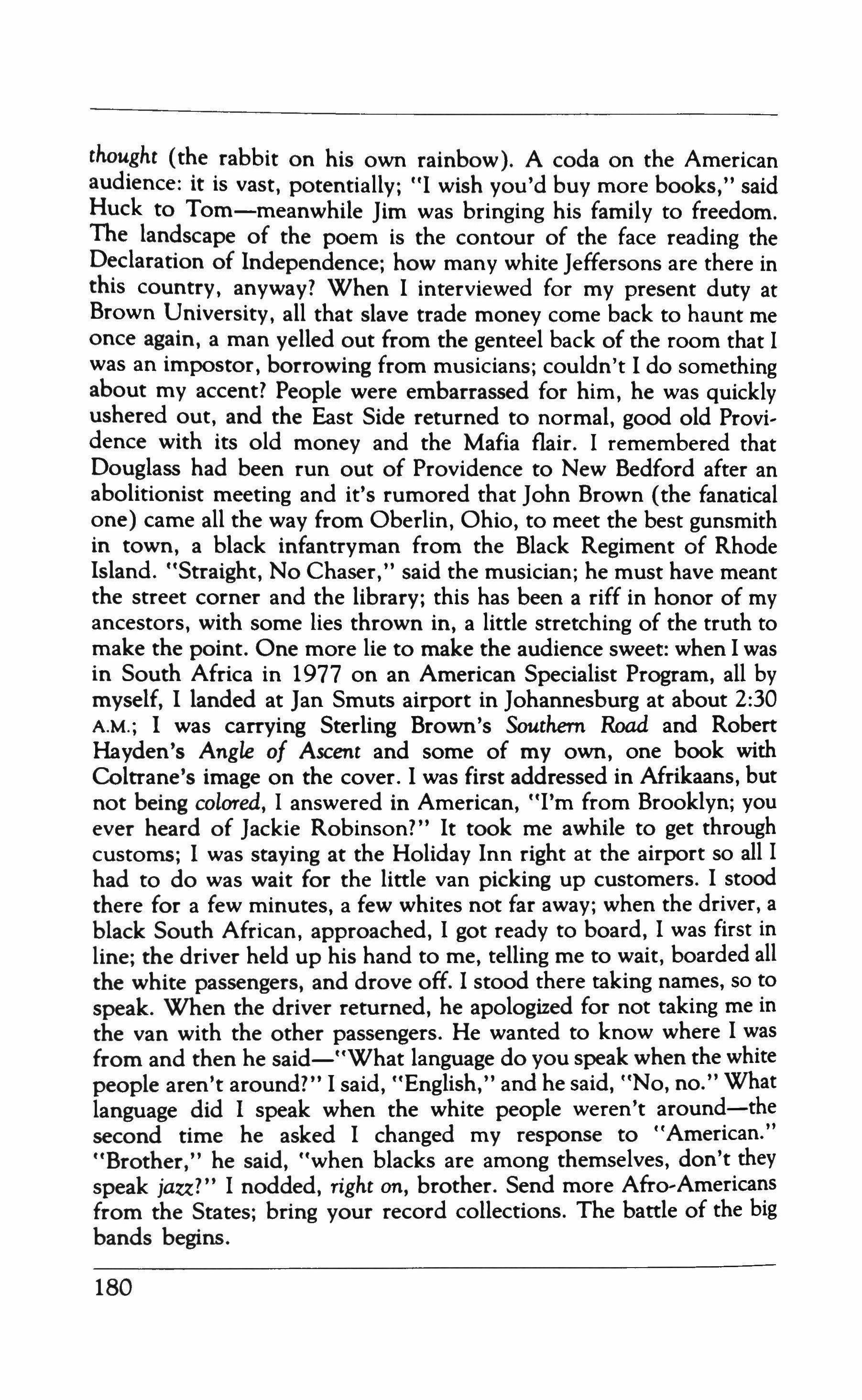
thought (the rabbit on his own rainbow). A coda on the American audience: it is vast, potentially; "I wish you'd buy more books," said Huck to Tom-meanwhile Jim was bringing his family to freedom. The landscape of the poem is the contour of the face reading the Declaration of Independence; how many white Jeffersons are there in this country, anyway? When I interviewed for my present duty at Brown University, all that slave trade money come back to haunt me once again, a man yelled out from the genteel back of the room that I was an impostor, borrowing from musicians; couldn't I do something about my accent? People were embarrassed for him, he was quickly ushered out, and the East Side returned to normal, good old Providence with its old money and the Mafia flair. I remembered that Douglass had been run out of Providence to New Bedford after an abolitionist meeting and it's rumored that John Brown (the fanatical one) came all the way from Oberlin, Ohio, to meet the best gunsmith in town, a black infantryman from the Black Regiment of Rhode Island. "Straight, No Chaser," said the musician; he must have meant the street corner and the library; this has been a riff in honor of my ancestors, with some lies thrown in, a little stretching of the truth to make the point. One more lie to make the audience sweet: when I was in South Africa in 1977 on an American Specialist Program, all by myself, I landed at Jan Smuts airport in Johannesburg at about 2:30
A.M.; I was carrying Sterling Brown's Southern Road and Robert Hayden's Angle of Ascent and some of my own, one book with Coltrane's image on the cover. I was first addressed in Afrikaans, but not being colored, I answered in American, "I'm from Brooklyn; you ever heard of Jackie Robinson?" It took me awhile to get through customs; I was staying at the Holiday Inn right at the airport so all I had to do was wait for the little van picking up customers. I stood there for a few minutes, a few whites not far away; when the driver, a black South African, approached, I got ready to board, I was first in line; the driver held up his hand to me, telling me to wait, boarded all the white passengers, and drove off. I stood there taking names, so to speak. When the driver returned, he apologized for not taking me in the van with the other passengers. He wanted to know where I was from and then he said-"What language do you speak when the white people aren't around?" I said, "English," and he said, "No, no." What language did I speak when the white people weren't around-the second time he asked I changed my response to "American." "Brother," he said, "when blacks are among themselves, don't they speak jatt?" I nodded, right on, brother. Send more Afro-Americans from the States; bring your record collections. The battle of the big bands begins.
180
Letter to an imaginary friend: Christmas section (III)
Thomas McGrath
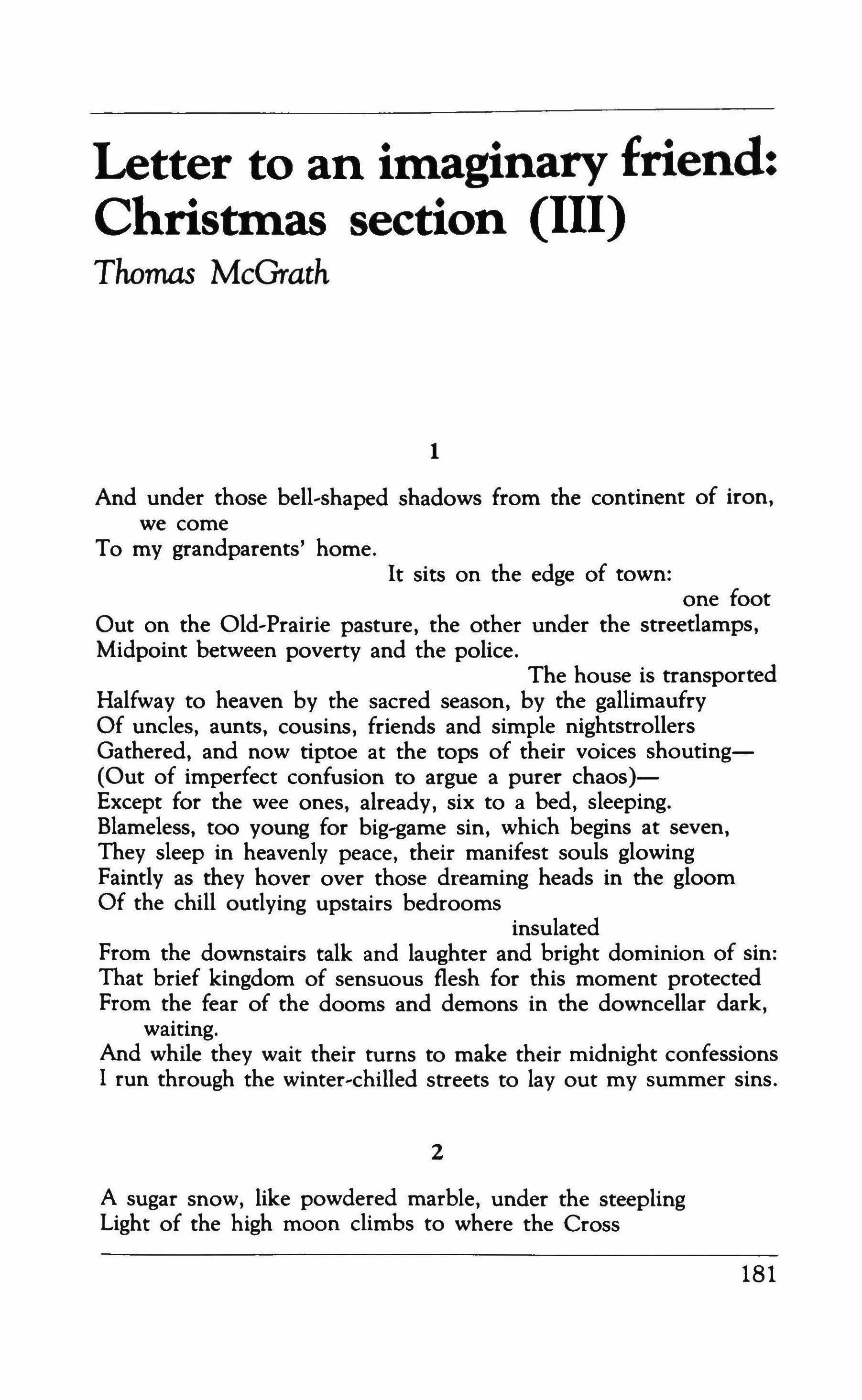
1
And under those bell-shaped shadows from the continent of iron, we come
To my grandparents' home. It sits on the edge of town: one foot
Out on the Old-Prairie pasture, the other under the streetlamps, Midpoint between poverty and the police. The house is transported Halfway to heaven by the sacred season, by the gallimaufry Of uncles, aunts, cousins, friends and simple nightstrollers Gathered, and now tiptoe at the tops of their voices shouting(Out of imperfect confusion to argue a purer chaos)-
Except for the wee ones, already, six to a bed, sleeping. Blameless, too young for big-game sin, which begins at seven, They sleep in heavenly peace, their manifest souls glowing Faintly as they hover over those dreaming heads in the gloom Of the chill outlying upstairs bedrooms insulated
From the downstairs talk and laughter and bright dominion of sin: That brief kingdom of sensuous flesh for this moment protected From the fear of the dooms and demons in the downcellar dark, waiting.
And while they wait their turns to make their midnight confessions I run through the winter-chilled streets to layout my summer sins.
2
A sugar snow, like powdered marble, under the steepling Light of the high moon climbs to where the Cross
181
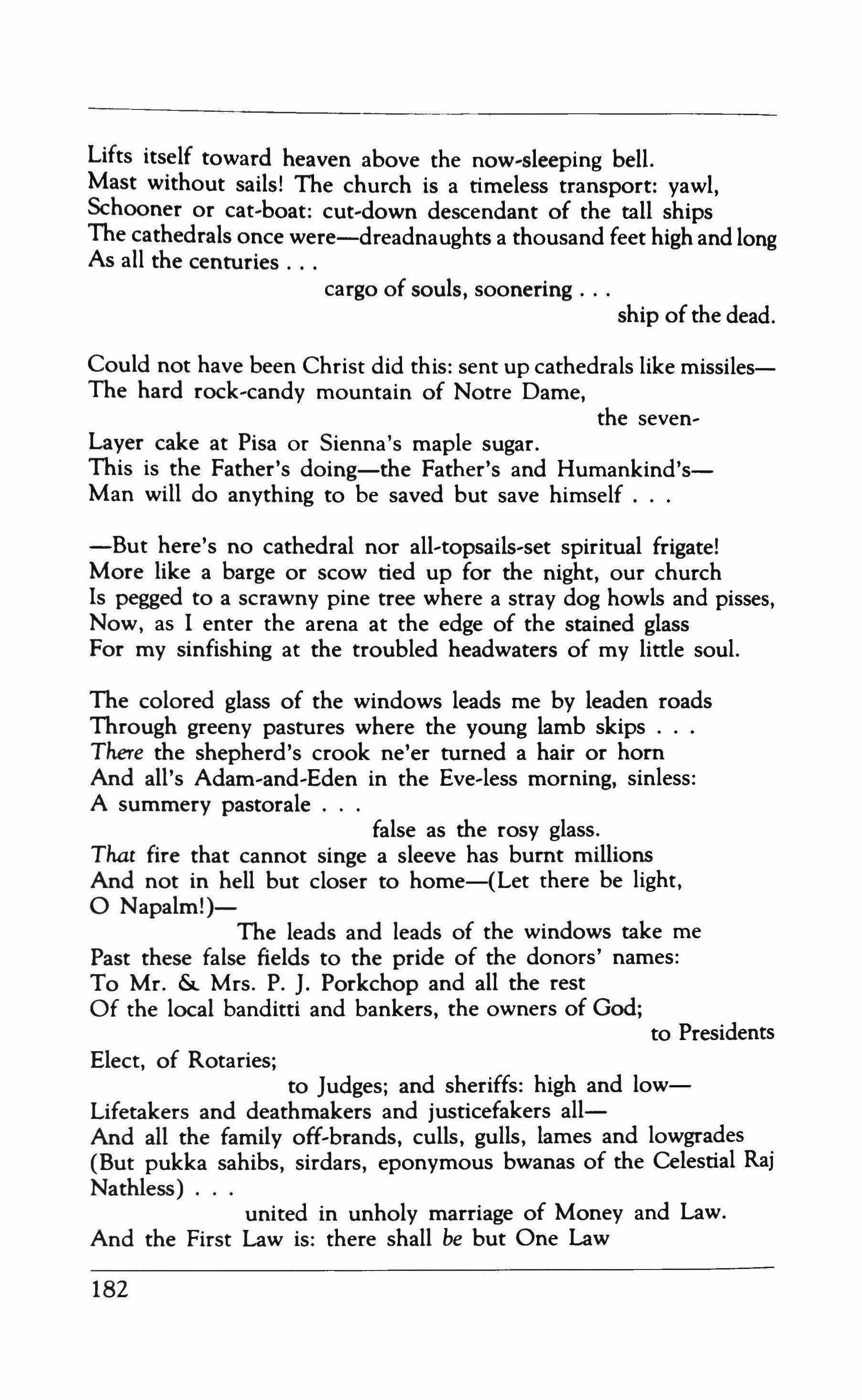
Lifts itself toward heaven above the now-sleeping bell.
Mast without sails! The church is a timeless transport: yawl, Schooner or cat-boat: cut-down descendant of the tall ships The cathedrals once were-dreadnaughts a thousand feet high and long As all the centuries cargo of souls, soonering ship of the dead.
Could not have been Christ did this: sent up cathedrals like missilesThe hard rock-candy mountain of Notre Dame, the seven-
Layer cake at Pisa or Sienna's maple sugar. This is the Father's doing-the Father's and Humankind'sMan will do anything to be saved but save himself
-But here's no cathedral nor all-topsails-set spiritual frigate! More like a barge or scow tied up for the night, our church Is pegged to a scrawny pine tree where a stray dog howls and pisses, Now, as I enter the arena at the edge of the stained glass For my sinfishing at the troubled headwaters of my little soul.
The colored glass of the windows leads me by leaden roads Through greeny pastures where the young lamb skips There the shepherd's crook ne'er turned a hair or horn And all's Adam-and-Eden in the Eve-less morning, sinless: A summery pastorale false as the rosy glass. That fire that cannot singe a sleeve has burnt millions And not in hell but closer to home-(Let there be light, o Napalm!)-
The leads and leads of the windows take me Past these false fields to the pride of the donors' names:
To Mr. & Mrs. P. J. Porkchop and all the rest Of the local banditti and bankers, the owners of God; to Presidents
Elect, of Rotaries; to Judges; and sheriffs: high and low
Lifetakers and deathmakers and justicefakers allAnd all the family off-brands, culls, gulls, lames and lowgrades (But pukka sahibs, sirdars, eponymous bwanas of the Celestial Raj Nathless)
united in unholy marriage of Money and Law. And the First Law is: there shall be but One Law
182
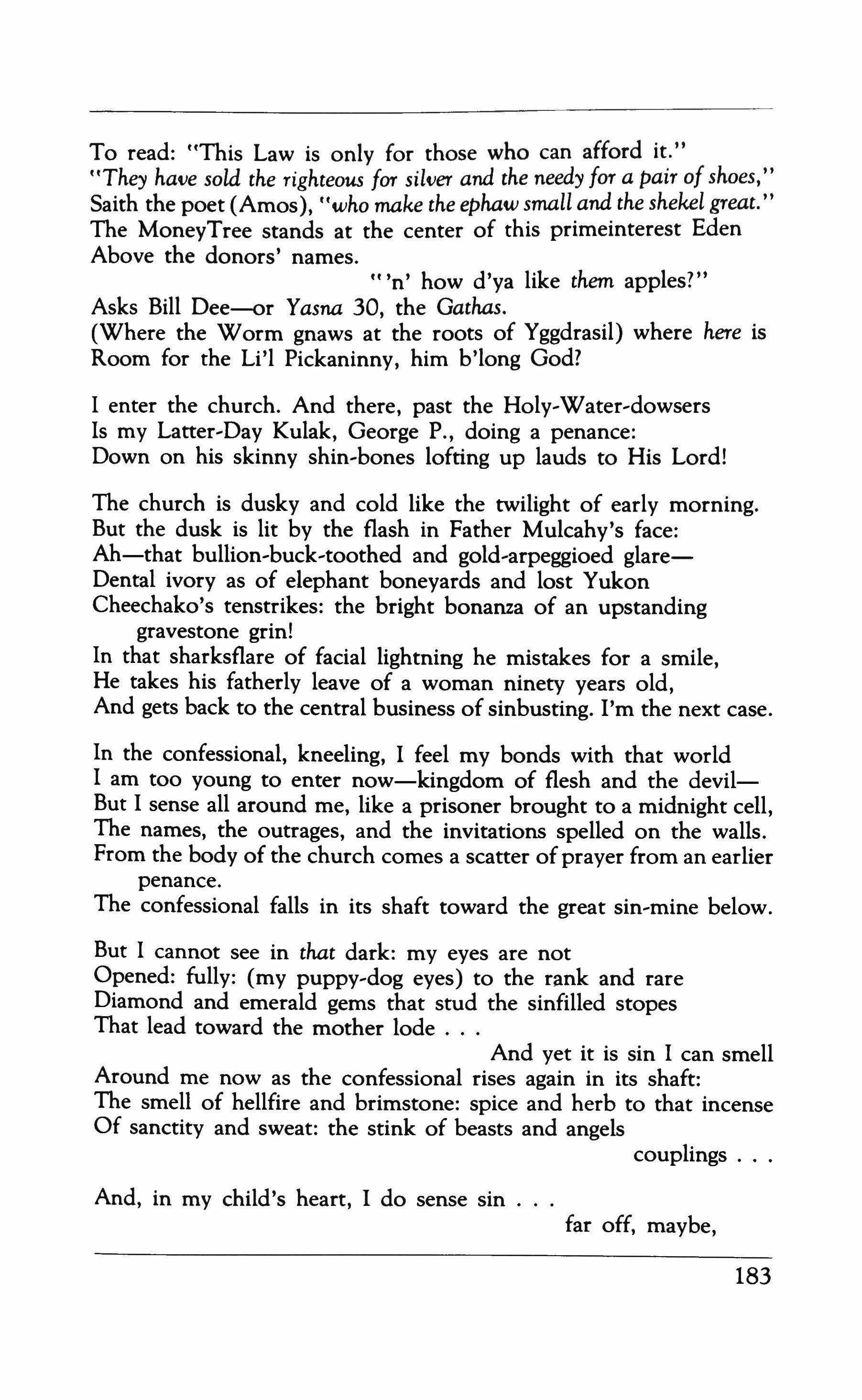
To read: "This Law is only for those who can afford it."
"They have sold the righteous for silver and the needy for a pair ofshoes," Saith the poet (Amos), "who make the ephaw small and the shekel great." The MoneyTree stands at the center of this primeinterest Eden Above the donors I names. "'n' how d'ya like them apples?"
Asks Bill Dee-or Yasna 30, the Gathas.
(Where the Worm gnaws at the roots of Yggdrasil) where here is Room for the Li'l Pickaninny, him b'long God?
I enter the church. And there, past the Holv-Water�dowsers Is my Latter-Day Kulak, George P., doing a penance: Down on his skinny shin-bones lofting up lauds to His Lord!
The church is dusky and cold like the twilight of early morning. But the dusk is lit by the flash in Father Mulcahy's face: Ah-that bullion-buck-toothed and gold-arpeggioed glareDental ivory as of elephant boneyards and lost Yukon Cheechako's tenstrikes: the bright bonanza of an upstanding gravestone grin! In that sharksflare of facial lightning he mistakes for a smile, He takes his fatherly leave of a woman ninety years old, And gets back to the central business of sinbusting. I'm the next case.
In the confessional, kneeling, I feel my bonds with that world I am too young to enter now-kingdom of flesh and the devilBut I sense all around me, like a prisoner brought to a midnight cell, The names, the outrages, and the invitations spelled on the walls. From the body of the church comes a scatter ofprayer from an earlier penance.
The confessional falls in its shaft toward the great sin-mine below.
But I cannot see in that dark: my eyes are not Opened: fully: (my puppy-dog eyes) to the rank and rare Diamond and emerald gems that stud the sinfilled stopes That lead toward the mother lode
And yet it is sin I can smell Around me now as the confessional rises again in its shaft: The smell of hellfire and brimstone: spice and herb to that incense Of sanctity and sweat: the stink of beasts and angels couplings
And, in my child's heart, I do sense sin far off, maybe,
183
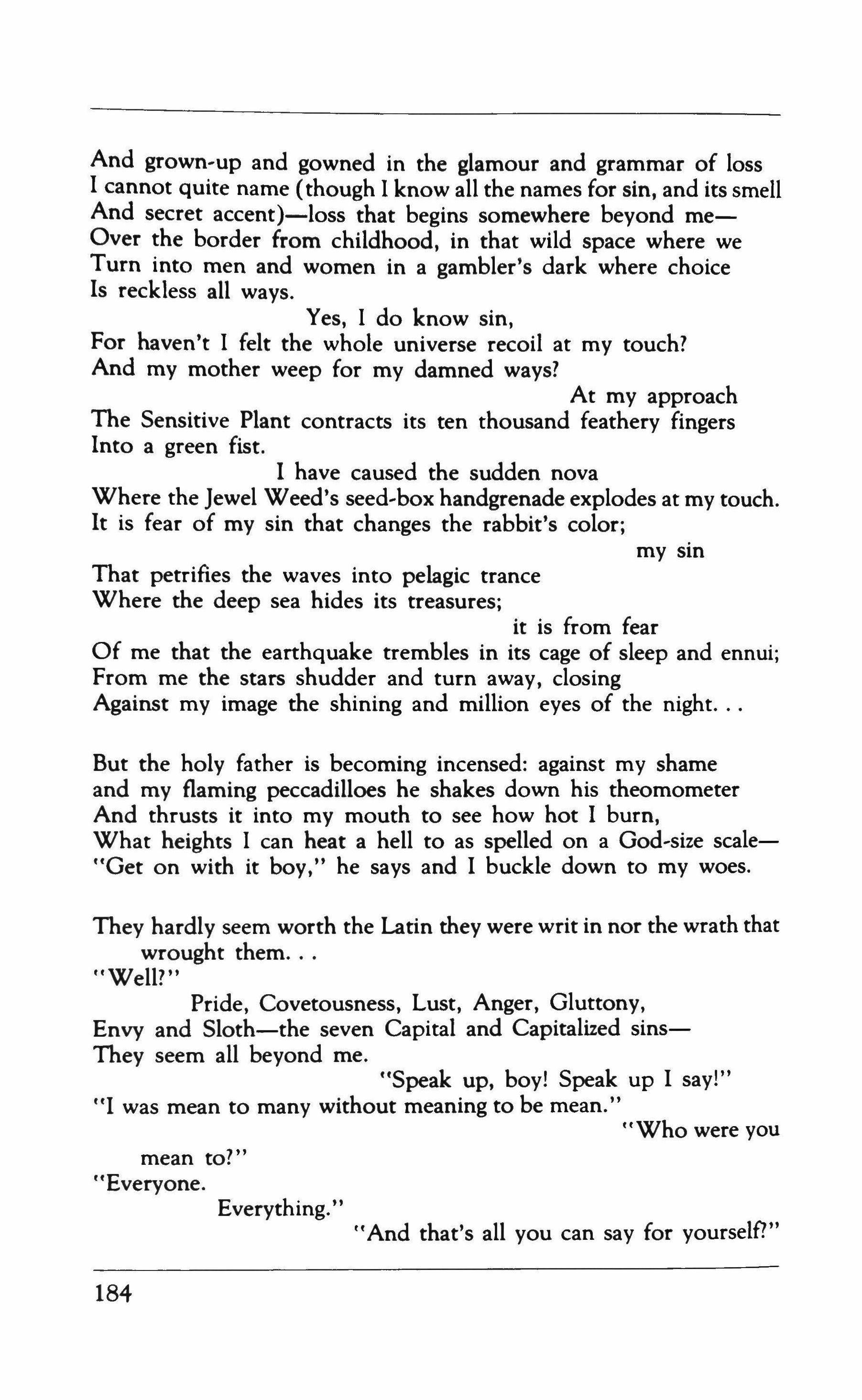
And grown-up and gowned in the glamour and grammar of loss I cannot quite name (though I know all the names for sin, and its smell And secret accent)-loss that begins somewhere beyond meOver the border from childhood, in that wild space where we Turn into men and women in a gambler's dark where choice Is reckless all ways.
Yes, I do know sin, For haven't I felt the whole universe recoil at my touch? And my mother weep for my damned ways?
At my approach
The Sensitive Plant contracts its ten thousand feathery fingers Into a green fist.
I have caused the sudden nova
Where the Jewel Weed's seed-box handgrenade explodes at my touch. It is fear of my sin that changes the rabbit's color; my sin
That petrifies the waves into pelagic trance Where the deep sea hides its treasures; it is from fear Of me that the earthquake trembles in its cage of sleep and ennui; From me the stars shudder and turn away, closing Against my image the shining and million eyes of the night
But the holy father is becoming incensed: against my shame and my flaming peccadilloes he shakes down his theomometer And thrusts it into my mouth to see how hot I burn, What heights I can heat a hell to as spelled on a God-size scale"Get on with it boy," he says and I buckle down to my woes.
They hardly seem worth the Latin they were writ in nor the wrath that wrought them "Well?"
Pride, Covetousness, Lust, Anger, Gluttony, Envy and Sloth-the seven Capital and Capitalized sinsThey seem all beyond me.
"Speak up, boy! Speak up I say!" "I was mean to many without meaning to be mean."
"Who were you mean to?"
"Everyone. Everything. "And that's all you can say for yourselfl"
184
What could be worse?
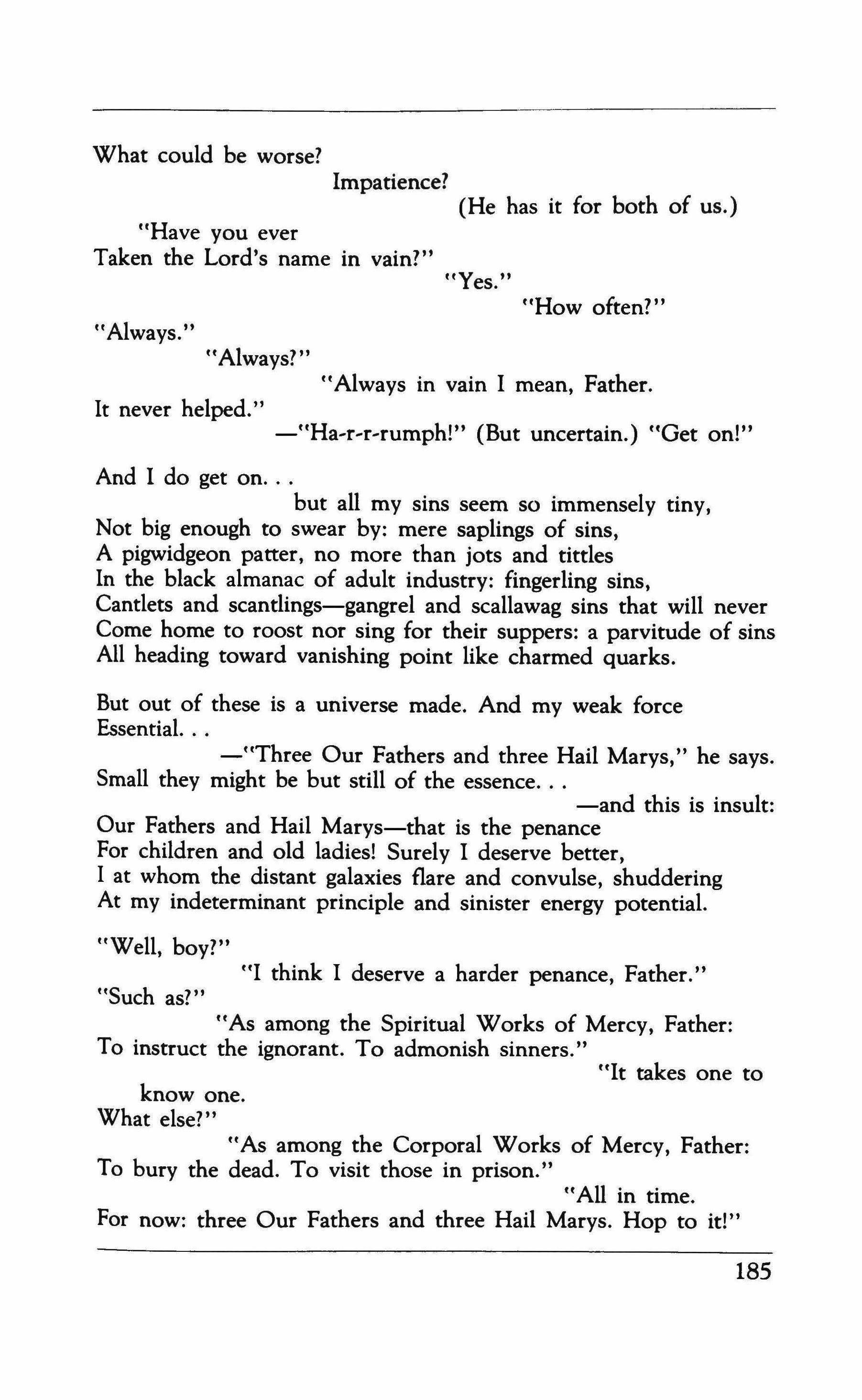
Impatience?
"Have you ever Taken the Lord's name in vain?"
"Always. " "Always?
(He has it for both of us.)
"How often?"
"Always in vain I mean, Father. It never helped."
-"Ha-r-r-rumph!" (But uncertain.) "Get on!"
And I do get on
but all my sins seem so immensely tiny, Not big enough to swear by: mere saplings of sins, A pigwidgeon patter, no more than jots and tittles In the black almanac of adult industry: fingerling sins, Cantlets and scantlings-gangrel and scallawag sins that will never Come home to roost nor sing for their suppers: a parvitude of sins All heading toward vanishing point like charmed quarks.
But out of these is a universe made. And my weak force Essential.
-"Three Our Fathers and three Hail Marys," he says. Small they might be but still of the essence -and this is insult: Our Fathers and Hail Marys-that is the penance For children and old ladies! Surely I deserve better, I at whom the distant galaxies flare and convulse, shuddering At my indeterminant principle and sinister energy potential.
It Well, boy?"
"I think I deserve a harder penance, Father." "Such as?"
"As among the Spiritual Works of Mercy, Father: To instruct the ignorant. To admonish sinners."
"It takes one to know one. What else?"
"As among the Corporal Works of Mercy, Father: To bury the dead. To visit those in prison." "All in time.
For now: three Our Fathers and three Hail Marys. Hop to it!"
185
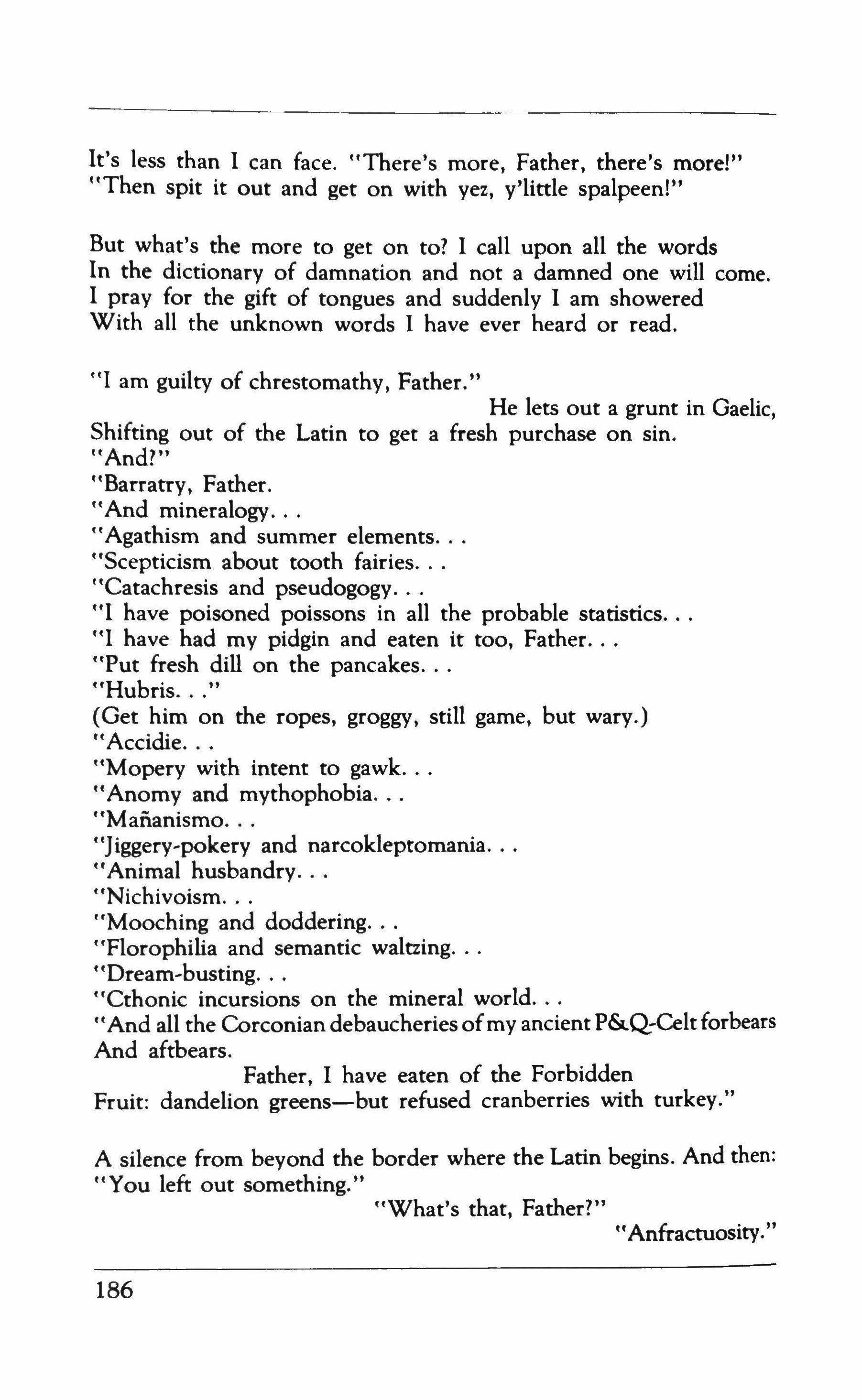
It's less than I can face. "There's more, Father, there's more!"
"Then spit it out and get on with yez, y'little spalpeenl"
But what's the more to get on to? I call upon all the words In the dictionary of damnation and not a damned one will come. I pray for the gift of tongues and suddenly I am showered With all the unknown words I have ever heard or read.
"I am guilty of chrestomathy, Father."
He lets out a grunt in Gaelic, Shifting out of the Latin to get a fresh purchase on sin.
"And?"
"Barratry, Father.
"And mineralogy.
"Agathisrn and summer elements
"Scepticism about tooth fairies
"Catachresis and pseudogogy
"I have poisoned poissons in all the probable statistics
"I have had my pidgin and eaten it too, Father
"Put fresh dill on the pancakes
"Hubris "
(Get him on the ropes, groggy, still game, but wary.)
"Accidie
"Moperv with intent to gawk
"Anomy and mythophobia
"Mafianismo
"jiggerv-pokerv and narcokleptomania
"Animal husbandry
"Nichivoisrn
"Mooching and doddering
"Florophilia and semantic waltzing
"Dream-busting
"Cthonic incursions on the mineral world
"And all the Corconian debaucheries ofmy ancient P&QCelt forbears And aftbears.
Father, I have eaten of the Forbidden Fruit: dandelion greens-but refused cranberries with turkey."
A silence from beyond the border where the Latin begins. And then: "You left out something."
"What's that, Father?"
"Anfractuosity. "
186
"What's That, Father?"
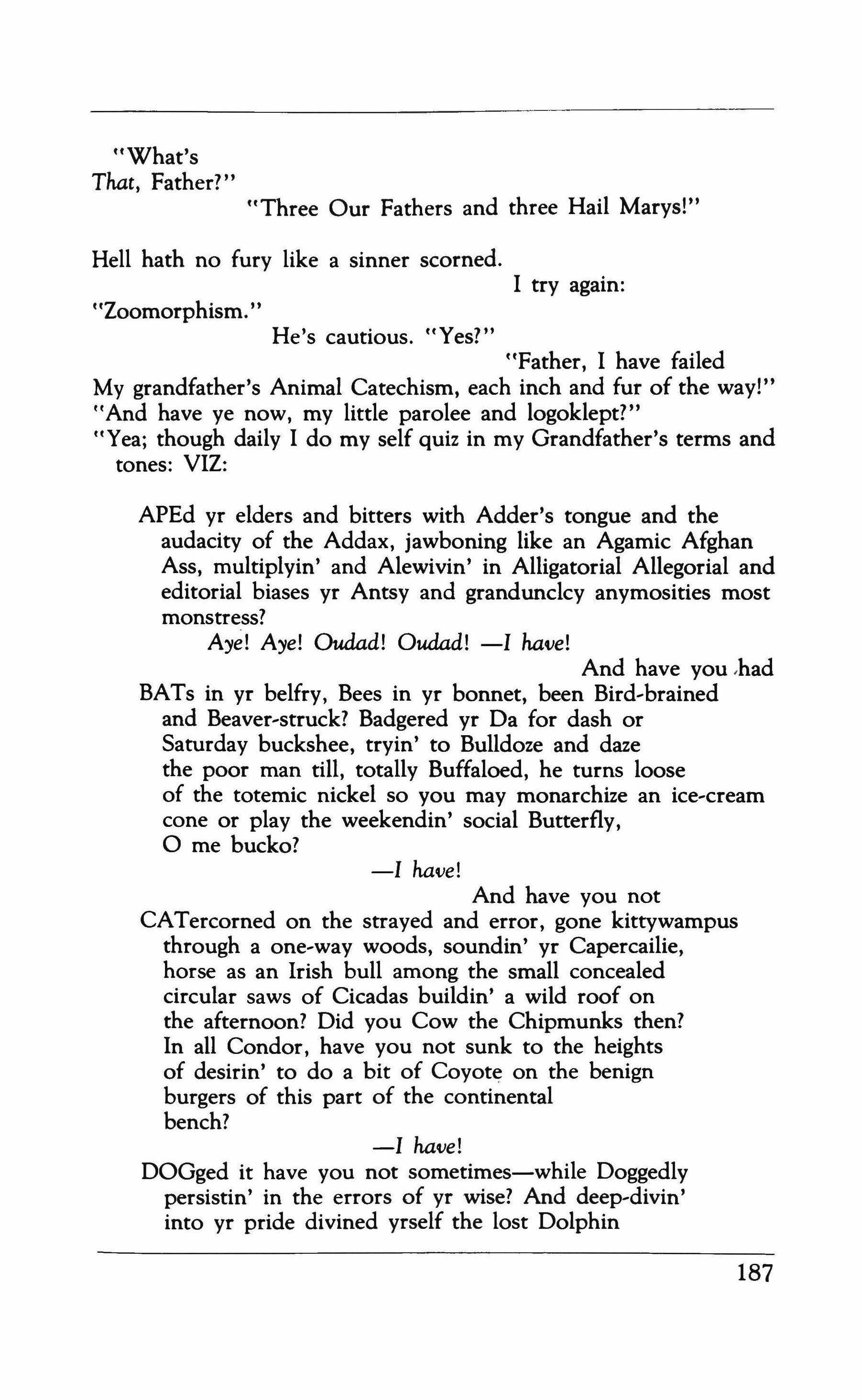
"Three Our Fathers and three Hail Marys!"
Hell hath no fury like a sinner scorned. I try again:
"Zoomorphism, He's cautious. "Yes?"
"Father, I have failed My grandfather's Animal Catechism, each inch and fur of the way!"
"And have ye now, my little parolee and logoklept?"
"Yea; though daily I do my self quiz in my Grandfather's terms and tones: VIZ:
APEd yr elders and bitters with Adder's tongue and the audacity of the Addax, jawboning like an Agamic Afghan Ass, multiplyin' and Alewivin' in Alligatorial Allegorial and editorial biases yr Antsy and grandunclcy anymosities most monstress?
Aye! Aye! Oudad! Oudad! -I have! And have you .had BATs in yr belfry, Bees in yr bonnet, been Bird-brained and Beaver-struck! Badgered yr Da for dash or Saturday buckshee, tryin' to Bulldoze and daze the poor man till, totally Buffaloed, he turns loose of the totemic nickel so you may monarchize an ice-cream cone or play the weekendin' social Butterfly, o me bucko?
-I have!
And have you not CATercorned on the strayed and error, gone kittywampus through a one-way woods, soundin' yr Capercailie, horse as an Irish bull among the small concealed circular saws of Cicadas buildin' a wild roof on the afternoon? Did you Cow the Chipmunks then? In all Condor, have you not sunk to the heights of desirin' to do a bit of Coyote on the benign burgers of this part of the continental bench?
-I have!
DOGged it have you not sometimes-while Doggedly persistin' in the errors of yr wise? And deep-divin' into yr pride divined yrself the lost Dolphin
187
of pelagic palatinates, their depth-soundin' economies dumbfoundered on the tides of sweat from drowned sailors-and ye never guessed why the sea was salt?
-1 have!
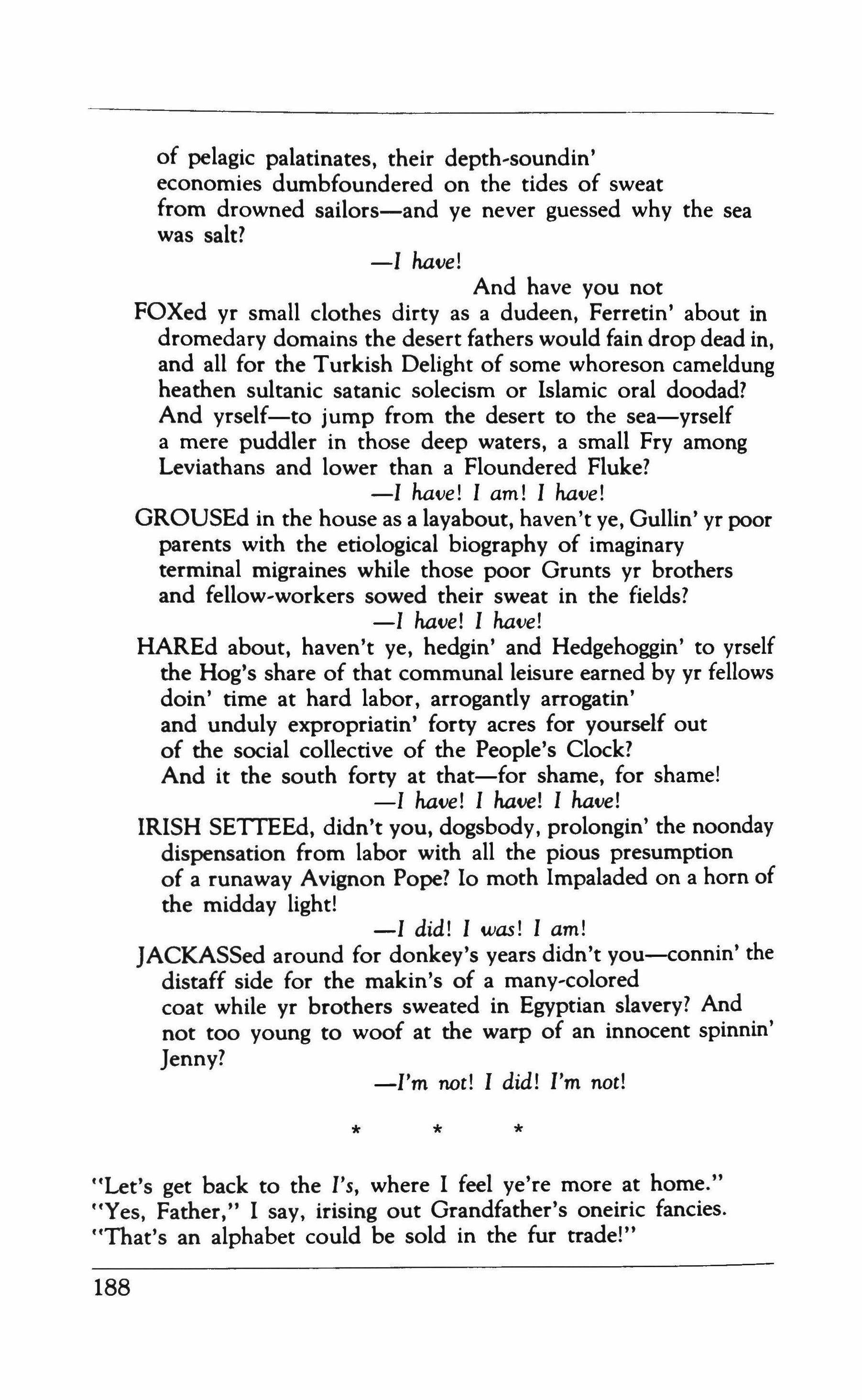
And have you not
FOXed yr small clothes dirty as a dudeen, Ferretin' about in dromedary domains the desert fathers would fain drop dead in, and all for the Turkish Delight of some whoreson cameldung heathen sultanic satanic solecism or Islamic oral doodad? And yrself-to jump from the desert to the sea-yrself a mere puddler in those deep waters, a small Fry among Leviathans and lower than a Floundered Fluke?
-1 have! 1 am! 1 have!
GROUSEd in the house as a layabout, haven't ye, Gullin' yr poor parents with the etiological biography of imaginary terminal migraines while those poor Grunts yr brothers and fellow-workers sowed their sweat in the fields?
-1 have! 1 have!
HAREd about, haven't ye, hedgin' and Hedgehoggin' to yrself the Hog's share of that communal leisure earned by yr fellows doin' time at hard labor, arrogantly arrogatin' and unduly expropriatin' forty acres for yourself out of the social collective of the People's Clock? And it the south forty at that-for shame, for shame!
-1 have! I have! 1 have!
IRISH SETIEEd, didn't you, dogsbodv, prolongin' the noonday dispensation from labor with all the pious presumption of a runaway Avignon Pope? 10 moth lmpaladed on a horn of the midday light!
-I did! I was! I am!
JACKASSed around for donkey's years didn't you-connin' the distaff side for the makin's of a many-colored coat while yr brothers sweated in Egyptian slavery? And not too young to woof at the warp of an innocent spinnin' Jenny?
-I'm not! 1 did! I'm not! * * *
"Let's get back to the I's, where I feel ye're more at home." "Yes, Father," I say, irising out Grandfather's oneiric fancies. "That's an alphabet could be sold in the fur trade!"
188
He says. Further, I think, Father; or farther than sin.
"Ye're livin' aloft, my son-yer 'I' 's high as the mountains ofMourne. But we'll all come down as low as the Red River River Valley In time."
(As the Worm gnaws at the roots of YggdrasilIn time.) Aye.
"Father? -Gimme my penance, Father."
"Three Our Fathers and three Hail Mary's-and get ye gone!"
And I'm out on the street-should have been: all the Stations of the Cross-
Cut your own timber and bring your own hammer and nails! But I bow to my piddling penance. Then, in the darkly shining, In the bell-surrounded night I run for my Grandfather's barn.
3
I remember it from Sunday visits in the long days of the summer: The rafters furry with moss and the brightmetal harness bosses Blurred with rust from the lack of use-Grandfather, retired, Retired his team to the pasture except for sacred occasions. Now, in lantern shine-color of straw and SeptemberThe rafters drip with the white milk of the frost.
The men

Sit in an empty stall on whiskery bales of hay. They spit and smoke.
A bottle of moonshine roves, slowly, From hand to hand, the circle. They'll still be "fasting from midnight" When they go to sup on the bread and wine ofthis night's communion.
It is the hour when the animals knelt and the Wise Men came. We're all in waiting but no one awaits.
In the Hour of the Beasts No knee knelt never.
Out of the dark
Of a far stall a stallion farts and stales. A rainy sound of pee-summery-and geldings snort and stomp And a mare whinnys-but the stud's too old to remember.
189
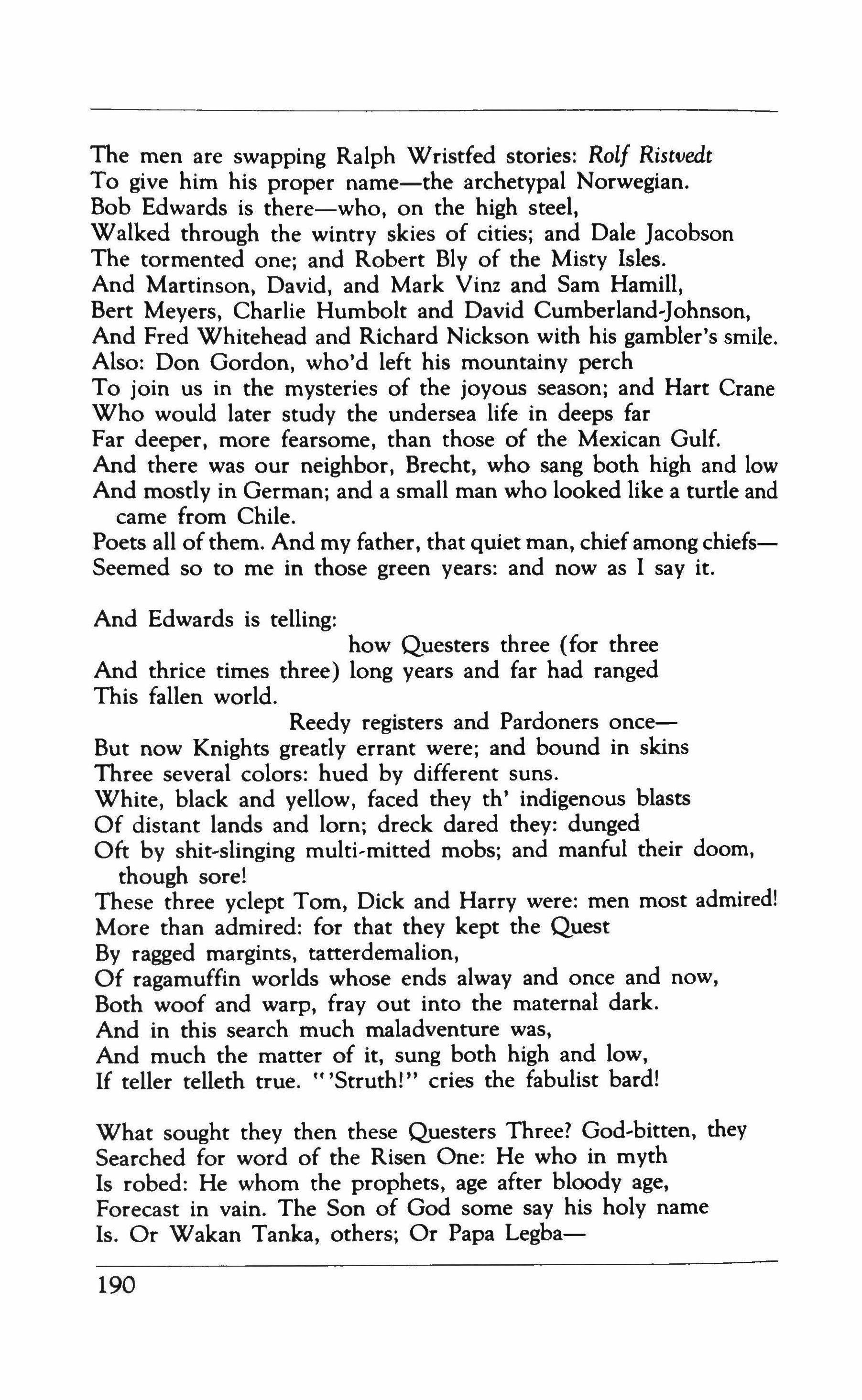
The men are swapping Ralph Wristfed stories: Rolf Ristvedt
To give him his proper name-the archetypal Norwegian. Bob Edwards is there-who, on the high steel, Walked through the wintry skies of cities; and Dale Jacobson The tormented one; and Robert Bly of the Misty Isles.
And Martinson, David, and Mark Vinz and Sam Hamill, Bert Meyers, Charlie Humbolt and David Cumberland-johnson, And Fred Whitehead and Richard Nickson with his gambler's smile. Also: Don Gordon, who'd left his mountainy perch
To join us in the mysteries of the joyous season; and Hart Crane Who would later study the undersea life in deeps far Far deeper, more fearsome, than those of the Mexican Gulf. And there was our neighbor, Brecht, who sang both high and low And mostly in German; and a small man who looked like a turtle and came from Chile.
Poets all of them. And my father, that quiet man, chief among chiefsSeemed so to me in those green years: and now as I say it.
And Edwards is telling: how Questers three (for three And thrice times three) long years and far had ranged This fallen world.
Reedy registers and Pardoners onceBut now Knights greatly errant were; and bound in skins
Three several colors: hued by different suns. White, black and yellow, faced they th' indigenous blasts Of distant lands and lorn; dreck dared they: dunged Oft by shit-slinging rnulti-rnitted mobs; and manful their doom, though sore!
These three yclept Tom, Dick and Harry were: men most admired! More than admired: for that they kept the Quest By ragged margints, tatterdemalion, Of ragamuffin worlds whose ends alway and once and now, Both woof and warp, fray out into the maternal dark. And in this search much maladventure was, And much the matter of it, sung both high and low, If teller telleth true. tI 'Struth!" cries the fabulist bard!
What sought they then these Questers Three? God-bitten, they Searched for word of the Risen One: He who in myth Is robed: He whom the prophets, age after bloody age, Forecast in vain. The Son of God some say his holy name Is. Or Wakan Tanka, others; Or Papa Legba-
190
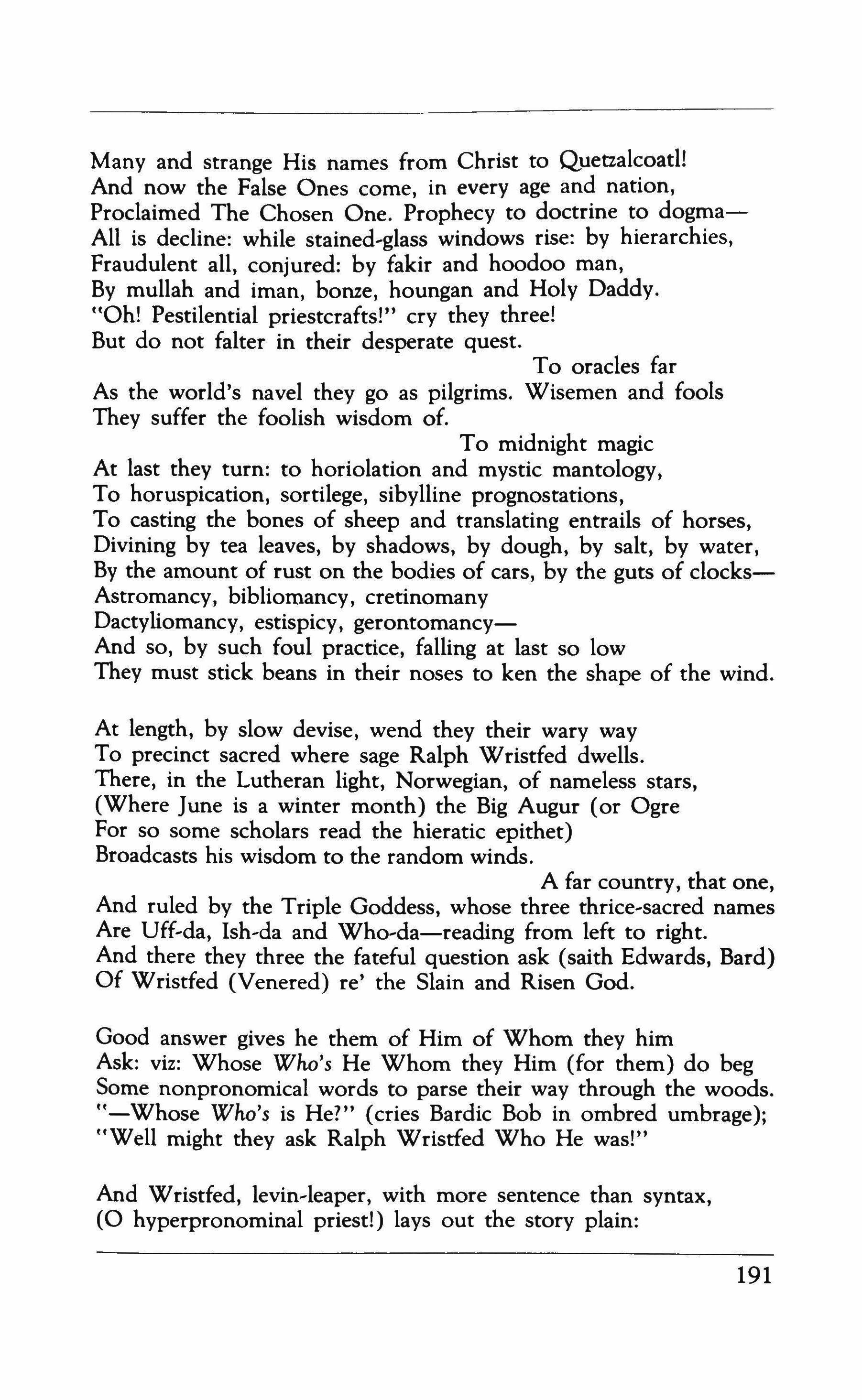
Many and strange His names from Christ to Quetzalcoarl! And now the False Ones come, in every age and nation, Proclaimed The Chosen One. Prophecy to doctrine to dogmaAll is decline: while stained-glass windows rise: by hierarchies, Fraudulent all, conjured: by fakir and hoodoo man, By mullah and iman, bonze, houngan and Holy Daddy.
UOh! Pestilential priestcrafts!" cry they three! But do not falter in their desperate quest.
To oracles far
As the world's navel they go as pilgrims. Wisemen and fools They suffer the foolish wisdom of.
To midnight magic
At last they turn: to horiolation and mystic mantology, To horuspication, sortilege, sibylline prognostations, To casting the bones of sheep and translating entrails of horses, Divining by tea leaves, by shadows, by dough, by salt, by water, By the amount of rust on the bodies of cars, by the guts of clocksAstromancy, bibliomancy, cretinomany Dactyliomancy, estispicy, gerontomancyAnd so, by such foul practice, falling at last so low They must stick beans in their noses to ken the shape of the wind.
At length, by slow devise, wend they their wary way To precinct sacred where sage Ralph Wristfed dwells. There, in the Lutheran light, Norwegian, of nameless stars, (Where June is a winter month) the Big Augur (or Ogre For so some scholars read the hieratic epithet) Broadcasts his wisdom to the random winds.
A far country, that one, And ruled by the Triple Goddess, whose three thrice-sacred names Are Uff-da, Ish-da and Who,da-reading from left to right. And there they three the fateful question ask (saith Edwards, Bard) Of Wristfed (Venered) re' the Slain and Risen God.
Good answer gives he them of Him of Whom they him Ask: viz: Whose Who's He Whom they Him (for them) do beg Some nonpronomical words to parse their way through the woods. u-Whose Who's is He?" (cries Bardic Bob in ombred umbrage); "Well might they ask Ralph Wristfed Who He was!"
And Wristfed, levin-leaper, with more sentence than syntax, (0 hyperpronominal priest!) lays out the story plain:
191
How man killed God; how the dead God, in a cave, was walled; (Ah, stony limits!)
but how, on that third day, at dawn, Lo! He riseth! He shineth! The heavens are rolled asunder!
"We see the Light!" The Questors cry. But Wristfed, loath Too much to cheer them, says: HIt is the light He fears: For if His shadow Self He sees, He goes back in II "Back in the cave!" they cry. "And then?"
Quoth Wristfed: "Then Then-well, it's six weeks more hard winter, Gentlemen!"
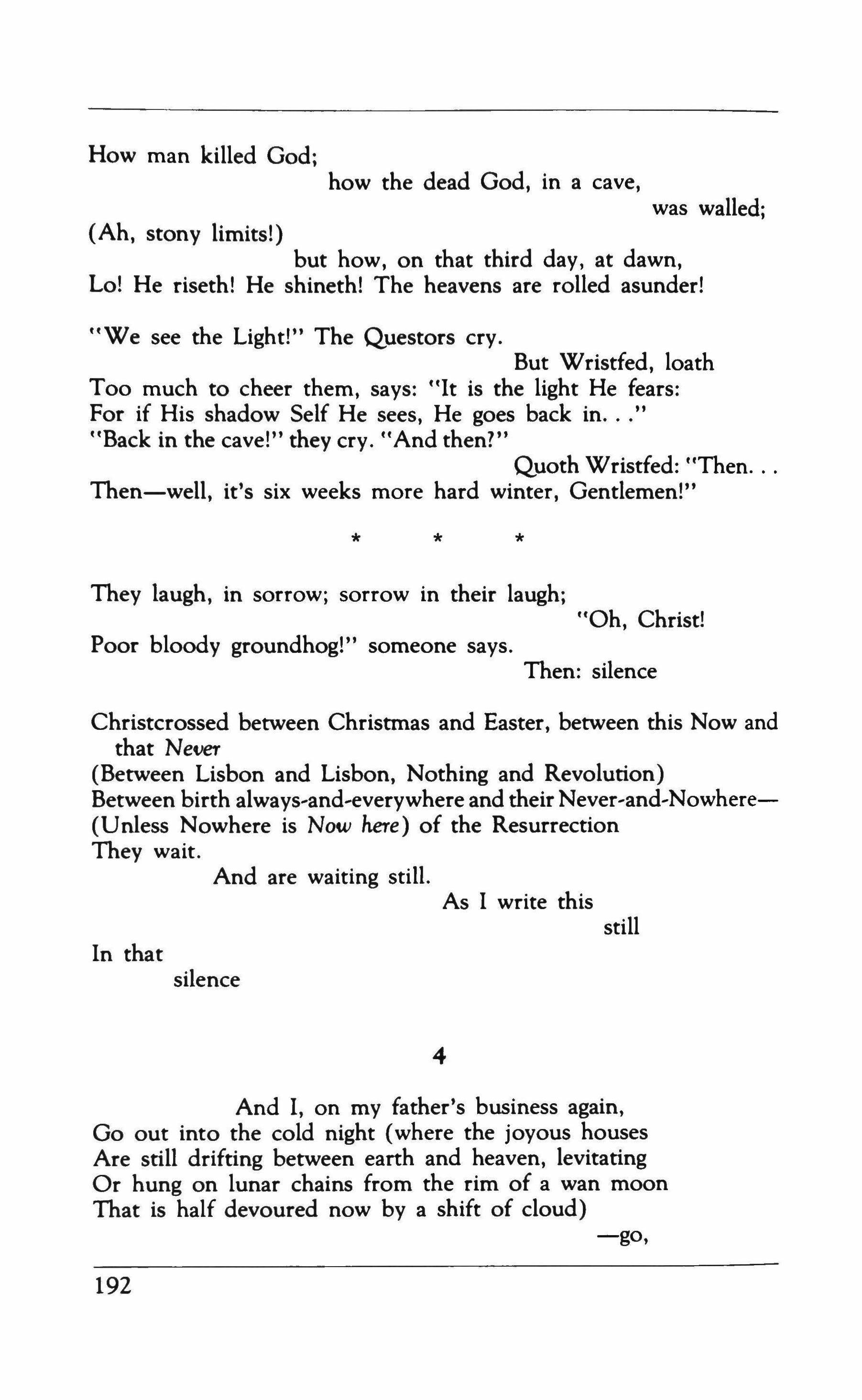
They laugh, in sorrow; sorrow in their laugh; "Oh, Christ! Poor bloody groundhog!" someone says. Then: silence
Christcrossed between Christmas and Easter, between this Now and that Never (Between Lisbon and Lisbon, Nothing and Revolution) Between birth alwavs-and-evervwhere and their Never-and-Nowhere-> (Unless Nowhere is Now here) of the Resurrection They wait. And are waiting still.
As I write this still
In that silence 4
And I, on my father's business again, Go out into the cold night (where the joyous houses Are still drifting between earth and heaven, levitating Or hung on lunar chains from the rim of a wan moon That is half devoured now by a shift of cloud) -go,
* * *
192
As my father bids me, to find his friend, the man I know as Cal, (Who is wintering over with us in one of the hard years)
And ask if he wants to ride out after mass and have Christmas with us. "He's got this girl," my father says. (And we both nod.)
"He may want to stay with her, you see. No, you don't, I guess But I nod and he smiles. "And as for goin' to mass, well he Would avoid it like the devil shuns holy water," we say in chorus. "Ah, but there's faster ways to heaven than walkin' on your knees, my son!
(But don't tell your mother I said it!) And Cal's a good man, the best."
Maybe he is; but I don't know that, yet.
I'm still Green ("in the savannas of my years, the blithe and fooling times")
Before my baptism in the fields of work and want and class war, Before Cal was confirmed my brother, teacher and comrade In the round dance and struggle that continues as long as we do.

On a mission of armed revolutionary memory! (But I don't know that yet.)
I go my little way through the ice-black streets, Empty, of the dreaming and joyful town.
A cranky and fitful wind, Backing and filling, lifts a scrim of scene-shifting snow And the streets disappear, reappear, open and close like a maze. Or like a dog-barking navigator, hugging the coast, I take my bearings by sound, hearing the Burnses' cow Unspool the cud of her Christmas silence with a long moo, Or a musical bar of indignant song, a night-blooming rooster Cock-alarming the town from down on its southern shore.
I came to the house through the backyard, past rosebower and bvre Where something breathing and probably brown snorts and shifts, Rubbing the barnwall interior dark. (It was not, I think, Not the Mithraic bull, though his time is Christmas too.)
At the backdoor steps, old toothless terror, a dog's on guard, Chained to the property he's too worn out to protectPoor beast all hide and howl, but he summons Cal to the door.
The house is that of a retired banker-doubly retired
* * *
193

In the season when money retires to the shores of its tropical south. Only the help is at home-the maid: Cal's girl, who holds The keys to this mouldering Plutonic mansion. When Master's away The maid will play! (And the Wandering Man will have his day!) She has the key to the house and they both have keys to each otherI sense this, seeing their faces [cut-outs against the light Where the banker's birch logs flare in the open fireplace flue)Faces flushed with a secret content I'm too young to desire, And a little, maybe, with drink from the Mason jar of moon.
"And so," says Cal, "it's the birthday of poor old Jerusalem Slim, The Galillean gandv-dancer and Olympic water walkin' champ! And the pious are slappin' their chests and singin' their vou-Betcha's and l-Gotcha's=-
All peace on earth for about five seconds. But when they're done They'll have poor Comrade C. hangin' high on the buzzard tree Between Comrades Gee and Haw-and it won't be on company time! And that after forty years of wanderin' in the BewildernessTurned into an icon for leapin' and creepin' Ufataism! And all for the glory of god: the All-time Ultra Outasightl All that's left of Sweet Jesus is the image of human pain "
And more of the same.
He lifts the moonshine jar, the tiny Kingdom where Possibility opens her enormous arms. I leave my father's message to hang in the smoky air, And I leave this room which the bourgeois past has populated With its testimonial furniture and its gilded and fraudulent magicSay my goodbyes and run.
I leave them on Nino Perdido:
Street of the Lost Child: where they were born and will die: Too far from anywhere always ever to get home at all.
And leave them there in each other's arms in the world of Down: Past money and beyond parochial decency and triple standards (There's one for animals, too, out here) down there, down there Where men and women disappear in each other's arms, descending Toward the last and the lost stations in the terminal world of the poor
No air except what the other breathes and no space In the Moebius Strip of heavenly bodies inflamed naked
194
Laughter at the end of the movie at the end of the world
Despair hope and despair, dream and dream again
-But together!
At least on that Moebius Strip: where the outer surface
Transforms to inner, space convulses, and parallel lines Meet and embrace at last in the expropriate beds of the bankers At least for a little time.
But even the lucky must wakeAnd even in the paradigm of summer when each puff of cloud is a promise!-
And so, into the rainwashed wet and windy light Delivered.
Into the "world."
Or, on black mornings when Night And Winter create a cold and spirit-killing darkness: Driven out down the long roads to No and Any Where that lead out of midnights mornings afternoons
Into the ungovernable violence of the future we can't yet control.
And so the world wags in the suburbs of Sauvequipeutville! And hell's just hard times when the deer go out of the country, Your best girl splits for nowhere and the Company has turned off the Lights,
The rent's due and there's no rain out of the sulphurous west. In such foul seasons even the moon wonders What time it is, and language loses its salt from the desperate Need of someone to talk to, the days stagger and balk And it's far, far, far-far to Pah-Gotzin-Kay.
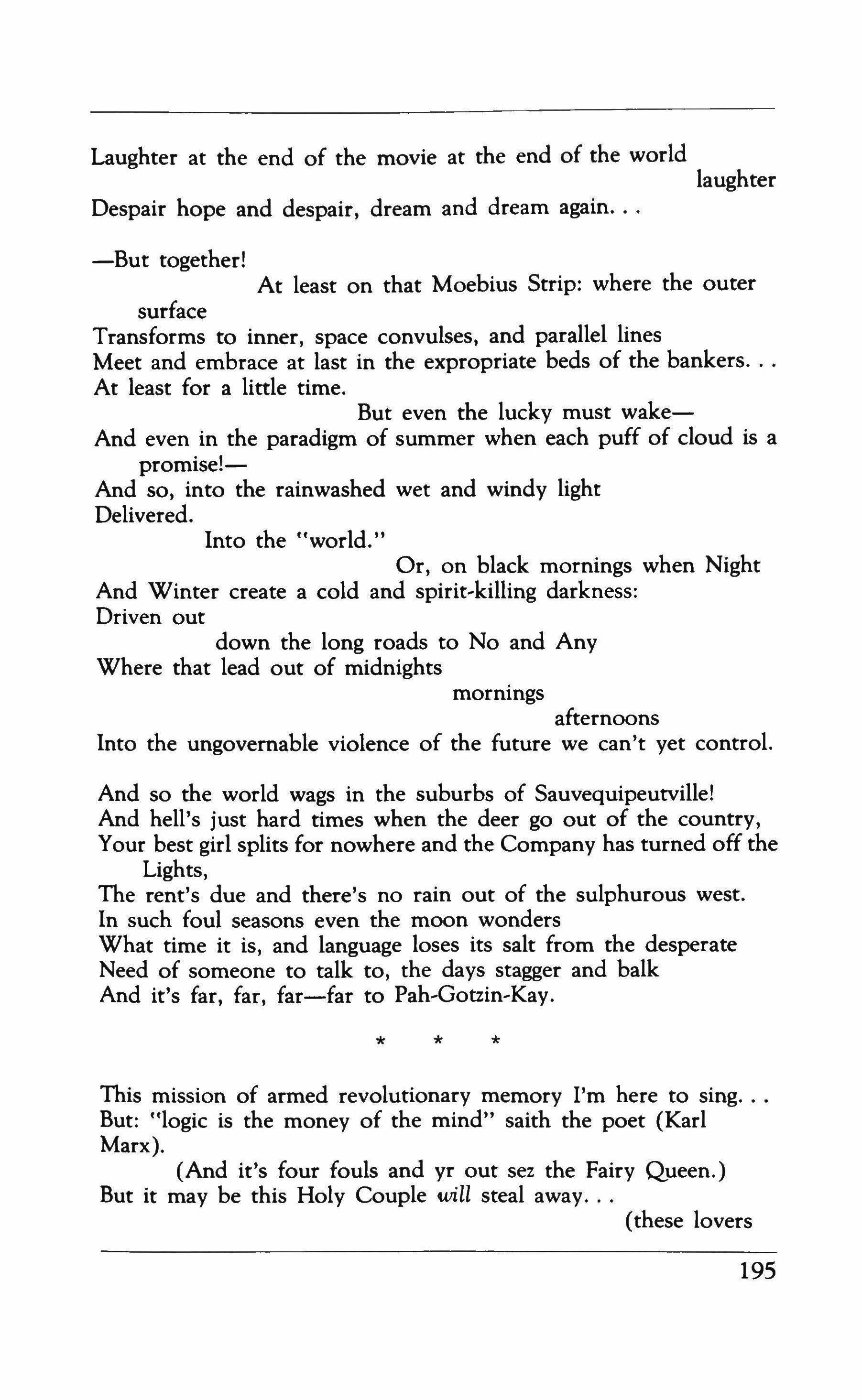
This mission of armed revolutionary memory I'm here to sing But: "logic is the money of the mind" saith the poet (Karl Marx).
(And it's four fouls and yr out sez the Fairy Queen.) But it may be this Holy Couple will steal away
(these lovers
laughter
* * *
195
Long have fled into the storm). At least may steal away
But neither Marx nor god nor logic will have it so.
And all I can remember for her is this single goddess-powered moment Before she is entered by children who lead her hands toward sleep. And for him I'd recall, if I could, a death in the Spanish War, A valorous, romantic death on the Ebro, or in front of Madrid. But he died, will die, I suppose in some nameless struggle Or as the poor die: of wear-and-tear of the spirit.
And yet they stand with me here in the snow of Portuguese leaflets With the red flags and slogans in Lisbon's freezing heat.
I wish them the useful and happy death I shall not find here. But if time would turn I would do them those corporal works Of mercy: to visit those in prison to bury the dead. As I hope one day someone will do for me, when all My mock-hearty hoorawing of hap and hazard will stand in no stead And I'm led by the quick of my dark to the looming grandfather stair
So I give them up to the world and time, this Holy Couple Nothing can save them.
But weep just once, Mister Memory, and I'll have your tongue!
To tell time's tale, it's Kneel we never shall Is all the music.
And this voice, be it however small, Must help shout down the slates from all the steeples and prisons of the land!
And so with these-or similar-head-and-heart-warming visions (Scaled to the size of my years) I retrace my way through the streets, Beelining through the Municipal Dream Works that is the village And which was all roar 'em, whore 'em, cockalorum
Earlier
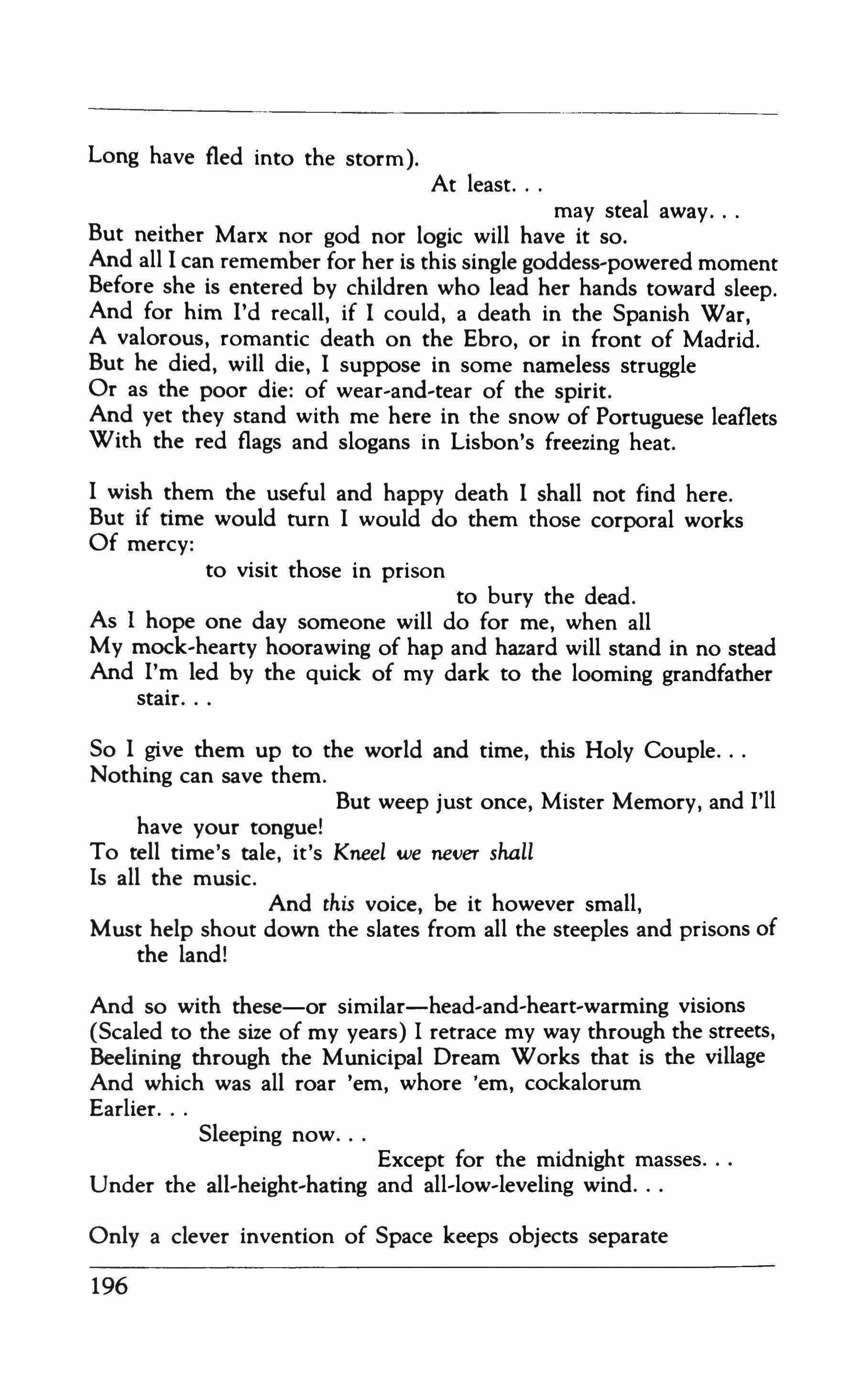
Sleeping now
Except for the midnight masses
Under the all-height-hating and all-low-leveling wind
Only a clever invention of Space keeps objects separate
196
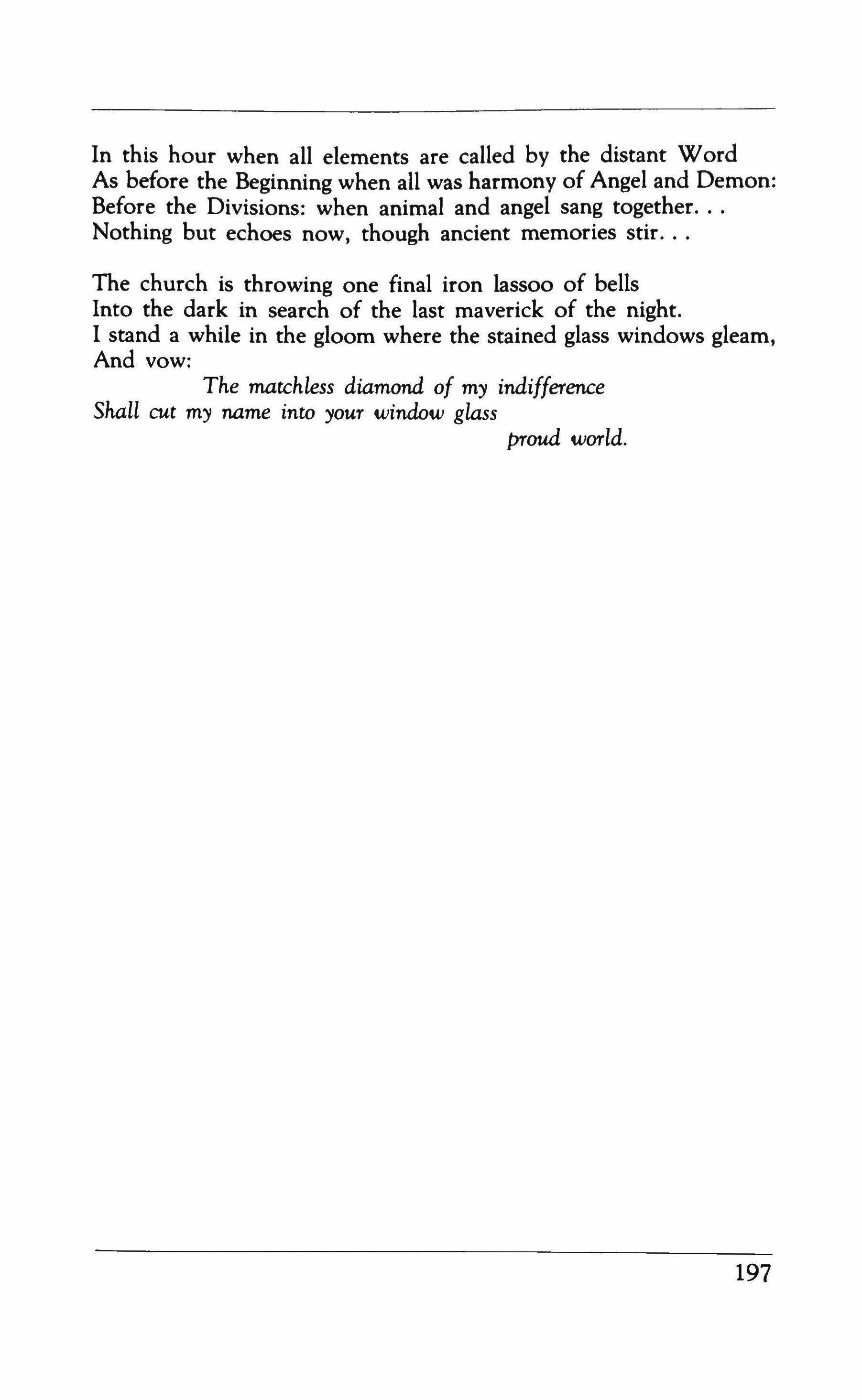
In this hour when all elements are called by the distant Word As before the Beginning when all was harmony of Angel and Demon: Before the Divisions: when animal and angel sang together Nothing but echoes now, though ancient memories stir
The church is throwing one final iron lassoo of bells Into the dark in search of the last maverick of the night. I stand a while in the gloom where the stained glass windows gleam, And vow:
The matchless diamond of my indifference Shall cut my name into your window glass proud world.
197
Nathan's rrme
David Quammen
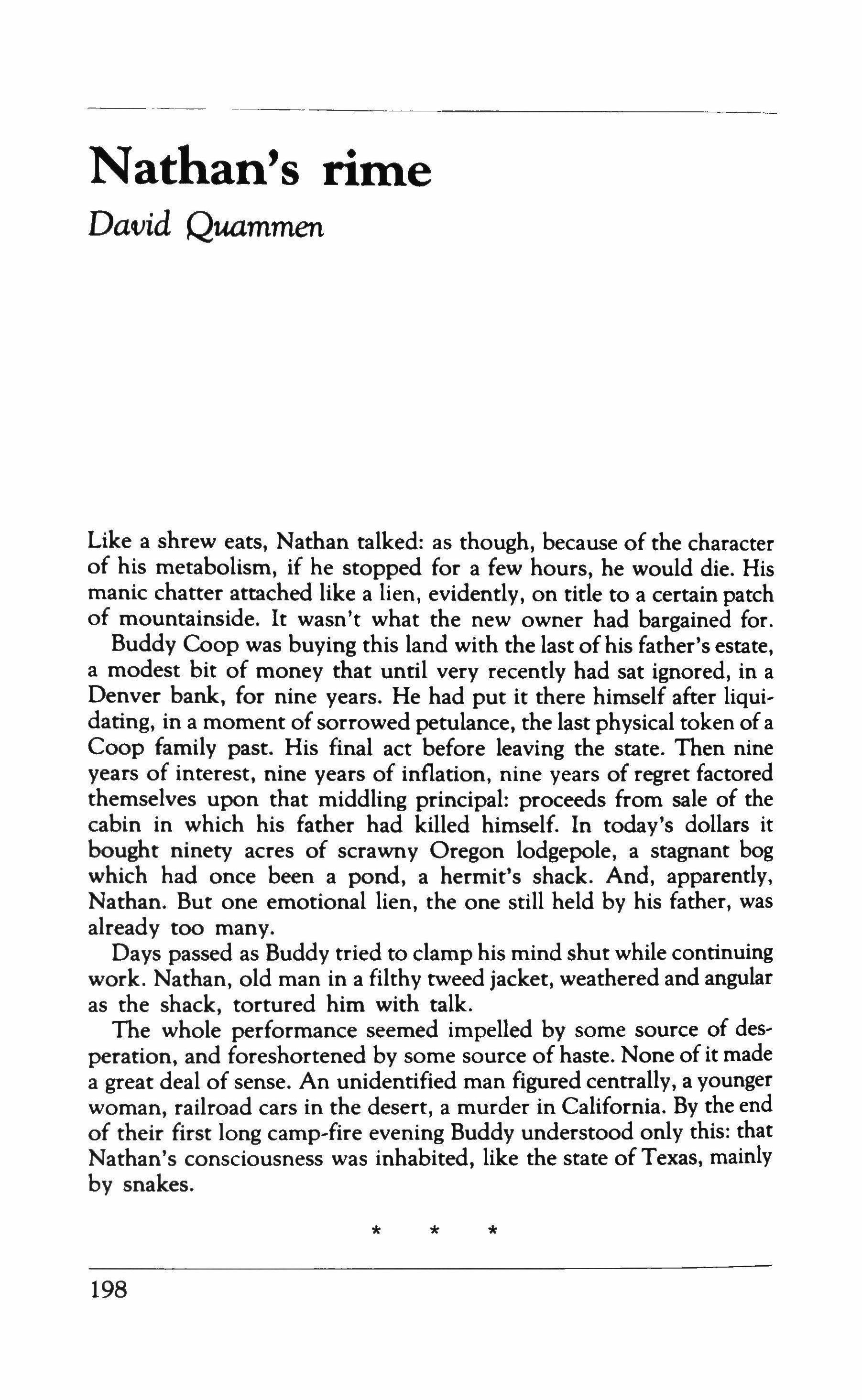
Like a shrew eats, Nathan talked: as though, because of the character of his metabolism, if he stopped for a few hours, he would die. His manic chatter attached like a lien, evidently, on title to a certain patch of mountainside. It wasn't what the new owner had bargained for. Buddy Coop was buying this land with the last ofhis father's estate, a modest bit of money that until very recently had sat ignored, in a Denver bank, for nine years. He had put it there himself after liquidating, in a moment of sorrowed petulance, the last physical token of a Coop family past. His final act before leaving the state. Then nine years of interest, nine years of inflation, nine years of regret factored themselves upon that middling principal: proceeds from sale of the cabin in which his father had killed himself. In todav's dollars it bought ninety acres of scrawny Oregon lodgepole, a stagnant bog which had once been a pond, a hermit's shack. And, apparently, Nathan. But one emotional lien, the one still held by his father, was already too many.
Days passed as Buddy tried to clamp his mind shut while continuing work. Nathan, old man in a filthy tweed jacket, weathered and angular as the shack, tortured him with talk.
The whole performance seemed impelled by some source of des, peration, and foreshortened by some source of haste. None of it made a great deal of sense. An unidentified man figured centrally, a younger woman, railroad cars in the desert, a murder in California. By the end of their first long camp-fire evening Buddy understood only this: that Nathan's consciousness was inhabited, like the state of Texas, mainly by snakes.
* * * 198

Nathan said:
ttl run off to live amongst pigs. I was just eleven. Pigs, I mean, real swine. Slept overnight in the mud and the filth of the pen, with a sow and her litter. Sniffing me there in the dark, growling her pig noises. Ready to nip and snarl protecting the young. Fearsome creatures, big swine are, when you crowd them. Then I was drug out, at daylight, and brung on back. It was a neighbor woman's sow pen. I took a whipping. He whipped my tail pussing raw. Whipped me to bleed, with that old brass-head cane.
"I knew he would do her. But I feared them snakes so. I was big, eyed and Christmas-skittish with fear. Could not hold my water at night in the bed. And eleven years old. I thought it was work of the Fiend he was at, keeping them serpents. Or I didn't know what."
Buddy stared into the embers. He was sitting on the ground, elbows hooked back over the log on which Nathan squatted. "I don't understand. If they were filthy and vicious, why did you hide in a pigpen?"
"Look at a pig," Nathan said.
"Sure. Not a comely animal. I agree. I would never bed down with one.
"Skin a pig out," Nathan said. "A pig is armored with fat. Layer of fat as thick as a sponge. No veins in it. A pig can take rattler bites all day long. Just so it ain't on the tip of the snout. Don't even make her sick. A pig is a natural snake killer. Snarf rattlers like link sausage, quick as lunch, and not give it a thought. Well, a rattler knows that. You don't see him go near a pig. Not even in Texas, ankle-deep with snakes everywhere, you don't see it. A animal knows its enemies. And a rattlesnake knows a pig."
Nathan poked at the coals with his boot. Small flecks of orange fire floated up the invisible fountain of heat, through the darkness, disappearing above in the sky-black gap between branches. He pushed the charred nub of a log into the circle. He seemed to be tracing back across thoughts from which Buddy's question had diverted him.
"That old brass-head cane," he repeated. "Merciful God." For a moment an old man gaped at his memories.
"When I come ten years of age, he said I was big enough to squirt down the pit." New flames arose, reflected in the brushfire brown of Nathan's eyes. "Till then, my chores was just to look after the racers and rat snakes and hog-nosers. He kept me away from the rattlers and copperheads and all, 'cause he said I didn't know what I was doing. And he was right. I cleaned out the cages after them gentle snakes, fed them, fed the tarantulas and the scorpion too, and that didn't bother me so bad. Then he come and say I was ready to squirt down the pit.
"That must of been two or three years. He took me down there to
199
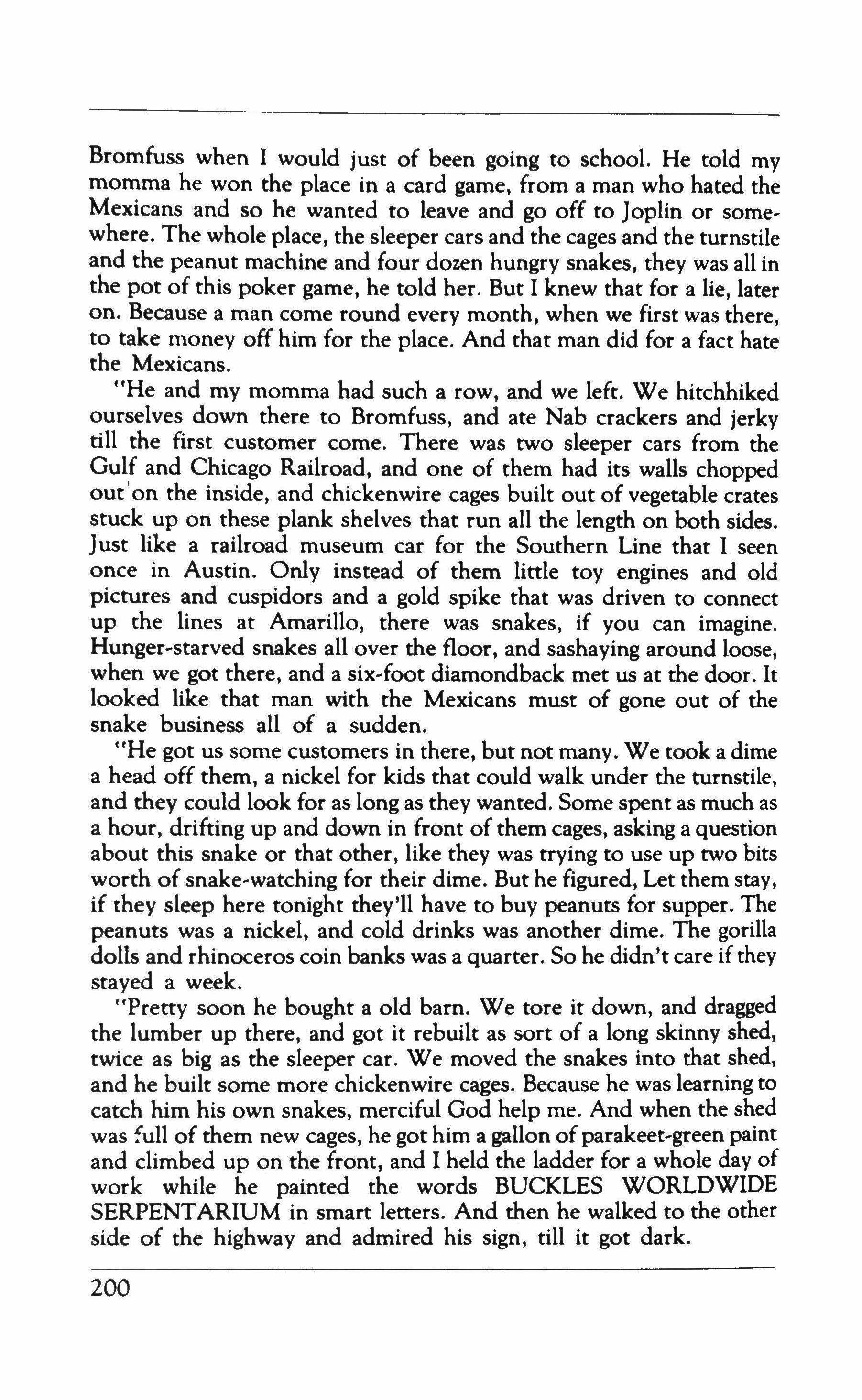
Bromfuss when I would just of been going to school. He told my momma he won the place in a card game, from a man who hated the Mexicans and so he wanted to leave and go off to Joplin or somewhere. The whole place, the sleeper cars and the cages and the turnstile and the peanut machine and four dozen hungry snakes, they was all in the pot of this poker game, he told her. But I knew that for a lie, later on. Because a man come round every month, when we first was there, to take money off him for the place. And that man did for a fact hate the Mexicans.
"He and my momma had such a row, and we left. We hitchhiked ourselves down there to Bromfuss, and ate Nab crackers and jerky till the first customer come. There was two sleeper cars from the Gulf and Chicago Railroad, and one of them had its walls chopped out' on the inside, and chickenwire cages built out of vegetable crates stuck up on these plank shelves that run all the length on both sides. Just like a railroad museum car for the Southern Line that I seen once in Austin. Only instead of them little toy engines and old pictures and cuspidors and a gold spike that was driven to connect up the lines at Amarillo, there was snakes, if you can imagine. Hunger-starved snakes all over the floor, and sashaying around loose, when we got there, and a six-foot diamondback met us at the door. It looked like that man with the Mexicans must of gone out of the snake business all of a sudden.
"He got us some customers in there, but not many. We took a dime a head off them, a nickel for kids that could walk under the turnstile, and they could look for as long as they wanted. Some spent as much as a hour, drifting up and down in front of them cages, asking a question about this snake or that other, like they was trying to use up two bits worth of snake-watching for their dime. But he figured, Let them stay, if they sleep here tonight they'll have to buy peanuts for supper. The peanuts was a nickel, and cold drinks was another dime. The gorilla dolls and rhinoceros coin banks was a quarter. So he didn't care if they stayed a week.
"Pretty soon he bought a old bam. We tore it down, and dragged the lumber up there, and got it rebuilt as sort of a long skinny shed, twice as big as the sleeper car. We moved the snakes into that shed, and he built some more chickenwire cages. Because he was learning to catch him his own snakes, merciful God help me. And when the shed was full of them new cages, he got him a gallon ofparakeet-green paint and climbed up on the front, and I held the ladder for a whole day of work while he painted the words BUCKLES WORLDWIDE SERPENTARIUM in smart letters. And then he walked to the other side of the highway and admired his sign, till it got dark.
200
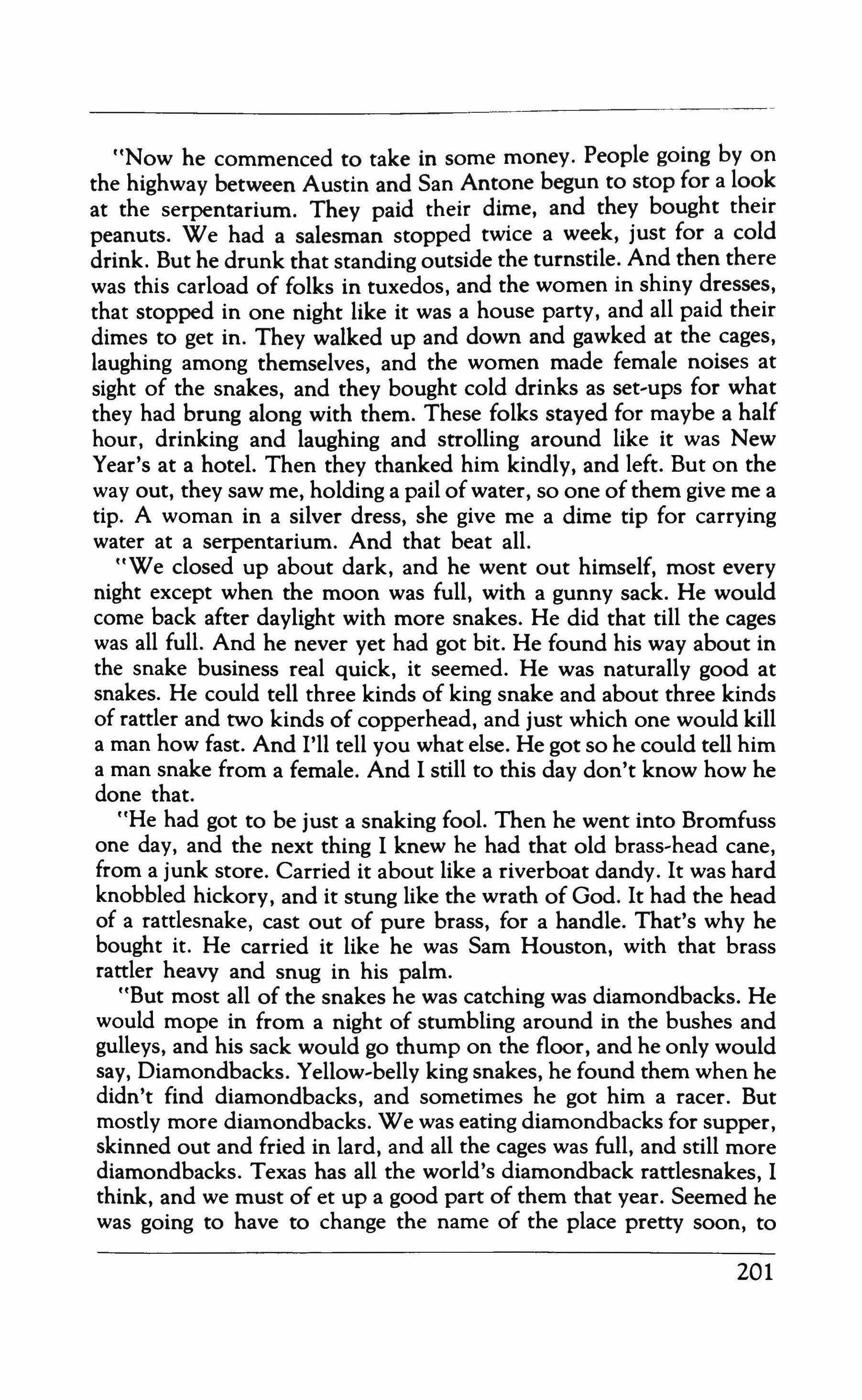
"Now he commenced to take in some money. People going by on the highway between Austin and San Antone begun to stop for a look at the serpentarium. They paid their dime, and they bought their peanuts. We had a salesman stopped twice a week, just for a cold drink. But he drunk that standing outside the turnstile. And then there was this carload of folks in tuxedos, and the women in shiny dresses, that stopped in one night like it was a house party, and all paid their dimes to get in. They walked up and down and gawked at the cages, laughing among themselves, and the women made female noises at sight of the snakes, and they bought cold drinks as set-ups for what they had brung along with them. These folks stayed for maybe a half hour, drinking and laughing and strolling around like it was New Year's at a hotel. Then they thanked him kindly, and left. But on the way out, they saw me, holding a pail of water, so one of them give me a tip. A woman in a silver dress, she give me a dime tip for carrying water at a serpentarium. And that beat all.
"We closed up about dark, and he went out himself, most every night except when the moon was full, with a gunny sack. He would come back after daylight with more snakes. He did that till the cages was all full. And he never yet had got bit. He found his way about in the snake business real quick, it seemed. He was naturally good at snakes. He could tell three kinds of king snake and about three kinds of rattler and two kinds of copperhead, and just which one would kill a man how fast. And I'll tell you what else. He got so he could tell him a man snake from a female. And I still to this day don't know how he done that.
"He had got to be just a snaking fool. Then he went into Bromfuss one day, and the next thing I knew he had that old brass,head cane, from a junk store. Carried it about like a riverboat dandy. It was hard knobbled hickory, and it stung like the wrath of God. It had the head of a rattlesnake, cast out of pure brass, for a handle. That's why he bought it. He carried it like he was Sam Houston, with that brass rattler heavy and snug in his palm.
"But most all of the snakes he was catching was diamondbacks. He would mope in from a night of stumbling around in the bushes and gulleys, and his sack would go thump on the floor, and he only would say, Diamondbacks. Yellow-belly king snakes, he found them when he didn't find diamondbacks, and sometimes he got him a racer. But mostly more diamondbacks. We was eating diamondbacks for supper, skinned out and fried in lard, and all the cages was full, and still more diamondbacks. Texas has all the world's diamondback rattlesnakes, I think, and we must of et up a good part of them that year. Seemed he was going to have to change the name of the place pretty soon, to
201
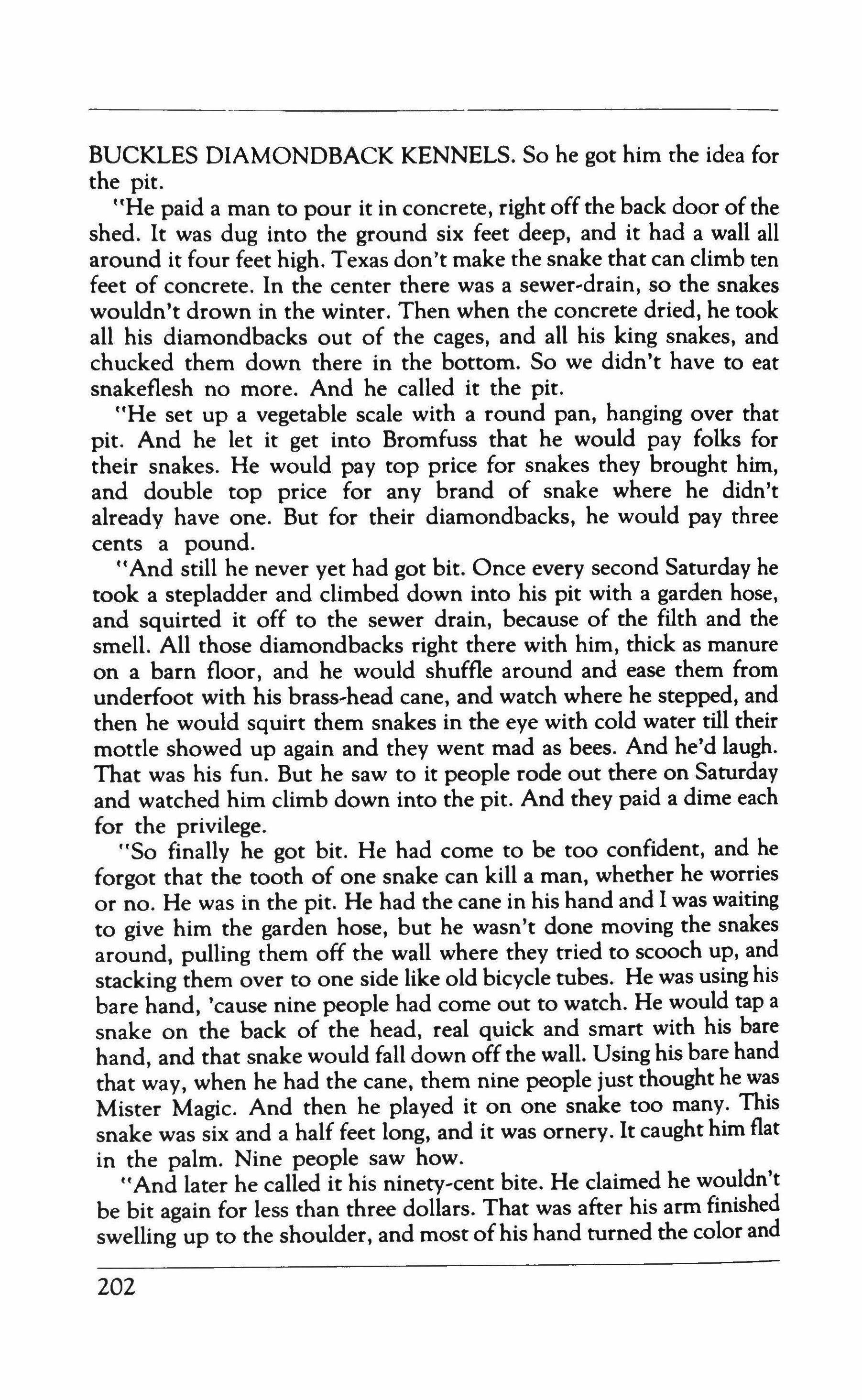 BUCKLES DIAMONDBACK KENNELS.
BUCKLES DIAMONDBACK KENNELS.
So he got him the idea for the pit.
"He paid a man to pour it in concrete, right off the back door ofthe shed. It was dug into the ground six feet deep, and it had a wall all around it four feet high. Texas don't make the snake that can climb ten feet of concrete. In the center there was a sewer-drain, so the snakes wouldn't drown in the winter. Then when the concrete dried, he took all his diamondbacks out of the cages, and all his king snakes, and chucked them down there in the bottom. So we didn't have to eat snakeflesh no more. And he called it the pit.
"He set up a vegetable scale with a round pan, hanging over that pit. And he let it get into Bromfuss that he would pay folks for their snakes. He would pay top price for snakes they brought him, and double top price for any brand of snake where he didn't already have one. But for their diamondbacks, he would pay three cents a pound.
"And still he never yet had got bit. Once every second Saturday he took a stepladder and climbed down into his pit with a garden hose, and squirted it off to the sewer drain, because of the filth and the smell. All those diamondbacks right there with him, thick as manure on a barn floor, and he would shuffle around and ease them from underfoot with his brass-head cane, and watch where he stepped, and then he would squirt them snakes in the eye with cold water till their mottle showed up again and they went mad as bees. And he'd laugh. That was his fun. But he saw to it people rode out there on Saturday and watched him climb down into the pit. And they paid a dime each for the privilege.
"So finally he got bit. He had come to be too confident, and he forgot that the tooth of one snake can kill a man, whether he worries or no. He was in the pit. He had the cane in his hand and I was waiting to give him the garden hose, but he wasn't done moving the snakes around, pulling them off the wall where they tried to scooch up, and stacking them over to one side like old bicycle tubes. He was using his bare hand, 'cause nine people had come out to watch. He would tap a snake on the back of the head, real quick and smart with his bare hand, and that snake would fall down off the wall. Using his bare hand that way, when he had the cane, them nine people just thought he was Mister Magic. And then he played it on one snake too many. This snake was six and a half feet long, and it was ornery. It caught him flat in the palm. Nine people saw how.
"And later he called it his ninety-cent bite. He claimed he wouldn't be bit again for less than three dollars. That was after his arm finished swelling up to the shoulder, and most ofhis hand turned the color and
202
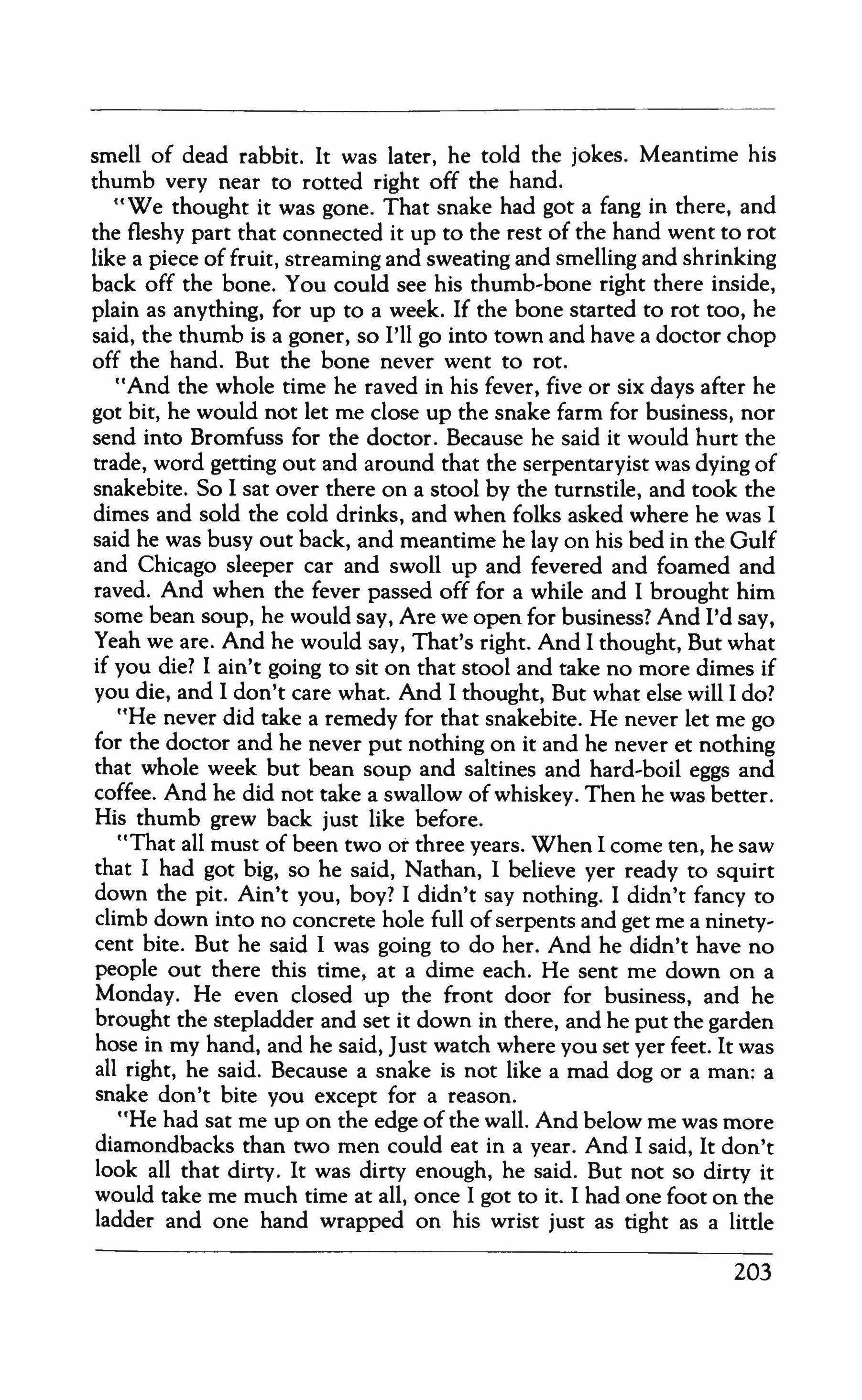
smell of dead rabbit. It was later, he told the jokes. Meantime his thumb very near to rotted right off the hand.
"We thought it was gone. That snake had got a fang in there, and the fleshy part that connected it up to the rest of the hand went to rot like a piece of fruit, streaming and sweating and smelling and shrinking back off the bone. You could see his thumb,bone right there inside, plain as anything, for up to a week. If the bone started to rot too, he said, the thumb is a goner, so I'll go into town and have a doctor chop off the hand. But the bone never went to rot.
"And the whole time he raved in his fever, five or six days after he got bit, he would not let me close up the snake farm for business, nor send into Bromfuss for the doctor. Because he said it would hurt the trade, word getting out and around that the serpentaryist was dying of snakebite. So I sat over there on a stool by the turnstile, and took the dimes and sold the cold drinks, and when folks asked where he was I said he was busy out back, and meantime he lay on his bed in the Gulf and Chicago sleeper car and swoll up and fevered and foamed and raved. And when the fever passed off for a while and I brought him some bean soup, he would say, Are we open for business? And I'd say, Yeah we are. And he would say, That's right. And I thought, But what if you die? I ain't going to sit on that stool and take no more dimes if you die, and I don't care what. And I thought, But what else will I do?
"He never did take a remedy for that snakebite. He never let me go for the doctor and he never put nothing on it and he never et nothing that whole week but bean soup and saltines and hard-boil eggs and coffee. And he did not take a swallow of whiskey. Then he was better. His thumb grew back just like before.
"That all must of been two or three years. When I come ten, he saw that I had got big, so he said, Nathan, I believe yer ready to squirt down the pit. Ain't you, boy? I didn't say nothing. I didn't fancy to climb down into no concrete hole full ofserpents and get me a ninety' cent bite. But he said I was going to do her. And he didn't have no people out there this time, at a dime each. He sent me down on a Monday. He even closed up the front door for business, and he brought the stepladder and set it down in there, and he put the garden hose in my hand, and he said, Just watch where you set yer feet. It was all right, he said. Because a snake is not like a mad dog or a man: a snake don't bite you except for a reason.
"He had sat me up on the edge of the wall. And below me was more diamondbacks than two men could eat in a year. And I said, It don't look all that dirty. It was dirty enough, he said. But not so dirty it would take me much time at all, once I got to it. I had one foot on the ladder and one hand wrapped on his wrist just as tight as a little
203
monkey, and I was terrified like I don't know what, praying God he would not give me a shove. I didn't say nothing. He waited, and then he said, Nathan. Let's go, boy. You be fourteen, at this rate, by the time you get to the bottom. And I thought, Fourteen. I want to be fourteen. And still I didn't say nothing. He said again, Let's go, boy. And it was then I squeezed down on his wrist like a little chimpanzee, and I said, Give me the brass-head cane.
"But he would not. He would not. Because he said it was just his. He got me a broomstick from the yard, and he said, This here is just as good as any old brass-head cane. This here can be yer own snaking stick, Nathan. Now let's go, boy, he said.
"So I climbed down to squirt out the pit.
"And it was a year of that till I run off. I never yet had got bit. But I saw diamondbacks in my dreams, that would move at me, and I would snatch back, and knock myself wide awake. I soiled the bedclothes, and eleven years old. Every second Saturday I went down into that pit, and walked about on my tippy-toes and hardly drew breath for a hour. I wasn't like him. I didn't never come to be too confident. When I was in the pit on a day, that night I would cry like a baby. Because I was so glad at having got it over this time, and I was so dreading of having to go down there again the next second Saturday, that I didn't know what. One year of them second Saturdays, then I lit out.
"I went on a Friday night. But he let the pit go to filth till he had me back, and the welts from that brass-head cane had scabbed over, and I could put on a pair of trousers. I just had to squirt it on Tuesday."

And Nathan said:
"So I got to be fourteen years old. I made my peace with the diamondbacks in the pit. I did what he said, and I did not try no more to run off. I just treated them rattlers like poisonous snakes. But then this other thing.
"A crate come, from all the way over to Africa, and he said, Nathan, you go open that, boy. Just you be careful.
"He had bought forty-five dollars of African snakemeat off a Portuguese man over there, and the box was nearly three months in the mail. The man packed his snakes in burlap coffee sacks, and they seem to got on without food nor water nor nothing. He already had got two other crates of good healthy snakemeat off the same man. This time it was African mambas, green ones and the black ones about even. But just for a extra the man packed in this other, or for a joke, or I never did know why. I went after the lid with a bar. I stood back. When I
* *
204
come round to peek in and saw a hump of dark there inside, my hand cocked back with the bar. But it wasn't no African mamba. It was something I never expected. It was just the carcass of that old twoheaded monkey."
Buddy straightened his spine. Bright hot afternoon now, and he was at work, carving a stairway into the steep cliffside between his land and the fire road: cutting brush, moving dirt, staking split logs into place as steps. His hair was soaked with sweat and ten minutes earlier he had folded back his left thumbnail. He said:
"Nathan. In three seconds I open your skull with this shovel if you haven't retracted the monkey. There were snakes, okay, and madness in plenitude, yes. But there was no two-headed monkey."
"It was the carcass of a two-headed baby monkey." Nathan spoke to the cliffside with righteous certainty. "Before God. It was dried like a prune."
"Hand me that split. I don't believe a word of it, Nathan. I don't even hear you. Hand me that split, there."
Nathan made a perfunctory prod with his boot. The length of split pine slid six inches toward Buddy, then lazed over sideways and began tumbling down the slope. Buddy went onto a knee, reached, pinned the log for a second before its weight swung it around free, and on. It rolled. Nathan and he watched without further comment, five or six seconds, as the log bobbed away dreamily, speeding and leaping, falling to rest finally in the grassy flat at the base of the cliffside.
Buddy glowered downhill, then at Nathan. Who said:
"He took and hung it up over the pit. From the vegetable scale." Judiciously, Nathan paused until Buddy's work had resumed rhythm.
"I knew then. I didn't say nothing, I just waited to see. But I knew in my belly from that day. A two-headed monkey was not going to bring him no luck."
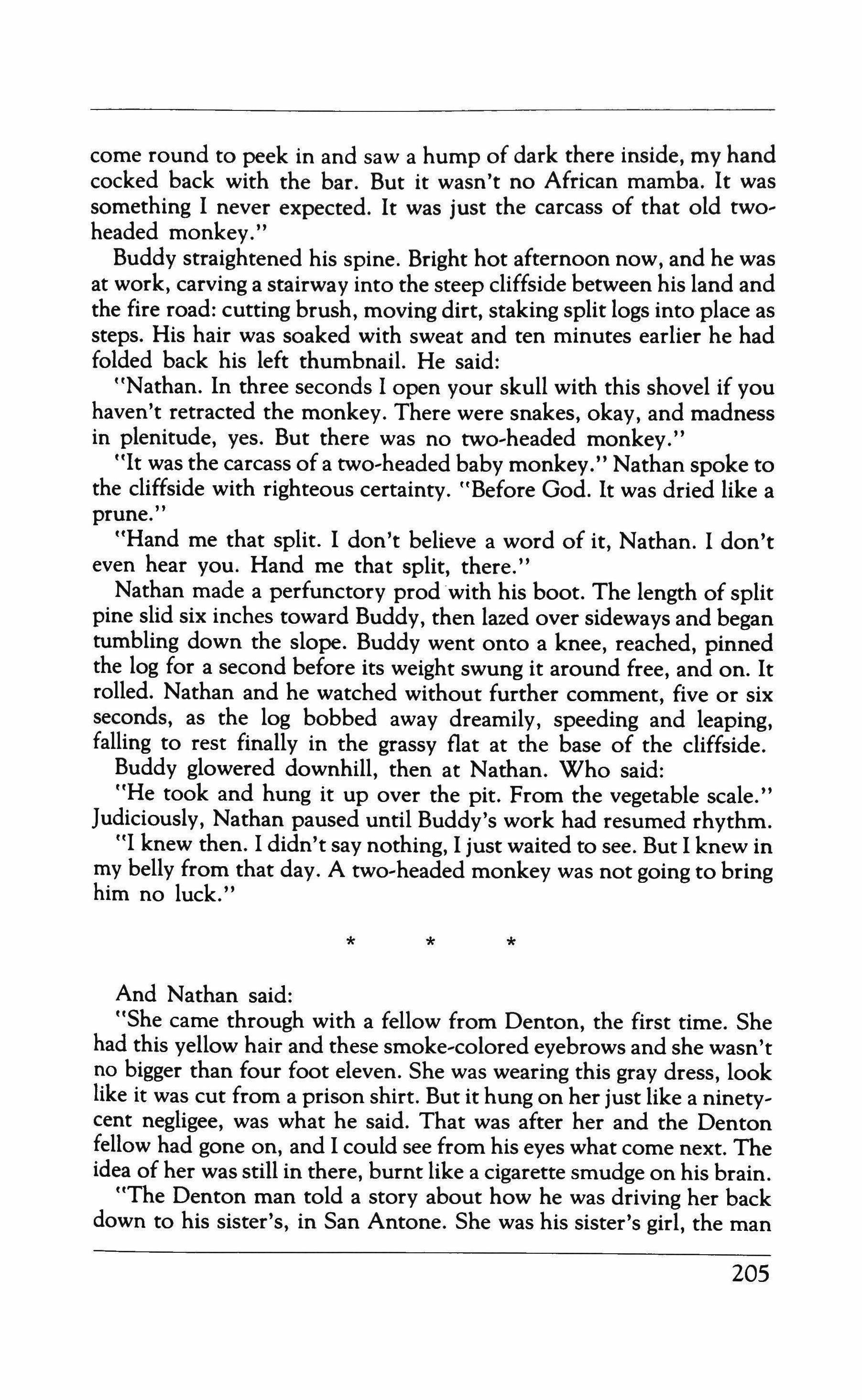
And Nathan said:
"She came through with a fellow from Denton, the first time. She had this yellow hair and these smoke-colored eyebrows and she wasn't no bigger than four foot eleven. She was wearing this gray dress, look like it was cut from a prison shirt. But it hung on her just like a ninetycent negligee, was what he said. That was after her and the Denton fellow had gone on, and I could see from his eyes what come next. The idea of her was still in there, burnt like a cigarette smudge on his brain.
"The Denton man told a story about how he was driving her back down to his sister's, in San Antone. She was his sister's girl, the man
* * *
205
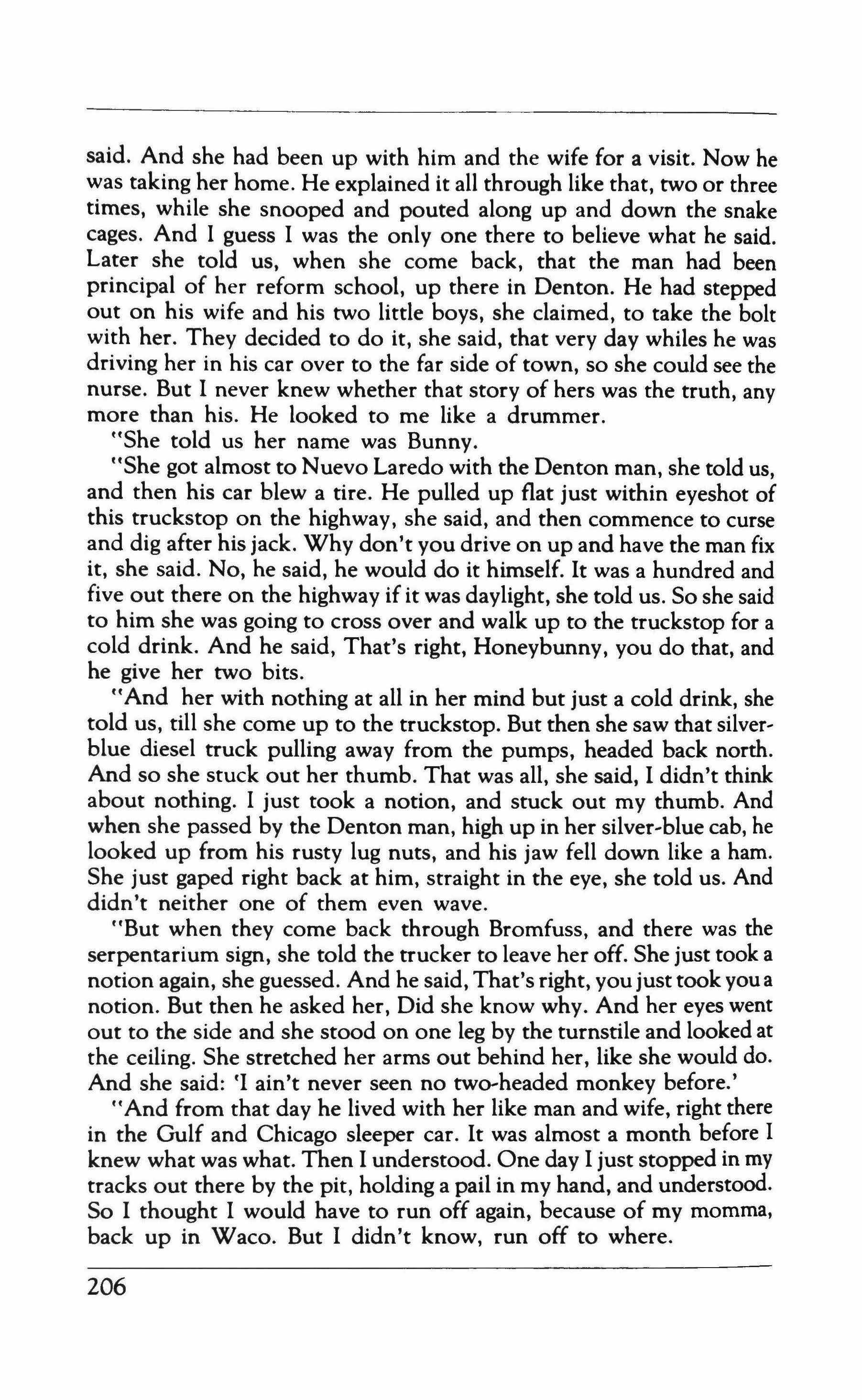
said. And she had been up with him and the wife for a visit. Now he was taking her home. He explained it all through like that, two or three times, while she snooped and pouted along up and down the snake cages. And I guess I was the only one there to believe what he said. Later she told us, when she come back, that the man had been principal of her reform school, up there in Denton. He had stepped out on his wife and his two little boys, she claimed, to take the bolt with her. They decided to do it, she said, that very day whiles he was driving her in his car over to the far side of town, so she could see the nurse. But I never knew whether that story of hers was the truth, any more than his. He looked to me like a drummer.
"She told us her name was Bunny.
"She got almost to Nuevo Laredo with the Denton man, she told us, and then his car blew a tire. He pulled up flat just within eyeshot of this truckstop on the highway, she said, and then commence to curse and dig after his jack. Why don't you drive on up and have the man fix it, she said. No, he said, he would do it himself. It was a hundred and five out there on the highway if it was daylight, she told us. So she said to him she was going to cross over and walk up to the truckstop for a cold drink. And he said, That's right, Honeybunny, you do that, and he give her two bits.
"And her with nothing at all in her mind but just a cold drink, she told us, till she come up to the truckstop. But then she saw that silverblue diesel truck pulling away from the pumps, headed back north. And so she stuck out her thumb. That was all, she said, I didn't think about nothing. I just took a notion, and stuck out my thumb. And when she passed by the Denton man, high up in her silver-blue cab, he looked up from his rusty lug nuts, and his jaw fell down like a ham. She just gaped right back at him, straight in the eye, she told us. And didn't neither one of them even wave.
"But when they come back through Bromfuss, and there was the serpentarium sign, she told the trucker to leave her off. She just took a notion again, she guessed. And he said, That's right, you just took you a notion. But then he asked her, Did she know why. And her eyes went out to the side and she stood on one leg by the turnstile and looked at the ceiling. She stretched her arms out behind her, like she would do. And she said: 'I ain't never seen no two-headed monkey before.'
"And from that day he lived with her like man and wife, right there in the Gulf and Chicago sleeper car. It was almost a month before I knew what was what. Then I understood. One day I just stopped in my tracks out there by the pit, holding a pail in my hand, and understood. So I thought I would have to run off again, because of my momma, back up in Waco. But I didn't know, run off to where.
206
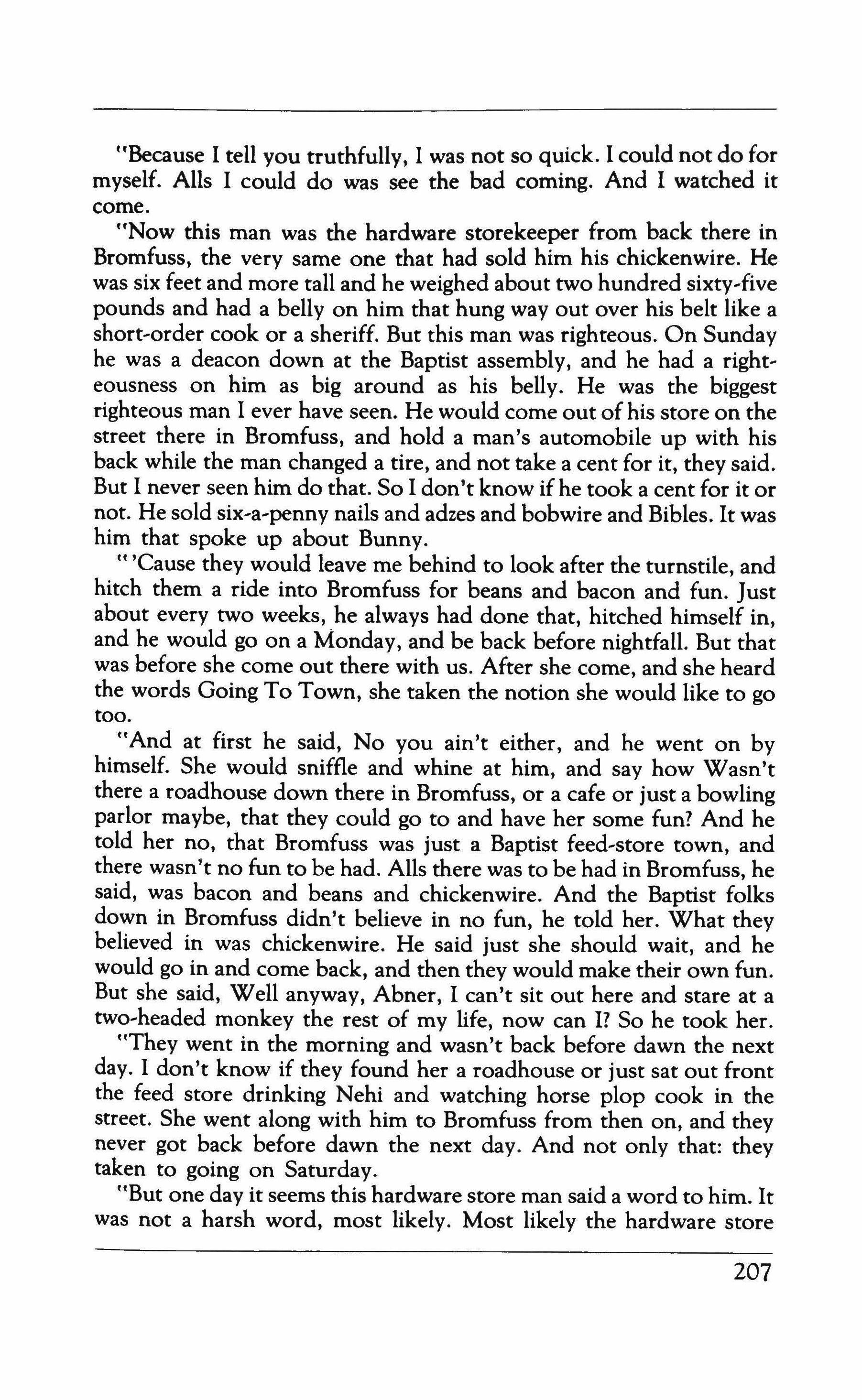
"Because I tell you truthfully, I was not so quick. I could not do for myself. Alls I could do was see the bad coming. And I watched it come.
"Now this man was the hardware storekeeper from back there in Bromfuss, the very same one that had sold him his chickenwire. He was six feet and more tall and he weighed about two hundred sixty-five pounds and had a belly on him that hung way out over his belt like a short-order cook or a sheriff. But this man was righteous. On Sunday he was a deacon down at the Baptist assembly, and he had a right, eousness on him as big around as his belly. He was the biggest righteous man I ever have seen. He would come out of his store on the street there in Bromfuss, and hold a man's automobile up with his back while the man changed a tire, and not take a cent for it, they said. But I never seen him do that. So I don't know ifhe took a cent for it or not. He sold six-a-penny nails and adzes and bobwire and Bibles. It was him that spoke up about Bunny
'Cause they would leave me behind to look after the turnstile, and hitch them a ride into Bromfuss for beans and bacon and fun. Just about every two weeks, he always had done that, hitched himself in, and he would go on a Monday, and be back before nightfall. But that was before she come out there with us. After she come, and she heard the words Going To Town, she taken the notion she would like to go too.
"And at first he said, No you ain't either, and he went on by himself. She would sniffle and whine at him, and say how Wasn't there a roadhouse down there in Bromfuss, or a cafe or just a bowling parlor maybe, that they could go to and have her some fun? And he told her no, that Bromfuss was just a Baptist feed-store town, and there wasn't no fun to be had. Alls there was to be had in Bromfuss, he said, was bacon and beans and chickenwire. And the Baptist folks down in Bromfuss didn't believe in no fun, he told her. What they believed in was chickenwire. He said just she should wait, and he would go in and come back, and then they would make their own fun. But she said, Well anyway, Abner, I can't sit out here and stare at a two-headed monkey the rest of my life, now can I? So he took her.
"They went in the morning and wasn't back before dawn the next day. I don't know if they found her a roadhouse or just sat out front the feed store drinking Nehi and watching horse plop cook in the street. She went along with him to Bromfuss from then on, and they never got back before dawn the next day. And not only that: they taken to going on Saturday.
"But one day it seems this hardware store man said a word to him. It was not a harsh word, most likely. Most likely the hardware store
207

man just drew him off to the side, when he come in there for hinges or wire or carpet tacks, and told him a quiet word as to what folks was thinking. Folks was thinking that she was a pretty young gal for a man like him, I expect, and them not even married. Folks might of heard she was run off from that reform school up in Denton. So the hardware store man might of said a word as to how the whole town was wondering, When did he figure to send her back up to Denton, back up to her people or whoever. I don't know. I don't know what the hardware store man said, 'cause I wasn't nowhere around. But a Saturday hardware store full of folks heard what he said back to the man.
"He let off such a foul filthy spittle oflanguage, I guess, that the very air of the hardware store went sour as heat lightning. Folks lost count of their change and just turned round to stare. He used words that most Bromfuss folks only knew about. But then more. When he had the hardware store man cussed down one side and up the next, for minding the wrong business, he did more. Right there in the man's store, before Saturday customers, he made talk of the hardware storekeeper's wife, and his children. He took reference about the hardware store man's intentions. You married ones with yer kids, he told the hardware storekeeper, you married ones was the worst, when it come to young gals and purity. You married ones was the worst friend a young gal could get. And he had him a reform school principal from up in Denton, he said, to prove it. Folks thought the hardware storekeeper would crack his neck with a pick handle, I guess.
"But the man did not move a finger. The hardware store man just stood and took what he said, and his neck going thick and stiff like cement. The man did not answer back. The man just told him to get out of the store, and so they did.
"He did not take her along to Bromfuss no more after that. He did not go to Bromfuss much more himself. I guess folks still expected the hardware store man must have to split his head with a hame pretty soon, righteous or not. And maybe he thought the same too. But that didn't happen. This other happened instead. And so he lit out with Bunny, and left his shed and his sleeper cars and his whole serpentarium behind, and he did not get a cent for all of his snakes. And he never went back near the town of Bromfuss, so far as I know.
'Cause the hardware store man got himself bit by a diamondback.
"And while his wife went across for the doctor, the man's heart up and stopped. Nobody knew why. It just stopped.
"So he opened all of his cages, and then lit out with Bunny, is what I was told later. I don't know for sure how it was, not being there at the time. I only heard how it was, with the hardware store man and all
208
that, much later on. I wasn't around when the two of them got back from town.
"'Cause when he went into Bromfuss that day, and Bunny along with him, and left me to look after the turnstile, I had taken a notion. I was standing back by the pit with a tin box of mice in my hands, and I just suddenly taken it. So I set down that box of mice where it was, and walked out front to the highway, and stuck out my thumb. I must of stood right on that spot for the best part of four hours. And it was a hundred and five out there, if it was daylight.
"Then the Mexican man in the lettuce truck pulled off to stop. And he was heading all the way up to Wichita, Kansas."

The cliffside stairway was finished, and Buddy had set to work on the bog: cutting peat. Spread out before the shack in a soft yellow, green oval, the bog was in fact a small pond eaten over by a thick soggy trampoline of peat. Buddy harbored a dream that, once cleared, it might support trout. And anyway, he needed the labor.
He was using a long-handle turf knife to slice away square yards of peat, then dragging each square to shore. He had built racks of aspen on which the peat would be sun-dried for fuel. As Buddy struggled another limp square into place on a rack, Nathan sat near, watching each movement.
Nathan's mood had gone snappish when Buddy first started cutting peat; then settled into a sullen, nervous pout. He had shuffled his old bones up the cliffside, but he would not follow Buddy onto the bog. He seemed to distrust it utterly. Now he would not even resume his recitation while Buddy paused for lunch. He was that much the egotistical ham, disdaining to perform between interruptions. But the forced silence, the deprivation, was making him edgy. Nathan suffered manifestly as though each yard of harvested peat was an inch of his own skin.
"Hard nasty work. Slow work," Nathan editorialized. They were eating cold rice with scallions; Buddy had never yet refused Nathan food. "Quick as it grows back, fellow can't hardly cut fast enough just to stay even." Buddy sat collapsed in the shack doorway, gasping down mouthfuls.
"How long have you known this piece of land, Nathan?" "Fortv-five years."
"And how much bog was there forty-five years ago?" "Some. Not a lot. Covered eight, ten feet on this side. Most of the far cove."
* * *
209
"Then I can do better than stay even. If it's taken fortv-five years to come this far, I can beat it. You watch. I won't need forty-five years. Sure as you owned a pond here then, I'll own a pond here again."
ttyou own nothing."
"I own this land. I own the dirt you're sitting on." Buddy flourished his fork. "This. All of it. Me."
ttyou don't know what you own."
"Welcome to my property, Nathan. Welcome to the future site of Coop's Pond."
"Yes," Nathan said. "I know I am. I been here the whole time."
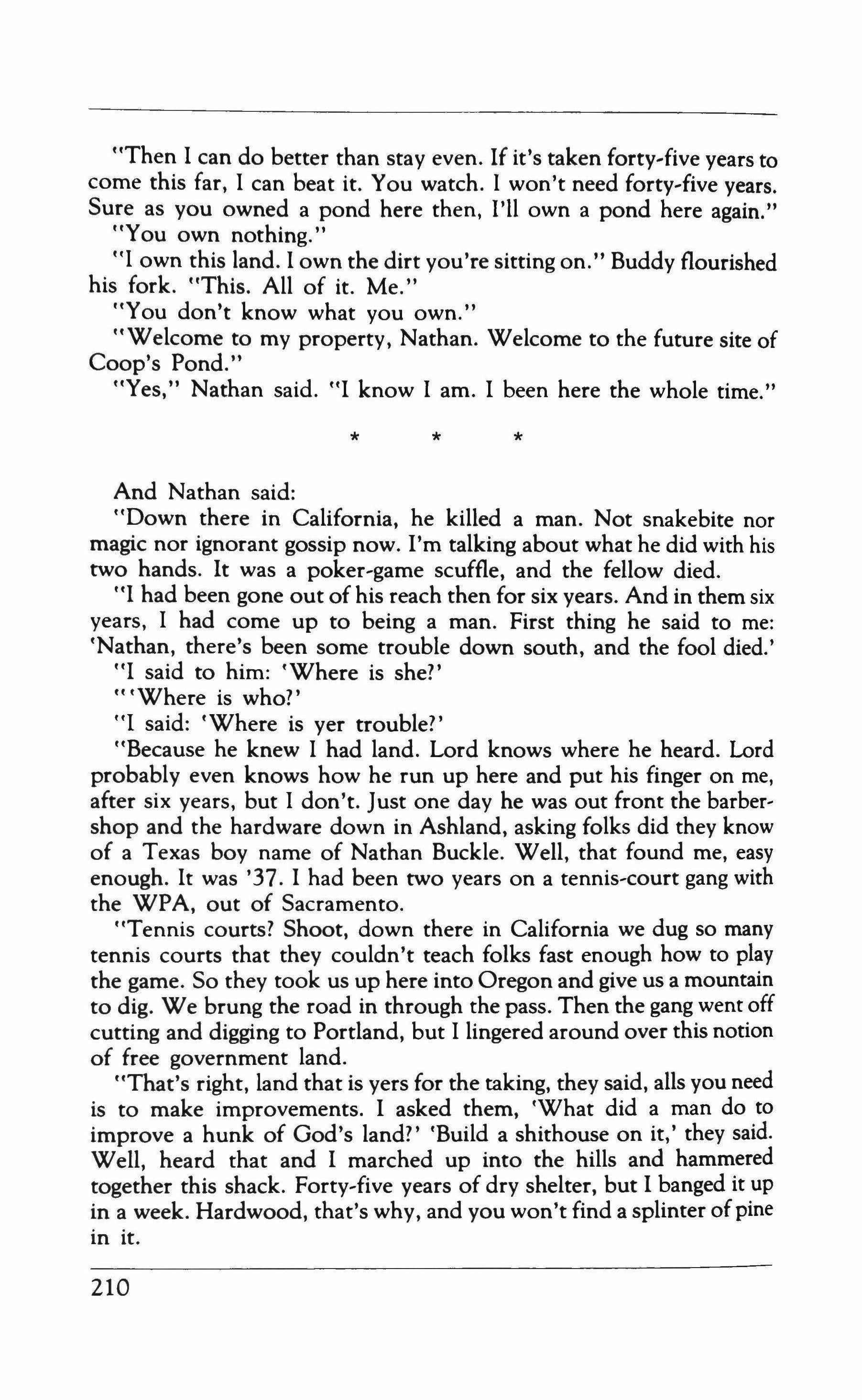
And Nathan said:
"Down there in California, he killed a man. Not snakebite nor magic nor ignorant gossip now. I'm talking about what he did with his two hands. It was a poker-game scuffle, and the fellow died.
"I had been gone out of his reach then for six years. And in them six years, I had come up to being a man. First thing he said to me: 'Nathan, there's been some trouble down south, and the fool died.'
"I said to him: 'Where is she?'
"'Where is who?'
"I said: 'Where is yer trouble?'
"Because he knew I had land. Lord knows where he heard. Lord probably even knows how he run up here and put his finger on me, after six years, but I don't. Just one day he was out front the barbershop and the hardware down in Ashland, asking folks did they know of a Texas boy name of Nathan Buckle. Well, that found me, easy enough. It was '37. I had been two years on a tennis-court gang with the WPA, out of Sacramento.
"Tennis courts? Shoot, down there in California we dug so many tennis courts that they couldn't teach folks fast enough how to play the game. So they took us up here into Oregon and give us a mountain to dig. We brung the road in through the pass. Then the gang went off cutting and digging to Portland, but I lingered around over this notion of free government land.
"That's right, land that is yers for the taking, they said, aIls you need is to make improvements. I asked them, 'What did a man do to improve a hunk of God's land?' 'Build a shithouse on it,' they said. Well, heard that and I marched up into the hills and hammered together this shack. Forty-five years of dry shelter, but I banged it up in a week. Hardwood, that's why, and you won't find a splinter ofpine in it. 210
* * *
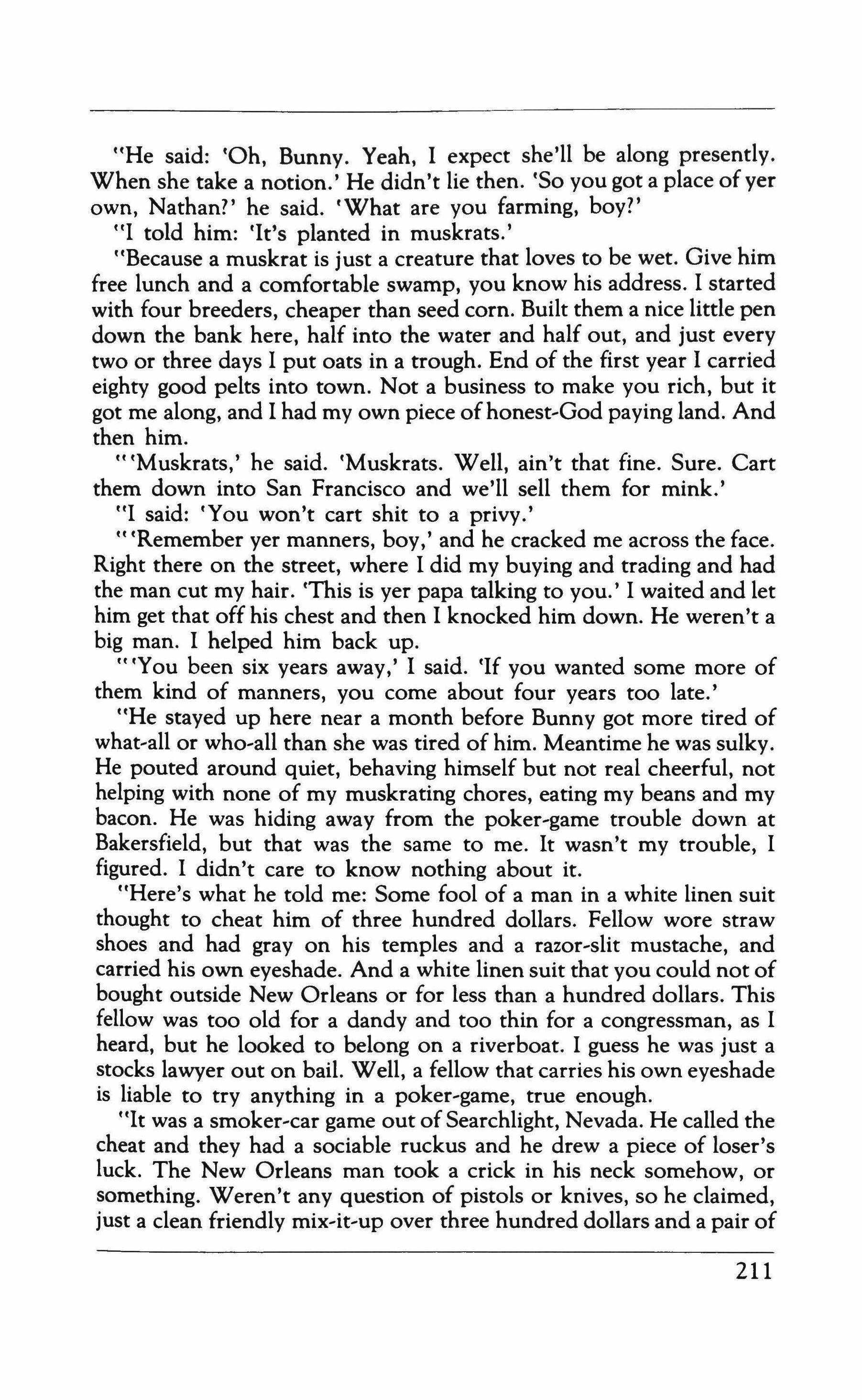
"He said: 'Oh, Bunny. Yeah, I expect she'll be along presently. When she take a notion.' He didn't lie then. 'So you got a place of yer own, Nathan?' he said. 'What are you farming, boy?'
"I told him: 'It's planted in muskrats.'
"Because a muskrat is just a creature that loves to be wet. Give him free lunch and a comfortable swamp, you know his address. I started with four breeders, cheaper than seed corn. Built them a nice little pen down the bank here, half into the water and half out, and just every two or three days I put oats in a trough. End of the first year I carried eighty good pelts into town. Not a business to make you rich, but it got me along, and I had my own piece ofhonest-God paying land. And then him.
'''Muskrats,' he said. 'Muskrats. Well, ain't that fine. Sure. Cart them down into San Francisco and we'll sell them for mink.'
"I said: 'You won't cart shit to a privy.'
" 'Remember yer manners, boy,' and he cracked me across the face. Right there on the street, where I did my buying and trading and had the man cut my hair. 'This is yer papa talking to you.' I waited and let him get that off his chest and then I knocked him down. He weren't a big man. I helped him back up.
'You been six years away,' I said. 'If you wanted some more of them kind of manners, you come about four years too late.'
"He stayed up here near a month before Bunny got more tired of what-all or who-all than she was tired of him. Meantime he was sulky. He pouted around quiet, behaving himself but not real cheerful, not helping with none of my muskrating chores, eating my beans and my bacon. He was hiding away from the poker-game trouble down at Bakersfield, but that was the same to me. It wasn't my trouble, I figured. I didn't care to know nothing about it.
"Here's what he told me: Some fool of a man in a white linen suit thought to cheat him of three hundred dollars. Fellow wore straw shoes and had gray on his temples and a razor-slit mustache, and carried his own eyeshade. And a white linen suit that you could not of bought outside New Orleans or for less than a hundred dollars. This fellow was too old for a dandy and too thin for a congressman, as I heard, but he looked to belong on a riverboat. I guess he was just a stocks lawyer out on bail. Well, a fellow that carries his own eyeshade is liable to try anything in a poker-game, true enough.
"It was a smoker-car game out of Searchlight, Nevada. He called the cheat and they had a sociable ruckus and he drew a piece of loser's luck. The New Orleans man took a crick in his neck somehow, or something. Weren't any question of pistols or knives, so he claimed, just a clean friendly mix-it-up over three hundred dollars and a pair of
211
bent queens. That's all right. 1 know myself how they happen. I've seen it.
"Him and Bunny made twenty miles walking through desert before sunrise the next morning. All right. Some folks are not understanding about these poker-game accidents. But 1 know how they happen. I seen enough for that. Because there's more ways to hit a man than he will ever wake up from. Just 'cause you knock a man upside his ear don't mean you better count on the rascal to stay healthy and tap you one back. There's people die every day of a bee sting and the croup. And a man in straw shoes who will carry his own eyeshade, he's liable to pull anything."
"Probably clubbed him to death with that old brass-head cane," Buddy said.
Nathan studied his face. They both turned to their food. Nathan chewed at the cold rice and swallowed and stared across for another full minute before saying:
"And you'd have me to think that you ain't been paying attention."
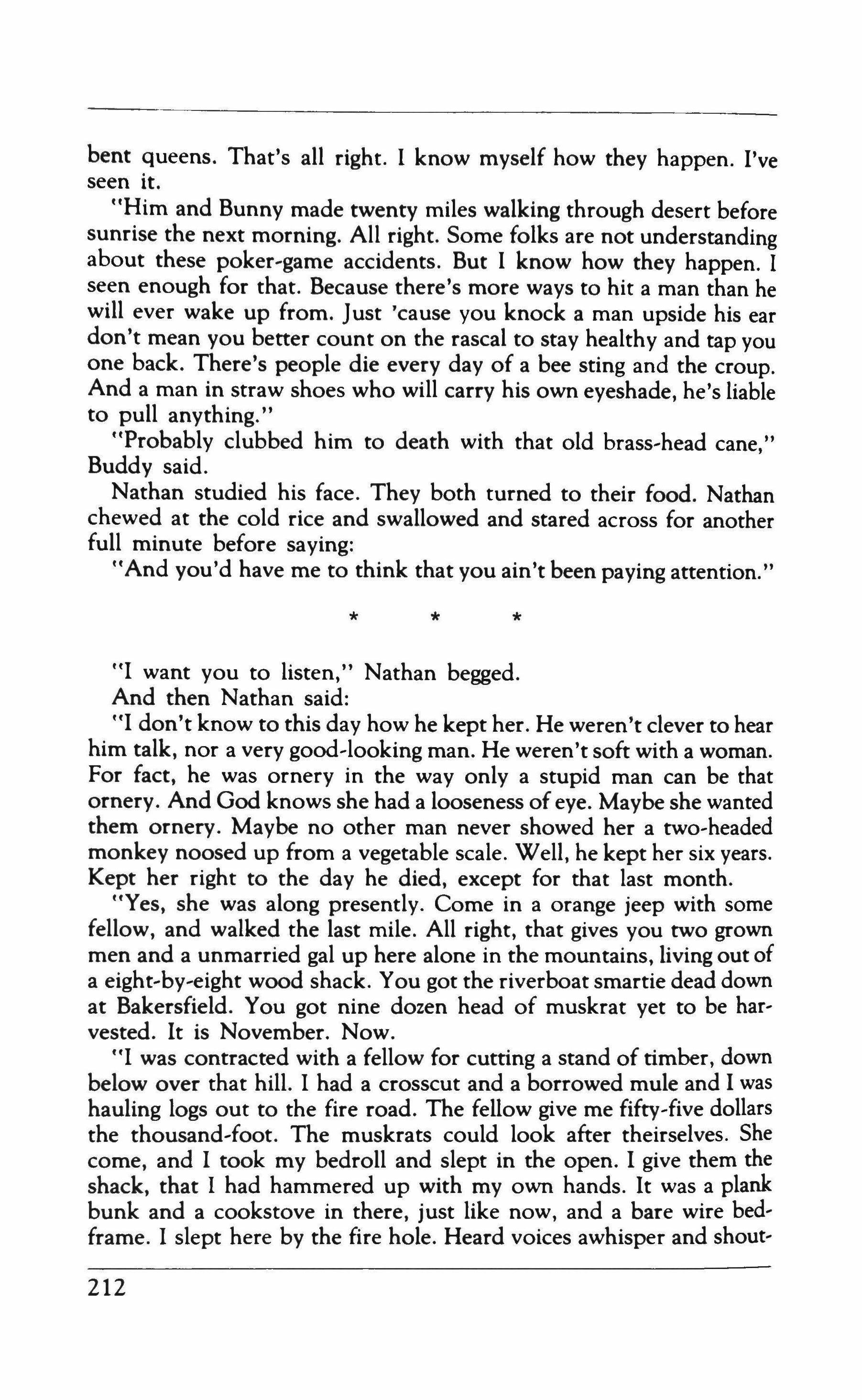
"1 want you to listen," Nathan begged. And then Nathan said:
"I don't know to this day how he kept her. He weren't clever to hear him talk, nor a very good-looking man. He weren't soft with a woman. For fact, he was ornery in the way only a stupid man can be that ornery. And God knows she had a looseness of eye. Maybe she wanted them ornery. Maybe no other man never showed her a two-headed monkey noosed up from a vegetable scale. Well, he kept her six years. Kept her right to the day he died, except for that last month.
"Yes, she was along presently. Come in a orange jeep with some fellow, and walked the last mile. All right, that gives you two grown men and a unmarried gal up here alone in the mountains, living out of a eight-by-eight wood shack. You got the riverboat smartie dead down at Bakersfield. You got nine dozen head of muskrat yet to be harvested. It is November. Now.
"I was contracted with a fellow for cutting a stand of timber, down below over that hill. I had a crosscut and a borrowed mule and I was hauling logs out to the fire road. The fellow give me fifty-five dollars the thousand-foot. The muskrats could look after theirselves. She come, and I took my bedroll and slept in the open. I give them the shack, that 1 had hammered up with my own hands. It was a plank bunk and a cookstove in there, just like now, and a bare wire bed, frame. I slept here by the fire hole. Heard voices awhisper and shout,
* * *
212

ing and left them to do what they would do. Just stirred up early and went off to my stand. I thought he was likely to take and clear her on out.
"First week or two it was, 'Abner, c'mon now, let's get along from here. I don't guess I can spend the rest of my life watching him fuss with them badgers.' She called them badgers. She knew they was muskrats. 'Let's get along on up to Portland now, like you said. I don't guess I can spend the rest of my life out here in nowhere just 'cause some fool pair of straw shoes down at Bakersfield tipped over and pointed their toes at the moon. C'mon now.' And he would say, 'Yes, uh-huh, Presently.' Seems he had promised about taking her on up to Portland. 'We'll go when things get all good and quiet,' he said. 'Can't hardly get things more quiet than two Buckle men and a pond full of badgers,' she said. 'It's cold up here. Let's go.' He said, 'Yes, Honeybunny, presently,' and they stayed.
"So I was working a log up to the fire road, in back of that mule. And first thing, I saw her from here to that cross-trail of yers, hundred yards off, standing and watching me. She had on a little rag dress and she was holding herself at the elbows to keep warm. I could not make out her face but I could tell she was watching, the way you can tell when the thing that a far-off person is watching is you. I unhitched and went down for another log and drove it back up and she was still watching. I went again and drove up another and she was gone. Next morning she come back and sat on a stump and said, 'You and that mule fixing to drag them all the way down into town?'
"I said no. We wasn't fixing to do that at all. A man would come by in his truck.
"She said: 'Urn.'
"I hitched up another and the mule jerked and I very near to had my foot smashed. Went, and come back, and she said: 'Don't you never get tired?' So I quit for a drink from the pail, and wet my face.
"She said: 'How old are you, Nathan?'
"I said: 'Twenty years.'
"She said: 'Me, I'm a old woman of twenty-two.'
"I said: 'Yes, ma'am.'
"And she said: 'Did you ever touch a old woman, Nathan?'
"I said: 'Yes, ma'am. I have. Down there in Sacramento. Had me a five-dollar woman this one time. Must of been forty years old if she was weaned.'
"She said: 'Nathan, you come over here, boy.'
"So I set down the ladle and walked back to that mule and snapped it across the flank with them lines and I said: 'Up!'
"Three days, nothing more. Then he took a notion of going down
213

into town. 'And I am too,' she said. But he said: 'No you ain't either. We seen how that come out already before. Just bring you along to town and some hardware store Moses will get himself bit with a snake. No thank you.' He told her he wasn't going to town for no fun. He was going to smell out the air, he told her. And maybe then they could get along up to Portland. I heard all they was saying from outside the shack here. She said: 'Yes, and then whose fault is it gonna be when that boy of yers has me off in the weeds?' He didn't say nothing to that, not for some time. Then he commenced to laugh. She did not laugh. They both knew I was out here, in earshot, awake on the ground. Next morning he walked into town.
"Hauled logs all that day and she sat on a stump and we didn't have two words for each other. Fixed a supper and left it for her on the stove. She could eat it if she had the notion. Nighttime, and she stuck her head out to say, 'You might as well sleep in the shack if you want. It's just a empty bunk here. Might as well you be in it as empty.' I slept on the dirt and it dribbled a cold November rain. Covered my head with a sheet of rubber, and I guess I slept just as good as any man does who is sleeping wet. Next day the same, but she did not offer no invitations. Just slammed herself up inside the shack. Third day, still the cold dribble, and that mule could not get a good footing, so I cut timber and left it lay. Come up at night, and there he was back.
"He had brought whiskey. He seem to have spent a good part ofhis town time hooked over the rim of a glass. He was frisky and chirpy in the way such a ornery man as him will not do when he has all his sober wits. He was not much a drinking man, and now he was getting him drunk. All right, I thought to myself then. All right. Well, the air smelled friendly enough, he said, and he guessed it had come time they could get along up to Portland, he said. Tomorrow, or maybe the next day, whichever. She wasn't saying too much ofnothing. Asked me for two glasses and they shut the shack door in my face and lit my kerosene lamp. I went to bed on the muck, third night in a row. Half hour or a hour went by quiet before I woke up and heard their ruckus.
"She was squalling and sobbing like a fat woman in the opera. Heard her scream: 'Yes, and whose fault is that then, Mister Go-totown? Leave me alone here with nothing but that boy of yers, full, grown buck man, and a hundred square miles of bushes, and what else did you expect? Who warned you already before?' Heard that, and yes I felt cold rain.
"My daddy hollered: 'He never!'
"She hollered: 'No, that's right, he would never of knowed how!' and then more of her crying. 'But what else did you expect?'
"My daddy: 'He never! Nathan? He never!'
214

"Her: 'Well then what am I squalling about, Abner?'
"Took my bedroll and went stumbling down to the cutting stand where I couldn't hear them, and went back to sleep under that sheet of rubber. I was thinking that if they would only just get up in the morning and lit off, get on up to Portland, then maybe I would never see neither of them ever again. I hoped they would do it. I went off to sleep thinking that, and thinking just one other thing: that old twelve, gauge I had laying up in the shack.
"Well, I heard him before he got within twenty yards. Slipping and thrashing down through the brush and groaning my name like a longhorn. I didn't know if it was nighttime or early morning, but it was dark yet. And that cold rain. Not making a whisper of sound, I reached for the axe that I kept there for limbing. I waited, laying up next to a deadfall, under that dark sheet of rubber, till he everything but stepped right down on me.
"So I got a look at the barrel of that twelve-gauge before ever I saw him. Come out over me like the snout of some wicked animal sniffing blood, and then him. I left him to take three steps beyond. I swear it to you and to God overhead and I'll swear the same thing to any man, that I only thought of getting that twelve-gauge away from him, and then I would unload it. I swear that to you just as I'm sitting here. And if you don't believe it of me, then what you believe is a lie. I thought of no thought but just getting that gun, so I could unload it. Waited, he staggered on drunk a few steps moaning 'Nathaaan!' and I come out with the dull side of that axe.
"Took him across the back of the kneecaps like he was wheat. I got a hand on that gun but he was back at me, snarling like a wolverine. There in the dark, he did not sound more than half human.
"I yanked that shotgun around thinking to crack open the breech, and him clawing and grabbing and biting to get back ahold of it, and me jabbing my elbow into his face till I could feel and hear his teeth ripping loose, and then he had a grip of it, by the barrel. He was a small man, but strong. He frightened the life out of me when he hooked onto that shotgun. He was not saying a human word. Nor neither was 1. I jerked back on the stock; then thunder. I blew his kneecap right off the leg.
"I said: 'Daddy!'
"And he said: 'Yes, Nathan. Awwhh. Yes, boy.'
"I got him up to the shack, and it was light now, and she was gone. Never saw her again, to this day. She never come back around asking for him, nor even to learn what happened, so far as I know. Heard that shot, and it was enough. I had killed him or he had killed me, either way. I guess she just wasn't curious. And her off somewhere now a
215

woman of sixty-some-odd years old, if the Lord wills it. Ain't that a picture. And did she ever know what become of him, after six years of the two of them? No she did not. I can tell you she did not. Not her, nor no one else.
"Wrapped the leg up with a piece of my shirt, down there in the dark of the stand, and carried him up here to the shack. When light broke I seen that the kneecap was gone, it was just gone, like the top smashed off a mason jar full of raspberry jam. His kneecap was back down on the ground somewhere, at the stand, or it was just scattered everywhichway. I set to go for a doctor. But he said no.
"He would not have me go for no doctor. I will not tell you why because I don't know why. He claimed it was on account of the straw shoes down at Bakersfield, but that was only a lie. He had other reason. I don't say what it was. I don't know. Sometimes I have thought I knew why he did it. But that was wrong. I don't know why.
"He said: 'That's all right, Nathan, you can do all the doctoring I'm gonna need. It ain't so bad. I'll tell you how to do, boy.' It was not a deep wound, for a gunshot, but it was a dread ugly hash of a hole. 'Now dump some hot water over that thing and then let's get it back out of sight under that rag. It's all right, boy.'
"Lingered along almost a month till he died. His knee festered and stunk just like his hand stunk from that diamondback, and he went through a fever. I knew the stink of my daddy's dying flesh, in that little shack. Snow come then, and it was cold for us in there. First snow, but it come with a hard cold snap and lasted a week. We could not keep his leg warm, not with a flaring cookstove nor blankets nor hot cobbles. Because he could not move that leg. So the blood in that leg lay down and stopped where it was, and the leg died, and taken to going colors. Then it did not stink no more. We were too cold up here for flesh to stink. I want to tell you, that leg was a mess.
"I said: 'I'm going to town. I'm going, and bring back a doctor. I'm scared for that leg to rot right off yer body, and you'll die.'
"He said: 'No you ain't either.'
"And I said: 'But I am,' and I left. Got half a mile off in the snow till I heard that twelve-gauge again. I came hopping back in a hot sweat but he was still there, on the bare wire bedframe. He hadn't done nothing. He had just fired a round into the door, and blowed the door off its hinges.
"He said: 'See if you bring a doctor for me.' He said: 'And next time you go off, Nathan, don't just think of taking the shells. Take all the knives and ropes too. See if you get me a doctor.'
"So I did not. I stayed right in that shack with him, watching my daddy rot. Then he died. The last three or four days he fevered again,
216

and did not say nothing. He did not tell me no good-byes. He did not tell me nothing. He just died. He had what he wanted.
"Twenty inches of snow, and the ground frozen like stone. I sat up with him inside there for two days, after he died, not doing nothing but stay just warm enough to keep me alive. I did not know what to do. He was a man I did not like, but he was my daddy, and now I had killed him. And now it was mine to bury him. I could not leave him be, for the vermin and animals. I could not put him into the ground.
"I took and tied him right down to that bedframe with rope, tied his two hands and his two feet and tied him around the middle. I dragged him and that bedframe out of the shack and right down through here to the pond, it was still a pond then, and right out across that ice I dragged him and pushed him, plowing two feet of snow along as I went. I scooped out a space from the snow. And then I took that same axe I had used when I cut him down, and hacked me a hole.
"And you know what I done with him then but I'm going to tell you the rest anyway. Lined up with that smaller of two firs on the far side. You see? Right across here. About midway from this side to the other." Nathan was unrelenting. "You see?"
By the firelight Buddy saw only Nathan, pointing toward the bog. Beyond in the darkness he could discern no pair of firs, but he knew they were there. Buddy sat very still, chilled by the ice of a long-passed winter, chilled with recognition, moving only to shiver.
He knew there was more. He knew that both liens were being called, and that his mountain hideout was already in foreclosure.
"I chopped me a hole in that ice, big enough for a man and a bedframe," Nathan said. "And then I buried my daddy through it. Sunk him right out of sight."
217
Reviews
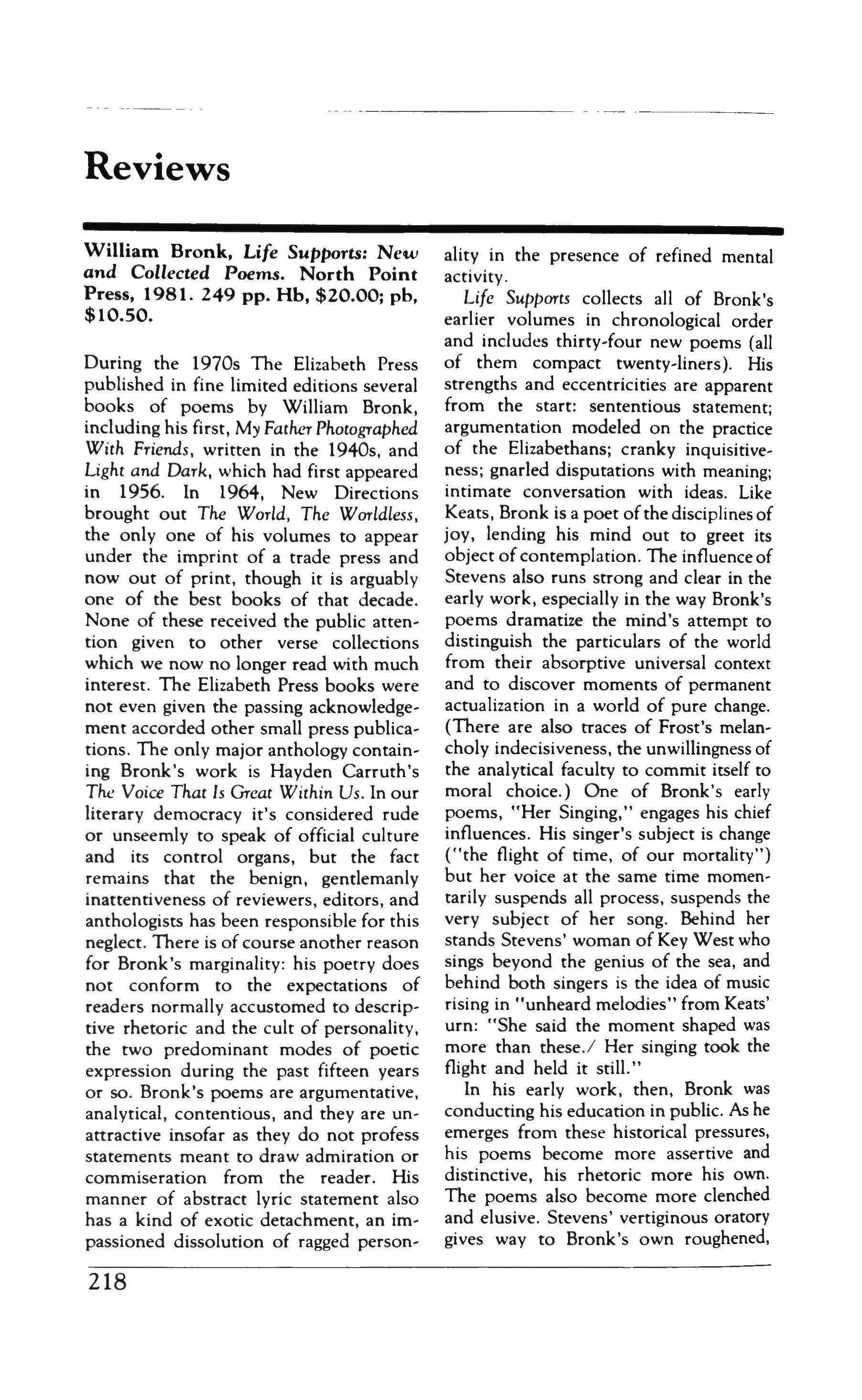
William Bronk, Life Supports: New and Collected Poems. North Point Press, 1981. 249 pp. Hb, $20.00; pb, $10.50.
During the 1970s The Elizabeth Press published in fine limited editions several books of poems by William Bronk, including his first, My Father Photographed With Friends, written in the 1940s, and Light and Dark, which had first appeared in 1956. In 1964, New Directions brought out The World, The Worldlas, the only one of his volumes to appear under the imprint of a trade press and now out of print, though it is arguably one of the best books of that decade. None of these received the public attention given to other verse collections which we now no longer read with much interest. The Elizabeth Press books were not even given the passing acknowledgement accorded other small press publications. The only major anthology containing Bronk's work is Hayden Carruth's The Voice That Is Great Within Us. In our literary democracy it's considered rude or unseemly to speak of official culture and its control organs, but the fact remains that the benign, gentlemanly inattentiveness of reviewers, editors, and anthologists has been responsible for this neglect. There is of course another reason for Bronk's marginality: his poetry does not conform to the expectations of readers normally accustomed to descriptive rhetoric and the cult of personality, the two predominant modes of poetic expression during the past fifteen years or so. Bronk's poems are argumentative, analytical, contentious, and they are unattractive insofar as they do not profess statements meant to draw admiration or commiseration from the reader. His manner of abstract lyric statement also has a kind of exotic detachment, an impassioned dissolution of ragged person-
alirv in the presence of refined mental activity.
Life Supports collects all of Bronk's earlier volumes in chronological order and includes thirty-four new poems (all of them compact twenty-liners). His strengths and eccentricities are apparent from the start: sententious statement; argumentation modeled on the practice of the Elizabethans; cranky inquisitiveness; gnarled disputations with meaning; intimate conversation with ideas. Like Keats, Bronk is a poet ofthe disciplines of joy, lending his mind out to greet its object of contemplation. The influence of Stevens also runs strong and clear in the early work, especially in the way Bronk's poems dramatize the mind's attempt to distinguish the particulars of the world from their absorptive universal context and to discover moments of permanent actualization in a world of pure change. (There are also traces of Frost's melancholy indecisiveness, the unwillingness of the analytical faculty to commit itself to moral choice.) One of Bronk's early poems, "Her Singing," engages his chief influences. His singer's subject is change ("the flight of time, of our mortality") but her voice at the same time momentarily suspends all process, suspends the very subject of her song. Behind her stands Stevens' woman of Key West who sings beyond the genius of the sea, and behind both singers is the idea of music rising in "unheard melodies" from Keats' urn: "She said the moment shaped was more than these.! Her singing took the flight and held it still."
In his early work, then, Bronk was conducting his education in public. As he emerges from these historical pressures, his poems become more assertive and distinctive, his rhetoric more his own. The poems also become more clenched and elusive. Stevens' vertiginous oratory gives way to Bronk's own roughened,
218
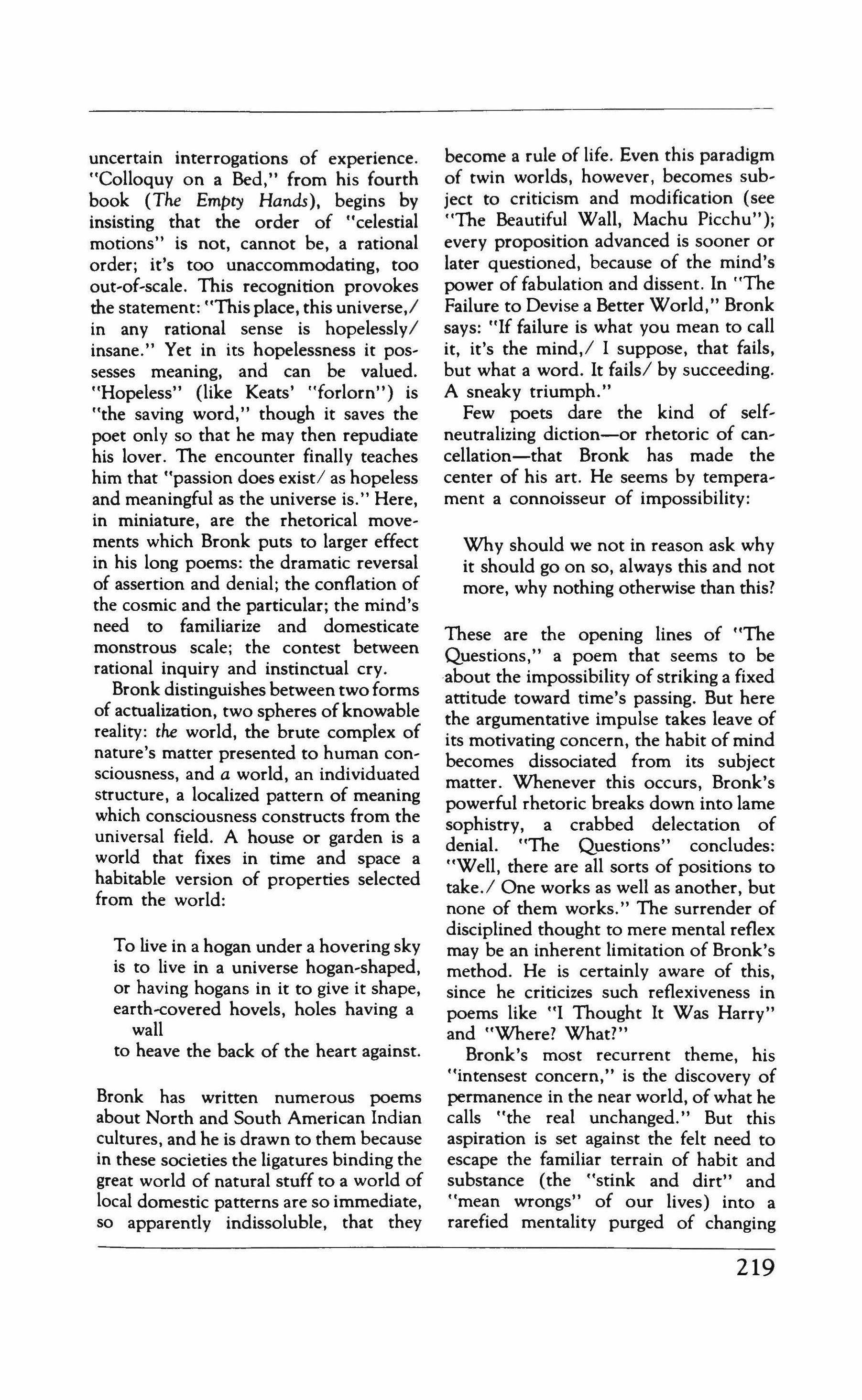
uncertain interrogations of experience. "Colloquy on a Bed," from his fourth book (The Empty Hands), begins by insisting that the order of "celestial motions" is not, cannot be, a rational order; it's too unaccommodating, too out-of-scale. This recognition provokes the statement: "This place, this universe,/ in any rational sense is hopelessly/ insane." Yet in its hopelessness it possesses meaning, and can be valued. "Hopeless" (like Keats' "forlorn") is "the saving word," though it saves the poet only so that he may then repudiate his lover. The encounter finally teaches him that "passion does exist/ as hopeless and meaningful as the universe is." Here, in miniature, are the rhetorical movements which Bronk puts to larger effect in his long poems: the dramatic reversal of assertion and denial; the conflation of the cosmic and the particular; the mind's need to familiarize and domesticate monstrous scale; the contest between rational inquiry and instinctual cry. Bronk distinguishes between two forms of actualization, two spheres of knowable reality: the world, the brute complex of nature's matter presented to human consciousness, and a world, an individuated structure, a localized pattern of meaning which consciousness constructs from the universal field. A house or garden is a world that fixes in time and space a habitable version of properties selected from the world:
To live in a hogan under a hovering sky is to live in a universe hogan-shaped, or having hogans in it to give it shape, earth-covered hovels, holes having a wall to heave the back of the heart against.
Bronk has written numerous poems about North and South American Indian cultures, and he is drawn to them because in these societies the ligatures binding the great world of natural stuff to a world of local domestic patterns are so immediate, so apparently indissoluble, that they
become a rule of life. Even this paradigm of twin worlds, however, becomes subject to criticism and modification (see "The Beautiful Wall, Machu Picchu"); every proposition advanced is sooner or later questioned, because of the mind's power of fabulation and dissent. In "The Failure to Devise a Better World," Bronk says: "If failure is what you mean to call it, it's the mind,/ I suppose, that fails, but what a word. It fails/ by succeeding.
A sneaky triumph."
Few poets dare the kind of selfneutralizing diction-or rhetoric of cancellation-that Bronk has made the center of his art. He seems by temperament a connoisseur of impossibility:
Why should we not in reason ask why it should go on so, always this and not more, why nothing otherwise than this?
These are the opening lines of "The Questions," a poem that seems to be about the impossibility of striking a fixed attitude toward time's passing. But here the argumentative impulse takes leave of its motivating concern, the habit of mind becomes dissociated from its subject matter. Whenever this occurs, Bronk's powerful rhetoric breaks down into lame sophistry, a crabbed delectation of denial. "The Questions" concludes: "Well, there are all sorts of positions to take.! One works as well as another, but none of them works." The surrender of disciplined thought to mere mental reflex may be an inherent limitation of Bronk's method. He is certainly aware of this, since he criticizes such reflexiveness in poems like "I Thought It Was Harry" and "Where? What?"
Bronk's most recurrent theme, his "intensest concern," is the discovery of permanence in the near world, of what he calls "the real unchanged." But this aspiration is set against the felt need to escape the familiar terrain of habit and substance (the "stink and dirt" and "mean wrongs" of our lives) into a rarefied mentality purged of changing
219
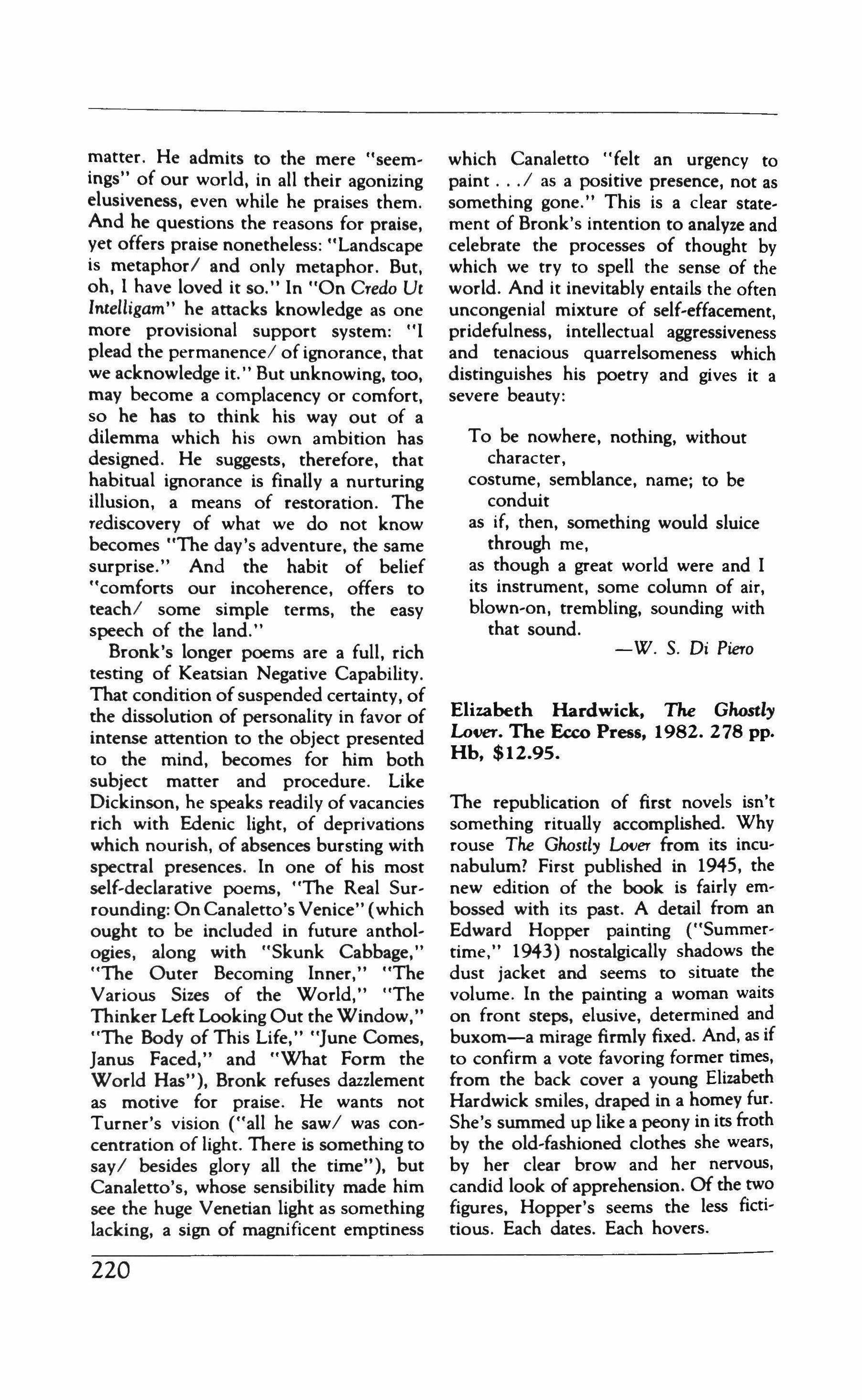
matter. He admits to the mere "seemings" of our world, in all their agonizing elusiveness, even while he praises them. And he questions the reasons for praise, yet offers praise nonetheless: "Landscape is metaphor/ and only metaphor. But, oh, I have loved it so." In "On Credo Ut lntelligam" he attacks knowledge as one more provisional support system: "I plead the permanence/ of ignorance, that we acknowledge it." But unknowing, too, may become a complacency or comfort, so he has to think his way out of a dilemma which his own ambition has designed. He suggests, therefore, that habitual ignorance is finally a nurturing illusion, a means of restoration. The rediscovery of what we do not know becomes "The day's adventure, the same surprise." And the habit of belief "comforts our incoherence, offers to teach/ some simple terms, the easy speech of the land."
Bronk's longer poems are a full, rich testing of Keatsian Negative Capability. That condition ofsuspended certainty, of the dissolution of personality in favor of intense attention to the object presented to the mind, becomes for him both subject matter and procedure. Like Dickinson, he speaks readily of vacancies rich with Edenic light, of deprivations which nourish, of absences bursting with spectral presences. In one of his most self-declarative poems, "The Real Surrounding: On Canaletto's Venice" (which ought to be included in future anthologies, along with "Skunk Cabbage," "The Outer Becoming Inner," "The Various Sizes of the World," "The Thinker Left Looking Out the Window," "The Body of This Life," "June Comes, Janus Faced," and "What Form the World Has"), Bronk refuses dazzlement as motive for praise. He wants not Turner's vision ("all he saw/ was concentration of light. There is something to say/ besides glory all the time"), but Canaletto's, whose sensibility made him see the huge Venetian light as something lacking, a sign of magnificent emptiness
which Canaletto "felt an urgency to paint / as a positive presence, not as something gone." This is a clear statement of Bronk's intention to analyze and celebrate the processes of thought by which we try to spell the sense of the world. And it inevitably entails the often uncongenial mixture of self-effacement, pridefulness, intellectual aggressiveness and tenacious quarrelsomeness which distinguishes his poetry and gives it a severe beauty:
To be nowhere, nothing, without character, costume, semblance, name; to be conduit as if, then, something would sluice through me, as though a great world were and I its instrument, some column of air, blown-on, trembling, sounding with that sound.
-w. S. Di Pieto
Elizabeth Hardwick, The Ghostly Loeer, The Eeco Press, 1982.278 pp. Rh, $12.95.
The republication of first novels isn't something ritually accomplished. Why rouse The Ghostly Lover from its incunabulum? First published in 1945, the new edition of the book is fairly embossed with its past. A detail from an Edward Hopper painting ("Summertime," 1943) nostalgically shadows the dust jacket and seems to situate the volume. In the painting a woman waits on front steps, elusive, determined and buxom-a mirage firmly fixed. And, as if to confirm a vote favoring former times, from the back cover a young Elizabeth Hardwick smiles, draped in a homey fur. She's summed up like a peony in its froth by the old-fashioned clothes she wears, by her clear brow and her nervous, candid look of apprehension. Of the two figures, Hopper's seems the less fictitious. Each dates. Each hovers.
220
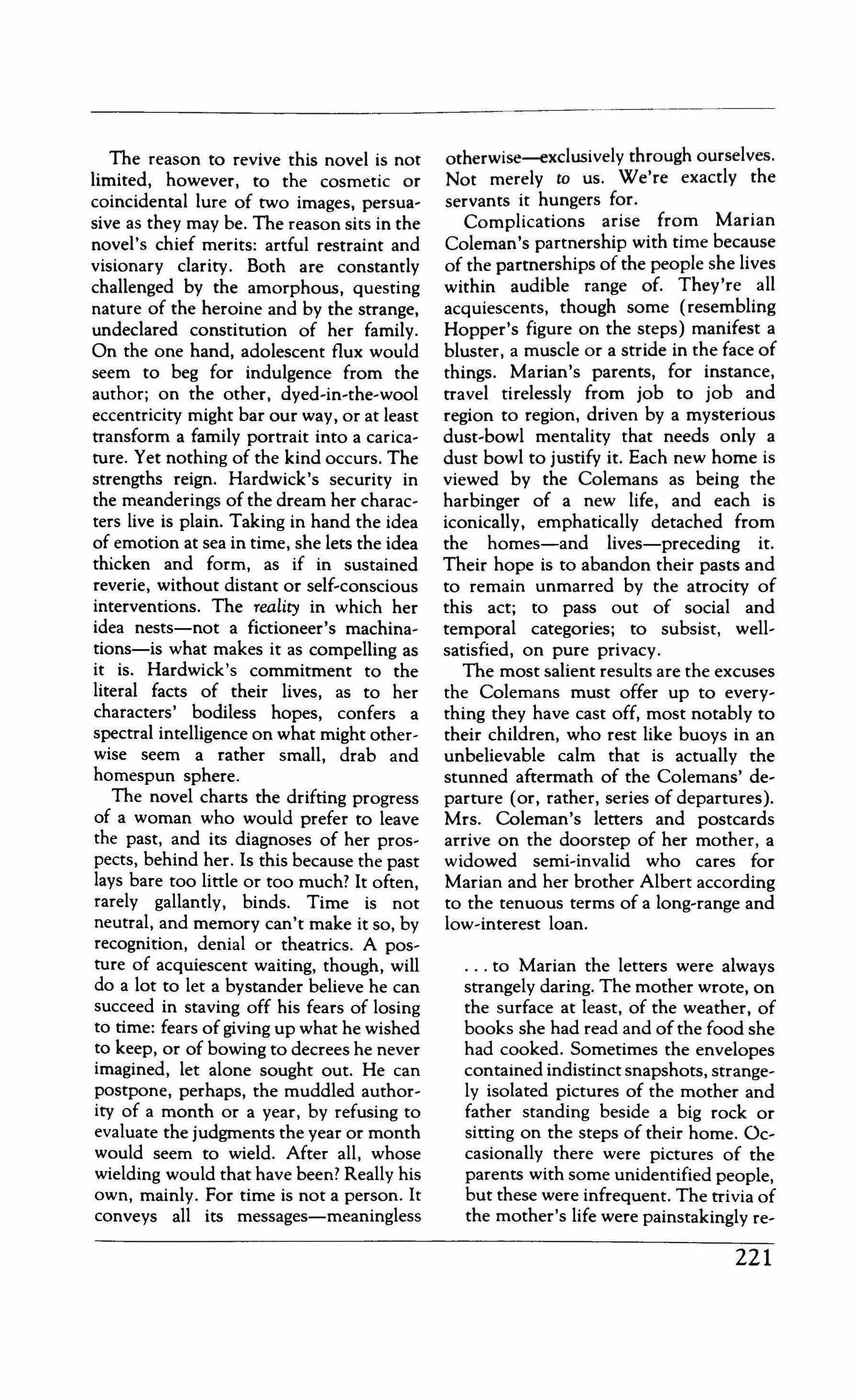
The reason to revive this novel is not limited, however, to the cosmetic or coincidental lure of two images, persuasive as they may be. The reason sits in the novel's chief merits: artful restraint and visionary clarity. Both are constantly challenged by the amorphous, questing nature of the heroine and by the strange, undeclared constitution of her family. On the one hand, adolescent flux would seem to beg for indulgence from the author; on the other, dyed-in-the-wool eccentricity might bar our way, or at least transform a family portrait into a caricature. Yet nothing of the kind occurs. The strengths reign. Hardwick's security in the meanderings of the dream her characters live is plain. Taking in hand the idea of emotion at sea in time, she lets the idea thicken and form, as if in sustained reverie, without distant or self-conscious interventions. The reality in which her idea nests-not a fictioneer's machinations-is what makes it as compelling as it is. Hardwick's commitment to the literal facts of their lives, as to her characters' bodiless hopes, confers a spectral intelligence on what might otherwise seem a rather small, drab and homespun sphere.
The novel charts the drifting progress of a woman who would prefer to leave the past, and its diagnoses of her prospects, behind her. Is this because the past lays bare too little or too much? It often, rarely gallantly, binds. Time is not neutral, and memory can't make it so, by recognition, denial or theatrics. A posture of acquiescent waiting, though, will do a lot to let a bystander believe he can succeed in staving off his fears of losing to time: fears of giving up what he wished to keep, or of bowing to decrees he never imagined, let alone sought out. He can postpone, perhaps, the muddled authority of a month or a year, by refusing to evaluate the judgments the year or month would seem to wield. After all, whose Wielding would that have been? Really his own, mainly. For time is not a person. It conveys all its messages-meaningless
otherwise-exclusively through ourselves. Not merely to us. We're exactly the servants it hungers for.
Complications arise from Marian Coleman's partnership with time because of the partnerships of the people she lives within audible range of. They're all acquiescents, though some (resembling Hopper's figure on the steps) manifest a bluster, a muscle or a stride in the face of things. Marian's parents, for instance, travel tirelessly from job to job and region to region, driven by a mysterious dust-bowl mentality that needs only a dust bowl to justify it. Each new home is viewed by the Colemans as being the harbinger of a new life, and each is iconically, emphatically detached from the homes-and lives-preceding it. Their hope is to abandon their pasts and to remain unmarred by the atrocity of this act; to pass out of social and temporal categories; to subsist, wellsatisfied, on pure privacy.
The most salient results are the excuses the Colemans must offer up to everything they have cast off, most notably to their children, who rest like buoys in an unbelievable calm that is actually the stunned aftermath of the Colemans' departure (or, rather, series of departures). Mrs. Coleman's letters and postcards arrive on the doorstep of her mother, a widowed semi-invalid who cares for Marian and her brother Albert according to the tenuous terms of a long-range and low-interest loan.
to Marian the letters were always strangely daring. The mother wrote, on the surface at least, of the weather, of books she had read and of the food she had cooked. Sometimes the envelopes contained indistinct snapshots, strangely isolated pictures of the mother and father standing beside a big rock or sitting on the steps of their home. Occasionally there were pictures of the parents with some unidentified people, but these were infrequent. The trivia of the mother's life were painstakingly re-
221

corded, but beyond that there was nothing except suggestion. In every letter there were a few discordant lines of mysterious personal import. Slipped in between the news of flowers and meals, there would be a sharp and abortive cry. She would say, "Last night I was lonely," and then, as if some censor were working, the theme would break off... In this way, Marian, her grandmother and her brother, had a more or less implicit knowledge of the mother's sadness. Yet, they knew it only abstractly and never quite gave up the hope that one day a letter would come which would fully supplement the brief moans.
(p.S)
Predictably, such a letter isn't sent. The "abortive cry" remains only a flirtation, donated to anonymous and solitary weeks. The closest the mother (virtually never identified instead as "her mother") comes to emotional intimacy with Marian is to ask her once, when hard pressed, for hard cash. By that time, enough time has elapsed-in movements that seem like dilations of nameless space, and like absconders from movement-that Marian has shed most of her beguilement regarding her parents and her parents' habits. She is able to turn down her mother's request for money. She believes she must strike out a little more blindly and boldly for her own life, not wait for it to materialize from theirs. Rightly, she finds it useless to expect advice from feckless deserters. Their chronic disorientation and their vagueness can provide no
steady guidance, though those dubious qualifiers did christen her at one time. And since her beginnings become unacceptable to Marian as ends, time itself clarifies. Chronology is maneuverable; it is not decisively foretold. The ways of families, and their limbos, are meant to be outgrown.
One of the closing beauties of the novel is that it goes this far, then stops. Or pauses. Hardwick's spare and dreamy sentence is complete, by unobtrusive efforts. Her resolution, although offered without fanfare, is durable. Exrrapolating, though, I doubt it would last for long outside the novel's framework. The challenge time-or personal historyposes is too complex and arduous for that. Using Hardwick's as a cogent and necessary originator, ponder a different situation, a different book. What if time past did not crowd Marian, but vanished, ungoaded? Never to return as she had known it? Who would she have been then? Where would she have found sustenance? How would she have built character? Would she have survived? In some stories, there remains only a bewitching, charred heap of unanswerables.
-Molly McQuade
Publishers of books reviewed:
North Point Press 850 Talbot Ave. Berkeley, CA 94706
The Ecco Press 18 W. 30th St. New York, NY 1000 1
222
Contributors
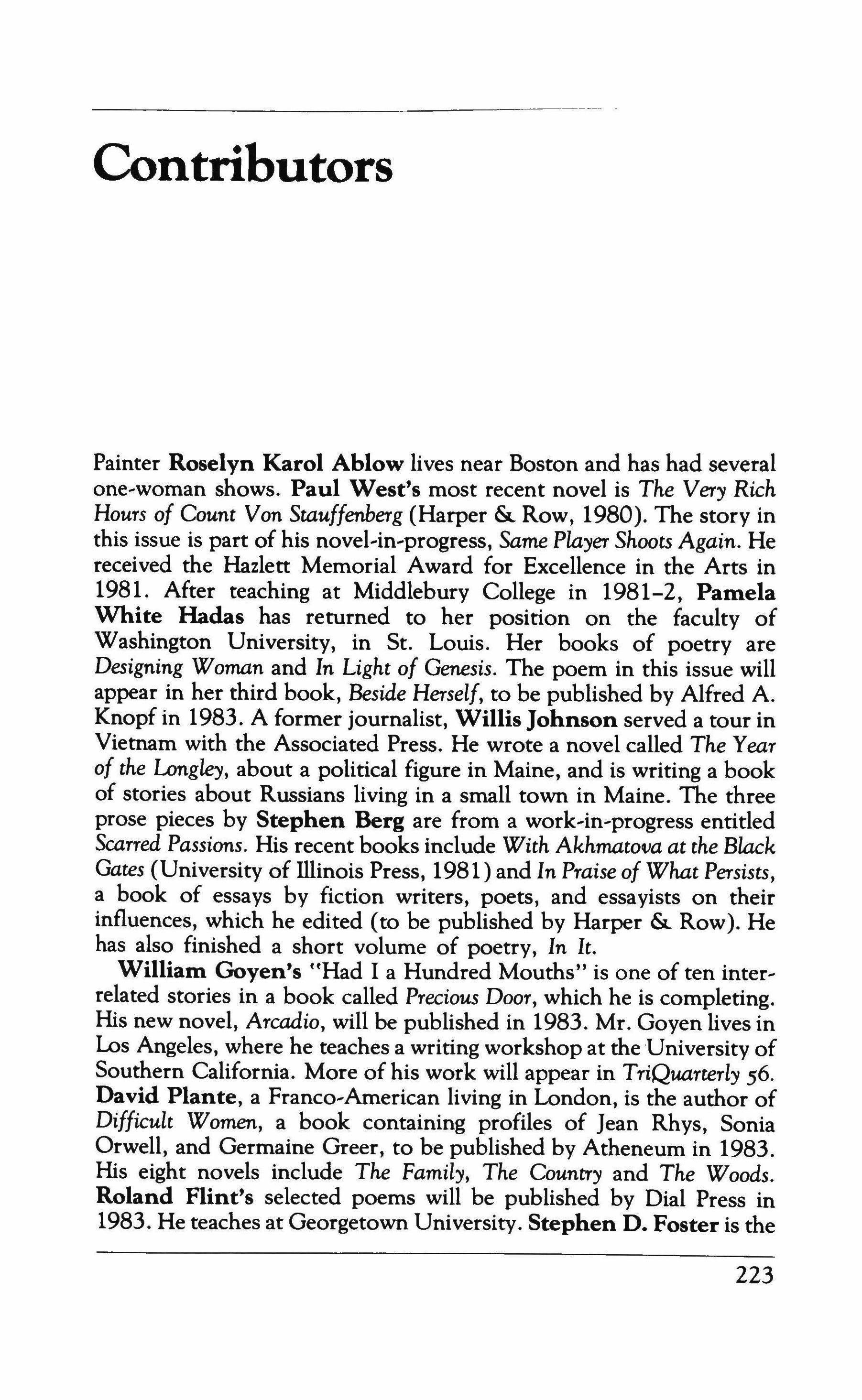
Painter Roselyn Karol Ablow lives near Boston and has had several one-woman shows. Paul West's most recent novel is The Very Rich Hours of Count Von Stauffenberg (Harper & Row, 1980). The story in this issue is part of his novel-in-progress, Same Player Shoots Again. He received the Hazlett Memorial Award for Excellence in the Arts in 1981. After teaching at Middlebury College in 1981-2, Pamela White Hadas has returned to her position on the faculty of Washington University, in St. Louis. Her books of poetry are Designing Woman and In Light of Genesis. The poem in this issue will appear in her third book, Beside Herself, to be published by Alfred A. Knopf in 1983. A former journalist, Willis Johnson served a tour in Vietnam with the Associated Press. He wrote a novel called The Year of the Longley, about a political figure in Maine, and is writing a book of stories about Russians living in a small town in Maine. The three prose pieces by Stephen Berg are from a work-in-progress entitled Scarred Passions. His recent books include With Akhmatova at the Black Gates (University of lllinois Press, 1981) and In Praise of What Persists, a book of essays by fiction writers, poets, and essayists on their influences, which he edited (to be published by Harper & Row). He has also finished a short volume of poetry, In It.
William Goyen's "Had I a Hundred Mouths" is one of ten inter, related stories in a book called Precious Door, which he is completing. His new novel, Arcadio, will be published in 1983. Mr. Goyen lives in Los Angeles, where he teaches a writing workshop at the University of Southern California. More of his work will appear in TriQuarterly 56. David Plante, a Franco-American living in London, is the author of Difficult Women, a book containing profiles of Jean Rhys, Sonia Orwell, and Germaine Greer, to be published by Atheneum in 1983. His eight novels include The Family, The Country and The Woods. Roland Flint's selected poems will be published by Dial Press in 1983. He teaches at Georgetown University. Stephen D. Foster is the
223
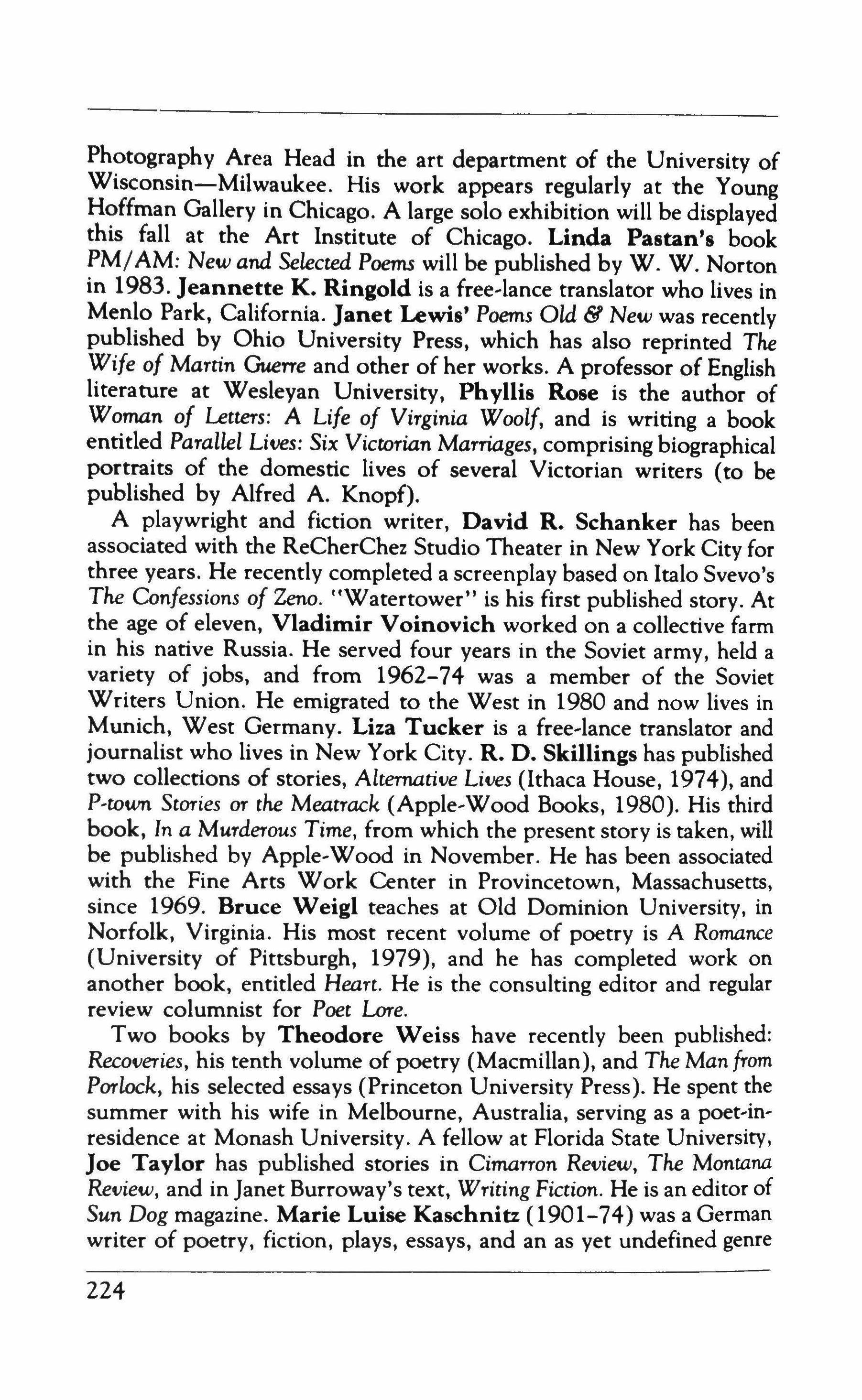
Photography Area Head in the art department of the University of Wisconsin-Milwaukee. His work appears regularly at the Young Hoffman Gallery in Chicago. A large solo exhibition will be displayed this fall at the Art Institute of Chicago. Linda Pastan's book PM/AM: New and Selected Poems will be published by W. W. Norton in 1983. Jeannette K. Ringold is a free-lance translator who lives in Menlo Park, California. Janet Lewis' Poems Old & New was recently published by Ohio University Press, which has also reprinted The Wife of Martin Guerre and other of her works. A professor of English literature at Wesleyan University, Phyllis Rose is the author of Woman of Letters: A Life of Virginia Woolf, and is writing a book entitled Parallel Lives: Six Victorian Marriages, comprising biographical portraits of the domestic lives of several Victorian writers (to be published by Alfred A. Knopf).
A playwright and fiction writer, David R. Schanker has been associated with the ReCherChez Studio Theater in New York City for three years. He recently completed a screenplay based on !talo Svevo's The Confessions of Zeno. "Watertower" is his first published story. At the age of eleven, Vladimir Voinovich worked on a collective farm in his native Russia. He served four years in the Soviet army, held a variety of jobs, and from 1962-74 was a member of the Soviet Writers Union. He emigrated to the West in 1980 and now lives in Munich, West Germany. Liza Tucker is a free-lance translator and journalist who lives in New York City. R. D. Skillings has published two collections of stories, Altemati()e Lues (Ithaca House, 1974), and P*town Stories or the Meatrack (Apple-Wood Books, 1980). His third book, In a Murderous Time, from which the present story is taken, will be published by Apple,Wood in November. He has been associated with the Fine Arts Work Center in Provincetown, Massachusetts, since 1969. Bruce Weigl teaches at Old Dominion University, in Norfolk, Virginia. His most recent volume of poetry is A Romance (University of Pittsburgh, 1979), and he has completed work on another book, entitled Heart. He is the consulting editor and regular review columnist for Poet Lore.
Two books by Theodore Weiss have recently been published: Recoeenes, his tenth volume of poetry (Macmillan), and The Man from Porlock, his selected essays (Princeton University Press). He spent the summer with his wife in Melbourne, Australia, serving as a poet-inresidence at Monash University. A fellow at Florida State University, Joe Taylor has published stories in Cimarron Review, The Montana Review, and in Janet Burroway's text, Writing Fiction. He is an editor of Sun Dog magazine. Marie Luise Kaschnitz (1901-74) was a German writer of poetry, fiction, plays, essays, and an as yet undefined genre
224
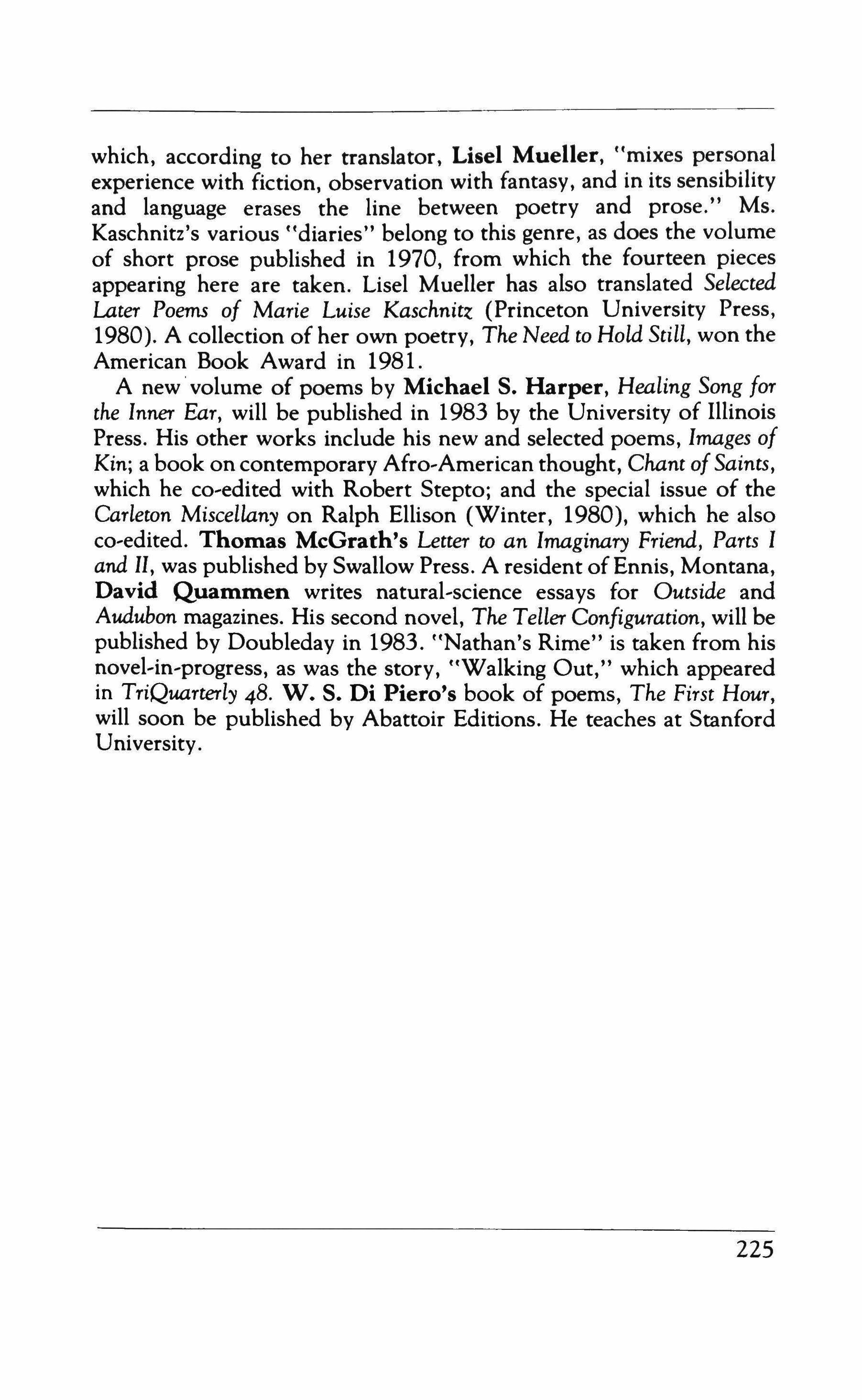
which, according to her translator, Lisel Mueller, "mixes personal experience with fiction, observation with fantasy, and in its sensibility and language erases the line between poetry and prose." Ms. Kaschnitz's various "diaries" belong to this genre, as does the volume of short prose published in 1970, from which the fourteen pieces appearing here are taken. Lisel Mueller has also translated Selected Later Poems of Marie Luise Kaschnitz (Princeton University Press, 1980). A collection of her own poetry, The Need to Hold Still, won the American Book Award in 1981.
A new' volume of poems by Michael S. Harper, Healing Song for the Inner Ear, will be published in 1983 by the University of Illinois Press. His other works include his new and selected poems, Images of Kin; a book on contemporary Afro-American thought, Chant ofSaints, which he co-edited with Robert Stepto; and the special issue of the Carleton Miscellany on Ralph Ellison (Winter, 1980), which he also co-edited. Thomas McGrath's Letter to an Imaginary Friend, Parts I and II, was published by Swallow Press. A resident of Ennis, Montana, David Quammen writes natural-science essays for Outside and Audubon magazines. His second novel, The Teller Configuration, will be published by Doubleday in 1983. "Nathan's Rime" is taken from his novel-in-progress, as was the story, "Walking Out," which appeared in TriQuarterly 48. W. S. Di Piero's book of poems, The First Hour, will soon be published by Abattoir Editions. He teaches at Stanford University.
225
New Writing in India
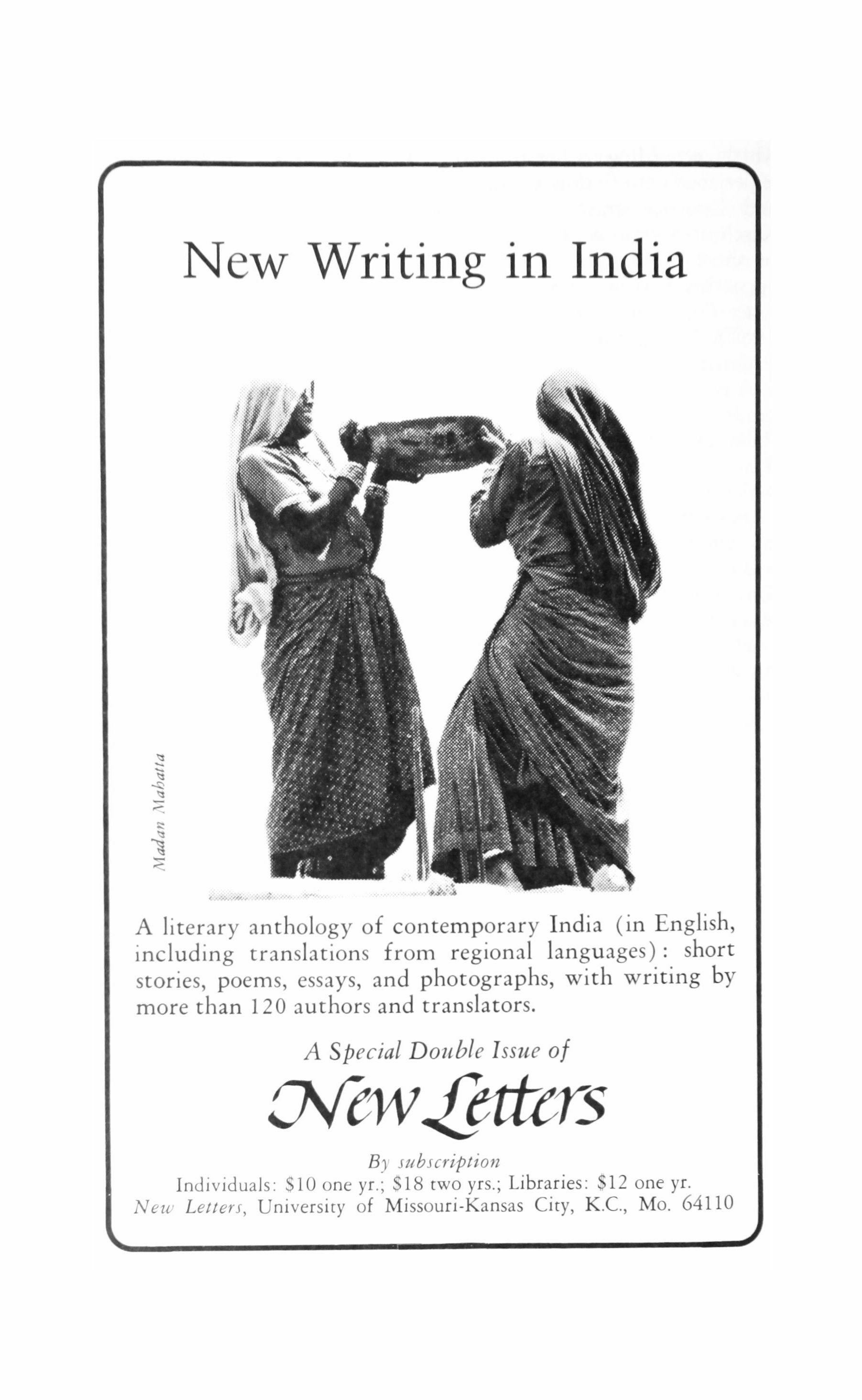
A literary anthology of contemporary India (in English, including translations from regional languages): short stories, poems, essays, and photographs, with writing by more than 120 authors and translators.
A SPecial Double Issue of
B) subscrioiion
Individuals: S10 one yr.; $18 two yrs.; Libraries: $12 one yr.
New Letters, University of Missouri-Kansas City, KC., Mo. 64110
CNtw£erttrs
Coming in Future Issues of Tri«)2um1Mui1)f
#56

General issue-fiction and autobiography by William Goyen, stories by Amy Hempel, William Pitt Root, Charles Baxter, Samuel Reifler and others. Poems by Marvin Bell, Simone Di Piero, Dennis Schmitz, Mairi Macinnes, John Peck, and others.
#57 Special issue on writing and art from Spain since the death of Franco, with fiction, poetry, essays, paintings, street murals, and graffiti.
Please 0 enter a subscription to TriQuarterly for:
o renew
01 year ($14) o 2 years ($25) o 3 years ($35) o life ($100)
o I enclose $
o Charge my VISA/MasterCard #
o Please bill me
Signature Exp. date
Please start subscription with issue #
Additional or gift subscriptions are available at even greater savings: o 1 year ($12) 0 2 years ($20) Name
Name Address City State Zip
City State
Name Address City State
Address
Zip
Zip
lThegeorgia�iew
1947, a rich blend of the best in American thought and literatureessays, poetry, fiction, and book reviews, Intended for the informed but nonspecialist reader, The Review appeals across disciplinary
lines by drawing from a wide range of interests: literature, history, philosophy, architecture, film, and the musical and visual arts,
During the past three years al=::::Georgia Review has presented
previously unpublished work by such authors as Gay Wilson Allen, Harriette Simpson Arnow, Robert Bly, Hayden Carruth, Fred Chappell, Malcolm Cowley, Rita Dove, William Faulkner, Frederick Ferre,
Sally Fitzgerald, Pauline Frederick, Clifford Geertz, Mark Harris, Ihab Hassan, Daniel Hoffman, C. Hugh Holman, Richard Hugo, Philip Levine, Howard Nemerov, Joyce Carol Oates, Flannery O'Connor, Linda Pastan, Ronald Paulson, Walker Percy, Louis
Simpson, Peter Stitt, David Wagoner, Marilyn Waniek, Robert Penn Warren, Gerald Weales, Rene Wellek, Eudora Welty, James Wright, and many others-Nobel laureates and Pulitzer Prize-winners, as
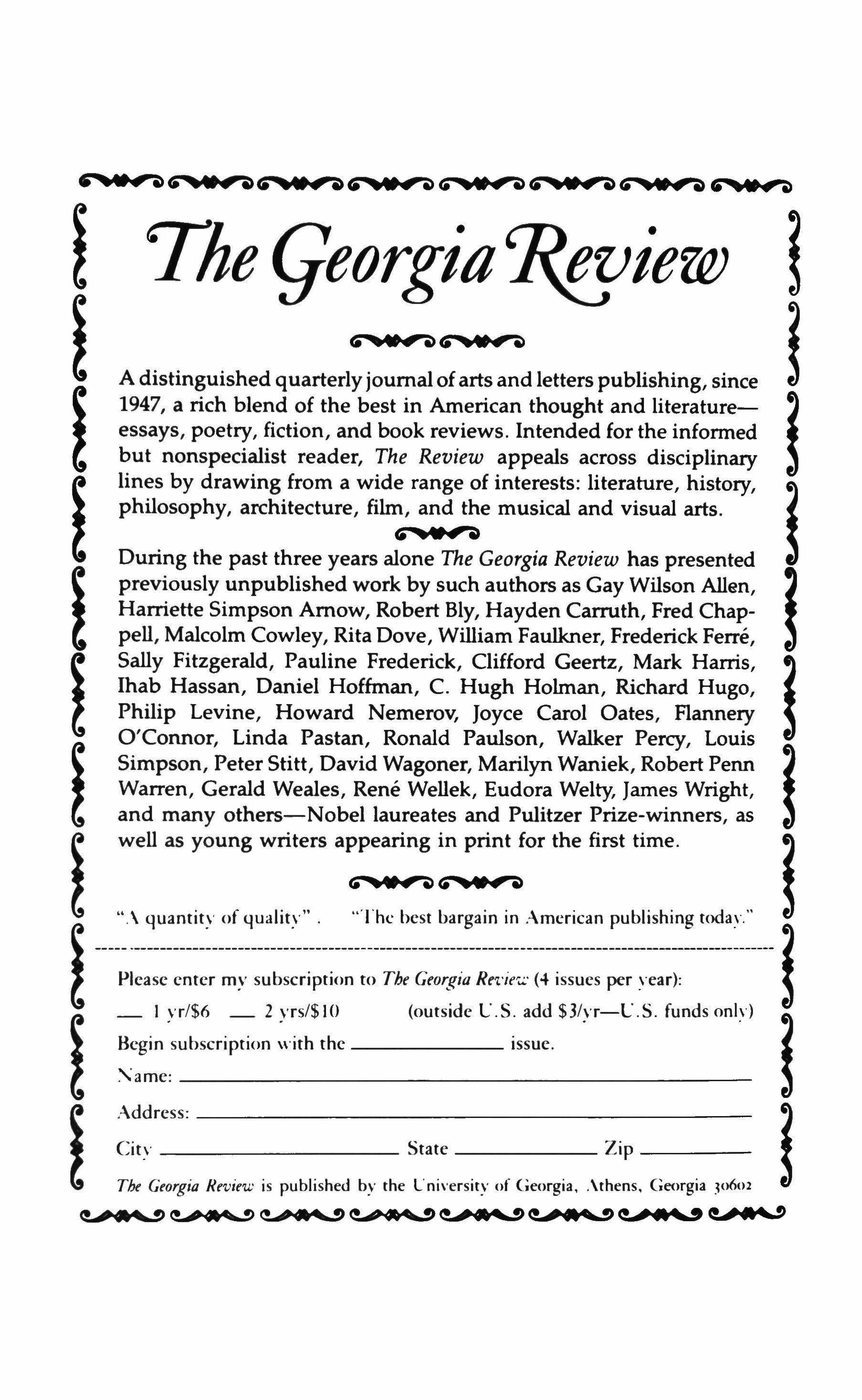
Please enter my subscription to The Georgia Recieu: (4 issues per year):
I yr/$6 2 yrs/$IO (outside L'.S. add $3/yr-L'.S, funds onlv)
Begin subscription with the issue, 'ame:
Address:
The Georgia Review is published by the Lniversiry of Georgia, Athens, Georgia 3<1602
�
�
�
�
��
�
j
�
2
3
��������
Cit\' State Zip

The National Poetry Series
HUGGING THE JUKEBOX
Naomi Shihab Nve
Selected by Josephine Miles
$12.50 cloth, $5.95 paper
These poems have the strength of folk wisdom-warm, with a generous hugging of reality. A book of genuine distinction.
E. P.Dutton
2 Park Avenue
New York, New York 10016
SECOND SIGHT
Jonathan Aaron
Selected by Anthony Hecht
$10.95 cloth, $5.95 paper
"A splendid, lively and daring book I His poems] are full of a mysterious pertinence. And a poignant loneliness."
-ANTHONY HECHT
Harper & Row Publishers
1 0 East 5 3 rd Street
New York, New York 10022
THE MUD ACTOR
Cyrus Cassells
Selected by Al Young
$14.50 cloth, $7.95 paper
Identity and disguises move us to a deeper confrontation with history. Fresh, delicate, strongly evocative.
Holt, Rinehart & Winston
521 Fifth Avenue
New York, New York 10175
ACCIDENTAL WEATHER
Sherod Santos
Selected by Charles Wright
$10.95 cloth, $7.95 paper
A dazzling, linguistic virtuosity. Minute, often startling observations of nature. A truly original literary talent.
Doubleday & Company, Inc.
245 Park Avenue New York, New York 10017
THE INCOGNITO LOUNGE
Denis Johnson
Selected by Mark Strand
$10.50 cloth, $5.95 paper
A fierce vision that refuses to reject the necessary angels of grace and regret. "Unforgettable."
-DAVID ST. JOHN
Random House, Inc.
20 1 East 50th Street New York, New York 10022
THE NATIONAL POETRY
SERIES was established in 1978 to publish five books of poetry a year through participating trade publishers. For information on the Series and the books published, please write:
The National Poetry Series I 8 West 30th Street
Xew York, New York 10001

Coming in PARTISAN REVIEW
• Irving Howe on New York Intellectuals
• Glenway Wescott on Marianne Moore
• Hayden White on M. M. Bakhtin
• Gerald Graff on the Politics of Deconstruction
• Sandra Gilbert on Rider Haggard
• Roger Copeland on Dance
• Viewpoints each issue by Daniel Bell and Leon Wieseltier
• New Polish writing edited by Stanislaw Baranczak
• Essays by Vladimir Voinovich, Andre Siniavski, Leszek Kolakowski, and other Russian and East European dissidents
Subscribe now to PARTISAN REVIEW! r-------------------------------------------------PARTISAN REVIEW
o
o
o
o
o
O
bl'U me 0 Mastercharge-c-ar-d-#------expiration date o
check is enclosed 0 VISA card # expiration date Name Address City State Zip ·1 am a student at � J
c/o Boston University, 121 Bay State Rd., Boston, MA 02215 o Enter my subscription 01 yearat$12.50
1 year at $11.00 (student rate)" o Institutional rate $18.00
Extend my subscription
2 years at $23.00
2 years at $20.00 (studentrate)"
3 years at $32.50
Please
My
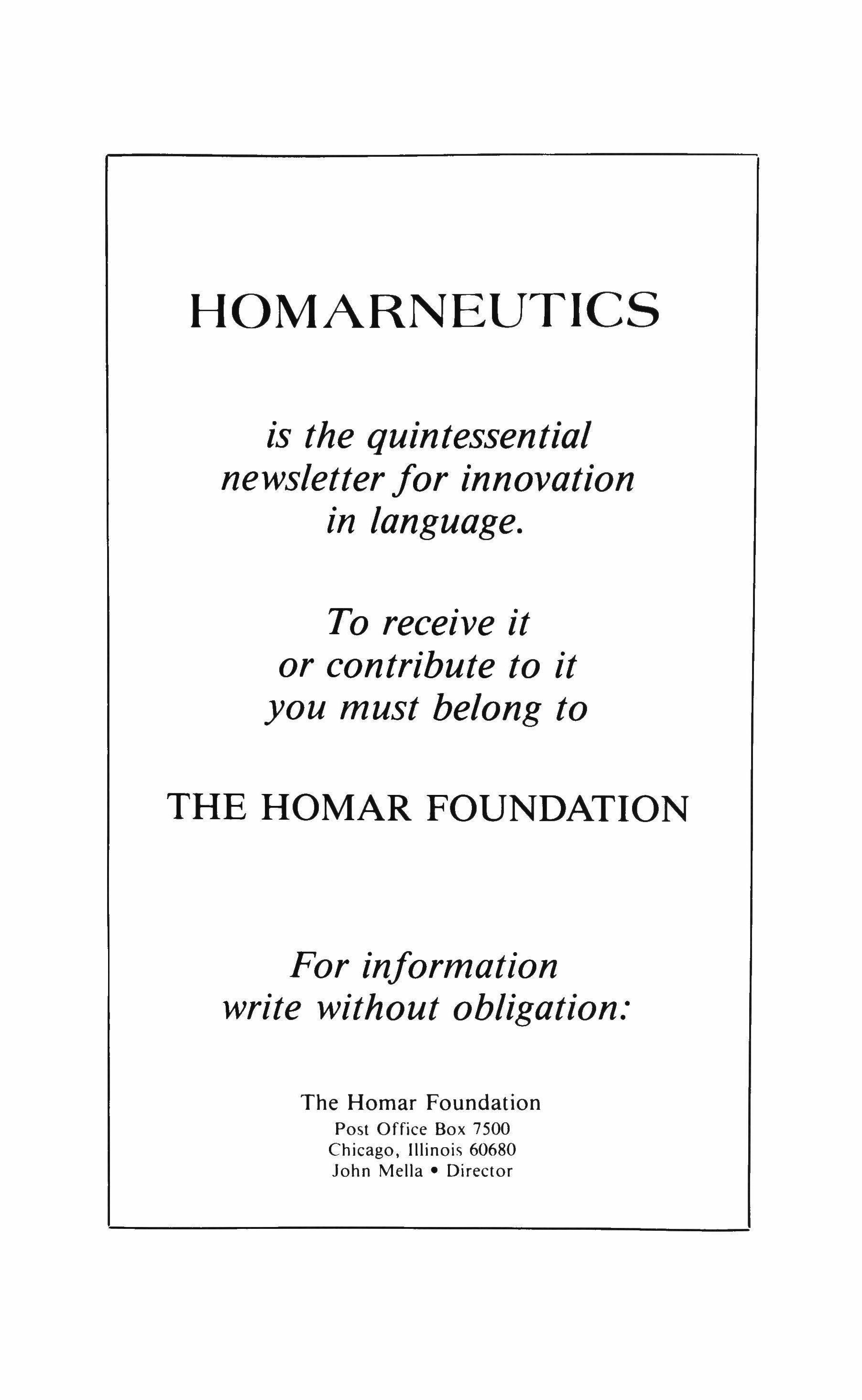
HOMARNEUTICS is the quintessential newsletter for innovation in language. To receive it or contribute to it you must belong to THE HOMAR FOUNDATION For information write without obligation: The Homar Foundation Post Office Box 7500 Chicago, Illinois 60680 John
Director
Mella
Yeats, Eliot, Pound, Stevens, Williams, Moore, MacLeish, Auden, Jeffers, Cummings, Shapiro, Schwartz, Jarrell, Lowell, Merrill, Thomas, Nemerov, Ashbery, Hecht, Kunitz, Plath, Hall, Ammons, Bishop, Hollander, Meredith, Berryman, Wagoner, Snyder, Van Duyn, Kumin, Wright, Ignatow, Atwood, Pinsky, Dubie, Raab, and Bottoms have something in common.
POETRY
Edited by John Frederick Nims
Since 1912 America's premiere poetry monthly: -latest poems by todays leading and newly discovered talents - extensive book reviews - monthly book listings - news notes on the poetry scene around the country
Write us direct about POETRY's new special classroom discount rates.
POETRY continues to make history. Pass it on.
o I enclose $18 for a one-year subscription.
o Send classroom rate details.
Name
Address

Box 4348 - 601 S. Morgan Street Chicago. Illinois 60680 (312) 996-7803
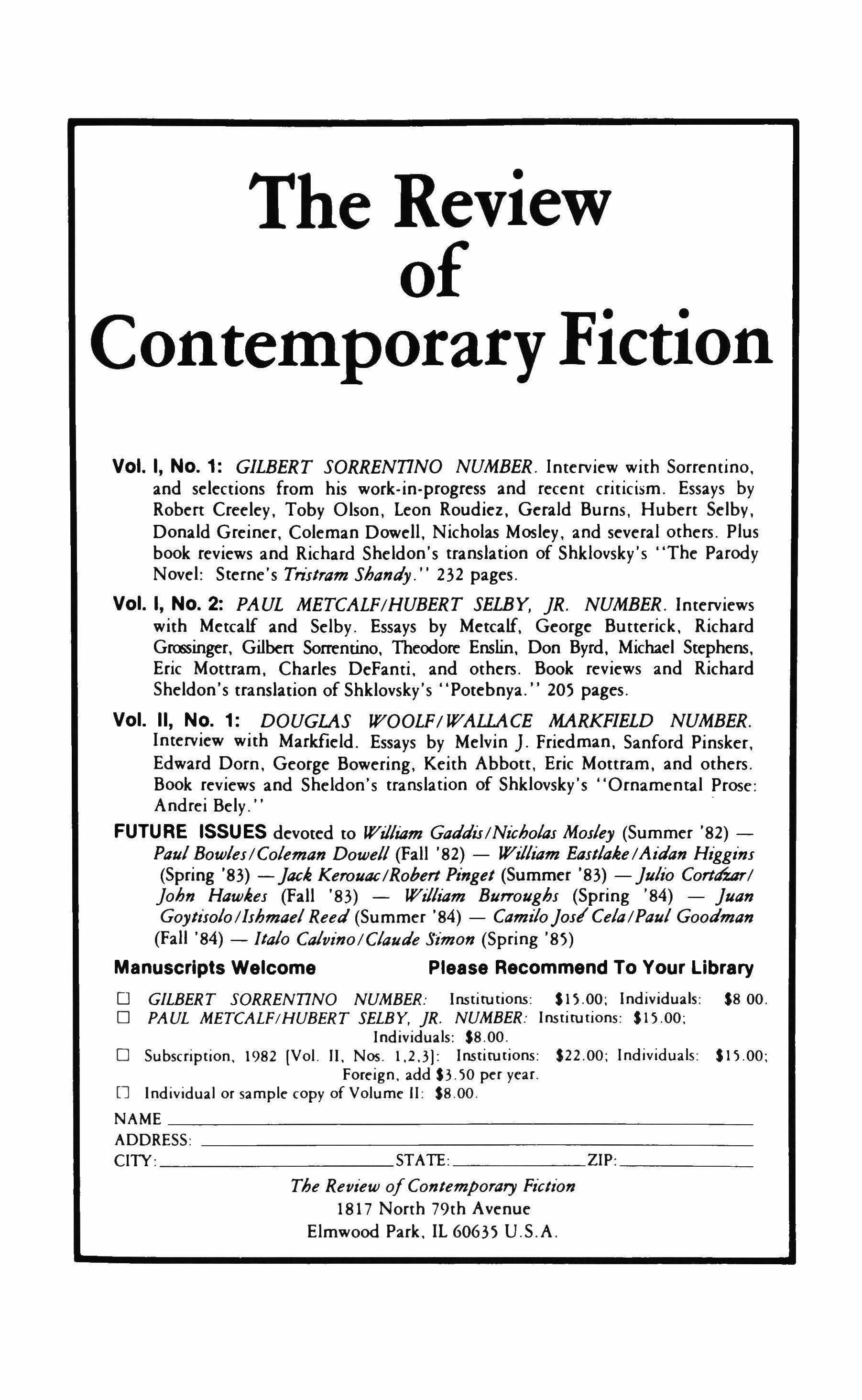
The Review of ContemporaryFiction
Vol. I, NO.1: GILBERT SORRENTINO NUMBER. Interview with Sorrentino, and selections from his work-in-progress and recent criticism. Essays by Robert Creeley, Toby Olson, Leon Roudiez, Gerald Burns, Hubert Selby, Donald Greiner, Coleman Dowell, Nicholas Mosley, and several others. Plus book reviews and Richard Sheldon's translation of Shklovsky's "The Parody Novel: Sterne's Tristram Shandy." 232 pages.
Vol. I, NO.2: PAUL METCALF/HUBERT SELBY, JR. NUMBER. Interviews with Metcalf and Selby. Essays by Metcalf, George Bunerick, Richard Grossinger, Gilbert Sorrentino, Theodore Enslin, Don Byrd, Michael Stephens, Eric Mottram, Charles DeFanti, and others. Book reviews and Richard Sheldon's translation of Shklovsky's "Potebnya." 205 pages.
Vol. II, No.1: DOUGLAS WOOLF/WALLACE MARKFIELD NUMBER. Interview with Markfield. Essays by Melvin). Friedman, Sanford Pinsker, Edward Dorn, George Bowering, Keith Abbott, Eric Mottram, and others. Book reviews and Sheldon's translation of Shklovsky's "Ornamental Prose: Andrei Bely."
FUTURE ISSUES devoted to William Gaddir/Nicholas Mosley (Summer '82)Paul Bowles/Coleman Dowell (Fall '82) - William Eastlake/Aidan Higgins (Spring '83) - Jack Kerouac/Roberl Pinget (Summer '83) - Julio CorltJ%tzr/ John Hawkes (Fall '83) - William Bu"oughs (Spring '84) - Juan Goyttsolo/Ishmael Reed (Summer '84) - CamtloJoslCela/Paul Goodman (Fall '84) - ltaio Calvino/Claude Simon (Spring '85)
Manuscripts Welcome Please Recommend To Your Library
o GILBERT SORRENTINO NUMBER: Institutions: $15.00; Individuals: $B 00.
o PAUL METCALF/HUBERT SELBY, JR. NUMBER: Institutions: $15.00; Individuals: $B.OO.
o Subscription, 19B2 [Vol. II, Nos. 1,2.3): Institutions: $22.00; Individuals: $15.00; Foreign. add $3.50 per year.
[l Individual or sample copy of Volume II: $B.OO.
NAME ADDRESS:
CITY: STATE: ZIP: The Review ofContemporary Fiction 1817 North 79th Avenue Elmwood Park, IL 60635 U.S.A.
Yeats, Eliot, Pound, Stevens, Williams, Moore, MacLeish, Auden, Jeffers, Cummings, Shapiro, Schwartz, Jarrell, Lowell, Merrill, Thomas, Nemerov, Ashbery, Hecht, Kunitz, Plath, Hall, Ammons, Bishop, Hollander, Meredith, Berryman, Wagoner, Snyder, Van Duyn, Kumin, Wright, Ignatow, Atwood, Pinsky, Dubie, Raab, and Bottoms have something in common.
POETRY
Edited by John Frederick Nims
Since 1912 America's premiere poetry monthly: -latest poems by today's leading and newly discovered talents - extensive book reviews - monthly book listings - news notes on the poetry scene around the country
Write us direct about POETRY's new special classroom discount rates.
POETRY continues to make history. Pass it on.
o I enclose $18 for a one-year subscription.
o Send classroom rate details.
Name Address
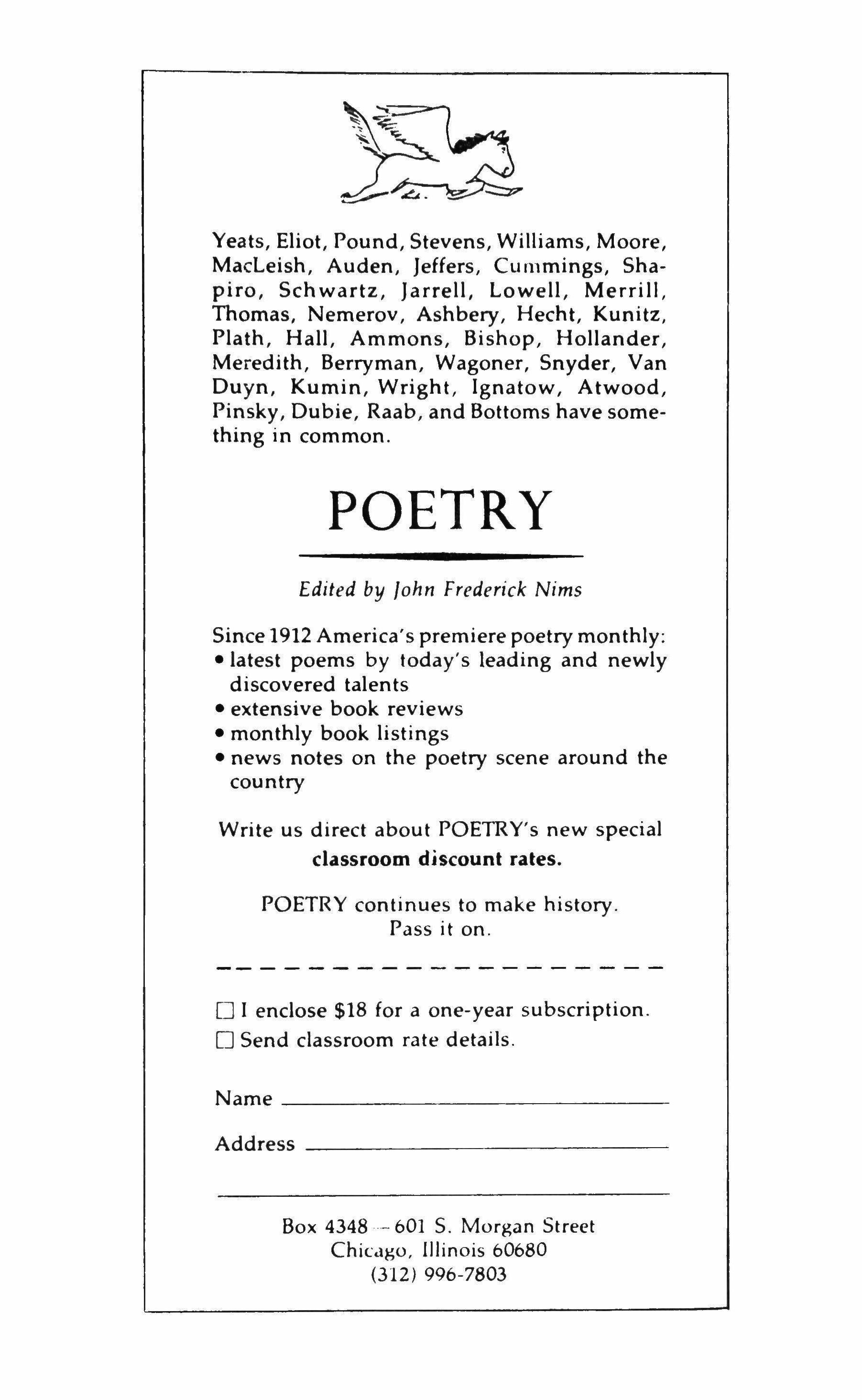
Box 4348 - 601 S. Morgan Street Chicago. Illinois 60680 (312) 996-7803

The Review of Contemporary Fiction
Vol. I, No.1: GILBERT SORRENTINO NUMBER. Interview with Sorrentino. and selections from his work-in-progress and recent criticism. Essays by Robert Creeley, Toby Olson. Leon Roudiez, Gerald Burns. Hubert Selby. Donald Greiner. Coleman Dowell. Nicholas Mosley. and several others. Plus book reviews and Richard Sheldon's translation of Shklovsky's "The Parody Novel: Sterne's Tristram Shandy." 232 pages.
Vol. I, No.2: PAUL METCALF/HUBERT SELBY, JR. NUMBER. Interviews with Metcalf and Selby. Essays by Metcalf. George Butterick, Richard Grossinger, Gilbert Sorrentino. Theodore Enslin. Don Byrd. Michael Stephens, Eric Mottram. Charles DeFanti. and others. Book reviews and Richard Sheldon's translation of Shklovsky's "Potebnya." 205 pages.
Vol. II, No.1: DOUGLAS WOOLF/WALLACE MARKFIELD NUMBER. Interview with Markfield. Essays by Melvin J. Friedman. Sanford Pinsker. Edward Dorn, George Bowering. Keith Abbott. Eric Mottram. and others. Book reviews and Sheldon's translation of Shklovsky's "Ornamental Prose: Andrei Bely."
FUTURE ISSUES devoted to William Gaddir/Nicholas Mosley (Summer 'S2)Paul Boudes/Coiema» Dowell (Fall 'S2) - William Easllake/Aidan Higgins (Spring 'S3) - Jack Kerouac/Robert Pingel (Summer 'S3) - Julio Cortti%4r/ John Hawkes (Fall 'S3) - W,lIiam Burroughs (Spring 'S4) - Juan Goylisolo/Ishmael Reed (Summer 'S4) - CamtloJosl Cela/Paul Goodman (Fall 'S4) - ltaio Calvino/Claude Simon (Spring 'S5)
Manuscripts Welcome Please Recommend To Your Library
o GILBERT SORRENTINO NUMBER: Institutions: $ 1 � .00; Individuals: $8.00.
D PAUL METCALF/HUBERT SELBY, JR. NUMBER: Institutions: $15.00; Individuals: $8.00.
D Subscription. 1982 [Vol. II. Nos. 1.2.3J: Institutions: $22.00; Individuals: $15.00; Foreign. add $3.50 per year.
[J Individual or sample copy of Volume II: $8.00.
NAME
ADDRESS: CITY STATE: ZIP:
The Review 0/Contemporary Fiction lS17 North 79th Avenue Elmwood Park. IL 60635 U.S.A.
THIS MIDWEST DISTRIBUTOR OF
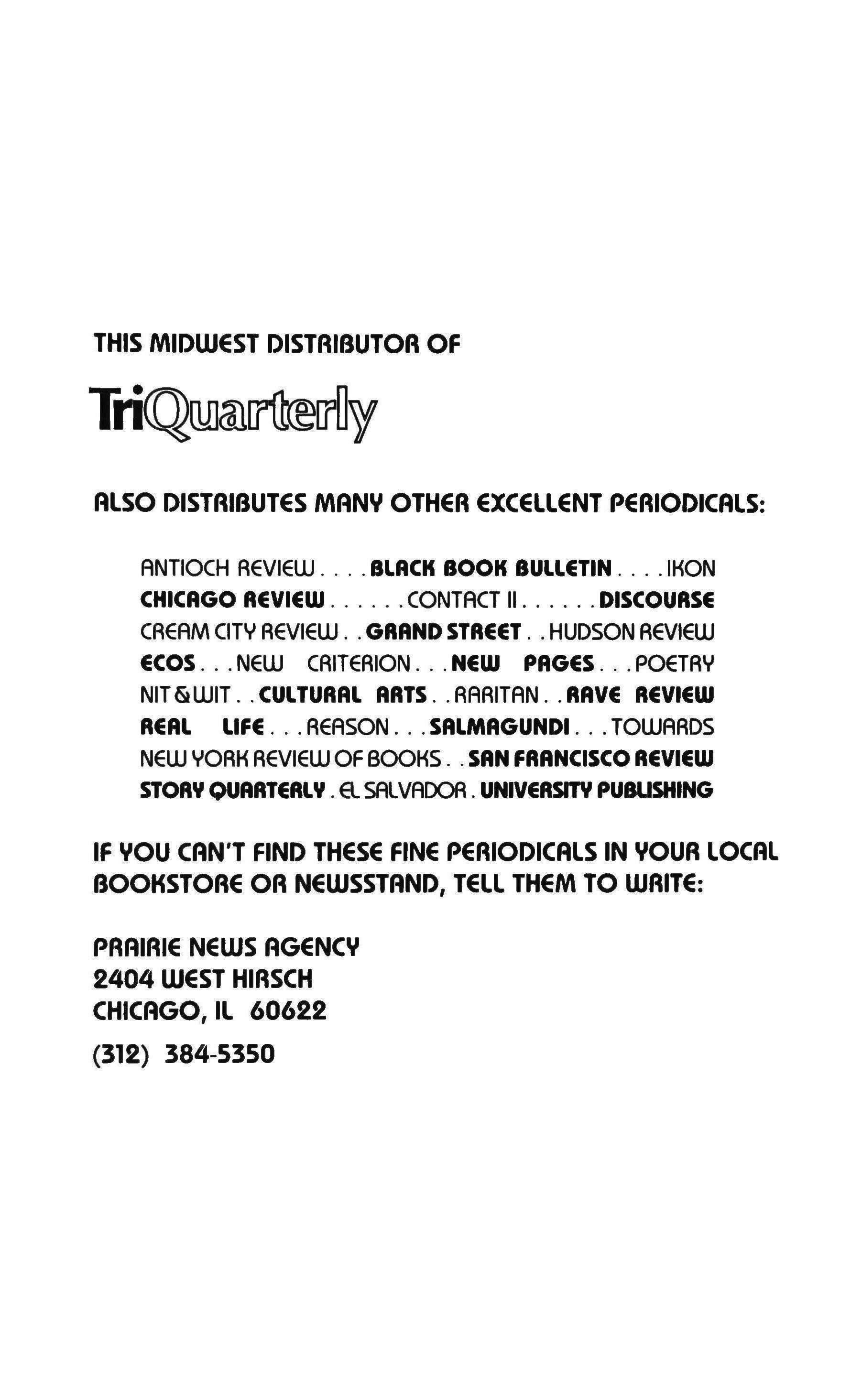
ALSO DISTRIBUTES MANY OTHER EXCELLENT PERIODICALS:
ANTIOCH AEVIEW BLACK BOOK BULLETIN IKON
CHICAGO REVIEW CONTACT II DISCOURSE
CAEAM CITY AEVIEW GRAND STREET HUDSON AEVIEW
ECOS NEW CAITEAION NEW PAGES POETAY
NIT&WIT CULTURAL ARTS AAAITAN RAVE REVIEW
REAL LIFE AEASON SALMAGUNDI TOWAADS
NEW YOAK AEVIEW OF BOOKS SAN FRANCISCO REVIEW
STORY QUARTERLY. a. SALVADOA UNIVERSITY PUBUSHING IF YOU CAN'T FIND THESE FINE PERIODICALS IN YOUR LOCAL
TELL THEM TO WRITE:
NEWSSTAND,
PRAIRIE NEWS AGENCY 2404 WEST HIRSCH CHICAGO,IL 60622 (312) 384-5350
BOOKSTORE OR
Books by Ha.old lIolenbe.g
"He has few equals and surely no superior". in the English-speaking world. for the fluency and brilliance of hi, writing on contemporary an. "- Times Luerarv 5/'/pp/('/I1('1I1
"A brave. original. and uuerly independent critical mind. A cnuc in the best tradition. for he reminds ux how passionate a force intelligence can be." - Alfred Kazin
Chicago
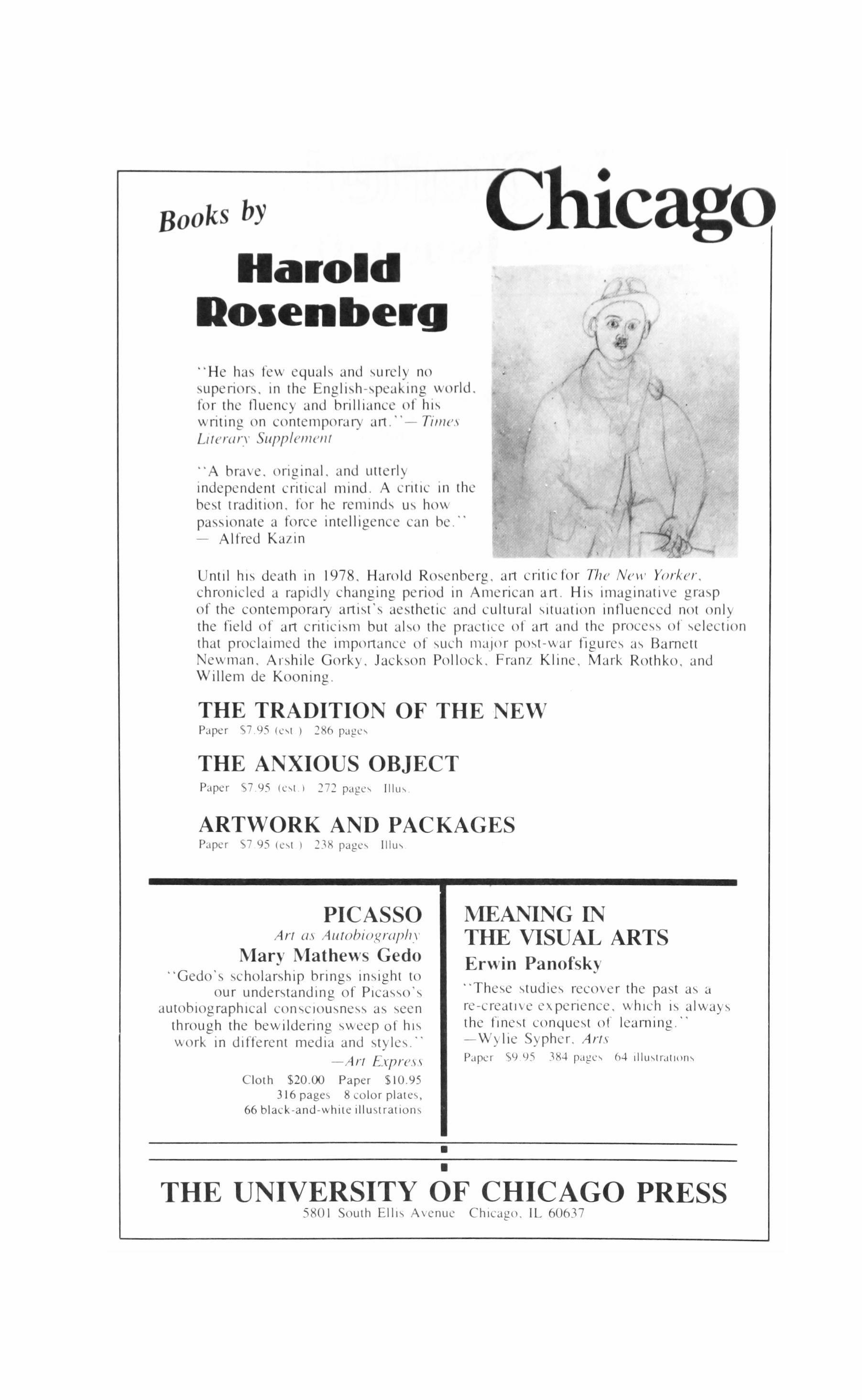
Until his death in 1978. Harold Rosenberg. an critic for Till' N('\\' Yorker. chronicled a rapidly changing period in American an. His imaginative grasp of the contemporary artist'« aesthetic and cultural vrru.uion inlluenced not only the field of an criticism but also the practice of an and the proccs of <election that proclaimed the importance of such 111�1.i(lr post-war ligures as Barnell Newman. Arshile Gorky. Jackson Pollock. Franz Kline. Mark Rothko. and Willern de Kooning.
THE TRADITION OF THE NEW
Paper
S7.95 ( c <r ) 286 pagc-,
THE ANXIOUS OBJECT
Paper S795 (L',>!) 272 page- Illu
ARTWORK AND PACKAGES
Paper S7 95 (('..,1) 238 page, Illu
PICASSO
An 0.\ Autobiogruphv Mary Mathews Gedo
"Gedos scholarship brings insight to our understanding of Picas-os autobiographical consciousness as seen through the bewildering sweep of h" work in different media and styles."
-Au Express
Ctoth $20.00 Paper $tO.95 316 pages 8 color plates, 66 black-and-white illustrations
• THE
MEANING IN THE VISUAL ARTS
Erwin Panofsky
"These studies recover the past as d re-creauvc experience. which is always the fme,t conquest of learning." -W) lie Sypher. Aus Paper �9 ')5 38-.1 pagc-, 6� rlluvtrauun-,
UNIVERSITY OF CHICAGO PRESS
5801 South Ell" Avenue Chicago. IL 60637
T�uily Back Issue Offer
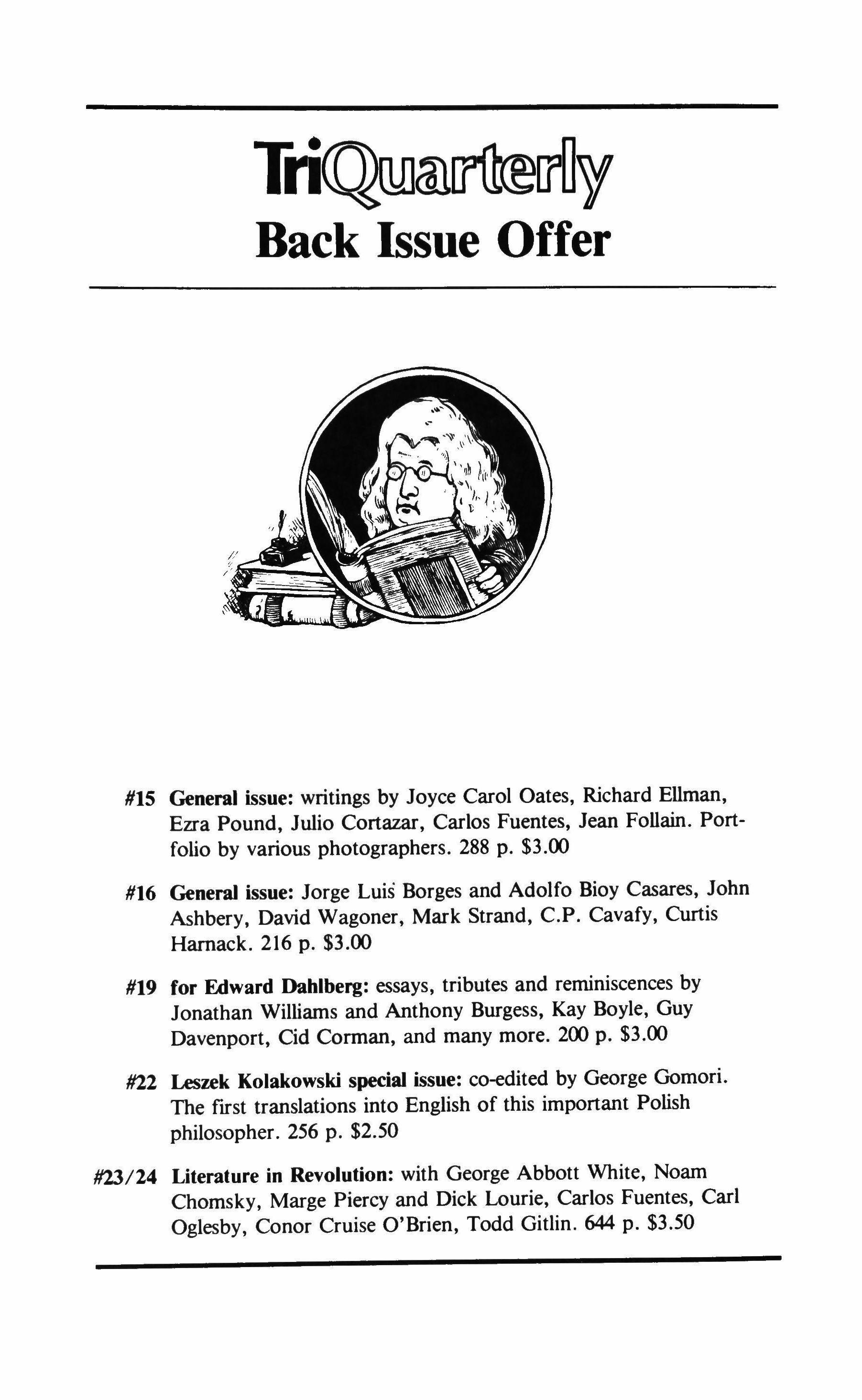
#15 General issue: writings by Joyce Carol Oates, Richard Ellman, Ezra Pound, Julio Cortazar, Carlos Fuentes, Jean Follain. Portfolio by various photographers. 288 p. $3.00
#16 General issue: Jorge Luis Borges and Adolfo Bioy Casares, John Ashbery, David Wagoner, Mark Strand, C.P. Cavafy, Curtis Harnack. 216 p. $3.00
#19 for Edward Dahlberg: essays, tributes and reminiscences by Jonathan Williams and Anthony Burgess, Kay Boyle, Guy Davenport, Cid Corman, and many more. 200 p. $3.00
#22 Leszek Kolakowski special issue: co-edited by George Gomori. The first translations into English of this important Polish philosopher. 256 p. $2.50
#23124 Literature in Revolution: with George Abbott White, Noam Chomsky, Marge Piercy and Dick Lourie, Carlos Fuentes, Carl Oglesby, Conor Cruise O'Brien, Todd Gitlin. 644 p. $3.50

#2S Prose for Borges: a special issue with an anthology of writings by Borges and essays and appreciations by Anthony Kerrigan, Norman Thomas di Giovanni and others. 468 p. $2.95
#26 Ongoing American Fiction I: features Stanley Elkin, Robert Coover, Thomas McGuane, Russell Edson, Alain Robbe-Grillet, Joyce Carol Oates, and Philip Stevick. 420 p. $2.95
#29 Ongoing American Fiction II: stories by John Gardner, Joseph McElroy, Joy Williams, Gilbert Sorrentino, William Kittredge and others. 216 p. $2.95
#30 A Context for Ongoing American Fiction: criticism by Albert J. Guerard, David Caute, Richard Pearce, Tony Tanner, John Hawkes and Philip Stevick. 140 p. $2.95
#31 Contemporary Asian Literature: co-edited by Lucien Stryk. With Lu Hsun, Chairil Anwar, Ho Chi Minh, Shinkichi Takahashi, Yasunari Kawabata and others. 244 p. $3.50
#33 Ongoing American Fiction III: James Purdy, David Kranes, Alan Sillitoe, Paul Bowles, Daniel Halpern, Morris Dickstein, Robert Alter and more. 340 p. $3.50
#34 Ongoing American Fiction IV: Charles Newman, Ian McEwan, Robert Creeley, Gilbert Sorrentino, Ron Sukenick, Joseph McElroy, Robert Scholes and nine others. 256 p. $3.50
#3S A special two-volume set-Minute Stories: 87 tiny fictions by W.S. Merwin, John Hawkes, Max Apple, Richard Brautigan, Annie Dillard, Gail Godwin and others. 110 p. Selected Poetry: French, German and American poetry selected by Paul Auster, Michael Hamburger and Michael Anania. 118 p. $4.95/set
#36 Ongoing American Fiction V: Robert Coover, Ursule Molinaro, Paul West, Ian MacMillan, Joyce Carol Oates, Peter Michelson. 256 p. $3.50
#37 Going to Heaven: a fantasy about love and death, narrated entirely through photographs. Produced by Elliott Anderson, directed by Lawrence Levy, and photographed by Michael Vollan. 96 p. $4.50
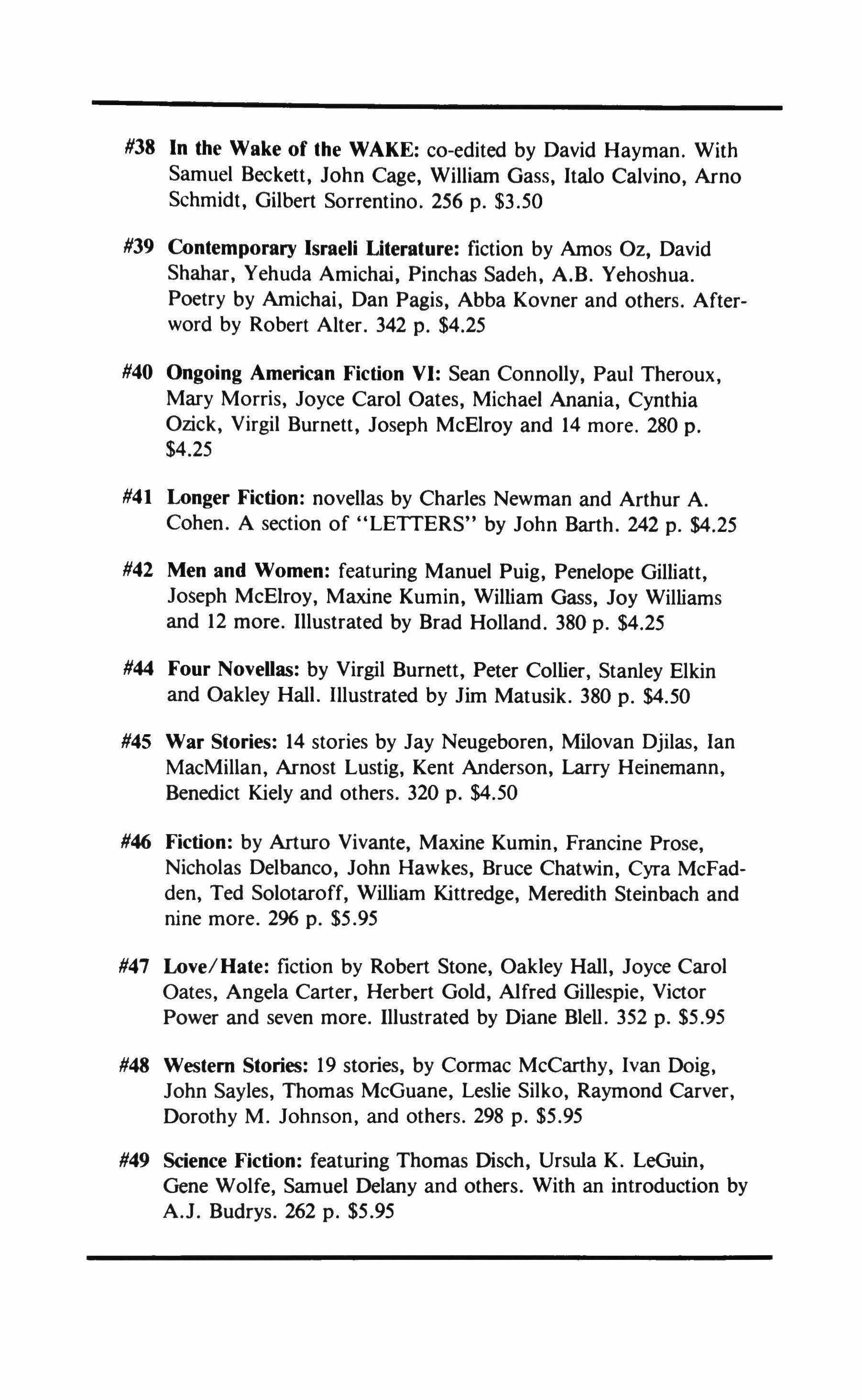
#38 In the Wake of the WAKE: co-edited by David Hayman. With Samuel Beckett, John Cage, William Gass, Italo Calvino, Arno Schmidt, Gilbert Sorrentino. 256 p. $3.50
#39 Contemporary Israeli Uterature: fiction by Amos Oz, David Shahar, Yehuda Amichai, Pinchas Sadeh, A.B. Yehoshua. Poetry by Amichai, Dan Pagis, Abba Kovner and others. Afterword by Robert Alter. 342 p. $4.25
#40 Ongoing American Fiction VI: Sean Connolly, Paul Theroux, Mary Morris, Joyce Carol Oates, Michael Anania, Cynthia Ozick, Virgil Burnett, Joseph McElroy and 14 more. 280 p. $4.25
#41 Longer Fiction: novellas by Charles Newman and Arthur A. Cohen. A section of "LETTERS" by John Barth. 242 p. $4.25
#42 Men and Women: featuring Manuel Puig, Penelope Gilliatt, Joseph McElroy, Maxine Kumin, William Gass, Joy Williams and 12 more. Illustrated by Brad Holland. 380 p. $4.25
#44 Four NoveUas: by Virgil Burnett, Peter Collier, Stanley Elkin and Oakley Hall. Illustrated by Jim Matusik. 380 p. $4.50
#45 War Stories: 14 stories by Jay Neugeboren, Milovan Djilas, Ian MacMillan, Arnost Lustig, Kent Anderson, Larry Heinemann, Benedict Kiely and others. 320 p. $4.50
#46 Fiction: by Arturo Vivante, Maxine Kumin, Francine Prose, Nicholas Delbanco, John Hawkes, Bruce Chatwin, Cyra McFadden, Ted Solotaroff, William Kittredge, Meredith Steinbach and nine more. 296 p. $5.95
#47 Love/Hate: fiction by Robert Stone, Oakley Hall, Joyce Carol Oates, Angela Carter, Herbert Gold, Alfred Gillespie, Victor Power and seven more. Illustrated by Diane Bleil. 352 p. $5.95
#48 Western Stories: 19 stories, by Cormac McCarthy, Ivan Doig, John Sayles, Thomas McGuane, Leslie Silko, Raymond Carver, Dorothy M. Johnson, and others. 298 p. $5.95
#49 Science Fiction: featuring Thomas Disch, Ursula K. LeGuin, Gene Wolfe, Samuel Delany and others. With an introduction by A.J. Budrys, 262 p. $5.95
#50 Fiction: by Thomas McGuane, Jonathan Penner, Robert Stone, Alan Sillitoe, Helen Chasin, Arturo Vivante, Arnost Lustig, Richard Stem and others. 256 p. $5.95
#51 Fiction: by Gunter Grass, Joseph McElroy, Mary Morris, Pam Durban, R.L. Shafner, Amos Oz, James McManus, Janet Beeler Shaw, Tobias Wolff and others. 284 p. $5.95
#52 Freedom in American Art and Culture: Theodore Lidz, Robert Coles, Jonathan Schiller, Richard Schechner, David Hayman, Peter Gena, Greil Marcus and others. 296 p. $5.95
#53 General issue: fiction by Arnost Lustig, Stanley Elkin, Arturo Vivante, Joseph McElroy and others; interview with Robert Stone; essay by Thomas LeClair. Photographic portfolio of sculpture by Magdalena Abakanowicz. 280 p. $5.95
Special Offer
For orders of two or more books, deduct 200/0 from total price. We pay postage on orders of three or more copies. (For orders of one or two books please add $1.00 for postage and handling.)
TriQuarterly
Northwestern University, 1735 Benson Avenue Evanston, Ill. 60201
Please send me the following back issues of TriQuarterly:
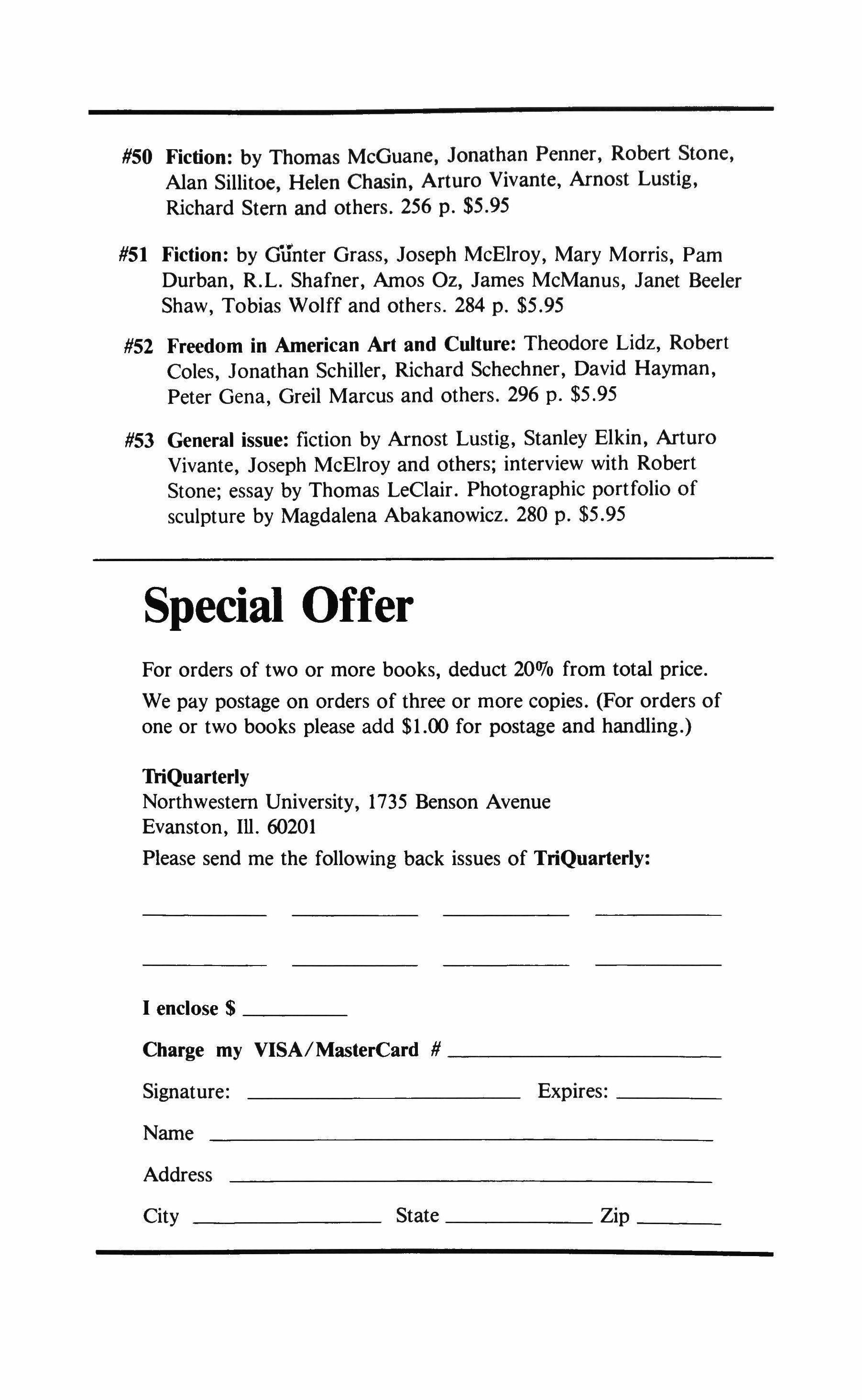
I enclose s
Charge my VISA/MasterCard #
Signature: Expires:
Name Address
City State Zip
Roselyn Karol Ablow
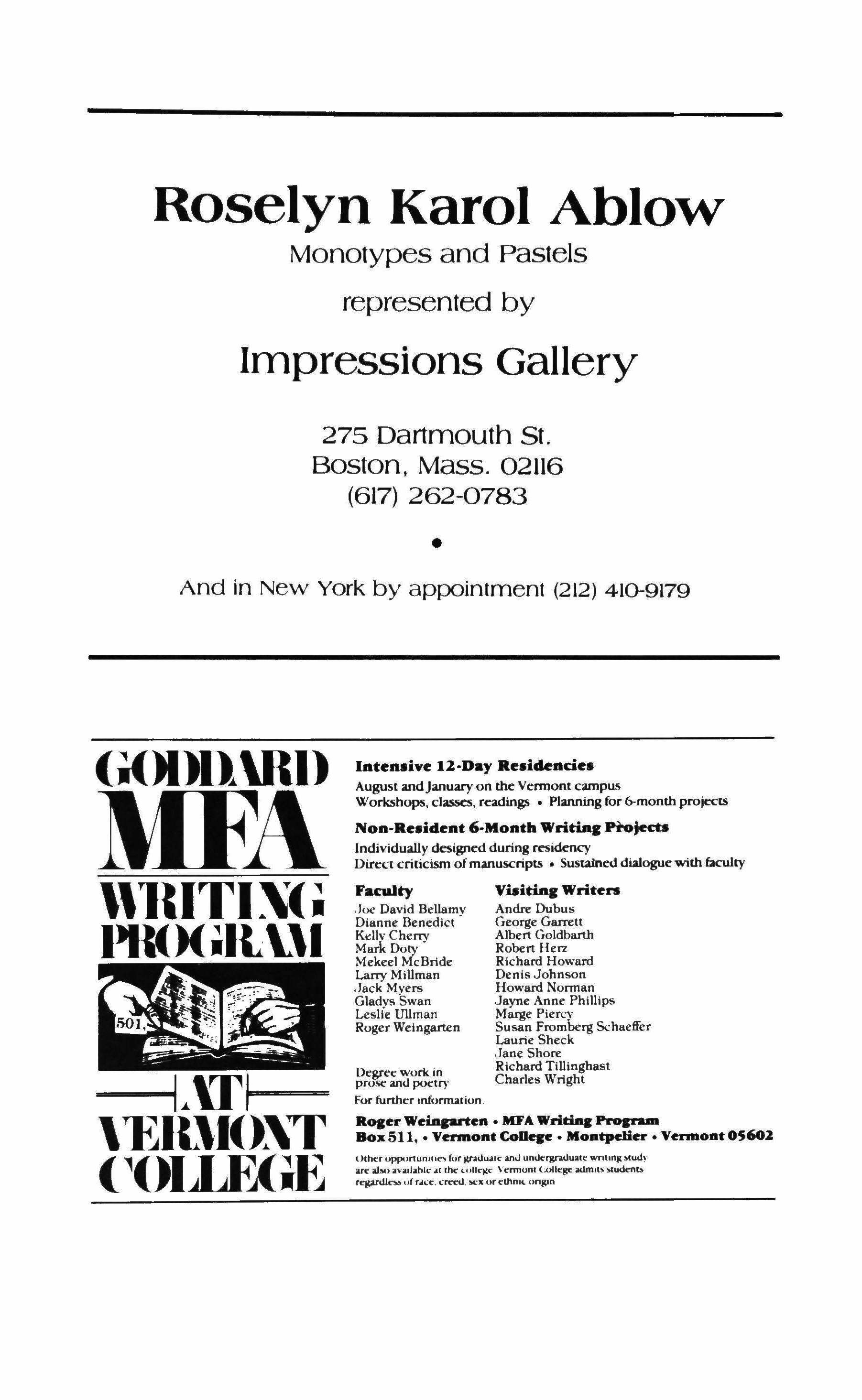
Inten.iYe 12-Day Re.idencie.
August and)anuary on the Vermont campus Workshops. classes. readings Planning for 6-month projects
Non-Re.ident 6-Month Writin, ProjecU
Individually designed during residency Direct criticism of manuscripts Sustained dialogue with faculty
Faculty
.loe David Bellarnv
Dianne Benedict
KellvCherrv
Mark Doty'
Mekeel McBride
Larry Millman
Jack Myers
Gladvs Swan
Leslie Ullman
Roger Weingarten
Vuitin, Writers
Andre Dubus
George Garrett
Albert Goldbarth
Robert Herz
Richard Howard
Denis Johnson
Howard Nonnan
Jayne Anne Phillips
Marge Piercy
Susan Fromberg Schaeffer
Laurie Sheck
.Iane Shore
Richard Tillinghast
Charles Wright
and Pastels represented by Impressions Gallery 275 Dartmouth St. Boston. Mass. 02116 (617) 262-0783 • And in New York by appointment
(i()J)I)�\HI) MFA '\lIITIX(. l'_t()(.lt�'1
Monotypes
(212) 410-9179
Degree work in prose and poetry For further mformatiun.
RoaerWeiacarten MFA Writina Prop-am 8011511•• VennontCoDep. Montpelier. VennontOS60Z (hhC'r opportumue- fur w.uJualc amJ umJcrgracJulicC wrltlnll' Sl:udy arc abu a,,",ulabk ,II IhC' \_tJllcl(c Vermunt Collcg,t' adm.1S Wudc:nb fegardlO» o( race. creed. w:x or ethott. ungm


Roselyn Karol Ablow
Paul West
Pamela White Hadas
Willis Johnson
Stephen Berg
William Goyen
David Plante
Roland Flint
Steven D. Foster
Linda Pastan
Jeannette K. Ringold
Janet lewis
Phyllis Rose
David R. Sehanker
Vladimir Voinovich
liza Tucker
R. D. Skillings
Bruce WeigJ
Theodore Werss
joe Taylor
Marie luise Kaschnitz
lisel Mueller
Michael S. Harper
Thomas McGrath
David Quammen
w. S. OJ Piero
I �� � ': � -















































 for June Arnold
for June Arnold




































































































 Translated by Liza Tucker
Translated by Liza Tucker







































 Translated by Lisel Mueller
Translated by Lisel Mueller































 BUCKLES DIAMONDBACK KENNELS.
BUCKLES DIAMONDBACK KENNELS.








































